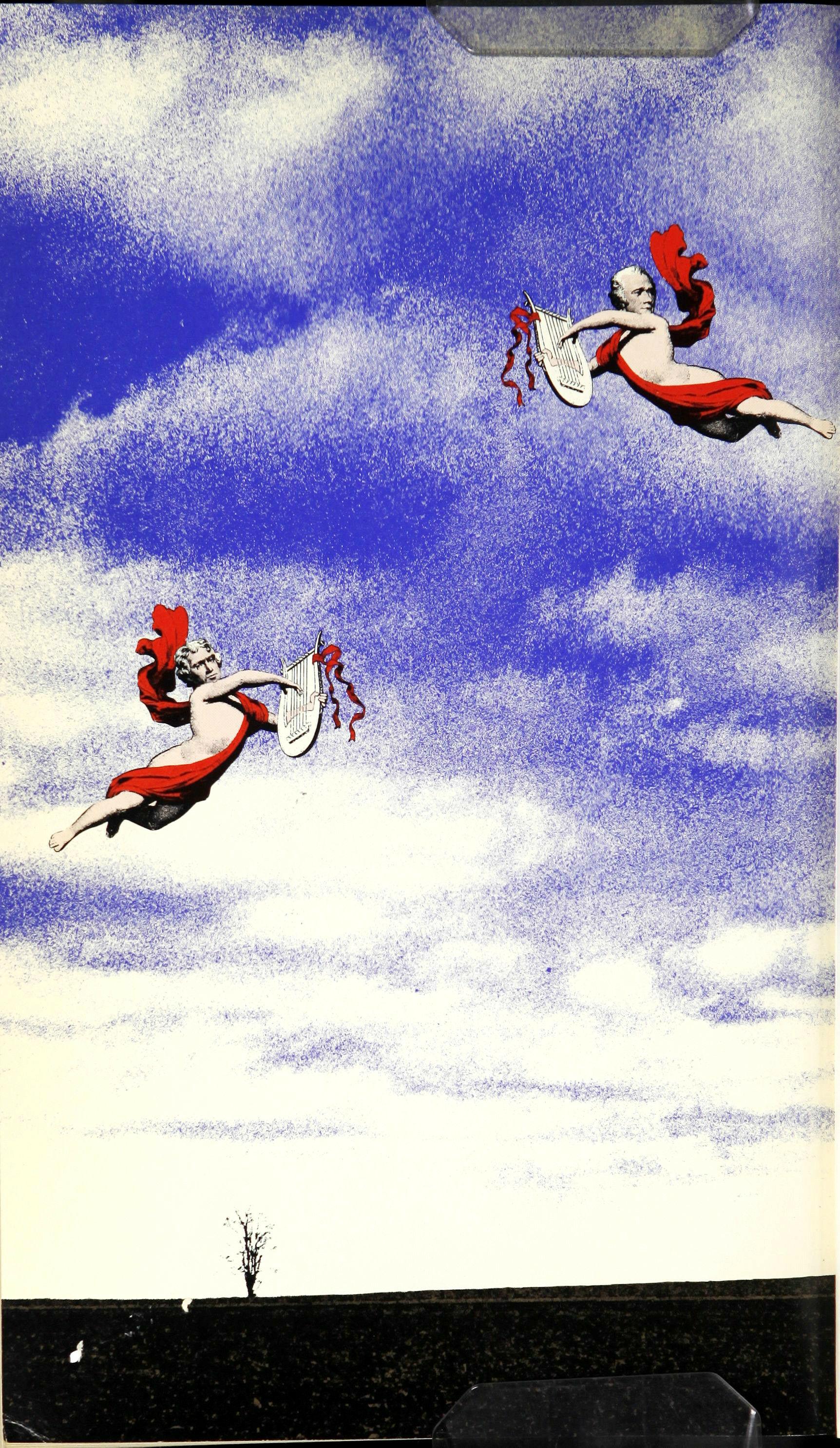






Editor: Elliott Anderson
Executive Editor: Mary Kinzie
Art Director: Lawrence Levy
Managing Editor: Theresa Maylone
Associate Editors: Michael McDonnell, Allan Gray, Tom Parrett, Mary Elinore Smith
Advisory Editor: Charles Newman
Production: Cynthia Anderson
Fulfillment: Mary M. Zakrasek, Doris Grimes
Contributing Editors: Robert Alter, Joseph Epstein, Gerald Graff, John Hawkes, David Hayman, Lawrence Levy, Joseph McElroy, Peter Michelson, Robert Onopa, Tony Tanner, Nathaniel Tarn
TriQuarterly is an international journal of arts, letters, and opinion published in the fall, winter, and spring at Northwestern University, Evanston, Illinois 60201. Subscription rates: One year $10.00; two years $15.00; three years $20.00. Foreign subscriptions $1.00 per year additional. Single copies usually $3.50. Back issue prices on request. Contributions, correspondence, and subscriptions should be addressed to TriQuarterly, University Hall 101, Northwestern University, Evanston, Illinois 60201. The editors invite submissions, but queries are strongly suggested. No manuscripts will be returned unless accompanied by a stamped, self-addressed envelope. All manuscripts accepted for publication become the property of TriQuarterly, unless otherwise indicated. Copyright © 1976 by TriQuarterly. All rights reserved. The views expressed in this magazine are to be attributed to the writers, not the editors or sponsors. Printed in the United States of America. Claims for missing numbers will be honored only within the fourmonth period after month of issue.
NATIONAL DISTRIBUTOR TO RETAIL TRADE: B. DEBOER, 188 HIGH STREET, NUTLEY, NEW JERSEY 07110. DISTRIBUTOR FOR WEST COAST RETAIL TRADE: BOOK PEOPLE, 2940 7TH STREET, BERKELEY, CALIFORNIA 94710. DISTRIBUTOR FOR GREAT BRITAIN AND EUROPE: B. F. STEVENS & BROWN, LTD., ARDON HOUSE, MILL LANE, GODALMING, SURREY, ENGLAND.
REPRINTS OF BACK ISSUES OF TriQuarterly ARE NOW AVAILABLE IN FULL FORMAT FROM KRAUS REPRINT COMPANY, ROUTE 100, MILLWOOD, NEW YORK 10546, AND IN MICROFILM FROM UNIVERSITY MICROFILMS, A XEROX COMPANY, ANN ARBOR, MICHIGAN 48106.
ROBERT COOVER
URSULE MOLINARO
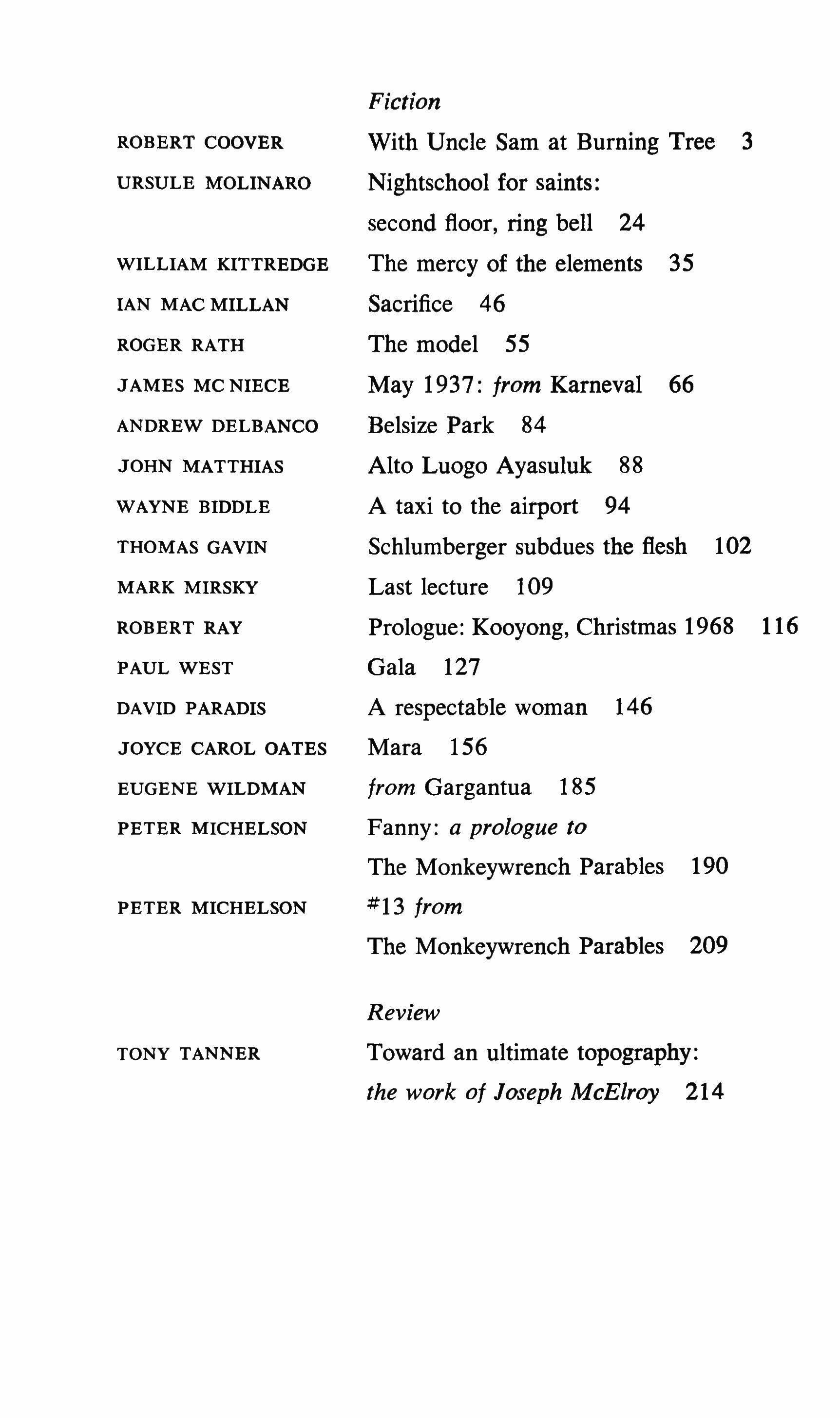
With Uncle Sam at Burning Tree 3
Nightschool for saints: second floor, ring bell 24
WILLIAM KITTREDGE The mercy of the elements 35
IAN MAC MILLAN Sacrifice 46
ROGER RATH The model 55
JAMES MC NIECE May 1937: from Karneval 66
ANDREW DELBANCO
JOHN MATTHIAS
WAYNE BIDDLE
THOMAS GAVIN
MARK MIRSKY
ROBERT RAY
PAUL WEST
DAVID PARADIS
JOYCE CAROL OATES
EUGENE WILDMAN
PETER MICHELSON
PETER MICHELSON
TONY TANNER
Belsize Park 84 Alto Luogo Ayasuluk 88 A taxi to the airport 94 Schlumberger subdues the flesh 102
Last lecture 109
Prologue: Kooyong, Christmas 1968 116 Gala 127 A respectable woman 146 Mara 156 from Gargantua 185 Fanny: a prologue to The Monkeywrench Parables 190 #13 from The Monkeywrench Parables 209 Review
Toward an ultimate topography: the work of Joseph McElroy 214
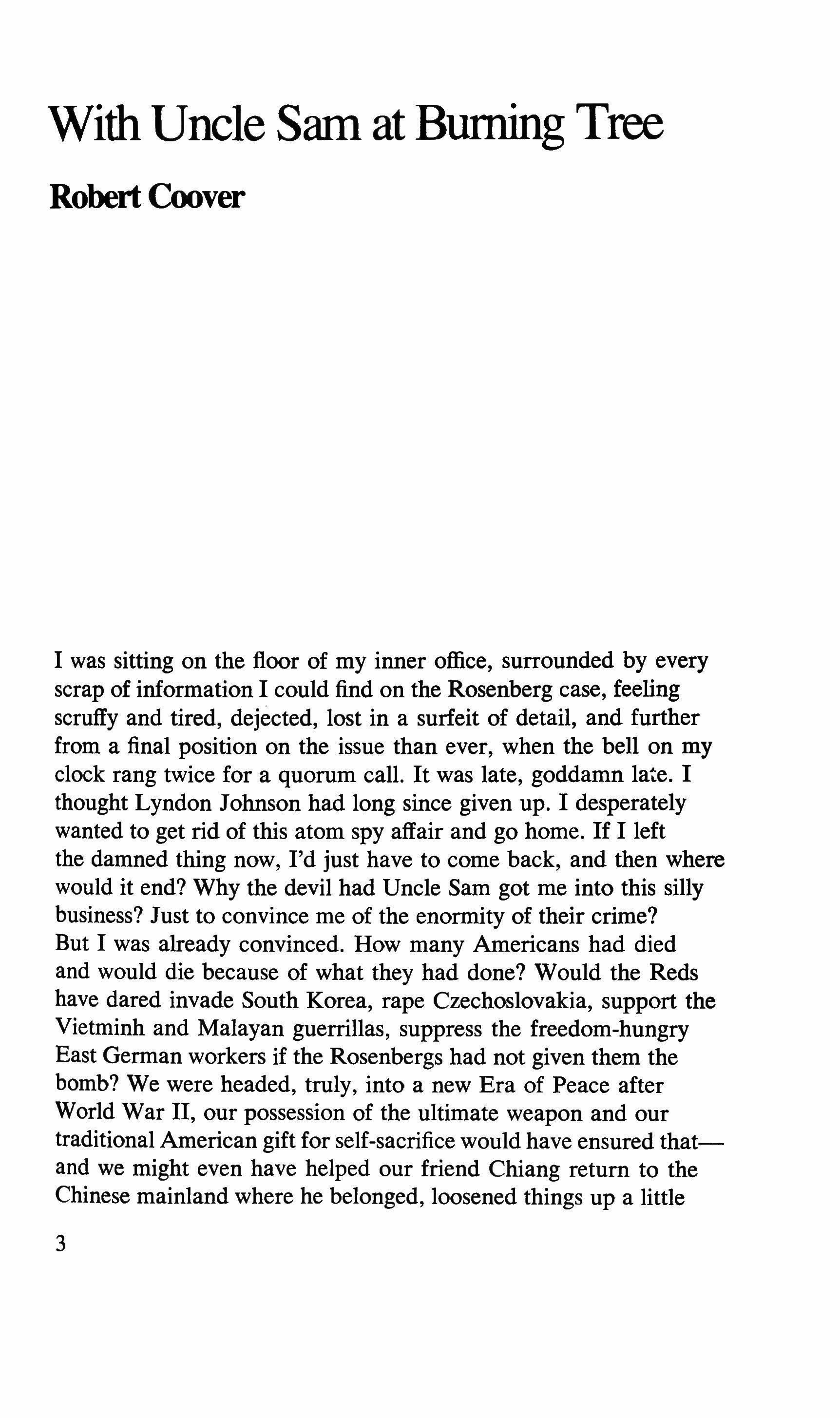
I was sitting on the floor of my inner office, surrounded by every scrap of information I could find on the Rosenberg case, feeling scruffy and tired, dejected, lost in a surfeit of detail, and further from a final position on the issue than ever, when the bell on my clock rang twice for a quorum call. It was late, goddamn late. I thought Lyndon Johnson had long since given up. I desperately wanted to get rid of this atom spy affair and go home. If I left the damned thing now, I'd just have to come back, and then where would it end? Why the devil had Uncle Sam got me into this silly business? Just to convince me of the enormity of their crime? But I was already convinced. How many Americans had died and would die because of what they had done? Would the Reds have dared invade South Korea, rape Czechoslovakia, support the Vietminh and Malayan guerrillas, suppress the freedom-hungry East German workers if the Rosenbergs had not given them the bomb? We were headed, truly, into a new Era of Peace after World War II, our possession of the ultimate weapon and our traditional American gift for self-sacrifice would have ensured thatand we might even have helped our friend Chiang return to the Chinese mainland where he belonged, loosened things up a little
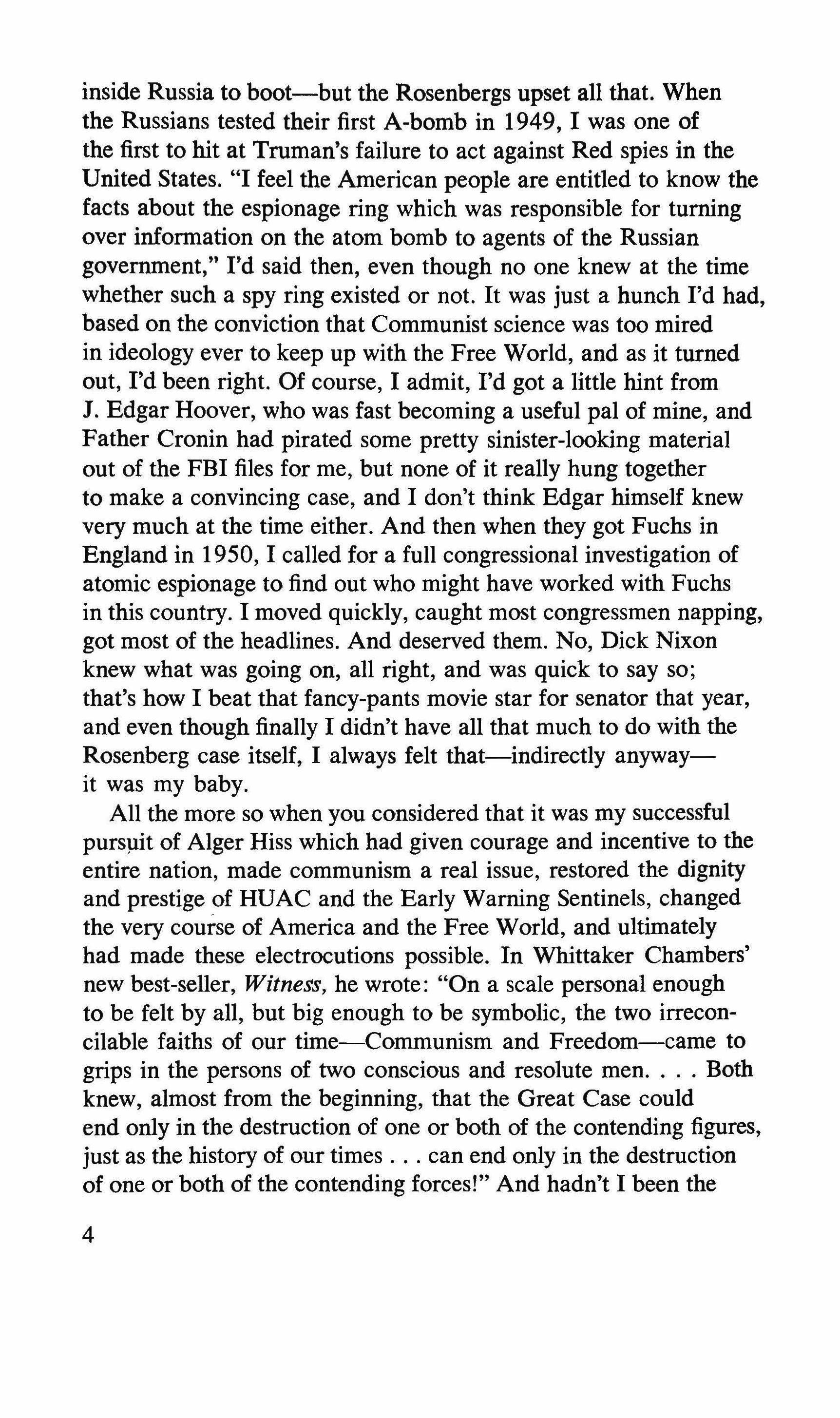
inside Russia to boot-but the Rosenbergs upset all that. When the Russians tested their first A-bomb in 1949, I was one of the first to hit at Truman's failure to act against Red spies in the United States. "I feel the American people are entitled to know the facts about the espionage ring which was responsible for turning over information on the atom bomb to agents of the Russian government," I'd said then, even though no one knew at the time whether such a spy ring existed or not. It was just a hunch I'd had, based on the conviction that Communist science was too mired in ideology ever to keep up with the Free World, and as it turned out, I'd been right. Of course, I admit, I'd got a little hint from J. Edgar Hoover, who was fast becoming a useful pal of mine, and Father Cronin had pirated some pretty sinister-looking material out of the FBI files for me, but none of it really hung together to make a convincing case, and I don't think Edgar himself knew very much at the time either. And then when they got Fuchs in England in 1950, I called for a full congressional investigation of atomic espionage to find out who might have worked with Fuchs in this country. I moved quickly, caught most congressmen napping, got most of the headlines. And deserved them. No, Dick Nixon knew what was going on, all right, and was quick to say so; that's how I beat that fancy-pants movie star for senator that year, and even though finally I didn't have all that much to do with the Rosenberg case itself, I always felt that-indirectly anywayit was my baby.
All the more so when you considered that it was my successful pursuit of Alger Hiss which had given courage and incentive to the entire nation, made communism a real issue, restored the dignity and prestige of HUAC and the Early Warning Sentinels, changed the very course of America and the Free World, and ultimately had made these electrocutions possible. In Whittaker Chambers' new best-seller, Witness, he wrote: "On a scale personal enough to be felt by all, but big enough to be symbolic, the two irreconcilable faiths of our time-Communism and Freedom-came to grips in the persons of two conscious and resolute men. Both knew, almost from the beginning, that the Great Case could end only in the destruction of one or both of the contending figures, just as the history of our times can end only in the destruction of one or both of the contending forces!" And hadn't I been the

catalyst that gave Whittaker and the Free World victory? I'll never forget the day that Hiss, beaten, walked over to the old davenport in Room 1400 of the Commodore Hotel in New York to examine Chambers' molars: "Would you mind opening your mouth wider? I said, would you open your mouth!" What pathos! If these two were indeed, as Whittaker had so brilliantly and profoundly suggested, the momentary Incarnations of the contending forces of the universe, there was something deeply ironic about the Force of Darkness and Evil poking petulantly but almost tearfully among the dental ruins in the soft but firm jowls of the Force of Goodness and Light. I think he hoped that Whittaker would bite him so that he could cry from pain rather than humiliation. I finally had to ask him, "Excuse me, before we leave the teeth, Mr. Hiss, do you feel that you, uh, would have to have the dentist tell you just what he did to the teeth before you could tell anything about this man?" From that moment on, Hiss was finished; like that snake that eats its own tail, he just couldn't keep his foot out of his mouth after that. It was maybe the most fun I ever had in politics, outside of elections, and when it was over, 1 felt like one chosen. Like Whittaker said: "I do not know any way to explain why God's grace touches a man who seems unworthy of it. But neither do I know any other way to explain how a man like myself could prevail so far against the powers of the world arrayed almost solidly against him, to destroy him and defeat his truth." Which was even more true of me, who unlike Chambers must struggle for a lifetime. Not that I'm unworthy. No, that's just it, the powers arrayed against the good man are formidable and indefatigable, there are few who can stay the course. Defeat and disappointment dog every footstep. If old Hiss hadn't been a liar, for example-and an eager one at that!-I might have been destroyed before 1 could ever get started. So thank God at least for that: it gave me the power to prevail, it was a milestone in human history, and marked me once and for all as the greatest of the Early Warning Sentinels. In short, my conscience was clean-so why had Uncle Sam brought this Rosenberg case up, especially so late in the ball game? Of course, he'd only mentioned it in passing while washing his balls on the seventh tee, but 1 had long since learned that with Uncle Sam nothing was mere happenstance, you had to listen to 5
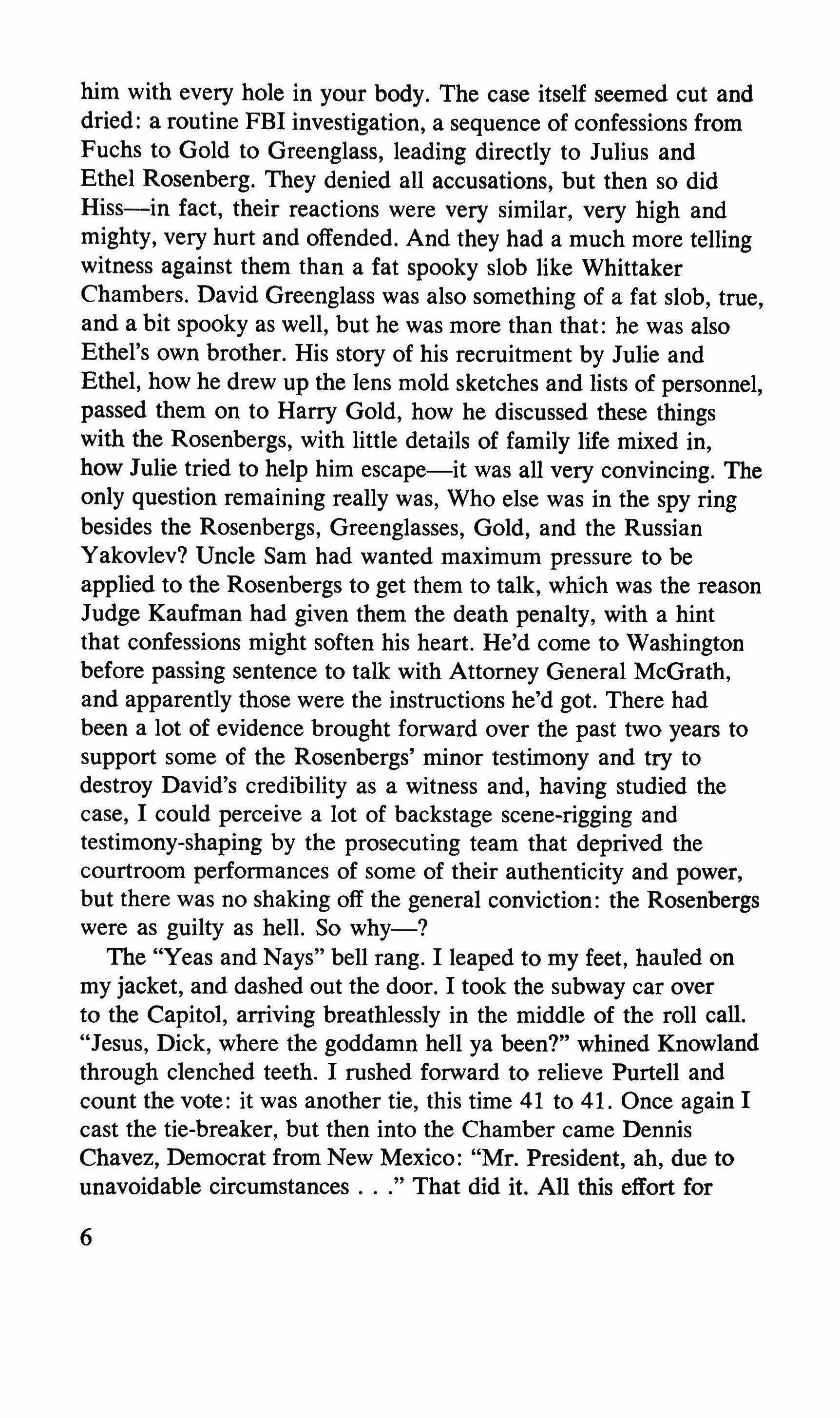
him with every hole in your body. The case itself seemed cut and dried: a routine FBI investigation, a sequence of confessions from Fuchs to Gold to Greenglass, leading directly to Julius and Ethel Rosenberg. They denied all accusations, but then so did Hiss-in fact, their reactions were very similar, very high and mighty, very hurt and offended. And they had a much more telling witness against them than a fat spooky slob like Whittaker Chambers. David Greenglass was also something of a fat slob, true, and a bit spooky as well, but he was more than that: he was also Ethel's own brother. His story of his recruitment by Julie and Ethel, how he drew up the lens mold sketches and lists of personnel, passed them on to Harry Gold, how he discussed these things with the Rosenbergs, with little details of family life mixed in, how Julie tried to help him escape-it was all very convincing. The only question remaining really was, Who else was in the spy ring besides the Rosenbergs, Greenglasses, Gold, and the Russian Yakovlev? Uncle Sam had wanted maximum pressure to be applied to the Rosenbergs to get them to talk, which was the reason Judge Kaufman had given them the death penalty, with a hint that confessions might soften his heart. He'd come to Washington before passing sentence to talk with Attorney General McGrath, and apparently those were the instructions he'd got. There had been a lot of evidence brought forward over the past two years to support some of the Rosenbergs' minor testimony and try to destroy David's credibility as a witness and, having studied the case, I could perceive a lot of backstage scene-rigging and testimony-shaping by the prosecuting team that deprived the courtroom performances of some of their authenticity and power, but there was no shaking off the general conviction: the Rosenbergs were as guilty as hell. So why-?
The "Yeas and Nays" bell rang. I leaped to my feet, hauled on my jacket, and dashed out the door. I took the subway car over to the Capitol, arriving breathlessly in the middle of the roll call. "Jesus, Dick, where the goddamn hell ya been?" whined Knowland through clenched teeth. I rushed forward to relieve Purtell and count the vote: it was another tie, this time 41 to 41. Once again I cast the tie-breaker, but then into the Chamber came Dennis Chavez, Democrat from New Mexico: "Mr. President, ah, due to unavoidable circumstances That did it. All this effort for
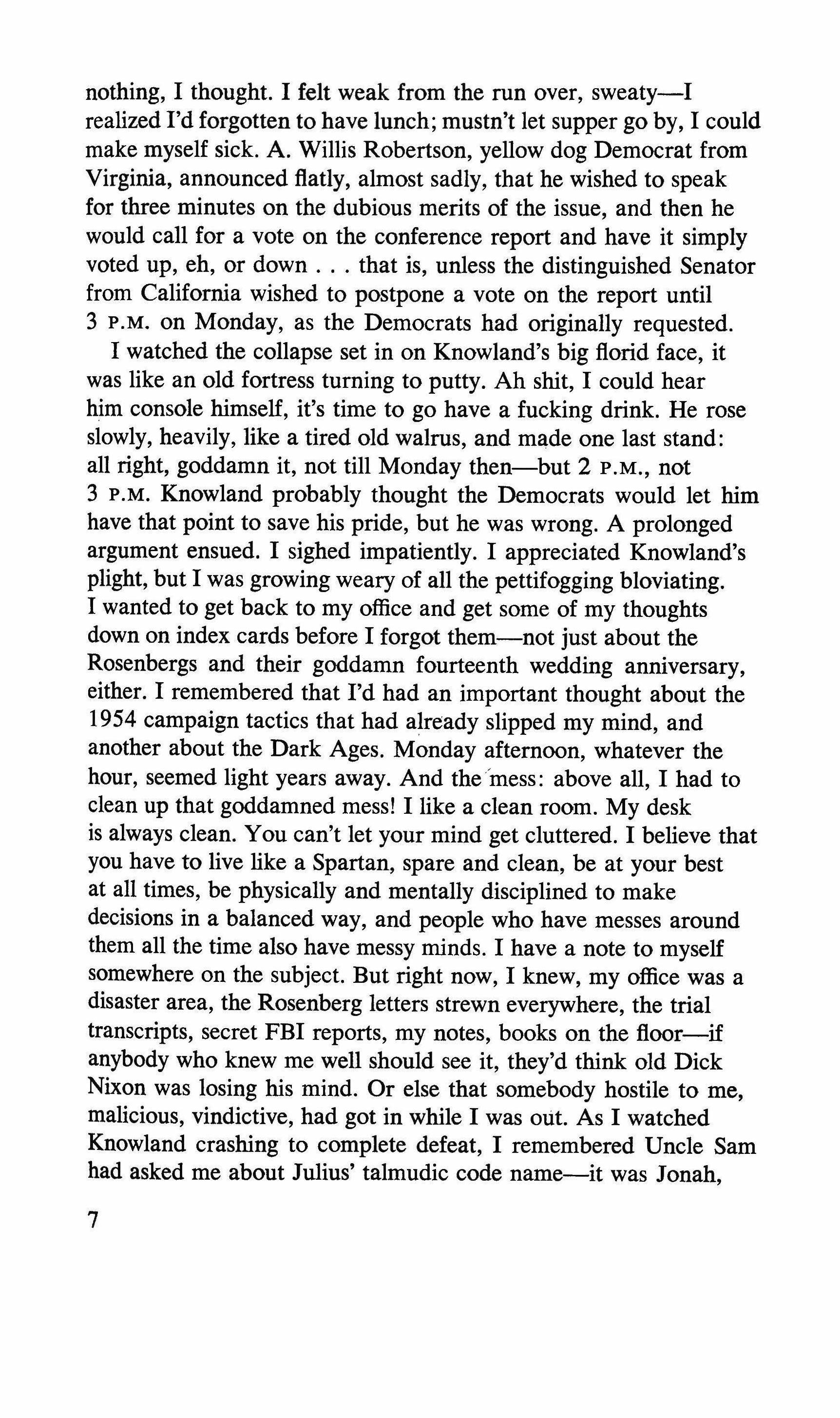
nothing, I thought. I felt weak from the run over, sweaty-I realized I'd forgotten to have lunch; mustn't let supper go by, I could make myself sick. A. Willis Robertson, yellow dog Democrat from Virginia, announced flatly, almost sadly, that he wished to speak for three minutes on the dubious merits of the issue, and then he would call for a vote on the conference report and have it simply voted up, eh, or down that is, unless the distinguished Senator from California wished to postpone a vote on the report until 3 P.M. on Monday, as the Democrats had originally requested. I watched the collapse set in on Knowland's big florid face, it was like an old fortress turning to putty. Ah shit, I could hear him console himself, it's time to go have a fucking drink. He rose slowly, heavily, like a tired old walrus, and made one last stand: all right, goddamn it, not till Monday then-but 2 P.M., not 3 P.M. Knowland probably thought the Democrats would let him have that point to save his pride, but he was wrong. A prolonged argument ensued. I sighed impatiently. I appreciated Knowland's plight, but I was growing weary of all the pettifogging bloviating. I wanted to get back to my office and get some of my thoughts down on index cards before I forgot them-not just about the Rosenbergs and their goddamn fourteenth wedding anniversary, either. I remembered that I'd had an important thought about the 1954 campaign tactics that had already slipped my mind, and another about the Dark Ages. Monday afternoon, whatever the hour, seemed light years away. And the/mess: above all, I had to clean up that goddamned mess! I like a clean room. My desk is always clean. You can't let your mind get cluttered. I believe that you have to live like a Spartan, spare and clean, be at your best at all times, be physically and mentally disciplined to make decisions in a balanced way, and people who have messes around them all the time also have messy minds. I have a note to myself somewhere on the subject. But right now, I knew, my office was a disaster area, the Rosenberg letters strewn everywhere, the trial transcripts, secret FBI reports, my notes, books on the floor-if anybody who knew me well should see it, they'd think old Dick Nixon was losing his mind. Or else that somebody hostile to me, malicious, vindictive, had got in while I was out. As I watched Knowland crashing to complete defeat, I remembered Uncle Sam had asked me about Julius' talmudic code name-it was Jonah, 7
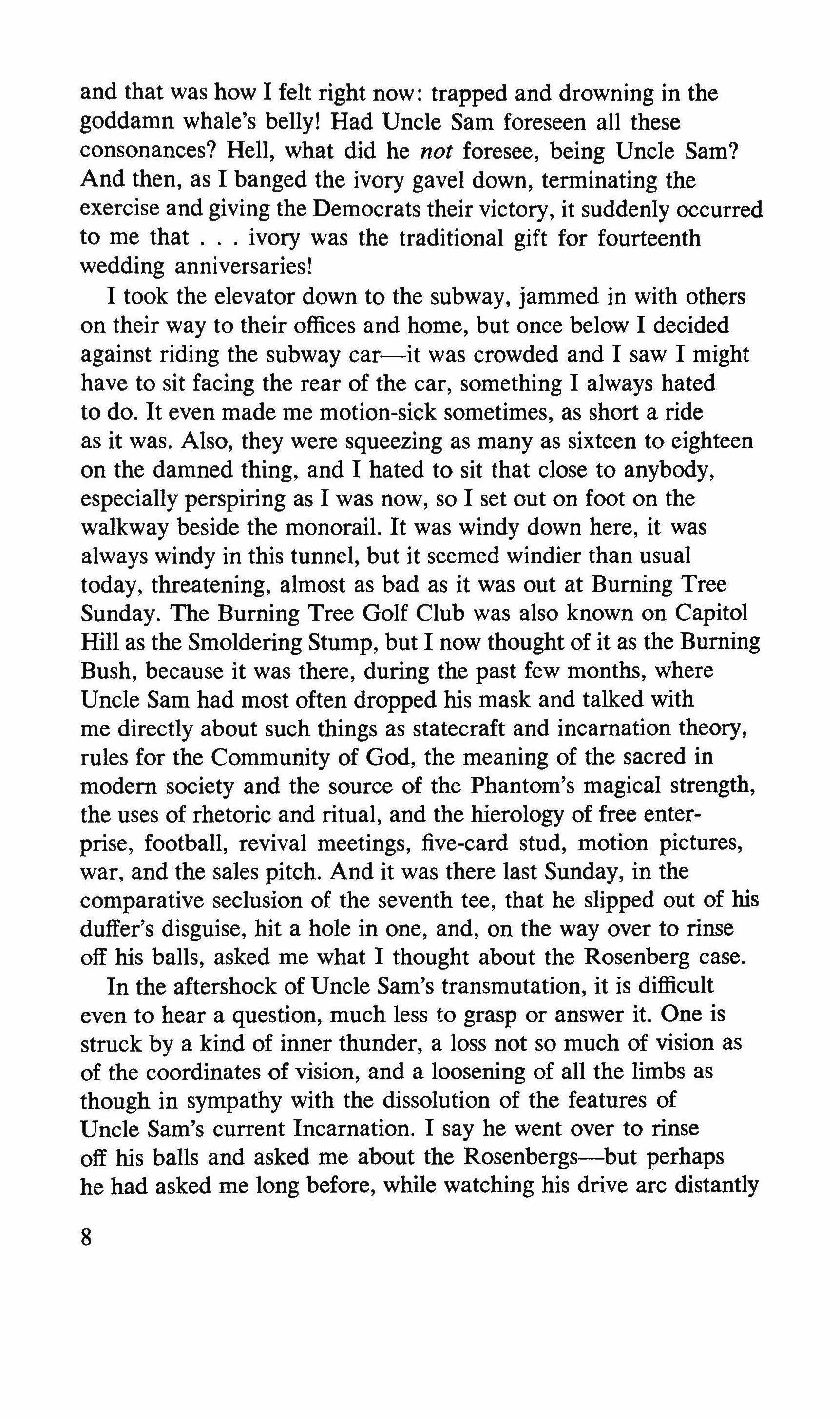
and that was how I felt right now: trapped and drowning in the goddamn whale's belly! Had Uncle Sam foreseen all these consonances? Hell, what did he not foresee, being Uncle Sam? And then, as I banged the ivory gavel down, terminating the exercise and giving the Democrats their victory, it suddenly occurred to me that ivory was the traditional gift for fourteenth wedding anniversaries!
I took the elevator down to the subway, jammed in with others on their way to their offices and home, but once below I decided against riding the subway car-it was crowded and I saw I might have to sit facing the rear of the car, something I always hated to do. It even made me motion-sick sometimes, as short a ride as it was. Also, they were squeezing as many as sixteen to eighteen on the damned thing, and I hated to sit that close to anybody, especially perspiring as I was now, so I set out on foot on the walkway beside the monorail. It was windy down here, it was always windy in this tunnel, but it seemed windier than usual today, threatening, almost as bad as it was out at Burning Tree Sunday. The Burning Tree Golf Club was also known on Capitol Hill as the Smoldering Stump, but I now thought of it as the Burning Bush, because it was there, during the past few months, where Uncle Sam had most often dropped his mask and talked with me directly about such things as statecraft and incarnation theory, rules for the Community of God, the meaning of the sacred in modern society and the source of the Phantom's magical strength, the uses of rhetoric and ritual, and the hierology of free enterprise, football, revival meetings, five-card stud, motion pictures, war, and the sales pitch. And it was there last Sunday, in the comparative seclusion of the seventh tee, that he slipped out of his duffer's disguise, hit a hole in one, and, on the way over to rinse off his balls, asked me what I thought about the Rosenberg case. In the aftershock of Uncle Sam's transmutation, it is difficult even to hear a question, much less to grasp or answer it. One is struck by a kind of inner thunder, a loss not so much of vision as of the coordinates of vision, and a loosening of all the limbs as though in sympathy with the dissolution of the features of Uncle Sam's current Incarnation. I say he went over to rinse off his balls and asked me about the Rosenbergs-but perhaps he had asked me long before, while watching his drive arc distantly
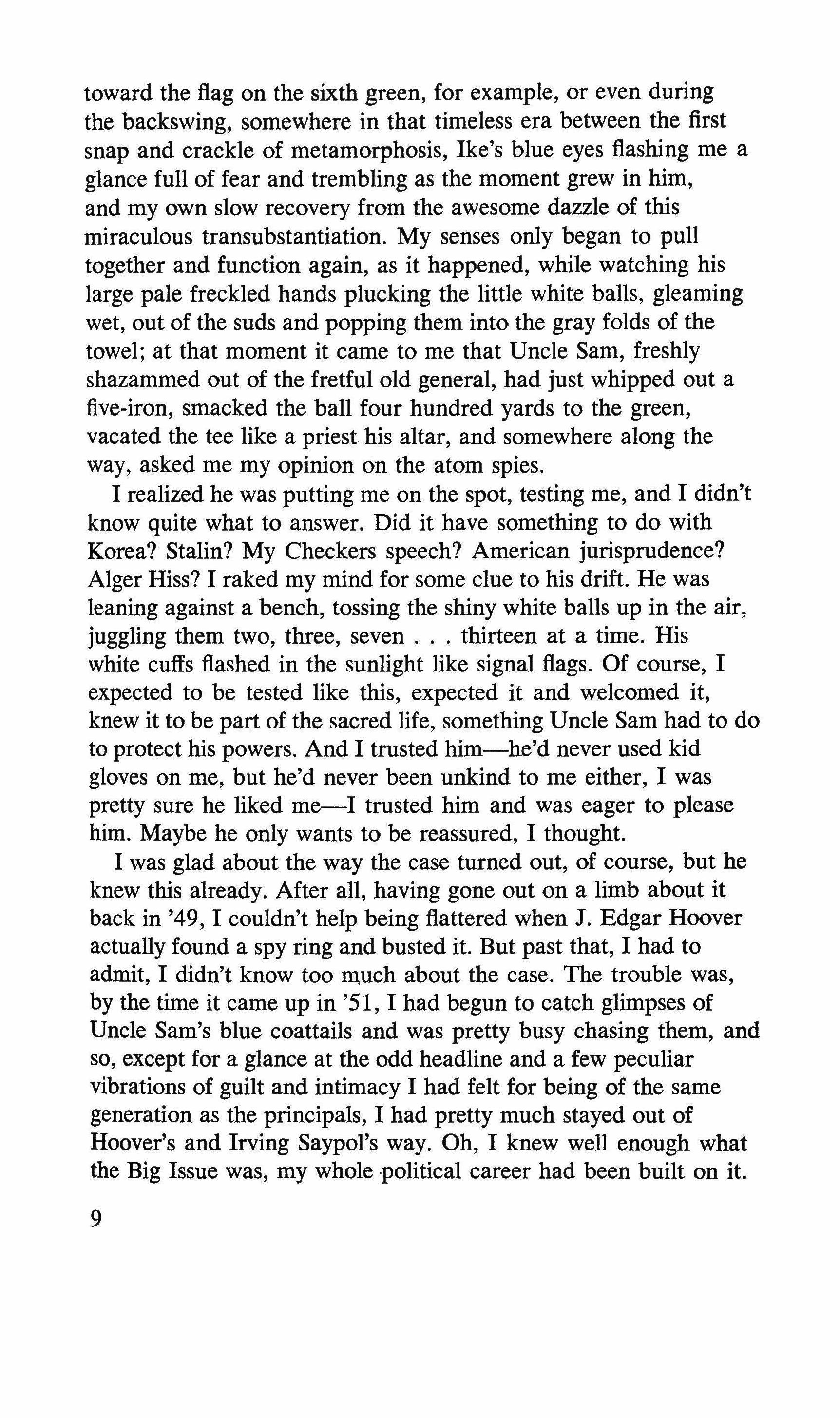
toward the flag on the sixth green, for example, or even during the backswing, somewhere in that timeless era between the first snap and crackle of metamorphosis, Ike's blue eyes flashing me a glance full of fear and trembling as the moment grew in him, and my own slow recovery from the awesome dazzle of this miraculous transubstantiation. My senses only began to pull together and function again, as it happened, while watching his large pale freckled hands plucking the little white balls, gleaming wet, out of the suds and popping them into the gray folds of the towel; at that moment it came to me that Uncle Sam, freshly shazammed out of the fretful old general, had just whipped out a five-iron, smacked the ball four hundred yards to the green, vacated the tee like a priest his altar, and somewhere along the way, asked me my opinion on the atom spies.
I realized he was putting me on the spot, testing me, and I didn't know quite what to answer. Did it have something to do with Korea? Stalin? My Checkers speech? American jurisprudence? Alger Hiss? I raked my mind for some clue to his drift. He was leaning against a bench, tossing the shiny white balls up in the air, juggling them two, three, seven thirteen at a time. His white cuffs flashed in the sunlight like signal flags. Of course, I expected to be tested like this, expected it and welcomed it, knew it to be part of the sacred life, something Uncle Sam had to do to protect his powers. And I trusted him-he'd never used kid gloves on me, but he'd never been unkind to me either, I was pretty sure he liked me-I trusted him and was eager to please him. Maybe he only wants to be reassured, I thought.
I was glad about the way the case turned out, of course, but he knew this already. After all, having gone out on a limb about it back in '49, I couldn't help being flattered when J. Edgar Hoover actually found a spy ring and busted it. But past that, I had to admit, I didn't know too much about the case. The trouble was, by the time it came up in '51, I had begun to catch glimpses of Uncle Sam's blue coattails and was pretty busy chasing them, and so, except for a glance at the odd headline and a few peculiar vibrations of guilt and intimacy I had felt for being of the same generation as the principals, I had pretty much stayed out of Hoover's and Irving Saypol's way. Oh, I knew well enough what the Big Issue was, my whole political career had been built on it.
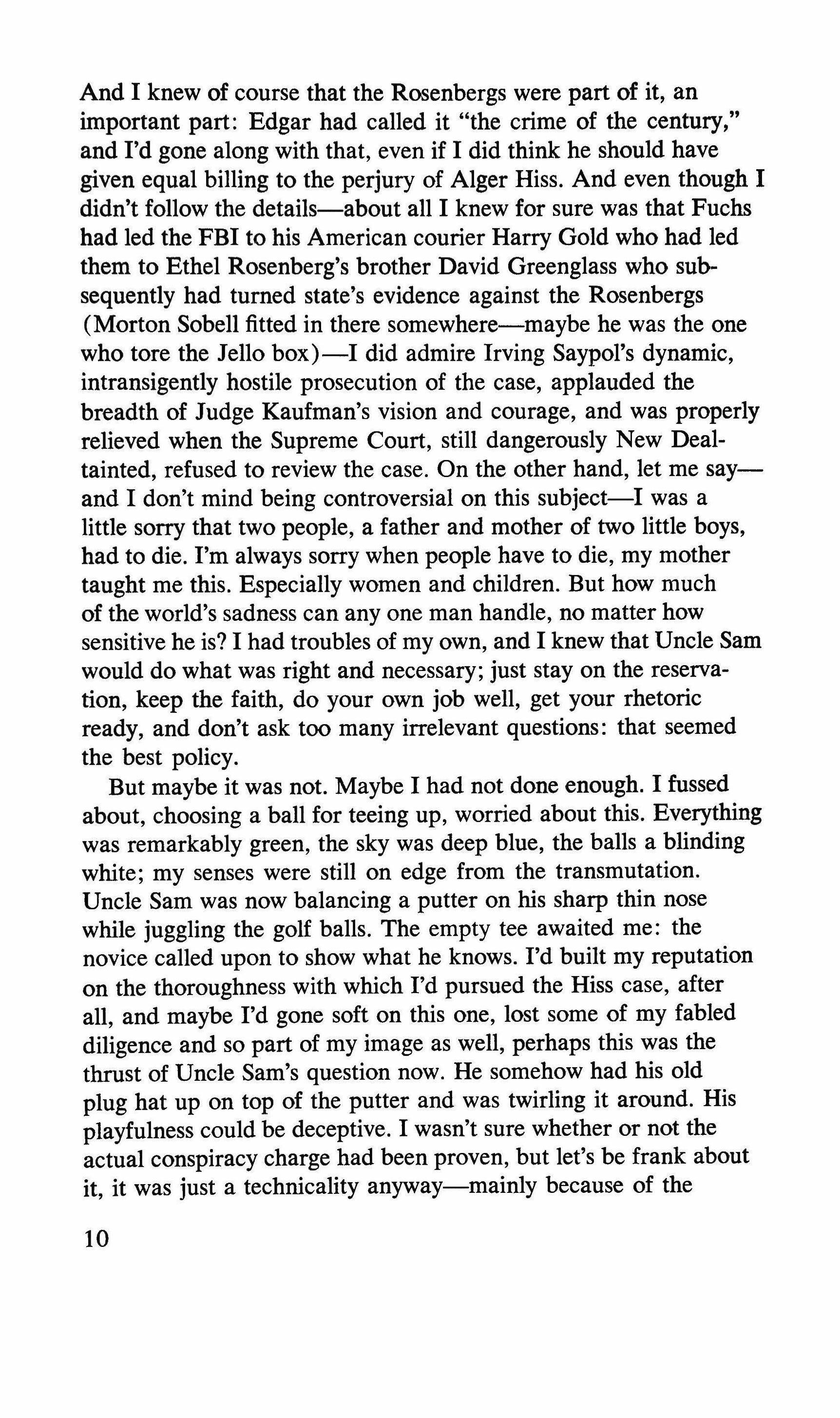
And I knew of course that the Rosenbergs were part of it, an important part: Edgar had called it "the crime of the century," and I'd gone along with that, even if I did think he should have given equal billing to the perjury of Alger Hiss. And even though I didn't follow the details-about all I knew for sure was that Fuchs had led the FBI to his American courier Harry Gold who had led them to Ethel Rosenberg's brother David Greenglass who subsequently had turned state's evidence against the Rosenbergs (Morton Sobell fitted in there somewhere-maybe he was the one who tore the Jello box)-I did admire Irving Saypol's dynamic, intransigently hostile prosecution of the case, applauded the breadth of Judge Kaufman's vision and courage, and was properly relieved when the Supreme Court, still dangerously New Dealtainted, refused to review the case. On the other hand, let me sayand I don't mind being controversial on this subject-I was a little sorry that two people, a father and mother of two little boys, had to die. I'm always sorry when people have to die, my mother taught me this. Especially women and children. But how much of the world's sadness can anyone man handle, no matter how sensitive he is? I had troubles of my own, and I knew that Uncle Sam would do what was right and necessary; just stay on the reservation, keep the faith, do your own job well, get your rhetoric ready, and don't ask too many irrelevant questions: that seemed the best policy.
But maybe it was not. Maybe I had not done enough. I fussed about, choosing a ball for teeing up, worried about this. Everything was remarkably green, the sky was deep blue, the balls a blinding white; my senses were still on edge from the transmutation. Uncle Sam was now balancing a putter on his sharp thin nose while juggling the golf balls. The empty tee awaited me: the novice called upon to show what he knows. I'd built my reputation on the thoroughness with which I'd pursued the Hiss case, after all, and maybe I'd gone soft on this one, lost some of my fabled diligence and so part of my image as well, perhaps this was the thrust of Uncle Sam's question now. He somehow had his old plug hat up on top of the putter and was twirling it around. His playfulness could be deceptive. I wasn't sure whether or not the actual conspiracy charge had been proven, but let's be frank about it, it was just a technicality anyway-mainly because of the

statute of limitation, I supposed, and the fact that in these espionage cases there were rarely two witnesses to anything. They were being tried in fact for treason, never mind what the Constitution might say, which was anyway written a long time ago--and on that charge I. Edgar Hoover's word was as good as a conviction.
"Well," I said finally, poking around bravely in my golf bag, "well, I believe they're, uh, probably guilty."
Uncle Sam blinked in amazement, gathering in the balls with one big hand, catching the putter and hat as they fell with the other. "Guilty!" he roared, his chin whiskers bristling. I realized, glancing away, pretending to study the distant green, that Abraham Lincoln, whom I'd always admired, was probably the most terrifying man of his age. "Well, hell, yes, they're guilty!"
I knew by his reaction I must be miles off the mark, but my answer still made sense to me and I resented what seemed like some kind of entrapment. Instinctively, I counterattacked: "Well, naturally I haven't had ample opportunity to study the transcripts carefully, but I, uh, from what I've seen of them, the case has not been proven-"
"The case!" he snorted incredulously. "Proven! Gawdamighty, you do take the rag off the bush, boy!"
I stared miserably into my golf bag while he railed at me. Not only was I giving all the wrong goddam answers, I was also having trouble with my drives. I do not believe that some men are just naturally cool, courageous, and decisive in handling crisis situations, while others are not. I chose a number-two wood for a change. I knew this was a mistake and put it back. "There there was no hard evidence," I said, pressing on desperately. "And since the Rosenbergs refused to cooperate, all we had left really was the brother's story!" I wasn't sure this was true. I'd read it somewhere. I thought: there is less than a 50 percent chance that what I'm doing will help me. "And to get that, we'd had to make this deal with him and his wife which-"
"So all that courtroom splutteration was a frame-up," he blustered-he was in a ferocious state, "what trial isn't?"
"Wait, that's not what I meant!" I protested. "Irving Saypol's a fine trial lawyer!" I wished I could keep my mouth shut. But I'd always admired Saypol since he prosecuted Hiss for me and got him sent up, and he'd been the one to nail the Communist party 11
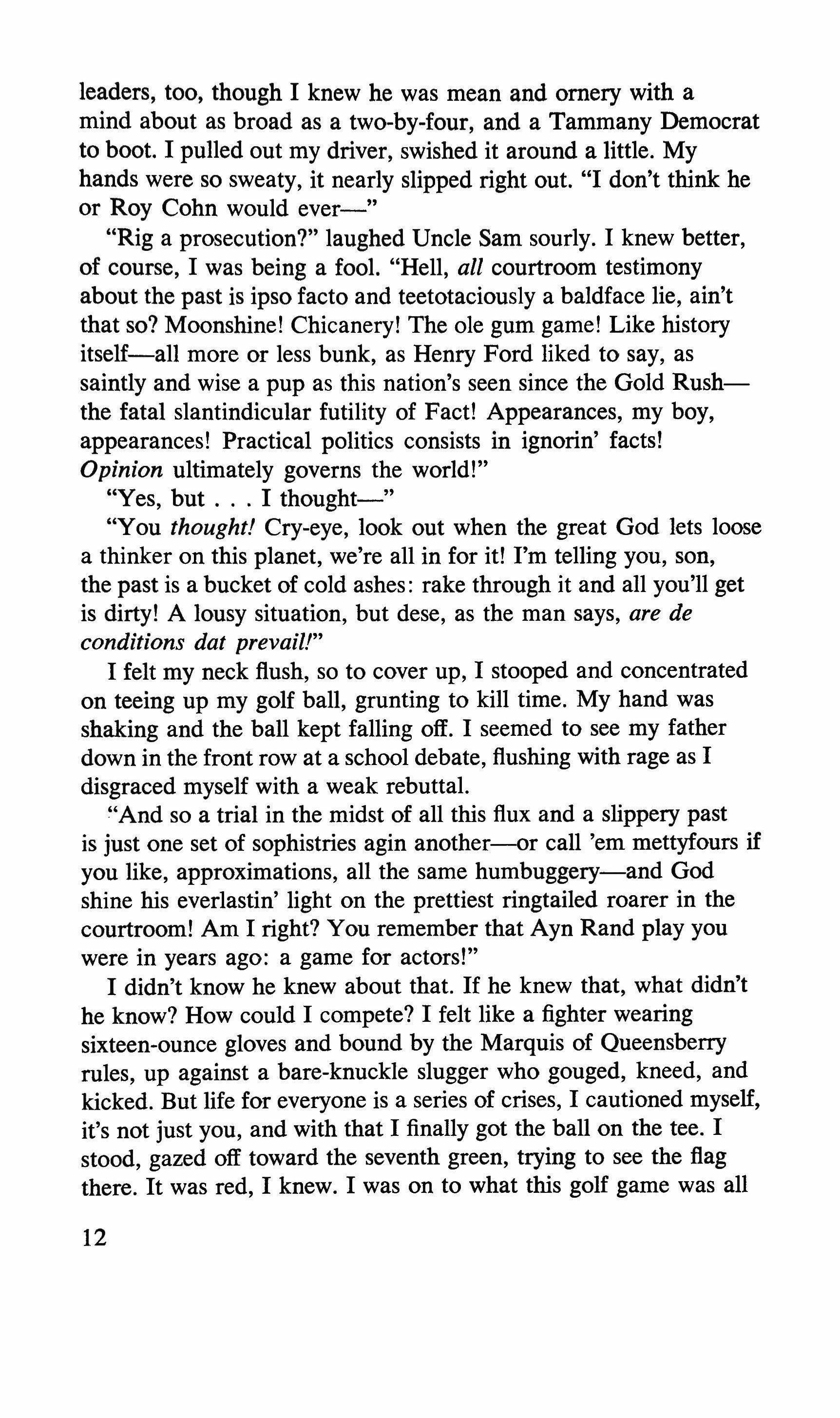
leaders, too, though 1 knew he was mean and ornery with a mind about as broad as a two-by-four, and a Tammany Democrat to boot. 1 pulled out my driver, swished it around a little. My hands were so sweaty, it nearly slipped right out. "I don't think he or Roy Cohn would ever-"
"Rig a prosecution?" laughed Uncle Sam sourly. 1 knew better, of course, 1 was being a fool. "Hell, all courtroom testimony about the past is ipso facto and teetotaciously a baldface lie, ain't that so? Moonshine! Chicanery! The ole gum game! Like history itself-all more or less bunk, as Henry Ford liked to say, as saintly and wise a pup as this nation's seen since the Gold Rushthe fatal slantindicular futility of Fact! Appearances, my boy, appearances! Practical politics consists in ignorin' facts! Opinion ultimately governs the world!"
"Yes, but I thought-"
"You thought! Cry-eye, look out when the great God lets loose a thinker on this planet, we're all in for it! I'm telling you, son, the past is a bucket of cold ashes: rake through it and all you'll get is dirty! A lousy situation, but dese, as the man says, are de conditions dat prevail!"
1 felt my neck flush, so to cover up, I stooped and concentrated on teeing up my golf ball, grunting to kill time. My hand was shaking and the ball kept falling off. I seemed to see my father down in the front row at a school debate, flushing with rage as I disgraced myself with a weak rebuttal.
"And so a trial in the midst of all this flux and a slippery past is just one set of sophistries agin another-or call 'em mettyfours if you like, approximations, all the same humbuggery-and God shine his everlastin' light on the prettiest ringtailed roarer in the courtroom! Am I right? You remember that Ayn Rand play you were in years ago: a game for actors!"
I didn't know he knew about that. If he knew that, what didn't he know? How could I compete? 1 felt like a fighter wearing sixteen-ounce gloves and bound by the Marquis of Queensberry rules, up against a bare-knuckle slugger who gouged, kneed, and kicked. But life for everyone is a series of crises, I cautioned myself, it's not just you, and with that I finally got the ball on the tee. I stood, gazed off toward the seventh green, trying to see the flag there. It was red, I knew. I was on to what this golf game was all 12

about, all right, but I still hadn't figured out what Uncle Sam was up to. Did he mean the Rosenbergs might be innocent? Or their crime insignificant? I addressed the ball. I remembered my opening line from that Ayn Rand play: Gentlemen of the jury-on the sixteenth of January-near midnight-the body of a man came hurtling through space, and crashed-a disfigured mass-at the foot of the Faulkner Building. That was just how I felt. "But you said-I mean, President Eisenhower said, and J. Edgar Hoover, Judge Kaufman, everybody: a crime that has endangered the lives of millions, maybe even the whole planet-!"
"Damn right!-and much of Madness to boot, and more of Sin, and Horror the soul of the plot, but we're not just talkin' about that little piece of technological cattle-rustlin'l Even though that's more than enough to scrag a man all right-like Sweet Andy Carnegie used to say: upon the sacredness of property civilization itself depends-but still, we all know how he got his: no, a little healthy thievin' never hurt anybody. But real guilt, real evillisten, son, get that right hand around there on that club, like you're shakin' hands with it, not jerkin' it off!"
I twisted my hand around on the club: the toe turned in and tapped the ball accidentally, knocking it off the tee again.
"God may forgive sins," Uncle Sam observed grimly, "but awkwardness has not forgiveness in heaven or earth-that'll cost you a stroke." He could be as cold as a New England parson sometimes. "No, guilt, real guilt, is like grace: some people got it, some don't. These people got it. Down deep. They wear it like a coyote wears its lonesomeness or a persimmon its pucker. They are suffused with the stuff, it's in their bones, their very acids, it's no doubt a gift of the promptuary, even their organs are guilty, their feet are guilty, their ears and noses-"
"You mean, because because they're Jews?"
"Jews! What in Sam Hill has that got to do with it?" I'd missed again. I was completely lost. I couldn't even find my goddamn tee. "Irving Kaufman's a Jew, isn't he? Is he guilty? Is Irving Saypol guilty? Roy Cohn? Hell, I got a touch of kike in me myself, son, not much, just enough for a little color and wile and to whet my appetite for delicatessen-shoot, I might even incarnate myself into one of 'em some day
I glanced up. He was as stern as ever, but there was a malicious 13
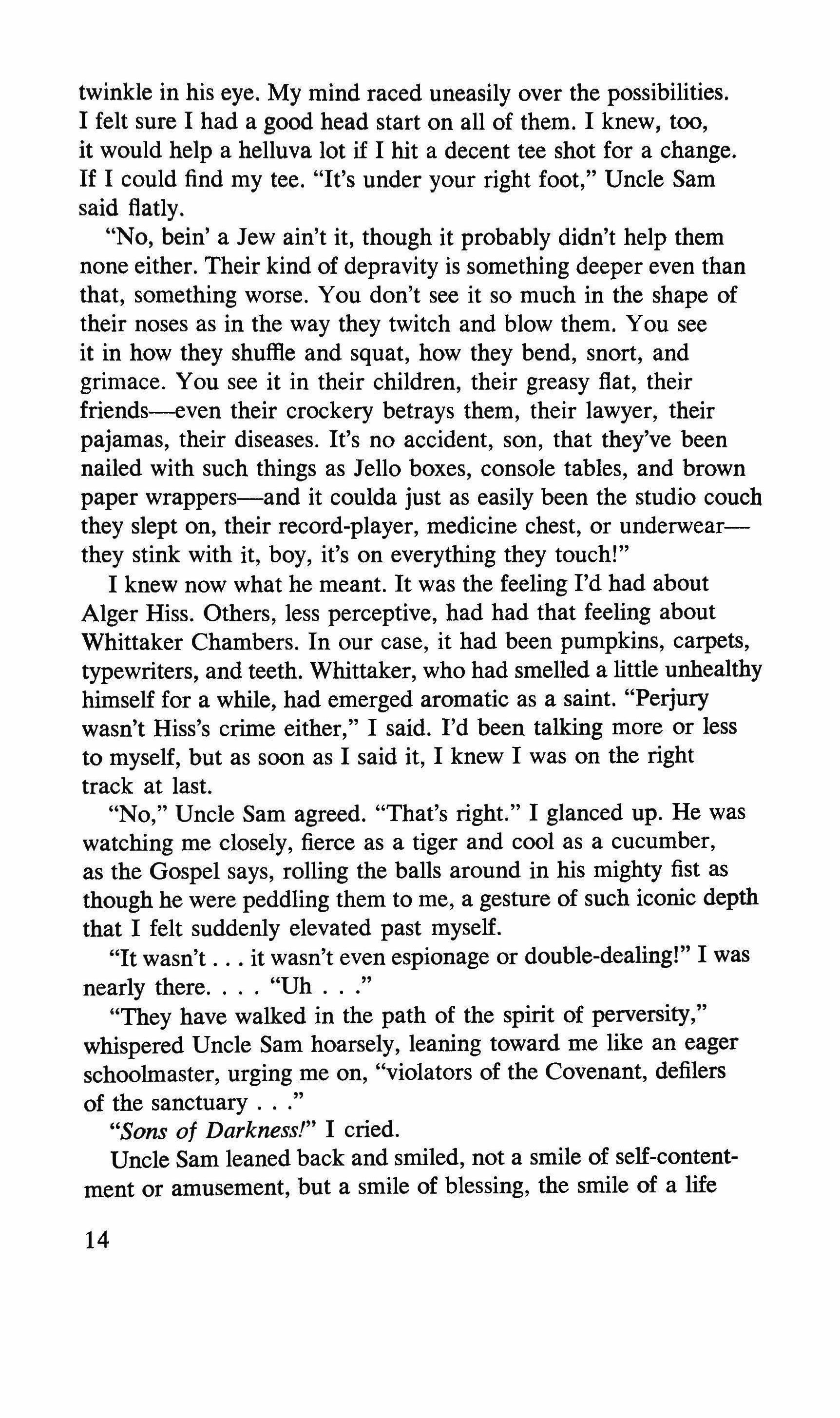
twinkle in his eye. My mind raced uneasily over the possibilities. I felt sure I had a good head start on all of them. I knew, too, it would help a helluva lot if I hit a decent tee shot for a change. If I could find my tee. "It's under your right foot," Uncle Sam said flatly.
"No, bein' a Jew ain't it, though it probably didn't help them none either. Their kind of depravity is something deeper even than that, something worse. You don't see it so much in the shape of their noses as in the way they twitch and blow them. You see it in how they shuffle and squat, how they bend, snort, and grimace. You see it in their children, their greasy flat, their friends--even their crockery betrays them, their lawyer, their pajamas, their diseases. It's no accident, son, that they've been nailed with such things as Jello boxes, console tables, and brown paper wrappers-and it coulda just as easily been the studio couch they slept on, their record-player, medicine chest, or underwearthey stink with it, boy, it's on everything they touch!"
I knew now what he meant. It was the feeling I'd had about Alger Hiss. Others, less perceptive, had had that feeling about Whittaker Chambers. In our case, it had been pumpkins, carpets, typewriters, and teeth. Whittaker, who had smelled a little unhealthy himself for a while, had emerged aromatic as a saint. "Perjury wasn't Hiss's crime either," I said. I'd been talking more or less to myself, but as soon as I said it, I knew I was on the right track at last.
"No," Uncle Sam agreed. "That's right." I glanced up. He was watching me closely, fierce as a tiger and cool as a cucumber, as the Gospel says, rolling the balls around in his mighty fist as though he were peddling them to me, a gesture of such iconic depth that I felt suddenly elevated past myself.
"It wasn't it wasn't even espionage or double-dealing!" I was nearly there. "Uh ."
"They have walked in the path of the spirit of perversity," whispered Uncle Sam hoarsely, leaning toward me like an eager schoolmaster, urging me on, "violators of the Covenant, defilers of the sanctuary ."
"Sons 0/ Darkness!" I cried.
Uncle Sam leaned back and smiled, not a smile of self-contentment or amusement, but a smile of blessing, the smile of a life
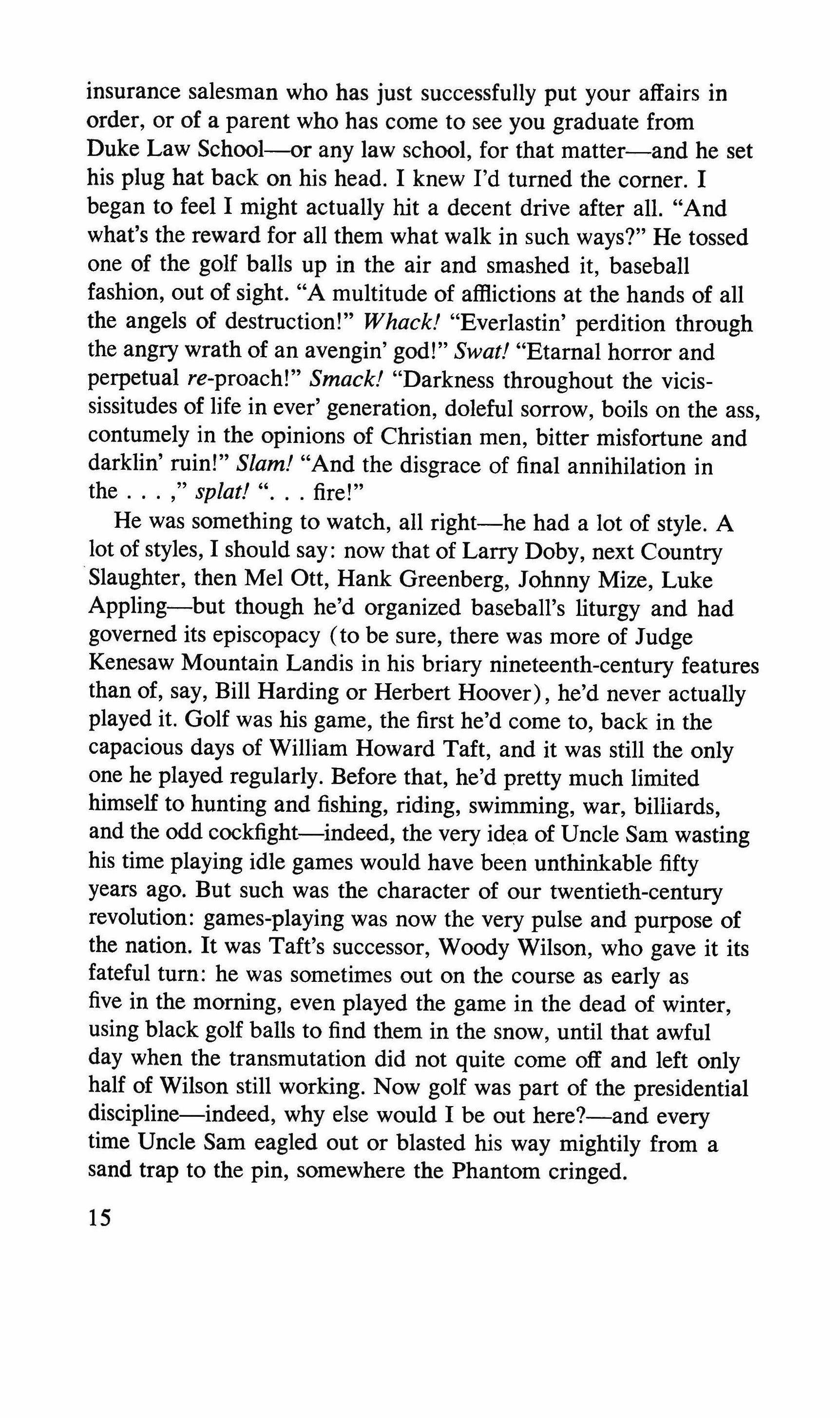
insurance salesman who has just successfully put your affairs in order, or of a parent who has come to see you graduate from Duke Law School-or any law school, for that matter-and he set his plug hat back on his head. I knew I'd turned the corner. I began to feel I might actually hit a decent drive after all. "And what's the reward for all them what walk in such ways?" He tossed one of the golf balls up in the air and smashed it, baseball fashion, out of sight. "A multitude of afflictions at the hands of all the angels of destruction!" Whack! "Everlastin' perdition through the angry wrath of an avengin' god!" Swat! "Etarnal horror and perpetual re-proach!" Smack! "Darkness throughout the vicississitudes of life in ever' generation, doleful sorrow, boils on the ass, contumely in the opinions of Christian men, bitter misfortune and darklin' ruin!" Slam! "And the disgrace of final annihilation in th "l tl fire!" e sp a. reo
He was something to watch, all right-he had a lot of style. A lot of styles, I should say: now that of Larry Doby, next Country Slaughter, then Mel Ott, Hank Greenberg, Johnny Mize, Luke Appling-but though he'd organized baseball's liturgy and had governed its episcopacy (to be sure, there was more of Judge Kenesaw Mountain Landis in his briary nineteenth-century features than of, say, Bill Harding or Herbert Hoover), he'd never actually played it. Golf was his game, the first he'd come to, back in the capacious days of William Howard Taft, and it was still the only one he played regularly. Before that, he'd pretty much limited himself to hunting and fishing, riding, swimming, war, billiards, and the odd cockfight-indeed, the very idea of Uncle Sam wasting his time playing idle games would have been unthinkable fifty years ago. But such was the character of our twentieth-century revolution: games-playing was now the very pulse and purpose of the nation. It was Taft's successor, Woody Wilson, who gave it its fateful turn: he was sometimes out on the course as early as five in the morning, even played the game in the dead of winter, using black golf balls to find them in the snow, until that awful day when the transmutation did not quite come off and left only half of Wilson still working. Now golf was part of the presidential discipline-indeed, why else would I be out here?-and every time Uncle Sam eagled out or blasted his way mightily from a sand trap to the pin, somewhere the Phantom cringed.
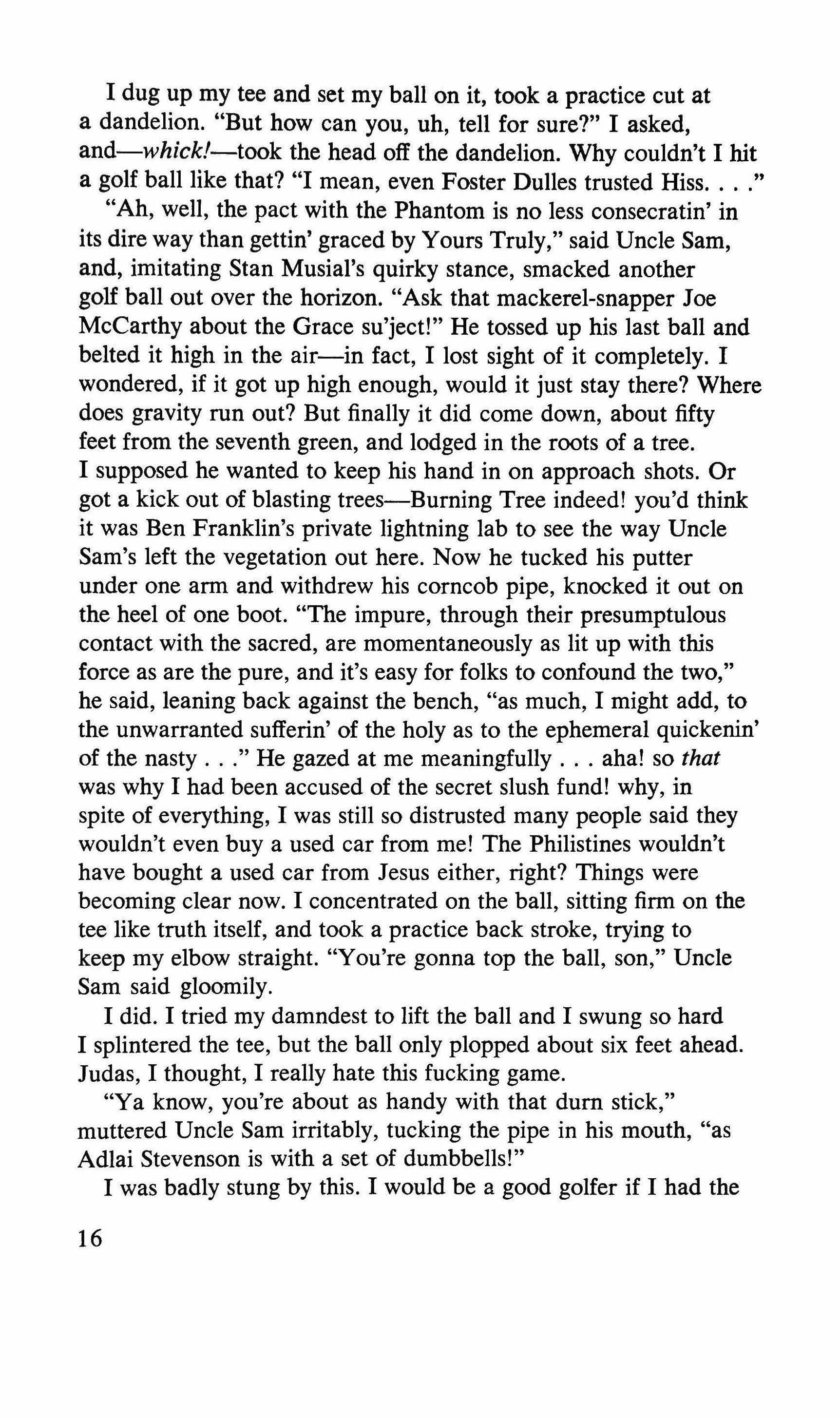
1 dug up my tee and set my ball on it, took a practice cut at a dandelion. "But how can you, uh, tell for sure?" 1 asked, and-whick!-took the head off the dandelion. Why couldn't 1 hit a golf ball like that? "I mean, even Foster Dulles trusted Hiss "Ah, well, the pact with the Phantom is no less consecratin' in its dire way than gettin' graced by Yours Truly," said Uncle Sam, and, imitating Stan Musial's quirky stance, smacked another golf ball out over the horizon. "Ask that mackerel-snapper Joe McCarthy about the Grace su'ject!" He tossed up his last ball and belted it high in the air-in fact, 1 lost sight of it completely. 1 wondered, if it got up high enough, would it just stay there? Where does gravity run out? But finally it did come down, about fifty feet from the seventh green, and lodged in the roots of a tree. 1 supposed he wanted to keep his hand in on approach shots. Or got a kick out of blasting trees-Burning Tree indeed! you'd think it was Ben Franklin's private lightning lab to see the way Uncle Sam's left the vegetation out here. Now he tucked his putter under one arm and withdrew his corncob pipe, knocked it out on the heel of one boot. "The impure, through their presumptulous contact with the sacred, are momentaneously as lit up with this force as are the pure, and it's easy for folks to confound the two," he said, leaning back against the bench, "as much, 1 might add, to the unwarranted sufferin' of the holy as to the ephemeral quickenin' of the nasty He gazed at me meaningfully aha! so that was why 1 had been accused of the secret slush fund! why, in spite of everything, 1 was still so distrusted many people said they wouldn't even buy a used car from me! The Philistines wouldn't have bought a used car from Jesus either, right? Things were becoming clear now. I concentrated on the ball, sitting firm on the tee like truth itself, and took a practice back stroke, trying to keep my elbow straight. "You're gonna top the ball, son," Uncle Sam said gloomily.
I did. I tried my damndest to lift the ball and I swung so hard I splintered the tee, but the ball only plopped about six feet ahead. Judas, I thought, I really hate this fucking game.
"Ya know, you're about as handy with that dum stick," muttered Uncle Sam irritably, tucking the pipe in his mouth, "as Adlai Stevenson is with a set of dumbbells!"
I was badly stung by this. I would be a good golfer if I had the

time to play regularly, but a man can't give himself to everything on this earth. And the innuendos worried me: Stevenson was a loser. I realized it was still touch and go
Uncle Sam sucked on his empty pipe a couple of times, then blew it out, reached into his pantaloon pockets for tobacco. "There's one thing about criminals and kings, priests and pariahs," he said. He packed the tobacco into his pipe with one long bony finger, peering at me as though over spectacles. "They may be as unalike as a eagle to a rattlesnake, but they both got a piece a that dreadful mysterious power that generates the universe!" As he said this, he whipped a long wooden match out from behind his ear. "The difference," he went on, "is what happens when they try to use it. The ones with the real stuff, the good guys, they achieve peace and prosperity with it-these are he scratched the head of the match with his thumbnail and it popped ablaze: the Sons of Light!" He cupped it over the pipe bowl and continued: "The other geezers, the (puff!) Phantom's boys, well, if you (puff! puff!) don't watch out, they can haul off and (puff!) exfluncticate the he looked up and held the match out, still burning, then crushed it in his fist: "whole durn shootin' match!"
It's true, I thought, he's not exaggerating, the Rosenbergs no longer belonged to the ordinary world of men, that was obvious, you could see the sort of energy they now possessed, even though stuffed away in Sing Sing prison, in the rising fervor of world dissent-in France the whole damned government was being shaken. I walked up to my ball, teed it up on a little hump of grass. I felt a little shaky myself. "You mean, we're not executing them just because ?" I poked my toe about, looking for firm footing.
"We ain't goin' up to Times Square just to fulfill the statutorial law, if that's what you mean," Uncle Sam said. He blew a smoke ring, then another and another, each inside the other, ending with a little puff of smoke for the center. "This is to be a consecration, a new charter of the moral and social order of the Western world, the precedint on which the future is to be constructified to ensure peace in our time!" He hacked up a gob and spit into his smoke rings, hitting the bull's eye "We're goin' up there to wash our feet, son!" A miniature mushroom cloud welled up from the center, and the concentric rings flattened out and spread like shock waves.
Ha. I understood his question now. I turned back to my ball, dug 17
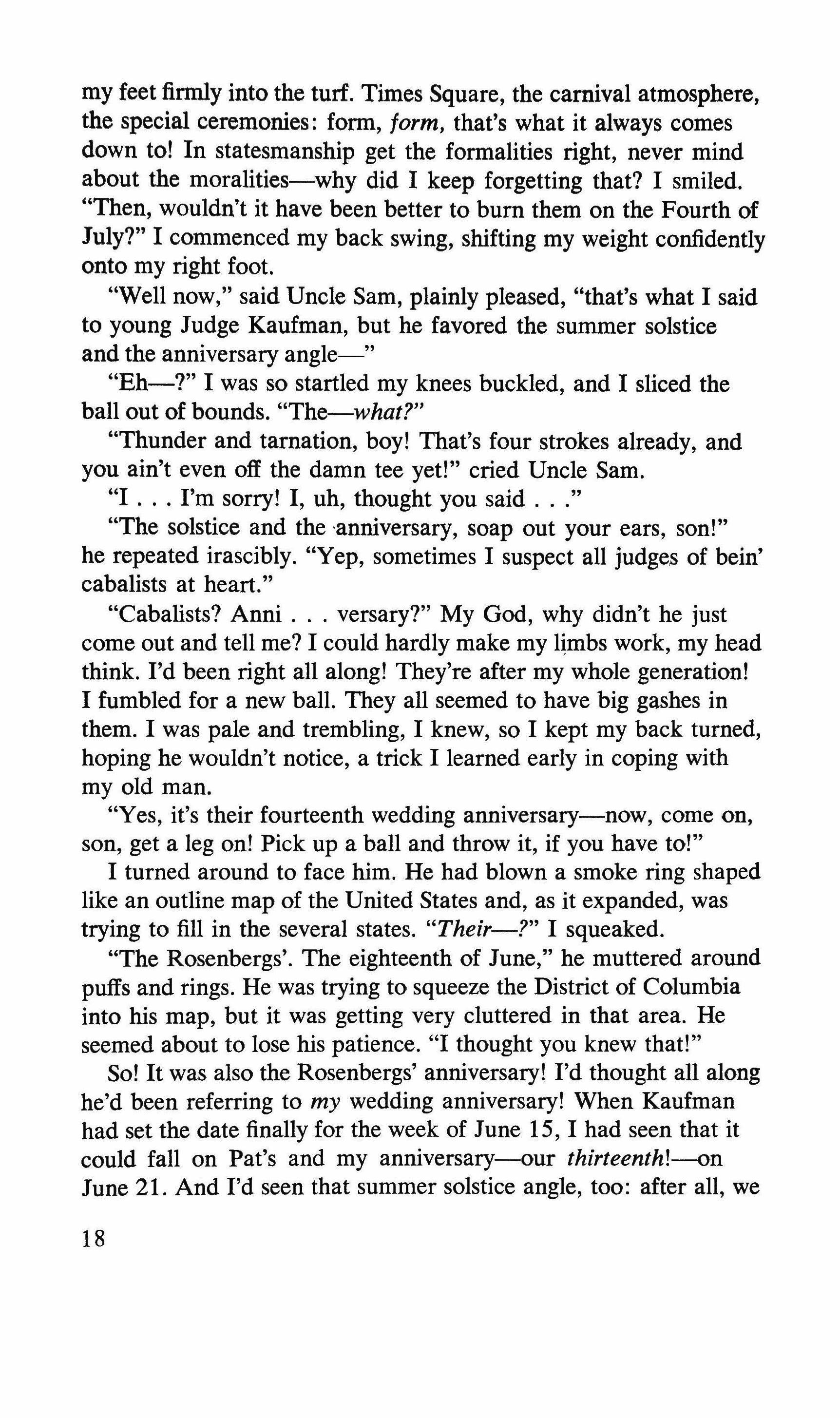
my feet firmly into the turf. Times Square, the carnival atmosphere, the special ceremonies: form, form, that's what it always comes down to! In statesmanship get the formalities right, never mind about the moralities-why did I keep forgetting that? I smiled. "Then, wouldn't it have been better to burn them on the Fourth of July?" I commenced my back swing, shifting my weight confidently onto my right foot.
"Well now," said Uncle Sam, plainly pleased, "that's what I said to young Judge Kaufman, but he favored the summer solstice and the anniversary angle-"
"Eh-?" I was so startled my knees buckled, and I sliced the ball out of bounds. "The-what?"
"Thunder and tarnation, boy! That's four strokes already, and you ain't even off the damn tee yet!" cried Uncle Sam.
"I I'm sorry! I, uh, thought you said "The solstice and the .anniversary, soap out your ears, son!" he repeated irascibly. "Yep, sometimes I suspect all judges of bein' cabalists at heart."
"Cabalists? Anni versary?" My God, why didn't he just come out and tell me? I could hardly make my limbs work, my head think. I'd been right all along! They're after my whole generation! I fumbled for a new ball. They all seemed to have big gashes in them. I was pale and trembling, I knew, so I kept my back turned, hoping he wouldn't notice, a trick I learned early in coping with my old man.
"Yes, it's their fourteenth wedding anniversary-now, come on, son, get a leg on! Pick up a ball and throw it, if you have to!"
I turned around to face him. He had blown a smoke ring shaped like an outline map of the United States and, as it expanded, was trying to fill in the several states. "Their=-?" I squeaked.
"The Rosenbergs'. The eighteenth of June," he muttered around puffs and rings. He was trying to squeeze the District of Columbia into his map, but it was getting very cluttered in that area. He seemed about to lose his patience. "I thought you knew that!"
So! It was also the Rosenbergs' anniversary! I'd thought all along he'd been referring to my wedding anniversary! When Kaufman had set the date finally for the week of June 15,1 had seen that it could fall on Pat's and my anniversary-our thirteenth!--on June 21. And I'd seen that summer solstice angle, too: after all, we
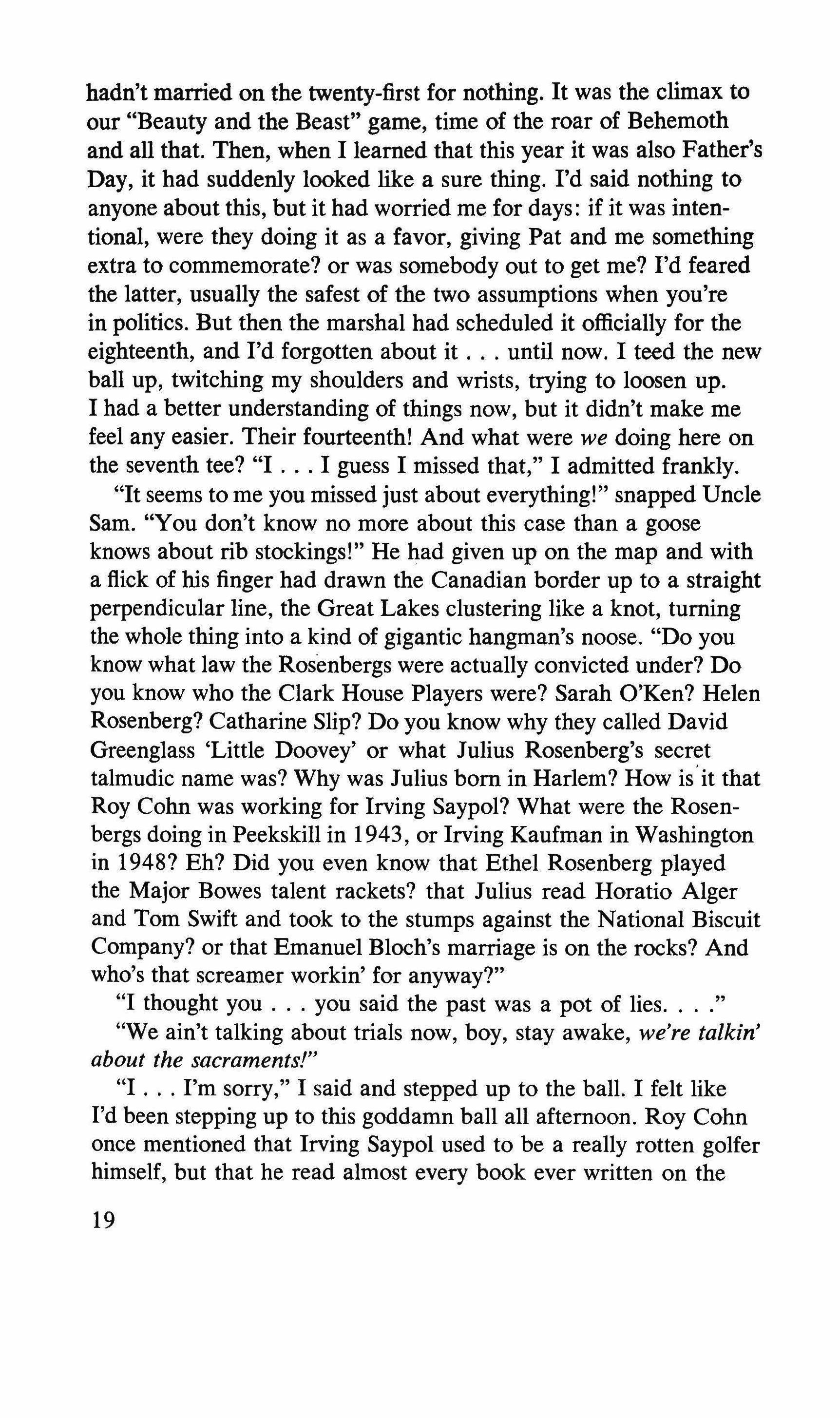
hadn't married on the twenty-first for nothing. It was the climax to our "Beauty and the Beast" game, time of the roar of Behemoth and all that. Then, when I learned that this year it was also Father's Day, it had suddenly looked like a sure thing. I'd said nothing to anyone about this, but it had worried me for days: if it was intentional, were they doing it as a favor, giving Pat and me something extra to commemorate? or was somebody out to get me? I'd feared the latter, usually the safest of the two assumptions when you're in politics. But then the marshal had scheduled it officially for the eighteenth, and I'd forgotten about it until now. I teed the new ball up, twitching my shoulders and wrists, trying to loosen up. I had a better understanding of things now, but it didn't make me feel any easier. Their fourteenth! And what were we doing here on the seventh tee? "I I guess I missed that," I admitted frankly.
"It seems to me you missed just about everything!" snapped Uncle Sam. "You don't know no more about this case than a goose knows about rib stockings!" He had given up on the map and with a flick of his finger had drawn the Canadian border up to a straight perpendicular line, the Great Lakes clustering like a knot, turning the whole thing into a kind of gigantic hangman's noose. "Do you know what law the Rosenbergs were actually convicted under? Do you know who the Clark House Players were? Sarah O'Ken? Helen Rosenberg? Catharine Slip? Do you know why they called David Greenglass 'Little Doovey' or what Julius Rosenberg's secret talmudic name was? Why was Julius born in Harlem? How isit that Roy Cohn was working for Irving Saypol? What were the Rosenbergs doing in Peekskill in 1943, or Irving Kaufman in Washington in 1948? Eh? Did you even know that Ethel Rosenberg played the Major Bowes talent rackets? that Julius read Horatio Alger and Tom Swift and took to the stumps against the National Biscuit Company? or that Emanuel Bloch's marriage is on the rocks? And who's that screamer workin' for anyway?"
"I thought you you said the past was a pot of lies "We ain't talking about trials now, boy, stay awake, we're talkin' about the sacraments!"
"I I'm sorry," I said and stepped up to the ball. I felt like I'd been stepping up to this goddamn ball all afternoon. Roy Cohn once mentioned that Irving Saypol used to be a really rotten golfer himself, but that he read almost every book ever written on the 19
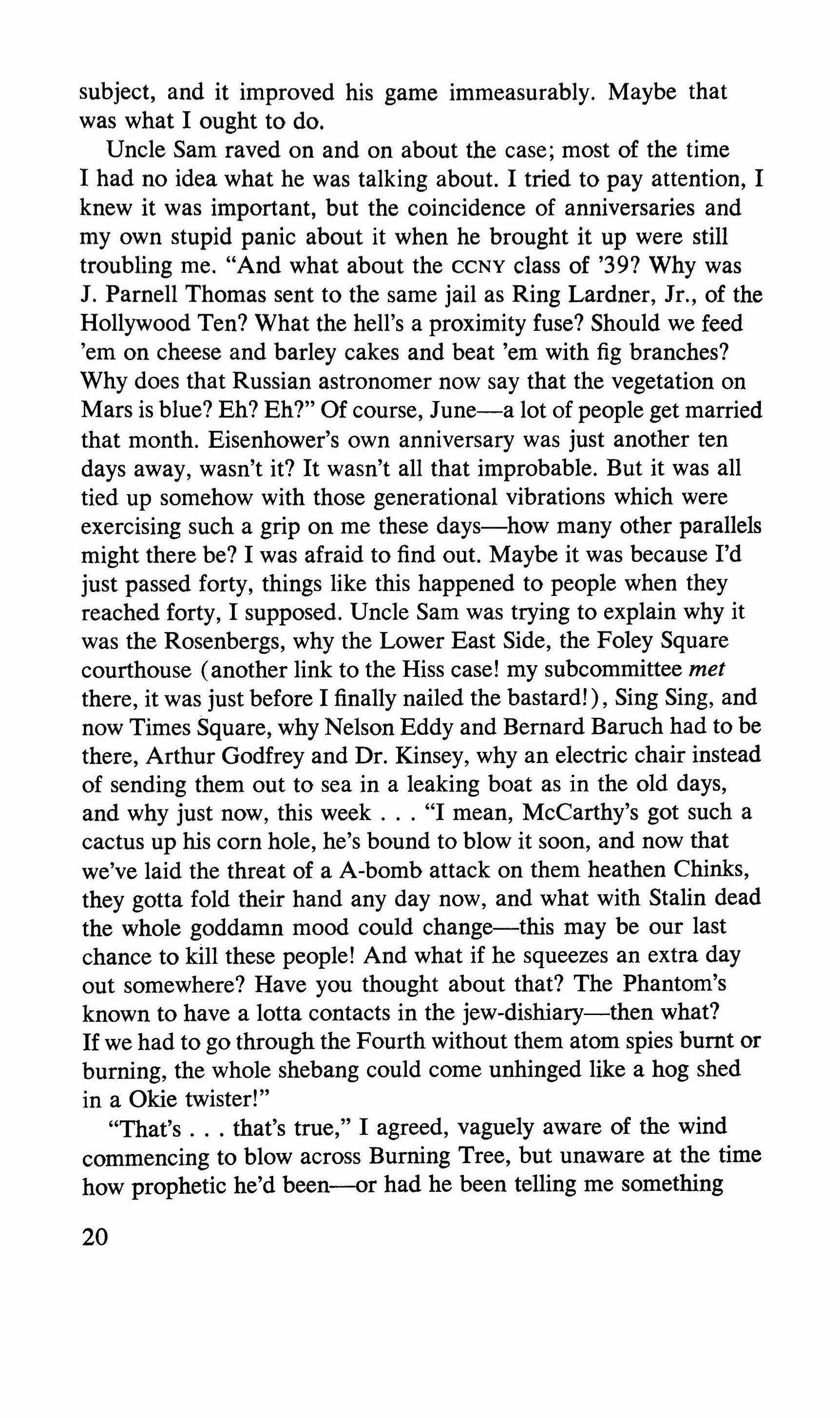
subject, and it improved his game immeasurably. Maybe that was what I ought to do.
Uncle Sam raved on and on about the case; most of the time I had no idea what he was talking about. I tried to pay attention, 1 knew it was important, but the coincidence of anniversaries and my own stupid panic about it when he brought it up were still troubling me. "And what about the CCNY class of '39? Why was J. Parnell Thomas sent to the same jail as Ring Lardner, Jr., of the Hollywood Ten? What the hell's a proximity fuse? Should we feed 'em on cheese and barley cakes and beat 'em with fig branches? Why does that Russian astronomer now say that the vegetation on Mars is blue? Eh? Eh?" Of course, June-a lot of people get married that month. Eisenhower's own anniversary was just another ten days away, wasn't it? It wasn't all that improbable. But it was all tied up somehow with those generational vibrations which were exercising such a grip on me these days-how many other parallels might there be? 1 was afraid to find out. Maybe it was because I'd just passed forty, things like this happened to people when they reached forty, I supposed. Uncle Sam was trying to explain why it was the Rosenbergs, why the Lower East Side, the Foley Square courthouse (another link to the Hiss case! my subcommittee met there, it was just before I finally nailed the bastard!), Sing Sing, and now Times Square, why Nelson Eddy and Bernard Baruch had to be there, Arthur Godfrey and Dr. Kinsey, why an electric chair instead of sending them out to sea in a leaking boat as in the old days, and why just now, this week "I mean, McCarthy's got such a cactus up his corn hole, he's bound to blow it soon, and now that we've laid the threat of a A-bomb attack on them heathen Chinks, they gotta fold their hand any day now, and what with Stalin dead the whole goddamn mood could change-this may be our last chance to kill these people! And what if he squeezes an extra day out somewhere? Have you thought about that? The Phantom's known to have a lotta contacts in the jew-dishiary-then what? If we had to go through the Fourth without them atom spies burnt or burning, the whole shebang could come unhinged like a hog shed in a Okie twister!"
"That's that's true," I agreed, vaguely aware of the wind commencing to blow across Burning Tree, but unaware at the time how prophetic he'd been-or had he been telling me something
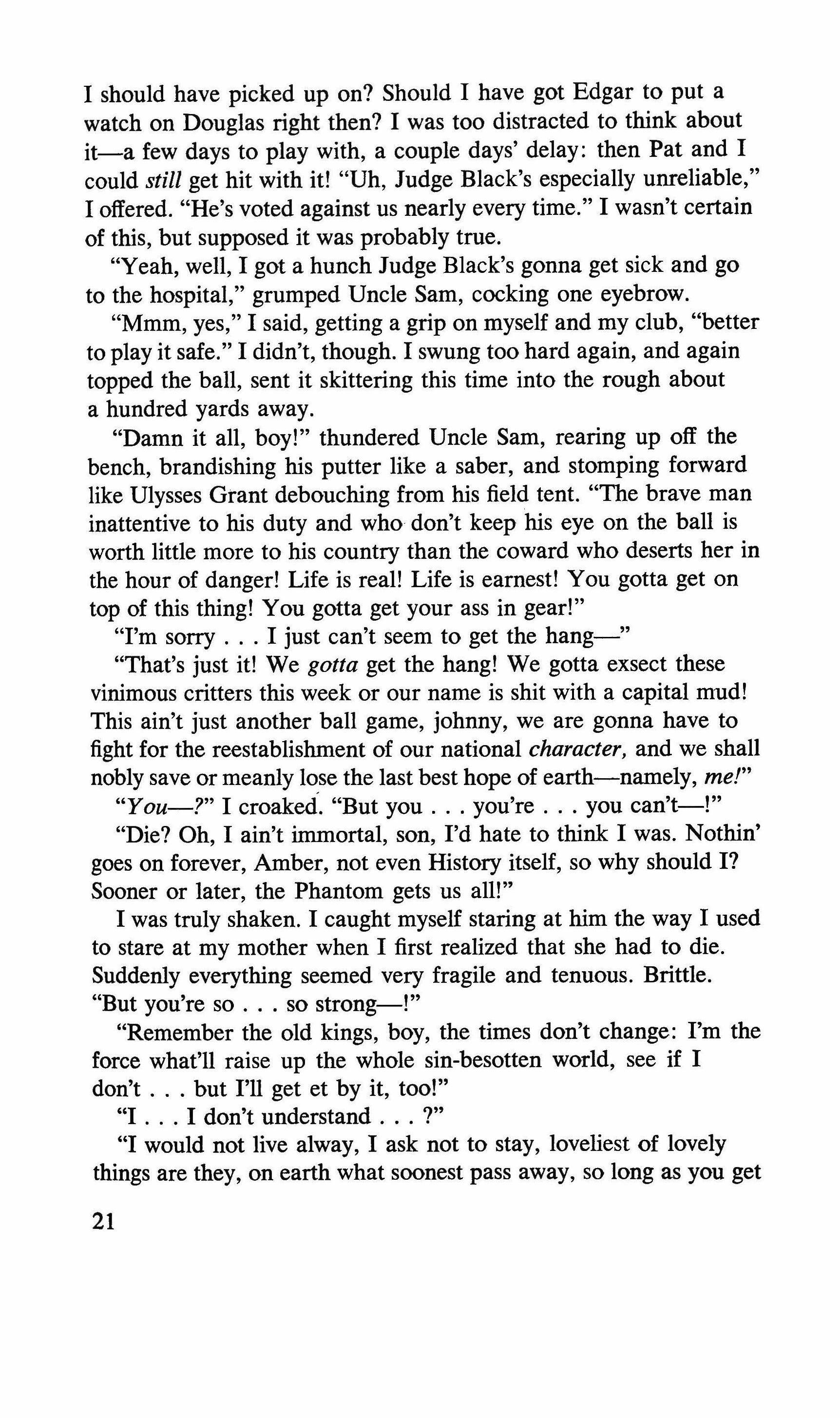
1 should have picked up on? Should 1 have got Edgar to put a watch on Douglas right then? 1 was too distracted to think about it-a few days to play with, a couple days' delay: then Pat and 1 could still get hit with it! "Uh, Judge Black's especially unreliable," 1 offered. "He's voted against us nearly every time." 1 wasn't certain of this, but supposed it was probably true.
"Yeah, well, I got a hunch Judge Black's gonna get sick and go to the hospital," grumped Uncle Sam, cocking one eyebrow.
"Mmm, yes," I said, getting a grip on myself and my club, "better to play it safe." 1 didn't, though. 1 swung too hard again, and again topped the ball, sent it skittering this time into the rough about a hundred yards away.
"Damn it all, boy!" thundered Uncle Sam, rearing up off the bench, brandishing his putter like a saber, and stomping forward like Ulysses Grant debouching from his field tent. "The brave man inattentive to his duty and who don't keep his eye on the ball is worth little more to his country than the coward who deserts her in the hour of danger! Life is real! Life is earnest! You gotta get on top of this thing! You gotta get your ass in gear!"
"I'm sorry 1 just can't seem to get the hang-"
"That's just it! We gotta get the hang! We gotta exsect these vinimous critters this week or our name is shit with a capital mud! This ain't just another ball game, johnny, we are gonna have to fight for the reestablishment of our national character, and we shall nobly save or meanly lose the last best hope of earth-namely, me!"
"You-?" I croaked. "But you you're you can't-!"
"Die? Oh, 1 ain't immortal, son, I'd hate to think 1 was. Nothin' goes on forever, Amber, not even History itself, so why should I? Sooner or later, the Phantom gets us all!"
1 was truly shaken. 1 caught myself staring at him the way 1 used to stare at my mother when I first realized that she had to die. Suddenly everything seemed very fragile and tenuous. Brittle. "But you're so so strong-!"
"Remember the old kings, boy, the times don't change: I'm the force what'll raise up the whole sin-besotten world, see if I don't but I'll get et by it, too!"
"I I don't understand ?"
"I would not live alway, I ask not to stay, loveliest of lovely things are they, on earth what soonest pass away, so long as you get
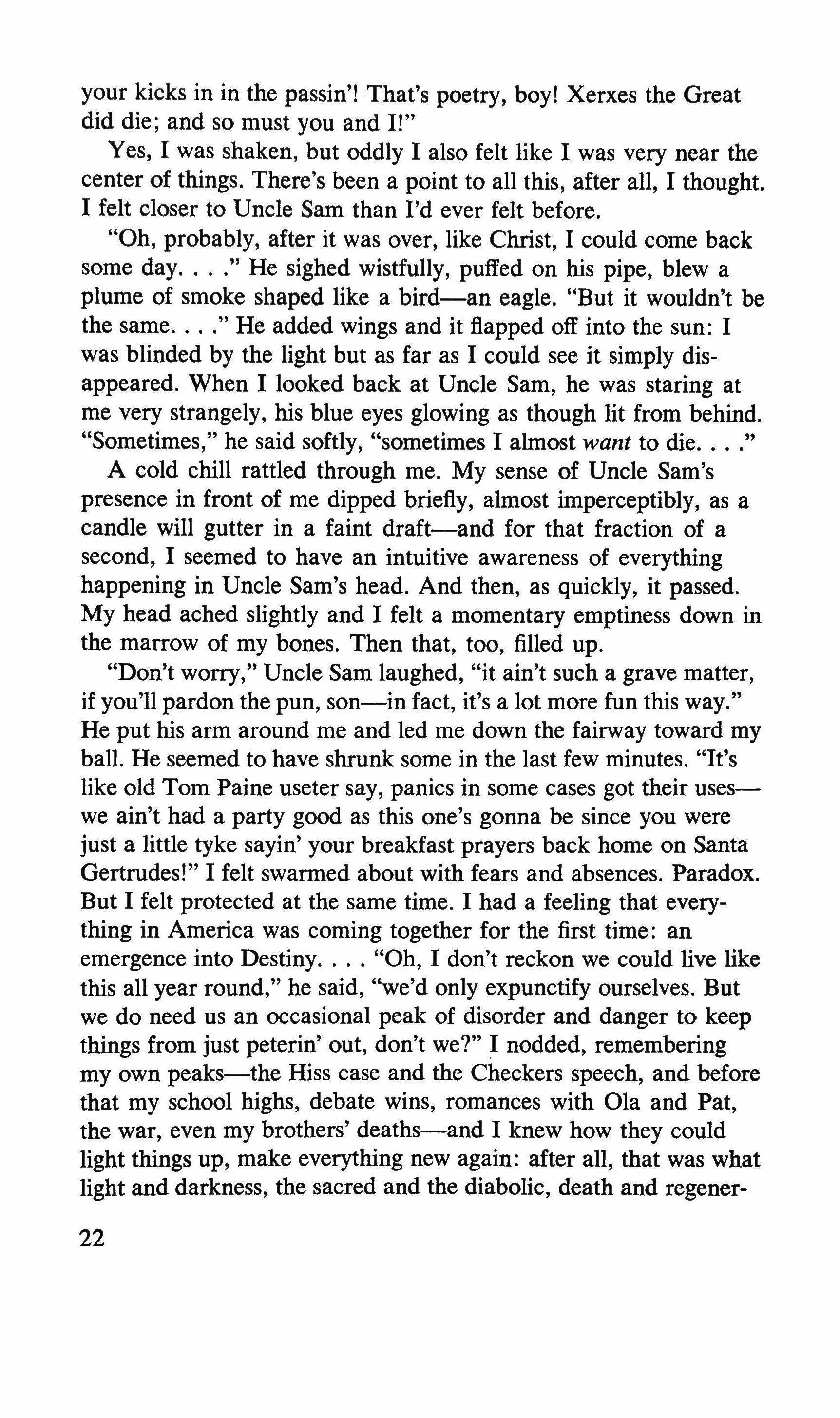
your kicks in in the passin'! That's poetry, boy! Xerxes the Great did die; and so must you and I!"
Yes, I was shaken, but oddly I also felt like I was very near the center of things. There's been a point to all this, after all, I thought. I felt closer to Uncle Sam than I'd ever felt before.
"Oh, probably, after it was over, like Christ, I could come back some day He sighed wistfully, puffed on his pipe, blew a plume of smoke shaped like a bird-an eagle. "But it wouldn't be the same He added wings and it flapped off into the sun: I was blinded by the light but as far as I could see it simply disappeared. When I looked back at Uncle Sam, he was staring at me very strangely, his blue eyes glowing as though lit from behind. "Sometimes," he said softly, "sometimes I almost want to die
A cold chill rattled through me. My sense of Uncle Sam's presence in front of me dipped briefly, almost imperceptibly, as a candle will gutter in a faint draft-and for that fraction of a second, I seemed to have an intuitive awareness of everything happening in Uncle Sam's head. And then, as quickly, it passed. My head ached slightly and I felt a momentary emptiness down in the marrow of my bones. Then that, too, filled up.
"Don't worry," Uncle Sam laughed, "it ain't such a grave matter, if you'll pardon the pun, son-in fact, it's a lot more fun this way." He put his arm around me and led me down the fairway toward my ball. He seemed to have shrunk some in the last few minutes. "It's like old Tom Paine useter say, panics in some cases got their useswe ain't had a party good as this one's gonna be since you were just a little tyke sayin' your breakfast prayers back home on Santa Gertrudes!" I felt swarmed about with fears and absences. Paradox. But I felt protected at the same time. I had a feeling that everything in America was coming together for the first time: an emergence into Destiny "Oh, I don't reckon we could live like this all year round," he said, "we'd only expunctify ourselves. But we do need us an occasional peak of disorder and danger to keep things from just peterin' out, don't we?" I nodded, remembering my own peaks-the Hiss case and the Checkers speech, and before that my school highs, debate wins, romances with Ola and Pat, the war, even my brothers' deaths-and I knew how they could light things up, make everything new again: after all, that was what light and darkness, the sacred and the diabolic, death and regener-

ation were all about! "Well, then," said Uncle Sam, pocketing his corncob pipe and clapping me on the shoulder, "let us, then, be up and doin', with a heart for any fate; still achievin', still pursuin', and though hard be the task, keep a stiff upper lip!"
"Oh, yes!" I said, flushing with pride and joy and eager to begin, for he'd just singled me out among all men: that echo from the past was a piece of Longfellow's "Psalm of Life," which Grandma Milhous penned by hand under a photo of Abe Lincoln she gave me on my thirteenth-thirteenth!-birthday-I kept it on the wall above my bed all through high school and college! Learn to labor and to wait! "I will!"
"Good boy!" he said. "I press thee to my heart as Duty's faithful childering! Be prepared for anything, for this is one a them hard contests where men must win at the hazard of their lives and at the risk of all they hold, dear! But be brave, and whatever happens, just remember the words a that other Poor Richard long ago: 'Fools make feasts, my boy and wise men eat 'em!' So whet up that appetite!" He hugged me, then gave me his club to swing with, saying: "Now, listen here, a golf ball is propelled forward by the verlocity imparted to it by a club head, see-this is physics, now, my boy-and it's kept aloft by under-rotation or backspin, which producifies a cushion of air, and this is what gives the ball lift. To get this backspin, the club head's gotta travel downward, right swat whippety-snap through the center of the ball, and this is where you been goin' wrong. You think you gotta lift the ball up, and this is makin' you pull your swing
"Ah "
"Actually the uplift is projectorated by the spin, and the spin is got by hittin' down and through, you got it? Now, another problem is movin' your maximum verlocity back to six inches ."
Down and through, got it. I took a practice swing, keeping my shoulder down, my eye on the ball-then, because when I looked up I realized that people were staring at me (got to watch it, can't let my guard down like that), swung on up into a friendly wave at a carload of senators disembarking from the subway car. "See ya, Dick!" "Don't miss the show!" "Not for the world!" "Take it easy!" Down and through. And out and up, back to the office, get rid of this goddamn thing. With maximum verlocity.

The young woman is sitting in the lotus position on a dull-blond hardwood floor, her back parallel to the long side of an unmade double bed. A border of red rug with beige fringes protrudes under her naked cold-white kneecaps. & behind the semicircle of flattened buttocks, clad in bluejean shorts, with unraveled edges around the flattened upper thighs.
The woman's spine is rigidly erect slightly concave under a transparent white Indian cotton top. The thin neck is stretched to the utmost, tilted slightly backward, pushing out the clavicles. The cleft chin is raised. As are the eyes, which are focused on the pale yellow flame of a white candle in a patinaed eighteenthcentury candlestick. The patina has a bluish shimmer.
Cathryn had lit the candle to time her meditation, rather than the stick of incense other disciples used. The smell of burning incense made her cough as soon as she started to breathe in deeply She was choking on the smell of saintliness, her friend JeanLouis had said. With the wide-grinning mouth he used for teasing her. Which usually preceded making love to her. She 24
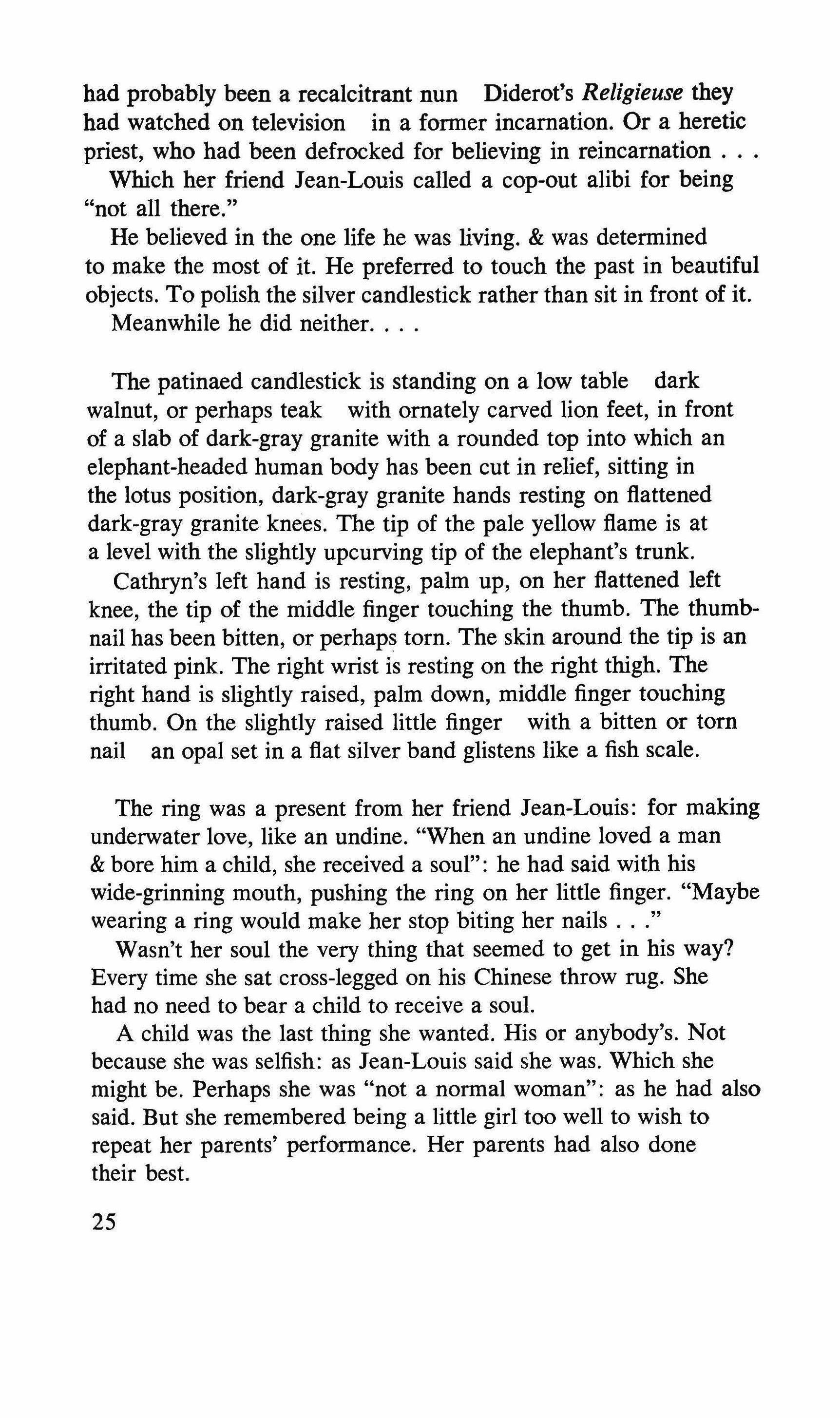
had probably been a recalcitrant nun Diderot's Religieuse they had watched on television in a former incarnation. Or a heretic priest, who had been defrocked for believing in reincarnation
Which her friend lean-Louis called a cop-out alibi for being "not all there."
He believed in the one life he was living. & was determined to make the most of it. He preferred to touch the past in beautiful objects. To polish the silver candlestick rather than sit in front of it. Meanwhile he did neither
The patinaed candlestick is standing on a low table dark walnut, or perhaps teak with ornately carved lion feet, in front of a slab of dark-gray granite with a rounded top into which an elephant-headed human body has been cut in relief, sitting in the lotus position, dark-gray granite hands resting on flattened dark-gray granite knees. The tip of the pale yellow flame is at a level with the slightly upcurving tip of the elephant'S trunk.
Cathryn's left hand is resting, palm up, on her flattened left knee, the tip of the middle finger touching the thumb. The thumbnail has been bitten, or perhaps torn. The skin around the tip is an irritated pink. The right wrist is resting on the right thigh. The right hand is slightly raised, palm down, middle finger touching thumb. On the slightly raised little finger with a bitten or tom nail an opal set in a flat silver band glistens like a fish scale.
The ring was a present from her friend lean-Louis: for making underwater love, like an undine. "When an undine loved a man & bore him a child, she received a soul": he had said with his wide-grinning mouth, pushing the ring on her little finger. "Maybe wearing a ring would make her stop biting her nails
Wasn't her soul the very thing that seemed to get in his way? Every time she sat cross-legged on his Chinese throw rug. She had no need to bear a child to receive a soul.
A child was the last thing she wanted. His or anybody's. Not because she was selfish: as lean-Louis said she was. Which she might be. Perhaps she was "not a normal woman": as he had also said. But she remembered being a little girl too well to wish to repeat her parents' performance. Her parents had also done their best.
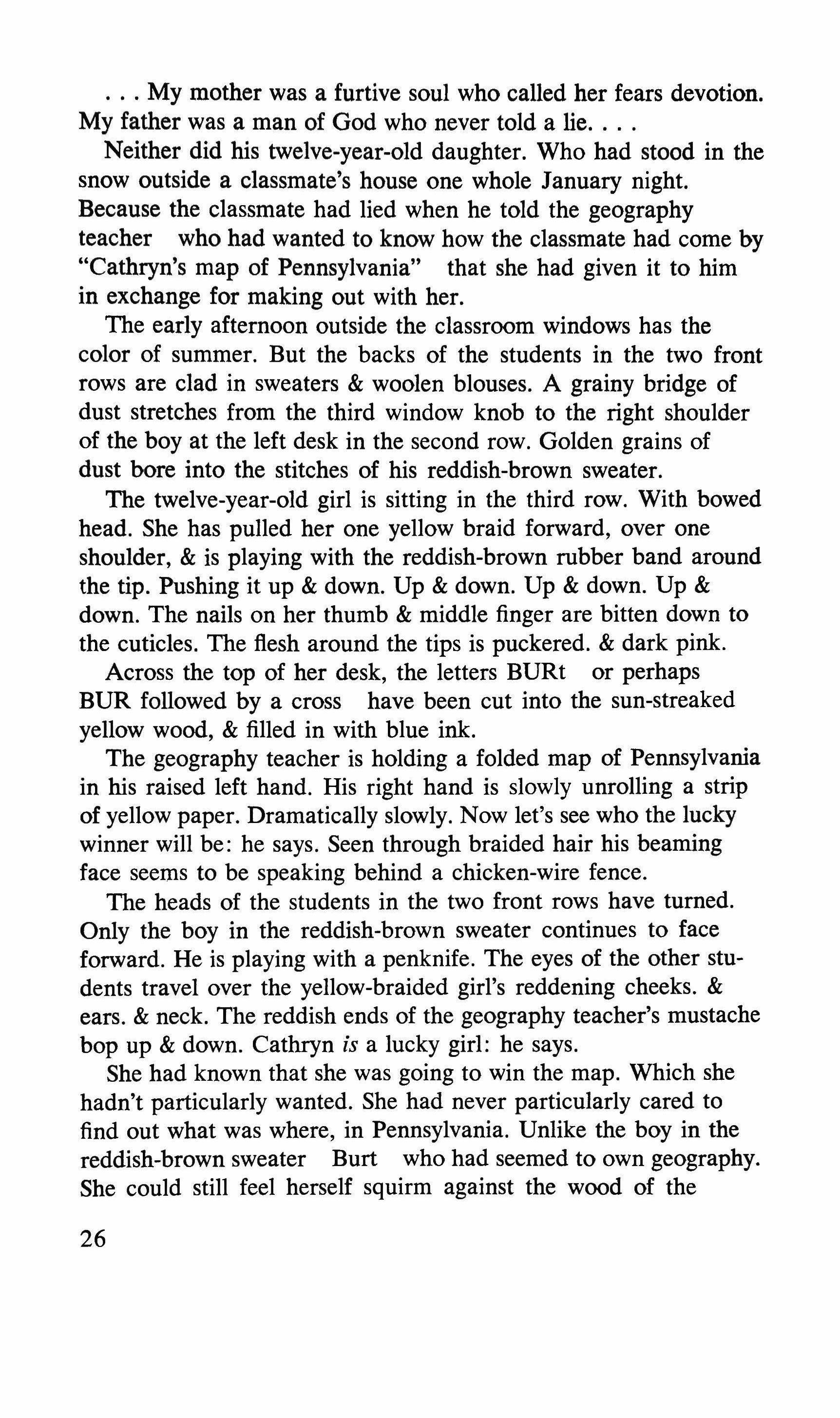
My mother was a furtive soul who called her fears devotion. My father was a man of God who never told a lie Neither did his twelve-year-old daughter. Who had stood in the snow outside a classmate's house one whole January night. Because the classmate had lied when he told the geography teacher who had wanted to know how the classmate had come by "Cathryn's map of Pennsylvania" that she had given it to him in exchange for making out with her.
The early afternoon outside the classroom windows has the color of summer. But the backs of the students in the two front rows are clad in sweaters & woolen blouses. A grainy bridge of dust stretches from the third window knob to the right shoulder of the boy at the left desk in the second row. Golden grains of dust bore into the stitches of his reddish-brown sweater.
The twelve-year-old girl is sitting in the third row. With bowed head. She has pulled her one yellow braid forward, over one shoulder, & is playing with the reddish-brown rubber band around the tip. Pushing it up & down. Up & down. Up & down. Up & down. The nails on her thumb & middle finger are bitten down to the cuticles. The flesh around the tips is puckered. & dark pink.
Across the top of her desk, the letters BURt or perhaps BUR followed by a cross have been cut into the sun-streaked yellow wood, & filled in with blue ink.
The geography teacher is holding a folded map of Pennsylvania in his raised left hand. His right hand is slowly unrolling a strip of yellow paper. Dramatically slowly. Now let's see who the lucky winner will be: he says. Seen through braided hair his beaming face seems to be speaking behind a chicken-wire fence.
The heads of the students in the two front rows have turned. Only the boy in the reddish-brown sweater continues to face forward. He is playing with a penknife. The eyes of the other students travel over the yellow-braided girl's reddening cheeks. & ears. & neck. The reddish ends of the geography teacher's mustache bop up & down. Cathryn is a lucky girl: he says.
She had known that she was going to win the map. Which she hadn't particularly wanted. She had never particularly cared to find out what was where, in Pennsylvania. Unlike the boy in the reddish-brown sweater Burt who had seemed to own geography. She could still feel herself squirm against the wood of the
desk, anticipating the sound of her name. Almost praying that her intuition would be wrong.
She wished her intuitions were as accurate about things that mattered. That she be given a sign which other disciples said they had been given, during meditation to confirm that she was finally on the right path
From Blimpies to the guru: Jean-Louis had teased her. Jean-Louis had not been an adolescent stray. With a detour to Bellevue. Don't pull so hard on your psyche: her teacher had said: Let it flow She was straining toward enlightenment like the leaves of indoor plants toward the windowpane
An alarm clock is ticking on the reddish marble top of a roundbellied chest dark walnut or perhaps teak that is standing on ornately carved lion feet between two tall windows behind Cathryn's motionless back.
Two small dogs Pekinese are sleeping side by side on a reddish blanket in the middle of the unmade double bed. Their beige bodies are flattened in symmetric opposition: one squashed black nose facing the chest between the windows, the other the back of Cathryn's raised motionless head.
Cathryn's hair is the same pale yellow as the flame of the candle in front of the elephant's face.
The elephant's head is crowned with a necklace of thick white & yellow beads. The short stem of a dried rosebud has been threaded through the hole of the white center bead. The rosebud is the browned red of dried blood. A small red star like those used by art galleries to indicate that a painting has been sold glistens between the elephant's eyes, on the bridge of the trunk. In the place assigned to the third eye. Where Hindu wives wear their marriage spot. In the nook of the right dark-gray granite elbow leans a small silver cross. In the dark-gray granite lap lies a double almond, still in its blond shell shaped like a swollen heart.
The yellow-braided twelve-year-old is leaning against one half of the open school door, holding the folded map of Pennsylvania in her right hand. All five nails are bitten down to the cuticles. All five fingertips are a puckered pink.
27
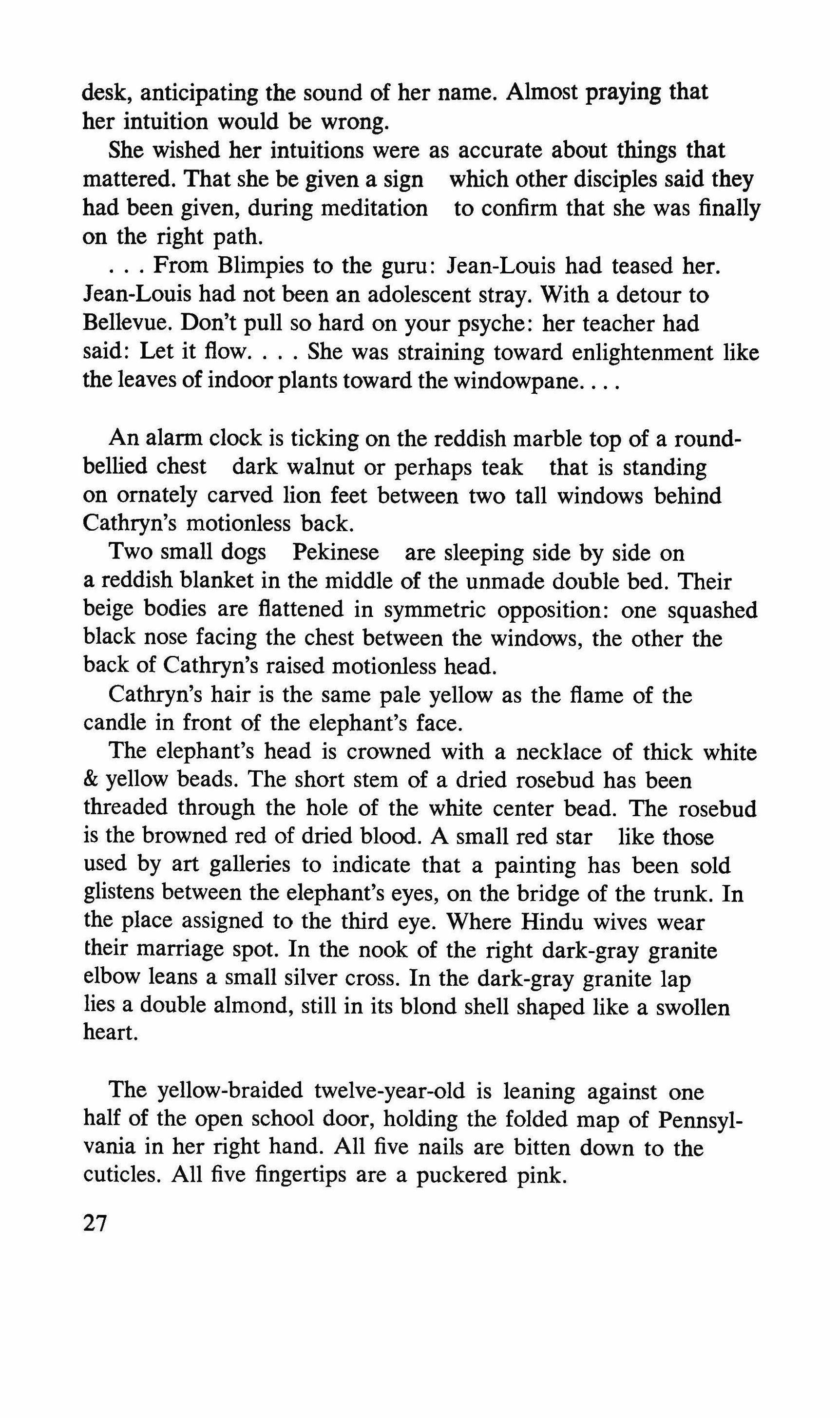
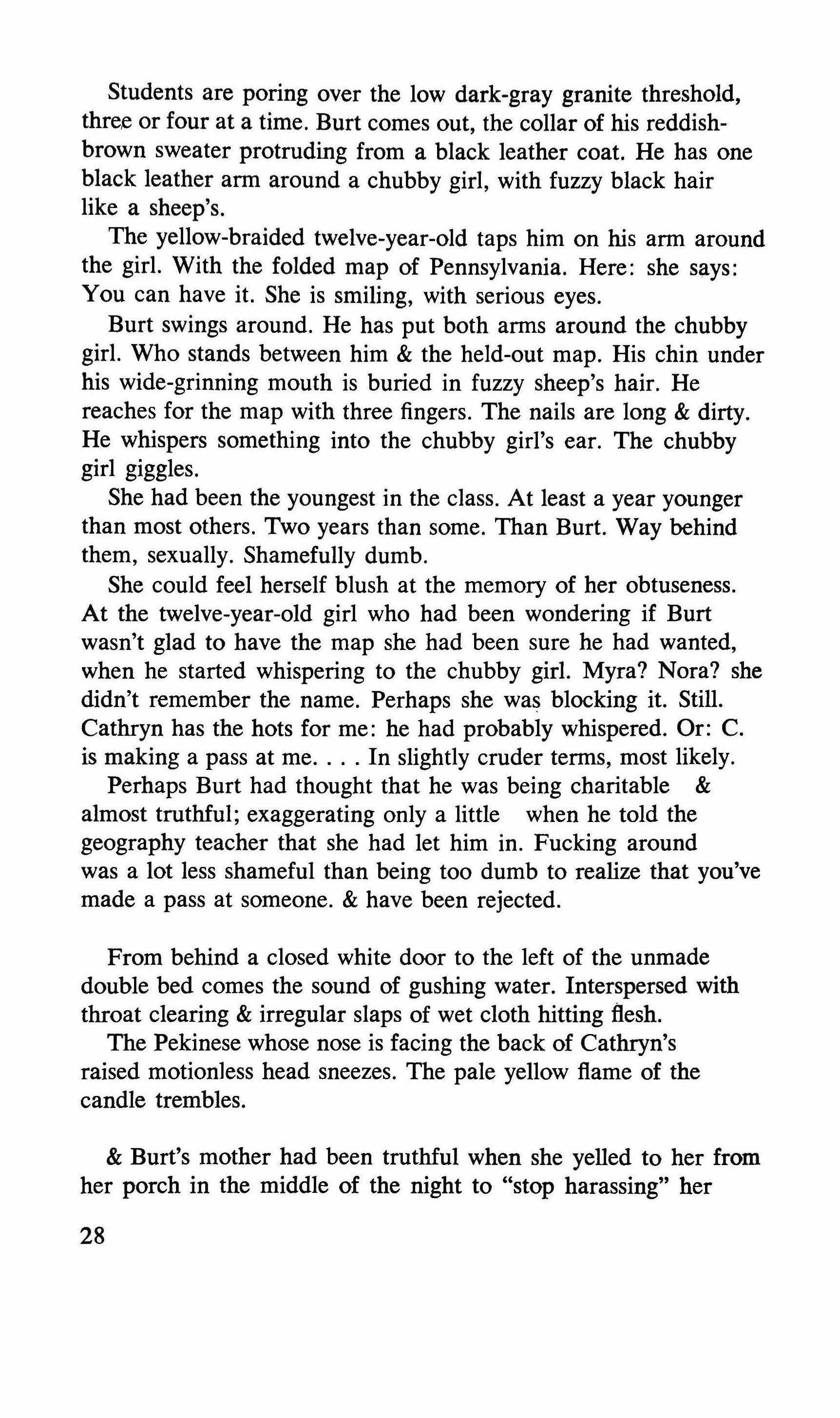
Students are poring over the low dark-gray granite threshold, three or four at a time. Burt comes out, the collar of his reddishbrown sweater protruding from a black leather coat. He has one black leather arm around a chubby girl, with fuzzy black hair like a sheep's.
The yellow-braided twelve-year-old taps him on his arm around the girl. With the folded map of Pennsylvania. Here: she says: You can have it. She is smiling, with serious eyes.
Burt swings around. He has put both arms around the chubby girl. Who stands between him & the held-out map. His chin under his wide-grinning mouth is buried in fuzzy sheep's hair. He reaches for the map with three fingers. The nails are long & dirty. He whispers something into the chubby girl's ear. The chubby girl giggles.
She had been the youngest in the class. At least a year younger than most others. Two years than some. Than Burt. Way behind them, sexually. Shamefully dumb.
She could feel herself blush at the memory of her obtuseness. At the twelve-year-old girl who had been wondering if Burt wasn't glad to have the map she had been sure he had wanted, when he started whispering to the chubby girl. Myra? Nora? she didn't remember the name. Perhaps she was blocking it. Still. Cathryn has the hots for me: he had probably whispered. Or: C. is making a pass at me In slightly cruder terms, most likely. Perhaps Burt had thought that he was being charitable & almost truthful; exaggerating only a little when he told the geography teacher that she had let him in. Fucking around was a lot less shameful than being too dumb to realize that you've made a pass at someone. & have been rejected.
From behind a closed white door to the left of the unmade double bed comes the sound of gushing water. Interspersed with throat clearing & irregular slaps of wet cloth hitting flesh.
The Pekinese whose nose is facing the back of Cathryn's raised motionless head sneezes. The pale yellow flame of the candle trembles.
& Burt's mother had been truthful when she yelled to her from her porch in the middle of the night to "stop harassing" her

boy. Under whose bedroom window the stupid twelve-year-old was holding a truth vigil. In the January snow. & the policeman whom Burt's mother had called toward 3 A.M. to "take the poor crazy girl home to her parents" had also told the truth when he quoted an alleged Pennsylvania-Dutch saying: Preacher's daughter, farmer's food/Seldom turn out very good. to her father. Who had frowned at the policeman's wide-grinning mouth. & had replied that, on the contrary, his daughter was a very good girl.
But after the policeman left, at 3:45 A.M., her father had made her lie flat on her back on the dining room table, & spread her legs as wide as they would go, while her father's mother her grandmother, rather than her furtive mother checked her hymen. With a flashlight.
Her grandmother's hands had always smelled of onion. Were there twelve-year-olds daughters, granddaughters, sons, of any age who could ask their father-mother-grandparent about things that mattered. Which they needed to know & didn't understand.
Adolescents who were not strays. Who had perhaps sat on laps, as babies, & felt a current of animal warmth infiltrate their pink bottoms like a promise of trust. That made them feel at home, in their parents' households. Instead of sticking out at the dinner table like an only soldier at a meeting of generals. -Sit up straight, Private Cathryn. Eat your potato, not your fingernails.
Such a trusting twelve-year-old might perhaps have been able to ask her paternal grandma what it was she was looking for between her legs, with her flashlight & her onion fingers. & might perhaps have received a trustworthy explanation. That might perhaps have put an end to her stupidity. Instead of consulting the dictionary about the word: hymen. Which prompted her to continue the grandmother'S search with her own fingers. Which didn't smell of onion. & felt a lot less scratchy than the grandmother's who didn't bite her nails. & led to the discovery of an unexpected source of satisfaction. Which made her walk around in a fog of breathless secrecy. More isolated than before. But with a sudden purpose. Having discovered something to look forward to, a reward, at the end of the day. & at the begin-
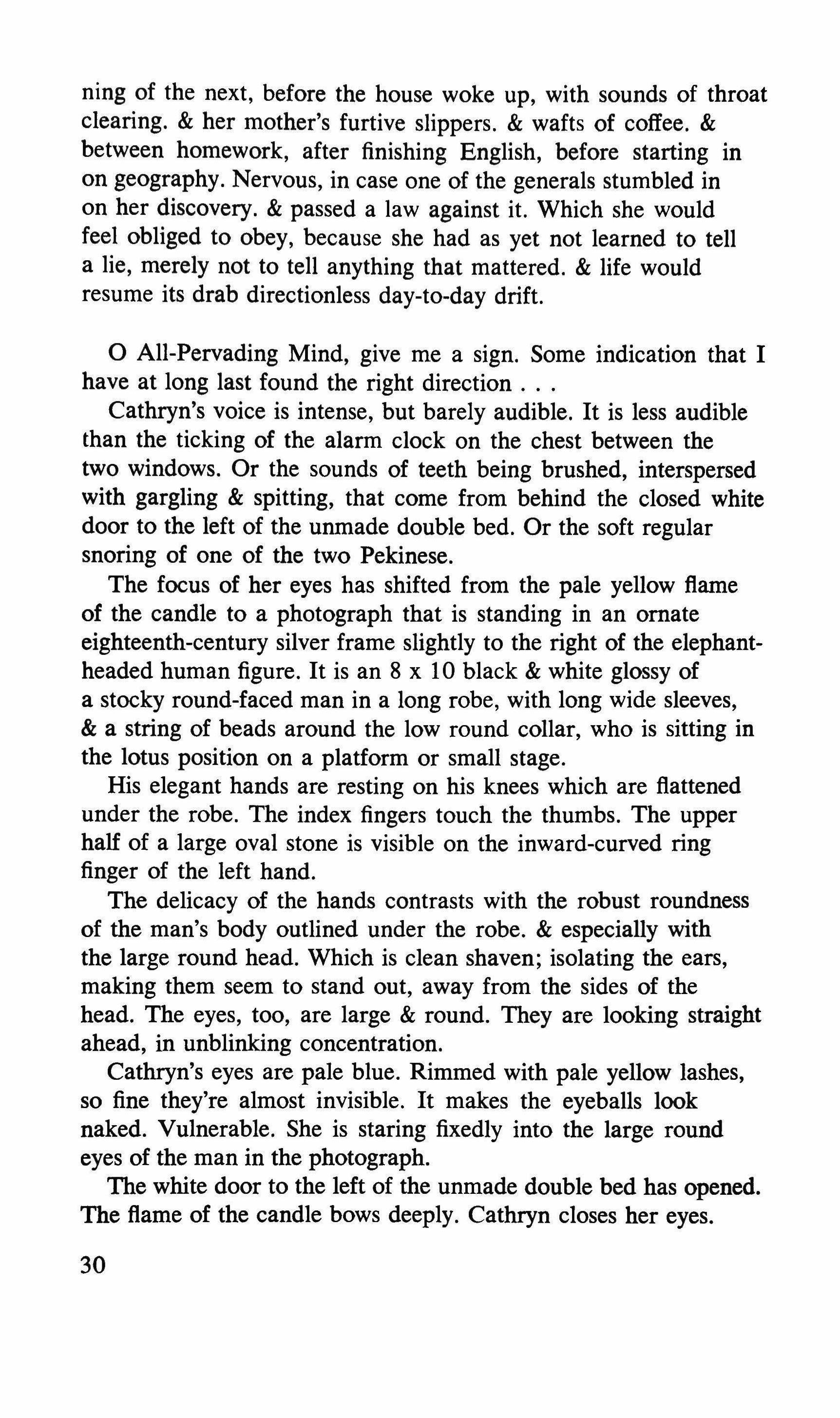
ning of the next, before the house woke up, with sounds of throat clearing. & her mother's furtive slippers. & wafts of coffee. & between homework, after finishing English, before starting in on geography. Nervous, in case one of the generals stumbled in on her discovery. & passed a law against it. Which she would feel obliged to obey, because she had as yet not learned to tell a lie, merely not to tell anything that mattered. & life would resume its drab directionless day-to-day drift.
o All-Pervading Mind, give me a sign. Some indication that I have at long last found the right direction
Cathryn's voice is intense, but barely audible. It is less audible than the ticking of the alarm clock on the chest between the two windows. Or the sounds of teeth being brushed, interspersed with gargling & spitting, that come from behind the closed white door to the left of the unmade double bed. Or the soft regular snoring of one of the two Pekinese.
The focus of her eyes has shifted from the pale yellow flame of the candle to a photograph that is standing in an ornate eighteenth-century silver frame slightly to the right of the elephantheaded human figure. It is an 8 x 10 black & white glossy of a stocky round-faced man in a long robe, with long wide sleeves, & a string of beads around the low round collar, who is sitting in the lotus position on a platform or small stage.
His elegant hands are resting on his knees which are flattened under the robe. The index fingers touch the thumbs. The upper half of a large oval stone is visible on the inward-curved ring finger of the left hand.
The delicacy of the hands contrasts with the robust roundness of the man's body outlined under the robe. & especially with the large round head. Which is clean shaven; isolating the ears, making them seem to stand out, away from the sides of the head. The eyes, too, are large & round. They are looking straight ahead, in unblinking concentration.
Cathryn's eyes are pale blue. Rimmed with pale yellow lashes, so fine they're almost invisible. It makes the eyeballs look naked. Vulnerable. She is staring fixedly into the large round eyes of the man in the photograph.
The white door to the left of the unmade double bed has opened. The flame of the candle bows deeply. Cathryn closes her eyes.

A tall bony man with a narrow clean-shaven head & widedrooping reddish mustaches above the high collar of a thick white sweater crosses quickly between Cathryn's face & the now frenzied candle. & disappears through the dark oval of an archway to the right.
One of the two Pekinese yawns, ending in a metallic squeak. The flame of the candle quavers. The ticking of the alarm clock is covered by a jingling of keys on the dark side of the archway. The two Pekinese tumble from the unmade double bed, & row through the archway, out of sight.
Sounds of yapping. Of dogs' claws tapping hard wood. Of a heavy door being opened & closed. Of several keys being inserted, turned, pulled out. The flame of the candle bows deeply. A door slams further away. Cathryn opens her eyes. Learn to use outside distractions to deepen your concentration. Her whisper is less intense & more audible than before. But still less loud than the ticking of the alarm clock which sits inside the room like a heart.
The late morning light behind the two tall windows has the color of summer. But the branches of. the tree behind the window on the left a rose of Sharon, mentioned in the Bible are leafless & brown.
Jean-Louis is good for you! Cathryn says more loudly. In a stern imitation voice that seems to be borrowed from the man in the photograph.
I know a disciple isn't supposed to argue with the teacher: she says softly. In her own voice again. But you don't know JeanLouis the way I know Jean-Louis. He doesn't believe in any of the things you teach us.
I realize that it was Jean-Louis who brought me to you. He didn't mean to, though. He only wanted me to see the elephant god he had bought. He didn't expect me to start sitting in front of it
He respects you, of course. But as a powerful antique dealer. Not for your teaching. Which you picked up from the Buddha statues you sell: he says. His opinion of teachers isn't the highest Nor of causes. Causes: he says: fall into three categories: political, religious, & dietary. He'd rather see me meditate than concoct explosives. In his elegant bathroom. In the bathtub with the lion feet. & he's glad he doesn't have to sacrifice the taste
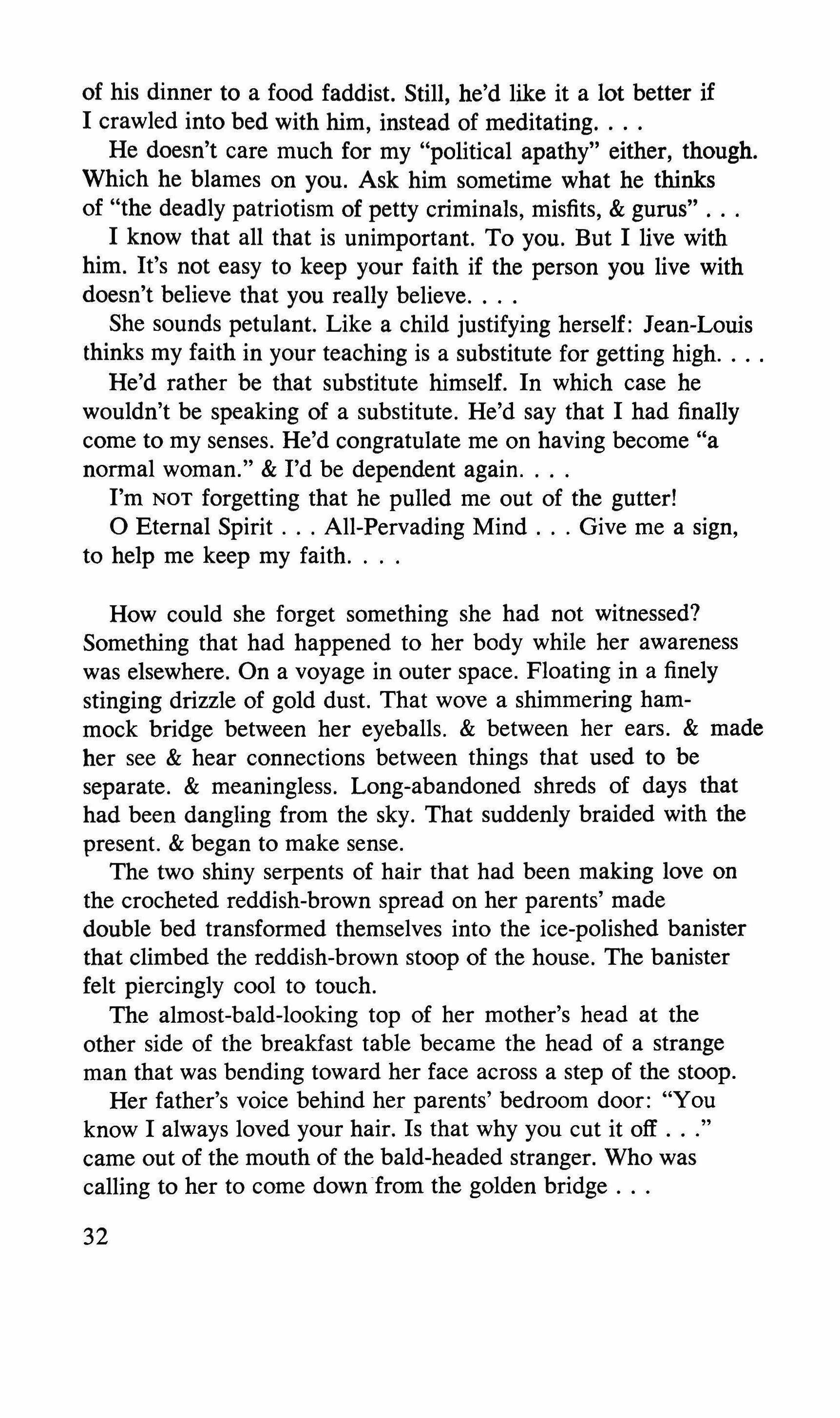
of his dinner to a food faddist. Still, he'd like it a lot better if I crawled into bed with him, instead of meditating
He doesn't care much for my "political apathy" either, though. Which he blames on you. Ask him sometime what he thinks of "the deadly patriotism of petty criminals, misfits, & gurus"
I know that all that is unimportant. To you. But I live with him. It's not easy to keep your faith if the person you live with doesn't believe that you really believe
She sounds petulant. Like a child justifying herself: Jean-Louis thinks my faith in your teaching is a substitute for getting high
He'd rather be that substitute himself. In which case he wouldn't be speaking of a substitute. He'd say that I had finally come to my senses. He'd congratulate me on having become "a normal woman." & I'd be dependent again
I'm NOT forgetting that he pulled me out of the gutter!
o Eternal Spirit All-Pervading Mind Give me a sign, to help me keep my faith.
How could she forget something she had not witnessed? Something that had happened to her body while her awareness was elsewhere. On a voyage in outer space. Floating in a finely stinging drizzle of gold dust. That wove a shimmering hammock bridge between her eyeballs. & between her ears. & made her see & hear connections between things that used to be separate. & meaningless. Long-abandoned shreds of days that had been dangling from the sky. That suddenly braided with the present. & began to make sense.
The two shiny serpents of hair that had been making love on the crocheted reddish-brown spread on her parents' made double bed transformed themselves into the ice-polished banister that climbed the reddish-brown stoop of the house. The banister felt piercingly cool to touch.
The almost-bald-looking top of her mother's head at the other side of the breakfast table became the head of a strange man that was bending toward her face across a step of the stoop.
Her father's voice behind her parents' bedroom door: "You know I always loved your hair. Is that why you cut it off came out of the mouth of the bald-headed stranger. Who was calling to her to come down from the golden bridge
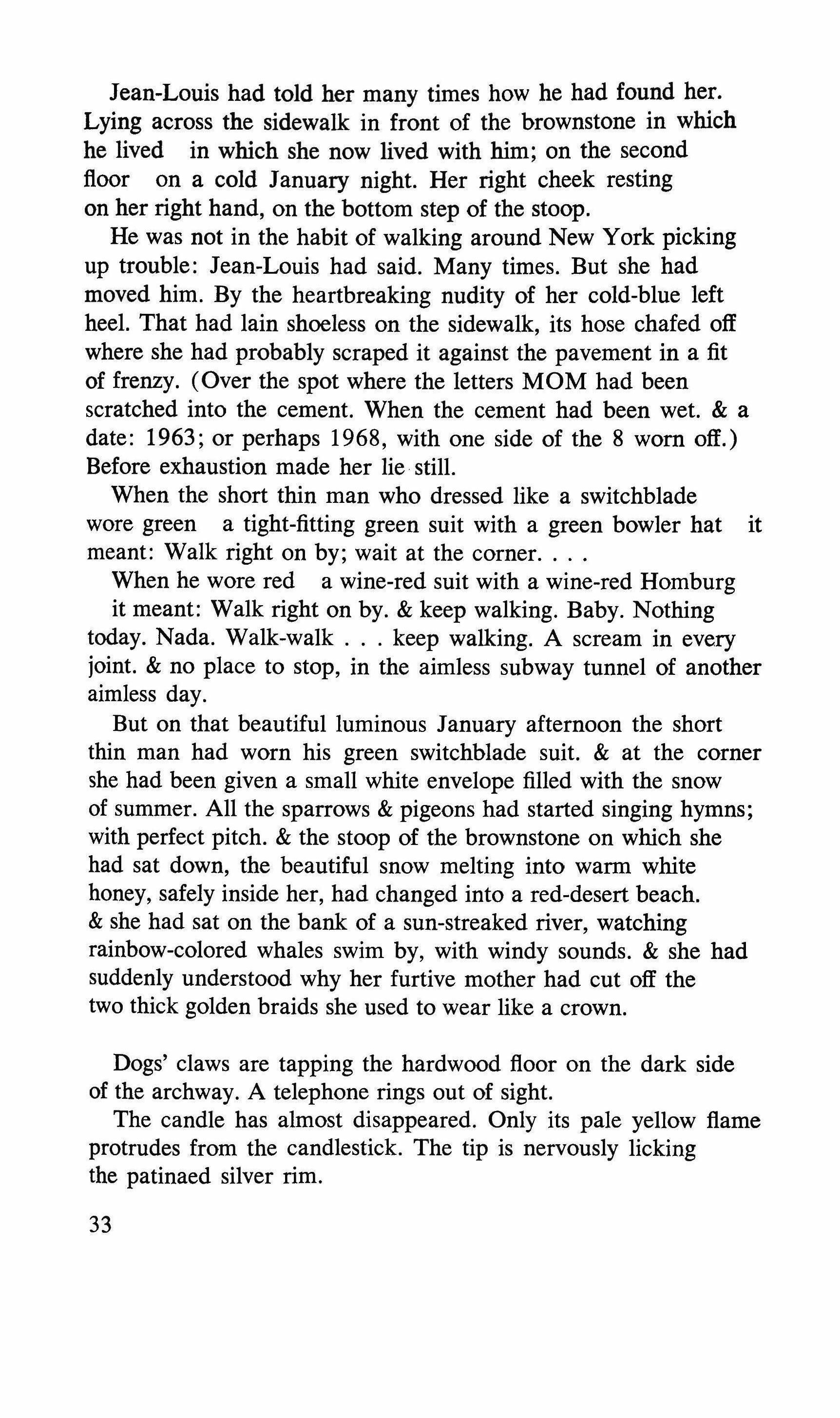
Jean-Louis had told her many times how he had found her. Lying across the sidewalk in front of the brownstone in which he lived in which she now lived with him; on the second floor on a cold January night. Her right cheek resting on her right hand, on the bottom step of the stoop. He was not in the habit of walking around New York picking up trouble: Jean-Louis had said. Many times. But she had moved him. By the heartbreaking nudity of her cold-blue left heel. That had lain shoeless on the sidewalk, its hose chafed off where she had probably scraped it against the pavement in a fit of frenzy. (Over the spot where the letters MOM had been scratched into the cement. When the cement had been wet. & a date: 1963; or perhaps 1968, with one side of the 8 worn off.) Before exhaustion made her lie· still.
When the short thin man who dressed like a switchblade wore green a tight-fitting green suit with a green bowler hat it meant: Walk right on by; wait at the corner
When he wore red a wine-red suit with a wine-red Homburg it meant: Walk right on by. & keep walking. Baby. Nothing today. Nada. Walk-walk keep walking. A scream in every joint. & no place to stop, in the aimless subway tunnel of another aimless day.
But on that beautiful luminous January afternoon the short thin man had worn his green switchblade suit. & at the corner she had been given a small white envelope filled with the snow of summer. All the sparrows & pigeons had started singing hymns; with perfect pitch. & the stoop of the brownstone on which she had sat down, the beautiful snow melting into warm white honey, safely inside her, had changed into a red-desert beach. & she had sat on the bank of a sun-streaked river, watching rainbow-colored whales swim by, with windy sounds. & she had suddenly understood why her furtive mother had cut off the two thick golden braids she used to wear like a crown.
Dogs' claws are tapping the hardwood floor on the dark side of the archway. A telephone rings out of sight.
The candle has almost disappeared. Only its pale yellow flame protrudes from the candlestick. The tip is nervously licking the patinaed silver rim. 33

Jean-Louis' voice is talking. About films. A Woman Under the Influence. It's not a slice of life: he is saying: It's a frozen pizza
Cathryn begins to uncross her legs. With awkward slowness; helping her feet with her hands.
She stands on stiff knees. Which buckle outward. She joins her hands in a gesture of devotion. Five irritated pink fingertips touching five irritated pink fingertips. All ten nails are bitten. She tries to bow to the photograph. & to the elephant. But her neck does not bend. Her head remains upright, rigid, the cleft chin raised, tilted slightly backward. She cannot turn her head to either side.
She begins to massage her neck. She rotates her arms. She pulls her shoulders up. & down. Up & down. The two Pekinese are dancing around her cold-white legs. What happened to you! laughs Jean-Louis. Did you join the celestial army while the dogs were out walking me?
I can't move my head: she says sheepishly. Shall we try slapping it into place: he offers. With wide-grinning mouth.
The Pekinese start yapping dancing around her legs as he starts slapping her: 1-2. 1-2 1-2 She reminds him of an eighteenth-century monk: he tells her between slaps: who prayed for a sign 1-2 1-2 1-2 on his knees 1-2 1-2... & when he got up 1-2 he couldn't straighten his spine 1-2 1-2 1-2 For years he walked around as a hunchback 1-2 1-2 1-2 1-2 No doctor could help him. 1-2 Until his bishop burned the Bible in front of him 1-2.. 1-2 1-2 1-2 Page by page 1-2 1-2 About halfway through 1-2 the monk straightened up 1-2 1-2 1-2 1-2.

Standing before the window we remember Venuto, who died, and hear the faint clamoring of childish voices. Juniper posts bum in the fireplace, and outside large flakes of snow are falling, obscuring the distances as evening comes. The snow turns blue and we are alone with those voices, the complex echoing of laughter, which may be only the silence ringing as we remember Venuto.
Water piped from the hot springs steams in the bathhouse, and the light of a summer afternoon glows through dusty windows in stone walls encrusted with green moss. Venuto laughs and his voice echoes as the dark woman, so recently a girl, stands hesitant on the steps into the pool, arms shielding her breasts, black hair thin and silvery over her shoulders, and she shudders. Until she splashes off into the pool and slips toward him, touching the hand he reaches out to her, allowing him to draw her against his chest, her fingers entangled in the streaked hair plastered over his shoulders.
They kiss quietly and gently. Floating on the water for that moment before lovemaking, her hair sinks as she rests suspended in his arms; and in that water begins the life of the boy named Bowman, who will reach manhood the year Venuto dies.
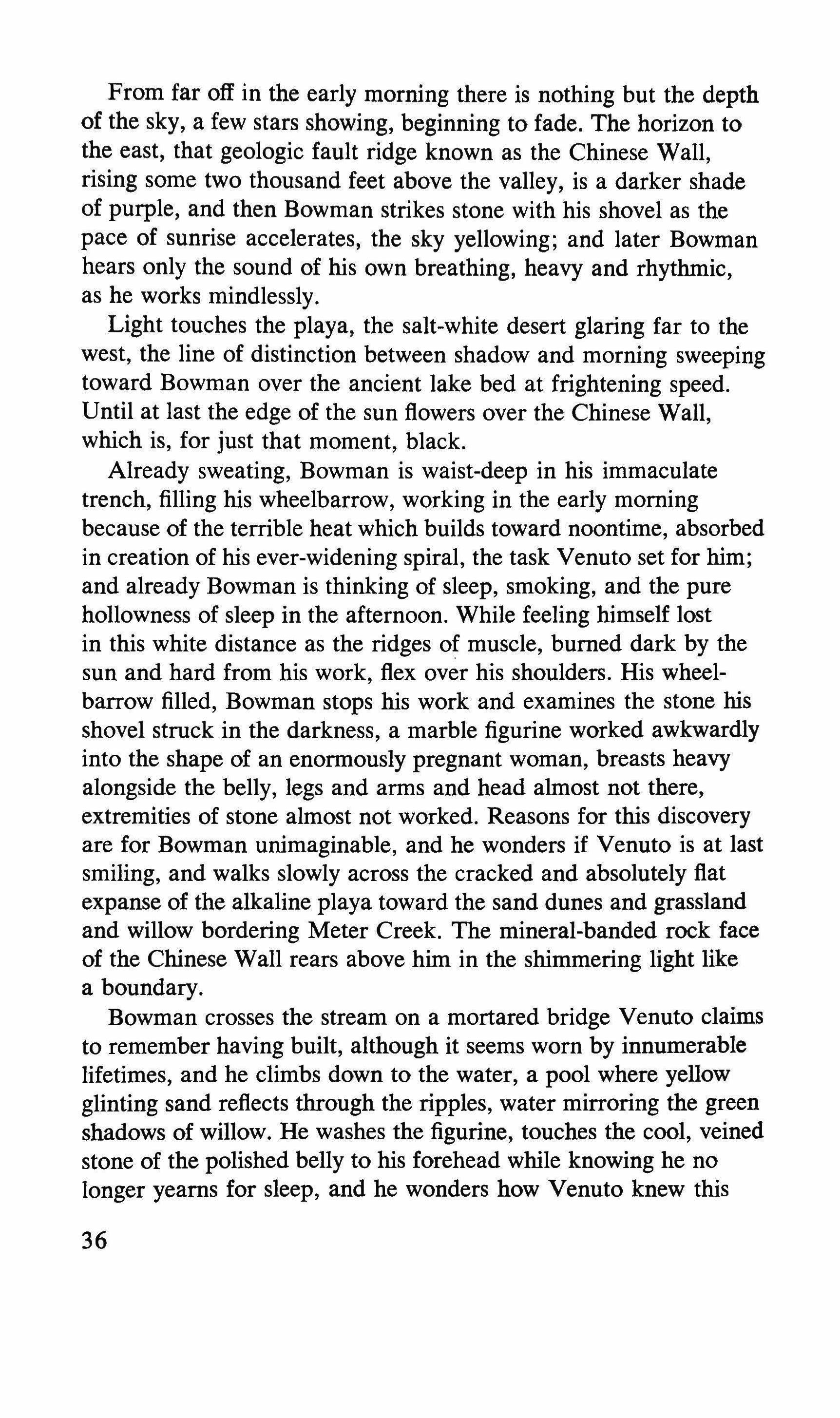
From far off in the early morning there is nothing but the depth of the sky, a few stars showing, beginning to fade. The horizon to the east, that geologic fault ridge known as the Chinese Wall, rising some two thousand feet above the valley, is a darker shade of purple, and then Bowman strikes stone with his shovel as the pace of sunrise accelerates, the sky yellowing; and later Bowman hears only the sound of his own breathing, heavy and rhythmic, as he works mindlessly.
Light touches the playa, the salt-white desert glaring far to the west, the line of distinction between shadow and morning sweeping toward Bowman over the ancient lake bed at frightening speed. Until at last the edge of the sun flowers over the Chinese Wall, which is, for just that moment, black.
Already sweating, Bowman is waist-deep in his immaculate trench, filling his wheelbarrow, working in the early morning because of the terrible heat which builds toward noontime, absorbed in creation of his ever-widening spiral, the task Venuto set for him; and already Bowman is thinking of sleep, smoking, and the pure hollowness of sleep in the afternoon. While feeling himself lost in this white distance as the ridges of muscle, burned dark by the sun and hard from his work, flex over his shoulders. His wheelbarrow filled, Bowman stops his work and examines the stone his shovel struck in the darkness, a marble figurine worked awkwardly into the shape of an enormously pregnant woman, breasts heavy alongside the belly, legs and arms and head almost not there, extremities of stone almost not worked. Reasons for this discovery are for Bowman unimaginable, and he wonders if Venuto is at last smiling, and walks slowly across the cracked and absolutely flat expanse of the alkaline playa toward the sand dunes and grassland and willow bordering Meter Creek. The mineral-banded rock face of the Chinese Wall rears above him in the shimmering light like a boundary.
Bowman crosses the stream on a mortared bridge Venuto claims to remember having built, although it seems worn by innumerable lifetimes, and he climbs down to the water, a pool where yellow glinting sand reflects through the ripples, water mirroring the green shadows of willow. He washes the figurine, touches the cool, veined stone of the polished belly to his forehead while knowing he no longer yearns for sleep, and he wonders how Venuto knew this
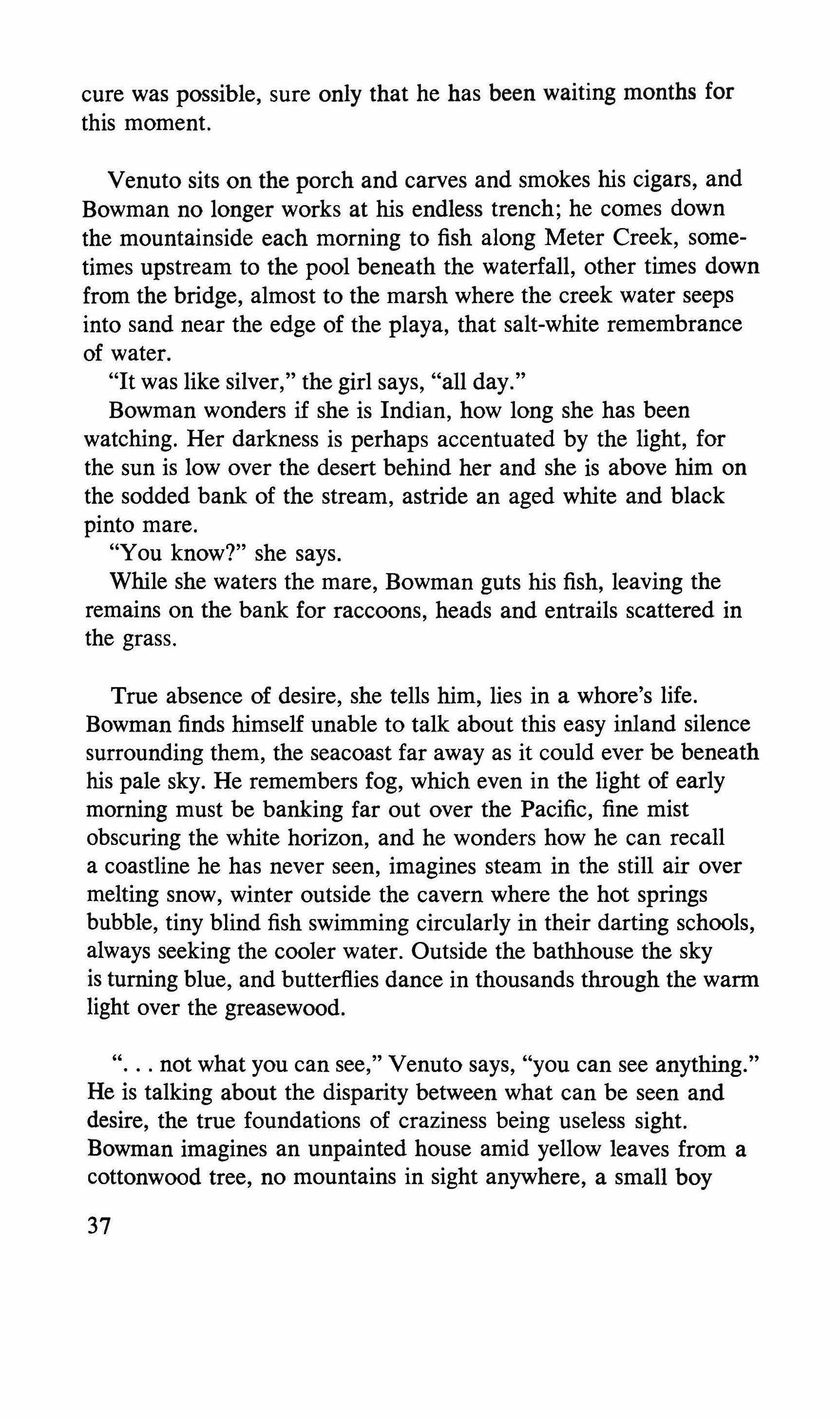
cure was possible, sure only that he has been waiting months for this moment.
Venuto sits on the porch and carves and smokes his cigars, and Bowman no longer works at his endless trench; he comes down the mountainside each morning to fish along Meter Creek, sometimes upstream to the pool beneath the waterfall, other times down from the bridge, almost to the marsh where the creek water seeps into sand near the edge of the playa, that salt-white remembrance of water.
"It was like silver," the girl says, "all day."
Bowman wonders if she is Indian, how long she has been watching. Her darkness is perhaps accentuated by the light, for the sun is low over the desert behind her and she is above him on the sodded bank of the stream, astride an aged white and black pinto mare.
"You know?" she says.
While she waters the mare, Bowman guts his fish, leaving the remains on the bank for raccoons, heads and entrails scattered in the grass.
True absence of desire, she tells him, lies in a whore's life. Bowman finds himself unable to talk about this easy inland silence surrounding them, the seacoast far away as it could ever be beneath his pale sky. He remembers fog, which even in the light of early morning must be banking far out over the Pacific, fine mist obscuring the white horizon, and he wonders how he can recall a coastline he has never seen, imagines steam in the still air over melting snow, winter outside the cavern where the hot springs bubble, tiny blind fish swimming circularly in their darting schools, always seeking the cooler water. Outside the bathhouse the sky is turning blue, and butterflies dance in thousands through the warm light over the greasewood.
" not what you can see," Venuto says, "you can see anything." He is talking about the disparity between what can be seen and desire, the true foundations of craziness being useless sight. Bowman imagines an unpainted house amid yellow leaves from a cottonwood tree, no mountains in sight anywhere, a small boy 37
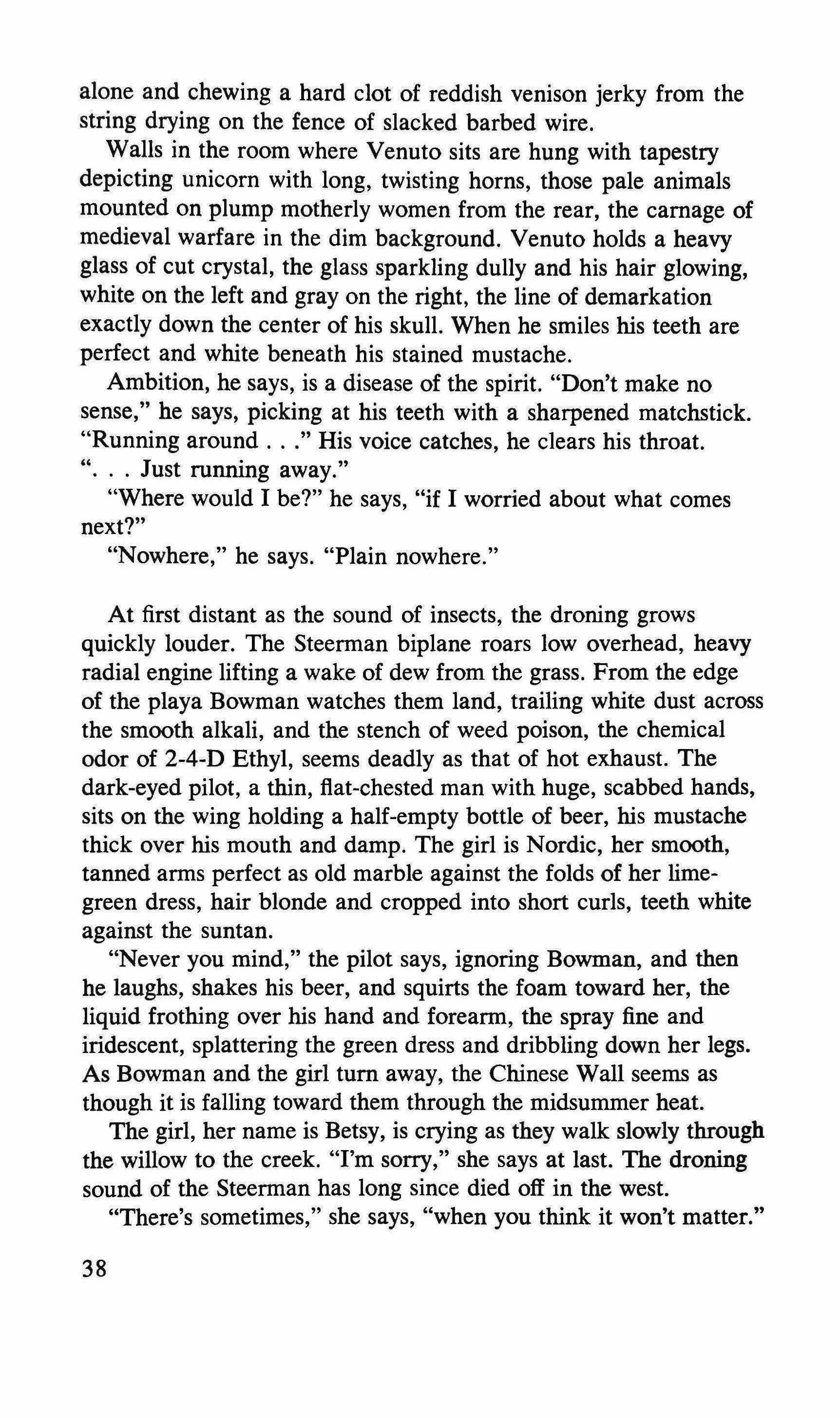
alone and chewing a hard clot of reddish venison jerky from the string drying on the fence of slacked barbed wire.
Walls in the room where Venuto sits are hung with tapestry depicting unicorn with long, twisting horns, those pale animals mounted on plump motherly women from the rear, the carnage of medieval warfare in the dim background. Venuto holds a heavy glass of cut crystal, the glass sparkling dully and his hair glowing, white on the left and gray on the right, the line of demarkation exactly down the center of his skull. When he smiles his teeth are perfect and white beneath his stained mustache.
Ambition, he says, is a disease of the spirit. "Don't make no sense," he says, picking at his teeth with a sharpened matchstick. "Running around ." His voice catches, he clears his throat. Just running away."
"Where would I be?" he says, "if I worried about what comes next?"
"Nowhere," he says. "Plain nowhere."
At first distant as the sound of insects, the droning grows quickly louder. The Steerman biplane roars low overhead, heavy radial engine lifting a wake of dew from the grass. From the edge of the playa Bowman watches them land, trailing white dust across the smooth alkali, and the stench of weed poison, the chemical odor of 2-4-D Ethyl, seems deadly as that of hot exhaust. The dark-eyed pilot, a thin, flat-chested man with huge, scabbed hands, sits on the wing holding a half-empty bottle of beer, his mustache thick over his mouth and damp. The girl is Nordic, her smooth, tanned arms perfect as old marble against the folds of her limegreen dress, hair blonde and cropped into short curls, teeth white against the suntan.
"Never you mind," the pilot says, ignoring Bowman, and then he laughs, shakes his beer, and squirts the foam toward her, the liquid frothing over his hand and forearm, the spray fine and iridescent, splattering the green dress and dribbling down her legs. As Bowman and the girl tum away, the Chinese Wall seems as though it is falling toward them through the midsummer heat.
The girl, her name is Betsy, is crying as they walk slowly through the willow to the creek. "I'm sorry," she says at last. The droning sound of the Steerman has long since died off in the west.
"There's sometimes," she says, "when you think it won't matter."

A lean girl with long, ragged black hair in strands over her shoulders will not speak when Bowman discovers her stealing food--cool cans of whole tomatoes, sides of smoked salmon, dried mushrooms gathered in spring from the roots of cottonwood near the creek, sprouting potatoes-from the damp underground storage room. She sleeps outside even as fall approaches, on boughs covered with canvas, under a woolen blanket Venuto has given her. No one knows how she came across the desert playa. Coming down over the Chinese Wall is not imaginable. Beyond the wall to the east there is only wilderness. She sleeps in the daytime, and Bowman wonders what she will do when winter comes. If she can live without houses.
Still wearing her lime-green dress, the girl named Betsy plays Bowman's records, sorting through the dusty pile and playing oldtime hymns, huddling with her arms around her knees and never looking up while the music goes on, and then she smiles and asks Bowman to take off his boots. Her hands are quick and brown as she shuffles through the records. "What'd you like?" she asks.
"Anything," Bowman says.
"They're going to put me in the movies," she sings. Another record ends. "Some kind of movies," she says.
Yellow flowers, another day, are embroidered on her thin blue dress. When he touches her waist Bowman can feel the warmth. "All right now," she says, and she kisses him, and later, as the sun lies near the shadowy mountains on the faint western horizon, Bowman sits outside wearing only his pants and sips a glass of cold water, and she kisses his back between the shoulder blades. "It's like light on the ocean," she says, "like out in the dunes, down where you can't see no water and they got no wind at all." When she stands, Bowman touches the firm back of her thigh, cups his hand around the soft hollow at the back of her knee. "You think it don't matter," she says.
Above her bed the girl named Betsy pins an imitation Chinese scroll, a delicate ink rendering of an ancient man with a wispy beard poling a high-prowed boat upstream, flowering vertical mountains in cloud behind, a hut with a sharp and elaborately peaked roof at the summit. Bowman sips his soup, which is sour and green, and listens to the fall of rain through the half-opened
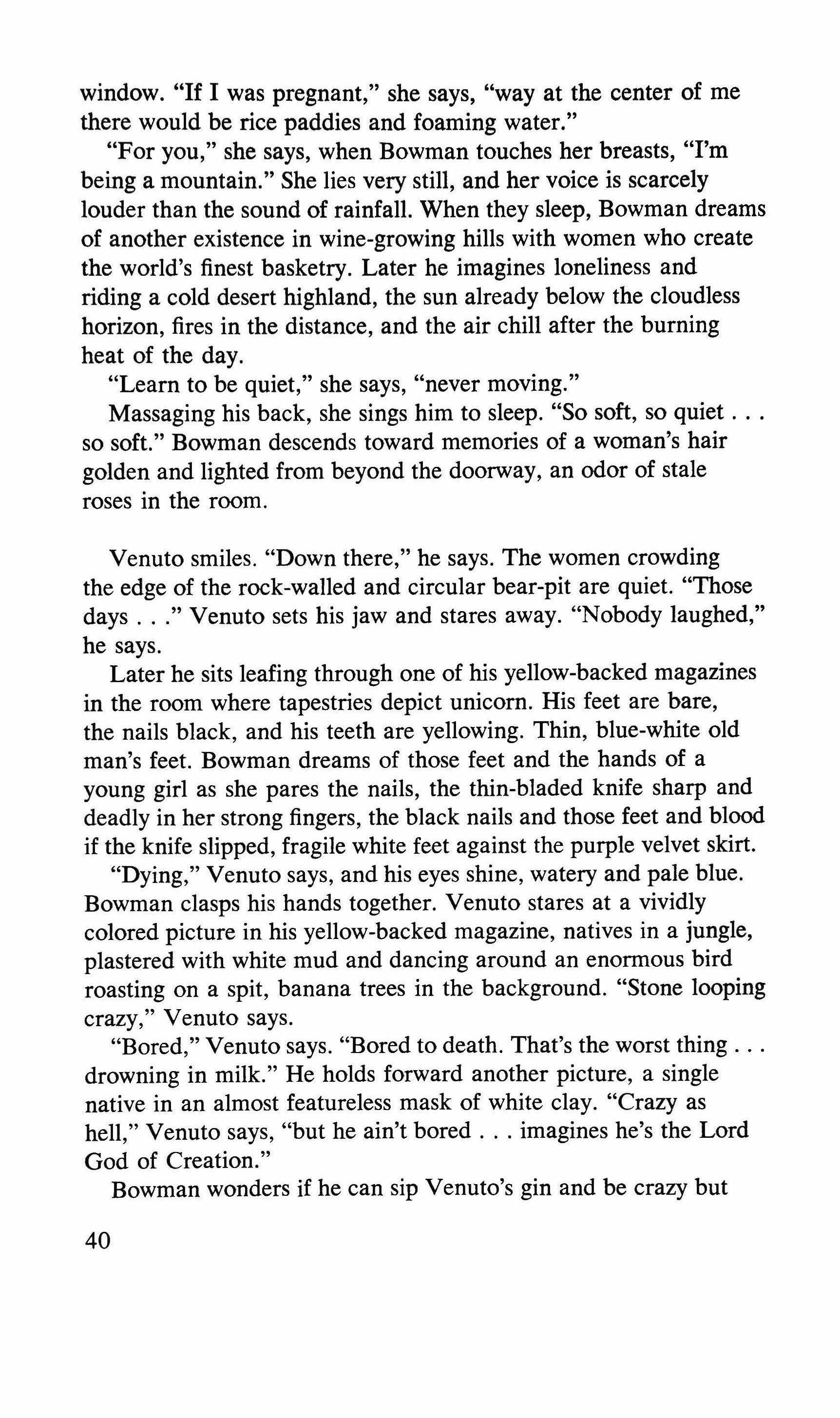
window. "If I was pregnant," she says, "way at the center of me there would be rice paddies and foaming water."
"For you," she says, when Bowman touches her breasts, "I'm being a mountain." She lies very still, and her voice is scarcely louder than the sound of rainfall. When they sleep, Bowman dreams of another existence in wine-growing hills with women who create the world's finest basketry. Later he imagines loneliness and riding a cold desert highland, the sun already below the cloudless horizon, fires in the distance, and the air chill after the burning heat of the day.
"Learn to be quiet," she says, "never moving."
Massaging his back, she sings him to sleep. "So soft, so quiet so soft." Bowman descends toward memories of a woman's hair golden and lighted from beyond the doorway, an odor of stale roses in the room.
Venuto smiles. "Down there," he says. The women crowding the edge of the rock-walled and circular bear-pit are quiet. "Those days Venuto sets his jaw and stares away. "Nobody laughed," he says.
Later he sits leafing through one of his yellow-backed magazines in the room where tapestries depict unicorn. His feet are bare, the nails black, and his teeth are yellowing. Thin, blue-white old man's feet. Bowman dreams of those feet and the hands of a young girl as she pares the nails, the thin-bladed knife sharp and deadly in her strong fingers, the black nails and those feet and blood if the knife slipped, fragile white feet against the purple velvet skirt.
"Dying," Venuto says, and his eyes shine, watery and pale blue. Bowman clasps his hands together. Venuto stares at a vividly colored picture in his yellow-backed magazine, natives in a jungle, plastered with white mud and dancing around an enormous bird roasting on a spit, banana trees in the background. "Stone looping crazy," Venuto says.
"Bored," Venuto says. "Bored to death. That's the worst thing drowning in milk." He holds forward another picture, a single native in an almost featureless mask of white clay. "Crazy as hell," Venuto says, "but he ain't bored imagines he's the Lord God of Creation."
Bowman wonders if he can sip Venuto's gin and be crazy but
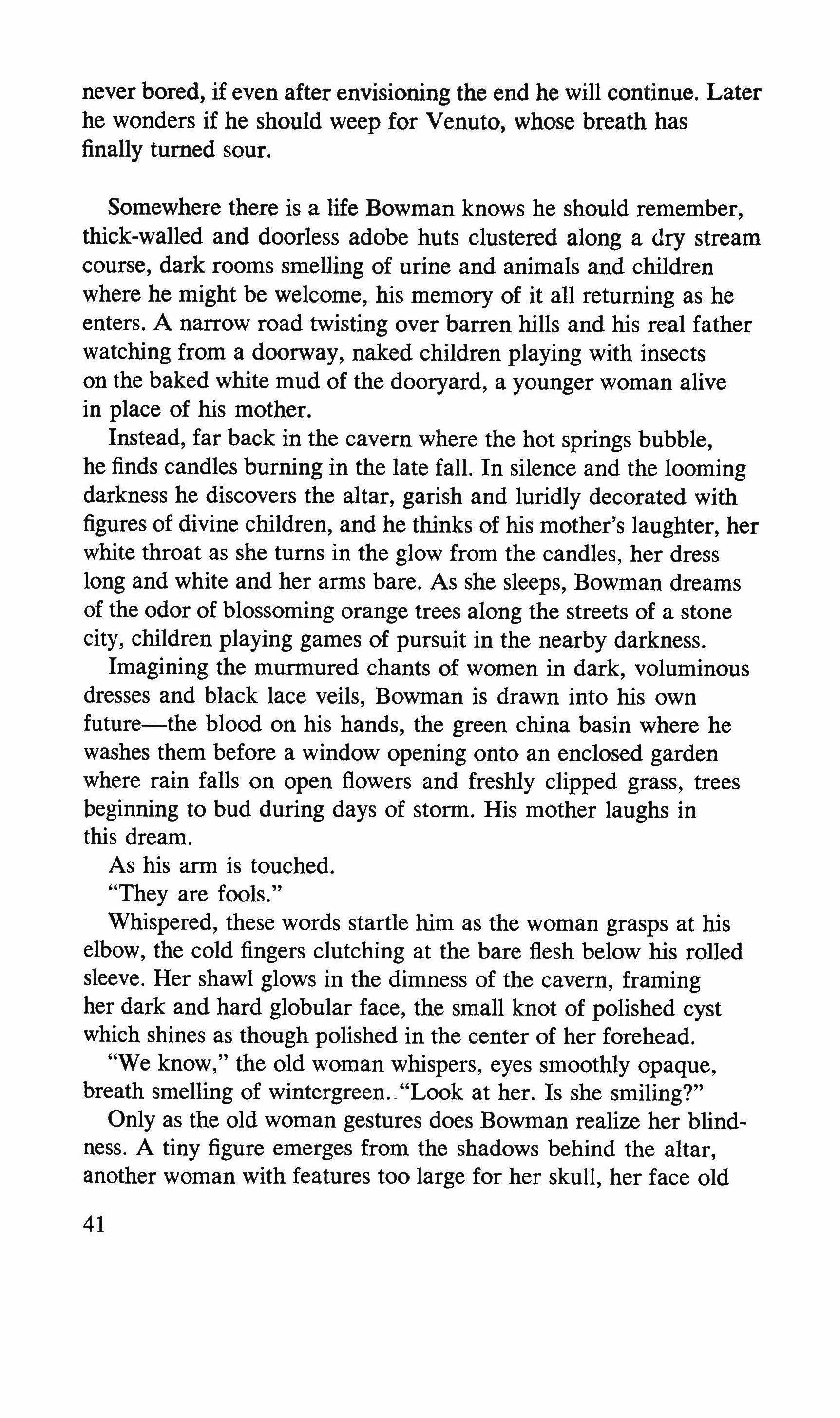
never bored, if even after envisioning the end he will continue. Later he wonders if he should weep for Venuto, whose breath has finally turned sour.
Somewhere there is a life Bowman knows he should remember, thick-walled and doorless adobe huts clustered along a dry stream course, dark rooms smelling of urine and animals and children where he might be welcome, his memory of it all returning as he enters. A narrow road twisting over barren hills and his real father watching from a doorway, naked children playing with insects on the baked white mud of the dooryard, a younger woman alive in place of his mother.
Instead, far back in the cavern where the hot springs bubble, he finds candles burning in the late fall. In silence and the looming darkness he discovers the altar, garish and luridly decorated with figures of divine children, and he thinks of his mother's laughter, her white throat as she turns in the glow from the candles, her dress long and white and her arms bare. As she sleeps, Bowman dreams of the odor of blossoming orange trees along the streets of a stone city, children playing games of pursuit in the nearby darkness.
Imagining the murmured chants of women in dark, voluminous dresses and black lace veils, Bowman is drawn into his own future-the blood on his hands, the green china basin where he washes them before a window opening onto an enclosed garden where rain falls on open flowers and freshly clipped grass, trees beginning to bud during days of storm. His mother laughs in this dream.
As his arm is touched.
"They are fools."
Whispered, these words startle him as the woman grasps at his elbow, the cold fingers clutching at the bare flesh below his rolled sleeve. Her shawl glows in the dimness of the cavern, framing her dark and hard globular face, the small knot of polished cyst which shines as though polished in the center of her forehead.
"We know," the old woman whispers, eyes smoothly opaque, breath smelling of wintergreen "Look at her. Is she smiling?"
Only as the old woman gestures does Bowman realize her blindness. A tiny figure emerges from the shadows behind the altar, another woman with features too large for her skull, her face old
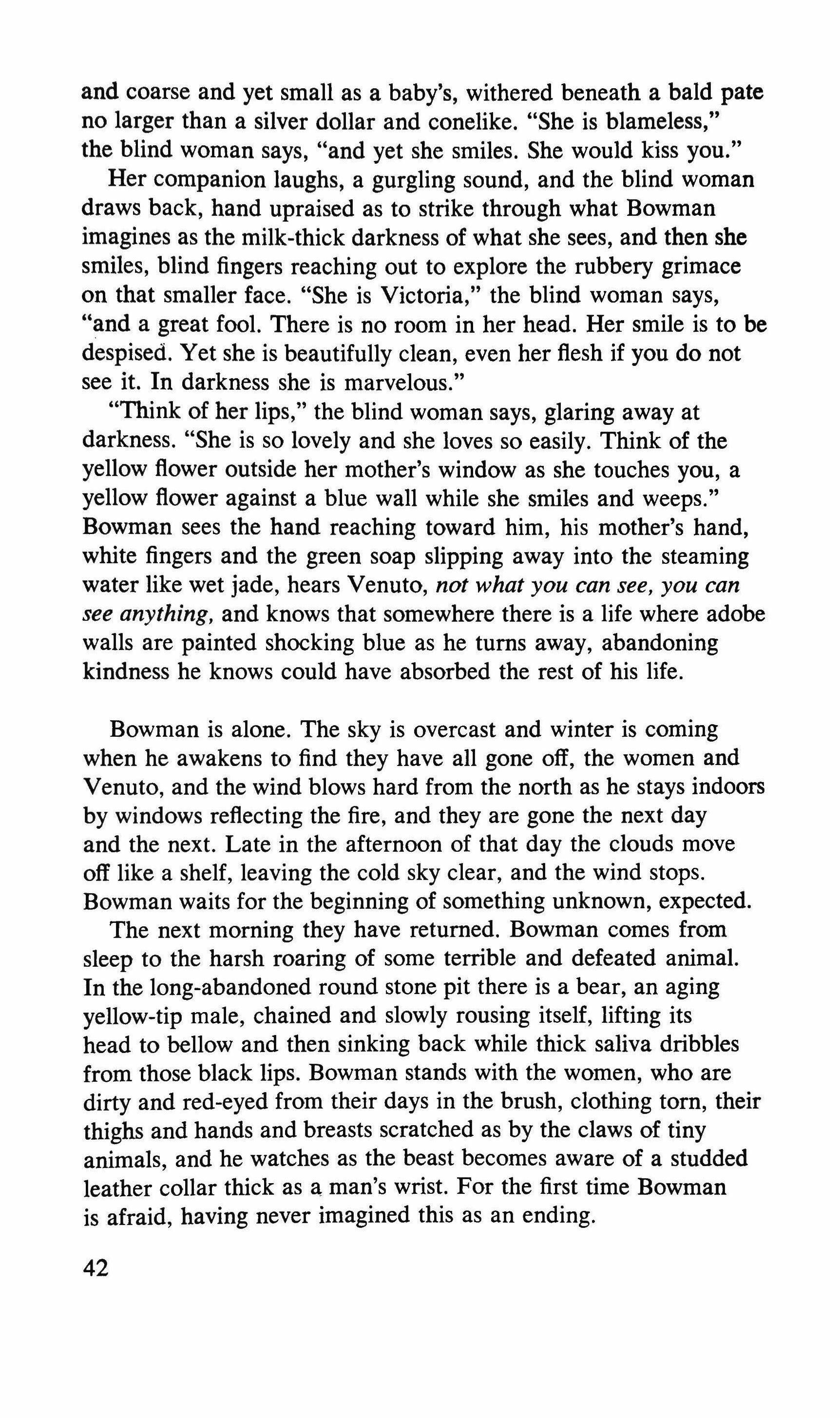
and coarse and yet small as a baby's, withered beneath a bald pate no larger than a silver dollar and conelike. "She is blameless," the blind woman says, "and yet she smiles. She would kiss you."
Her companion laughs, a gurgling sound, and the blind woman draws back, hand upraised as to strike through what Bowman imagines as the milk-thick darkness of what she sees, and then she smiles, blind fingers reaching out to explore the rubbery grimace on that smaller face. "She is Victoria," the blind woman says, "and a great fool. There is no room in her head. Her smile is to be despised. Yet she is beautifully clean, even her flesh if you do not see it. In darkness she is marvelous."
"Think of her lips," the blind woman says, glaring away at darkness. "She is so lovely and she loves so easily. Think of the yellow flower outside her mother's window as she touches you, a yellow flower against a blue wall while she smiles and weeps."
Bowman sees the hand reaching toward him, his mother's hand, white fingers and the green soap slipping away into the steaming water like wet jade, hears Venuto, not what you can see, you can see anything, and knows that somewhere there is a life where adobe walls are painted shocking blue as he turns away, abandoning kindness he knows could have absorbed the rest of his life.
Bowman is alone. The sky is overcast and winter is coming when he awakens to find they have all gone off, the women and Venuto, and the wind blows hard from the north as he stays indoors by windows reflecting the fire, and they are gone the next day and the next. Late in the afternoon of that day the clouds move off like a shelf, leaving the cold sky clear, and the wind stops. Bowman waits for the beginning of something unknown, expected. The next morning they have returned. Bowman comes from sleep to the harsh roaring of some terrible and defeated animal. In the long-abandoned round stone pit there is a bear, an aging yellow-tip male, chained and slowly rousing itself, lifting its head to bellow and then sinking back while thick saliva dribbles from those black lips. Bowman stands with the women, who are dirty and red-eyed from their days in the brush, clothing torn, their thighs and hands and breasts scratched as by the claws of tiny animals, and he watches as the beast becomes aware of a studded leather collar thick as a man's wrist. For the first time Bowman is afraid, having never imagined this as an ending.
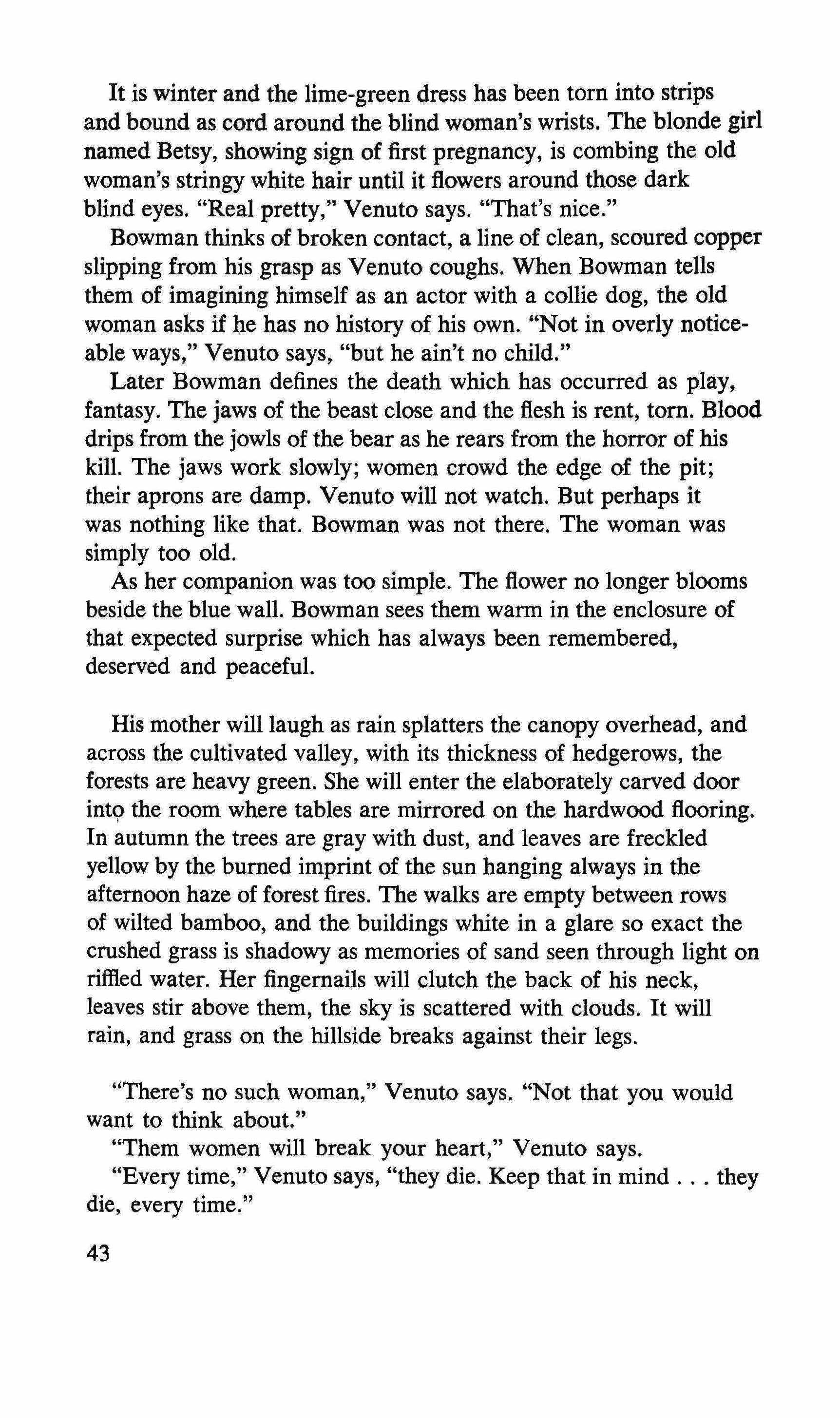
It is winter and the lime-green dress has been torn into strips and bound as cord around the blind woman's wrists. The blonde girl named Betsy, showing sign of first pregnancy, is combing the old woman's stringy white hair until it flowers around those dark blind eyes. "Real pretty," Venuto says. "That's nice."
Bowman thinks of broken contact, a line of clean, scoured copper slipping from his grasp as Venuto coughs. When Bowman tells them of imagining himself as an actor with a collie dog, the old woman asks if he has no history of his own. "Not in overly noticeable ways," Venuto says, "but he ain't no child."
Later Bowman defines the death which has occurred as play, fantasy. The jaws of the beast close and the flesh is rent, tom. Blood drips from the jowls of the bear as he rears from the horror of his kill. The jaws work slowly; women crowd the edge of the pit; their aprons are damp. Venuto will not watch. But perhaps it was nothing like that. Bowman was not there. The woman was simply too old.
As her companion was too simple. The flower no longer blooms beside the blue wall. Bowman sees them warm in the enclosure of that expected surprise which has always been remembered, deserved and peaceful.
His mother will laugh as rain splatters the canopy overhead, and across the cultivated valley, with its thickness of hedgerows, the forests are heavy green. She will enter the elaborately carved door into the room where tables are mirrored on the hardwood flooring. In autumn the trees are gray with dust, and leaves are freckled yellow by the burned imprint of the sun hanging always in the afternoon haze of forest fires. The walks are empty between rows of wilted bamboo, and the buildings white in a glare so exact the crushed grass is shadowy as memories of sand seen through light on riffled water. Her fingernails will clutch the back of his neck, leaves stir above them, the sky is scattered with clouds. It will rain, and grass on the hillside breaks against their legs.
"There's no such woman," Venuto says. "Not that you would want to think about."
"Them women will break your heart," Venuto says. "Every time," Venuto says, "they die. Keep that in mind they die, every time."
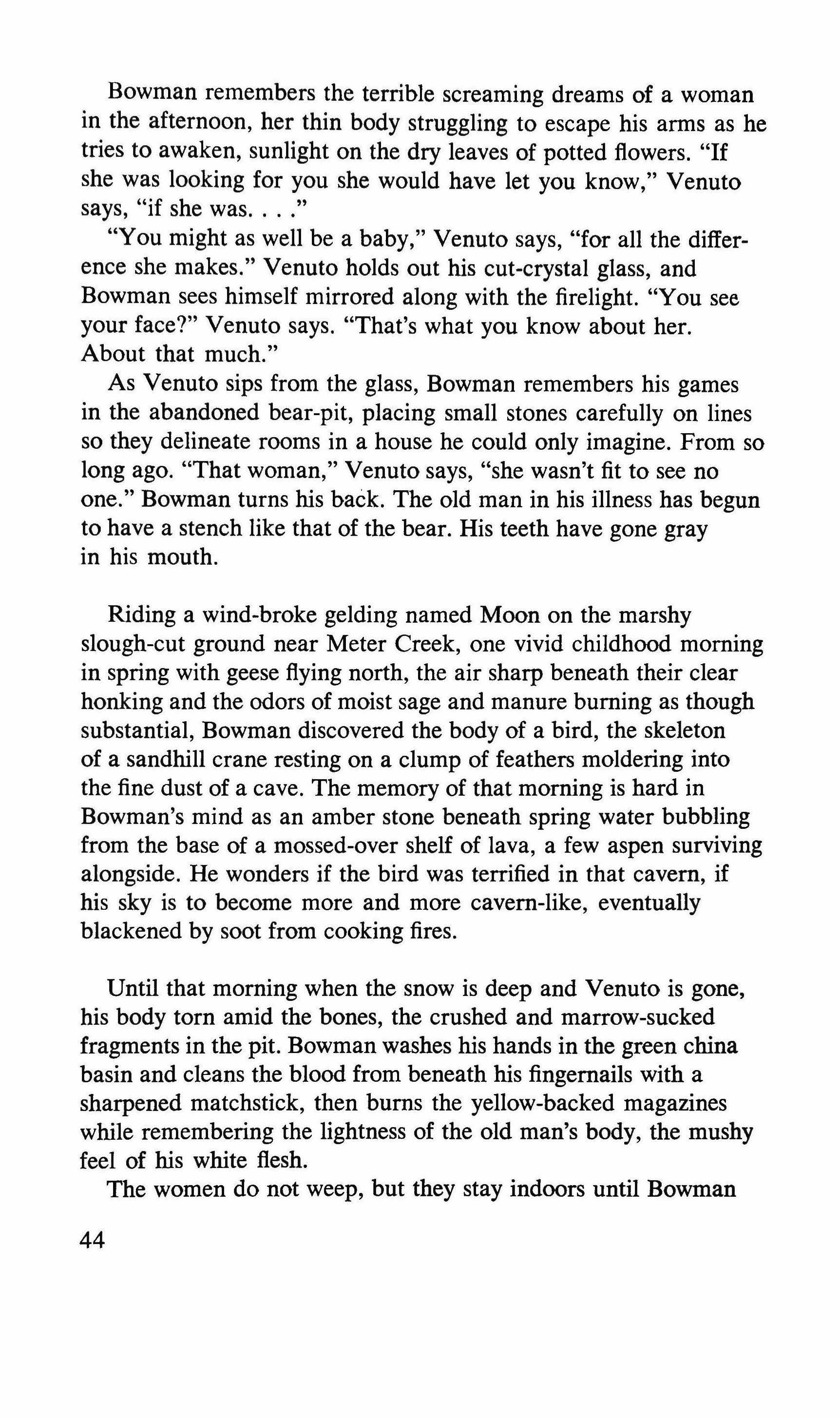
Bowman remembers the terrible screaming dreams of a woman in the afternoon, her thin body struggling to escape his arms as he tries to awaken, sunlight on the dry leaves of potted flowers. "If she was looking for you she would have let you know," Venuto "'f h says, 1 s e was
"You might as well be a baby," Venuto says, "for all the difference she makes." Venuto holds out his cut-crystal glass, and Bowman sees himself mirrored along with the firelight. "You see your face?" Venuto says. "That's what you know about her. About that much."
As Venuto sips from the glass, Bowman remembers his games in the abandoned bear-pit, placing small stones carefully on lines so they delineate rooms in a house he could only imagine. From so long ago. "That woman," Venuto says, "she wasn't fit to see no one." Bowman turns his back. The old man in his illness has begun to have a stench like that of the bear. His teeth have gone gray in his mouth.
Riding a wind-broke gelding named Moon on the marshy slough-cut ground near Meter Creek, one vivid childhood morning in spring with geese flying north, the air sharp beneath their clear honking and the odors of moist sage and manure burning as though substantial, Bowman discovered the body of a bird, the skeleton of a sandhill crane resting on a clump of feathers moldering into the fine dust of a cave. The memory of that morning is hard in Bowman's mind as an amber stone beneath spring water bubbling from the base of a mossed-over shelf of lava, a few aspen surviving alongside. He wonders if the bird was terrified in that cavern, if his sky is to become more and more cavern-like, eventually blackened by soot from cooking fires.
Until that morning when the snow is deep and Venuto is gone, his body torn amid the bones, the crushed and marrow-sucked fragments in the pit. Bowman washes his hands in the green china basin and cleans the blood from beneath his fingernails with a sharpened matchstick, then bums the yellow-backed magazines while remembering the lightness of the old man's body, the mushy feel of his white flesh.
The women do not weep, but they stay indoors until Bowman
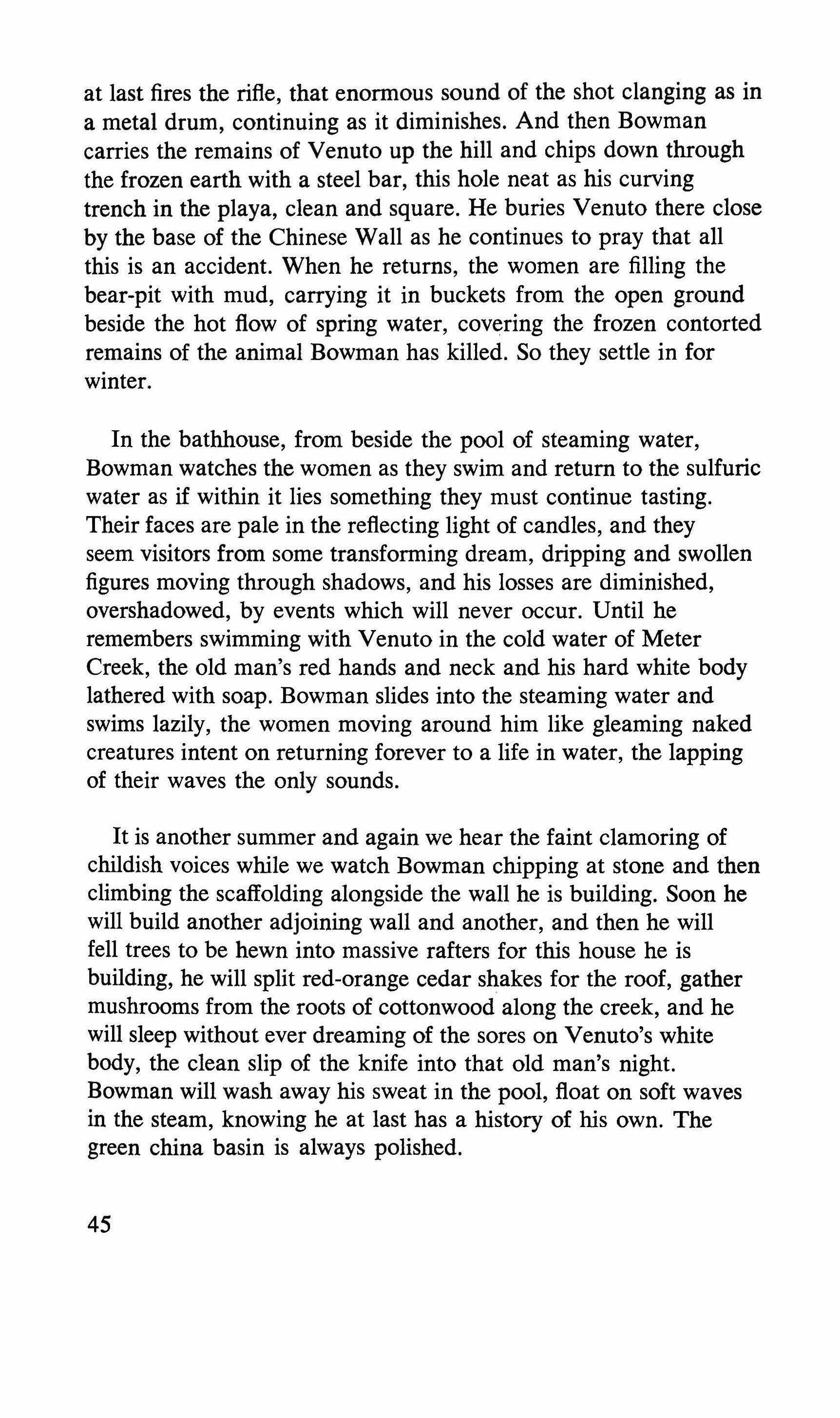
at last fires the rifle, that enormous sound of the shot clanging as in a metal drum, continuing as it diminishes. And then Bowman carries the remains of Venuto up the hill and chips down through the frozen earth with a steel bar, this hole neat as his curving trench in the playa, clean and square. He buries Venuto there close by the base of the Chinese Wall as he continues to pray that all this is an accident. When he returns, the women are filling the bear-pit with mud, carrying it in buckets from the open ground beside the hot flow of spring water, covering the frozen contorted remains of the animal Bowman has killed. So they settle in for winter.
In the bathhouse, from beside the pool of steaming water, Bowman watches the women as they swim and return to the sulfuric water as if within it lies something they must continue tasting. Their faces are pale in the reflecting light of candles, and they seem visitors from some transforming dream, dripping and swollen figures moving through shadows, and his losses are diminished, overshadowed, by events which will never occur. Until he remembers swimming with Venuto in the cold water of Meter Creek, the old man's red hands and neck and his hard white body lathered with soap. Bowman slides into the steaming water and swims lazily, the women moving around him like gleaming naked creatures intent on returning forever to a life in water, the lapping of their waves the only sounds.
It is another summer and again we hear the faint clamoring of childish voices while we watch Bowman chipping at stone and then climbing the scaffolding alongside the wall he is building. Soon he will build another adjoining wall and another, and then he will fell trees to be hewn into massive rafters for this house he is building, he will split red-orange cedar shakes for the roof, gather mushrooms from the roots of cottonwood along the creek, and he will sleep without ever dreaming of the sores on Venuto's white body, the clean slip of the knife into that old man's night. Bowman will wash away his sweat in the pool, float on soft waves in the steam, knowing he at last has a history of his own. The green china basin is always polished.
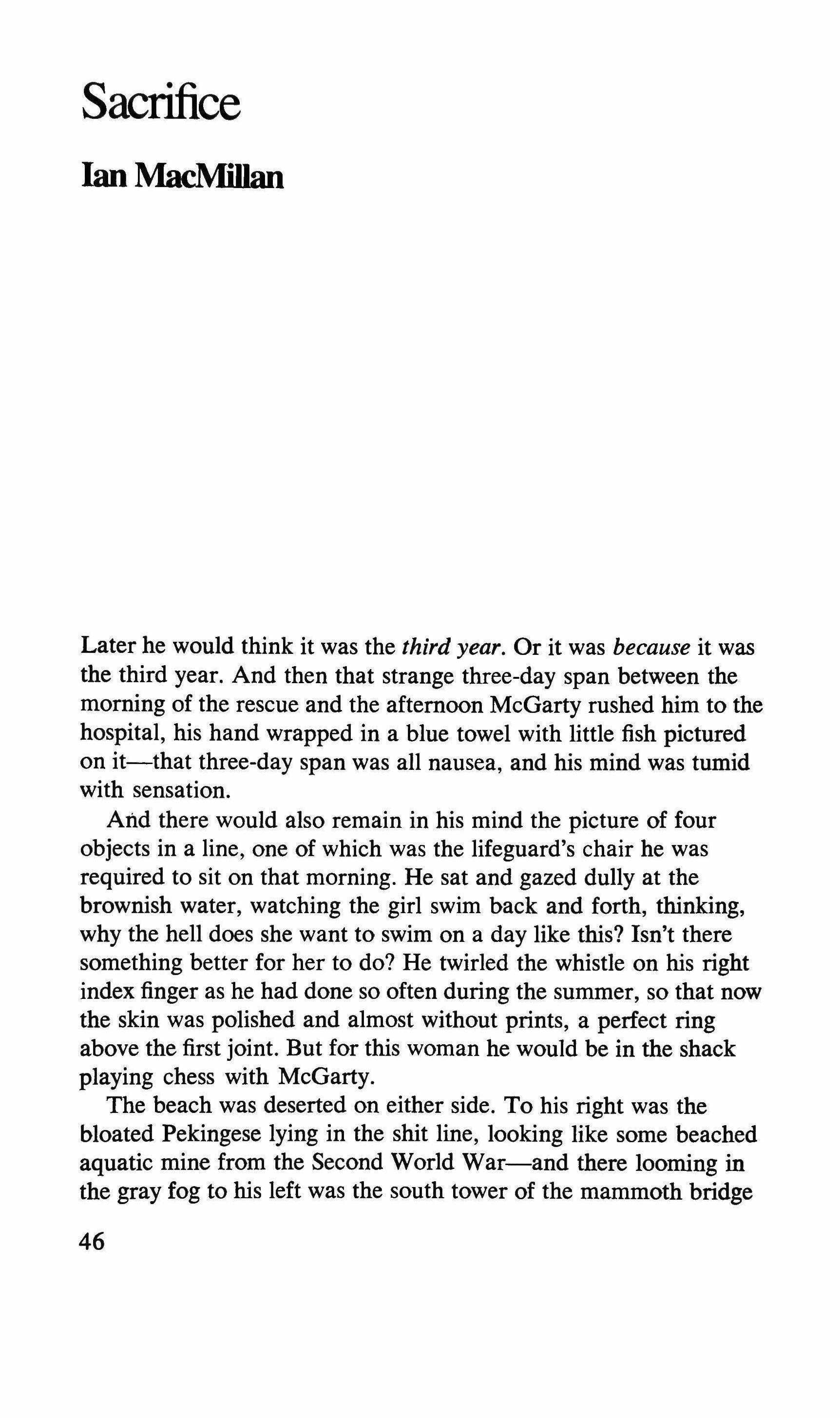
Later he would think it was the third year. Or it was because it was the third year. And then that strange three-day span between the morning of the rescue and the afternoon McGarty rushed him to the hospital, his hand wrapped in a blue towel with little fish pictured on it-that three-day span was all nausea, and his mind was tumid with sensation.
And there would also remain in his mind the picture of four objects in a line, one of which was the lifeguard's chair he was required to sit on that morning. He sat and gazed dully at the brownish water, watching the girl swim back and forth, thinking, why the hell does she want to swim on a day like this? Isn't there something better for her to do? He twirled the whistle on his right index finger as he had done so often during the summer, so that now the skin was polished and almost without prints, a perfect ring above the first joint. But for this woman he would be in the shack playing chess with McGarty.
The beach was deserted on either side. To his right was the bloated Pekingese lying in the shit line, looking like some beached aquatic mine from the Second World War-and there looming in the gray fog to his left was the south tower of the mammoth bridge
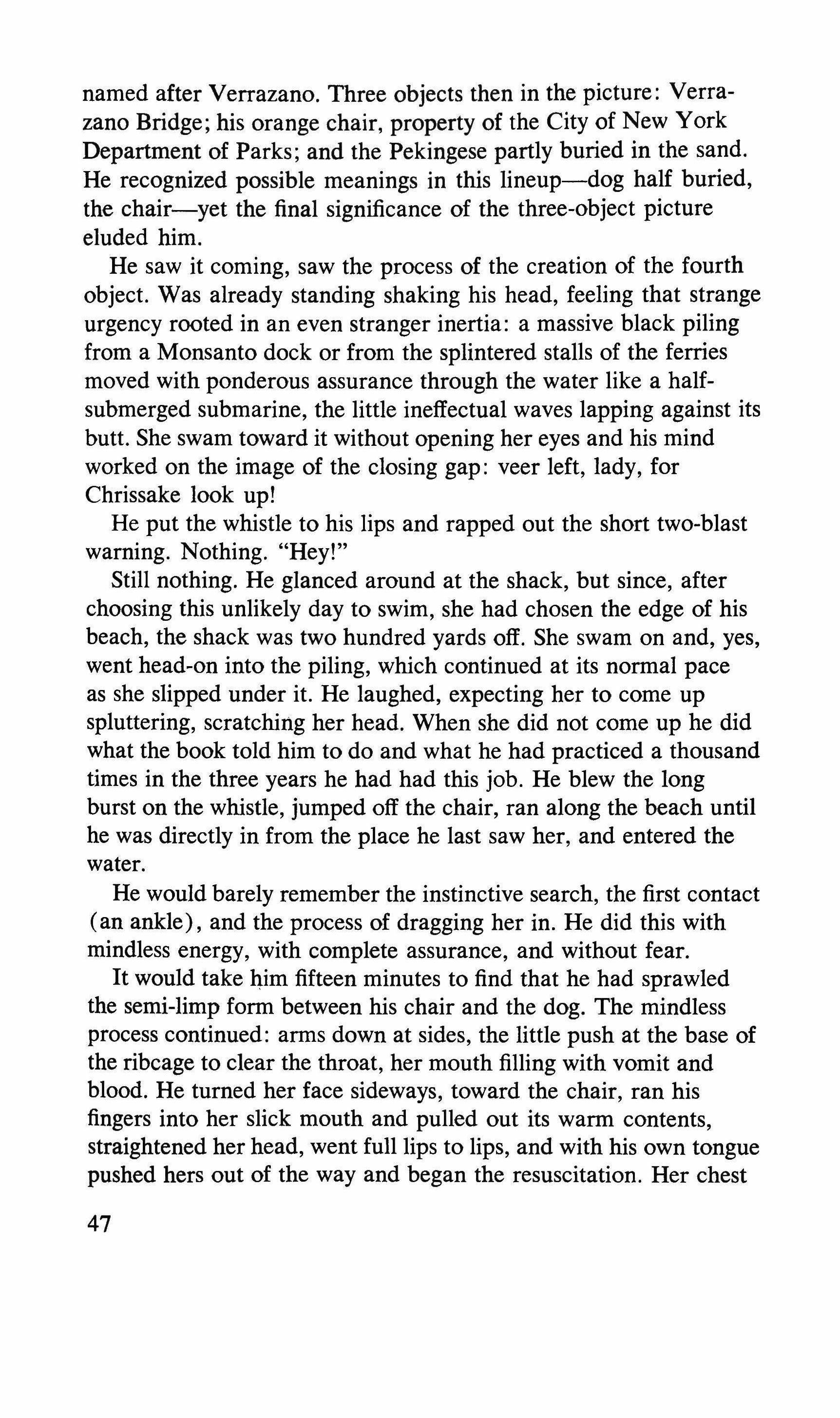
named after Verrazano. Three objects then in the picture: Verrazano Bridge; his orange chair, property of the City of New York Department of Parks; and the Pekingese partly buried in the sand. He recognized possible meanings in this lineup-dog half buried, the chair-yet the final significance of the three-object picture eluded him.
He saw it coming, saw the process of the creation of the fourth object. Was already standing shaking his head, feeling that strange urgency rooted in an even stranger inertia: a massive black piling from a Monsanto dock or from the splintered stalls of the ferries moved with ponderous assurance through the water like a halfsubmerged submarine, the little ineffectual waves lapping against its butt. She swam toward it without opening her eyes and his mind worked on the image of the closing gap: veer left, lady, for Chrissake look up!
He put the whistle to his lips and rapped out the short two-blast warning. Nothing. "Hey!"
Still nothing. He glanced around at the shack, but since, after choosing this unlikely day to swim, she had chosen the edge of his beach, the shack was two hundred yards off. She swam on and, yes, went head-on into the piling, which continued at its normal pace as she slipped under it. He laughed, expecting her to come up spluttering, scratching her head. When she did not come up he did what the book told him to do and what he had practiced a thousand times in the three years he had had this job. He blew the long burst on the whistle, jumped off the chair, ran along the beach until he was directly in from the place he last saw her, and entered the water.
He would barely remember the instinctive search, the first contact (an ankle), and the process of dragging her in. He did this with mindless energy, with complete assurance, and without fear. It would take him fifteen minutes to find that he had sprawled the semi-limp form between his chair and the dog. The mindless process continued: arms down at sides, the little push at the base of the ribcage to clear the throat, her mouth filling with vomit and blood. He turned her face sideways, toward the chair, ran his fingers into her slick mouth and pulled out its warm contents, straightened her head, went full lips to lips, and with his own tongue pushed hers out of the way and began the resuscitation. Her chest 47
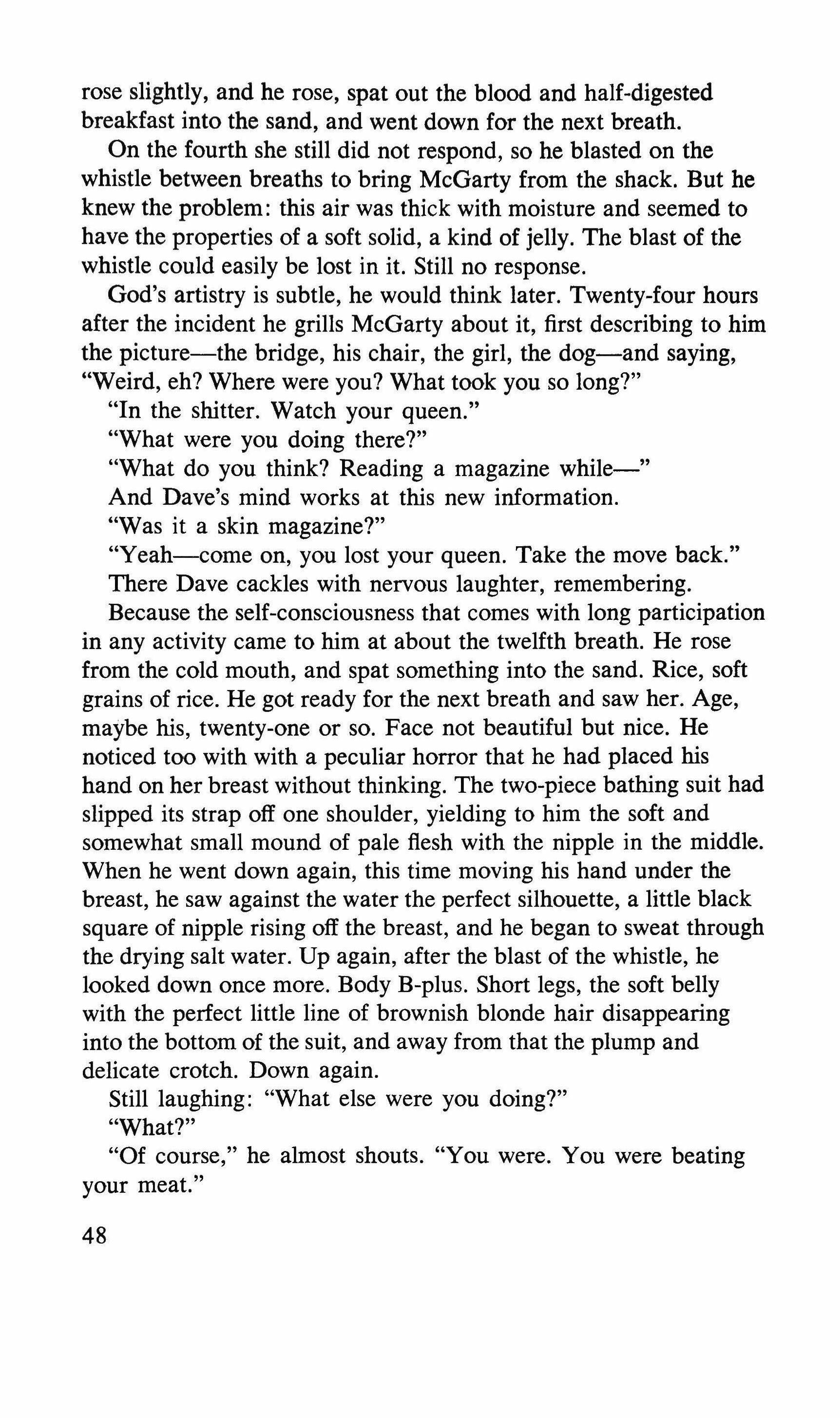
rose slightly, and he rose, spat out the blood and half-digested breakfast into the sand, and went down for the next breath.
On the fourth she still did not respond, so he blasted on the whistle between breaths to bring McGarty from the shack. But he knew the problem: this air was thick with moisture and seemed to have the properties of a soft solid, a kind of jelly. The blast of the whistle could easily be lost in it. Still no response.
God's artistry is subtle, he would think later. Twenty-four hours after the incident he grills McGarty about it, first describing to him the picture-the bridge, his chair, the girl, the dog-and saying, "Weird, eh? Where were you? What took you so long?"
"In the shitter. Watch your queen."
"What were you doing there?"
"What do you think? Reading a magazine while-" And Dave's mind works at this new information.
"Was it a skin magazine?"
"Yeah-come on, you lost your queen. Take the move back."
There Dave cackles with nervous laughter, remembering. Because the self-consciousness that comes with long participation in any activity came to him at about the twelfth breath. He rose from the cold mouth, and spat something into the sand. Rice, soft grains of rice. He got ready for the next breath and saw her. Age, maybe his, twenty-one or so. Face not beautiful but nice. He noticed too with with a peculiar horror that he had placed his hand on her breast without thinking. The two-piece bathing suit had slipped its strap off one shoulder, yielding to him the soft and somewhat small mound of pale flesh with the nipple in the middle. When he went down again, this time moving his hand under the breast, he saw against the water the perfect silhouette, a little black square of nipple rising off the breast, and he began to sweat through the drying salt water. Up again, after the blast of the whistle, he looked down once more. Body B-plus. Short legs, the soft belly with the perfect little line of brownish blonde hair disappearing into the bottom of the suit, and away from that the plump and delicate crotch. Down again.
Still laughing: "What else were you doing?"
"What?"
"Of course," he almost shouts. "You were. You were beating your meat."
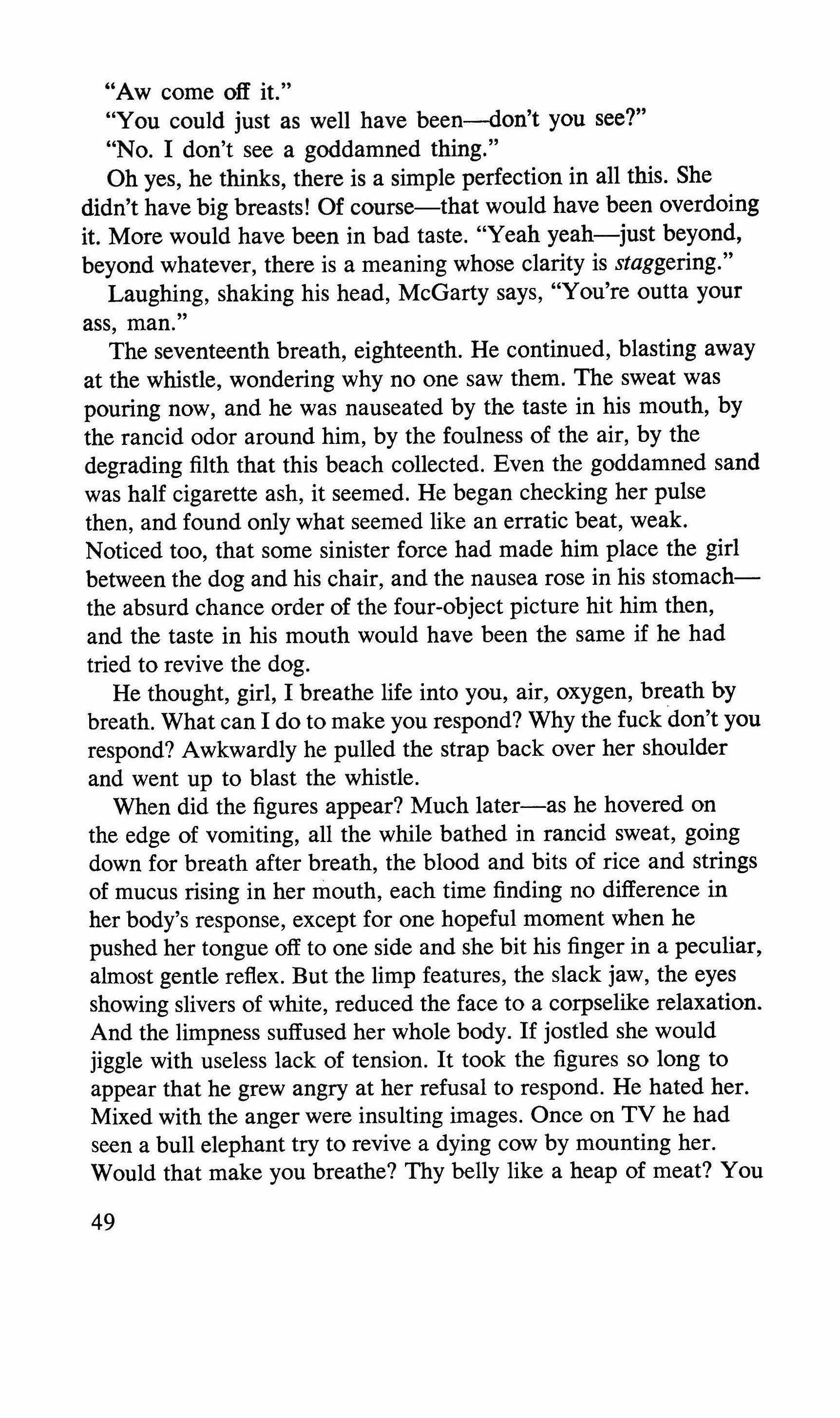
"Aw come off it."
"You could just as well have been--don't you see?"
"No. I don't see a goddamned thing."
Oh yes, he thinks, there is a simple perfection in all this. She didn't have big breasts! Of course-that would have been overdoing it. More would have been in bad taste. "Yeah yeah-just beyond, beyond whatever, there is a meaning whose clarity is staggering."
Laughing, shaking his head, McGarty says, "You're outta your ass, man."
The seventeenth breath, eighteenth. He continued, blasting away at the whistle, wondering why no one saw them. The sweat was pouring now, and he was nauseated by the taste in his mouth, by the rancid odor around him, by the foulness of the air, by the degrading filth that this beach collected. Even the goddamned sand was half cigarette ash, it seemed. He began checking her pulse then, and found only what seemed like an erratic beat, weak. Noticed too, that some sinister force had made him place the girl between the dog and his chair, and the nausea rose in his stomachthe absurd chance order of the four-object picture hit him then, and the taste in his mouth would have been the same if he had tried to revive the dog.
He thought, girl, I breathe life into you, air, oxygen, breath by breath. What can I do to make you respond? Why the fuck don't you respond? Awkwardly he pulled the strap back over her shoulder and went up to blast the whistle.
When did the figures appear? Much later-as he hovered on the edge of vomiting, all the while bathed in rancid sweat, going down for breath after breath, the blood and bits of rice and strings of mucus rising in her mouth, each time finding no difference in her body's response, except for one hopeful moment when he pushed her tongue off to one side and she bit his finger in a peculiar, almost gentle reflex. But the limp features, the slack jaw, the eyes showing slivers of white, reduced the face to a corpselike relaxation. And the limpness suffused her whole body. If jostled she would jiggle with useless lack of tension. It took the figures so long to appear that he grew angry at her refusal to respond. He hated her. Mixed with the anger were insulting images. Once on TV he had seen a bull elephant try to revive a dying cow by mounting her. Would that make you breathe? Thy belly like a heap of meat? You

with your snooty coquetry refusing to live regardless of what I do? He rose to yell, "God damn sonovabitch!"
And saw McGarty, struggling his way with the resuscitator in slow motion because of the heavy sand, his form offset by the weight of the case, and then carne the distant wail of a siren. Dave screamed "Hurry" and went down again, now seeing forms running his way from Midland Beach, the next one down the line, the larger one where the crowds went. McGarty carne swearing, "Oh Christ almighty, goddam, Oh Jesus-" and undid the case, opened the valve on the bottle and jammed the little finger-shaped cage of wire into the mouth to keep the tongue out of the way, and then slapped on the mouthpiece. Dave crawled away toward the water, hearing the hiss click hiss click of the machine, and let his stomach have its way.
He made no assumptions after they took her away. He remained in a warm cloud, hardly hearing the voices of the younger lifeguards from Midland asking him what happened, what happened? They pestered him until he finally threw his hands up and yelled, "Get that fucking dog off the beach. Get it off now!"
They used sticks and a plastic bag, all working in his peripheral vision, muttering, "Hey, there's a bullet hole in its head." He heard the swish and plump of the dog being dropped into the bag and immediately smelled the result of its being disturbed from its rest.
A bullet hole.
"What do you want us to do with it?"
"Jesus Christ! What to do with it? What to-- Jesus!" He looked at them gazing back at him with suppressed humor, insolently feigning respect and attention. "Take it up to the shack and see if you can revive it. Put it in my locker." Laughing, they walked off. He could talk to them like that-he could yell at them. "Animals," he muttered. At twenty-one he was considered ancient, after three years he was considered boss almost. Him and McGarty, who had asked the lieutenant for Ocean Breeze instead of Midland to let them off easy this time, to permit them to waive responsibility for the avalanche of flesh that carne to them from the bridge, to let them off from the business of breaking up fights, ejecting drunks, keeping people inside the lines, mediating disputes over squatters' rights to trivial patches of sand. He would think of himself as over the hill-poor Dave, who recognized somewhere along the way 50
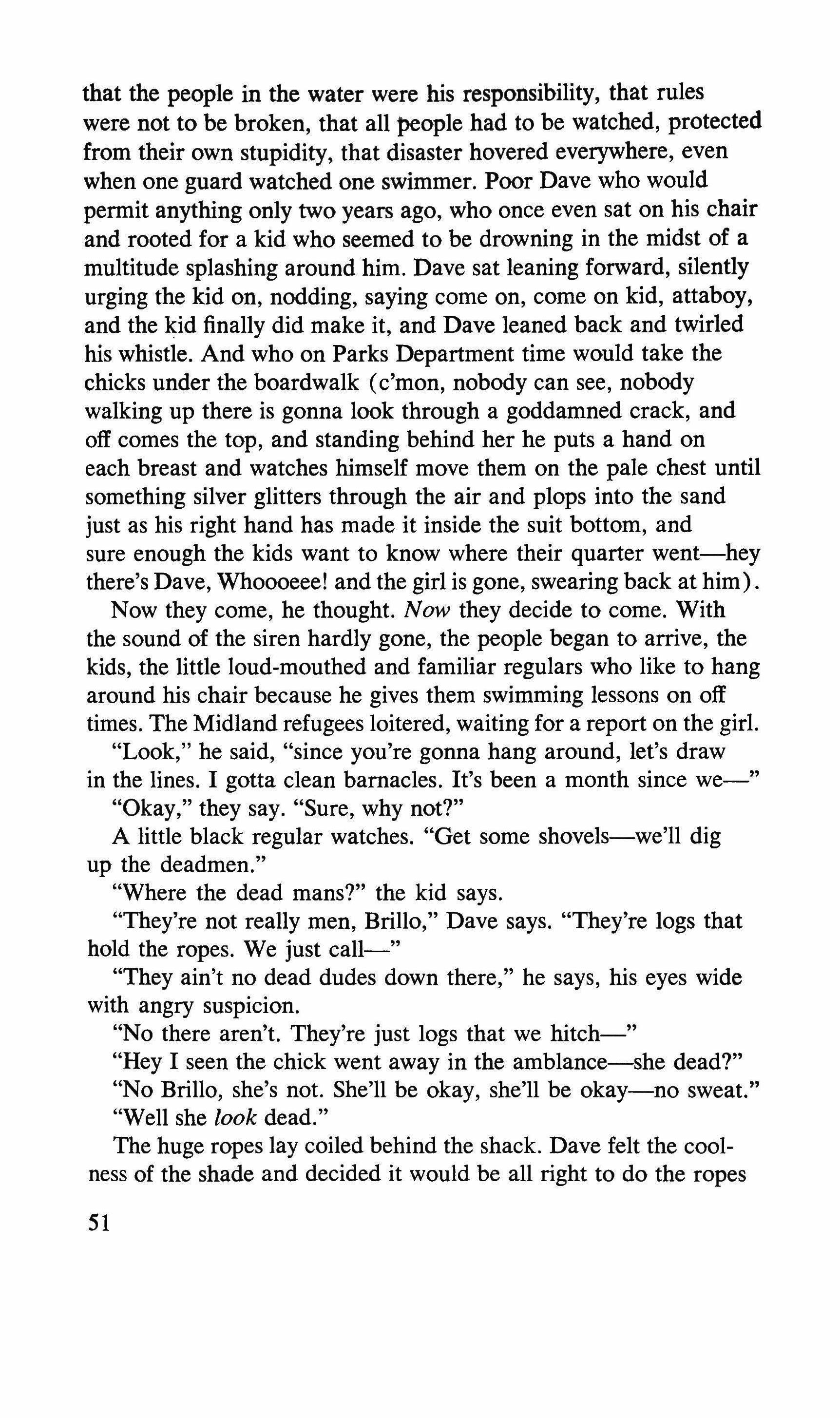
that the people in the water were his responsibility, that rules were not to be broken, that all people had to be watched, protected from their own stupidity, that disaster hovered everywhere, even when one guard watched one swimmer. Poor Dave who would permit anything only two years ago, who once even sat on his chair and rooted for a kid who seemed to be drowning in the midst of a multitude splashing around him. Dave sat leaning forward, silently urging the kid on, nodding, saying come on, come on kid, attaboy, and the kid finally did make it, and Dave leaned back and twirled his whistle. And who on Parks Department time would take the chicks under the boardwalk (c'mon, nobody can see, nobody walking up there is gonna look through a goddamned crack, and off comes the top, and standing behind her he puts a hand on each breast and watches himself move them on the pale chest until something silver glitters through the air and plops into the sand just as his right hand has made it inside the suit bottom, and sure enough the kids want to know where their quarter went-hey there's Dave, Whoooeee! and the girl is gone, swearing back at him).
Now they come, he thought. Now they decide to come. With the sound of the siren hardly gone, the people began to arrive, the kids, the little loud-mouthed and familiar regulars who like to hang around his chair because he gives them swimming lessons on off times. The Midland refugees loitered, waiting for a report on the girl.
"Look," he said, "since you're gonna hang around, let's draw in the lines. I gotta clean barnacles. It's been a month since we-" "Okay," they say. "Sure, why not?"
A little black regular watches. "Get some shovels-we'll dig up the deadmen."
"Where the dead mans?" the kid says.
"They're not really men, Brillo," Dave says. "They're logs that hold the ropes. We just call-"
"They ain't no dead dudes down there," he says, his eyes wide with angry suspicion.
"No there aren't. They're just logs that we hitch-"
"Hey I seen the chick went away in the ambIance-she dead?"
"No Brillo, she's not. She'll be okay, she'll be okay-no sweat."
"Well she look dead."
The huge ropes lay coiled behind the shack. Dave felt the coolness of the shade and decided it would be all right to do the ropes
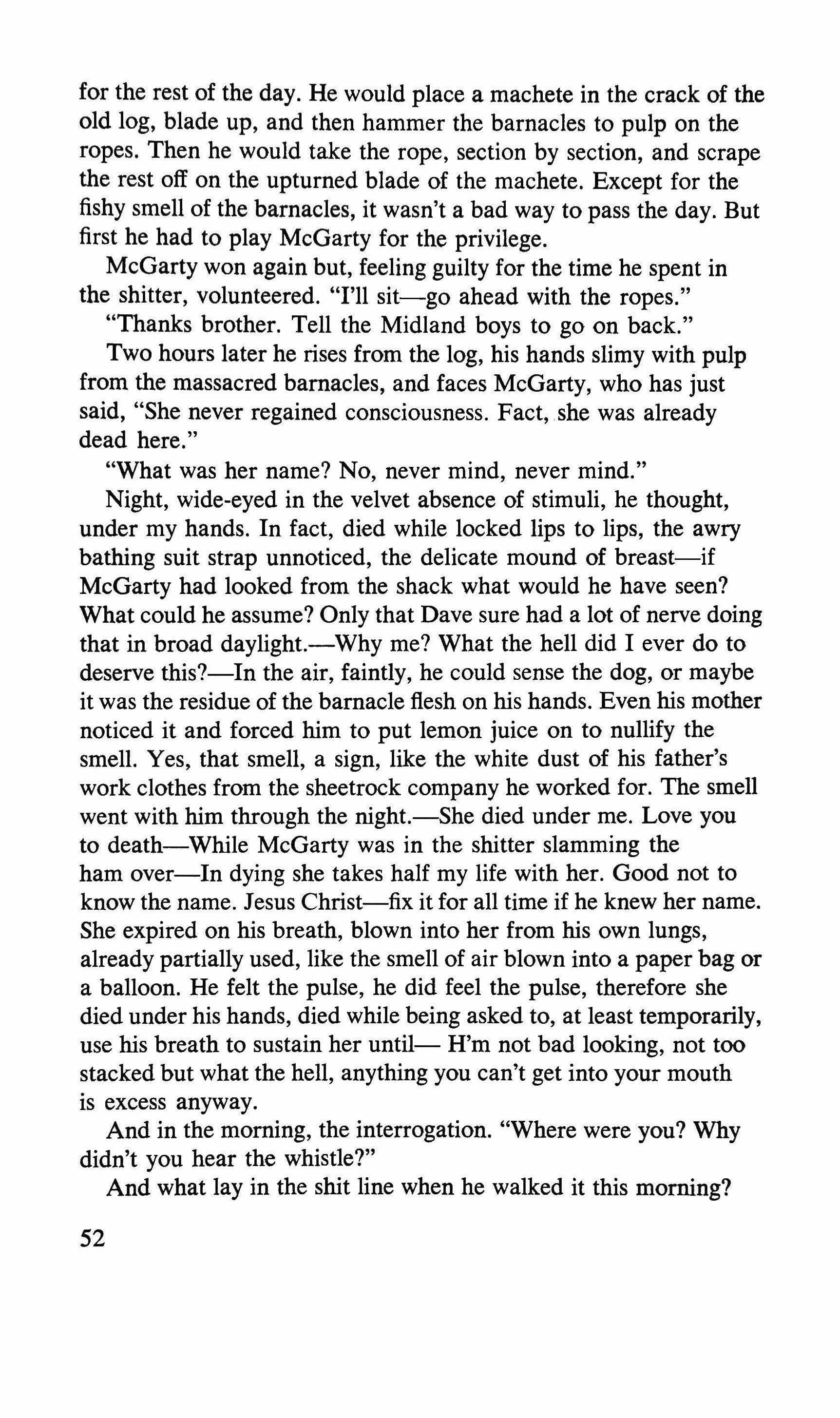
for the rest of the day. He would place a machete in the crack of the old log, blade up, and then hammer the barnacles to pulp on the ropes. Then he would take the rope, section by section, and scrape the rest off on the upturned blade of the machete. Except for the fishy smell of the barnacles, it wasn't a bad way to pass the day. But first he had to play MeGarty for the privilege.
McGarty won again but, feeling guilty for the time he spent in the shitter, volunteered. "I'll sit-go ahead with the ropes."
"Thanks brother. Tell the Midland boys to go on back."
Two hours later he rises from the log, his hands slimy with pulp from the massacred barnacles, and faces McGarty, who has just said, "She never regained consciousness. Fact, she was already dead here."
"What was her name? No, never mind, never mind."
Night, wide-eyed in the velvet absence of stimuli, he thought, under my hands. In fact, died while locked lips to lips, the awry bathing suit strap unnoticed, the delicate mound of breast-if McGarty had looked from the shack what would he have seen? What could he assume? Only that Dave sure had a lot of nerve doing that in broad daylight.-Why me? What the hell did I ever do to deserve this?-In the air, faintly, he could sense the dog, or maybe it was the residue of the barnacle flesh on his hands. Even his mother noticed it and forced him to put lemon juice on to nullify the smell. Yes, that smell, a sign, like the white dust of his father's work clothes from the sheetrock company he worked for. The smell went with him through the night.-She died under me. Love you to death-While McGarty was in the shitter slamming the ham over-In dying she takes half my life with her. Good not to know the name. Jesus Christ-fix it for all time if he knew her name. She expired on his breath, blown into her from his own lungs, already partially used, like the smell of air blown into a paper bag or a balloon. He felt the pulse, he did feel the pulse, therefore she died under his hands, died while being asked to, at least temporarily, use his breath to sustain her until- H'm not bad looking, not too stacked but what the hell, anything you can't get into your mouth is excess anyway.
And in the morning, the interrogation. "Where were you? Why didn't you hear the whistle?"
And what lay in the shit line when he walked it this morning?
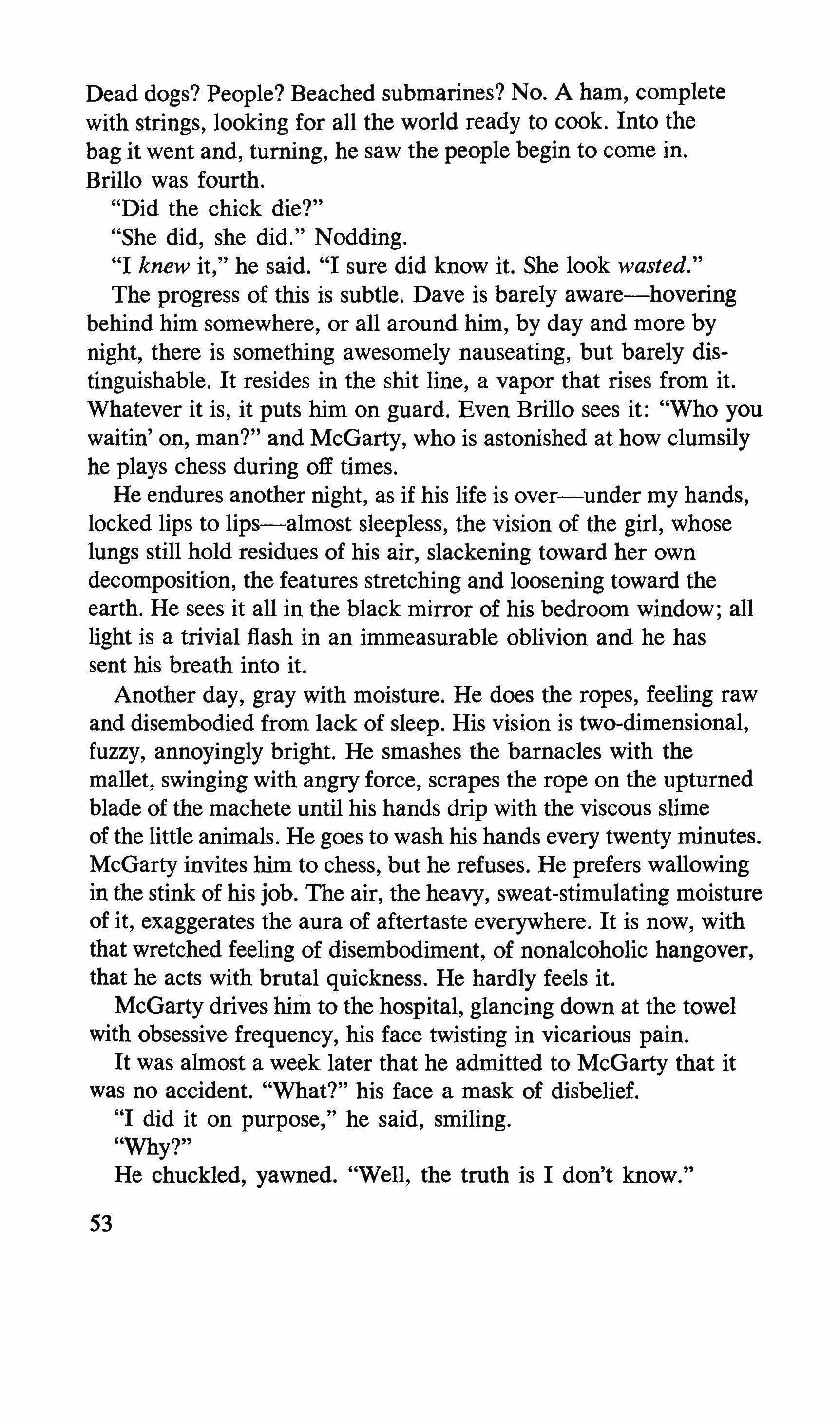
Dead dogs? People? Beached submarines? No. A ham, complete with strings, looking for all the world ready to cook. Into the bag it went and, turning, he saw the people begin to come in.
Brillo was fourth.
"Did the chick die?"
"She did, she did." Nodding.
"I knew it," he said. "I sure did know it. She look wasted."
The progress of this is subtle. Dave is barely aware-hovering behind him somewhere, or all around him, by day and more by night, there is something awesomely nauseating, but barely distinguishable. It resides in the shit line, a vapor that rises from it. Whatever it is, it puts him on guard. Even Brillo sees it: "Who you waitin' on, man?" and McGarty, who is astonished at how clumsily he plays chess during off times.
He endures another night, as if his life is over-under my hands, locked lips to lips-almost sleepless, the vision of the girl, whose lungs still hold residues of his air, slackening toward her own decomposition, the features stretching and loosening toward the earth. He sees it all in the black mirror of his bedroom window; all light is a trivial flash in an immeasurable oblivion and he has sent his breath into it.
Another day, gray with moisture. He does the ropes, feeling raw and disembodied from lack of sleep. His vision is two-dimensional, fuzzy, annoyingly bright. He smashes the barnacles with the mallet, swinging with angry force, scrapes the rope on the upturned blade of the machete until his hands drip with the viscous slime of the little animals. He goes to wash his hands every twenty minutes. McGarty invites him to chess, but he refuses. He prefers wallowing in the stink of his job. The air, the heavy, sweat-stimulating moisture of it, exaggerates the aura of aftertaste everywhere. It is now, with that wretched feeling of disembodiment, of nonalcoholic hangover, that he acts with brutal quickness. He hardly feels it.
McGarty drives him to the hospital, glancing down at the towel with obsessive frequency, his face twisting in vicarious pain. It was almost a week later that he admitted to McGarty that it was no accident. "What?" his face a mask of disbelief.
"I did it on purpose," he said, smiling. "Why?"
He chuckled, yawned. "Well, the truth is I don't know."
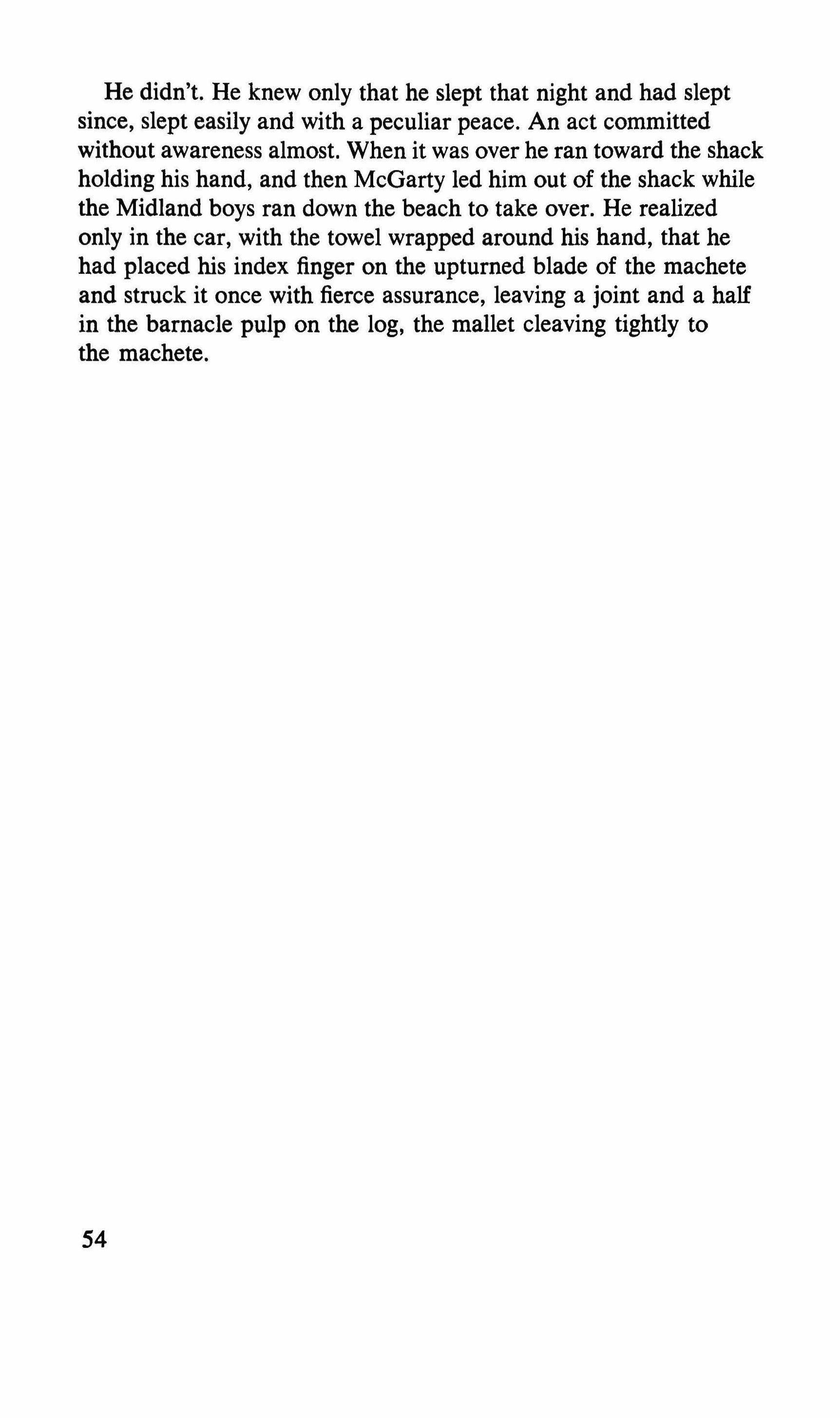
He didn't. He knew only that he slept that night and had slept since, slept easily and with a peculiar peace. An act committed without awareness almost. When it was over he ran toward the shack holding his hand, and then McGarty led him out of the shack while the Midland boys ran down the beach to take over. He realized only in the car, with the towel wrapped around his hand, that he had placed his index finger on the upturned blade of the machete and struck it once with fierce assurance, leaving a joint and a half in the barnacle pulp on the log, the mallet cleaving tightly to the machete.
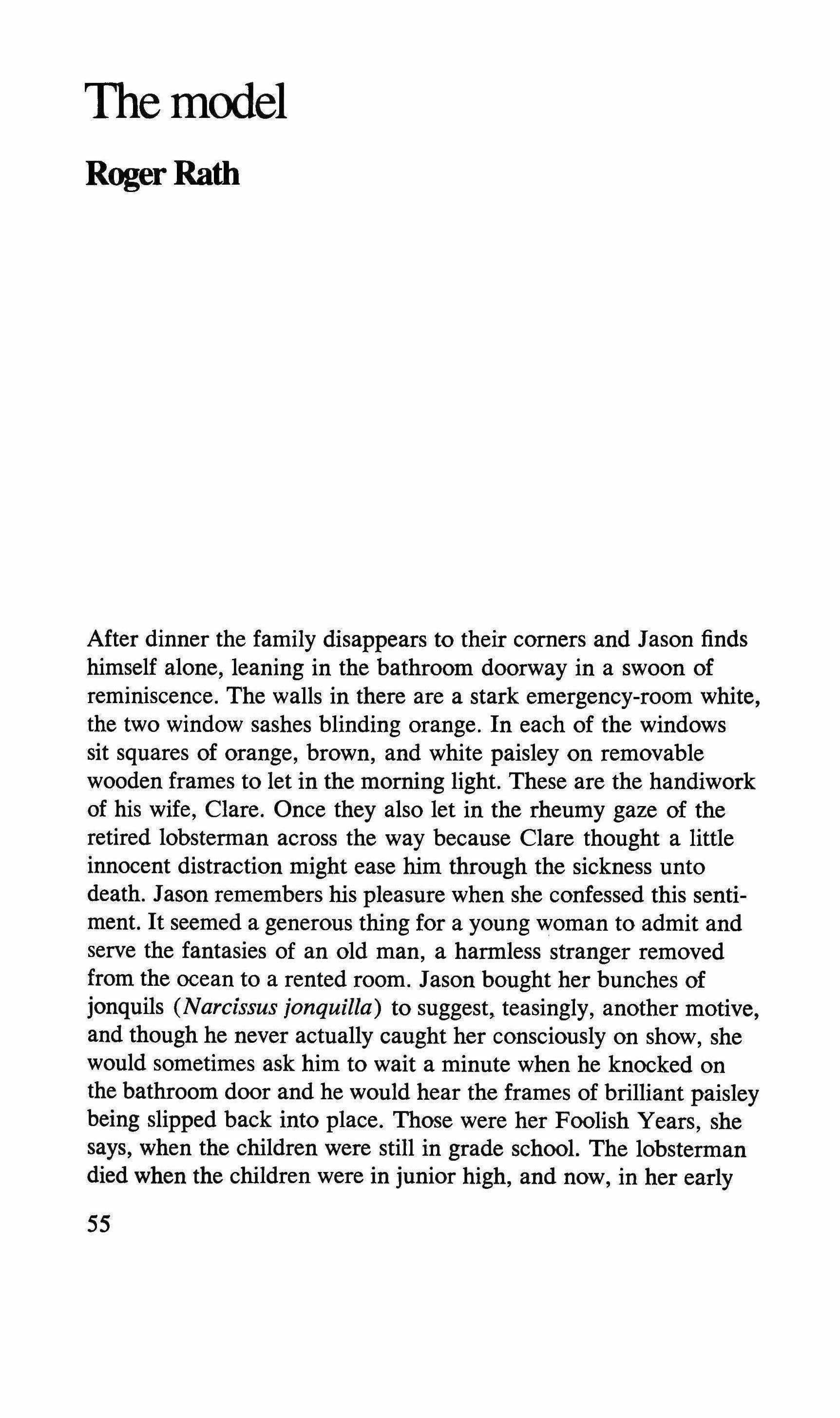
After dinner the family disappears to their corners and Jason finds himself alone, leaning in the bathroom doorway in a swoon of reminiscence. The walls in there are a stark emergency-room white, the two window sashes blinding orange. In each of the windows sit squares of orange, brown, and white paisley on removable wooden frames to let in the morning light. These are the handiwork of his wife, Clare. Once they also let in the rheumy gaze of the retired lobsterman across the way because Clare thought a little innocent distraction might ease him through the sickness unto death. Jason remembers his pleasure when she confessed this sentiment. It seemed a generous thing for a young woman to admit and serve the fantasies of an old man, a harmless stranger removed from the ocean to a rented room. Jason bought her bunches of jonquils (Narcissus jonquilla) to suggest, teasingly, another motive, and though he never actually caught her consciously on show, she would sometimes ask him to wait a minute when he knocked on the bathroom door and he would hear the frames of brilliant paisley being slipped back into place. Those were her Foolish Years, she says, when the children were still in grade school. The lobsterman died when the children were in junior high, and now, in her early
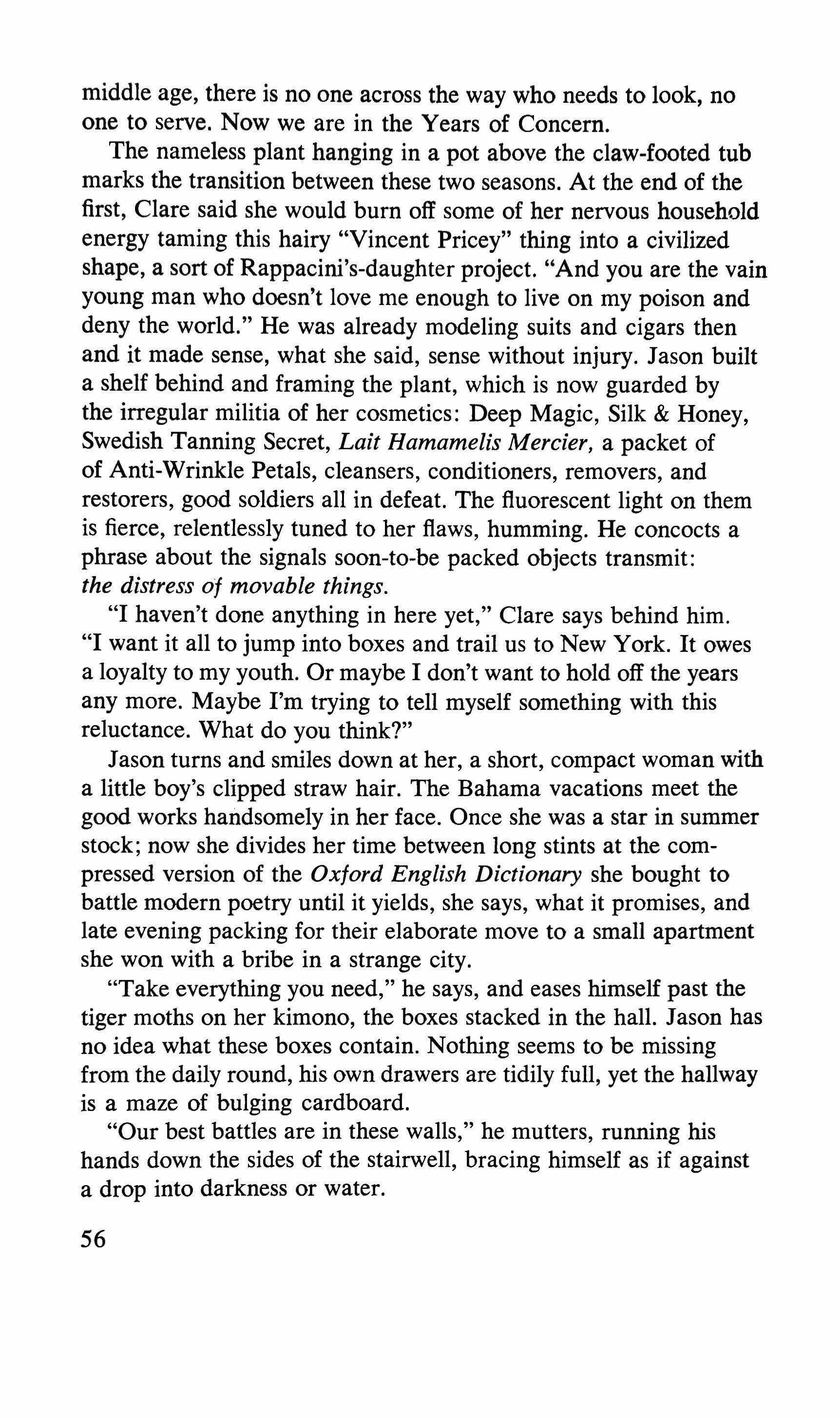
middle age, there is no one across the way who needs to look, no one to serve. Now we are in the Years of Concern.
The nameless plant hanging in a pot above the claw-footed tub marks the transition between these two seasons. At the end of the first, Clare said she would burn off some of her nervous household energy taming this hairy "Vincent Pricey" thing into a civilized shape, a sort of Rappacini's-daughter project. "And you are the vain young man who doesn't love me enough to live on my poison and deny the world." He was already modeling suits and cigars then and it made sense, what she said, sense without injury. Jason built a shelf behind and framing the plant, which is now guarded by the irregular militia of her cosmetics: Deep Magic, Silk & Honey, Swedish Tanning Secret, Lait Hamamelis Mercier, a packet of of Anti-Wrinkle Petals, cleansers, conditioners, removers, and restorers, good soldiers all in defeat. The fluorescent light on them is fierce, relentlessly tuned to her flaws, humming. He concocts a phrase about the signals soon-to-be packed objects transmit: the distress of movable things.
"I haven't done anything in here yet," Clare says behind him. "I want it all to jump into boxes and trail us to New York. It owes a loyalty to my youth. Or maybe I don't want to hold off the years any more. Maybe I'm trying to tell myself something with this reluctance. What do you think?"
Jason turns and smiles down at her, a short, compact woman with a little boy's clipped straw hair. The Bahama vacations meet the good works handsomely in her face. Once she was a star in summer stock; now she divides her time between long stints at the compressed version of the Oxford English Dictionary she bought to battle modern poetry until it yields, she says, what it promises, and late evening packing for their elaborate move to a small apartment she won with a bribe in a strange city.
"Take everything you need," he says, and eases himself past the tiger moths on her kimono, the boxes stacked in the hall. Jason has no idea what these boxes contain. Nothing seems to be missing from the daily round, his own drawers are tidily full, yet the hallway is a maze of bulging cardboard.
"Our best battles are in these walls," he mutters, running his hands down the sides of the stairwell, bracing himself as if against a drop into darkness or water.
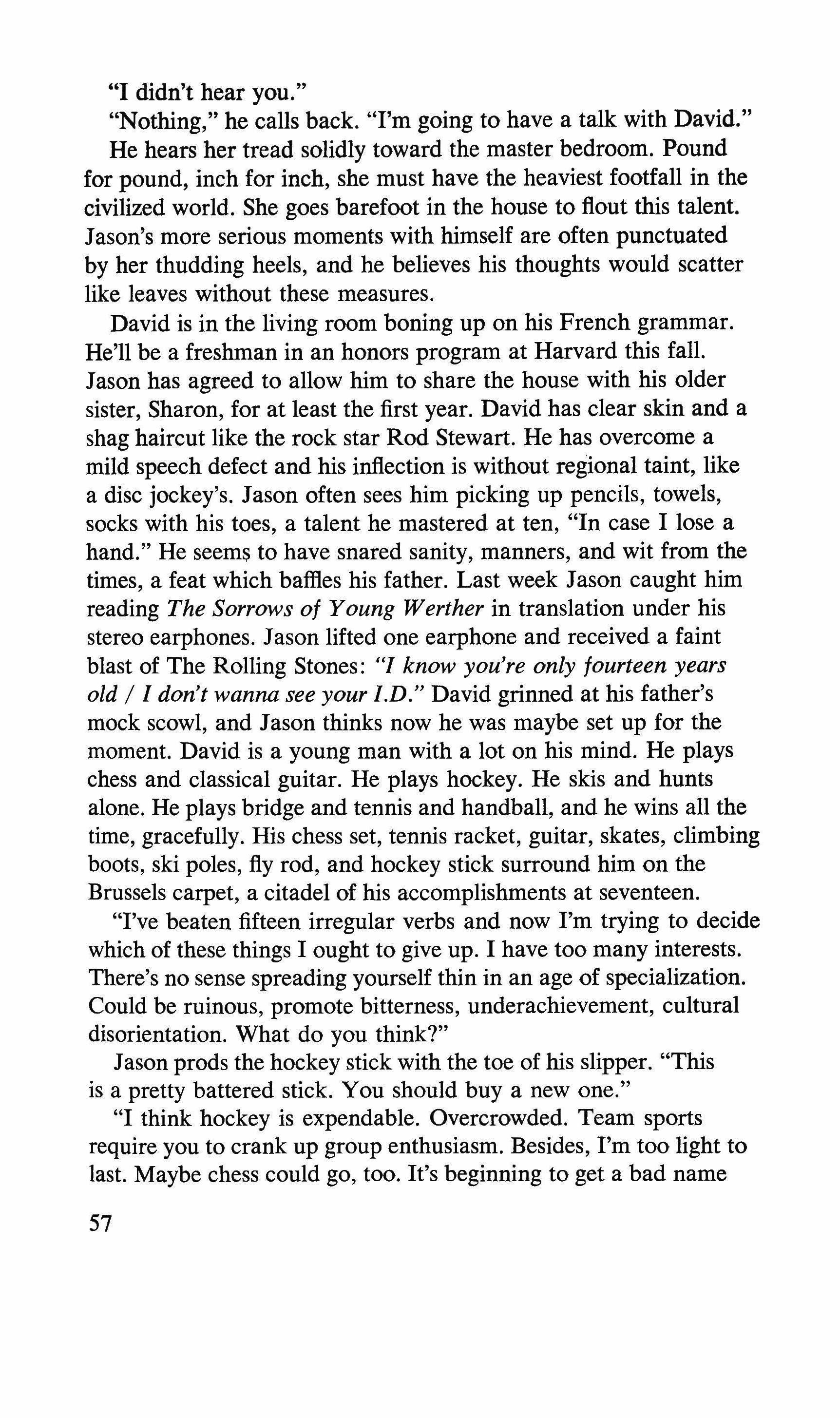
"I didn't hear you."
"Nothing," he calls back. "I'm going to have a talk with David." He hears her tread solidly toward the master bedroom. Pound for pound, inch for inch, she must have the heaviest footfall in the civilized world. She goes barefoot in the house to flout this talent. Jason's more serious moments with himself are often punctuated by her thudding heels, and he believes his thoughts would scatter like leaves without these measures.
David is in the living room boning up on his French grammar. He'll be a freshman in an honors program at Harvard this fall.
Jason has agreed to allow him to share the house with his older sister, Sharon, for at least the first year. David has clear skin and a shag haircut like the rock star Rod Stewart. He has overcome a mild speech defect and his inflection is without regional taint, like a disc jockey's. Jason often sees him picking up pencils, towels, socks with his toes, a talent he mastered at ten, "In case I lose a hand." He seems to have snared sanity, manners, and wit from the times, a feat which baffles his father. Last week Jason caught him reading The Sorrows of Young Werther in translation under his stereo earphones. Jason lifted one earphone and received a faint blast of The Rolling Stones: HI know you're only fourteen years old / I don't wanna see your I.D." David grinned at his father's mock scowl, and Jason thinks now he was maybe set up for the moment. David is a young man with a lot on his mind. He plays chess and classical guitar. He plays hockey. He skis and hunts alone. He plays bridge and tennis and handball, and he wins all the time, gracefully. His chess set, tennis racket, guitar, skates, climbing boots, ski poles, fly rod, and hockey stick surround him on the Brussels carpet, a citadel of his accomplishments at seventeen.
"I've beaten fifteen irregular verbs and now I'm trying to decide which of these things I ought to give up. I have too many interests. There's no sense spreading yourself thin in an age of specialization. Could be ruinous, promote bitterness, underachievement, cultural disorientation. What do you think?"
Jason prods the hockey stick with the toe of his slipper. "This is a pretty battered stick. You should buy a new one."
"I think hockey is expendable. Overcrowded. Team sports require you to crank up group enthusiasm. Besides, I'm too light to last. Maybe chess could go, too. It's beginning to get a bad name
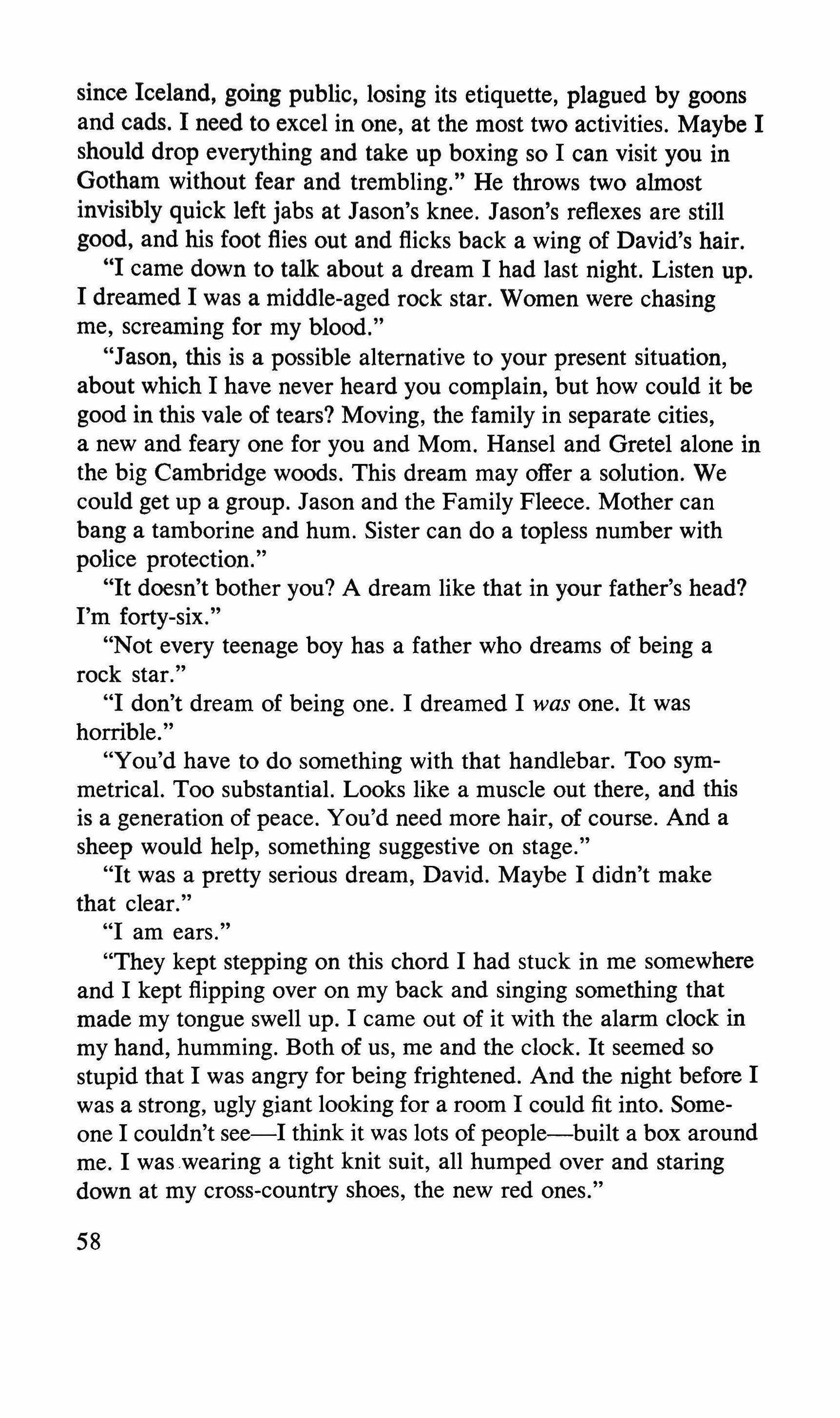
since Iceland, going public, losing its etiquette, plagued by goons and cads. I need to excel in one, at the most two activities. Maybe I should drop everything and take up boxing so I can visit you in Gotham without fear and trembling." He throws two almost invisibly quick left jabs at Jason's knee. Jason's reflexes are still good, and his foot flies out and flicks back a wing of David's hair.
"I came down to talk about a dream I had last night. Listen up. I dreamed I was a middle-aged rock star. Women were chasing me, screaming for my blood."
"Jason, this is a possible alternative to your present situation, about which I have never heard you complain, but how could it be good in this vale of tears? Moving, the family in separate cities, a new and feary one for you and Mom. Hansel and Gretel alone in the big Cambridge woods. This dream may offer a solution. We could get up a group. Jason and the Family Fleece. Mother can bang a tamborine and hum. Sister can do a topless number with police protection."
"It doesn't bother you? A dream like that in your father's head? I'm forty-six."
"Not every teenage boy has a father who dreams of being a rock star."
"I don't dream of being one. I dreamed I was one. It was horrible."
"You'd have to do something with that handlebar. Too symmetrical. Too substantial. Looks like a muscle out there, and this is a generation of peace. You'd need more hair, of course. And a sheep would help, something suggestive on stage."
"It was a pretty serious dream, David. Maybe I didn't make that clear."
"I am ears."
"They kept stepping on this chord I had stuck in me somewhere and I kept flipping over on my back and singing something that made my tongue swell up. I came out of it with the alarm clock in my hand, humming. Both of us, me and the clock. It seemed so stupid that I was angry for being frightened. And the night before I was a strong, ugly giant looking for a room I could fit into. Someone I couldn't see-I think it was lots of people-built a box around me. I was wearing a tight knit suit, all humped over and staring down at my cross-country shoes, the new red ones."
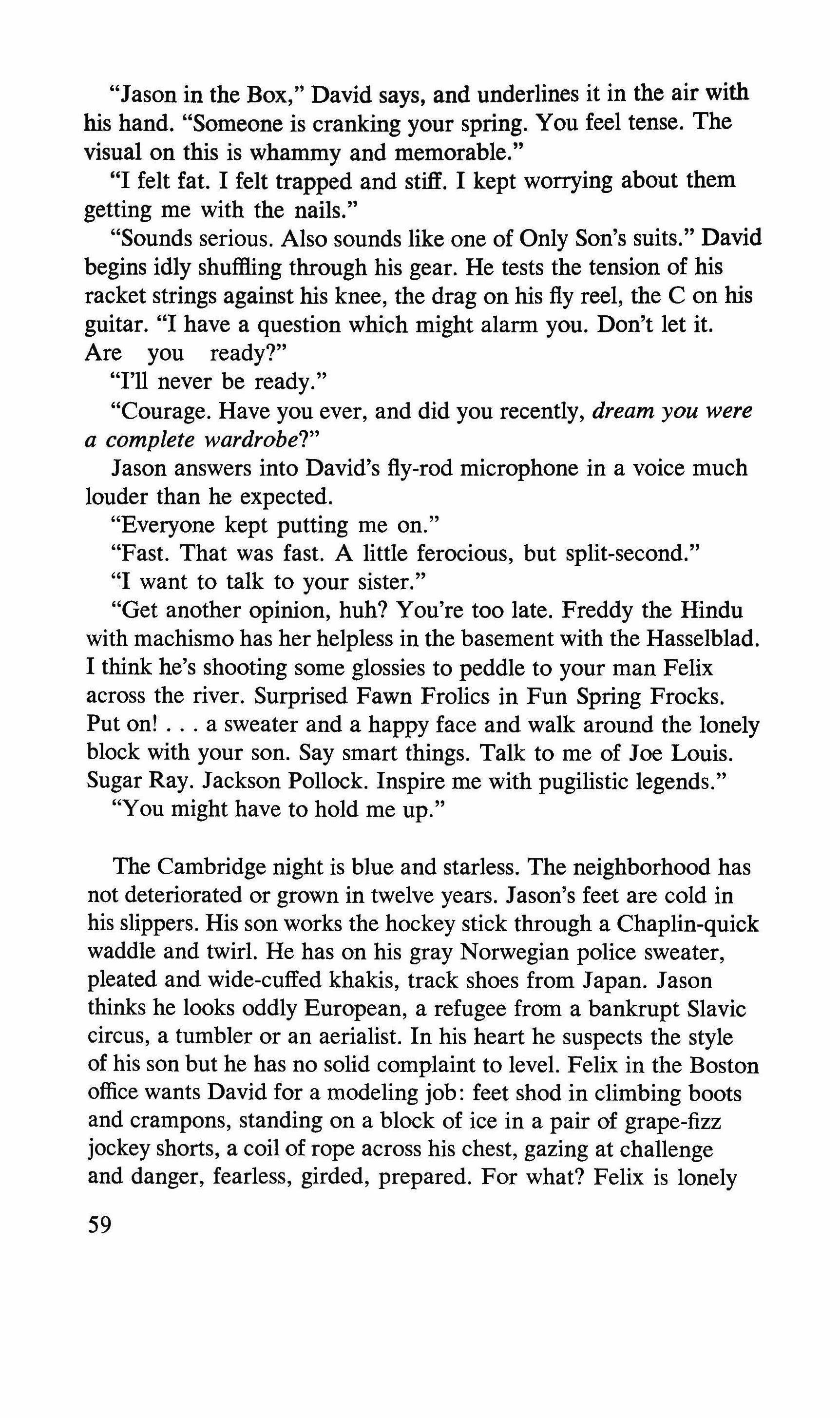
"Jason in the Box," David says, and underlines it in the air with his hand. "Someone is cranking your spring. You feel tense. The visual on this is whammy and memorable."
"I felt fat. I felt trapped and stiff. I kept worrying about them getting me with the nails."
"Sounds serious. Also sounds like one of Only Son's suits." David begins idly shuftling through his gear. He tests the tension of his racket strings against his knee, the drag on his fly reel, the C on his guitar. "I have a question which might alarm you. Don't let it. Are you ready?"
"I'll never be ready."
"Courage. Have you ever, and did you recently, dream you were a complete wardrobe?"
Jason answers into David's fly-rod microphone in a voice much louder than he expected.
"Everyone kept putting me on."
"Fast. That was fast. A little ferocious, but split-second."
'�I want to talk to your sister."
"Get another opinion, huh? You're too late. Freddy the Hindu with machismo has her helpless in the basement with the Hasselblad. I think he's shooting some glossies to peddle to your man Felix across the river. Surprised Fawn Frolics in Fun Spring Frocks. Put on! a sweater and a happy face and walk around the lonely block with your son. Say smart things. Talk to me of Joe Louis. Sugar Ray. Jackson Pollock. Inspire me with pugilistic legends."
"You might have to hold me up."
The Cambridge night is blue and starless. The neighborhood has not deteriorated or grown in twelve years. Jason's feet are cold in his slippers. His son works the hockey stick through a Chaplin-quick waddle and twirl. He has on his gray Norwegian police sweater, pleated and wide-cuffed khakis, track shoes from Japan. Jason thinks he looks oddly European, a refugee from a bankrupt Slavic circus, a tumbler or an aerialist. In his heart he suspects the style of his son but he has no solid complaint to level. Felix in the Boston office wants David for a modeling job: feet shod in climbing boots and crampons, standing on a block of ice in a pair of grape-fizz jockey shorts, a coil of rope across his chest, gazing at challenge and danger, fearless, girded, prepared. For what? Felix is lonely

and has his reasons, but Jason believes David will not be amazed or unkind if approached. For a moment David's sophistication saddens him; his son does not need to get this'contingency out in the open where fatherly advice might count. At seventeen Jason would have thrown a punch or an insult, a recognition which dismays and thrills him still.
David leaps from the sidewalk onto Hersh Rainey's lawn. "Nureyev," he sings in fluted syllables and plants his hockey stick blade up in Hersh's peonies. Skating back to Jason's side with his thumbs in the waistband of his khakis, David grunts, "Bobby Orr." Jason is shaken by this precise and playful dramatization of his concern. As they pass under the next streetlamp, he tries to look David in the eye to see how much he really knows. David winks, and Jason gives over to the charm of his son. Hersh will retaliate with a Nixon sticker on their bumper or a chopped cabbage in the morning mail. His son understands the neighbors. He is sensitive to their humor and foibles. At thirteen David carved a lobster out of soap for the old man who lived in the house Hersh bought. He cried. When I gave it to him, he cried, Daddy. It was a thoughtful thing to do, David. Maybe not. Maybe it just said I knew he was going to die. Jason is thinking of the war in which he did not die. In the final months of it, at nineteen, he was a tail gunner in a B-26 over Europe, 9th Air Force. That aircraft was famous for dropping on the approach to the runway like a stone. When he drives the dipping country roads which lead to the summer cottage the family rents on Newfound Lake, his stomach flies into his throat. He enjoys this foolish and nostalgic repetition of his warrior youth. He met his first wife in Nice after the war and lost her to that city while he was in Korea. In Indiana the faculty and students bought his paintings and prints for a song, Clare quoted pages and pages of Keats, the children were born. Now he is a male fashion model and a senior partner in an advertising firm because he met a persuasive man in a bar in Chicago. He is grateful he is no longer a boondock painter with small canvases to peddle, coeds to rescue, console, and escape. He reads Chekhov and weeps for the "general idea," the shape of God in man. He knows what this means. He has messages but he feels David doesn't need them and he holds them back without resentment fairly well.
"I feel blessed," he says to the night and wonders if this is true.
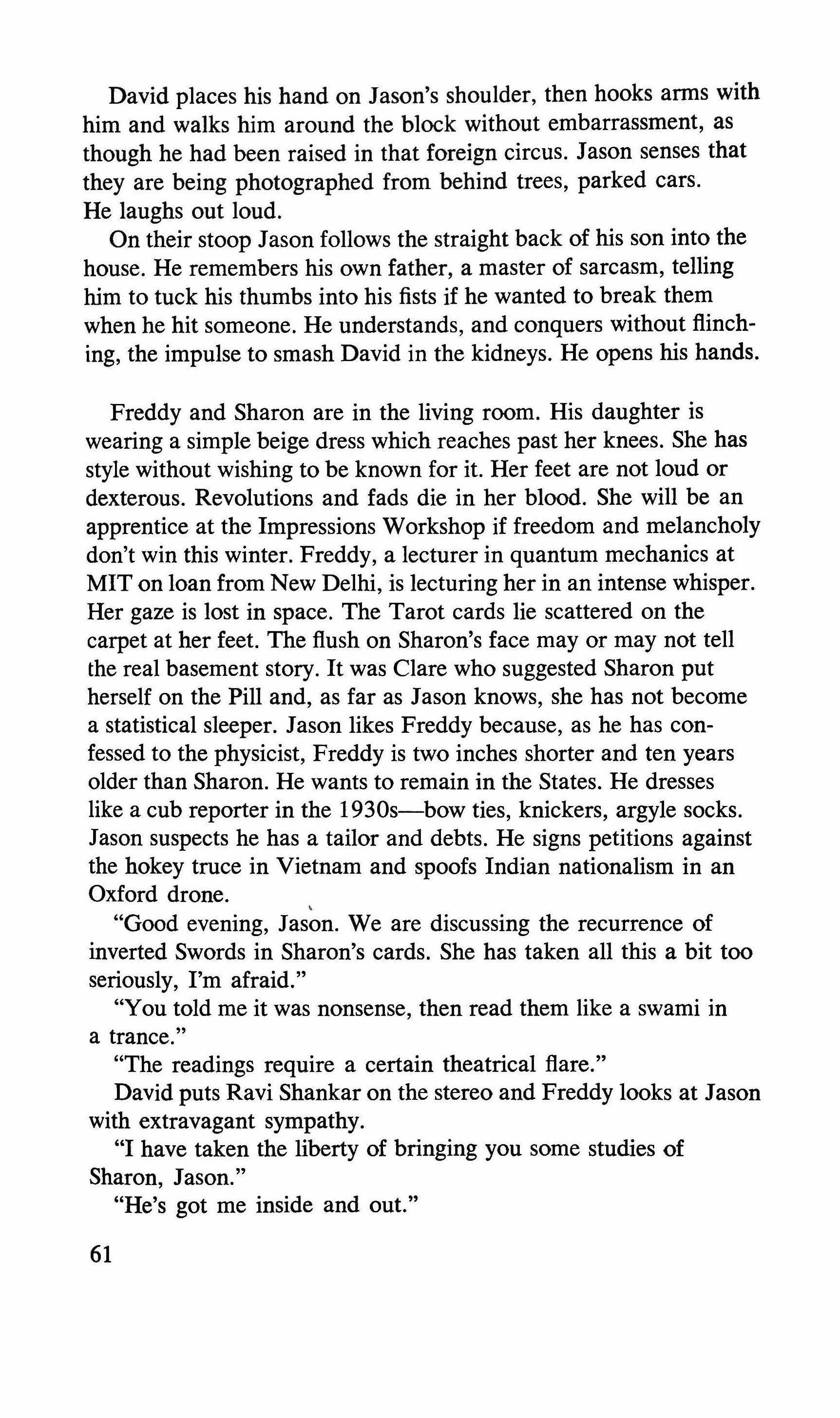
David places his hand on Jason's shoulder, then hooks arms with him and walks him around the block without embarrassment, as though he had been raised in that foreign circus. Jason senses that they are being photographed from behind trees, parked cars. He laughs out loud.
On their stoop Jason follows the straight back of his son into the house. He remembers his own father, a master of sarcasm, telling him to tuck his thumbs into his fists if he wanted to break them when he hit someone. He understands, and conquers without flinching, the impulse to smash David in the kidneys. He opens his hands.
Freddy and Sharon are in the living room. His daughter is wearing a simple beige dress which reaches past her knees. She has style without wishing to be known for it. Her feet are not loud or dexterous. Revolutions and fads die in her blood. She will be an apprentice at the Impressions Workshop if freedom and melancholy don't win this winter. Freddy, a lecturer in quantum mechanics at MIT on loan from New Delhi, is lecturing her in an intense whisper. Her gaze is lost in space. The Tarot cards lie scattered on the carpet at her feet. The flush on Sharon's face mayor may not tell the real basement story. It was Clare who suggested Sharon put herself on the Pill and, as far as Jason knows, she has not become a statistical sleeper. Jason likes Freddy because, as he has confessed to the physicist, Freddy is two inches shorter and ten years older than Sharon. He wants to remain in the States. He dresses like a cub reporter in the 1930s-bow ties, knickers, argyle socks. Jason suspects he has a tailor and debts. He signs petitions against the hokey truce in Vietnam and spoofs Indian nationalism in an Oxford drone.
"Good evening, Jason. We are discussing the recurrence of inverted Swords in Sharon's cards. She has taken all this a bit too seriously, I'm afraid."
"You told me it was nonsense, then read them like a swami in a trance."
"The readings require a certain theatrical flare."
David puts Ravi Shankar on the stereo and Freddy looks at Jason with extravagant sympathy.
"I have taken the liberty of bringing you some studies of Sharon, Jason."
"He's got me inside and out."
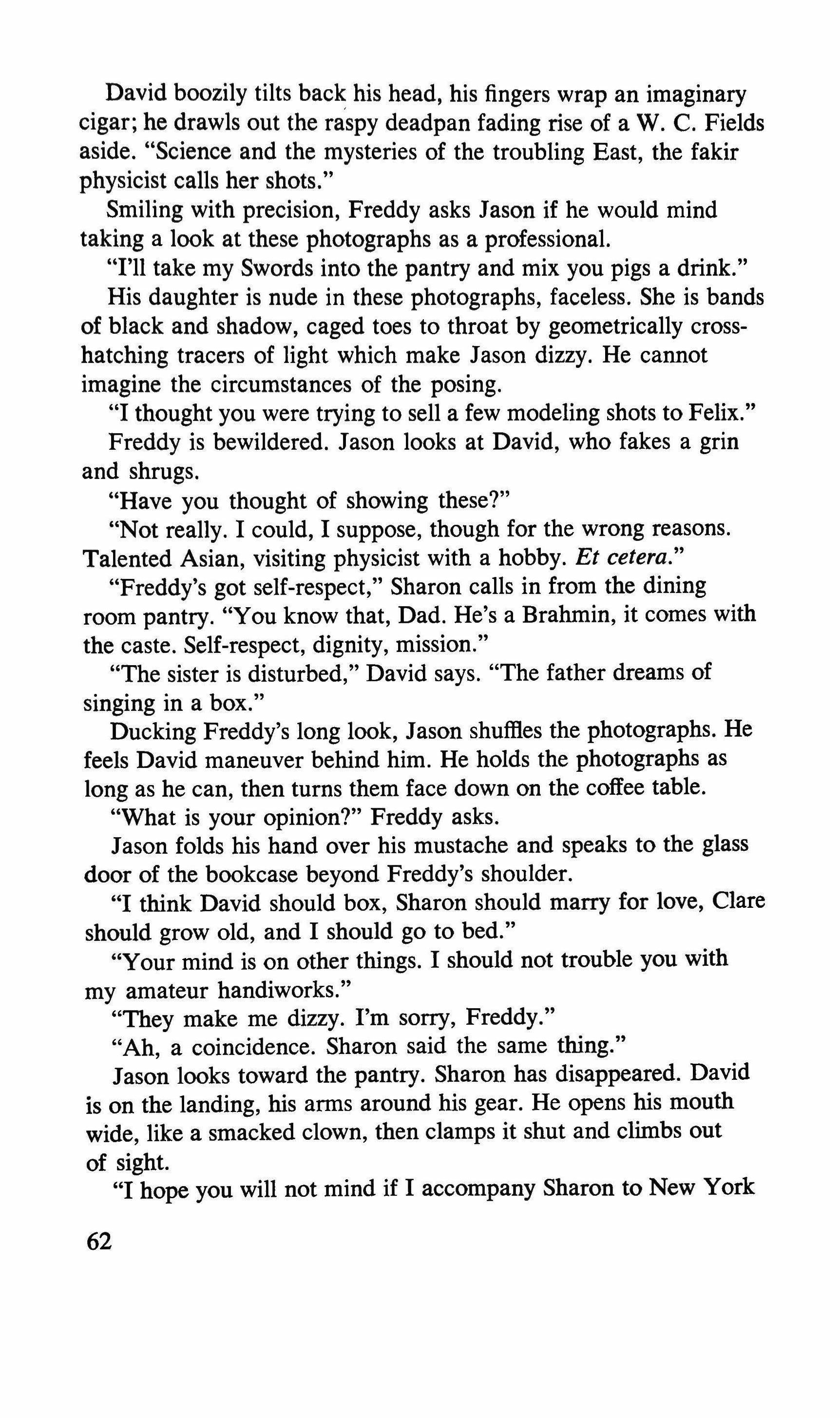
David boozily tilts back his head, his fingers wrap an imaginary cigar; he drawls out the raspy deadpan fading rise of a W. C. Fields aside. "Science and the mysteries of the troubling East, the fakir physicist calls her shots."
Smiling with precision, Freddy asks Jason if he would mind taking a look at these photographs as a professional.
"I'll take my Swords into the pantry and mix you pigs a drink."
His daughter is nude in these photographs, faceless. She is bands of black and shadow, caged toes to throat by geometrically crosshatching tracers of light which make Jason dizzy. He cannot imagine the circumstances of the posing.
"I thought you were trying to sell a few modeling shots to Felix." Freddy is bewildered. Jason looks at David, who fakes a grin and shrugs.
"Have you thought of showing these?"
"Not really. I could, I suppose, though for the wrong reasons. Talented Asian, visiting physicist with a hobby. Et cetera."
"Freddy's got self-respect," Sharon calls in from the dining room pantry. "You know that, Dad. He's a Brahmin, it comes with the caste. Self-respect, dignity, mission."
"The sister is disturbed," David says. "The father dreams of singing in a box."
Ducking Freddy's long look, Jason shuffles the photographs. He feels David maneuver behind him. He holds the photographs as long as he can, then turns them face down on the coffee table.
"What is your opinion?" Freddy asks.
Jason folds his hand over his mustache and speaks to the glass door of the bookcase beyond Freddy's shoulder.
"I think David should box, Sharon should marry for love, Clare should grow old, and I should go to bed."
"Your mind is on other things. I should not trouble you with my amateur handiworks."
"They make me dizzy. I'm sorry, Freddy."
"Ah, a coincidence. Sharon said the same thing."
Jason looks toward the pantry. Sharon has disappeared. David is on the landing, his arms around his gear. He opens his mouth wide, like a smacked clown, then clamps it shut and climbs out of sight.
"I hope you will not mind if I accompany Sharon to New York
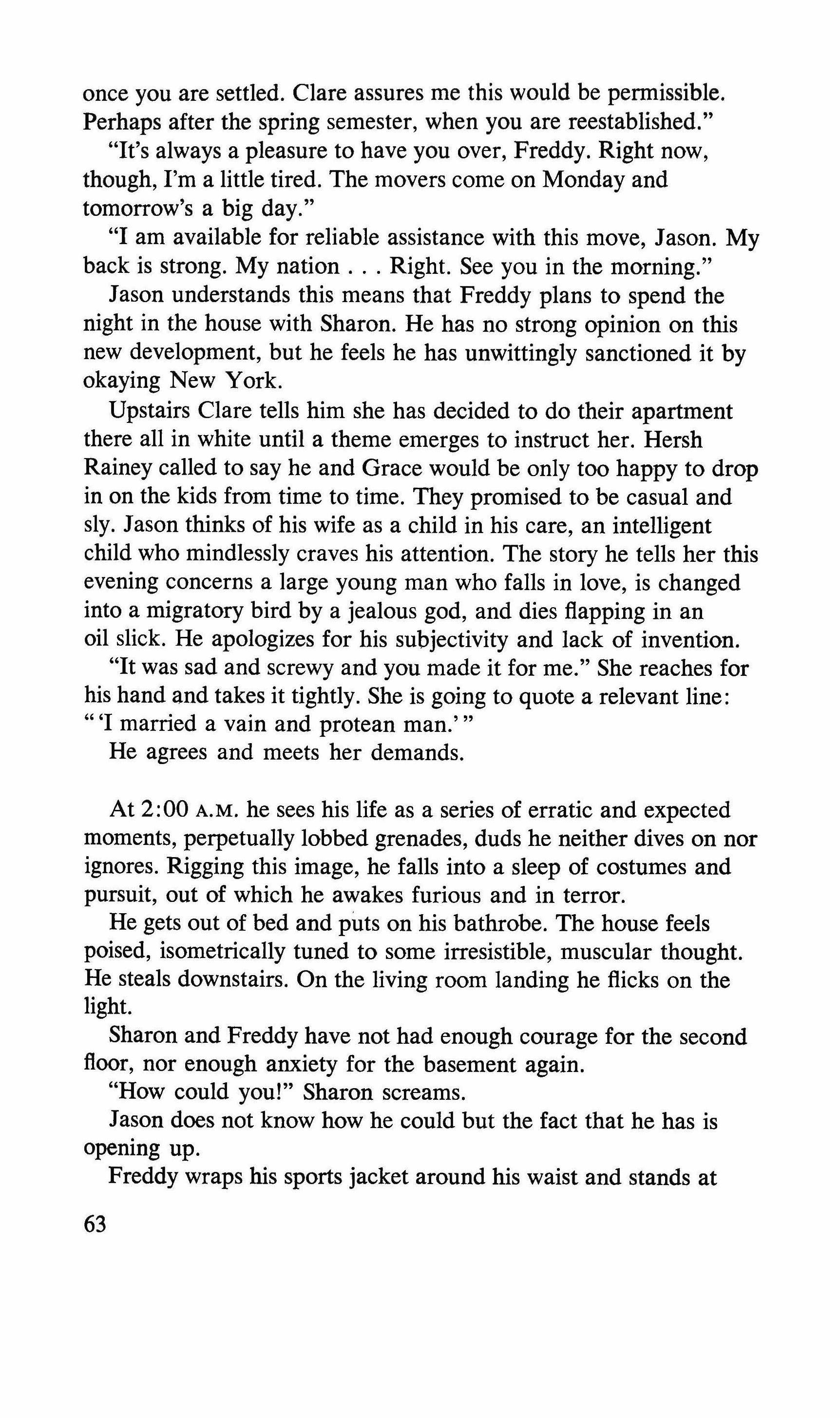
once you are settled. Clare assures me this would be permissible. Perhaps after the spring semester, when you are reestablished."
"It's always a pleasure to have you over, Freddy. Right now, though, I'm a little tired. The movers come on Monday and tomorrow's a big day."
"I am available for reliable assistance with this move, Jason. My back is strong. My nation Right. See you in the morning."
Jason understands this means that Freddy plans to spend the night in the house with Sharon. He has no strong opinion on this new development, but he feels he has unwittingly sanctioned it by okaying New York.
Upstairs Clare tells him she has decided to do their apartment there all in white until a theme emerges to instruct her. Hersh Rainey called to say he and Grace would be only too happy to drop in on the kids from time to time. They promised to be casual and sly. Jason thinks of his wife as a child in his care, an intelligent child who mindlessly craves his attention. The story he tells her this evening concerns a large young man who falls in love, is changed into a migratory bird by a jealous god, and dies flapping in an oil slick. He apologizes for his subjectivity and lack of invention.
"It was sad and screwy and you made it for me." She reaches for his hand and takes it tightly. She is going to quote a relevant line: 'I married a vain and protean man.' " He agrees and meets her demands.
At 2:00 A.M. he sees his life as a series of erratic and expected moments, perpetually lobbed grenades, duds he neither dives on nor ignores. Rigging this image, he falls into a sleep of costumes and pursuit, out of which he awakes furious and in terror.
He gets out of bed and puts on his bathrobe. The house feels poised, isometrically tuned to some irresistible, muscular thought. He steals downstairs. On the living room landing he flicks on the light.
Sharon and Freddy have not had enough courage for the second floor, nor enough anxiety for the basement again.
"How could you!" Sharon screams.
Jason does not know how he could but the fact that he has is opening up.
Freddy wraps his sports jacket around his waist and stands at 63
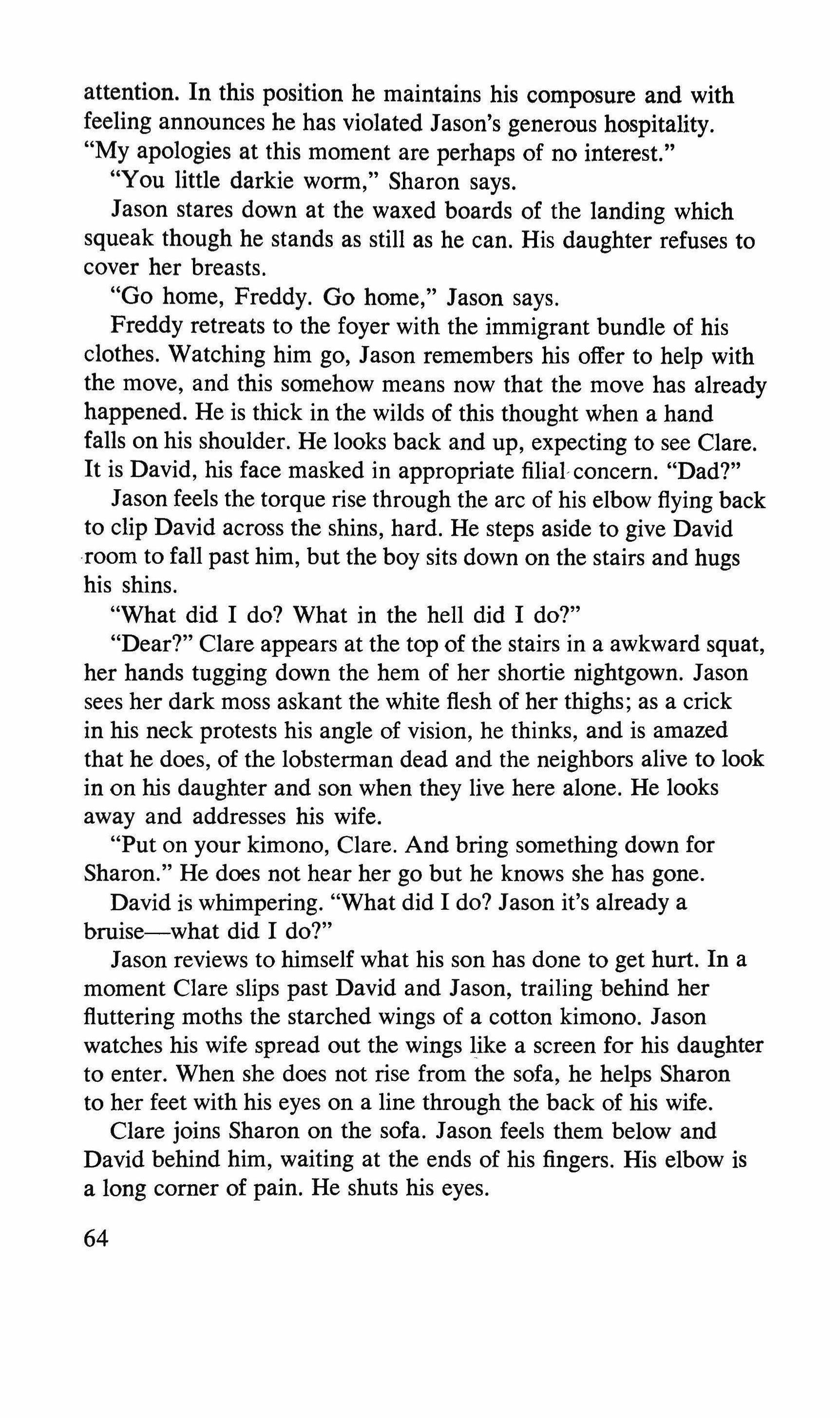
attention. In this position he maintains his composure and with feeling announces he has violated Jason's generous hospitality. "My apologies at this moment are perhaps of no interest."
"You little darkie worm," Sharon says.
Jason stares down at the waxed boards of the landing which squeak though he stands as still as he can. His daughter refuses to cover her breasts.
"Go home, Freddy. Go home," Jason says.
Freddy retreats to the foyer with the immigrant bundle of his clothes. Watching him go, Jason remembers his offer to help with the move, and this somehow means now that the move has already happened. He is thick in the wilds of this thought when a hand falls on his shoulder. He looks back and up, expecting to see Clare. It is David, his face masked in appropriate filial- concern. "Dad?"
Jason feels the torque rise through the arc of his elbow flying back to clip David across the shins, hard. He steps aside to give David .room to fall past him, but the boy sits down on the stairs and hugs his shins.
"What did I do? What in the hell did I do?"
"Dear?" Clare appears at the top of the stairs in a awkward squat, her hands tugging down the hem of her shortie nightgown. Jason sees her dark moss askant the white flesh of her thighs; as a crick in his neck protests his angle of vision, he thinks, and is amazed that he does, of the lobsterman dead and the neighbors alive to look in on his daughter and son when they live here alone. He looks away and addresses his wife.
"Put on your kimono, Clare. And bring something down for Sharon." He does not hear her go but he knows she has gone.
David is whimpering. "What did I do? Jason it's already a bruise-what did I do?"
Jason reviews to himself what his son has done to get hurt. In a moment Clare slips past David and Jason, trailing behind her fluttering moths the starched wings of a cotton kimono. Jason watches his wife spread out the wings like a screen for his daughter to enter. When she does not rise from the sofa, he helps Sharon to her feet with his eyes on a line through the back of his wife.
Clare joins Sharon on the sofa. Jason feels them below and David behind him, waiting at the ends of his fingers. His elbow is a long corner of pain. He shuts his eyes.
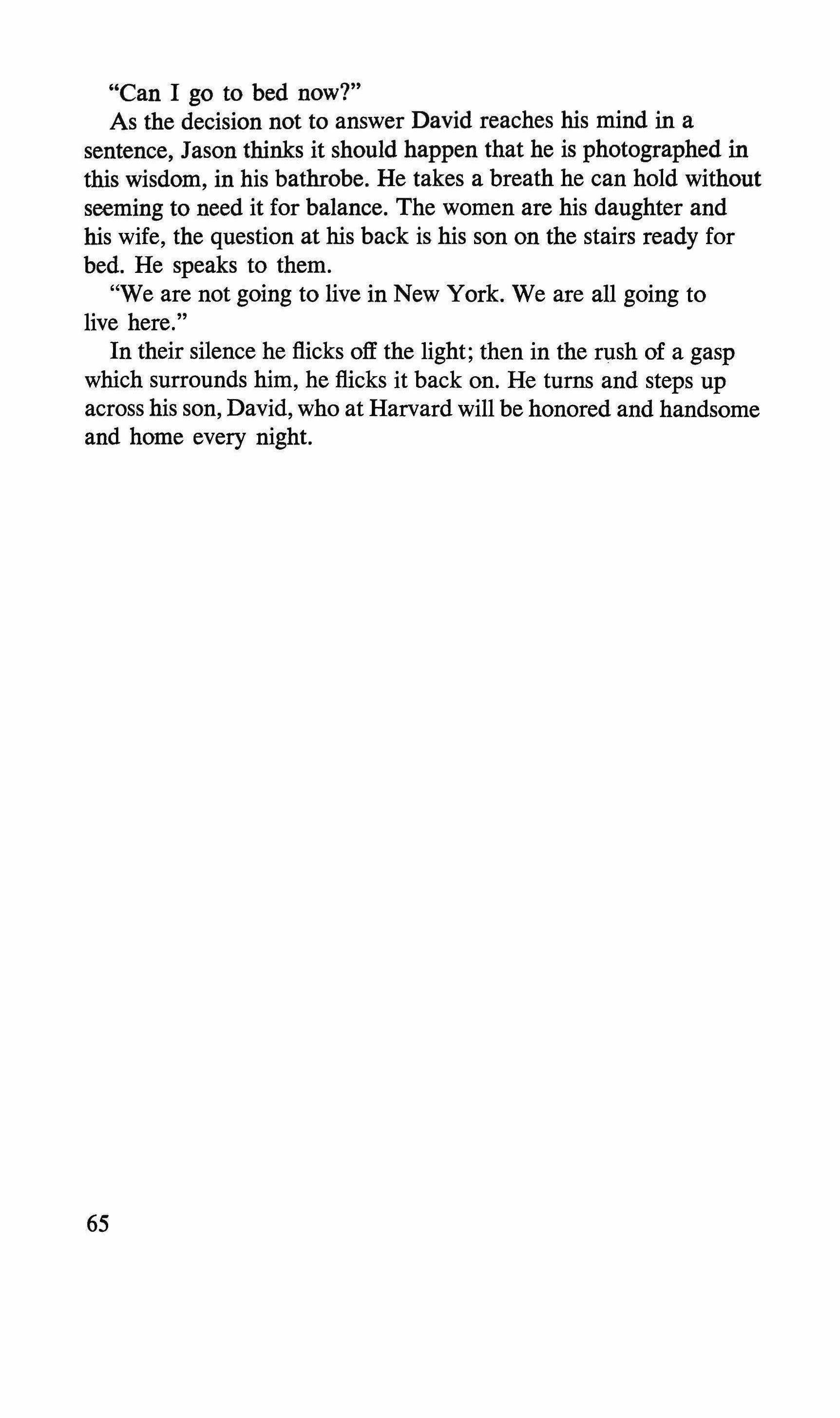
"Can I go to bed now?"
As the decision not to answer David reaches his mind in a sentence, Jason thinks it should happen that he is photographed in this wisdom, in his bathrobe. He takes a breath he can hold without seeming to need it for balance. The women are his daughter and his wife, the question at his back is his son on the stairs ready for bed. He speaks to them.
"We are not going to live in New York. We are all going to live here."
In their silence he flicks off the light; then in the rush of a gasp which surrounds him, he flicks it back on. He turns and steps up across his son, David, who at Harvard will be honored and handsome and home every night.
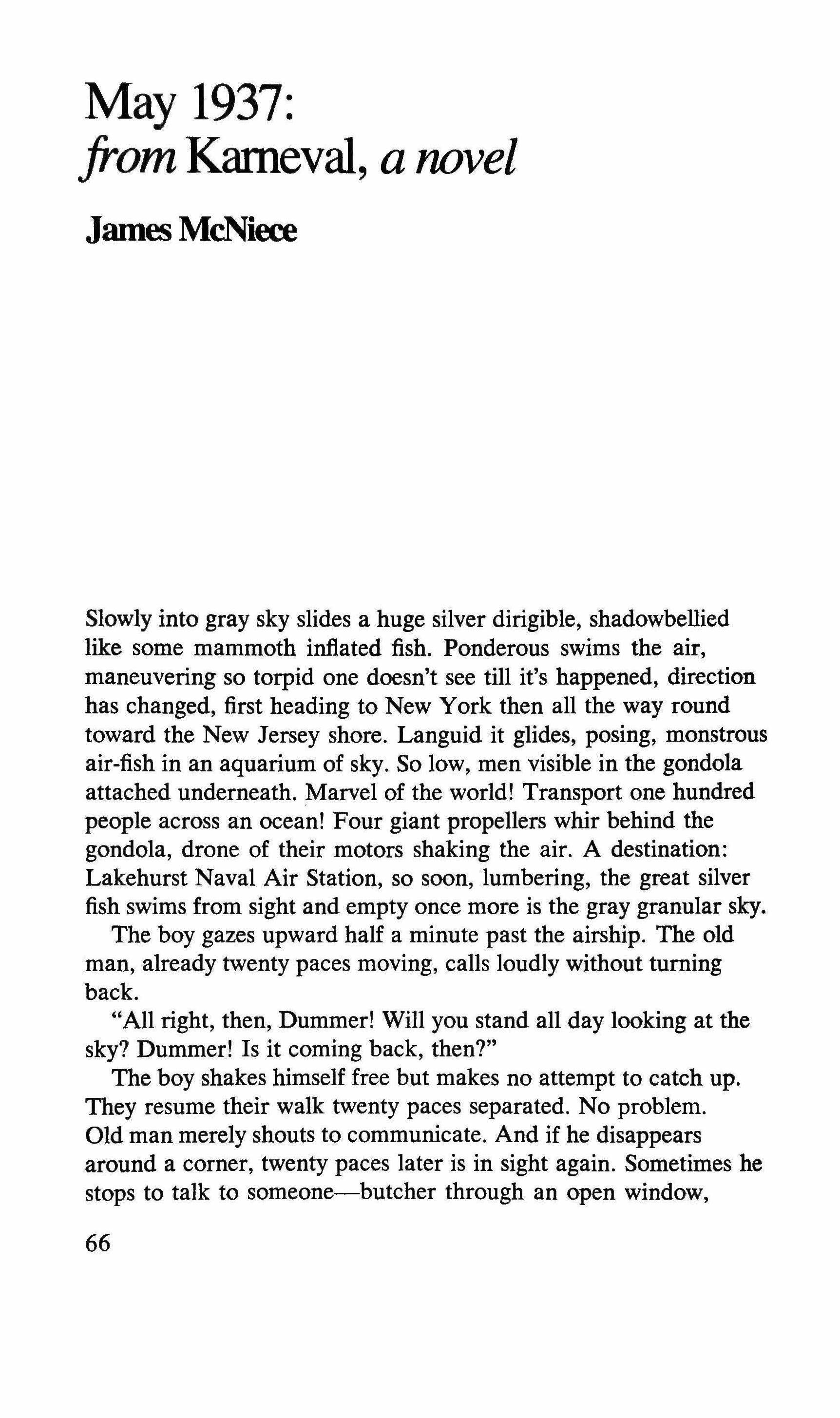
Slowly into gray sky slides a huge silver dirigible, shadowbellied like some mammoth inflated fish. Ponderous swims the air, maneuvering so torpid one doesn't see till it's happened, direction has changed, first heading to New York then all the way round toward the New Jersey shore. Languid it glides, posing, monstrous air-fish in an aquarium of sky. So low, men visible in the gondola attached underneath. Marvel of the world! Transport one hundred people across an ocean! Four giant propellers whir behind the gondola, drone of their motors shaking the air. A destination: Lakehurst Naval Air Station, so soon, lumbering, the great silver fish swims from sight and empty once more is the gray granular sky.
The boy gazes upward half a minute past the airship. The old man, already twenty paces moving, calls loudly without turning back.
"All right, then, Dummer! Will you stand all day looking at the sky? Dummer! Is it coming back, then?"
The boy shakes himself free but makes no attempt to catch up. They resume their walk twenty paces separated. No problem. Old man merely shouts to communicate. And if he disappears around a corner, twenty paces later is in sight again. Sometimes he stops to talk to someone-butcher through an open window,
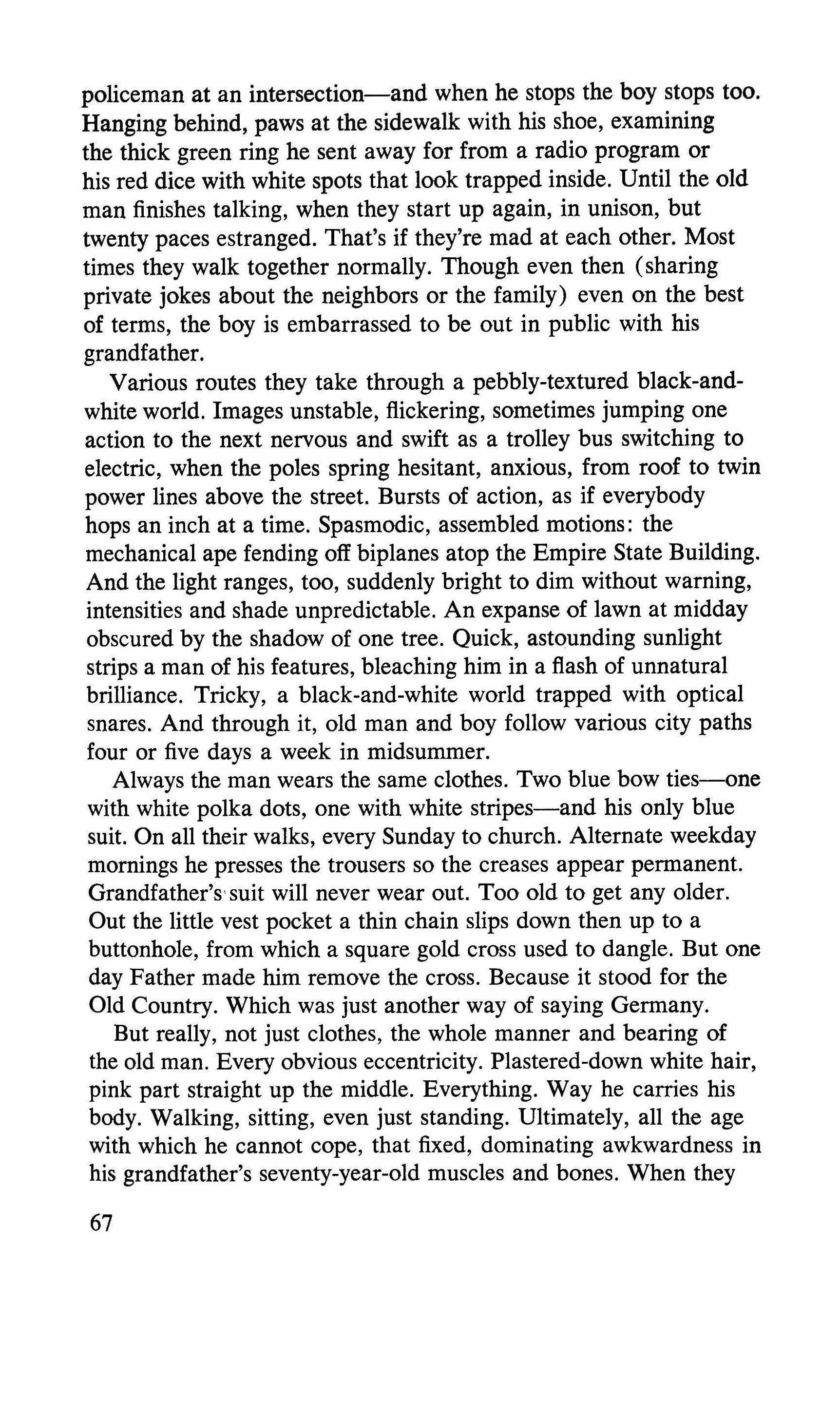
policeman at an intersection-and when he stops the boy stops too. Hanging behind, paws at the sidewalk with his shoe, examining the thick green ring he sent away for from a radio program or his red dice with white spots that look trapped inside. Until the old man finishes talking, when they start up again, in unison, but twenty paces estranged. That's if they're mad at each other. Most times they walk together normally. Though even then (sharing private jokes about the neighbors or the family) even on the best of terms, the boy is embarrassed to be out in public with his grandfather.
Various routes they take through a pebbly-textured black-andwhite world. Images unstable, flickering, sometimes jumping one action to the next nervous and swift as a trolley bus switching to electric, when the poles spring hesitant, anxious, from roof to twin power lines above the street. Bursts of action, as if everybody hops an inch at a time. Spasmodic, assembled motions: the mechanical ape fending off biplanes atop the Empire State Building. And the light ranges, too, suddenly bright to dim without warning, intensities and shade unpredictable. An expanse of lawn at midday obscured by the shadow of one tree. Quick, astounding sunlight strips a man of his features, bleaching him in a flash of unnatural brilliance. Tricky, a black-and-white world trapped with optical snares. And through it, old man and boy follow various city paths four or five days a week in midsummer.
Always the man wears the same clothes. Two blue bow ties-one with white polka dots, one with white stripes-and his only blue suit. On all their walks, every Sunday to church. Alternate weekday mornings he presses the trousers so the creases appear permanent. Grandfather'ssuit will never wear out. Too old to get any older. Out the little vest pocket a thin chain slips down then up to a buttonhole, from which a square gold cross used to dangle. But one day Father made him remove the cross. Because it stood for the Old Country. Which was just another way of saying Germany. But really, not just clothes, the whole manner and bearing of the old man. Every obvious eccentricity. Plastered-down white hair, pink part straight up the middle. Everything. Way he carries his body. Walking, sitting, even just standing. Ultimately, all the age with which he cannot cope, that fixed, dominating awkwardness in his grandfather's seventy-year-old muscles and bones. When they
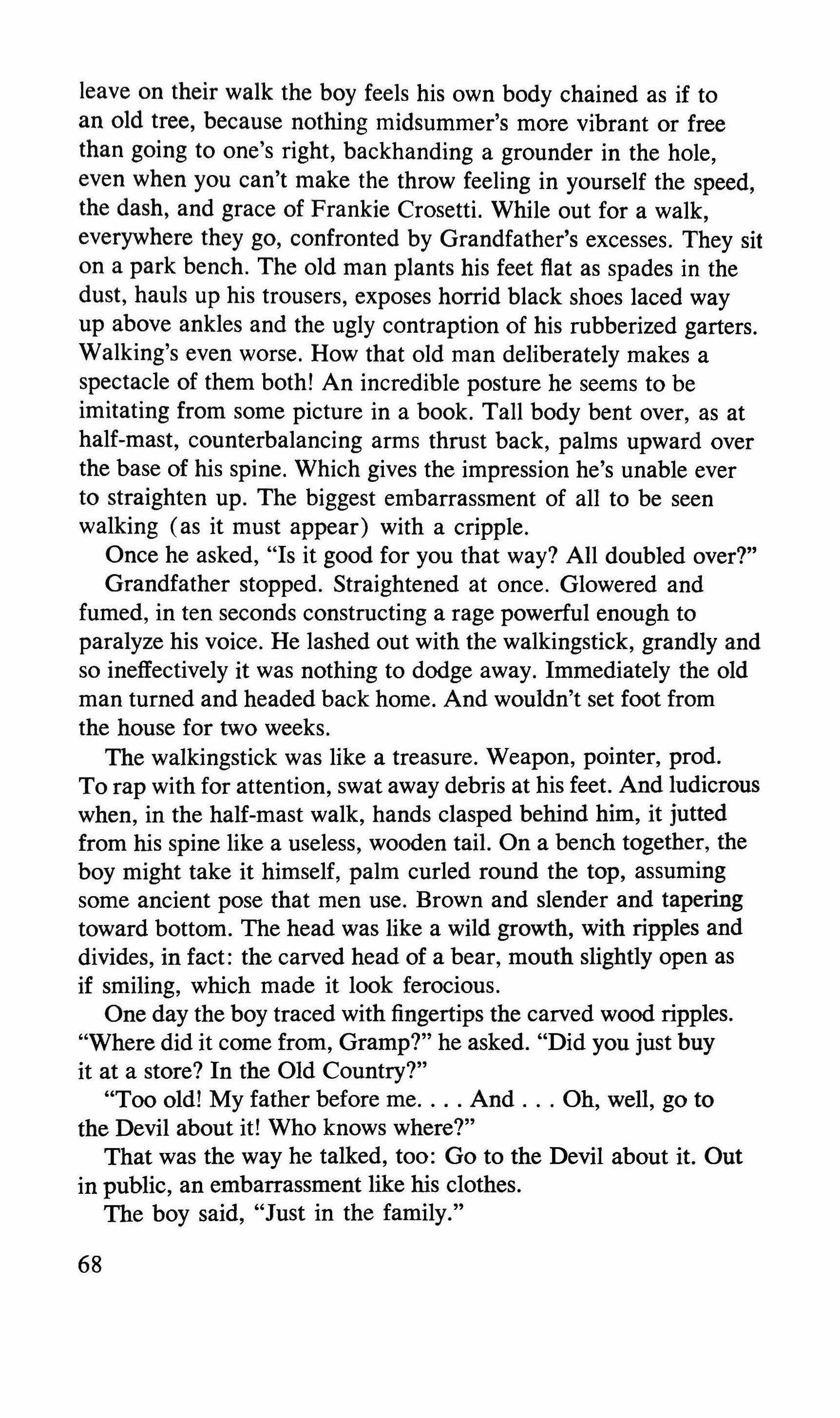
leave on their walk the boy feels his own body chained as if to an old tree, because nothing midsummer's more vibrant or free than going to one's right, backhanding a grounder in the hole, even when you can't make the throw feeling in yourself the speed, the dash, and grace of Frankie Crosetti. While out for a walk, everywhere they go, confronted by Grandfather's excesses. They sit on a park bench. The old man plants his feet flat as spades in the dust, hauls up his trousers, exposes horrid black shoes laced way up above ankles and the ugly contraption of his rubberized garters. Walking's even worse. How that old man deliberately makes a spectacle of them both! An incredible posture he seems to be imitating from some picture in a book. Tall body bent over, as at half-mast, counterbalancing arms thrust back, palms upward over the base of his spine. Which gives the impression he's unable ever to straighten up. The biggest embarrassment of all to be seen walking (as it must appear) with a cripple.
Once he asked, "Is it good for you that way? All doubled over?"
Grandfather stopped. Straightened at once. Glowered and fumed, in ten seconds constructing a rage powerful enough to paralyze his voice. He lashed out with the walkingstick, grandly and so ineffectively it was nothing to dodge away. Immediately the old man turned and headed back home. And wouldn't set foot from the house for two weeks.
The walkingstick was like a treasure. Weapon, pointer, prod. To rap with for attention, swat away debris at his feet. And ludicrous when, in the half-mast walk, hands clasped behind him, it jutted from his spine like a useless, wooden tail. On a bench together, the boy might take it himself, palm curled round the top, assuming some ancient pose that men use. Brown and slender and tapering toward bottom. The head was like a wild growth, with ripples and divides, in fact: the carved head of a bear, mouth slightly open as if smiling, which made it look ferocious.
One day the boy traced with fingertips the carved wood ripples. "Where did it come from, Gramp?" he asked. "Did you just buy it at a store? In the Old Country?"
"Too old! My father before me And Oh, well, go to the Devil about it! Who knows where?"
That was the way he talked, too: Go to the Devil about it. Out in public, an embarrassment like his clothes.
The boy said, "Just in the family."
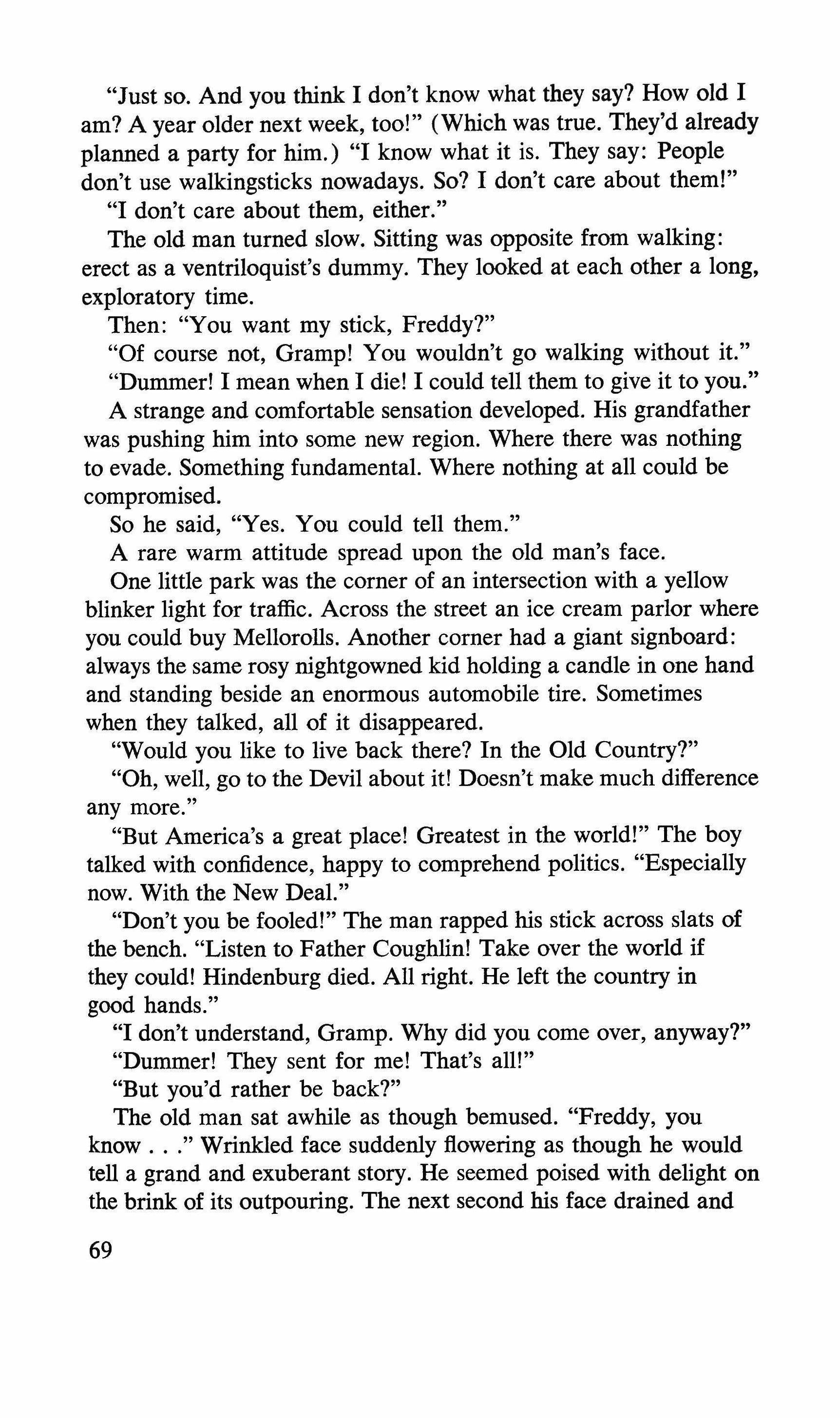
"Just so. And you think I don't know what they say? How old I am? A year older next week, too!" (Which was true. They'd already planned a party for him.) "I know what it is. They say: People don't use walkingsticks nowadays. So? I don't care about them!"
"I don't care about them, either."
The old man turned slow. Sitting was opposite from walking: erect as a ventriloquist's dummy. They looked at each other a long, exploratory time.
Then: "You want my stick, Freddy?"
"Of course not, Gramp! You wouldn't go walking without it."
"Dummer! I mean when I die! I could tell them to give it to you."
A strange and comfortable sensation developed. His grandfather was pushing him into some new region. Where there was nothing to evade. Something fundamental. Where nothing at all could be compromised.
So he said, "Yes. You could tell them."
A rare warm attitude spread upon the old man's face.
One little park was the corner of an intersection with a yellow blinker light for traffic. Across the street an ice cream parlor where you could buy Mellorolls. Another corner had a giant signboard: always the same rosy nightgowned kid holding a candle in one hand and standing beside an enormous automobile tire. Sometimes when they talked, all of it disappeared.
"Would you like to live back there? In the Old Country?"
"Oh, well, go to the Devil about it! Doesn't make much difference any more."
"But America's a great place! Greatest in the world!" The boy talked with confidence, happy to comprehend politics. "Especially now. With the New Deal."
"Don't you be fooled!" The man rapped his stick across slats of the bench. "Listen to Father Coughlin! Take over the world if they could! Hindenburg died. All right. He left the country in good hands."
"I don't understand, Gramp. Why did you come over, anyway?"
"Dummer! They sent for me! That's all!"
"But you'd rather be back?"
The old man sat awhile as though bemused. "Freddy, you know Wrinkled face suddenly flowering as though he would tell a grand and exuberant story. He seemed poised with delight on the brink of its outpouring. The next second his face drained and
withered again. "Impossible to say. What is it? I don't know. But you only find it in the homeland."
So the boy asked what he already knew. Just that Grandfather might feel a little better in his memories.
"You come from a big city, Gramp?"
"Go to the Devil! Little town! No one ever heard of!"
"There was a castle on a hill."
"And a park. It overlooked all the houses."
"What was the name? Say it the Old Country way. I like to hear that."
So, "Dachau," said the man the Old Country way.
From the Hill
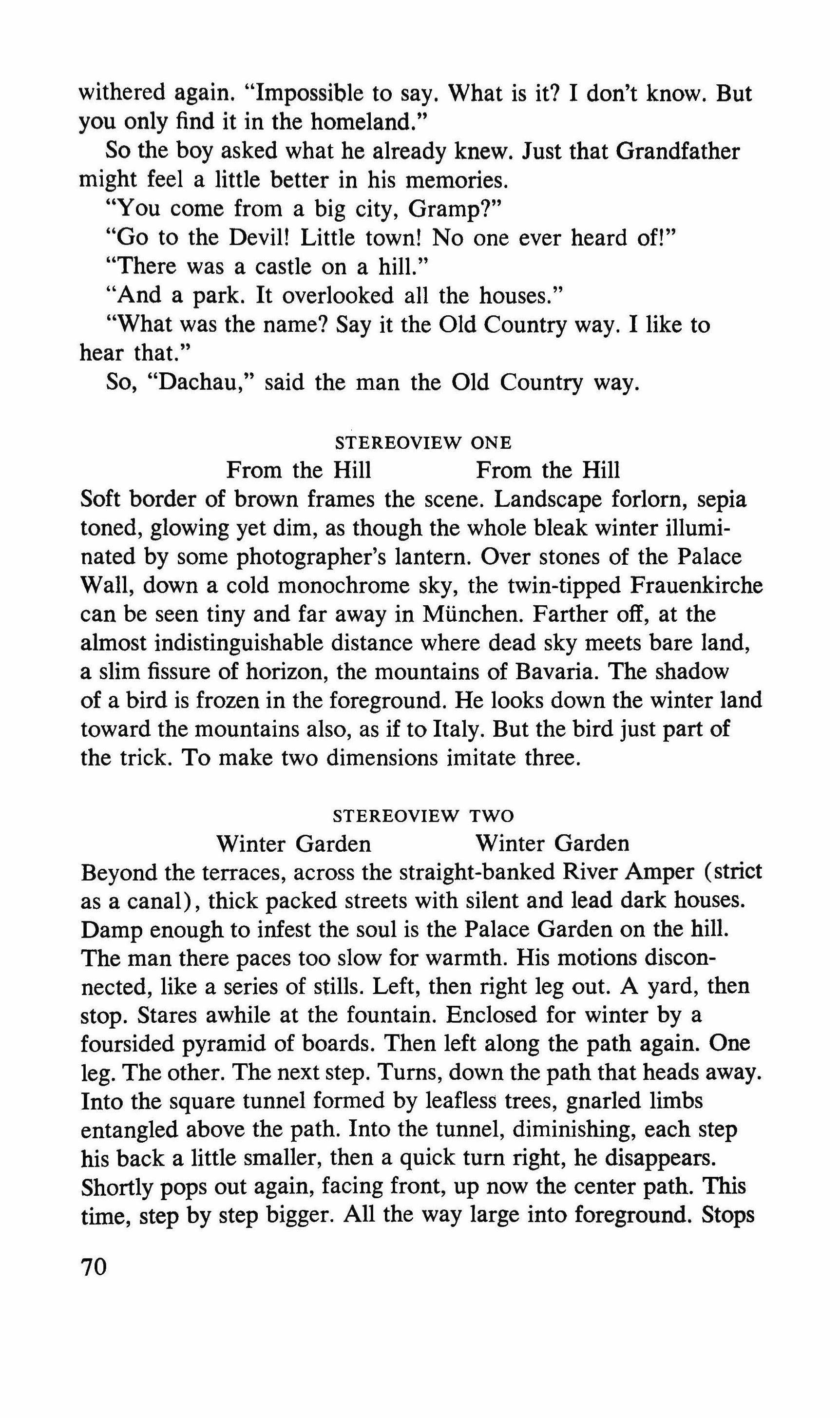
From the Hill
Soft border of brown frames the scene. Landscape forlorn, sepia toned, glowing yet dim, as though the whole bleak winter illuminated by some photographer's lantern. Over stones of the Palace Wall, down a cold monochrome sky, the twin-tipped Frauenkirche can be seen tiny and far away in Mlinchen. Farther off, at the almost indistinguishable distance where dead sky meets bare land, a slim fissure of horizon, the mountains of Bavaria. The shadow of a bird is frozen in the foreground. He looks down the winter land toward the mountains also, as if to Italy. But the bird just part of the trick. To make two dimensions imitate three.
Beyond the terraces, across the straight-banked River Amper (strict as a canal), thick packed streets with silent and lead dark houses. Damp enough to infest the soul is the Palace Garden on the hill. The man there paces too slow for warmth. His motions disconnected, like a series of stills. Left, then right leg out. A yard, then stop. Stares awhile at the fountain. Enclosed for winter by a foursided pyramid of boards. Then left along the path again. One leg. The other. The next step. Turns, down the path that heads away. Into the square tunnel formed by leafless trees, gnarled limbs entangled above the path. Into the tunnel, diminishing, each step his back a little smaller, then a quick turn right, he disappears. Shortly pops out again, facing front, up now the center path. This time, step by step bigger. All the way large into foreground. Stops
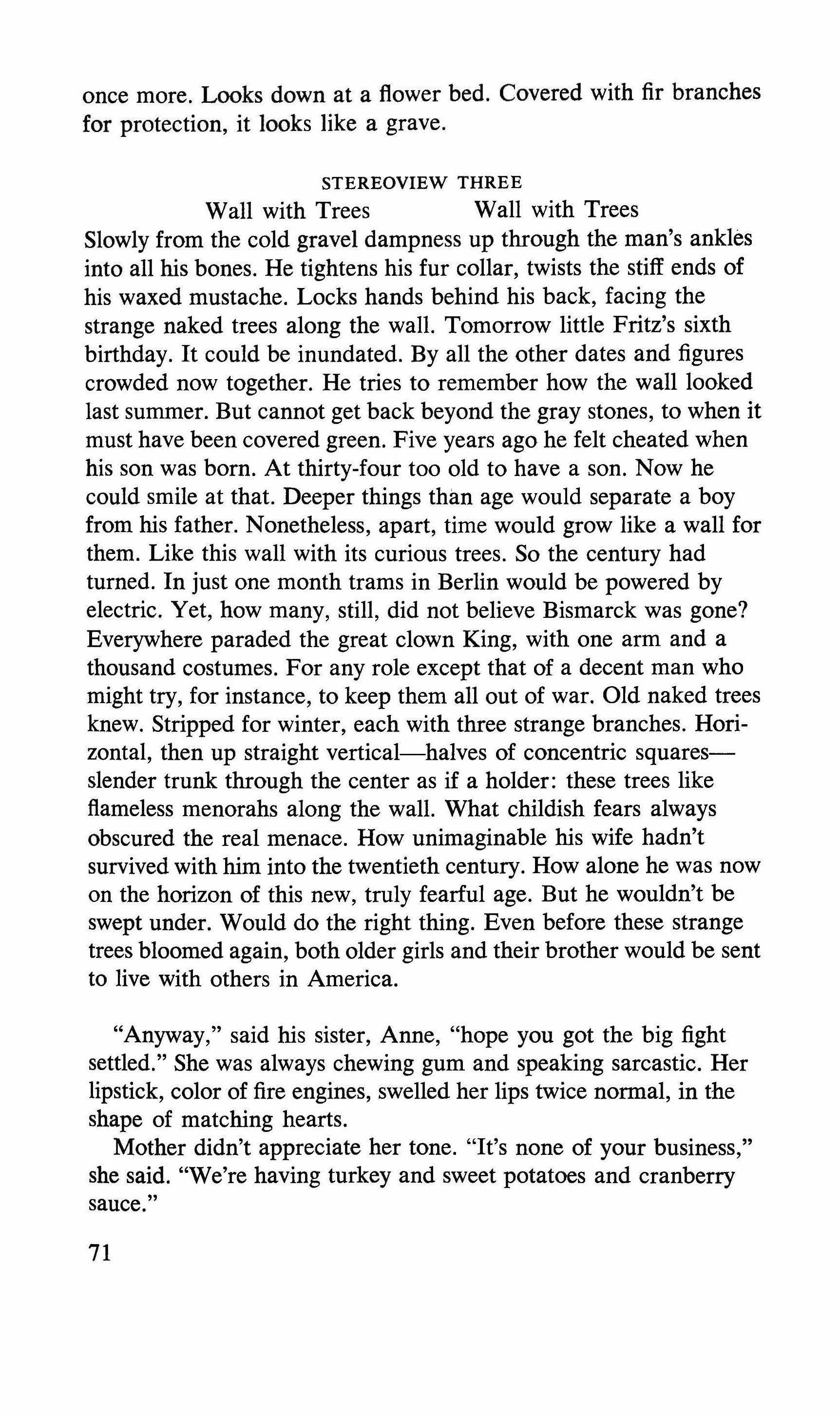
once more. Looks down at a flower bed. Covered with fir branches for protection, it looks like a grave.
Slowly from the cold gravel dampness up through the man's ankles into all his bones. He tightens his fur collar, twists the stiff ends of his waxed mustache. Locks hands behind his back, facing the strange naked trees along the wall. Tomorrow little Fritz's sixth birthday. It could be inundated. By all the other dates and figures crowded now together. He tries to remember how the wall looked last summer. But cannot get back beyond the gray stones, to when it must have been covered green. Five years ago he felt cheated when his son was born. At thirty-four too old to have a son. Now he could smile at that. Deeper things than age would separate a boy from his father. Nonetheless, apart, time would grow like a wall for them. Like this wall with its curious trees. So the century had turned. In just one month trams in Berlin would be powered by electric. Yet, how many, still, did not believe Bismarck was gone? Everywhere paraded the great clown King, with one arm and a thousand costumes. For any role except that of a decent man who might try, for instance, to keep them all out of war. Old naked trees knew. Stripped for winter, each with three strange branches. Horizontal, then up straight vertical-halves of concentric squaresslender trunk through the center as if a holder: these trees like flameless menorahs along the wall. What childish fears always obscured the real menace. How unimaginable his wife hadn't survived with him into the twentieth century. How alone he was now on the horizon of this new, truly fearful age. But he wouldn't be swept under. Would do the right thing. Even before these strange trees bloomed again, both older girls and their brother would be sent to live with others in America.
"Anyway," said his sister, Anne, "hope you got the big fight settled." She was always chewing gum and speaking sarcastic. Her lipstick, color of fire engines, swelled her lips twice normal, in the shape of matching hearts.
Mother didn't appreciate her tone. "It's none of your business," she said. "We're having turkey and sweet potatoes and cranberry sauce."

"That's what Daddy wanted. Not Gramp."
"Just go get ready for dinner."
But his sister was right. How could there possibly have been an argument? Grandfather had already said what he wanted. But Father wouldn't allow it, so the fight, and Mother went out and bought turkey. Ridiculous. "That kind of smell," his father had muttered, "steaming out of our kitchen!" So that was that. And no one bothered to tell Grandfather. He still dreamed of livers and dumplings, goose and sauerkraut, red cabbage.
Mother said, "Freddy, I must tell you something. Between us. Grandfather is going away to live very soon. It'll be better that way."
It didn't make any sense. "I don't get it! Where would he go? He couldn't live all by himself!"
"Not all by himself. A place with others like him."
"A hospital?" What came to him was crazy but still he thought: That was the way you died: they sent you to a hospital, in a while you got sick and died. So he said, "What's the matter here, anyway?" confused, but like an adult.
"Nothing's the matter."
"Doesn't anyone love him any more?"
Then suddenly he imagined it was their arguments when out walking. The old man himself must have told.
In time, though, when his mind settled, he almost whispered, "Does he know, Mother? He's being sent away?"
But there wasn't any answer. So at the birthday dinner he knew what Grandfather did not.
The old man sat between Uncle Frank and Aunt Trixy. The boy was glad to be facing them. Because ever since he heard the secret, in his thought: A thousand walks, yet didn't know at all what Grandfather really looked like. Now terrified he'd never get the chance. As if immediately after dinner the old man might slip right out of existence into some opaque block of past like ice, where no one could see or ever remember him any more.
Uncle Frank was always kidding. He called out to Mother in the kitchen, "Where's Mrs. Rumpel?" (An old lady who lived alone around the comer.) "Someone here's not escorted, Marion!"
"Oh, just go to the Devil!" piped up Grandfather. "Go to the Devil about it!"
Then the boy saw. You couldn't tell from the voice. But his eyes narrowed, in a smile! Why, if he was only joking, make his voice

so surly and gruff? Why disguise that he was really pleased? So. Complexities never explored.
Everyone complimented Grandfather on his new suit. Aunt Trixy removed a small white tag still on the sleeve, picking at threads with her long fingernails. The old man grinned but his hand trembled from holding up his wrist. A brown suit, stuck up unnatural around the collar, but Father said it would lie down properly in time. New tie was brown with yellow diamonds. The clothes didn't so much change Grandfather's appearance. Just made him look awkward.
Father said, "Time for someone to say a few words."
Old-fashioned expression. It meant: to say Grace. "Grandfather's time," said Mother.
And when the old man cleared his throat all those horrible images appeared. How, out on the street, he blew his nose to the grass or sidewalk. Spat ugly orange strands of mucus to the pavement. The boy felt somewhere in his stomach a corrupt new happiness beginning. That he would never have to walk with the old man again. Yet only minutes before, he'd been sad. So, indeed, other complexities, too. Anyway, Grandfather recited strange words from the Old Country.
Lieber Herr Jesus Sei unser Gast Und segne alles Was Du uns bescheret hast.
Mother placed the great browned bird-turkey instead of goose-in the center of the table. In certain poses, the old man's face collapsed outward from the bones, hiding him, upper eyelids drooping to almost cover the eyes. He displayed not a breath of emotion. The boy knew. Wasn't just the face. Grandfather simply wouldn't let anyone see he'd been disappointed. Out on their walks he exposed himself. At home, only now and then the softest grievance, certainly nothing important like disappointment. Aunt Trixy raised her wine glass for a toast. Again that meal, Old Country words. "Viel Gluck und Viel Segen," she said, "Auf an Deinen Wegen!"
For the flash of a second, Grandfather's eyes sparkled. Then Father said, "Amazing, Trixy. How much you retain. Of the Old Country."
"Your memory was always a little shorter than mine."
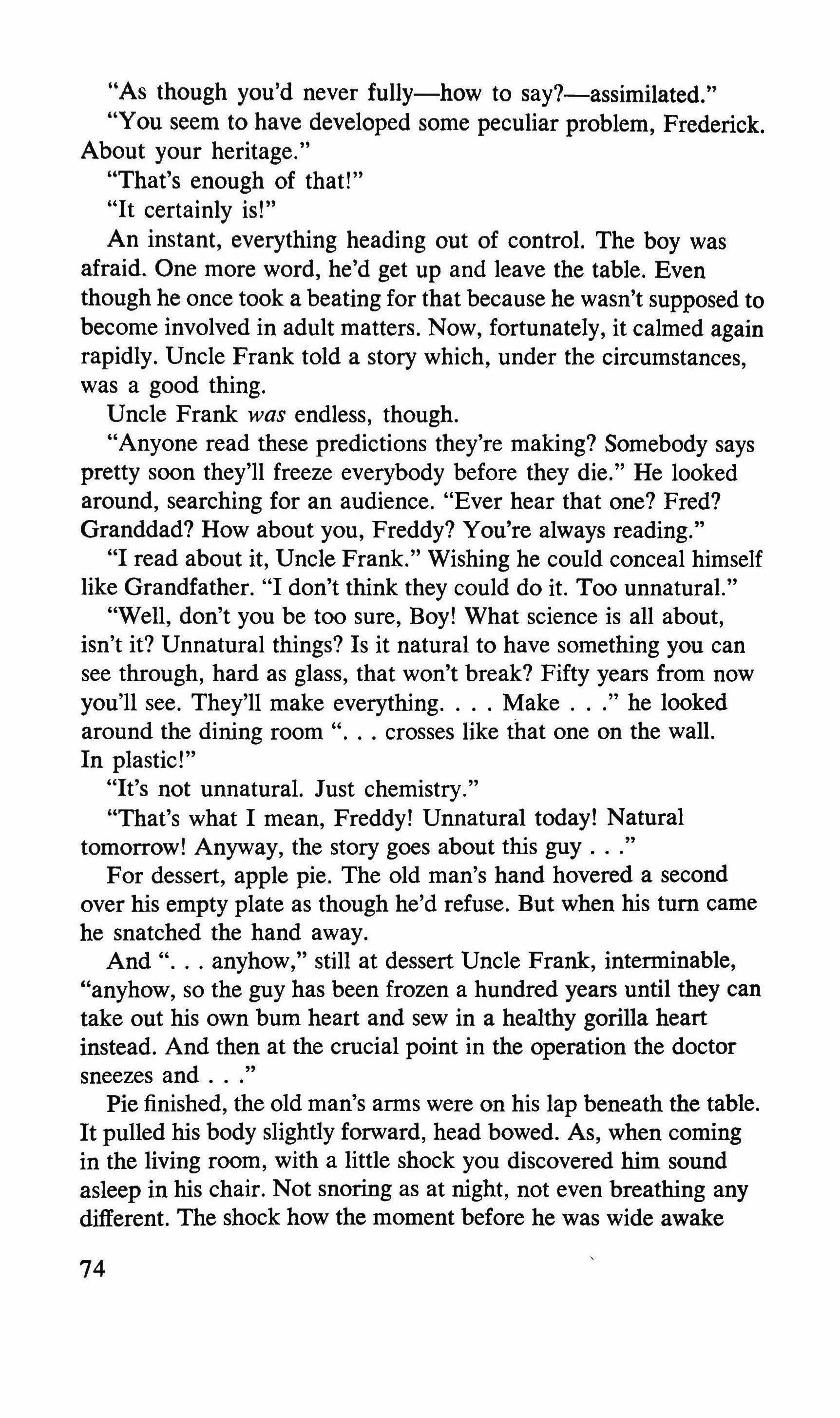
"As though you'd never fully-how to say?-assimilated."
"You seem to have developed some peculiar problem, Frederick. About your heritage."
"That's enough of that!"
"It certainly is!"
An instant, everything heading out of control. The boy was afraid. One more word, he'd get up and leave the table. Even though he once took a beating for that because he wasn't supposed to become involved in adult matters. Now, fortunately, it calmed again rapidly. Uncle Frank told a story which, under the circumstances, was a good thing.
Uncle Frank was endless, though.
"Anyone read these predictions they're making? Somebody says pretty soon they'll freeze everybody before they die." He looked around, searching for an audience. "Ever hear that one? Fred? Granddad? How about you, Freddy? You're always reading."
"I read about it, Uncle Frank." Wishing he could conceal himself like Grandfather. "I don't think they could do it. Too unnatural."
"Well, don't you be too sure, Boy! What science is all about, isn't it? Unnatural things? Is it natural to have something you can see through, hard as glass, that won't break? Fifty years from now you'll see. They'll make everything. Make ." he looked around the dining room ". crosses like that one on the wall. In plastic!"
"It's not unnatural. Just chemistry."
"That's what I mean, Freddy! Unnatural today! Natural tomorrow! Anyway, the story goes about this guy
For dessert, apple pie. The old man's hand hovered a second over his empty plate as though he'd refuse. But when his tum came he snatched the hand away.
And anyhow," still at dessert Uncle Frank, interminable, "anyhow, so the guy has been frozen a hundred years until they can take out his own bum heart and sew in a healthy gorilla heart instead. And then at the crucial point in the operation the doctor d sneezes an
Pie finished, the old man's arms were on his lap beneath the table. It pulled his body slightly forward, head bowed. As, when coming in the living room, with a little shock you discovered him sound asleep in his chair. Not snoring as at night, not even breathing any different. The shock how the moment before he was wide awake
listening to the radio, how you couldn't detect the transition. Some day you knew you might catch him not breathing at all.
Late that night, long after Uncle Frank and Aunt Trixy had left, after everyone had gone to bed, the oddest experience occurred. With his sister. Not strange she sneaked in his room. Often did that, talking late in the night when no one else knew. One A.M. he let himself be awakened, because that was the agreement. She sat beside him on the bed, close so they could whisper, which never made him feel uncomfortable before. This time something was wrong. Wearing some new gown with lace, slippery, thin, sometimes when she shifted, the wildest imagination he could see even in the dim light her naked body. He was glad when she started talking about the old man.
"They had another big fight about him. Did you hear?" "No."
"Daddy's very angry."
"Why?"
"I don't know. Because of where he was born."
"In Germany? So was Father."
"Something to do with politics. Do you know what liability means? Daddy said Gramp has become his German liability. I think they're going to send him away."
"Oh, that's not news."
"What do you mean?"
"I know it already."
"How could you?"
"Because Mother told me."
"You're lying. Why should she tell you and not me?"
"How should I know?"
Even in the darkness he could see Anne's malevolent eyes trained upon him. "Well, I know. Because I'm a little girl." And in a while: "Can you see me?"
"Of course."
"I mean through my nightgown."
Too absolutely petrified to speak. And then things flipped over weird.
Quickly she stripped the gown up and over her head. Dropped it in a white pool on the covers. Stood up and almost like with her own eyes, directed his gaze over all of her undressed body.
Heart pounding, he felt trapped. If he ran, certain to wake up
75
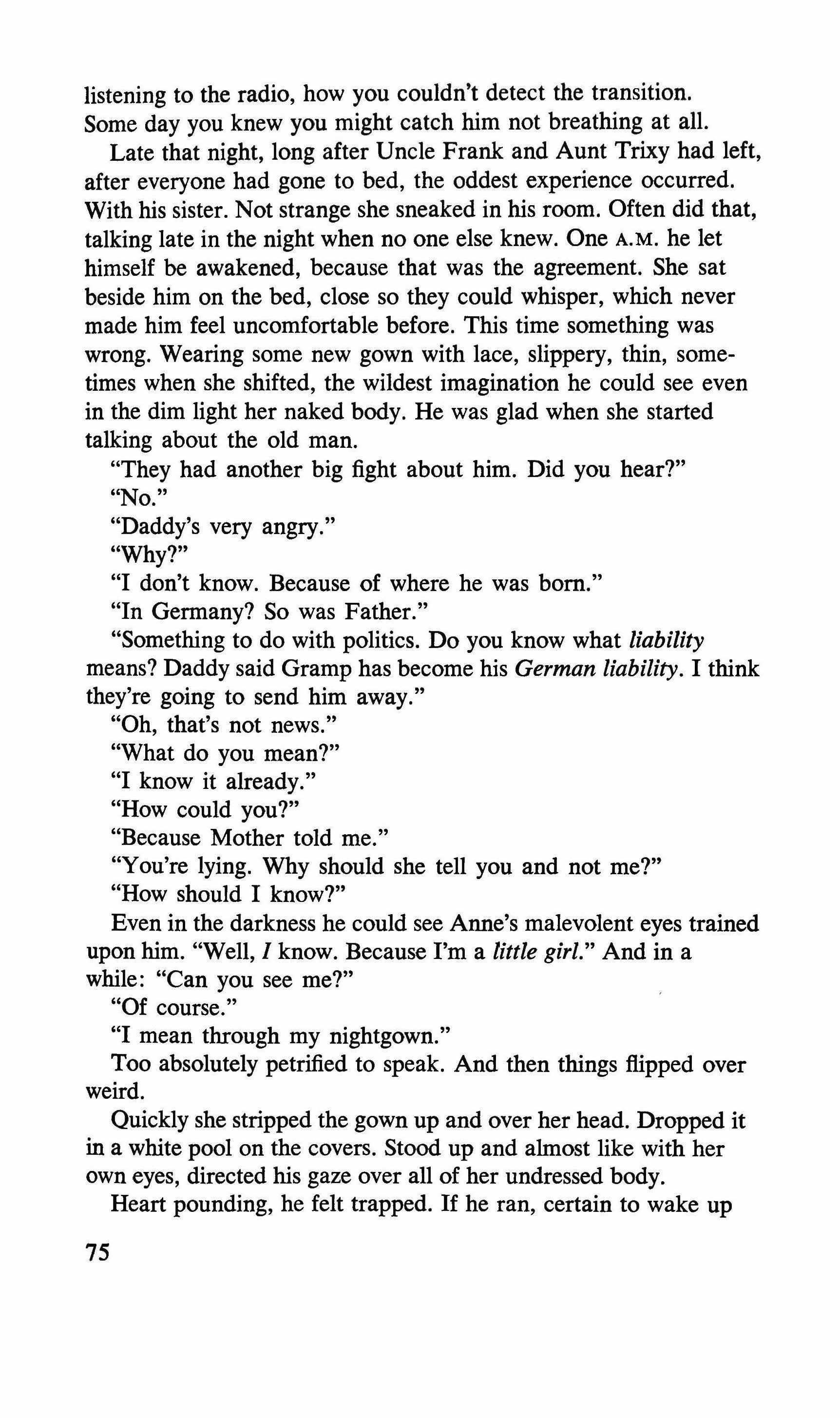
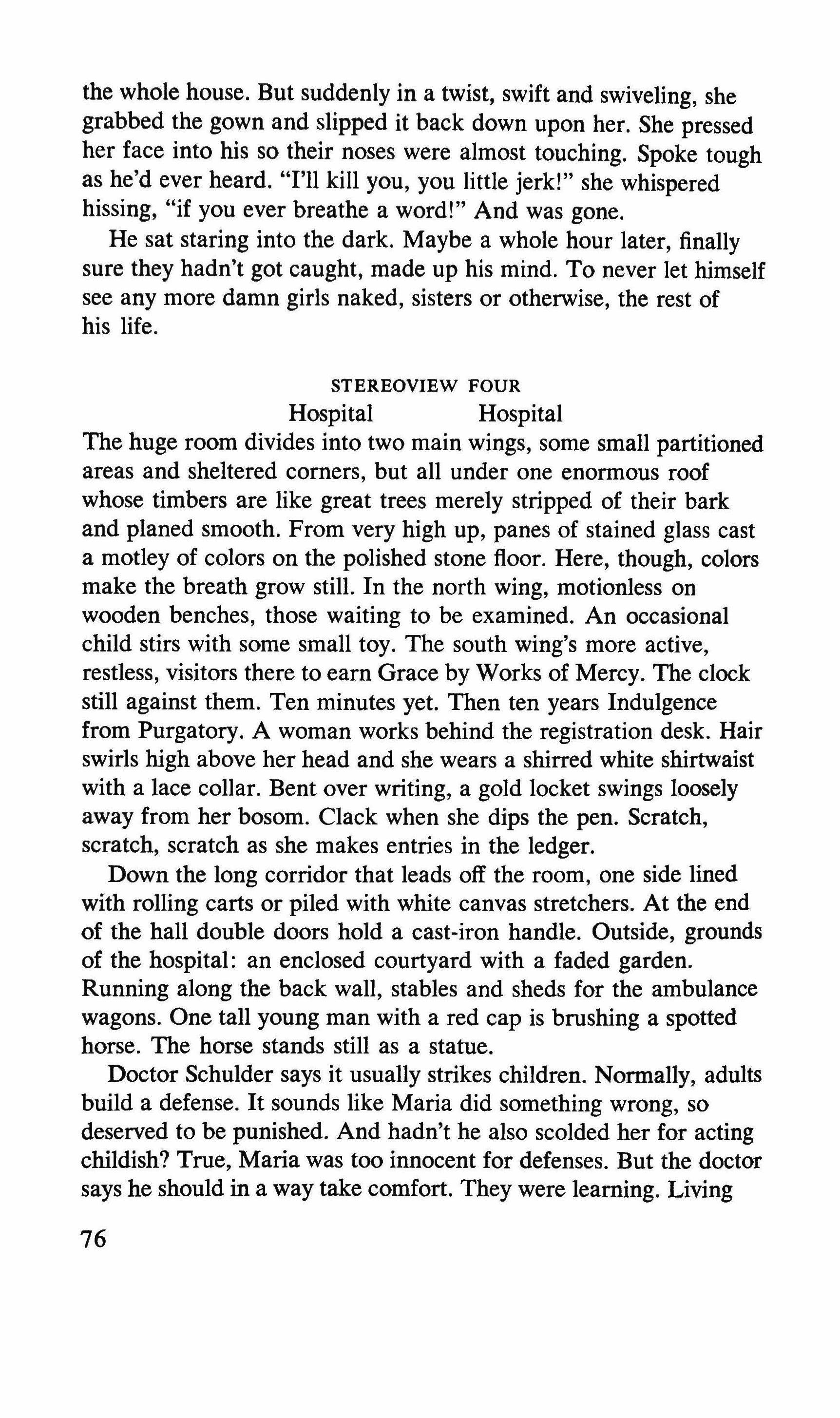
the whole house. But suddenly in a twist, swift and swiveling, she grabbed the gown and slipped it back down upon her. She pressed her face into his so their noses were almost touching. Spoke tough as he'd ever heard. "I'll kill you, you little jerk!" she whispered hissing, "if you ever breathe a word!" And was gone. He sat staring into the dark. Maybe a whole hour later, finally sure they hadn't got caught, made up his mind. To never let himself see any more damn girls naked, sisters or otherwise, the rest of his life.
The huge room divides into two main wings, some small partitioned areas and sheltered corners, but all under one enormous roof whose timbers are like great trees merely stripped of their bark and planed smooth. From very high up, panes of stained glass cast a motley of colors on the polished stone floor. Here, though, colors make the breath grow still. In the north wing, motionless on wooden benches, those waiting to be examined. An occasional child stirs with some small toy. The south wing's more active, restless, visitors there to earn Grace by Works of Mercy. The clock still against them. Ten minutes yet. Then ten years Indulgence from Purgatory. A woman works behind the registration desk. Hair swirls high above her head and she wears a shirred white shirtwaist with a lace collar. Bent over writing, a gold locket swings loosely away from her bosom. Clack when she dips the pen. Scratch, scratch, scratch as she makes entries in the ledger.
Down the long corridor that leads off the room, one side lined with rolling carts or piled with white canvas stretchers. At the end of the hall double doors hold a cast-iron handle. Outside, grounds of the hospital: an enclosed courtyard with a faded garden. Running along the back wall, stables and sheds for the ambulance wagons. One tall young man with a red cap is brushing a spotted horse. The horse stands still as a statue.
Doctor Schulder says it usually strikes children. Normally, adults build a defense. It sounds like Maria did something wrong, so deserved to be punished. And hadn't he also scolded her for acting childish? True, Maria was too innocent for defenses. But the doctor says he should in a way take comfort. They were learning. Living
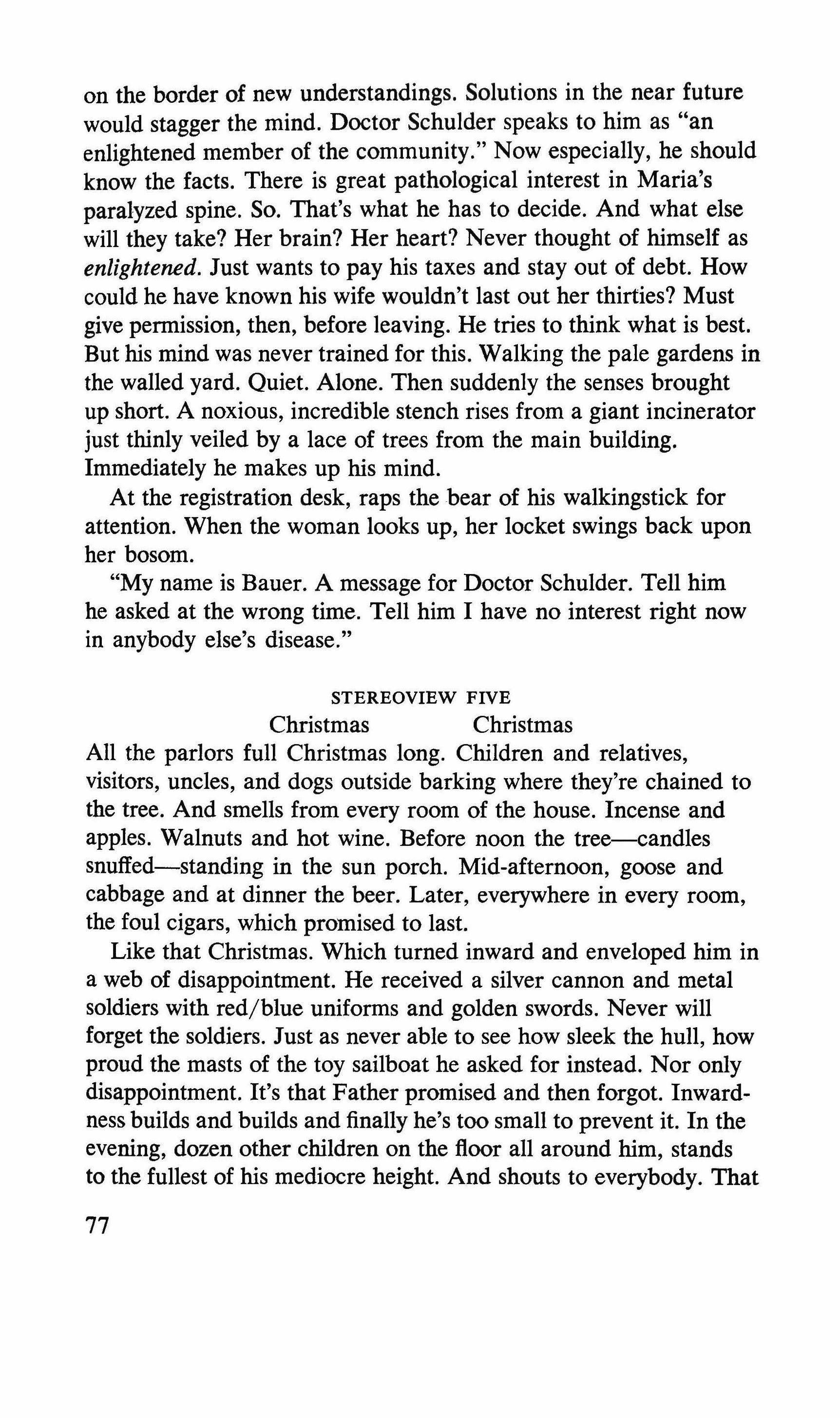
on the border of new understandings. Solutions in the near future would stagger the mind. Doctor Schulder speaks to him as "an enlightened member of the community." Now especially, he should know the facts. There is great pathological interest in Maria's paralyzed spine. So. That's what he has to decide. And what else will they take? Her brain? Her heart? Never thought of himself as enlightened. Just wants to pay his taxes and stay out of debt. How could he have known his wife wouldn't last out her thirties? Must give permission, then, before leaving. He tries to think what is best. But his mind was never trained for this. Walking the pale gardens in the walled yard. Quiet. Alone. Then suddenly the senses brought up short. A noxious, incredible stench rises from a giant incinerator just thinly veiled by a lace of trees from the main building. Immediately he makes up his mind.
At the registration desk, raps the bear of his walkingstick for attention. When the woman looks up, her locket swings back upon her bosom.
"My name is Bauer. A message for Doctor Schulder. Tell him he asked at the wrong time. Tell him I have no interest right now in anybody else's disease."
All the parlors full Christmas long. Children and relatives, visitors, uncles, and dogs outside barking where they're chained to the tree. And smells from every room of the house. Incense and apples. Walnuts and hot wine. Before noon the tree-candles snuffed-standing in the sun porch. Mid-afternoon, goose and cabbage and at dinner the beer. Later, everywhere in every room, the foul cigars, which promised to last.
Like that Christmas. Which turned inward and enveloped him in a web of disappointment. He received a silver cannon and metal soldiers with red/blue uniforms and golden swords. Never will forget the soldiers. Just as never able to see how sleek the hull, how proud the masts of the toy sailboat he asked for instead. Nor only disappointment. It's that Father promised and then forgot. Inwardness builds and builds and finally he's too small to prevent it. In the evening, dozen other children on the floor all around him, stands to the fullest of his mediocre height. And shouts to everybody. That 77
he didn't get what he asked for. Everybody laughs. So shouts it again. Then the room still. Father comes. Spanks him and sends him to his room. A little later, Mother is there. She says he was very rude to Father and must apologize. He doesn't cry. Apologize. Be polite and learn obedience. But no crying. Won't let them know any more. When he smiles, he might be hating.
Clan Table
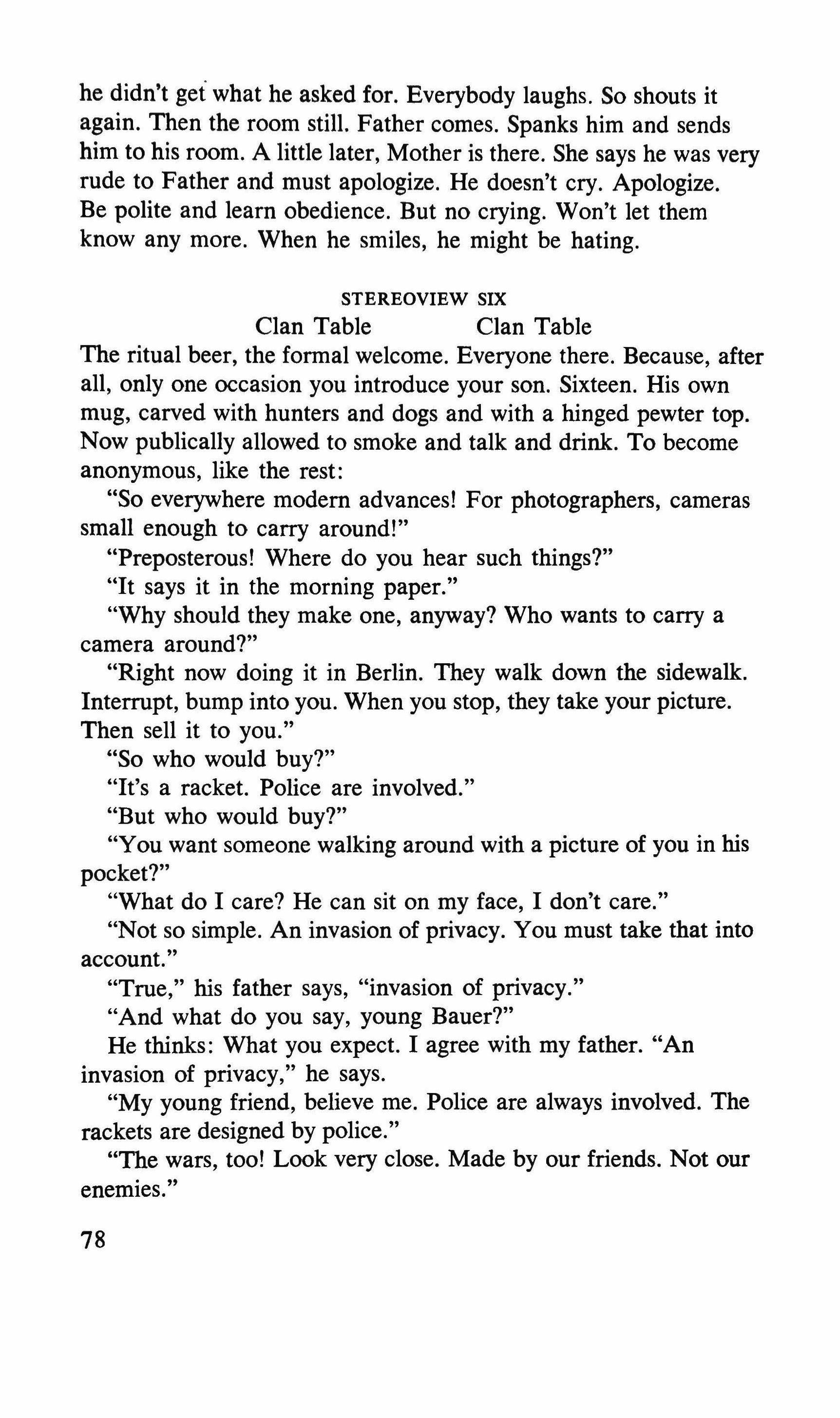
Clan Table
The ritual beer, the formal welcome. Everyone there. Because, after all, only one occasion you introduce your son. Sixteen. His own mug, carved with hunters and dogs and with a hinged pewter top. Now publically allowed to smoke and talk and drink. To become anonymous, like the rest:
"So everywhere modem advances! For photographers, cameras small enough to carry around!"
"Preposterous! Where do you hear such things?"
"It says it in the morning paper."
"Why should they make one, anyway? Who wants to carry a camera around?"
"Right now doing it in Berlin. They walk down the sidewalk. Interrupt, bump into you. When you stop, they take your picture. Then sell it to you."
"So who would buy?"
"It's a racket. Police are involved."
"But who would buy?"
"You want someone walking around with a picture of you in his pocket?"
"What do I care? He can sit on my face, I don't care."
"Not so simple. An invasion of privacy. You must take that into account."
"True," his father says, "invasion of privacy."
"And what do you say, young Bauer?"
He thinks: What you expect. I agree with my father. "An invasion of privacy," he says.
"My young friend, believe me. Police are always involved. The rackets are designed by police."
"The wars, too! Look very close. Made by our friends. Not our enemies."
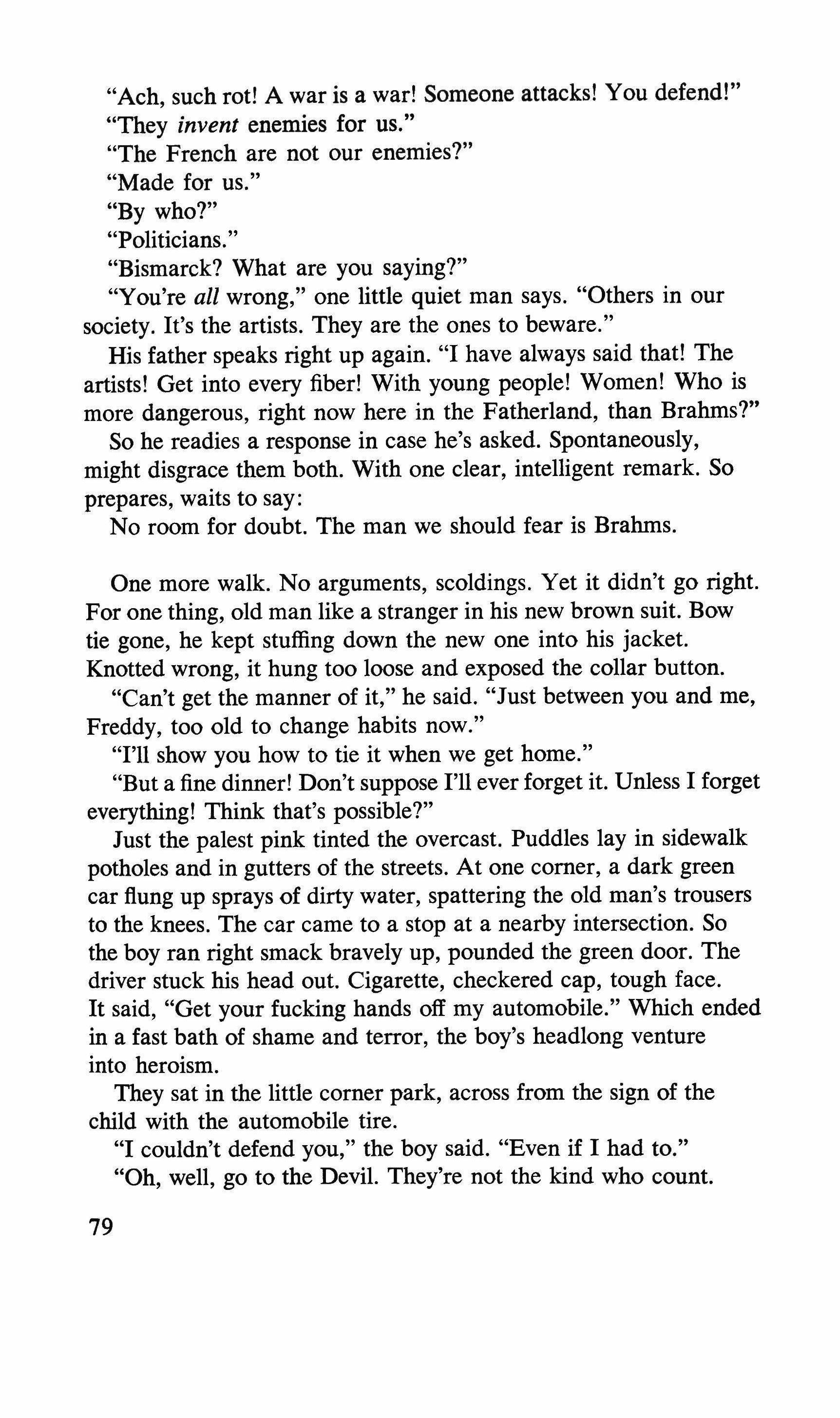
"Ach, such rot! A war is a war! Someone attacks! You defend!"
"They invent enemies for us."
"The French are not our enemies?"
"Made for us."
"By who?"
"Politicians.
"Bismarck? What are you saying?"
"You're all wrong," one little quiet man says. "Others in our society. It's the artists. They are the ones to beware."
His father speaks right up again. "I have always said that! The artists! Get into every fiber! With young people! Women! Who is more dangerous, right now here in the Fatherland, than Brahms?"
So he readies a response in case he's asked. Spontaneously, might disgrace them both. With one clear, intelligent remark. So prepares, waits to say:
No room for doubt. The man we should fear is Brahms.
One more walk. No arguments, scoldings. Yet it didn't go right. For one thing, old man like a stranger in his new brown suit. Bow tie gone, he kept stuffing down the new one into his jacket. Knotted wrong, it hung too loose and exposed the collar button.
"Can't get the manner of it," he said. "Just between you and me, Freddy, too old to change habits now."
"I'll show you how to tie it when we get home."
"But a fine dinner! Don't suppose I'll ever forget it. Unless I forget everything! Think that's possible?"
Just the palest pink tinted the overcast. Puddles lay in sidewalk potholes and in gutters of the streets. At one corner, a dark green car flung up sprays of dirty water, spattering the old man's trousers to the knees. The car came to a stop at a nearby intersection. So the boy ran right smack bravely up, pounded the green door. The driver stuck his head out. Cigarette, checkered cap, tough face. It said, "Get your fucking hands off my automobile." Which ended in a fast bath of shame and terror, the boy's headlong venture into heroism.
They sat in the little corner park, across from the sign of the child with the automobile tire.
"I couldn't defend you," the boy said. "Even if I had to."
"Oh, well, go to the Devil. They're not the kind who count.
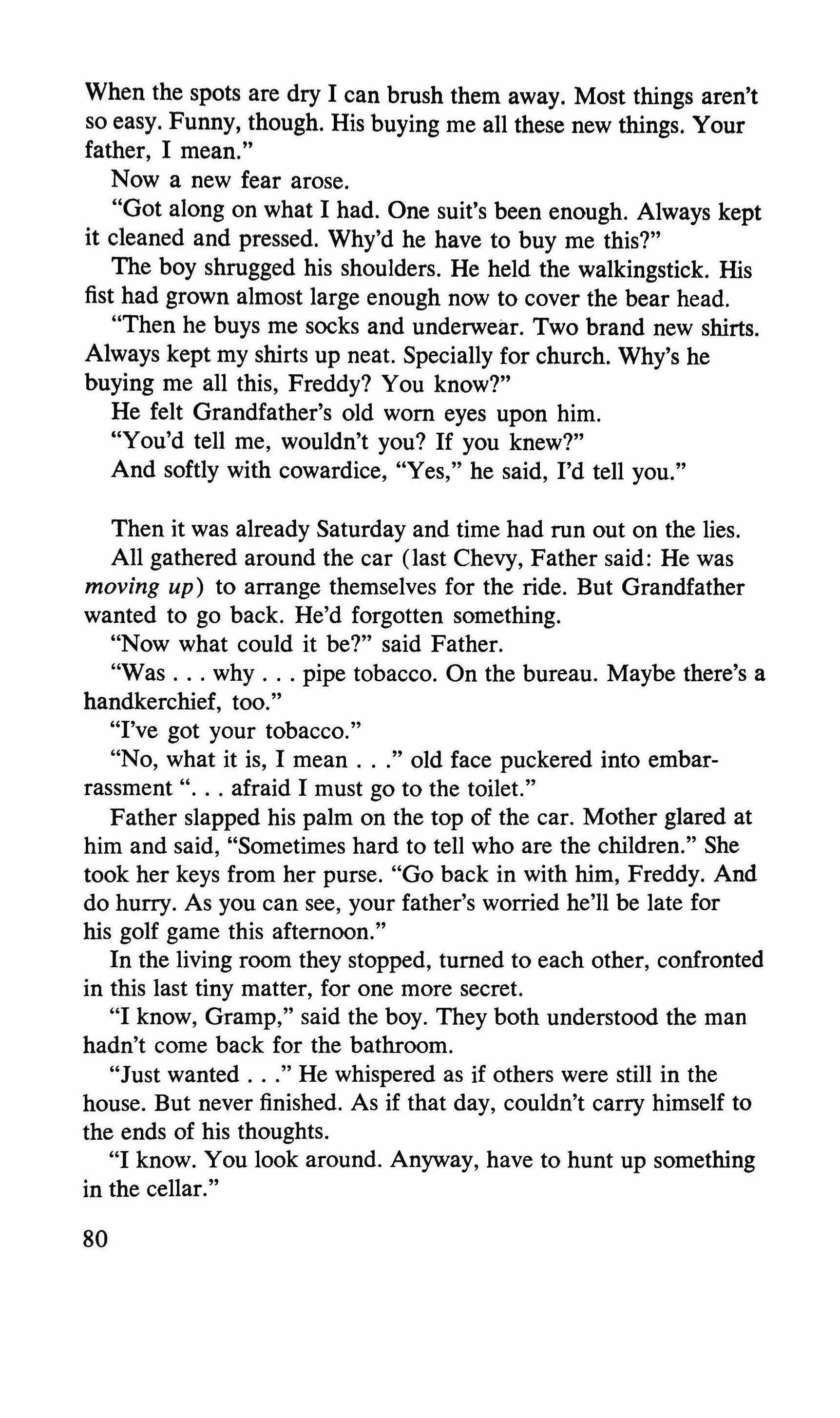
When the spots are dry I can brush them away. Most things aren't so easy. Funny, though. His buying me all these new things. Your father, I mean."
Now a new fear arose.
"Got along on what I had. One suit's been enough. Always kept it cleaned and pressed. Why'd he have to buy me this?"
The boy shrugged his shoulders. He held the walkingstick. His fist had grown almost large enough now to cover the bear head.
"Then he buys me socks and underwear. Two brand new shirts. Always kept my shirts up neat. Specially for church. Why's he buying me all this, Freddy? You know?"
He felt Grandfather's old worn eyes upon him.
"You'd tell me, wouldn't you? If you knew?"
And softly with cowardice, "Yes," he said, I'd tell you."
Then it was already Saturday and time had run out on the lies. All gathered around the car (last Chevy, Father said: He was moving up) to arrange themselves for the ride. But Grandfather wanted to go back. He'd forgotten something.
"Now what could it be?" said Father.
"Was why pipe tobacco. On the bureau. Maybe there's a handkerchief, too."
"I've got your tobacco."
"No, what it is, I mean old face puckered into embarrassment afraid I must go to the toilet."
Father slapped his palm on the top of the car. Mother glared at him and said, "Sometimes hard to tell who are the children." She took her keys from her purse. "Go back in with him, Freddy. And do hurry, As you can see, your father's worried he'll be late for his golf game this afternoon."
In the living room they stopped, turned to each other, confronted in this last tiny matter, for one more secret.
"I know, Gramp," said the boy. They both understood the man hadn't come back for the bathroom.
"Just wanted He whispered as if others were still in the house. But never finished. As if that day, couldn't carry himself to the ends of his thoughts.
"I know. You look around. Anyway, have to hunt up something in the cellar."
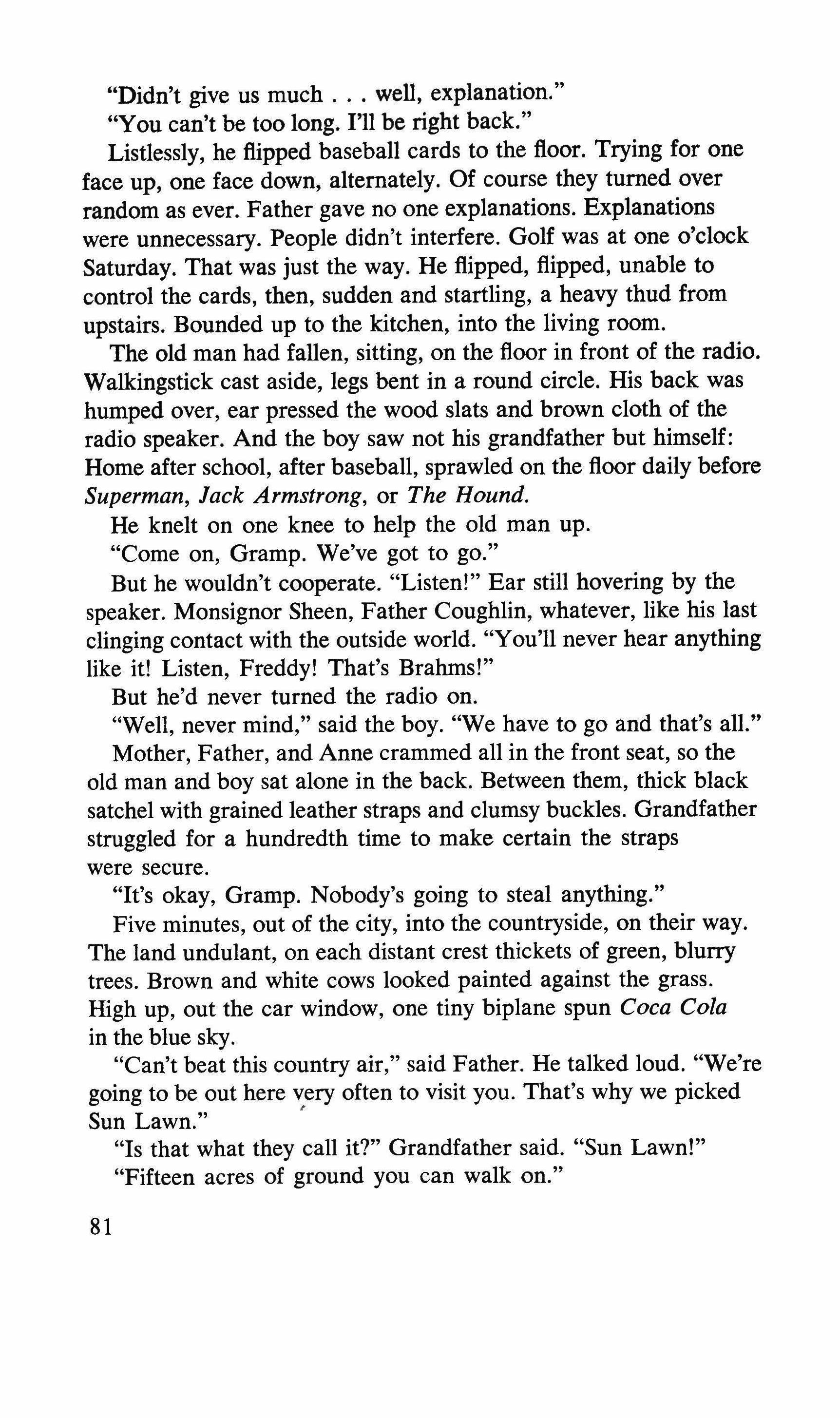
"Didn't give us much well, explanation."
"You can't be too long. I'll be right back."
Listlessly, he flipped baseball cards to the floor. Trying for one face up, one face down, alternately. Of course they turned over random as ever. Father gave no one explanations. Explanations were unnecessary. People didn't interfere. Golf was at one o'clock Saturday. That was just the way. He flipped, flipped, unable to control the cards, then, sudden and startling, a heavy thud from upstairs. Bounded up to the kitchen, into the living room.
The old man had fallen, sitting, on the floor in front of the radio. Walkingstick cast aside, legs bent in a round circle. His back was humped over, ear pressed the wood slats and brown cloth of the radio speaker. And the boy saw not his grandfather but himself: Home after school, after baseball, sprawled on the floor daily before Superman, Jack Armstrong, or The Hound.
He knelt on one knee to help the old man up.
"Come on, Gramp. We've got to go."
But he wouldn't cooperate. "Listen!" Ear still hovering by the speaker. Monsignor Sheen, Father Coughlin, whatever, like his last clinging contact with the outside world. "You'll never hear anything like it! Listen, Freddy! That's Brahms!"
But he'd never turned the radio on.
"Well, never mind," said the boy. "We have to go and that's all."
Mother, Father, and Anne crammed all in the front seat, so the old man and boy sat alone in the back. Between them, thick black satchel with grained leather straps and clumsy buckles. Grandfather struggled for a hundredth time to make certain the straps were secure.
"It's okay, Gramp. Nobody's going to steal anything."
Five minutes, out of the city, into the countryside, on their way. The land undulant, on each distant crest thickets of green, blurry trees. Brown and white cows looked painted against the grass. High up, out the car window, one tiny biplane spun Coca Cola in the blue sky.
"Can't beat this country air," said Father. He talked loud. "We're going to be out here very often to visit you. That's why we picked Sun Lawn." r
"Is that what they call it?" Grandfather said. "Sun Lawn!"
"Fifteen acres of ground you can walk on."
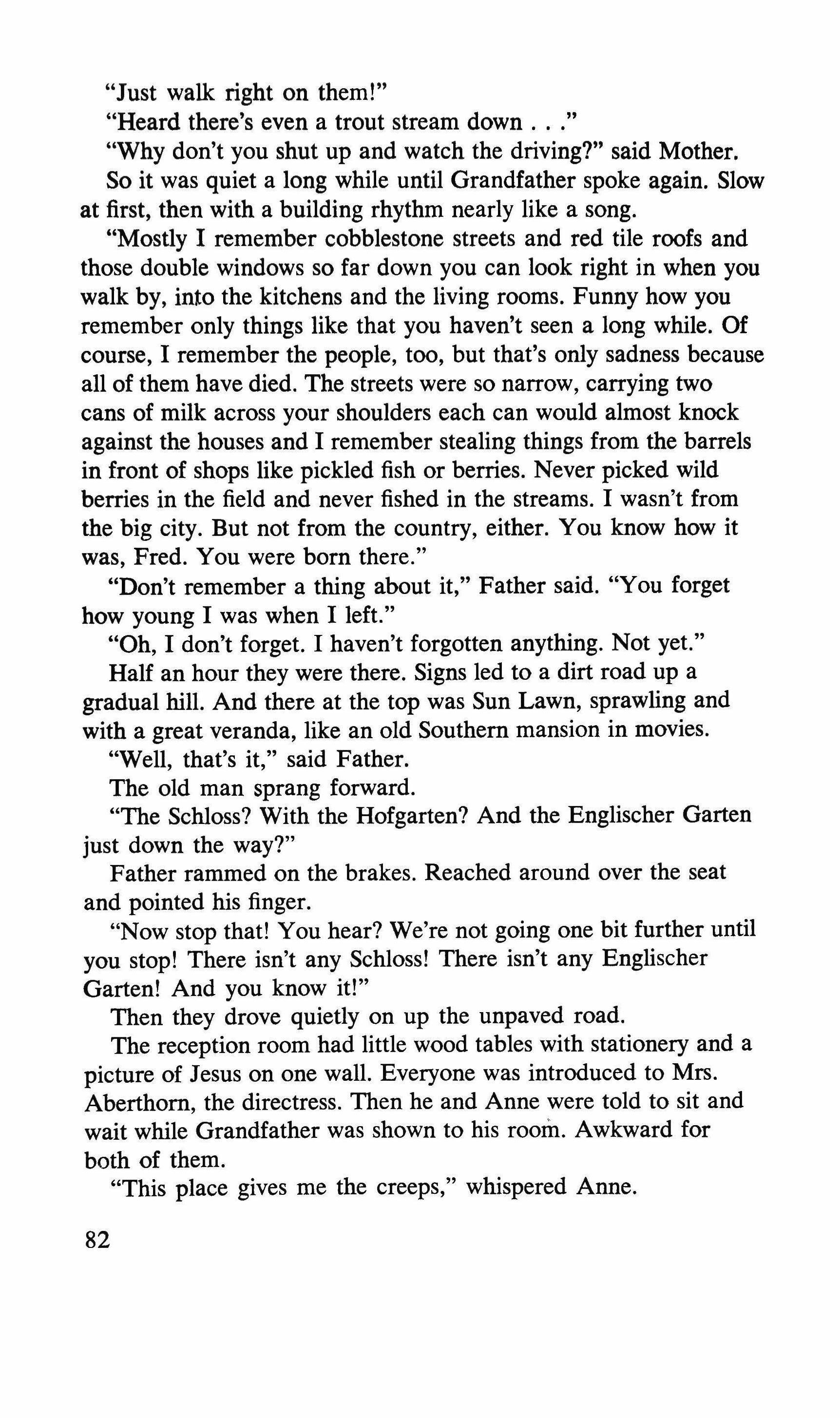
"Just walk right on them!"
"Heard there's even a trout stream down
"Why don't you shut up and watch the driving?" said Mother. So it was quiet a long while until Grandfather spoke again. Slow at first, then with a building rhythm nearly like a song.
"Mostly I remember cobblestone streets and red tile roofs and those double windows so far down you can look right in when you walk by, into the kitchens and the living rooms. Funny how you remember only things like that you haven't seen a long while. Of course, I remember the people, too, but that's only sadness because all of them have died. The streets were so narrow, carrying two cans of milk across your shoulders each can would almost knock against the houses and I remember stealing things from the barrels in front of shops like pickled fish or berries. Never picked wild berries in the field and never fished in the streams. I wasn't from the big city. But not from the country, either. You know how it was, Fred. You were born there."
"Don't remember a thing about it," Father said. "You forget how young I was when I left."
"Oh, I don't forget. I haven't forgotten anything. Not yet."
Half an hour they were there. Signs led to a dirt road up a gradual hill. And there at the top was Sun Lawn, sprawling and with a great veranda, like an old Southern mansion in movies.
"Well, that's it," said Father.
The old man sprang forward.
"The Schloss? With the Hofgarten? And the Englischer Garten just down the way?"
Father rammed on the brakes. Reached around over the seat and pointed his finger.
"Now stop that! You hear? We're not going one bit further until you stop! There isn't any Schloss! There isn't any Englischer Garten! And you know it!"
Then they drove quietly on up the unpaved road.
The reception room had little wood tables with stationery and a picture of Jesus on one wall. Everyone was introduced to Mrs. Aberthorn, the directress. Then he and Anne were told to sit and wait while Grandfather was shown to his room. Awkward for both of them.
"This place gives me the creeps," whispered Anne.
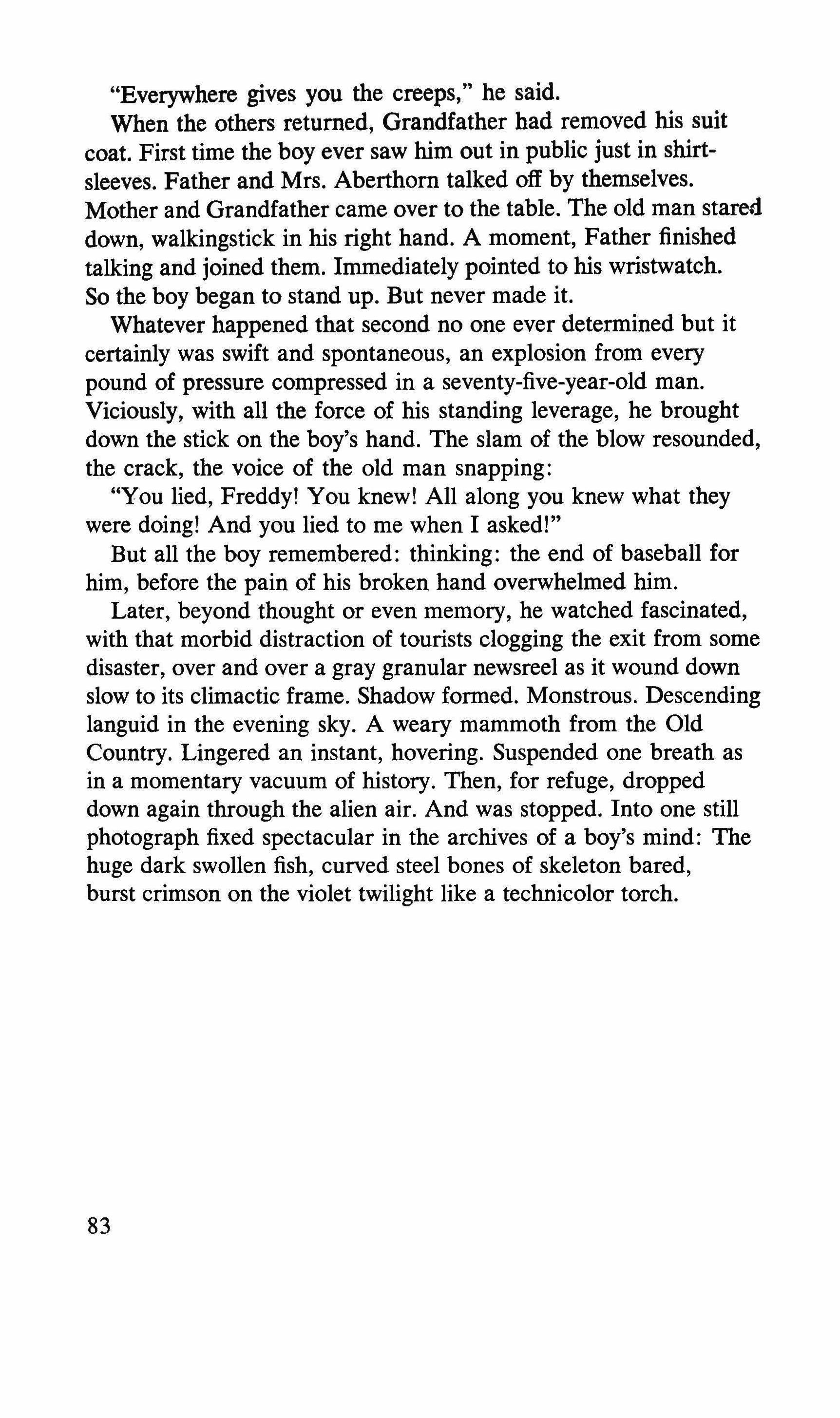
"Everywhere gives you the creeps," he said. When the others returned, Grandfather had removed his suit coat. First time the boy ever saw him out in public just in shirtsleeves. Father and Mrs. Aberthorn talked off by themselves. Mother and Grandfather came over to the table. The old man stared down, walkingstick in his right hand. A moment, Father finished talking and joined them. Immediately pointed to his wristwatch. So the boy began to stand up. But never made it. Whatever happened that second no one ever determined but it certainly was swift and spontaneous, an explosion from every pound of pressure compressed in a seventy-five-year-old man. Viciously, with all the force of his standing leverage, he brought down the stick on the boy's hand. The slam of the blow resounded, the crack, the voice of the old man snapping:
"You lied, Freddy! You knew! All along you knew what they were doing! And you lied to me when I asked!"
But all the boy remembered: thinking: the end of baseball for him, before the pain of his broken hand overwhelmed him.
Later, beyond thought or even memory, he watched fascinated, with that morbid distraction of tourists clogging the exit from some disaster, over and over a gray granular newsreel as it wound down slow to its climactic frame. Shadow formed. Monstrous. Descending languid in the evening sky. A weary mammoth from the Old Country. Lingered an instant, hovering. Suspended one breath as in a momentary vacuum of history. Then, for refuge, dropped down again through the alien air. And was stopped. Into one still photograph fixed spectacular in the archives of a boy's mind: The huge dark swollen fish, curved steel bones of skeleton bared, burst crimson on the violet twilight like a technicolor torch.
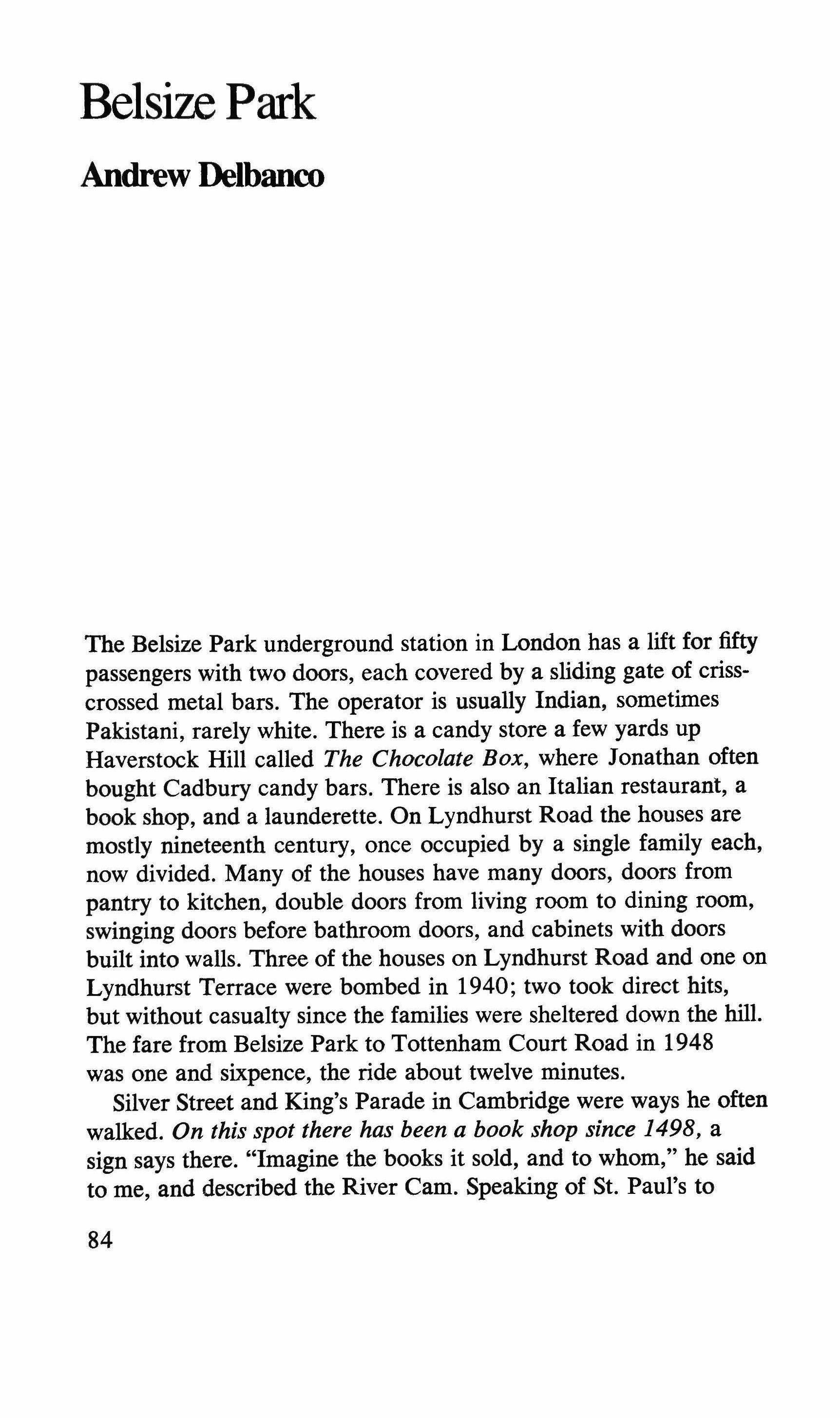
The Belsize Park underground station in London has a lift for fifty passengers with two doors, each covered by a sliding gate of crisscrossed metal bars. The operator is usually Indian, sometimes Pakistani, rarely white. There is a candy store a few yards up Haverstock Hill called The Chocolate Box, where Jonathan often bought Cadbury candy bars. There is also an Italian restaurant, a book shop, and a launderette. On Lyndhurst Road the houses are mostly nineteenth century, once occupied by a single family each, now divided. Many of the houses have many doors, doors from pantry to kitchen, double doors from living room to dining room, swinging doors before bathroom doors, and cabinets with doors built into walls. Three of the houses on Lyndhurst Road and one on Lyndhurst Terrace were bombed in 1940; two took direct hits, but without casualty since the families were sheltered down the hill. The fare from Belsize Park to Tottenham Court Road in 1948 was one and sixpence, the ride about twelve minutes. Silver Street and King's Parade in Cambridge were ways he often walked. On this spot there has been a book shop since 1498, a sign says there. "Imagine the books it sold, and to whom," he said to me, and described the River Cam. Speaking of St. Paul's to
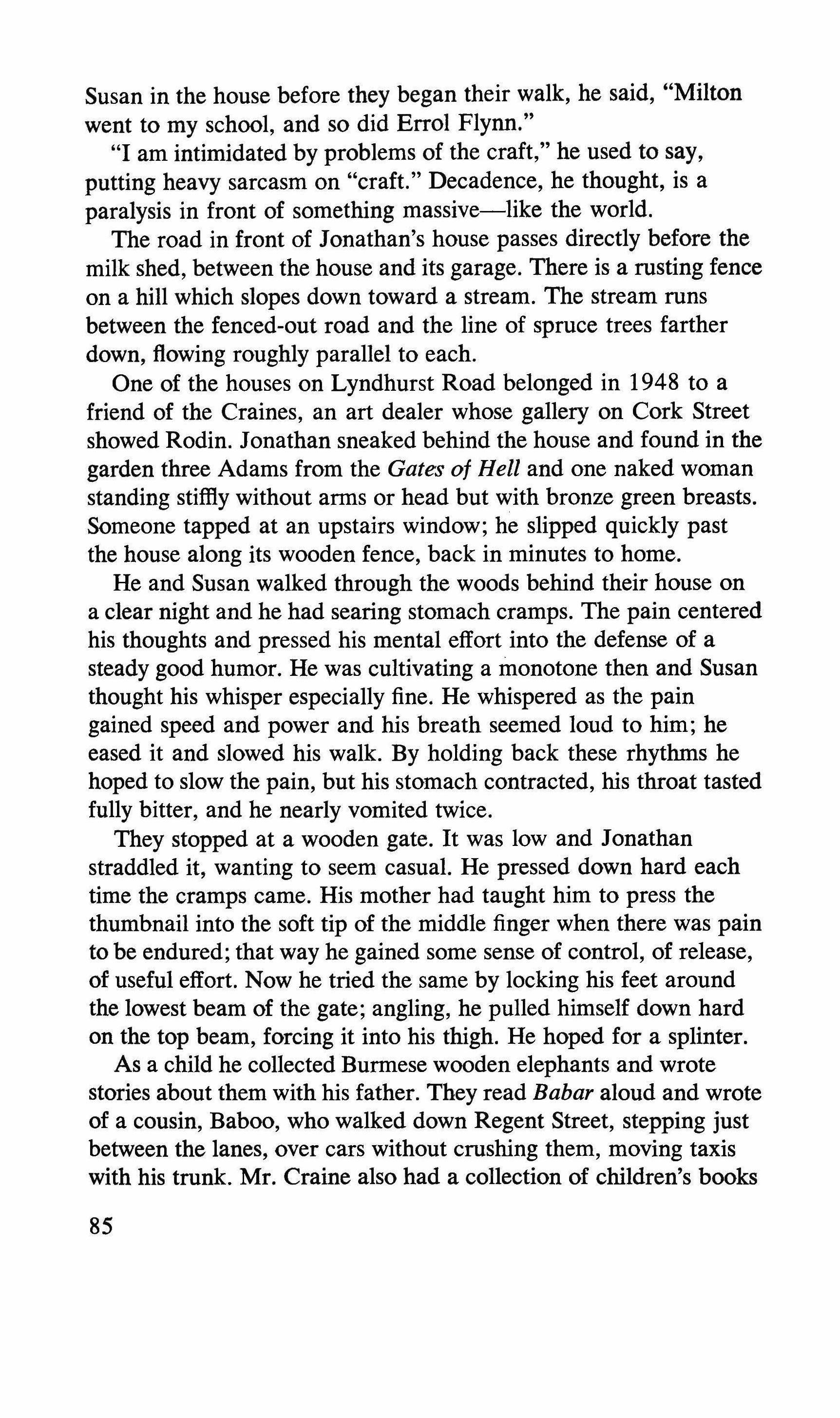
Susan in the house before they began their walk, he said, "Milton went to my school, and so did Errol Flynn."
"I am intimidated by problems of the craft," he used to say, putting heavy sarcasm on "craft." Decadence, he thought, is a paralysis in front of something massive-like the world.
The road in front of Jonathan's house passes directly before the milk shed, between the house and its garage. There is a rusting fence on a hill which slopes down toward a stream. The stream runs between the fenced-out road and the line of spruce trees farther down, flowing roughly parallel to each.
One of the houses on Lyndhurst Road belonged in 1948 to a friend of the Craines, an art dealer whose gallery on Cork Street showed Rodin. Jonathan sneaked behind the house and found in the garden three Adams from the Gates of Hell and one naked woman standing stiffly without arms or head but with bronze green breasts. Someone tapped at an upstairs window; he slipped quickly past the house along its wooden fence, back in minutes to home.
He and Susan walked through the woods behind their house on a clear night and he had searing stomach cramps. The pain centered his thoughts and pressed his mental effort into the defense of a steady good humor. He was cultivating a monotone then and Susan thought his whisper especially fine. He whispered as the pain gained speed and power and his breath seemed loud to him; he eased it and slowed his walk. By holding back these rhythms he hoped to slow the pain, but his stomach contracted, his throat tasted fully bitter, and he nearly vomited twice.
They stopped at a wooden gate. It was low and Jonathan straddled it, wanting to seem casual. He pressed down hard each time the cramps came. His mother had taught him to press the thumbnail into the soft tip of the middle finger when there was pain to be endured; that way he gained some sense of control, of release, of useful effort. Now he tried the same by locking his feet around the lowest beam of the gate; angling, he pulled himself down hard on the top beam, forcing it into his thigh. He hoped for a splinter.
As a child he collected Burmese wooden elephants and wrote stories about them with his father. They read Babar aloud and wrote of a cousin, Baboo, who walked down Regent Street, stepping just between the lanes, over cars without crushing them, moving taxis with his trunk. Mr. Craine also had a collection of children's books
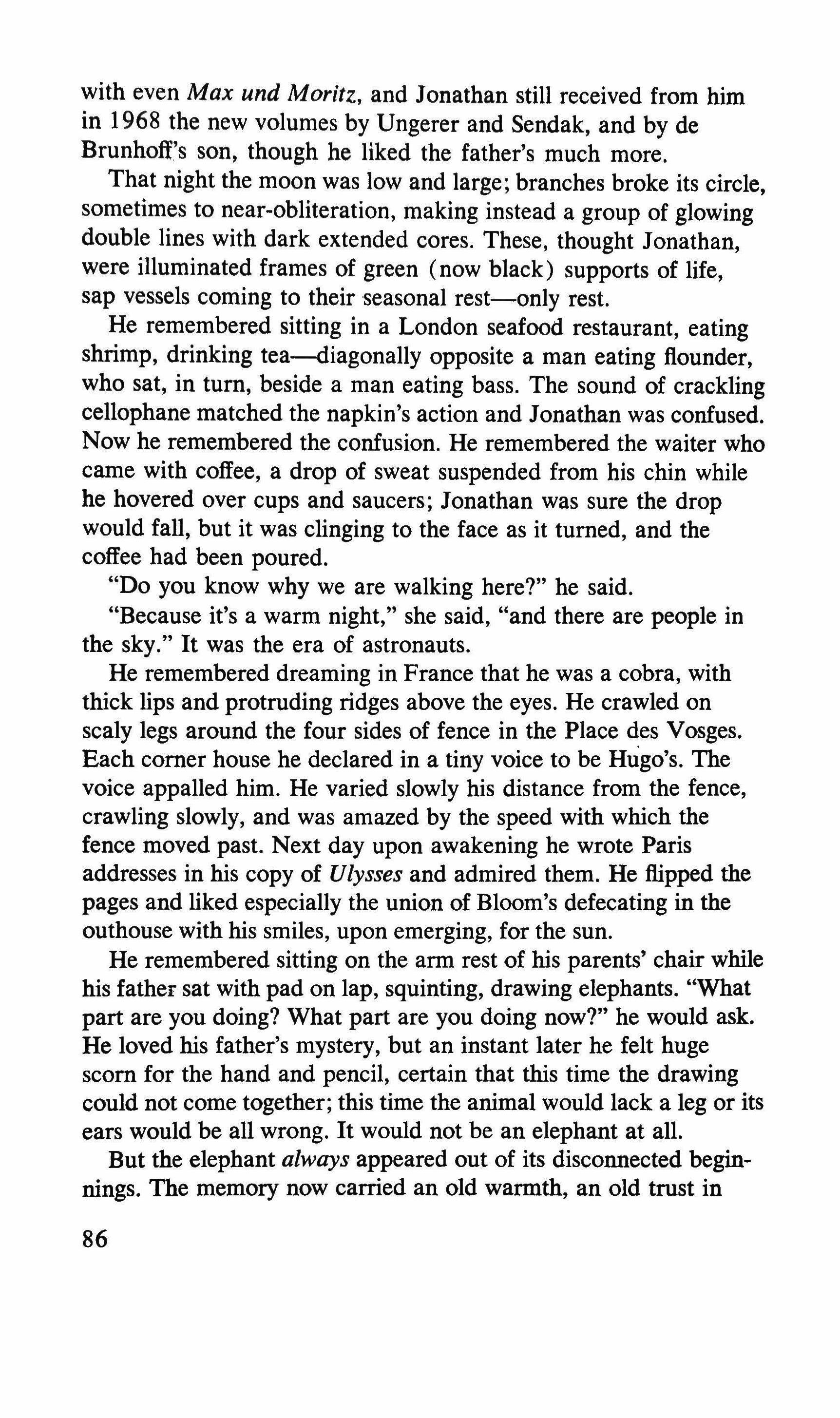
with even Max und Moritz, and Jonathan still received from him in 1968 the new volumes by Ungerer and Sendak, and by de Brunhoff's son, though he liked the father's much more.
That night the moon was low and large; branches broke its circle, sometimes to near-obliteration, making instead a group of glowing double lines with dark extended cores. These, thought Jonathan, were illuminated frames of green (now black) supports of life, sap vessels coming to their seasonal rest-only rest.
He remembered sitting in a London seafood restaurant, eating shrimp, drinking tea-diagonally opposite a man eating flounder, who sat, in tum, beside a man eating bass. The sound of crackling cellophane matched the napkin's action and Jonathan was confused. Now he remembered the confusion. He remembered the waiter who came with coffee, a drop of sweat suspended from his chin while he hovered over cups and saucers; Jonathan was sure the drop would fall, but it was clinging to the face as it turned, and the coffee had been poured.
"Do you know why we are walking here?" he said.
"Because it's a warm night," she said, "and there are people in the sky." It was the era of astronauts.
He remembered dreaming in France that he was a cobra, with thick lips and protruding ridges above the eyes. He crawled on scaly legs around the four sides of fence in the Place des Vosges. Each comer house he declared in a tiny voice to be Hugo's. The voice appalled him. He varied slowly his distance from the fence, crawling slowly, and was amazed by the speed with which the fence moved past. Next day upon awakening he wrote Paris addresses in his copy of Ulysses and admired them. He flipped the pages and liked especially the union of Bloom's defecating in the outhouse with his smiles, upon emerging, for the sun.
He remembered sitting on the arm rest of his parents' chair while his father sat with pad on lap, squinting, drawing elephants. "What part are you doing? What part are you doing now?" he would ask. He loved his father's mystery, but an instant later he felt huge scorn for the hand and pencil, certain that this time the drawing could not come together; this time the animal would lack a leg or its ears would be all wrong. It would not be an elephant at all.
But the elephant always appeared out of its disconnected beginnings. The memory now carried an old warmth, an old trust in
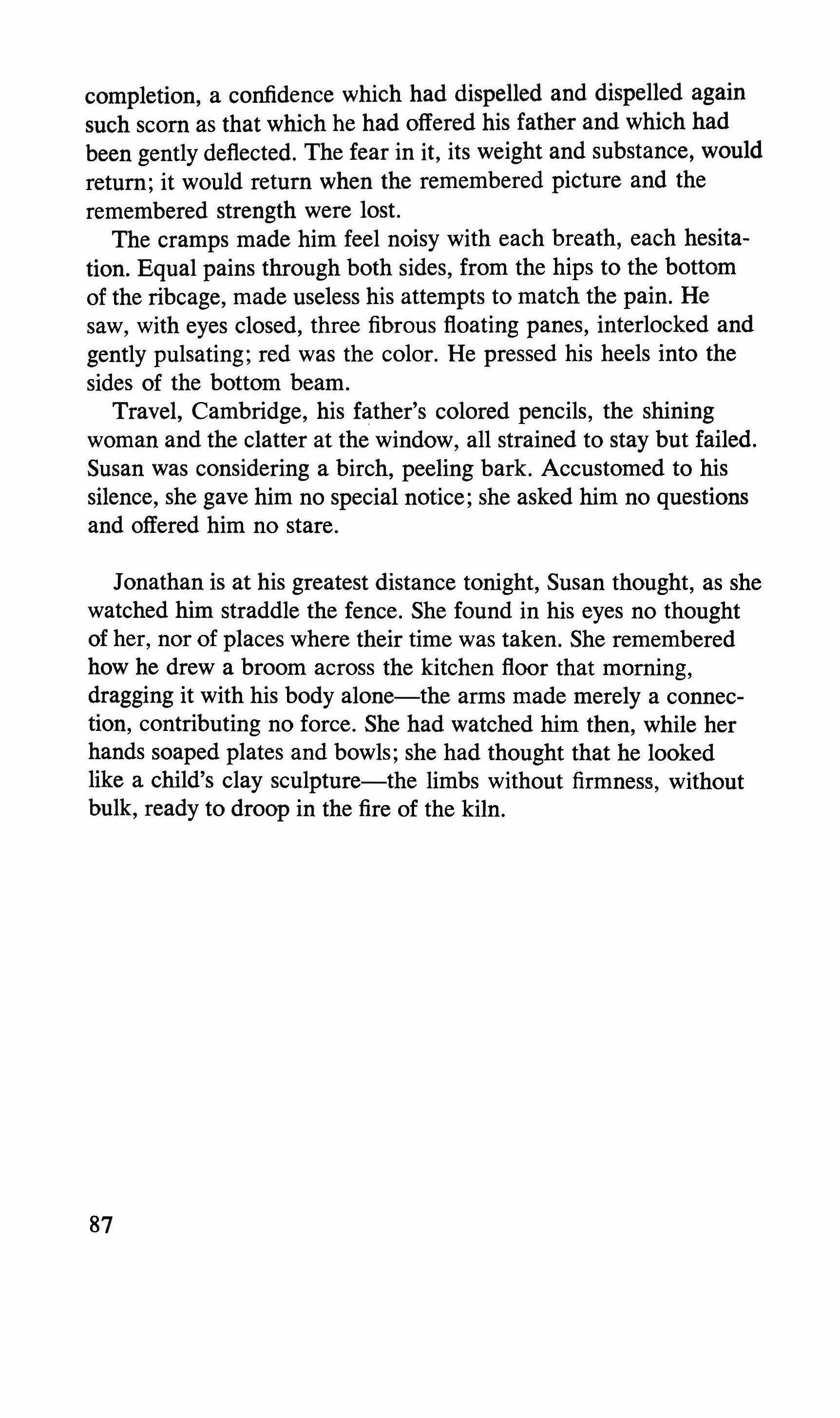
completion, a confidence which had dispelled and dispelled again such scorn as that which he had offered his father and which had been gently deflected. The fear in it, its weight and substance, would return; it would return when the remembered picture and the remembered strength were lost.
The cramps made him feel noisy with each breath, each hesitation. Equal pains through both sides, from the hips to the bottom of the ribcage, made useless his attempts to match the pain. He saw, with eyes closed, three fibrous floating panes, interlocked and gently pulsating; red was the color. He pressed his heels into the sides of the bottom beam.
Travel, Cambridge, his father's colored pencils, the shining woman and the clatter at the window, all strained to stay but failed. Susan was considering a birch, peeling bark. Accustomed to his silence, she gave him no special notice; she asked him no questions and offered him no stare.
Jonathan is at his greatest distance tonight, Susan thought, as she watched him straddle the fence. She found in his eyes no thought of her, nor of places where their time was taken. She remembered how he drew a broom across the kitchen floor that morning, dragging it with his body alone-the arms made merely a connection, contributing no force. She had watched him then, while her hands soaped plates and bowls; she had thought that he looked like a child's clay sculpture-the limbs without firmness, without bulk, ready to droop in the fire of the kiln.

1
"Breakfast! Breakfast ready!" an Italian accent shouted down the hallway, and in a moment three quick raps on the stateroom door were followed by a repetition of the rather angry invitation. Margaret, already awake and restless, waited for the sound of retreating footsteps, and, hearing nothing, reached under the bed for a shoe and heaved it at the door. The shoe hit its mark, then bounced wildly against a cabinet and onto the floor. "Damn!" said Margaret, and Richard said: "Carians, Leleges, and Amazon Princes began it; Achaeans invaded; Androclus sent servants to Delphi, reported the colony ought to follow a fish and a boar."
2
Ephesus, toppled by earthquakes and wars, ravished by plague and disease, lies like a dissected corpse under the hands of the expedition which has unearthed it. Ionian, Hellenistic, and Roman fragments are mixed in the dust, and beside them lies Asia: Seljuk and Aydinogullari remains. The Temple of Artemis is a few broken pieces of marble, and the goddess, the woman whose many breasts nourished the city, the licentious opposite of her chaste Western
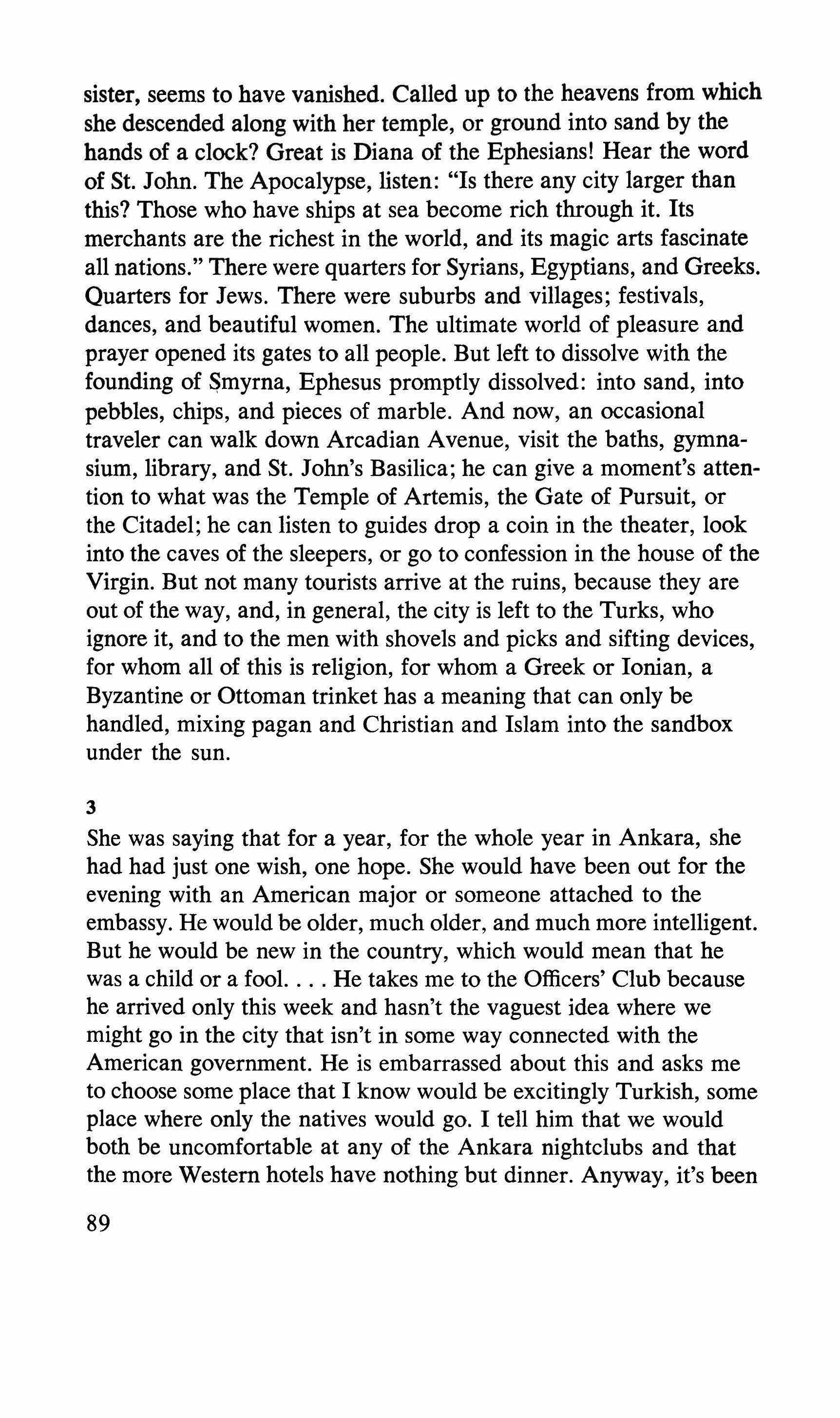
sister, seems to have vanished. Called up to the heavens from which she descended along with her temple, or ground into sand by the hands of a clock? Great is Diana of the Ephesians! Hear the word of St. John. The Apocalypse, listen: "Is there any city larger than this? Those who have ships at sea become rich through it. Its merchants are the richest in the world, and its magic arts fascinate all nations." There were quarters for Syrians, Egyptians, and Greeks. Quarters for Jews. There were suburbs and villages; festivals, dances, and beautiful women. The ultimate world of pleasure and prayer opened its gates to all people. But left to dissolve with the founding of Smyrna, Ephesus promptly dissolved: into sand, into pebbles, chips, and pieces of marble. And now, an occasional traveler can walk down Arcadian Avenue, visit the baths, gymnasium, library, and St. John's Basilica; he can give a moment's attention to what was the Temple of Artemis, the Gate of Pursuit, or the Citadel; he can listen to guides drop a coin in the theater, look into the caves of the sleepers, or go to confession in the house of the Virgin. But not many tourists arrive at the ruins, because they are out of the way, and, in general, the city is left to the Turks, who ignore it, and to the men with shovels and picks and sifting devices, for whom all of this is religion, for whom a Greek or Ionian, a Byzantine or Ottoman trinket has a meaning that can only be handled, mixing pagan and Christian and Islam into the sandbox under the sun.
3
She was saying that for a year, for the whole year in Ankara, she had had just one wish, one hope. She would have been out for the evening with an American major or someone attached to the embassy. He would be older, much older, and much more intelligent. But he would be new in the country, which would mean that he was a child or a fool. He takes me to the Officers' Club because he arrived only this week and hasn't the vaguest idea where we might go in the city that isn't in some way connected with the American government. He is embarrassed about this and asks me to choose some place that I know would be excitingly Turkish, some place where only the natives would go. I tell him that we would both be uncomfortable at any of the Ankara nightclubs and that the more Western hotels have nothing but dinner. Anyway, it's been
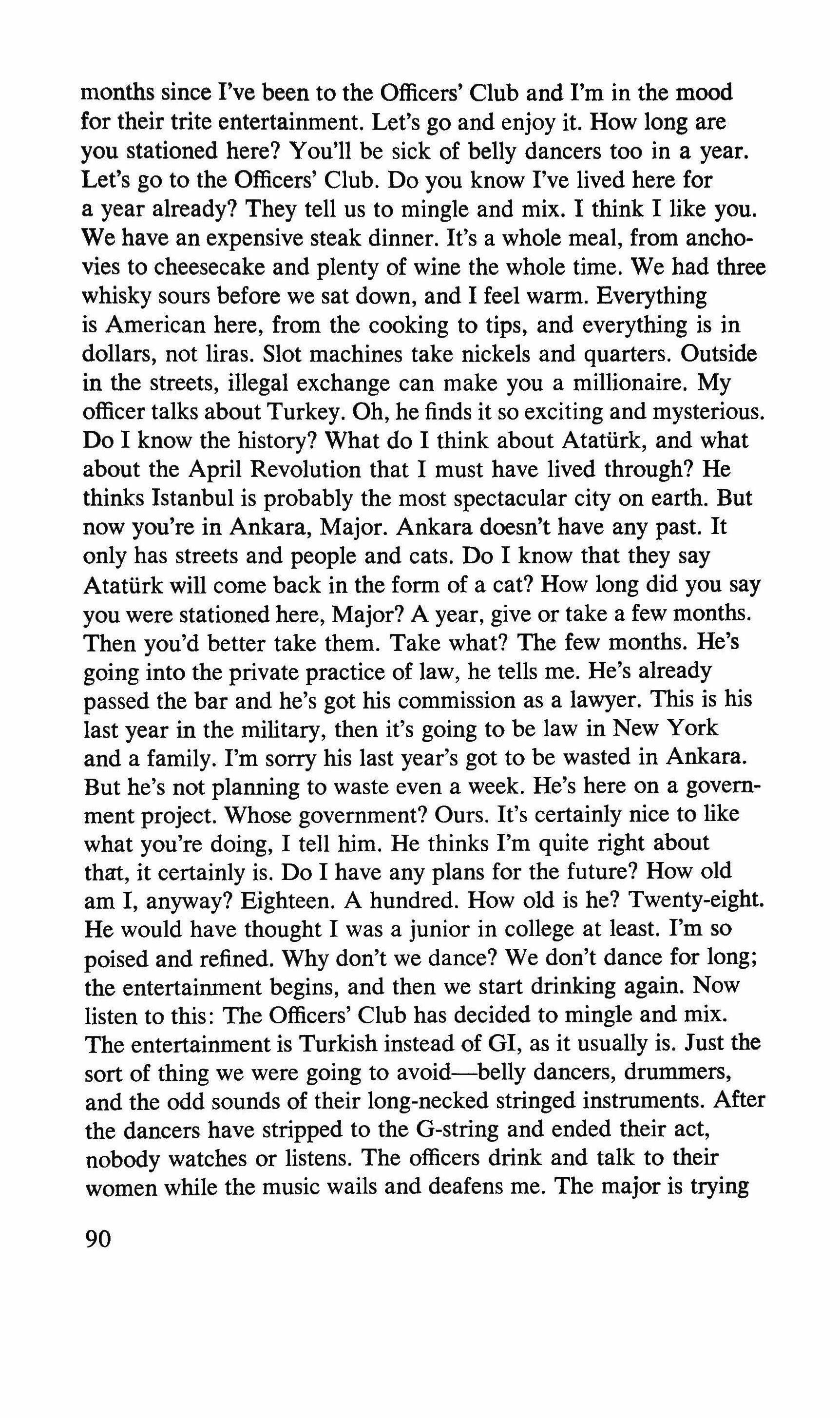
months since I've been to the Officers' Club and I'm in the mood for their trite entertainment. Let's go and enjoy it. How long are you stationed here? You'll be sick of belly dancers too in a year. Let's go to the Officers' Club. Do you know I've lived here for a year already? They tell us to mingle and mix. I think I like you. We have an expensive steak dinner. It's a whole meal, from anchovies to cheesecake and plenty of wine the whole time. We had three whisky sours before we sat down, and I feel warm. Everything is American here, from the cooking to tips, and everything is in dollars, not liras. Slot machines take nickels and quarters. Outside in the streets, illegal exchange can make you a millionaire. My officer talks about Turkey. Oh, he finds it so exciting and mysterious. Do I know the history? What do I think about Atatiirk, and what about the April Revolution that I must have lived through? He thinks Istanbul is probably the most spectacular city on earth. But now you're in Ankara, Major. Ankara doesn't have any past. It only has streets and people and cats. Do I know that they say Ataturk will come back in the form of a cat? How long did you say you were stationed here, Major? A year, give or take a few months. Then you'd better take them. Take what? The few months. He's going into the private practice of law, he tells me. He's already passed the bar and he's got his commission as a lawyer. This is his last year in the military, then it's going to be law in New York and a family. I'm sorry his last year's got to be wasted in Ankara. But he's not planning to waste even a week. He's here on a government project. Whose government? Ours. It's certainly nice to like what you're doing, I tell him. He thinks I'm quite right about that, it certainly is. Do I have any plans for the future? How old am I, anyway? Eighteen. A hundred. How old is he? Twenty-eight. He would have thought I was a junior in college at least. I'm so poised and refined. Why don't we dance? We don't dance for long; the entertainment begins, and then we start drinking again. Now listen to this: The Officers' Club has decided to mingle and mix. The entertainment is Turkish instead of GI, as it usually is. Just the sort of thing we were going to avoid-belly dancers, drummers, and the odd sounds of their long-necked stringed instruments. After the dancers have stripped to the G-string and ended their act, nobody watches or listens. The officers drink and talk to their women while the music wails and deafens me. The major is trying
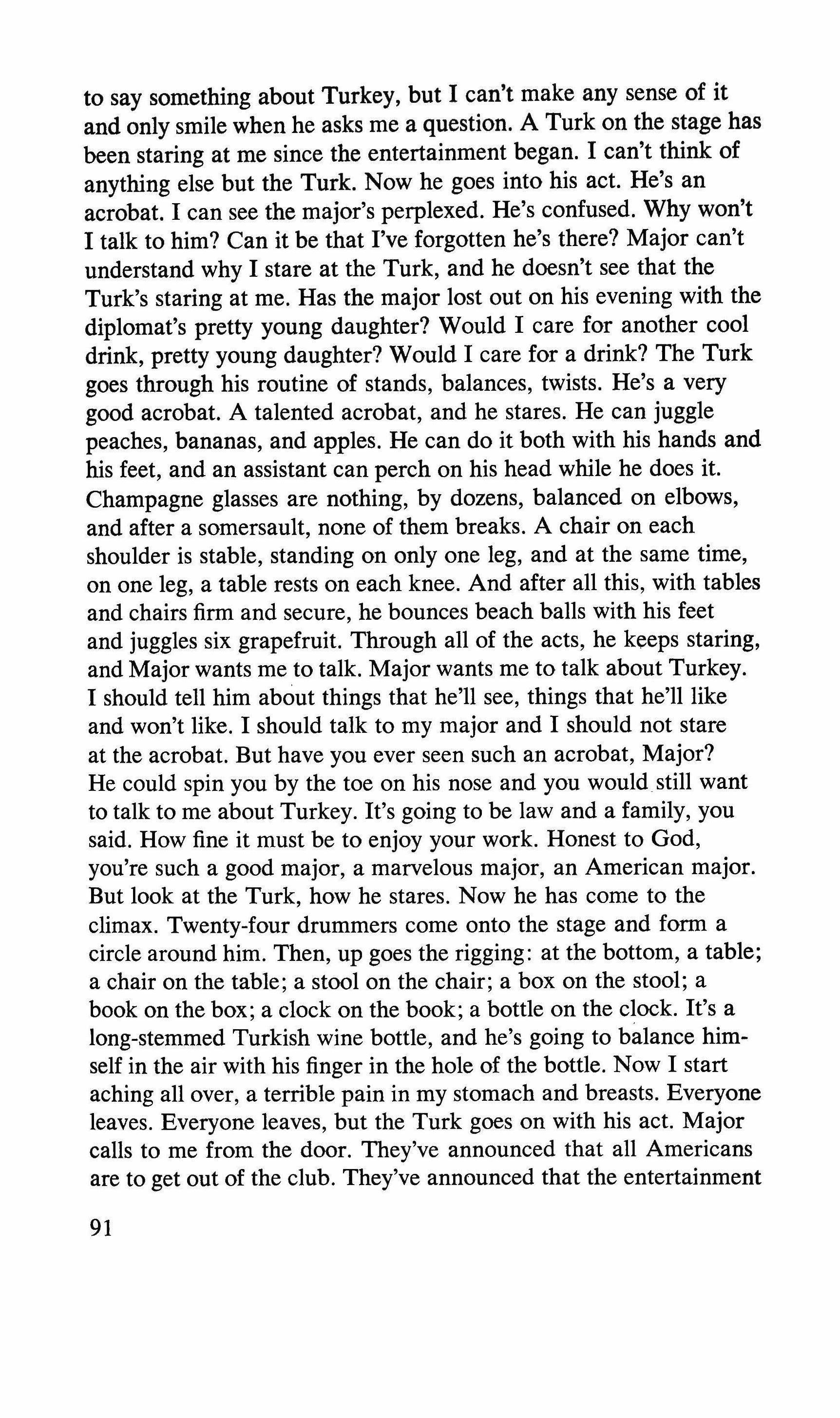
to say something about Turkey, but I can't make any sense of it and only smile when he asks me a question. A Turk on the stage has been staring at me since the entertainment began. I can't think of anything else but the Turk. Now he goes into his act. He's an acrobat. I can see the major's perplexed. He's confused. Why won't I talk to him? Can it be that I've forgotten he's there? Major can't understand why I stare at the Turk, and he doesn't see that the Turk's staring at me. Has the major lost out on his evening with the diplomat's pretty young daughter? Would I care for another cool drink, pretty young daughter? Would I care for a drink? The Turk goes through his routine of stands, balances, twists. He's a very good acrobat. A talented acrobat, and he stares. He can juggle peaches, bananas, and apples. He can do it both with his hands and his feet, and an assistant can perch on his head while he does it. Champagne glasses are nothing, by dozens, balanced on elbows, and after a somersault, none of them breaks. A chair on each shoulder is stable, standing on only one leg, and at the same time, on one leg, a table rests on each knee. And after all this, with tables and chairs firm and secure, he bounces beach balls with his feet and juggles six grapefruit. Through all of the acts, he keeps staring, and Major wants me to talk. Major wants me to talk about Turkey. I should tell him about things that he'll see, things that he'll like and won't like. I should talk to my major and I should not stare at the acrobat. But have you ever seen such an acrobat, Major? He could spin you by the toe on his nose and you would. still want to talk to me about Turkey. It's going to be law and a family, you said. How fine it must be to enjoy your work. Honest to God, you're such a good major, a marvelous major, an American major. But look at the Turk, how he stares. Now he has come to the climax. Twenty-four drummers come onto the stage and form a circle around him. Then, up goes the rigging: at the bottom, a table; a chair on the table; a stool on the chair; a box on the stool; a book on the box; a clock on the book; a bottle on the clock. It's a long-stemmed Turkish wine bottle, and he's going to balance himself in the air with his finger in the hole of the bottle. Now I start aching all over, a terrible pain in my stomach and breasts. Everyone leaves. Everyone leaves, but the Turk goes on with his act. Major calls to me from the door. They've announced that all Americans are to get out of the club. They've announced that the entertainment

is over, that the evening has ended. Major calls to me from the door. He wants New York and law and a family. He goes out of the door and shuts it behind him. I stare at the Turk as he stares. We were told to mingle and mix, so I stare at the acrobat who stabs his finger deep in the hole, staring and trying to balance himself in the bottle. I have never experienced such pain in my life: stomach and breasts and I'm throbbing all over. His finger goes deep in the bottle, over two joints. His finger is buried deep in the bottle, and Major is gone. Major has left me while an acrobat lifts himself in the air, puts his whole weight on the hole in the bottle and stares.
4
It is several miles from the Twin Churches to the Aydinogullari Mosque of Isabey, and halfway between them walked Richard, exhausted, a guidebook clenched in his hand. The road was poorly excavated, and only occasionally did a slab of marble indicate that the mosque and the churches had ever been linked by more than a crude, narrow path, bordered by fields of thistles. The thistles cracked in the sun as if they were burning, and Richard looked, now and then, over his shoulder, mistaking the sound for footsteps behind him. Except for the guidebook, Richard could easily have been a Turkish villager, with his clothing sweat through and stuck to his body, pants' leg ripped, shirt buttons missing. His hair dripped in wet bangs down his forehead, and he was all dust from ankles to knees. His face was grimy and lined. He had run as far and as long as he could, so he walked now, into the sun as the thistles cracked, as the path itself became only a thistle field. Midafternoon: three-thirty or four, and Richard lay in the shade of what had once been the great minaret of Isabey. Centuries earlier, the mosque was built for the son of Mehmet Bey by Ali, son of Dimishikli, and Richard put his ear to the outer wall of the tower to hear if architect or patron had left a hum of warning. What he heard was a faraway honking: the repeated, impatient blast of a hom. But the sound covered miles, not years; it came only from as far as Richard had run, then walked. The bus from the San Giorgio was due back to Izmir and someone was missing. Richard took off his shirt and shaped it into a pillow, placing it under his head and stretching out on his back in the cool shadows. He thumbed through the guidebook, looking at photographs of the city and 92
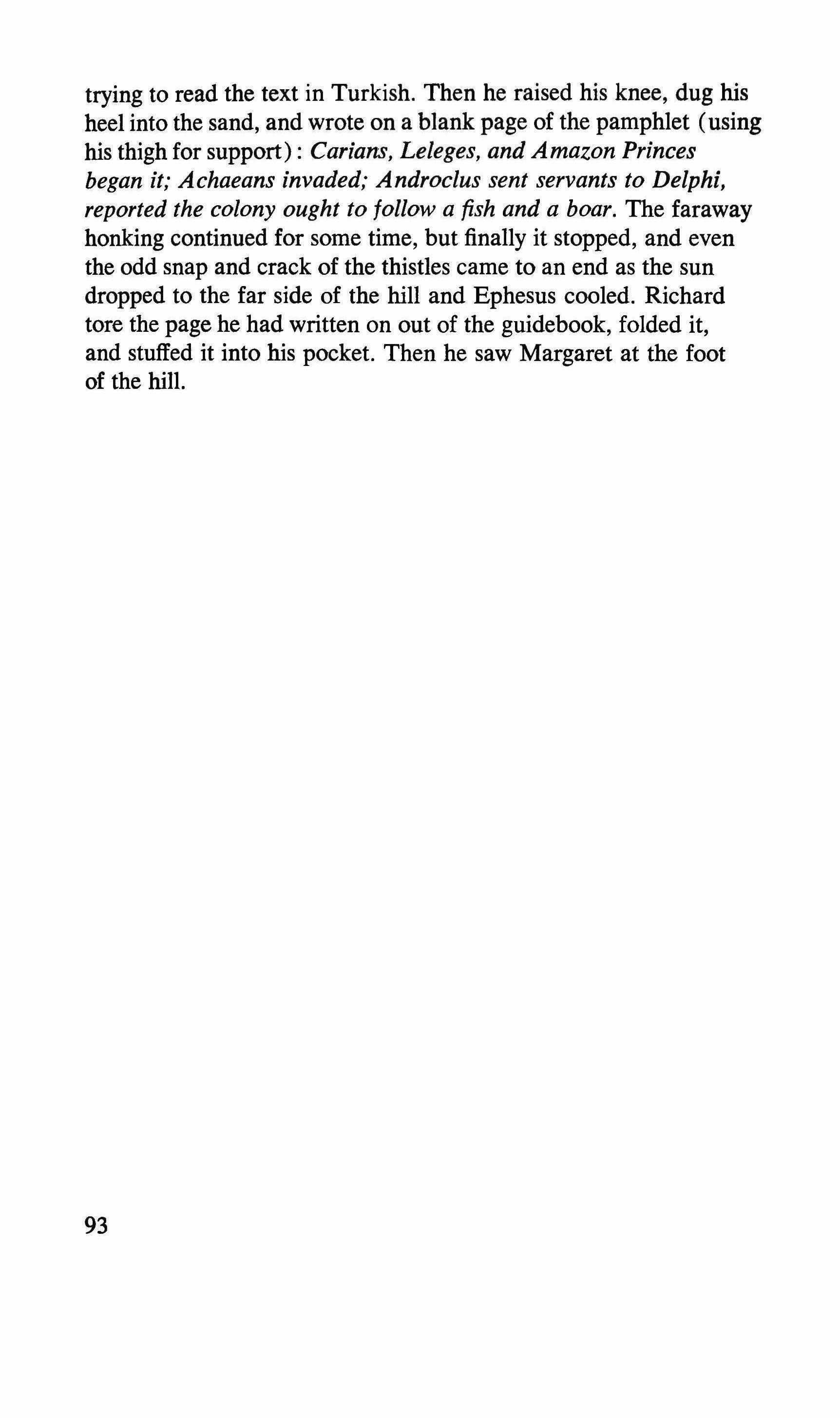
trying to read the text in Turkish. Then he raised his knee, dug his heel into the sand, and wrote on a blank page of the pamphlet (using his thigh for support): Carians, Leleges, and Amazon Princes began it; Achaeans invaded; Androclus sent servants to Delphi, reported the colony ought to follow a fish and a boar. The faraway honking continued for some time, but finally it stopped, and even the odd snap and crack of the thistles came to an end as the sun dropped to the far side of the hill and Ephesus cooled. Richard tore the page he had written on out of the guidebook, folded it, and stuffed it into his pocket. Then he saw Margaret at the foot of the hill.
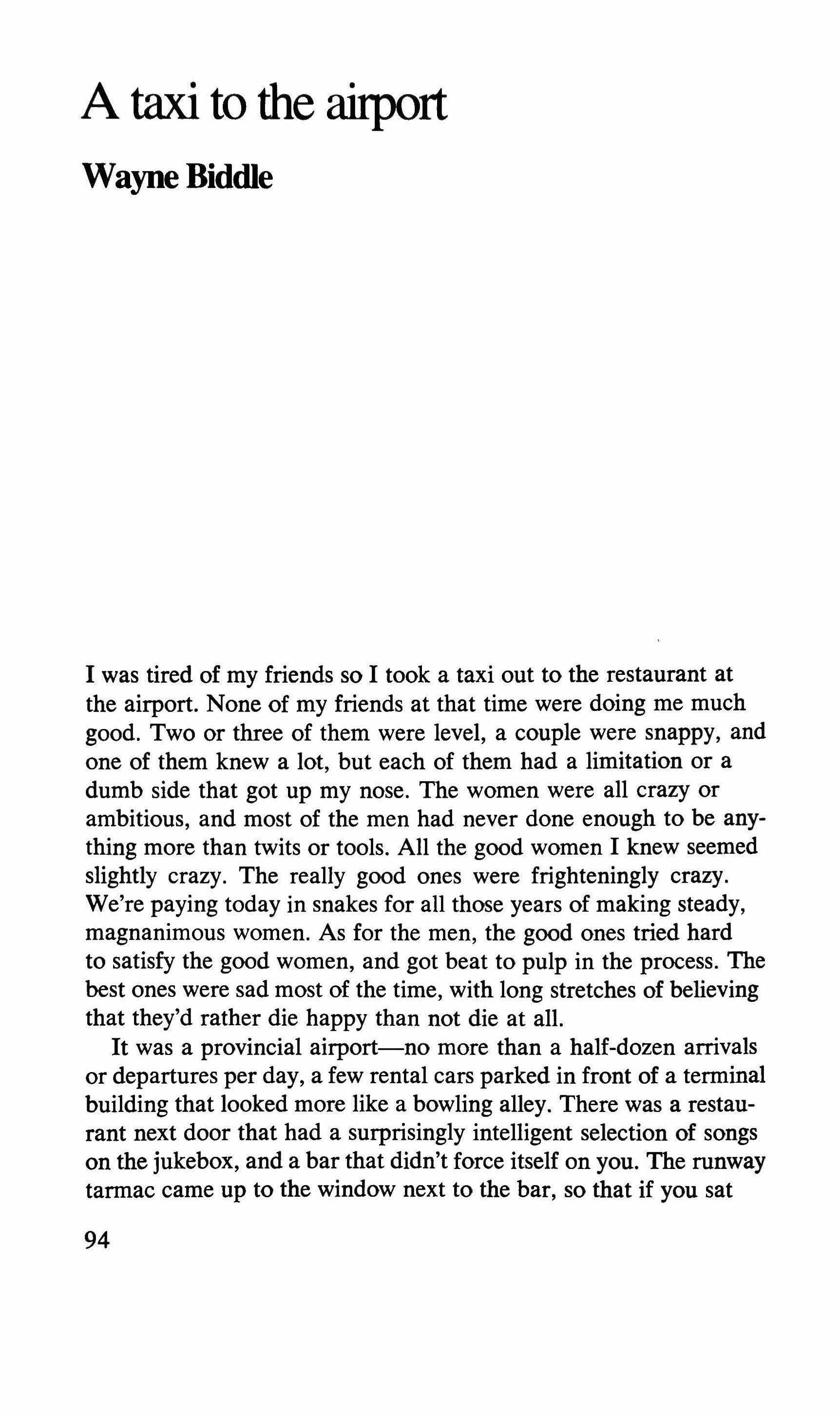
I was tired of my friends so I took a taxi out to the restaurant at the airport. None of my friends at that time were doing me much good. Two or three of them were level, a couple were snappy, and one of them knew a lot, but each of them had a limitation or a dumb side that got up my nose. The women were all crazy or ambitious, and most of the men had never done enough to be anything more than twits or tools. All the good women I knew seemed slightly crazy. The really good ones were frighteningly crazy. We're paying today in snakes for all those years of making steady, magnanimous women. As for the men, the good ones tried hard to satisfy the good women, and got beat to pulp in the process. The best ones were sad most of the time, with long stretches of believing that they'd rather die happy than not die at all.
It was a provincial airport-no more than a half-dozen arrivals or departures per day, a few rental cars parked in front of a terminal building that looked more like a bowling alley. There was a restaurant next door that had a surprisingly intelligent selection of songs on the jukebox, and a bar that didn't force itself on you. The runway tarmac came up to the window next to the bar, so that if you sat
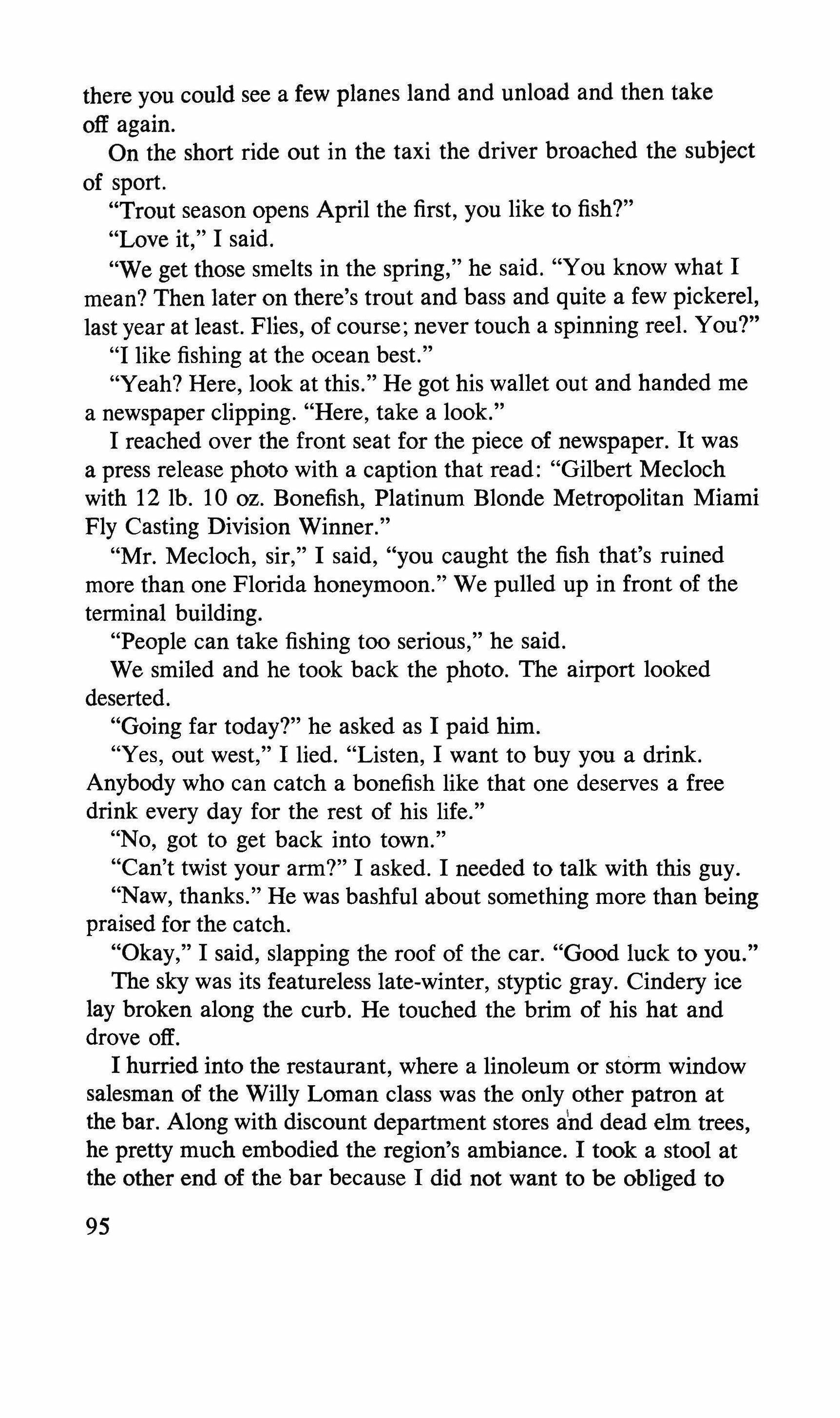
there you could see a few planes land and unload and then take off again.
On the short ride out in the taxi the driver broached the subject of sport.
"Trout season opens April the first, you like to fish?"
"Love it," 1 said.
"We get those smelts in the spring," he said. "You know what 1 mean? Then later on there's trout and bass and quite a few pickerel, last year at least. Flies, of course; never touch a spinning reel. You?"
"1 like fishing at the ocean best."
"Yeah? Here, look at this." He got his wallet out and handed me a newspaper clipping. "Here, take a look."
1 reached over the front seat for the piece of newspaper. It was a press release photo with a caption that read: "Gilbert Mecloch with 12 lb. 10 oz. Bonefish, Platinum Blonde Metropolitan Miami Fly Casting Division Winner."
"Mr. Mecloch, sir," 1 said, "you caught the fish that's ruined more than one Florida honeymoon." We pulled up in front of the terminal building.
"People can take fishing too serious," he said. We smiled and he took back the photo. The airport looked deserted.
"Going far today?" he asked as 1 paid him.
"Yes, out west," 1 lied. "Listen, 1 want to buy you a drink. Anybody who can catch a bonefish like that one deserves a free drink every day for the rest of his life."
"No, got to get back into town."
"Can't twist your arm?" 1 asked. 1 needed to talk with this guy.
"Naw, thanks." He was bashful about something more than being praised for the catch.
"Okay," 1 said, slapping the roof of the car. "Good luck to you."
The sky was its featureless late-winter, styptic gray. Cindery ice lay broken along the curb. He touched the brim of his hat and drove off.
1 hurried into the restaurant, where a linoleum or storm window salesman of the Willy Loman class was the only other patron at the bar. Along with discount department stores and dead elm trees, he pretty much embodied the region's ambiance. 1 took a stool at the other end of the bar because I did not want to be obliged to

be civil with him or the bartender, or even overhear what they were talking about. I was annoyed, too, because with so few people in the place I would not feel easy about playing the jukebox.
Being an only child, I have always felt that I am naturally equipped for being alone most of the time. More and more, though, I see it as just one more pain. I hate to eat alone, though drinking by myself is not so bad. I prefer sleeping with someone to sleeping alone, as long as I know she's truly happy to be there. Three years ago I lived with someone for a year in Nags Head and then in Truro, Mass., but we could not keep it going. I do not really know why. If two human beings with what we had cannot love each other for more than twelve months in places as easy as Nags Head and Truro, then I don't believe anybody for the remainder of this century is going to be able to, for any length of time, anywhere. As for girlfriends, the ones I like most wind up hurting me with their craziness and the others I usually wind up insulting or paternalizing or lying to. When I was growing up I was never a good storyteller. I could not make up good stories around the campfire or in the tent afterward, and I never lied because I had no facility for it. Now I am so good at it that I can lie looking someone absolutely straight in the face. They never know. I can even do multiple-permutation lies, where you lie about a lie you've told, so that the truth and the lie coil around each other like strings of flashing lights. So far I have never done it maliciously, though lately I have had simple dreams about hitting people. In one dream I was sitting on a school bus with a bunch of fourteen-year-olds, me twenty-nine. The two boys behind me were getting loud so I turned around and said, "Listen, you see this fist? I'm going to put it in your ear. And you see this one? I'm going to put it in your mouth. Then I'm going to shake hands with them." The whole bus went totally silent and the kids behind me got afraid.
A commercial airplane approached the terminal. It headed straight in, so that you saw only the leading edge of its wings, the transparent metallic aureolae of the spinning props, and the black blunt radar cone on its nose. These elements grew steadily until it loomed a few feet from the bar window, at which point it turned neatly to explose the flank of its fuselage and its high tail. When the lone ground crewman crossed his wrists above his head, the pilot cut the engines. But then no one disembarked, no one got on. The
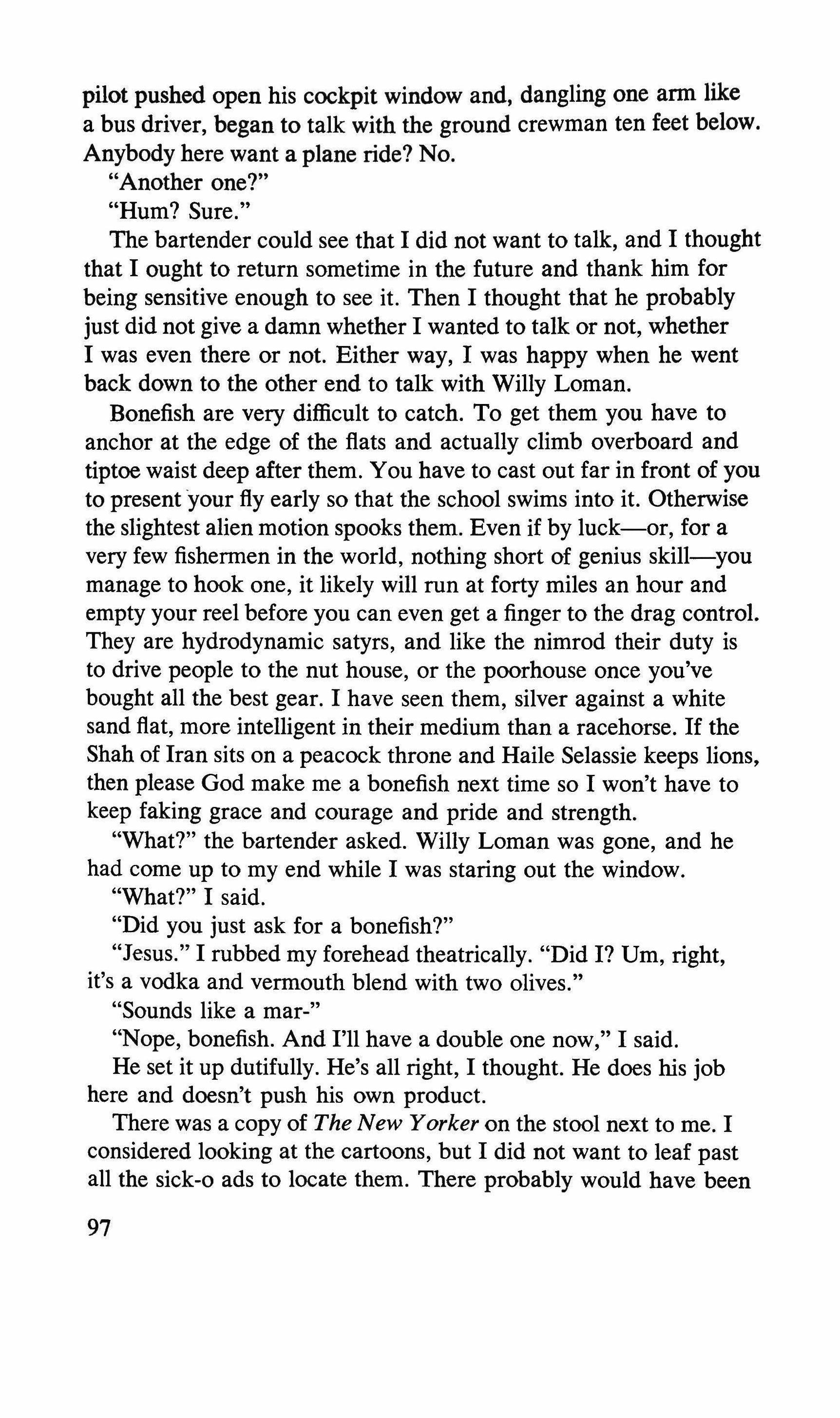
pilot pushed open his cockpit window and, dangling one ann like a bus driver, began to talk with the ground crewman ten feet below. Anybody here want a plane ride? No.
"Another one?"
"Hum? Sure."
The bartender could see that I did not want to talk, and I thought that I ought to return sometime in the future and thank him for being sensitive enough to see it. Then I thought that he probably just did not give a damn whether I wanted to talk or not, whether I was even there or not. Either way, I was happy when he went back down to the other end to talk with Willy Loman.
Bonefish are very difficult to catch. To get them you have to anchor at the edge of the flats and actually climb overboard and tiptoe waist deep after them. You have to cast out far in front of you to present your fly early so that the school swims into it. Otherwise the slightest alien motion spooks them. Even if by luck-or, for a very few fishermen in the world, nothing short of genius skill-you manage to hook one, it likely will run at forty miles an hour and empty your reel before you can even get a finger to the drag control. They are hydrodynamic satyrs, and like the nimrod their duty is to drive people to the nut house, or the poorhouse once you've bought all the best gear. I have seen them, silver against a white sand flat, more intelligent in their medium than a racehorse. If the Shah of Iran sits on a peacock throne and Haile Selassie keeps lions, then please God make me a bonefish next time so I won't have to keep faking grace and courage and pride and strength.
"What?" the bartender asked. Willy Loman was gone, and he had come up to my end while I was staring out the window.
"What?" I said.
"Did you just ask for a bonefish?"
"Jesus." I rubbed my forehead theatrically. "Did I? Urn, right, it's a vodka and vermouth blend with two olives."
"Sounds like a mar-"
"Nope, bonefish. And I'll have a double one now," I said. He set it up dutifully. He's all right, I thought. He does his job here and doesn't push his own product.
There was a copy of The New Yorker on the stool next to me. I considered looking at the cartoons, but I did not want to leaf past all the sick-o ads to locate them. There probably would have been
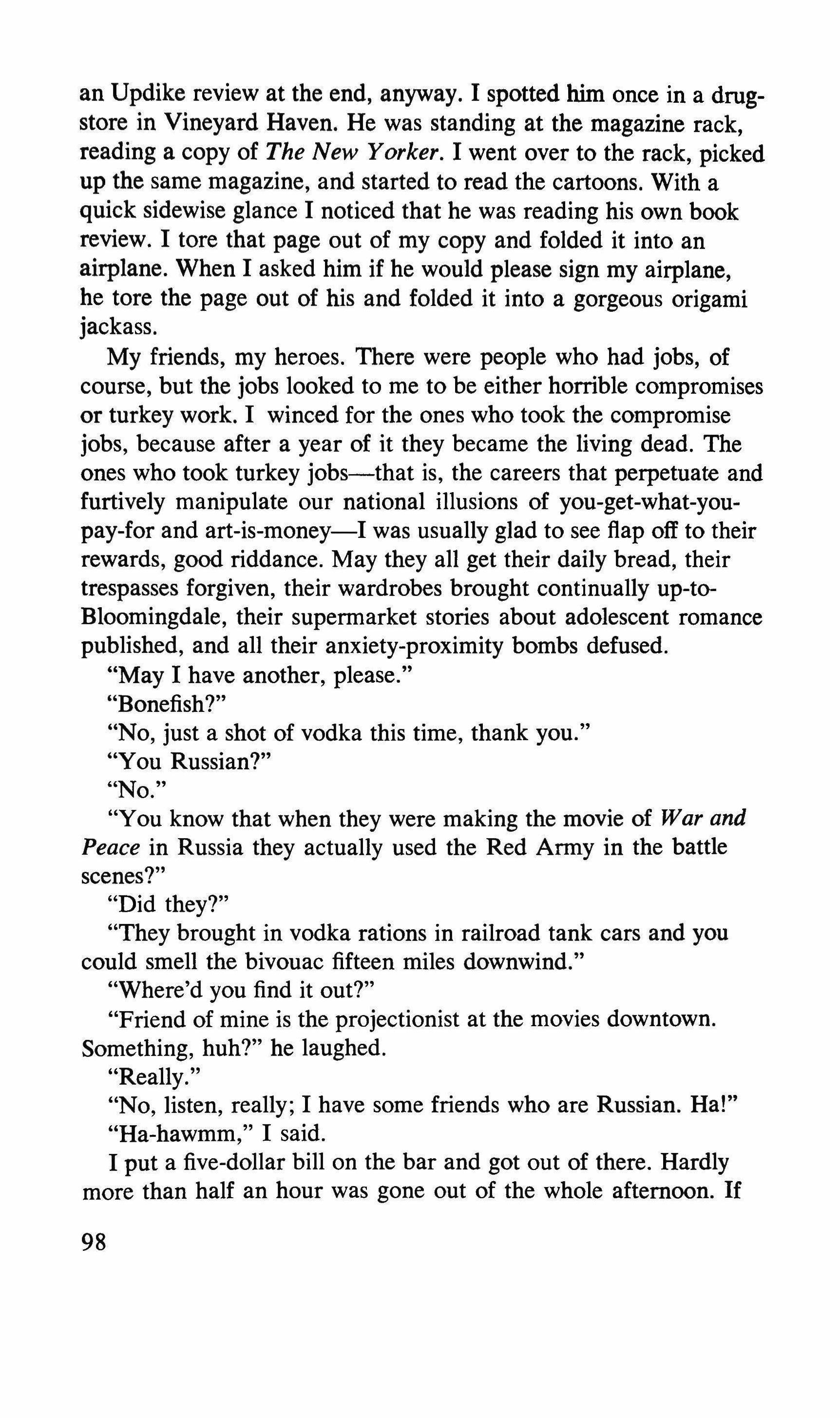
an Updike review at the end, anyway. I spotted him once in a drugstore in Vineyard Haven. He was standing at the magazine rack, reading a copy of The New Yorker. I went over to the rack, picked up the same magazine, and started to read the cartoons. With a quick sidewise glance I noticed that he was reading his own book review. I tore that page out of my copy and folded it into an airplane. When I asked him if he would please sign my airplane, he tore the page out of his and folded it into a gorgeous origami jackass.
My friends, my heroes. There were people who had jobs, of course, but the jobs looked to me to be either horrible compromises or turkey work. I winced for the ones who took the compromise jobs, because after a year of it they became the living dead. The ones who took turkey jobs-that is, the careers that perpetuate and furtively manipulate our national illusions of you-get-what-youpay-for and art-is-money-I was usually glad to see flap off to their rewards, good riddance. May they all get their daily bread, their trespasses forgiven, their wardrobes brought continually up-toBloomingdale, their supermarket stories about adolescent romance published, and all their anxiety-proximity bombs defused.
"May I have another, please."
"Bonefish?"
"No, just a shot of vodka this time, thank you."
"You Russian?"
"No."
"You know that when they were making the movie of War and Peace in Russia they actually used the Red Army in the battle scenes?"
"Did they?"
"They brought in vodka rations in railroad tank cars and you could smell the bivouac fifteen miles downwind."
"Where'd you find it out?"
"Friend of mine is the projectionist at the movies downtown. Something, huh?" he laughed.
"Really."
"No, listen, really; I have some friends who are Russian. Ha!"
"Ha-hawmm," I said.
I put a five-dollar bill on the bar and got out of there. Hardly more than half an hour was gone out of the whole afternoon. If 98
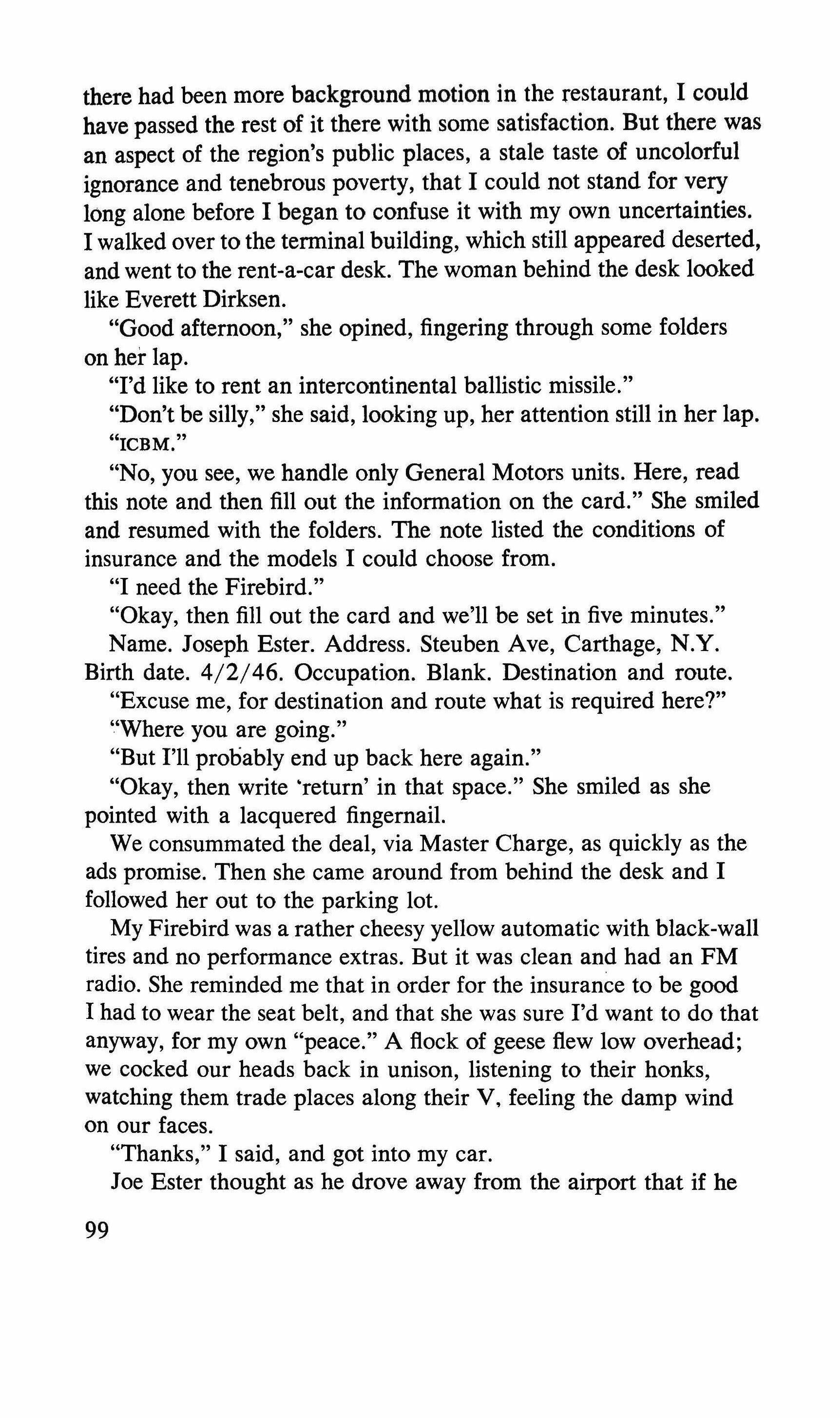
there had been more background motion in the restaurant, I could have passed the rest of it there with some satisfaction. But there was an aspect of the region's public places, a stale taste of uncolorful ignorance and tenebrous poverty, that I could not stand for very long alone before I began to confuse it with my own uncertainties. I walked over to the terminal building, which still appeared deserted, and went to the rent-a-car desk. The woman behind the desk looked like Everett Dirksen.
"Good afternoon," she opined, fingering through some folders on her lap.
"I'd like to rent an intercontinental ballistic missile."
"Don't be silly," she said, looking up, her attention still in her lap. "ICBM."
"No, you see, we handle only General Motors units. Here, read this note and then fill out the information on the card." She smiled and resumed with the folders. The note listed the conditions of insurance and the models I could choose from.
"I need the Firebird."
"Okay, then fill out the card and we'll be set in five minutes." Name. Joseph Ester. Address. Steuben Ave, Carthage, N.Y. Birth date. 4/2/46. Occupation. Blank. Destination and route.
"Excuse me, for destination and route what is required here?"
"Where you are going."
"But I'll probably end up back here again."
"Okay, then write 'return' in that space." She smiled as she pointed with a lacquered fingernail.
We consummated the deal, via Master Charge, as quickly as the ads promise. Then she came around from behind the desk and I followed her out to the parking lot.
My Firebird was a rather cheesy yellow automatic with black-wall tires and no performance extras. But it was clean and had an FM radio. She reminded me that in order for the insurance to be good 1 had to wear the seat belt, and that she was sure I'd want to do that anyway, for my own "peace." A flock of geese flew low overhead; we cocked our heads back in unison, listening to their honks, watching them trade places along their V, feeling the damp wind on our faces.
"Thanks," I said, and got into my car.
Joe Ester thought as he drove away from the airport that if he
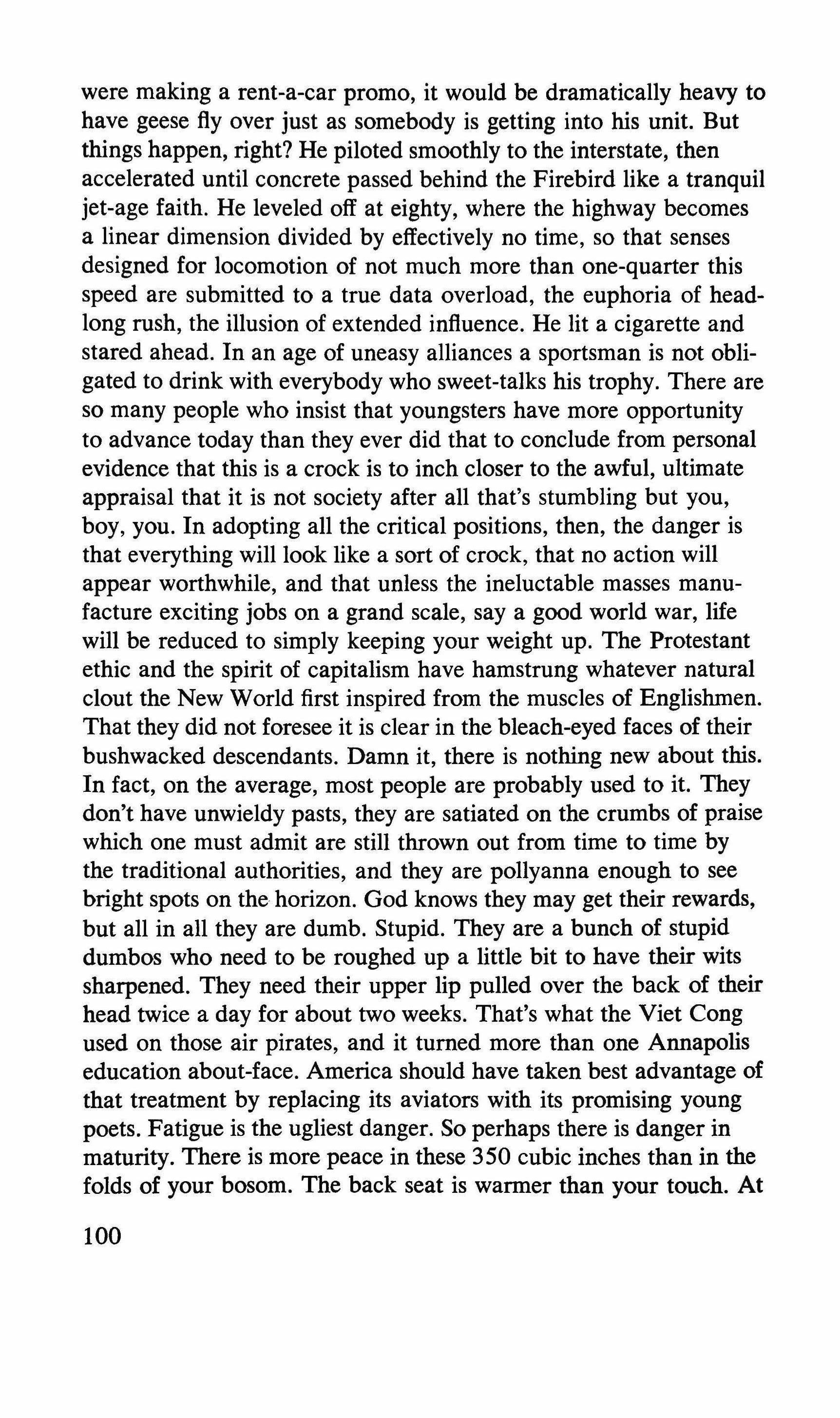
were making a rent-a-car promo, it would be dramatically heavy to have geese fly over just as somebody is getting into his unit. But things happen, right? He piloted smoothly to the interstate, then accelerated until concrete passed behind the Firebird like a tranquil jet-age faith. He leveled off at eighty, where the highway becomes a linear dimension divided by effectively no time, so that senses designed for locomotion of not much more than one-quarter this speed are submitted to a true data overload, the euphoria of headlong rush, the illusion of extended influence. He lit a cigarette and stared ahead. In an age of uneasy alliances a sportsman is not obligated to drink with everybody who sweet-talks his trophy. There are so many people who insist that youngsters have more opportunity to advance today than they ever did that to conclude from personal evidence that this is a crock is to inch closer to the awful, ultimate appraisal that it is not society after all that's stumbling but you, boy, you. In adopting all the critical positions, then, the danger is that everything will look like a sort of crock, that no action will appear worthwhile, and that unless the ineluctable masses manufacture exciting jobs on a grand scale, say a good world war, life will be reduced to simply keeping your weight up. The Protestant ethic and the spirit of capitalism have hamstrung whatever natural clout the New World first inspired from the muscles of Englishmen. That they did not foresee it is clear in the bleach-eyed faces of their bushwacked descendants. Damn it, there is nothing new about this. In fact, on the average, most people are probably used to it. They don't have unwieldy pasts, they are satiated on the crumbs of praise which one must admit are still thrown out from time to time by the traditional authorities, and they are pollyanna enough to see bright spots on the horizon. God knows they may get their rewards, but all in all they are dumb. Stupid. They are a bunch of stupid dumbos who need to be roughed up a little bit to have their wits sharpened. They need their upper lip pulled over the back of their head twice a day for about two weeks. That's what the Viet Cong used on those air pirates, and it turned more than one Annapolis education about-face. America should have taken best advantage of that treatment by replacing its aviators with its promising young poets. Fatigue is the ugliest danger. So perhaps there is danger in maturity. There is more peace in these 350 cubic inches than in the folds of your bosom. The back seat is warmer than your touch. At 100
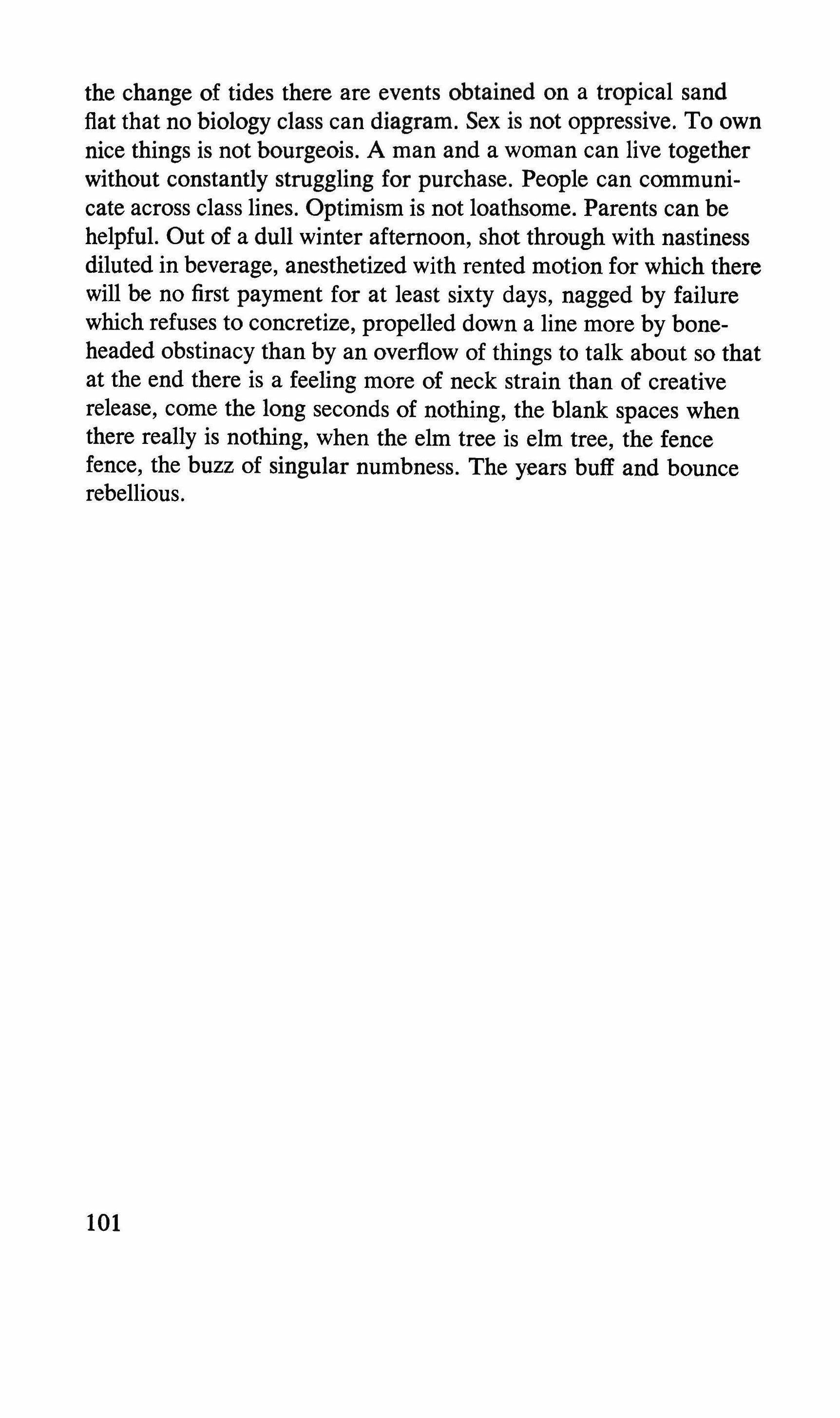
the change of tides there are events obtained on a tropical sand flat that no biology class can diagram. Sex is not oppressive. To own nice things is not bourgeois. A man and a woman can live together without constantly struggling for purchase. People can communicate across class lines. Optimism is not loathsome. Parents can be helpfuL Out of a dull winter afternoon, shot through with nastiness diluted in beverage, anesthetized with rented motion for which there will be no first payment for at least sixty days, nagged by failure which refuses to concretize, propelled down a line more by boneheaded obstinacy than by an overflow of things to talk about so that at the end there is a feeling more of neck strain than of creative release, come the long seconds of nothing, the blank spaces when there really is nothing, when the elm tree is elm tree, the fence fence, the buzz of singular numbness. The years buff and bounce rebellious.
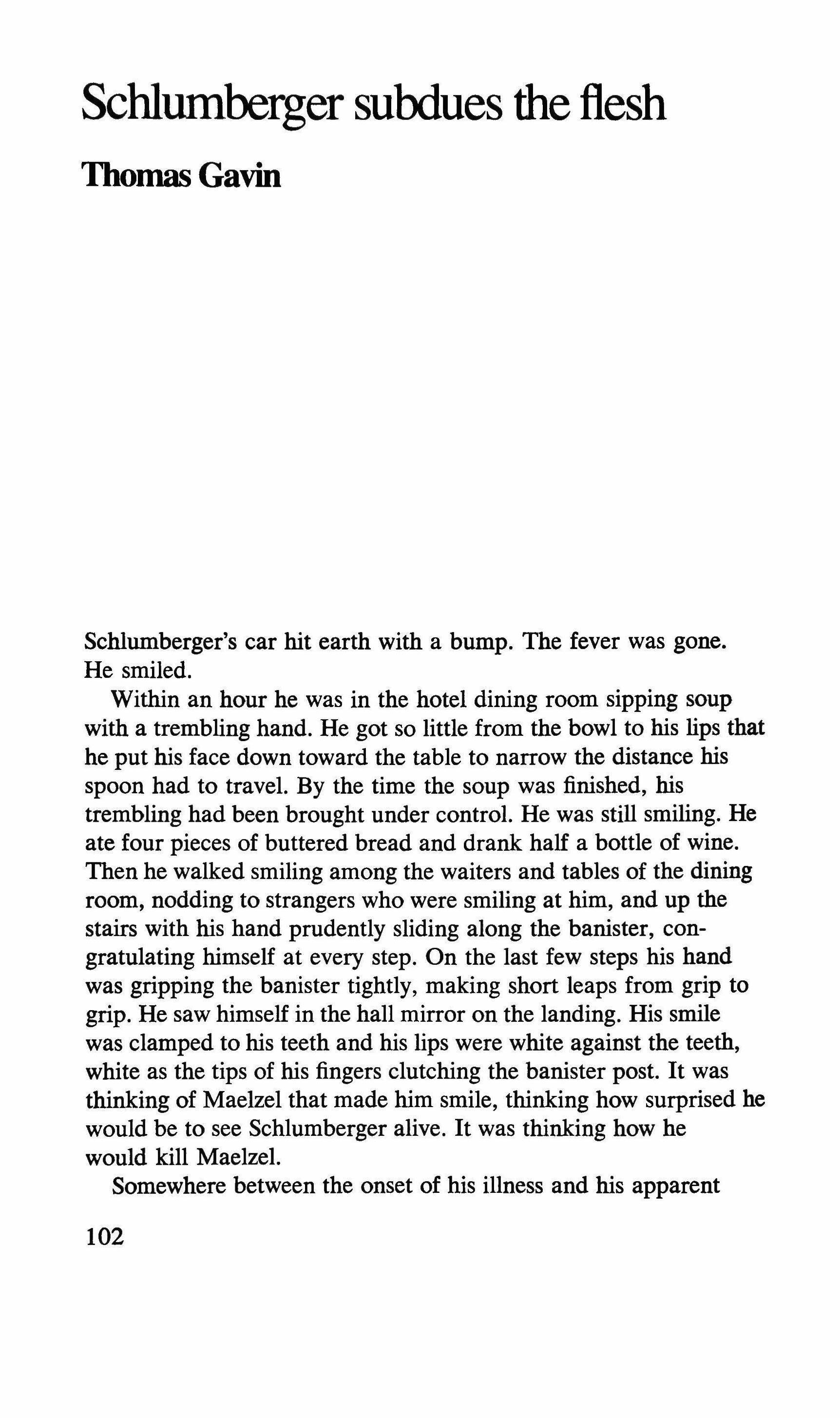
Schlumberger's car hit earth with a bump. The fever was gone. He smiled.
Within an hour he was in the hotel dining room sipping soup with a trembling hand. He got so little from the bowl to his lips that he put his face down toward the table to narrow the distance his spoon had to travel. By the time the soup was finished, his trembling had been brought under control. He was still smiling. He ate four pieces of buttered bread and drank half a bottle of wine. Then he walked smiling among the waiters and tables of the dining room, nodding to strangers who were smiling at him, and up the stairs with his hand prudently sliding along the banister, congratulating himself at every step. On the last few steps his hand was gripping the banister tightly, making short leaps from grip to grip. He saw himself in the hall mirror on the landing. His smile was clamped to his teeth and his lips were white against the teeth, white as the tips of his fingers clutching the banister post. It was thinking of Maelzel that made him smile, thinking how surprised he would be to see Schlumberger alive. It was thinking how he would kill Maelzel.
Somewhere between the onset of his illness and his apparent
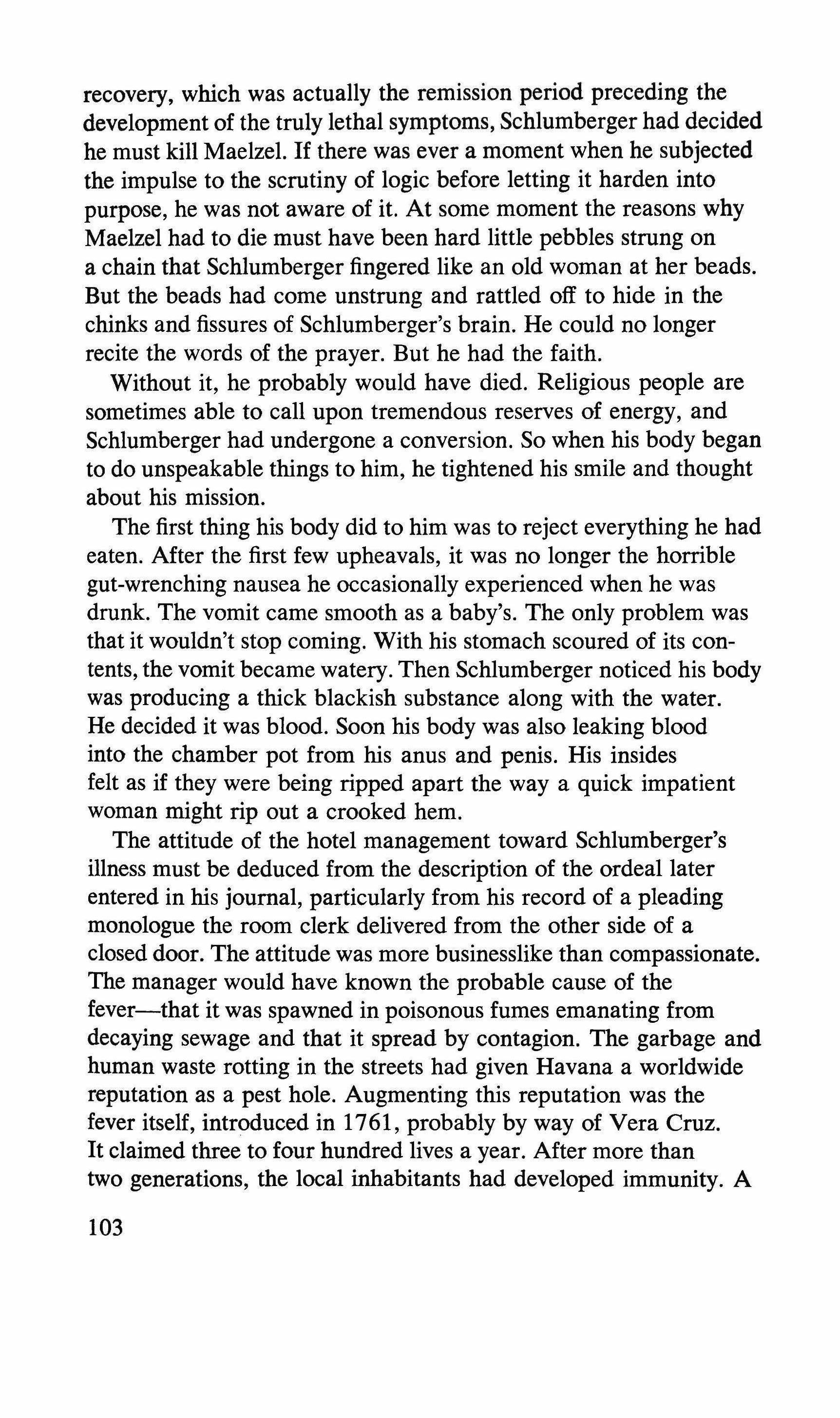
recovery, which was actually the remission period preceding the development of the truly lethal symptoms, Schlumberger had decided he must kill Maelzel. If there was ever a moment when he subjected the impulse to the scrutiny of logic before letting it harden into purpose, he was not aware of it. At some moment the reasons why Maelzel had to die must have been hard little pebbles strung on a chain that Schlumberger fingered like an old woman at her beads. But the beads had come unstrung and rattled off to hide in the chinks and fissures of Schlumberger's brain. He could no longer recite the words of the prayer. But he had the faith.
Without it, he probably would have died. Religious people are sometimes able to call upon tremendous reserves of energy, and Schlumberger had undergone a conversion. So when his body began to do unspeakable things to him, he tightened his smile and thought about his mission.
The first thing his body did to him was to reject everything he had eaten. After the first few upheavals, it was no longer the horrible gut-wrenching nausea he occasionally experienced when he was drunk. The vomit came smooth as a baby's. The only problem was that it wouldn't stop coming. With his stomach scoured of its contents, the vomit became watery. Then Schlumberger noticed his body was producing a thick blackish substance along with the water. He decided it was blood. Soon his body was also leaking blood into the chamber pot from his anus and penis. His insides felt as if they were being ripped apart the way a quick impatient woman might rip out a crooked hem.
The attitude of the hotel management toward Schlumberger's illness must be deduced from the description of the ordeal later entered in his journal, particularly from his record of a pleading monologue the room clerk delivered from the other side of a closed door. The attitude was more businesslike than compassionate. The manager would have known the probable cause of the fever-that it was spawned in poisonous fumes emanating from decaying sewage and that it spread by contagion. The garbage and human waste rotting in the streets had given Havana a worldwide reputation as a pest hole. Augmenting this reputation was the fever itself, introduced in 1761, probably by way of Vera Cruz. It claimed three to four hundred lives a year. After more than two generations, the local inhabitants had developed immunity. A 103
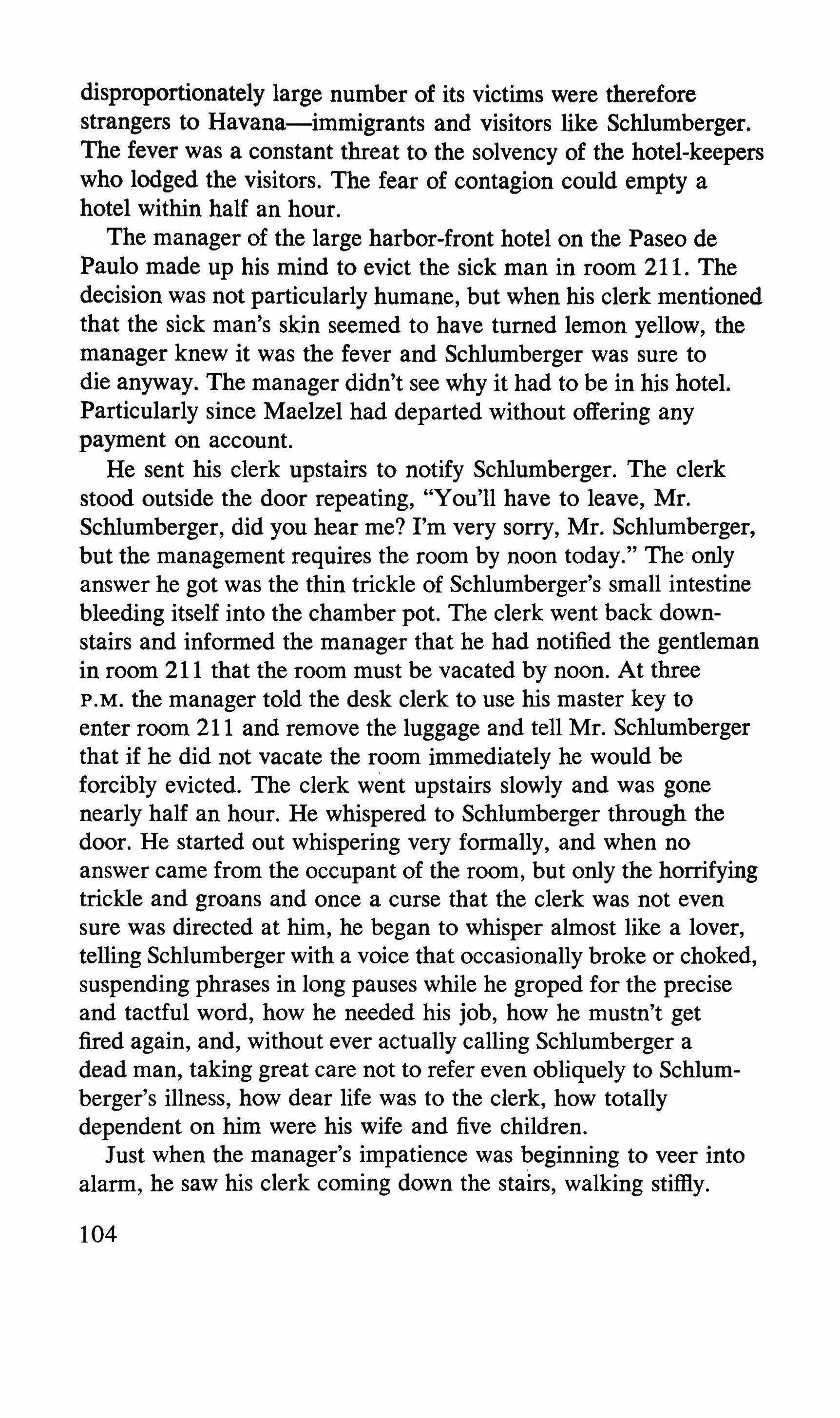
disproportionately large number of its victims were therefore strangers to Havana-immigrants and visitors like Schlumberger. The fever was a constant threat to the solvency of the hotel-keepers who lodged the visitors. The fear of contagion could empty a hotel within half an hour.
The manager of the large harbor-front hotel on the Paseo de Paulo made up his mind to evict the sick man in room 211. The decision was not particularly humane, but when his clerk mentioned that the sick man's skin seemed to have turned lemon yellow, the manager knew it was the fever and Schlumberger was sure to die anyway. The manager didn't see why it had to be in his hotel. Particularly since Maelzel had departed without offering any payment on account.
He sent his clerk upstairs to notify Schlumberger. The clerk stood outside the door repeating, "You'll have to leave, Mr. Schlumberger, did you hear me? I'm very sorry, Mr. Schlumberger, but the management requires the room by noon today." The only answer he got was the thin trickle of Schlumberger's small intestine bleeding itself into the chamber pot. The clerk went back downstairs and informed the manager that he had notified the gentleman in room 211 that the room must be vacated by noon. At three P.M. the manager told the desk clerk to use his master key to enter room 211 and remove the luggage and tell Mr. Schlumberger that if he did not vacate the room immediately he would be forcibly evicted. The clerk went upstairs slowly and was gone nearly half an hour. He whispered to Schlumberger through the door. He started out whispering very formally, and when no answer came from the occupant of the room, but only the horrifying trickle and groans and once a curse that the clerk was not even sure was directed at him, he began to whisper almost like a lover, telling Schlumberger with a voice that occasionally broke or choked, suspending phrases in long pauses while he groped for the precise and tactful word, how he needed his job, how he mustn't get fired again, and, without ever actually calling Schlumberger a dead man, taking great care not to refer even obliquely to Schlumberger's illness, how dear life was to the clerk, how totally dependent on him were his wife and five children.
Just when the manager's impatience was beginning to veer into alarm, he saw his clerk coming down the stairs, walking stiffly.
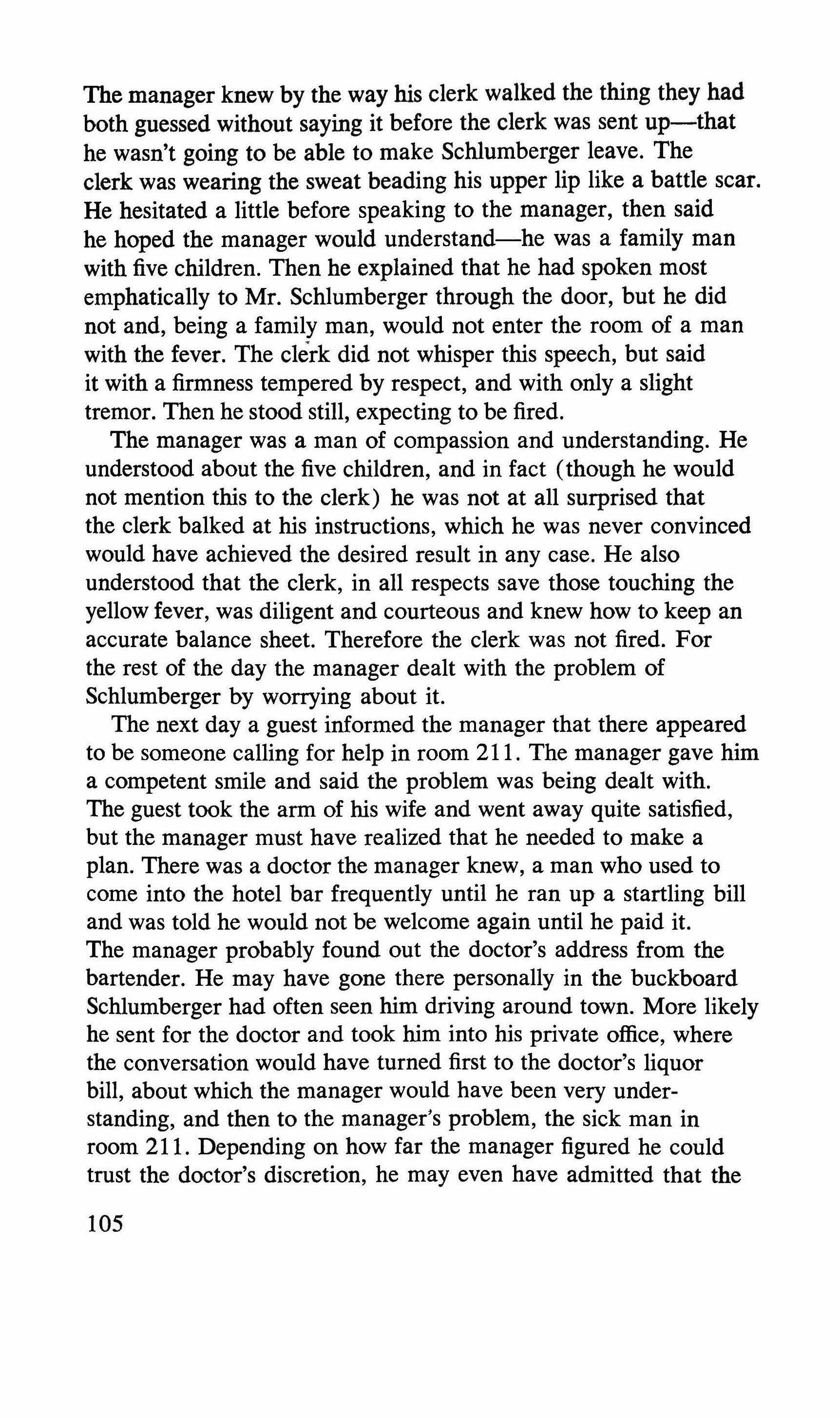
The manager knew by the way his clerk walked the thing they had both guessed without saying it before the clerk was sent up-that he wasn't going to be able to make Schlumberger leave. The clerk was wearing the sweat beading his upper lip like a battle scar. He hesitated a little before speaking to the manager, then said he hoped the manager would understand-he was a family man with five children. Then he explained that he had spoken most emphatically to Mr. Schlumberger through the door, but he did not and, being a family man, would not enter the room of a man with the fever. The clerk did not whisper this speech, but said it with a firmness tempered by respect, and with only a slight tremor. Then he stood still, expecting to be fired.
The manager was a man of compassion and understanding. He understood about the five children, and in fact (though he would not mention this to the clerk) he was not at all surprised that the clerk balked at his instructions, which he was never convinced would have achieved the desired result in any case. He also understood that the clerk, in all respects save those touching the yellow fever, was diligent and courteous and knew how to keep an accurate balance sheet. Therefore the clerk was not fired. For the rest of the day the manager dealt with the problem of Schlumberger by worrying about it.
The next day a guest informed the manager that there appeared to be someone calling for help in room 211. The manager gave him a competent smile and said the problem was being dealt with. The guest took the arm of his wife and went away quite satisfied, but the manager must have realized that he needed to make a plan. There was a doctor the manager knew, a man who used to come into the hotel bar frequently until he ran up a startling bill and was told he would not be welcome again until he paid it. The manager probably found out the doctor's address from the bartender. He may have gone there personally in the buckboard Schlumberger had often seen him driving around town. More likely he sent for the doctor and took him into his private office, where the conversation would have turned first to the doctor's liquor bill, about which the manager would have been very understanding, and then to the manager's problem, the sick man in room 211. Depending on how far the manager figured he could trust the doctor's discretion, he may even have admitted that the 105
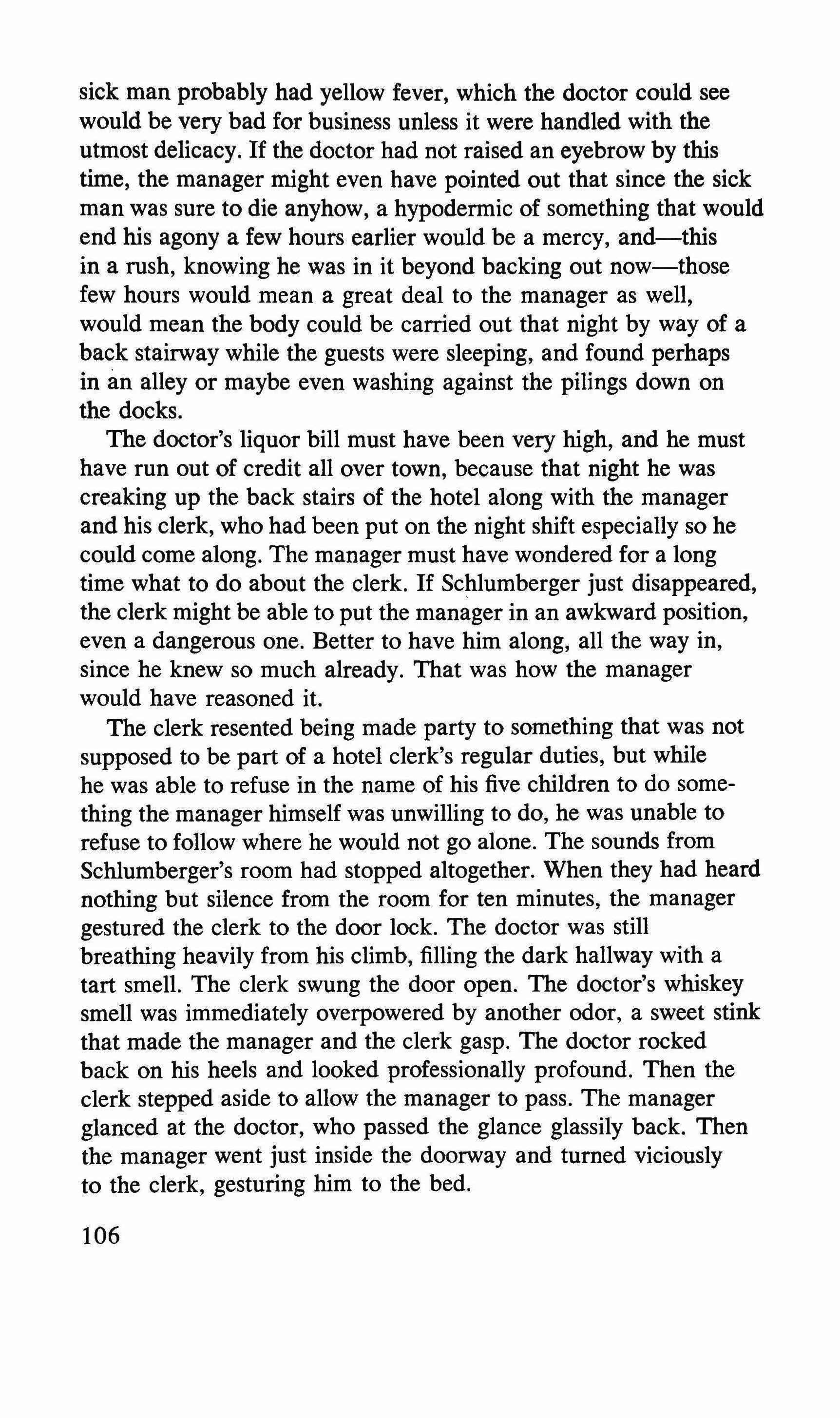
sick man probably had yellow fever, which the doctor could see would be very bad for business unless it were handled with the utmost delicacy. If the doctor had not raised an eyebrow by this time, the manager might even have pointed out that since the sick man was sure to die anyhow, a hypodermic of something that would end his agony a few hours earlier would be a mercy, and-this in a rush, knowing he was in it beyond backing out now-those few hours would mean a great deal to the manager as well, would mean the body could be carried out that night by way of a back stairway while the guests were sleeping, and found perhaps in an alley or maybe even washing against the pilings down on the docks.
The doctor's liquor bill must have been very high, and he must have run out of credit all over town, because that night he was creaking up the back stairs of the hotel along with the manager and his clerk, who had been put on the night shift especially so he could come along. The manager must have wondered for a long time what to do about the clerk. If Schlumberger just disappeared, the clerk might be able to put the manager in an awkward position, even a dangerous one. Better to have him along, all the way in, since he knew so much already. That was how the manager would have reasoned it.
The clerk resented being made party to something that was not supposed to be part of a hotel clerk's regular duties, but while he was able to refuse in the name of his five children to do something the manager himself was unwilling to do, he was unable to refuse to follow where he would not go alone. The sounds from Schlumberger's room had stopped altogether. When they had heard nothing but silence from the room for ten minutes, the manager gestured the clerk to the door lock. The doctor was still breathing heavily from his climb, filling the dark hallway with a tart smell. The clerk swung the door open. The doctor's whiskey smell was immediately overpowered by another odor, a sweet stink that made the manager and the clerk gasp. The doctor rocked back on his heels and looked professionally profound. Then the clerk stepped aside to allow the manager to pass. The manager glanced at the doctor, who passed the glance glassily back. Then the manager went just inside the doorway and turned viciously to the clerk, gesturing him to the bed.
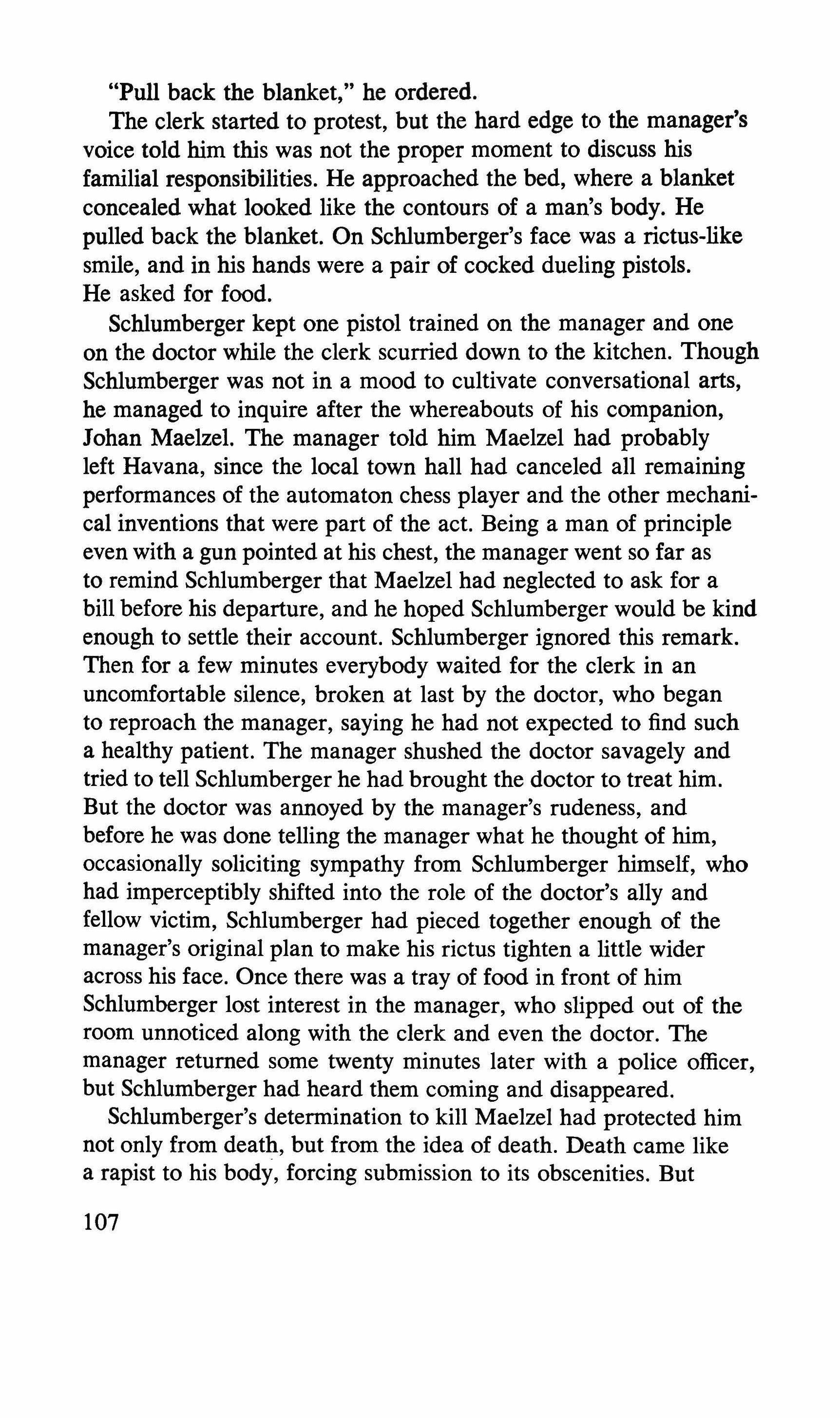
"Pull back the blanket," he ordered.
The clerk started to protest, but the hard edge to the manager's voice told him this was not the proper moment to discuss his familial responsibilities. He approached the bed, where a blanket concealed what looked like the contours of a man's body. He pulled back the blanket. On Schlumberger's face was a rictus-like smile, and in his hands were a pair of cocked dueling pistols. He asked for food.
Schlumberger kept one pistol trained on the manager and one on the doctor while the clerk scurried down to the kitchen. Though Schlumberger was not in a mood to cultivate conversational arts, he managed to inquire after the whereabouts of his companion, Johan Maelzel. The manager told him Maelzel had probably left Havana, since the local town hall had canceled all remaining performances of the automaton chess player and the other mechanical inventions that were part of the act. Being a man of principle even with a gun pointed at his chest, the manager went so far as to remind Schlumberger that Maelzel had neglected to ask for a bill before his departure, and he hoped Schlumberger would be kind enough to settle their account. Schlumberger ignored this remark. Then for a few minutes everybody waited for the clerk in an uncomfortable silence, broken at last by the doctor, who began to reproach the manager, saying he had not expected to find such a healthy patient. The manager shushed the doctor savagely and tried to tell Schlumberger he had brought the doctor to treat him. But the doctor was annoyed by the manager's rudeness, and before he was done telling the manager what he thought of him, occasionally soliciting sympathy from Schlumberger himself, who had imperceptibly shifted into the role of the doctor's ally and fellow victim, Schlumberger had pieced together enough of the manager's original plan to make his rictus tighten a little wider across his face. Once there was a tray of food in front of him Schlumberger lost interest in the manager, who slipped out of the room unnoticed along with the clerk and even the doctor. The manager returned some twenty minutes later with a police officer, but Schlumberger had heard them coming and disappeared. Schlumberger's determination to kill Maelzel had protected him not only from death, but from the idea of death. Death came like a rapist to his body, forcing submission to its obscenities. But
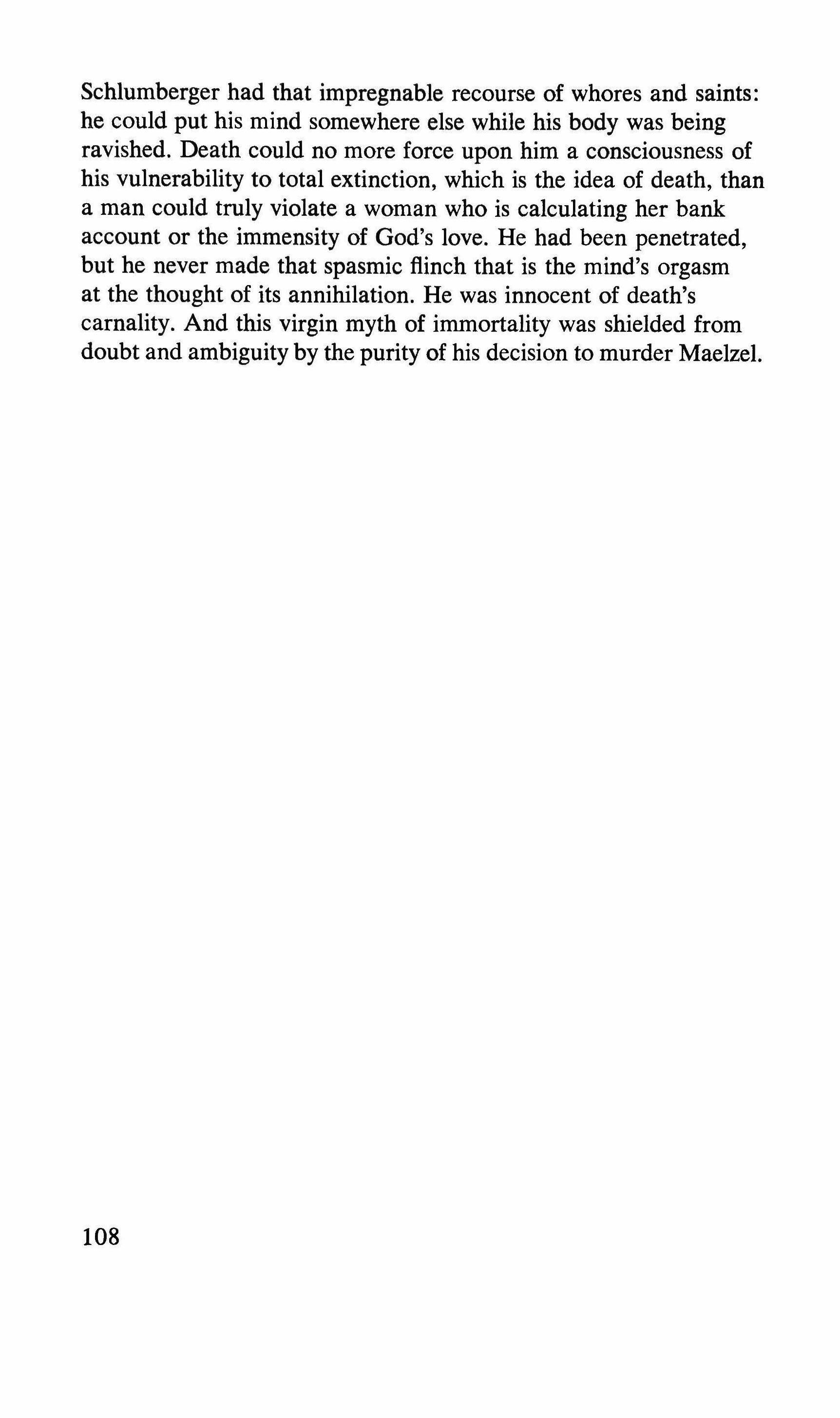
Schlumberger had that impregnable recourse of whores and saints: he could put his mind somewhere else while his body was being ravished. Death could no more force upon him a consciousness of his vulnerability to total extinction, which is the idea of death, than a man could truly violate a woman who is calculating her bank account or the immensity of God's love. He had been penetrated, but he never made that spasmic flinch that is the mind's orgasm at the thought of its annihilation. He was innocent of death's carnality. And this virgin myth of immortality was shielded from doubt and ambiguity by the purity of his decision to murder Maelzel.
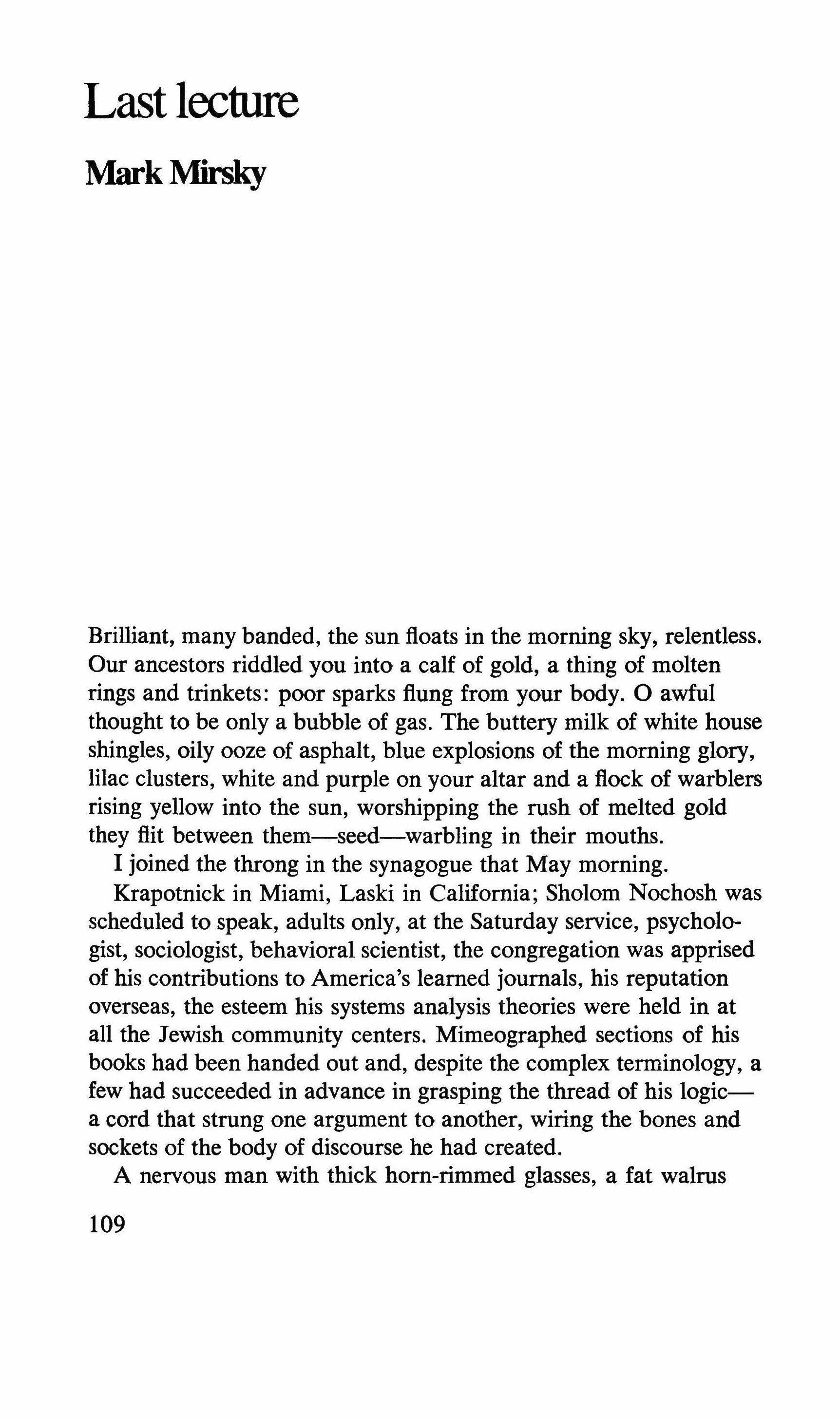
Brilliant, many banded, the sun floats in the morning sky, relentless. Our ancestors riddled you into a calf of gold, a thing of molten rings and trinkets: poor sparks flung from your body. 0 awful thought to be only a bubble of gas. The buttery milk of white house shingles, oily ooze of asphalt, blue explosions of the morning glory, lilac clusters, white and purple on your altar and a flock of warblers rising yellow into the sun, worshipping the rush of melted gold they flit between them-seed-warbling in their mouths.
I joined the throng in the synagogue that May morning.
Krapotnick in Miami, Laski in California; Sholom Nochosh was scheduled to speak, adults only, at the Saturday service, psychologist, sociologist, behavioral scientist, the congregation was apprised of his contributions to America's learned journals, his reputation overseas, the esteem his systems analysis theories were held in at all the Jewish community centers. Mimeographed sections of his books had been handed out and, despite the complex terminology, a few had succeeded in advance in grasping the thread of his logica cord that strung one argument to another, wiring the bones and sockets of the body of discourse he had created.
A nervous man with thick horn-rimmed glasses, a fat walrus
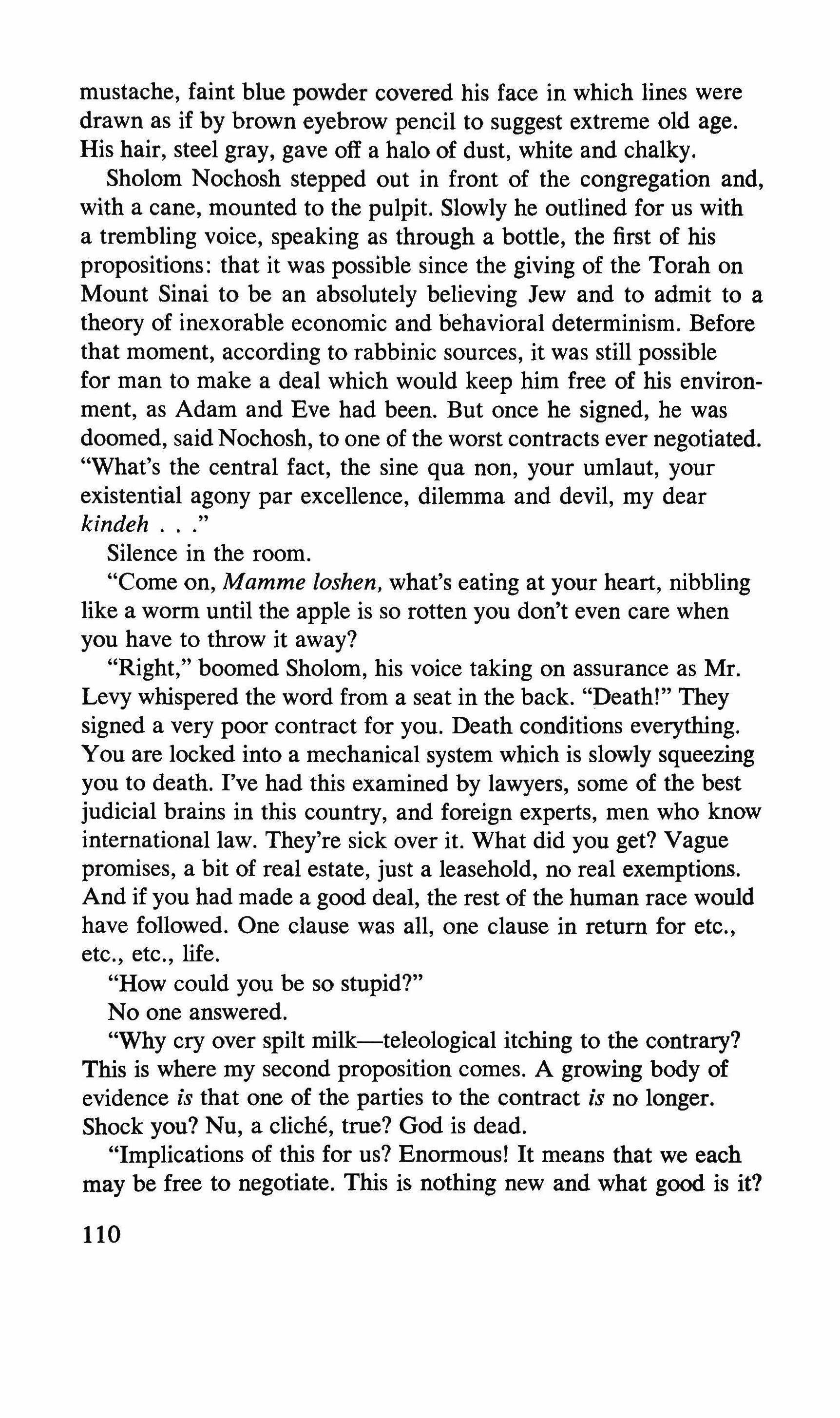
mustache, faint blue powder covered his face in which lines were drawn as if by brown eyebrow pencil to suggest extreme old age. His hair, steel gray, gave off a halo of dust, white and chalky.
Sholom Nochosh stepped out in front of the congregation and, with a cane, mounted to the pulpit. Slowly he outlined for us with a trembling voice, speaking as through a bottle, the first of his propositions: that it was possible since the giving of the Torah on Mount Sinai to be an absolutely believing Jew and to admit to a theory of inexorable economic and behavioral determinism. Before that moment, according to rabbinic sources, it was still possible for man to make a deal which would keep him free of his environment, as Adam and Eve had been. But once he signed, he was doomed, said Nochosh, to one of the worst contracts ever negotiated. "What's the central fact, the sine qua non, your umlaut, your existential agony par excellence, dilemma and devil, my dear kindeh
Silence in the room.
"Come on, Mamme loshen, what's eating at your heart, nibbling like a worm until the apple is so rotten you don't even care when you have to throw it away?
"Right," boomed Sholom, his voice taking on assurance as Mr. Levy whispered the word from a seat in the back. "Death!" They signed a very poor contract for you. Death conditions everything. You are locked into a mechanical system which is slowly squeezing you to death. I've had this examined by lawyers, some of the best judicial brains in this country, and foreign experts, men who know international law. They're sick over it. What did you get? Vague promises, a bit of real estate, just a leasehold, no real exemptions. And if you had made a good deal, the rest of the human race would have followed. One clause was all, one clause in return for etc., etc., etc., life.
"How could you be so stupid?"
No one answered.
"Why cry over spilt milk-teleological itching to the contrary? This is where my second proposition comes. A growing body of evidence is that one of the parties to the contract is no longer. Shock you? Nu, a cliche, true? God is dead.
"Implications of this for us? Enormous! It means that we each may be free to negotiate. This is nothing new and what good is it?
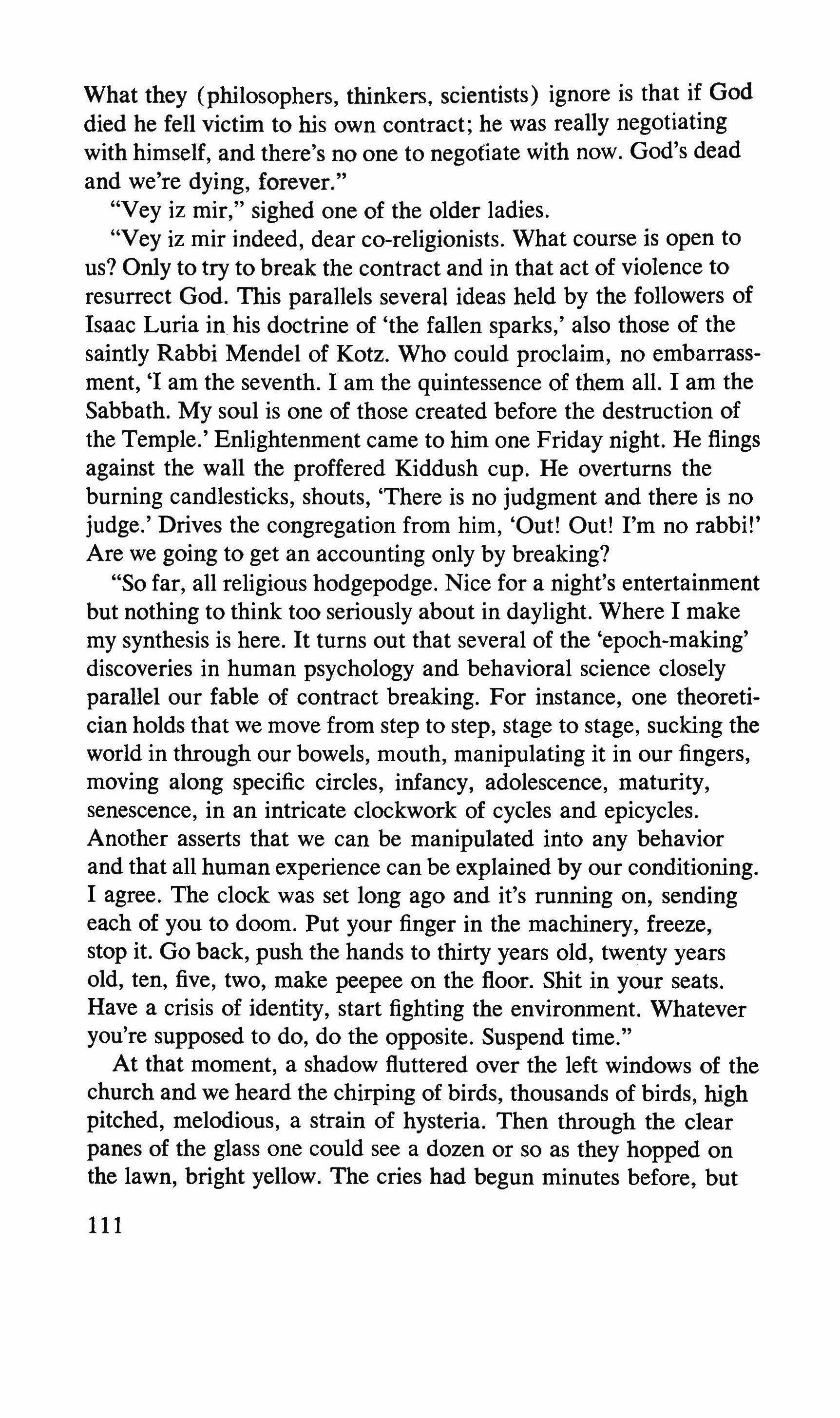
What they (philosophers, thinkers, scientists) ignore is that if God died he fell victim to his own contract; he was really negotiating with himself, and there's no one to negotiate with now. God's dead and we're dying, forever."
"Vey iz mir," sighed one of the older ladies.
"Vey iz mir indeed, dear co-religionists. What course is open to us? Only to try to break the contract and in that act of violence to resurrect God. This parallels several ideas held by the followers of Isaac Luria in his doctrine of 'the fallen sparks,' also those of the saintly Rabbi Mendel of Kotz. Who could proclaim, no embarrassment, 'I am the seventh. I am the quintessence of them all. I am the Sabbath. My soul is one of those created before the destruction of the Temple.' Enlightenment came to him one Friday night. He flings against the wall the proffered Kiddush cup. He overturns the burning candlesticks, shouts, 'There is no judgment and there is no judge.' Drives the congregation from him, 'Out! Out! I'm no rabbi!' Are we going to get an accounting only by breaking?
"So far, all religious hodgepodge. Nice for a night's entertainment but nothing to think too seriously about in daylight. Where I make my synthesis is here. It turns out that several of the 'epoch-making' discoveries in human psychology and behavioral science closely parallel our fable of contract breaking. For instance, one theoretician holds that we move from step to step, stage to stage, sucking the world in through our bowels, mouth, manipulating it in our fingers, moving along specific circles, infancy, adolescence, maturity, senescence, in an intricate clockwork of cycles and epicycles. Another asserts that we can be manipulated into any behavior and that all human experience can be explained by our conditioning. I agree. The clock was set long ago and it's running on, sending each of you to doom. Put your finger in the machinery, freeze, stop it. Go back, push the hands to thirty years old, twenty years old, ten, five, two, make peepee on the floor. Shit in your seats. Have a crisis of identity, start fighting the environment. Whatever you're supposed to do, do the opposite. Suspend time."
At that moment, a shadow fluttered over the left windows of the church and we heard the chirping of birds, thousands of birds, high pitched, melodious, a strain of hysteria. Then through the clear panes of the glass one could see a dozen or so as they hopped on the lawn, bright yellow. The cries had begun minutes before, but 111
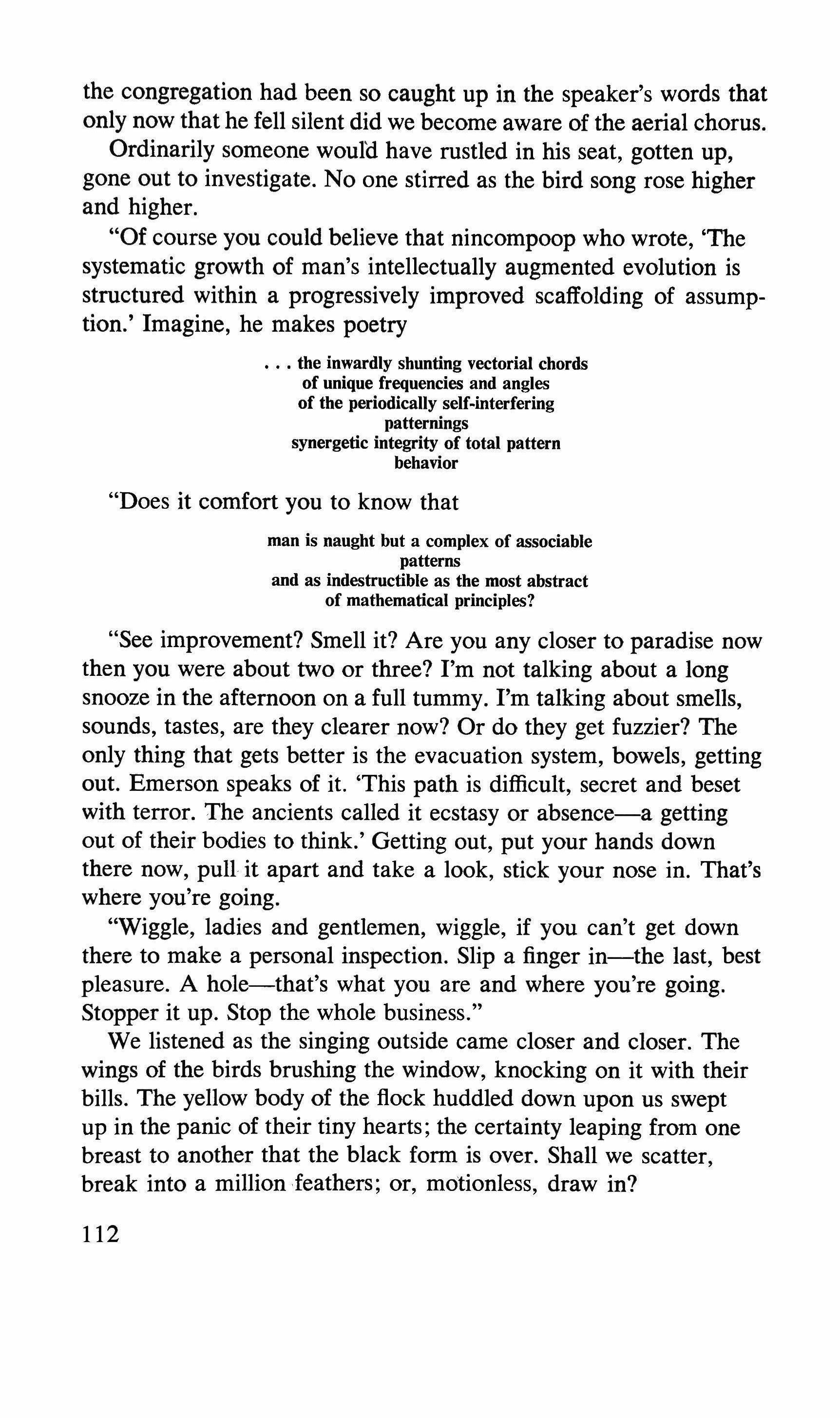
the congregation had been so caught up in the speaker's words that only now that he fell silent did we become aware of the aerial chorus.
Ordinarily someone would have rustled in his seat, gotten up, gone out to investigate. No one stirred as the bird song rose higher and higher.
"Of course you could believe that nincompoop who wrote, 'The systematic growth of man's intellectually augmented evolution is structured within a progressively improved scaffolding of assumption.' Imagine, he makes poetry the inwardly shunting vectorial chords of unique frequencies and angles of the periodically self-interfering patternings synergetic integrity of total pattern behavior
"Does it comfort you to know that man is naught but a complex of associable patterns and as indestructible as the most abstract of mathematical principles?
"See improvement? Smell it? Are you any closer to paradise now then you were about two or three? I'm not talking about a long snooze in the afternoon on a full tummy. I'm talking about smells, sounds, tastes, are they clearer now? Or do they get fuzzier? The only thing that gets better is the evacuation system, bowels, getting out. Emerson speaks of it. 'This path is difficult, secret and beset with terror. The ancients called it ecstasy or absence-a getting out of their bodies to think.' Getting out, put your hands down there now, pull it apart and take a look, stick your nose in. That's where you're going.
"Wiggle, ladies and gentlemen, wiggle, if you can't get down there to make a personal inspection. Slip a finger in-the last, best pleasure. A hole-that's what you are and where you're going. Stopper it up. Stop the whole business."
We listened as the singing outside came closer and closer. The wings of the birds brushing the window, knocking on it with their bills. The yellow body of the flock huddled down upon us swept up in the panic of their tiny hearts; the certainty leaping from one breast to another that the black form is over. Shall we scatter, break into a million feathers; or, motionless, draw in? 112
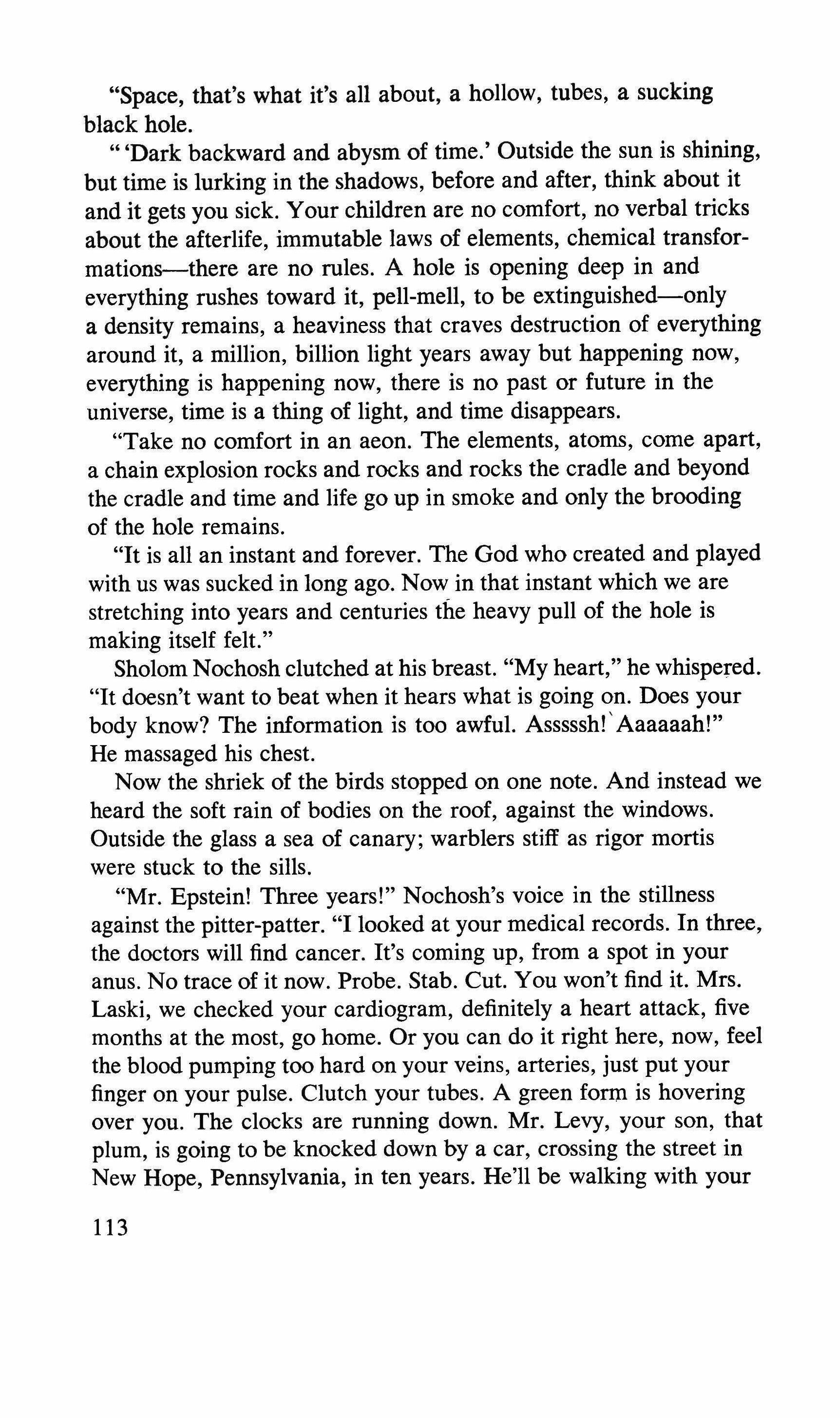
"Space, that's what it's all about, a hollow, tubes, a sucking black hole.
"'Dark backward and abysm of time.' Outside the sun is shining, but time is lurking in the shadows, before and after, think about it and it gets you sick. Your children are no comfort, no verbal tricks about the afterlife, immutable laws of elements, chemical transformations-there are no rules. A hole is opening deep in and everything rushes toward it, pell-mell, to be extinguished-only a density remains, a heaviness that craves destruction of everything around it, a million, billion light years away but happening now, everything is happening now, there is no past or future in the universe, time is a thing of light, and time disappears.
"Take no comfort in an aeon. The elements, atoms, come apart, a chain explosion rocks and rocks and rocks the cradle and beyond the cradle and time and life go up in smoke and only the brooding of the hole remains.
"It is all an instant and forever. The God who created and played with us was sucked in long ago. Now in that instant which we are stretching into years and centuries the heavy pull of the hole is making itself felt."
Sholom Nochosh clutched at his breast. "My heart," he whispered. "It doesn't want to beat when it hears what is going on. Does your body know? The information is too awful. AssssshlAaaaaah!" He massaged his chest.
Now the shriek of the birds stopped on one note. And instead we heard the soft rain of bodies on the roof, against the windows. Outside the glass a sea of canary; warblers stiff as rigor mortis were stuck to the sills.
"Mr. Epstein! Three years!" Nochosh's voice in the stillness against the pitter-patter. "I looked at your medical records. In three, the doctors will find cancer. It's coming up, from a spot in your anus. No trace of it now. Probe. Stab. Cut. You won't find it. Mrs. Laski, we checked your cardiogram, definitely a heart attack, five months at the most, go home. Or you can do it right here, now, feel the blood pumping too hard on your veins, arteries, just put your finger on your pulse. Clutch your tubes. A green form is hovering over you. The clocks are running down. Mr. Levy, your son, that plum, is going to be knocked down by a car, crossing the street in New Hope, Pennsylvania, in ten years. He'll be walking with your 113
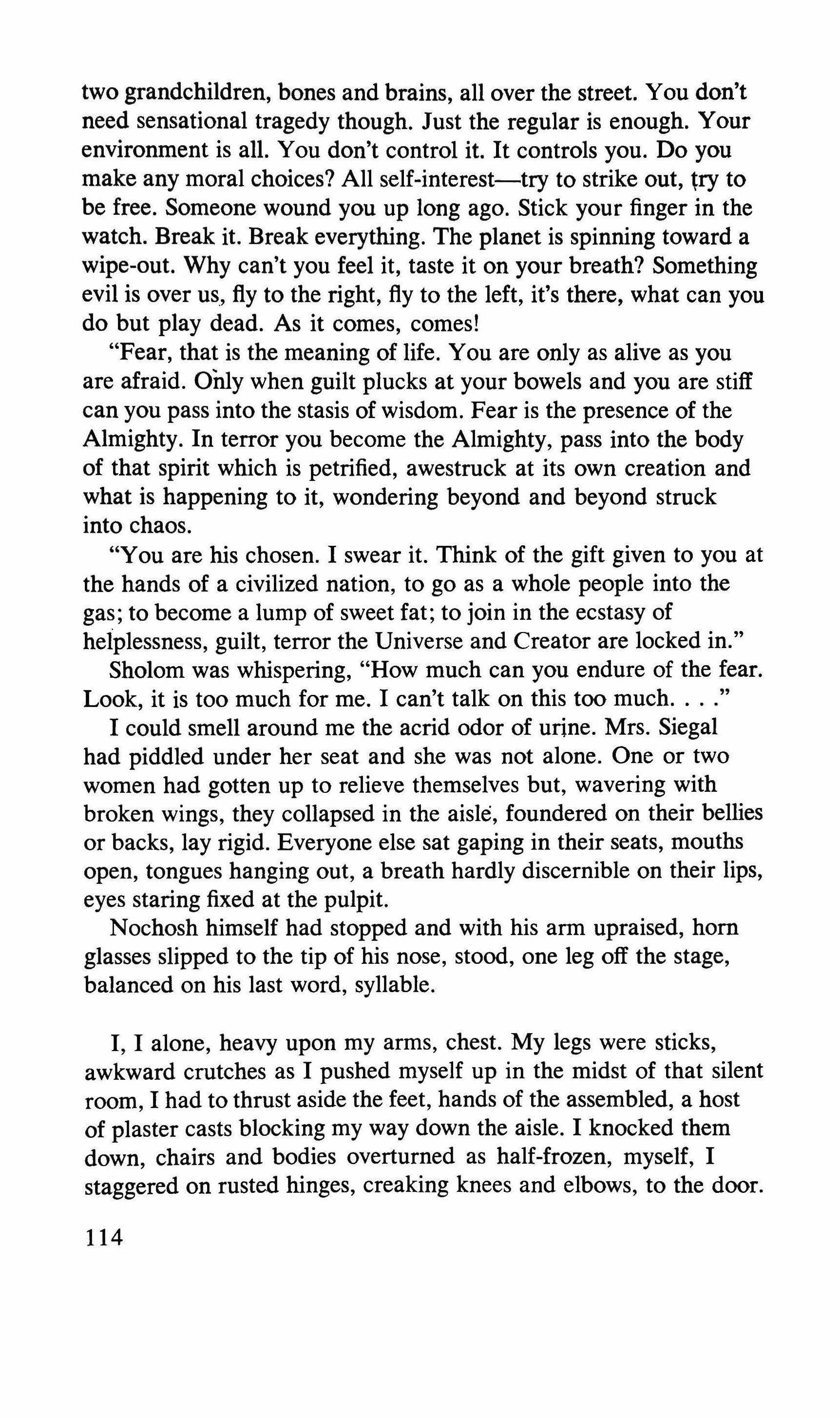
two grandchildren, bones and brains, all over the street. You don't need sensational tragedy though. Just the regular is enough. Your environment is all. You don't control it. It controls you. Do you make any moral choices? All self-interest-try to strike out, try to be free. Someone wound you up long ago. Stick your finger in the watch. Break it. Break everything. The planet is spinning toward a wipe-out. Why can't you feel it, taste it on your breath? Something evil is over us, fly to the right, fly to the left, it's there, what can you do but play dead. As it comes, comes!
"Fear, that is the meaning of life. You are only as alive as you are afraid. Only when guilt plucks at your bowels and you are stiff can you pass into the stasis of wisdom. Fear is the presence of the Almighty. In terror you become the Almighty, pass into the body of that spirit which is petrified, awestruck at its own creation and what is happening to it, wondering beyond and beyond struck into chaos.
"You are his chosen. I swear it. Think of the gift given to you at the hands of a civilized nation, to go as a whole people into the gas; to become a lump of sweet fat; to join in the ecstasy of helplessness, guilt, terror the Universe and Creator are locked in."
Sholom was whispering, "How much can you endure of the fear. Look, it is too much for me. I can't talk on this too much " I could smell around me the acrid odor of urine. Mrs. Siegal had piddled under her seat and she was not alone. One or two women had gotten up to relieve themselves but, wavering with broken wings, they collapsed in the aisle, foundered on their bellies or backs, lay rigid. Everyone else sat gaping in their seats, mouths open, tongues hanging out, a breath hardly discernible on their lips, eyes staring fixed at the pulpit.
Nochosh himself had stopped and with his arm upraised, hom glasses slipped to the tip of his nose, stood, one leg off the stage, balanced on his last word, syllable.
I, I alone, heavy upon my arms, chest. My legs were sticks, awkward crutches as I pushed myself up in the midst of that silent room, I had to thrust aside the feet, hands of the assembled, a host of plaster casts blocking my way down the aisle. I knocked them down, chairs and bodies overturned as half-frozen, myself, I staggered on rusted hinges, creaking knees and elbows, to the door.
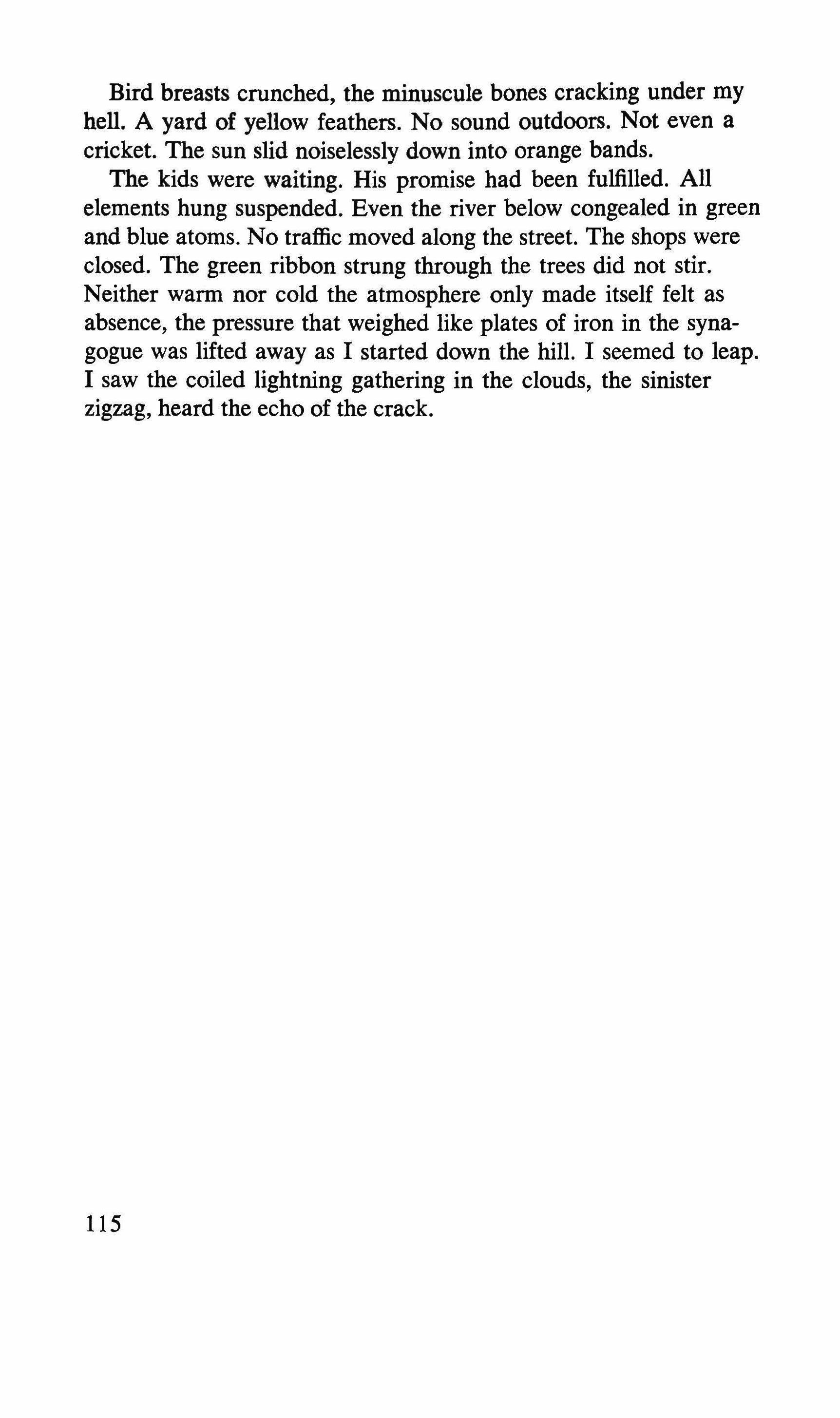
Bird breasts crunched, the minuscule bones cracking under my hell. A yard of yellow feathers. No sound outdoors. Not even a cricket. The sun slid noiselessly down into orange bands.
The kids were waiting. His promise had been fulfilled. All elements hung suspended. Even the river below congealed in green and blue atoms. No traffic moved along the street. The shops were closed. The green ribbon strung through the trees did not stir. Neither warm nor cold the atmosphere only made itself felt as absence, the pressure that weighed like plates of iron in the synagogue was lifted away as I started down the hill. I seemed to leap. I saw the coiled lightning gathering in the clouds, the sinister zigzag, heard the echo of the crack.
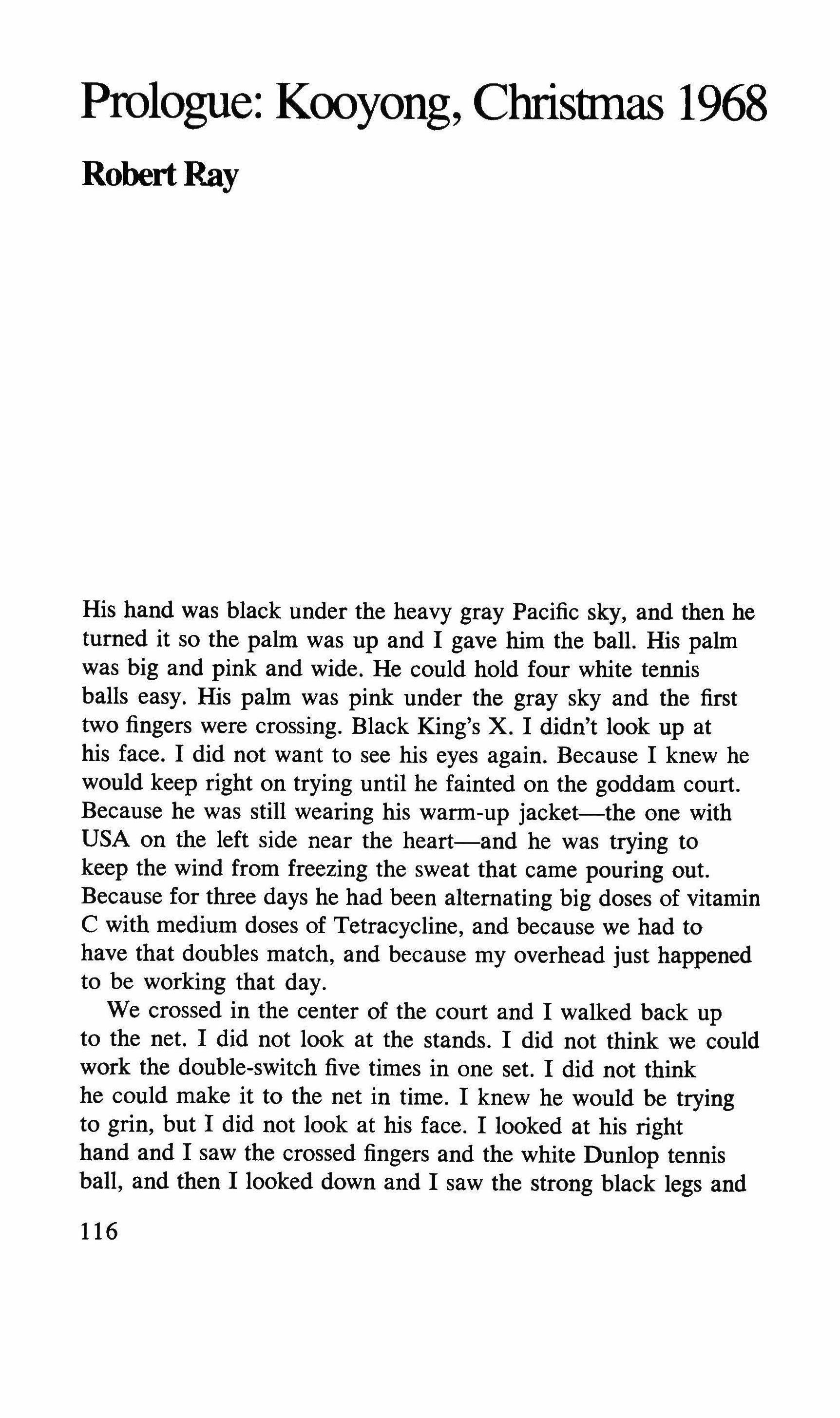
His hand was black under the heavy gray Pacific sky, and then he turned it so the palm was up and I gave him the ball. His palm was big and pink and wide. He could hold four white tennis balls easy. His palm was pink under the gray sky and the first two fingers were crossing. Black King's X. I didn't look up at his face. I did not want to see his eyes again. Because I knew he would keep right on trying until he fainted on the goddam court. Because he was still wearing his warm-up jacket-the one with USA on the left side near the heart-and he was trying to keep the wind from freezing the sweat that came pouring out. Because for three days he had been alternating big doses of vitamin C with medium doses of Tetracycline, and because we had to have that doubles match, and because my overhead just happened to be working that day.
We crossed in the center of the court and I walked back up to the net. I did not look at the stands. I did not think we could work the double-switch five times in one set. I did not think he could make it to the net in time. I knew he would be trying to grin, but I did not look at his face. I looked at his right hand and I saw the crossed fingers and the white Dunlop tennis ball, and then I looked down and I saw the strong black legs and 116
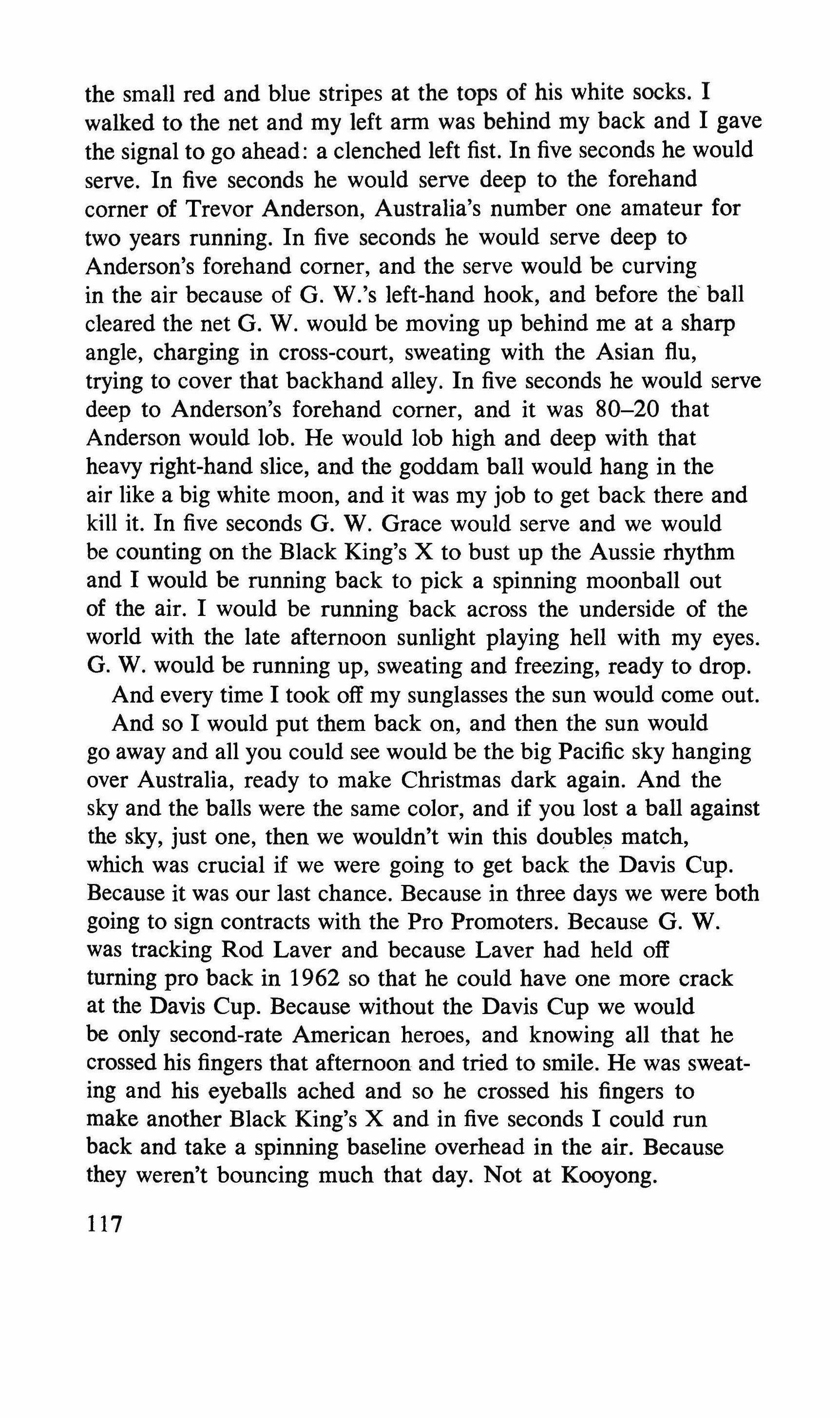
the small red and blue stripes at the tops of his white socks. I walked to the net and my left arm was behind my back and I gave the signal to go ahead: a clenched left fist. In five seconds he would serve. In five seconds he would serve deep to the forehand corner of Trevor Anderson, Australia's number one amateur for two years running. In five seconds he would serve deep to Anderson's forehand corner, and the serve would be curving in the air because of G. W.'s left-hand hook, and before the' ball cleared the net G. W. would be moving up behind me at a sharp angle, charging in cross-court, sweating with the Asian flu, trying to cover that backhand alley. In five seconds he would serve deep to Anderson's forehand corner, and it was 80-20 that Anderson would lob. He would lob high and deep with that heavy right-hand slice, and the goddam ball would hang in the air like a big white moon, and it was my job to get back there and kill it. In five seconds G. W. Grace would serve and we would be counting on the Black King's X to bust up the Aussie rhythm and I would be running back to pick a spinning moonball out of the air. I would be running back across the underside of the world with the late afternoon sunlight playing hell with my eyes. G. W. would be running up, sweating and freezing, ready to drop. And every time I took off my sunglasses the sun would come out. And so I would put them back on, and then the sun would go away and all you could see would be the big Pacific sky hanging over Australia, ready to make Christmas dark again. And the sky and the balls were the same color, and if you lost a ball against the sky, just one, then we wouldn't win this doubles match, which was crucial if we were going to get back the Davis Cup. Because it was our last chance. Because in three days we were both going to sign contracts with the Pro Promoters. Because G. W. was tracking Rod Laver and because Laver had held off turning pro back in 1962 so that he could have one more crack at the Davis Cup. Because without the Davis Cup we would be only second-rate American heroes, and knowing all that he crossed his fingers that afternoon and tried to smile. He was sweating and his eyeballs ached and so he crossed his fingers to make another Black King's X and in five seconds I could run back and take a spinning baseline overhead in the air. Because they weren't bouncing much that day. Not at Kooyong.
117
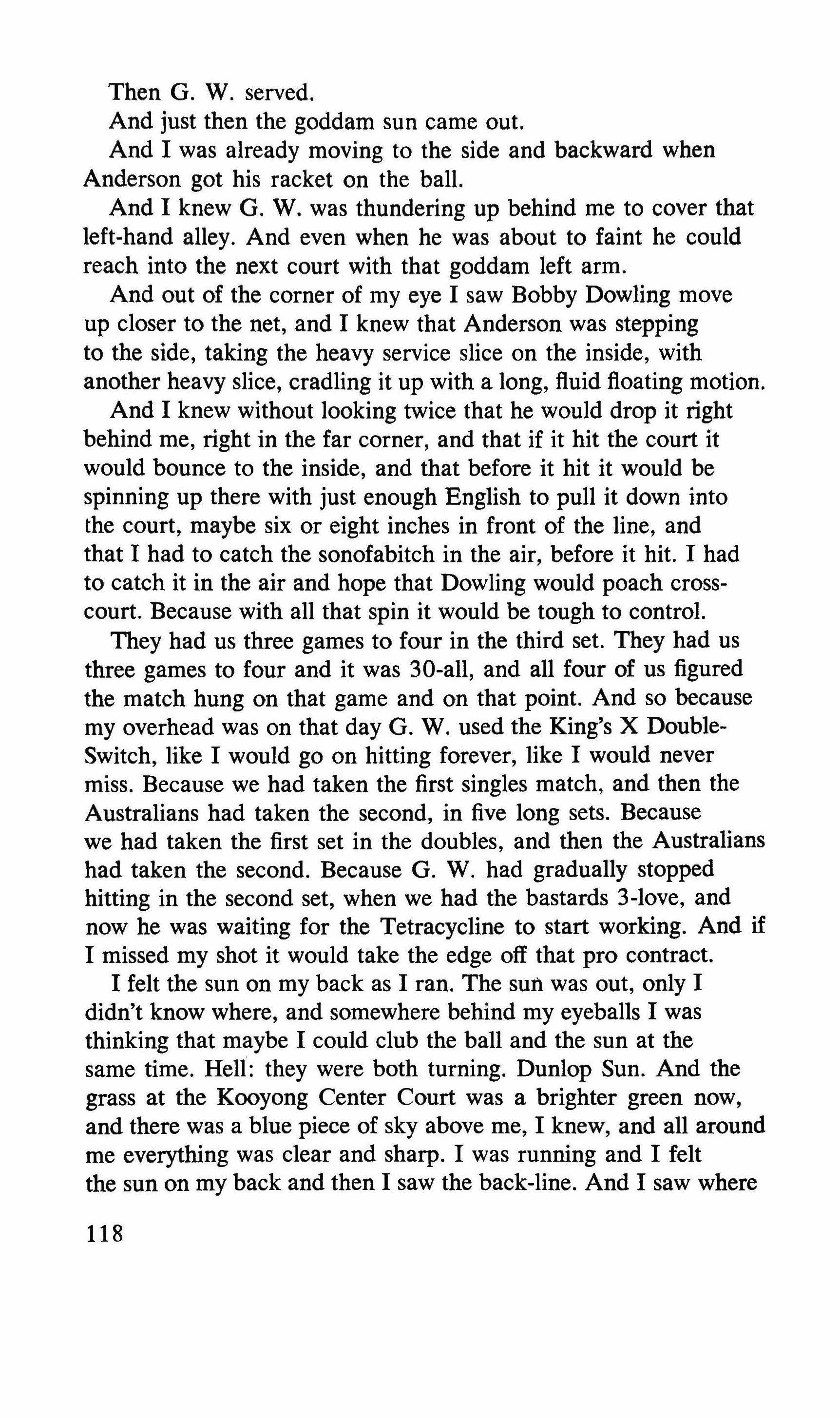
Then G. W. served.
And just then the goddam sun came out.
And I was already moving to the side and backward when Anderson got his racket on the ball.
And I knew G. W. was thundering up behind me to cover that left-hand alley. And even when he was about to faint he could reach into the next court with that goddam left arm.
And out of the corner of my eye I saw Bobby Dowling move up closer to the net, and I knew that Anderson was stepping to the side, taking the heavy service slice on the inside, with another heavy slice, cradling it up with a long, fluid floating motion.
And I knew without looking twice that he would drop it right behind me, right in the far corner, and that if it hit the court it would bounce to the inside, and that before it hit it would be spinning up there with just enough English to pull it down into the court, maybe six or eight inches in front of the line, and that I had to catch the sonofabitch in the air, before it hit. I had to catch it in the air and hope that Dowling would poach crosscourt. Because with all that spin it would be tough to control.
They had us three games to four in the third set. They had us three games to four and it was 30-all, and all four of us figured the match hung on that game and on that point. And so because my overhead was on that day G. W. used the King's X DoubleSwitch, like I would go on hitting forever, like I would never miss. Because we had taken the first singles match, and then the Australians had taken the second, in five long sets. Because we had taken the first set in the doubles, and then the Australians had taken the second. Because G. W. had gradually stopped hitting in the second set, when we had the bastards 3-love, and now he was waiting for the Tetracycline to start working. And if I missed my shot it would take the edge off that pro contract.
I felt the sun on my back as I ran. The sun was out, only I didn't know where, and somewhere behind my eyeballs I was thinking that maybe I could club the ball and the sun at the same time. Hell: they were both turning. Dunlop Sun. And the grass at the Kooyong Center Court was a brighter green now, and there was a blue piece of sky above me, I knew, and all around me everything was clear and sharp. I was running and I felt the sun on my back and then I saw the back-line. And I saw where

it met the side-line, and where it ran on to meet the other sideline, forming a double corner, and I lined the ball up and got ready to slug it. Because I knew that's where it would land. Because Trevor Anderson had been putting them there all afternoon, in the same place, with the same goddam side-spin: just enough to hold it in the court. And when I was two or three steps away from the baseline I stopped, looked up, saw the Dunlop ball turning slowly against a blue patch of sky, and jumped. I went into the air for leverage and then I hit my goddam overhead. Whack. I felt it connect as that good expensive Imperial gut made contact with the ball. I felt my weight go off the ground and I was flying for a minute there, just the way it looks in the pictures in the tennis books when they stop Rod Laver or Lew Hoad in the air hitting an overhead, and then I came around, feeling my shoulder clicking into position, and then I came around and into the ball and I snapped my wrist. When I hit the ball I was facing the center of the net. When I hit the ball I was hanging in the air over Kooyong and my body was angled so that I was facing the center of the net. I saw the ball turning in the air, spinning against the blue sky, and I could almost read the word DUNLOP as I jumped and swung. The ball against the blue sky suddenly caught the sun and I saw my racket turn in the sudden bright light, and for the first time that day my shades paid off. I was tracking, pointing' cross-court with my left arm, the way you do when you're going to hit cross-court, aiming for the short angle in the alley the way I always did, and then at the last instant I turned the racket face and sent the ball down the line for a winner. It was lucky. I came down, out of the air, out of the tennis book, and bounced once, and I watched the ball float in slow-motion past Bobby Dowling, who was moving to the center of the net to cut off my cross-court, and my feet were planted once more on the tough hard grass of Australia. I watched Trevor Anderson cut behind Dowling and make a lunge with his backhand, and the ball went into the alley and came up against the green back-cloth.
"Point for the United States," the umpire said. "Forty-thirty."
Three games later I knew that back-court overhead had been the turning point of the match. Because after that G. W. started hitting again, and we began to work as a team again,
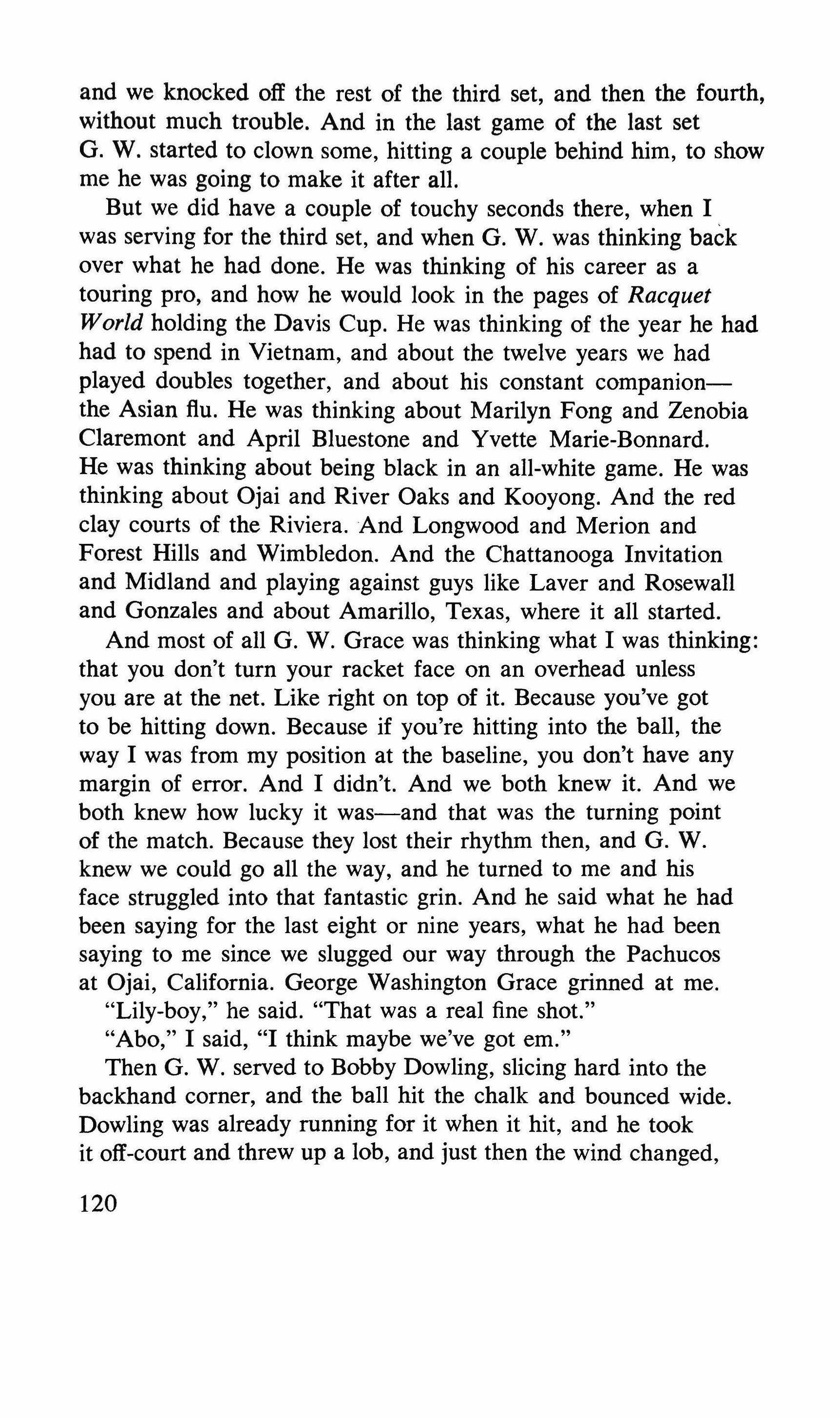
and we knocked off the rest of the third set, and then the fourth, without much trouble. And in the last game of the last set G. W. started to clown some, hitting a couple behind him, to show me he was going to make it after all.
But we did have a couple of touchy seconds there, when I was serving for the third set, and when G. W. was thinking back over what he had done. He was thinking of his career as a touring pro, and how he would look in the pages of Racquet World holding the Davis Cup. He was thinking of the year he had had to spend in Vietnam, and about the twelve years we had played doubles together, and about his constant companionthe Asian flu. He was thinking about Marilyn Fong and Zenobia Claremont and April Bluestone and Yvette Marie-Bonnard. He was thinking about being black in an all-white game. He was thinking about Ojai and River Oaks and Kooyong. And the red clay courts of the Riviera. And Longwood and Merion and Forest Hills and Wimbledon. And the Chattanooga Invitation and Midland and playing against guys like Laver and Rosewall and Gonzales and about Amarillo, Texas, where it all started.
And most of all G. W. Grace was thinking what I was thinking: that you don't turn your racket face on an overhead unless you are at the net. Like right on top of it. Because you've got to be hitting down. Because if you're hitting into the ball, the way I was from my position at the baseline, you don't have any margin of error. And I didn't. And we both knew it. And we both knew how lucky it was-and that was the turning point of the match. Because they lost their rhythm then, and G. W. knew we could go all the way, and he turned to me and his face struggled into that fantastic grin. And he said what he had been saying for the last eight or nine years, what he had been saying to me since we slugged our way through the Pachucos at Ojai, California. George Washington Grace grinned at me.
"Lily-boy," he said. "That was a real fine shot."
"Abo," I said, "I think maybe we've got em."
Then G. W. served to Bobby Dowling, slicing hard into the backhand corner, and the ball hit the chalk and bounced wide. Dowling was already running for it when it hit, and he took it off-court and threw up a lob, and just then the wind changed,
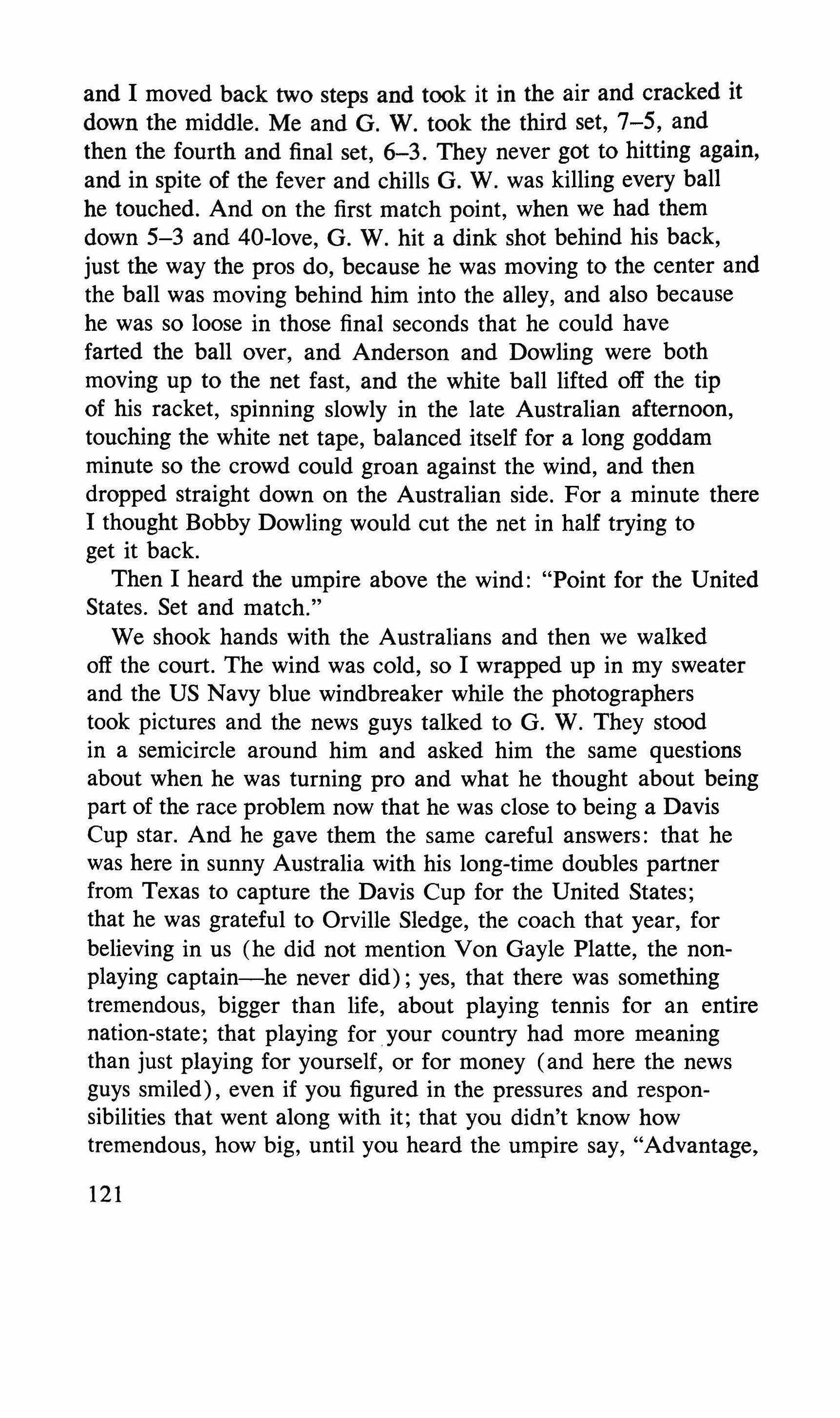
and I moved back two steps and took it in the air and cracked it down the middle. Me and G. W. took the third set, 7-5, and then the fourth and final set, 6-3. They never got to hitting again, and in spite of the fever and chills G. W. was killing every ball he touched. And on the first match point, when we had them down 5-3 and 40-love, G. W. hit a dink shot behind his back, just the way the pros do, because he was moving to the center and the ball was moving behind him into the alley, and also because he was so loose in those final seconds that he could have farted the ball over, and Anderson and Dowling were both moving up to the net fast, and the white ball lifted off the tip of his racket, spinning slowly in the late Australian afternoon, touching the white net tape, balanced itself for a long goddam minute so the crowd could groan against the wind, and then dropped straight down on the Australian side. For a minute there I thought Bobby Dowling would cut the net in half trying to get it back.
Then I heard the umpire above the wind: "Point for the United States. Set and match."
We shook hands with the Australians and then we walked off the court. The wind was cold, so I wrapped up in my sweater and the US Navy blue windbreaker while the photographers took pictures and the news guys talked to G. W. They stood in a semicircle around him and asked him the same questions about when he was turning pro and what he thought about being part of the race problem now that he was close to being a Davis Cup star. And he gave them the same careful answers: that he was here in sunny Australia with his long-time doubles partner from Texas to capture the Davis Cup for the United States; that he was grateful to Orville Sledge, the coach that year, for believing in us (he did not mention Von Gayle Platte, the nonplaying captain-he never did) ; yes, that there was something tremendous, bigger than life, about playing tennis for an entire nation-state; that playing for. your country had more meaning than just playing for yourself, or for money (and here the news guys smiled), even if you figured in the pressures and responsibilities that went along with it; that you didn't know how tremendous, how big, until you heard the umpire say, "Advantage,
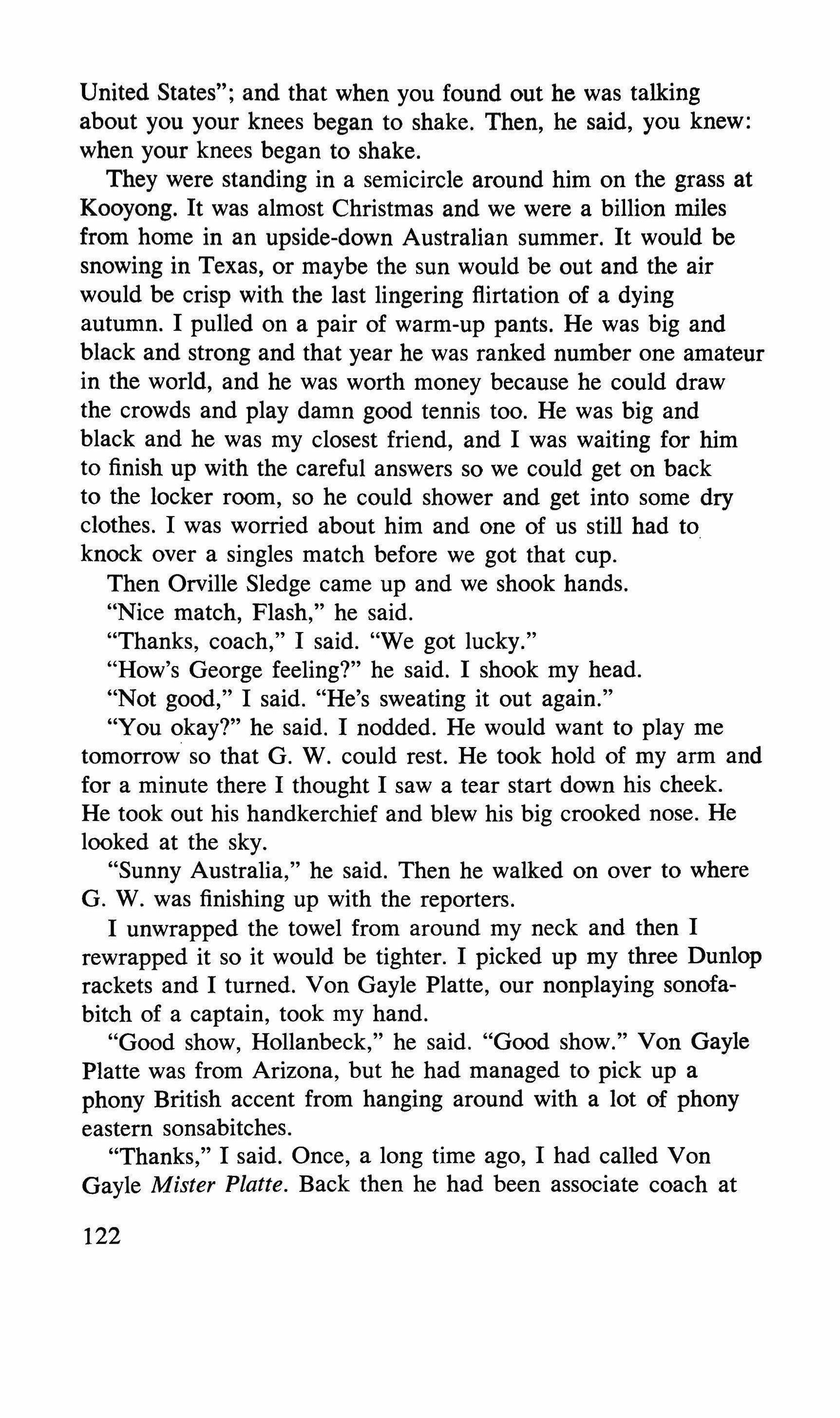
United States"; and that when you found out he was talking about you your knees began to shake. Then, he said, you knew: when your knees began to shake.
They were standing in a semicircle around him on the grass at Kooyong. It was almost Christmas and we were a billion miles from home in an upside-down Australian summer. It would be snowing in Texas, or maybe the sun would be out and the air would be crisp with the last lingering flirtation of a dying autumn. I pulled on a pair of warm-up pants. He was big and black and strong and that year he was ranked number one amateur in the world, and he was worth money because he could draw the crowds and play damn good tennis too. He was big and black and he was my closest friend, and I was waiting for him to finish up with the careful answers so we could get on back to the locker room, so he could shower and get into some dry clothes. I was worried about him and one of us still had to knock over a singles match before we got that cup.
Then Orville Sledge came up and we shook hands.
"Nice match, Flash," he said.
"Thanks, coach," I said. "We got lucky."
"How's George feeling?" he said. I shook my head.
"Not good," I said. "He's sweating it out again."
"You okay?" he said. I nodded. He would want to play me tomorrow so that G. W. could rest. He took hold of my arm and for a minute there I thought I saw a tear start down his cheek. He took out his handkerchief and blew his big crooked nose. He looked at the sky.
"Sunny Australia," he said. Then he walked on over to where G. W. was finishing up with the reporters.
I unwrapped the towel from around my neck and then I rewrapped it so it would be tighter. I picked up my three Dunlop rackets and I turned. Von Gayle Platte, our nonplaying sonofabitch of a captain, took my hand.
"Good show, Hollanbeck," he said. "Good show." Von Gayle Platte was from Arizona, but he had managed to pick up a phony British accent from hanging around with a lot of phony eastern sonsabitches.
"Thanks," I said. Once, a long time ago, I had called Von Gayle Mister Platte. Back then he had been associate coach at 122
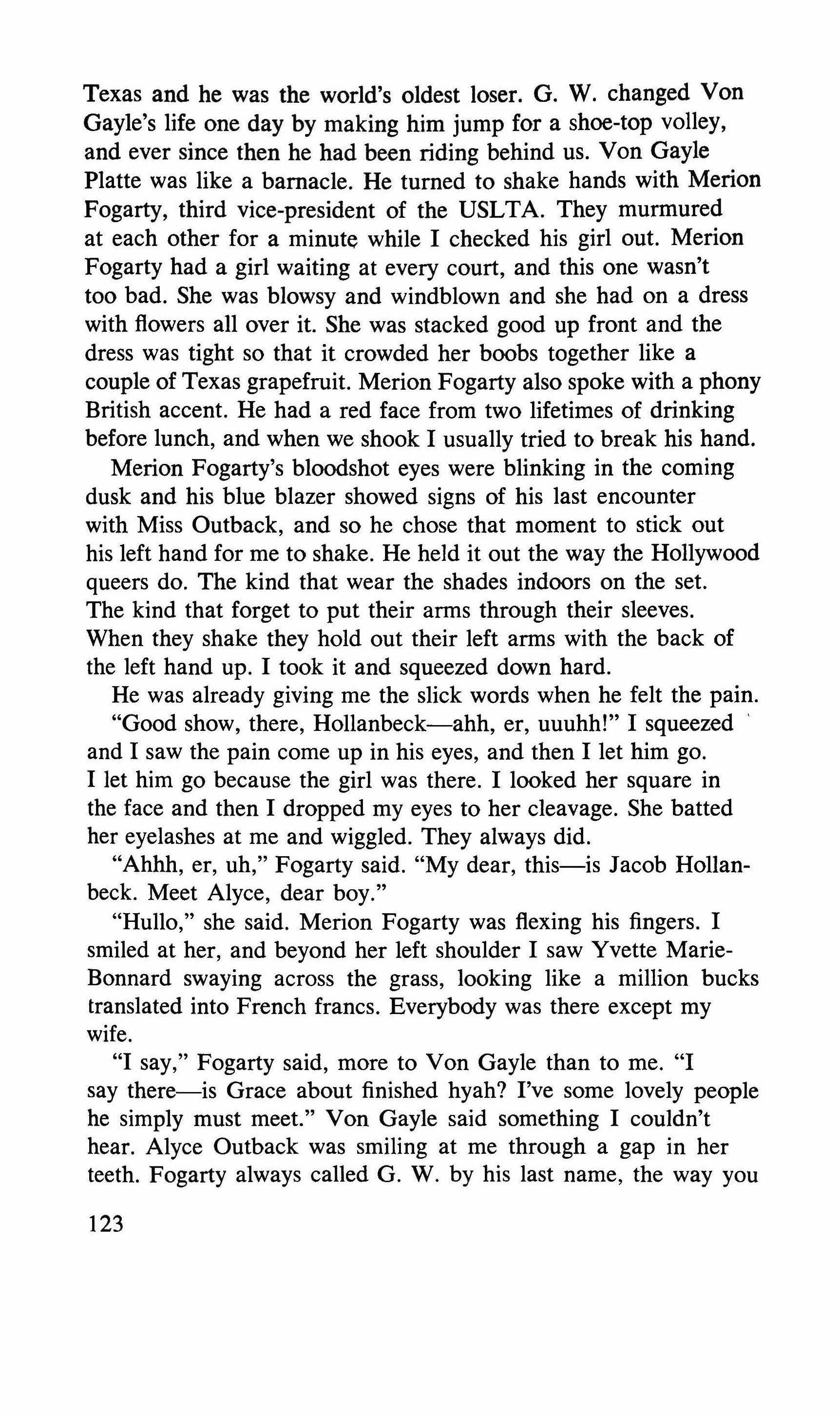
Texas and he was the world's oldest loser. G. W. changed Von Gayle's life one day by making him jump for a shoe-top volley, and ever since then he had been riding behind us. Von Gayle Platte was like a barnacle. He turned to shake hands with Merion Fogarty, third vice-president of the USLTA. They murmured at each other for a minute while I checked his girl out. Merion Fogarty had a girl waiting at every court, and this one wasn't too bad. She was blowsy and windblown and she had on a dress with flowers all over it. She was stacked good up front and the dress was tight so that it crowded her boobs together like a couple of Texas grapefruit. Merion Fogarty also spoke with a phony British accent. He had a red face from two lifetimes of drinking before lunch, and when we shook I usually tried to break his hand.
Merion Fogarty's bloodshot eyes were blinking in the coming dusk and his blue blazer showed signs of his last encounter with Miss Outback, and so he chose that moment to stick out his left hand for me to shake. He held it out the way the Hollywood queers do. The kind that wear the shades indoors on the set. The kind that forget to put their arms through their sleeves. When they shake they hold out their left arms with the back of the left hand up. I took it and squeezed down hard.
He was already giving me the slick words when he felt the pain.
"Good show, there, Hollanbeck-ahh, er, uuuhh!" I squeezed' and I saw the pain come up in his eyes, and then I let him go. I let him go because the girl was there. I looked her square in the face and then I dropped my eyes to her cleavage. She batted her eyelashes at me and wiggled. They always did.
"Ahhh, er, uh," Fogarty said. "My dear, this-is Jacob Hollanbeck. Meet Alyce, dear boy."
"Hullo," she said. Merion Fogarty was flexing his fingers. I smiled at her, and beyond her left shoulder I saw Yvette MarieBonnard swaying across the grass, looking like a million bucks translated into French francs. Everybody was there except my wife.
"I say," Fogarty said, more to Von Gayle than to me. "I say there-is Grace about finished hyah? I've some lovely people he simply must meet." Von Gayle said something I couldn't hear. Alyce Outback was smiling at me through a gap in her teeth. Fogarty always called G. W. by his last name, the way you 123

would talk to a servant, Jeeves, if you were part of a poopedout New England family like the Fogartys. Someday G. W. would bust a finger for him. We had both been trying for almost ten years, ever since we had first run onto Merion Fogarty, back when he was messing around with the Junior Davis Cup. Then Yvette Marie-Bonnard came up and the wind blew some of her fine blonde hair across her pretty mouth, and she smiled and looked across for G. W., and that's the way the Racquet World photographer caught us. In the background you can see George Washington Grace finishing up with the news guys and a piece of the stadium at Kooyong. The girl, Alyce Outback, is looking my way, and the camera solidifies her left boob in profile. Merion Fogarty has sensed the presence of the cameraman and is turning his alcoholic nose so that he'll go down in Davis Cup history from the best angle. Von Gayle Platte is smiling a crooked wintry smile and holding up his right hand in a V-for-victory sign. And me: I look dragged out. And I feel older than my twenty-six years. And I miss my wife. And I'm worried as hell about my dad because he's sick. I'm holding three Dunlop rackets and freezing to death because the wind is chilling my gut and I wonder how a woman as frail as Yvette Marie-Bonnard can take it sitting in a windy stadium in a dress as thin as that. It was a perfect tennis picture, but it couldn't tell anyone but me what I was thinking. I was thinking about the next two singles matches and about G. W.'s Asian flu and about Merion Fogarty and Von Gayle Platte and their under-the-table fight against open tennis. I was thinking about Elaine, my wife, and about Orville Sledge, who had got us all the way to the dead center of the challenge round, and about the pro contract Walter Gregory had offered me two days before I lost my singles match to Trevor Anderson. I was thinking about playing a little pro tennis before I tried my hand at the law. I was thinking about those crowds (I loved crowds) and about playing against the top guys like Laver and Rosewall and Gonzales. I was thinking about tennis and, about money and love and friendship and tennis balls and a world bounded by white lines across a green field and about the way everything went together to make up a man's life. Oh, yes, I was thinking. Five minutes later we were in the locker room. Randy Angell
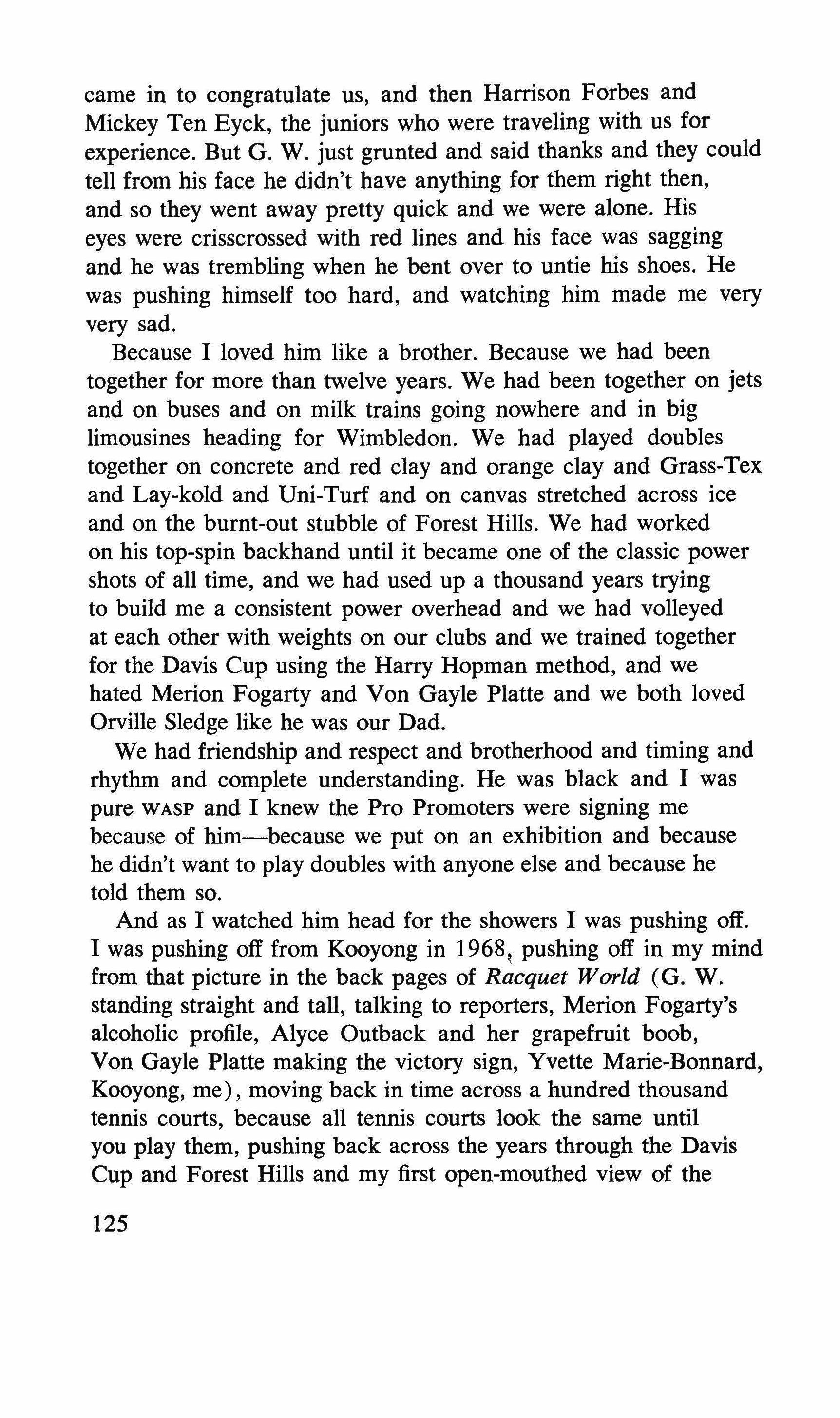
came in to congratulate us, and then Harrison Forbes and Mickey Ten Eyck, the juniors who were traveling with us for experience. But G. W. just grunted and said thanks and they could tell from his face he didn't have anything for them right then, and so they went away pretty quick and we were alone. His eyes were crisscrossed with red lines and his face was sagging and he was trembling when he bent over to untie his shoes. He was pushing himself too hard, and watching him made me very very sad.
Because I loved him like a brother. Because we had been together for more than twelve years. We had been together on jets and on buses and on milk trains going nowhere and in big limousines heading for Wimbledon. We had played doubles together on concrete and red clay and orange clay and Grass-Tex and Lay-kold and Uni-Turf and on canvas stretched across ice and on the burnt-out stubble of Forest Hills. We had worked on his top-spin backhand until it became one of the classic power shots of all time, and we had used up a thousand years trying to build me a consistent power overhead and we had volleyed at each other with weights on our clubs and we trained together for the Davis Cup using the Harry Hopman method, and we hated Merion Fogarty and Von Gayle Platte and we both loved Orville Sledge like he was our Dad.
We had friendship and respect and brotherhood and timing and rhythm and complete understanding. He was black and I was pure WASP and I knew the Pro Promoters were signing me because of him-because we put on an exhibition and because he didn't want to play doubles with anyone else and because he told them so.
And as I watched him head for the showers I was pushing off. I was pushing off from Kooyong in 1968� pushing off in my mind from that picture in the back pages of Racquet World (G. W. standing straight and tall, talking to reporters, Merion Fogarty's alcoholic profile, Alyce Outback and her grapefruit boob, Von Gayle Platte making the victory sign, Yvette Marie-Bonnard, Kooyong, me), moving back in time across a hundred thousand tennis courts, because all tennis courts look the same until you play them, pushing back across the years through the Davis Cup and Forest Hills and my first open-mouthed view of the 125
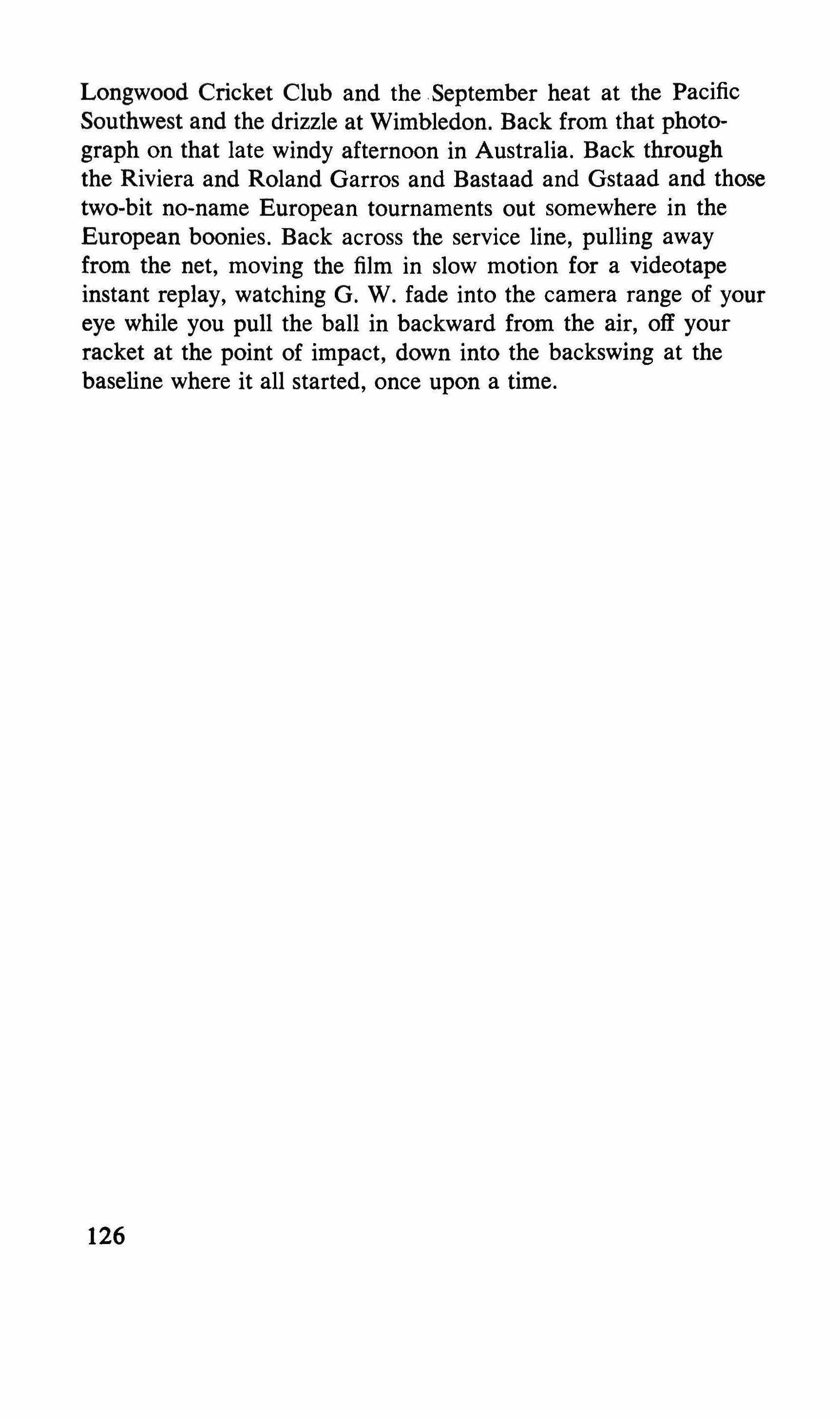
Longwood Cricket Club and the September heat at the Pacific Southwest and the drizzle at Wimbledon. Back from that photograph on that late windy afternoon in Australia. Back through the Riviera and Roland Garros and Bastaad and Gstaad and those two-bit no-name European tournaments out somewhere in the European boonies. Back across the service line, pulling away from the net, moving the film in slow motion for a videotape instant replay, watching G. W. fade into the camera range of your eye while you pull the ball in backward from the air, off your racket at the point of impact, down into the backswing at the baseline where it all started, once upon a time.

Ultrafondness: love of the distant, of the distant child, that's for me-not an astronomer-royal but an astronomer-ordinary, looking out at the constellation into which pain, or mortality, fits without fuss; into the jazz of cosmic chemistry. At least it might make this abiding headache go away as if winked at, even if it soon returns recharged, more elaborately nagging, all the way from brainpan to Adam's apple.
Unkindly kind, the situation is that visits are allowed, she to me, I to her, as if either of us were in the lockup, some Lubianka of the kinship state. Prisoner of February 23 awaits arrival of prisoner of October 18, as simply as that-except of course that she, being what's politely called "exceptional," has to be fetched, like a baby giraffe or a box of new-cut lilies. No matter how big she looks at fourteen, on womanhood's edge (on a bigger nothing's margin), she entails preparations, logistics, goods, befitting one who steers toward the Magellanic Clouds, as if her own planet were hostile to the very life form she represents, as it almost is. What a commotion, what a marathon of getting ready. Tickets, schedules, emergency numbers and remedies, calendrical affidavits-all I haven't consulted being the sundial, the almanac, the I Ching.
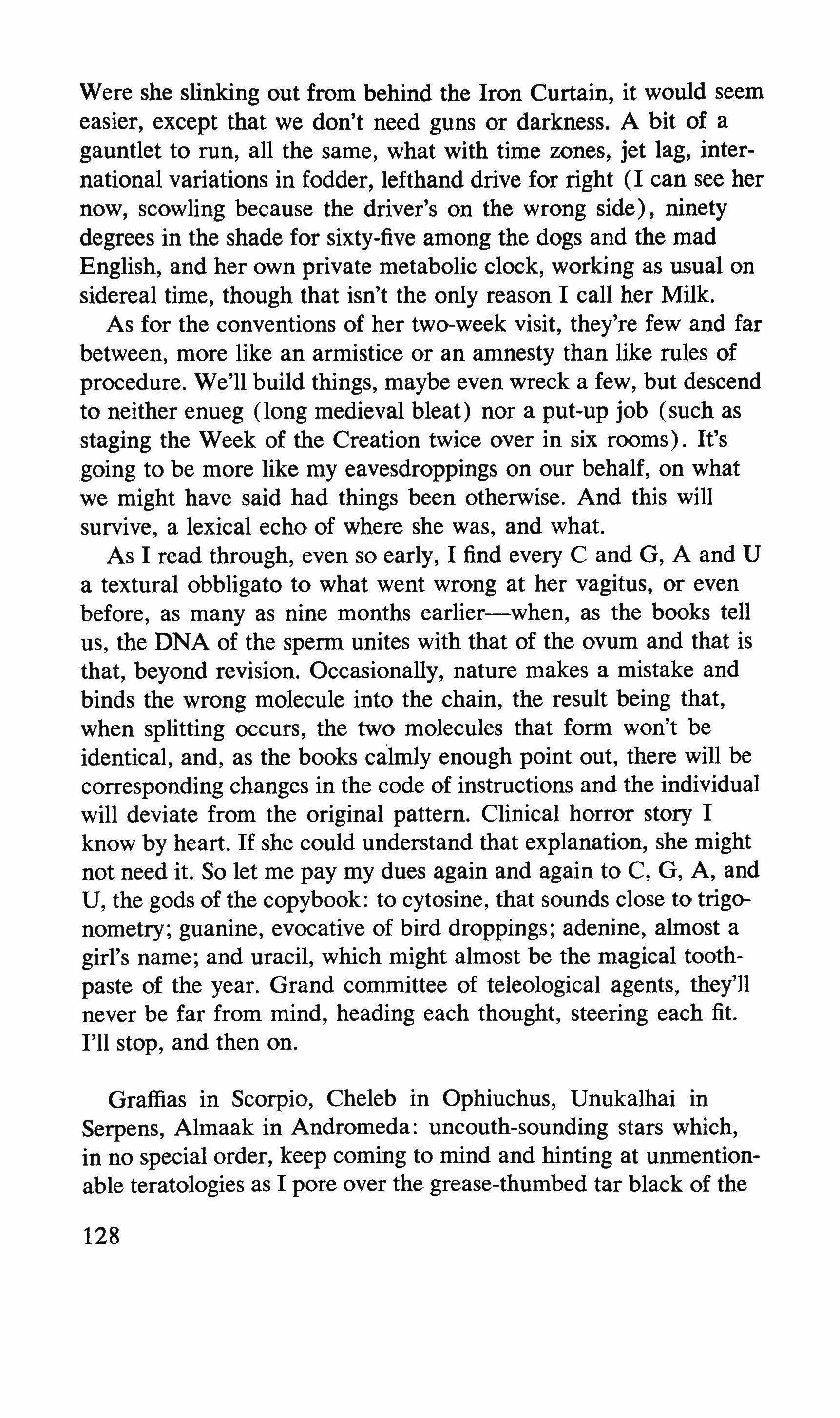
Were she slinking out from behind the Iron Curtain, it would seem easier, except that we don't need guns or darkness. A bit of a gauntlet to run, all the same, what with time zones, jet lag, international variations in fodder, lefthand drive for right (I can see her now, scowling because the driver's on the wrong side), ninety degrees in the shade for sixty-five among the dogs and the mad English, and her own private metabolic clock, working as usual on sidereal time, though that isn't the only reason I call her Milk.
As for the conventions of her two-week visit, they're few and far between, more like an armistice or an amnesty than like rules of procedure. We'll build things, maybe even wreck a few, but descend to neither enueg (long medieval bleat) nor a put-up job (such as staging the Week of the Creation twice over in six rooms). It's going to be more like my eavesdroppings on our behalf, on what we might have said had things been otherwise. And this will survive, a lexical echo of where she was, and what.
As I read through, even so early, I find every C and G, A and U a textural obbligato to what went wrong at her vagitus, or even before, as many as nine months earlier-when, as the books tell us, the DNA of the sperm unites with that of the ovum and that is that, beyond revision. Occasionally, nature makes a mistake and binds the wrong molecule into the chain, the result being that, when splitting occurs, the two molecules that form won't be identical, and, as the books calmly enough point out, there will be corresponding changes in the code of instructions and the individual will deviate from the original pattern. Clinical horror story I know by heart. If she could understand that explanation, she might not need it. So let me pay my dues again and again to C, G, A, and U, the gods of the copybook: to cytosine, that sounds close to trigonometry; guanine, evocative of bird droppings; adenine, almost a girl's name; and uracil, which might almost be the magical toothpaste of the year. Grand committee of teleological agents, they'll never be far from mind, heading each thought, steering each fit. I'll stop, and then on.
Graffias in Scorpio, Cheleb in Ophiuchus, Unukalhai in Serpens, Almaak in Andromeda: uncouth-sounding stars which, in no special order, keep coming to mind and hinting at unmentionable teratologies as I pore over the grease-thumbed tar black of the

star charts lined in Euclidean white. No matter: with each paragraph I lose a little of me to chemistry; a little of chemistry becomes my own. Win a few, lose
Uncanny that tomorrow's the day, confirmed expensively by telephone, and all I need to do, having readied the house and vowed to change my sleeping habits, is to clean up the strategies of this the intended remnant after she's come and gone like a nova that bursts forth and fades, even if to erupt again years later, like RS Ophiuchus, 1898, 1933, 1958, 1967. Here's hoping, I tell myself (there is hoping here indeed), it won't ever be that long for Milk and me, who have never been able to exchange letters, what with her being incommunicado (unlettered and unphonable) as well as in a nonstop category called constant supervision. No postscripts to her presence, then, not from her anyway; hence my need for verbal spoor, something beyond the school's guarded reports (she is making progress and learning to recognize coins). That when she was twelve. And now that tomorrow has come, I see myself setting out full of giddy foreboding. An arch, as Leonardo said, is only a strength caused by two weaknesses. Draw strength from that thought, I tell myself. Draw from it now.
Abbreviating chores, I'll record only that I'm driven to one airport, where the handwritten country menu reads "Doughnought" with an "Oops!" above it and a line through the second ught, then fly to another that has a long arcade of display cases crammed with trash, then cross several thousands of miles, in the course of which a homebound Englishman reading a journal about metals spills whiskey on my shoe and I decline to dab it or kick aside the fallen ice. I avert my clogged gaze from a South African film about a patrician former Olympic gold medalist who wants his son to win a local marathon, and instead, while music, on channels (or canals) obedient to a rotating wheel under my left thumb, flows into the stethoscope I rent for the price of a paperback, I observe the dawn's vertical spectrum as it fattens behind my plexiglas porthole.
Approaching her at over five hundred miles an hour, though much slower than Earth spins, I divide the sleepless hours between Classics in Stereo (2) and the Jazz File (9), which is to say between hosts Carmen Dragon and Leonard Feather, unlikelysounding watchmen whom I splice back to back, Cain and Abel 129
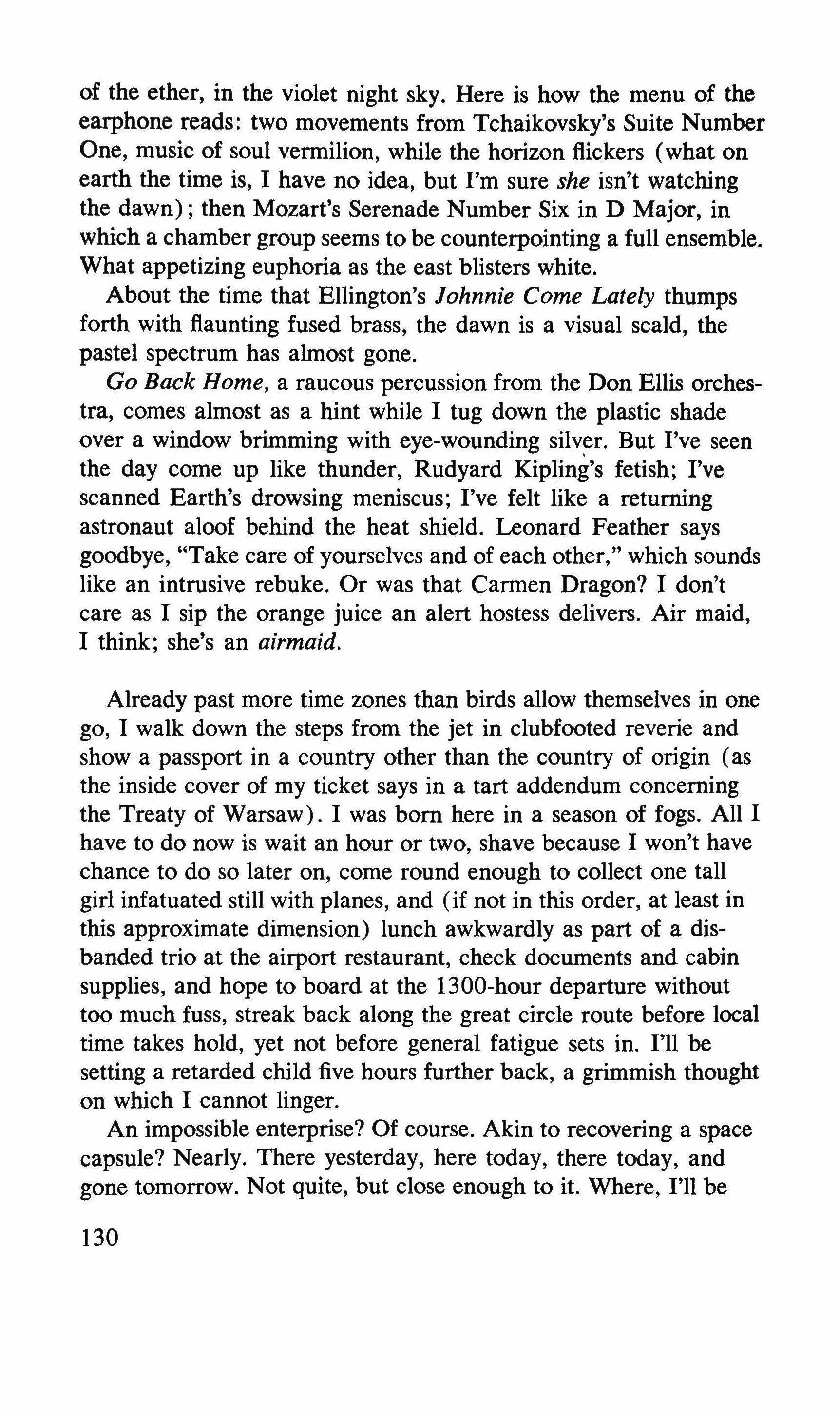
of the ether, in the violet night sky. Here is how the menu of the earphone reads: two movements from Tchaikovsky's Suite Number One, music of soul vermilion, while the horizon flickers (what on earth the time is, I have no idea, but I'm sure she isn't watching the dawn) ; then Mozart's Serenade Number Six in D Major, in which a chamber group seems to be counterpointing a full ensemble. What appetizing euphoria as the east blisters white.
About the time that Ellington's Johnnie Come Lately thumps forth with flaunting fused brass, the dawn is a visual scald, the pastel spectrum has almost gone.
Go Back Home, a raucous percussion from the Don Ellis orchestra, comes almost as a hint while I tug down the plastic shade over a window brimming with eye-wounding silver, But I've seen the day come up like thunder, Rudyard Kipling's fetish; I've scanned Earth's drowsing meniscus; I've felt like a returning astronaut aloof behind the heat shield. Leonard Feather says goodbye, "Take care of yourselves and of each other," which sounds like an intrusive rebuke. Or was that Carmen Dragon? I don't care as I sip the orange juice an alert hostess delivers. Air maid, I think; she's an airmaid.
Already past more time zones than birds allow themselves in one go, I walk down the steps from the jet in clubfooted reverie and show a passport in a country other than the country of origin (as the inside cover of my ticket says in a tart addendum concerning the Treaty of Warsaw). I was born here in a season of fogs. All I have to do now is wait an hour or two, shave because I won't have chance to do so later on, come round enough to collect one tall girl infatuated still with planes, and (if not in this order, at least in this approximate dimension) lunch awkwardly as part of a disbanded trio at the airport restaurant, check documents and cabin supplies, and hope to board at the 1300-hour departure without too much fuss, streak back along the great circle route before local time takes hold, yet not before general fatigue sets in. I'll be setting a retarded child five hours further back, a grimmish thought on which I cannot linger.
An impossible enterprise? Of course. Akin to recovering a space capsule? Nearly. There yesterday, here today, there today, and gone tomorrow. Not quite, but close enough to it. Where, I'll be

asking, did the day get lost? Arrive there at 1530, which is 2230 here, and settle down to five hours by car. The logistics are special, are they not? More like logarithms. She cannot, ever, travel alone, even with a label around her neck like the schoolchildren whom the hostesses, airmaids, ply with tiny pilot's badges, flight logbooks scaled down, coloring blocks, soft drinks, and daintily wrapped candy. And you can't drive alone with her because she might leap out or seize the wheel on a turnpike at seventy miles an hour. But at least we two get to board first, along with the elderly and parents with toddlers. My twitching mind strays to the Epstein bronze marooned behind the terminal's giant picture window; commemorating Brabazon, patron of aviators, it's like a lava flow frozen in mid-air over its pedestal. Supposedly Icarus, or the spirit of flight, it appears to unfurl untidily above the passengers' and watchers' heads. My mind makes common cause with it and goes null, hovering.
Uh-huh, the bar is closed, but what care I, having no need of it, as for several years now. A bar to moan at, however, might be something worthwhile. The restaurant is stalled between the end of breakfast and the start of lunch. I exchange a few Washingtonheaded dollars for the Queen-embossed pounds that seem smaller yearly and a handful of outsize Britannic coins that buy too little considering their weight. A telephone call later, the experiment is on, and this piece of its raw material is already wincing at the prospect. I lap up the phenomena of disorientation: coffee tasting of cocoa, Muzak from the sixties, flight announcements in an accent so fastidiously muted it might be a laryngitic sloth, an aroma of cut roses from the flower stall, one of leather from the gift boutique, a gust of hops as the bar seems to open and close again like a bloom of evil, a reek of kerosene from the runways, even a whiff of vomit from under the seat. Somnambulistically patrolling the imitation marble floor, which makes each footstep glide a fraction as if I'm walking gingerly without meaning to, I buy English and French newspapers, note the headlines, fold the stack double into my bruise-black flight bag, and go to eat haddock with an egg, refusing the always-offered french-fried potatoes. This country's future will be found to have been long behind it, spurned in the 1890s when it showed its face. Unfair? I know it is, but this morning I'm hardly capable of balanced thought.
131
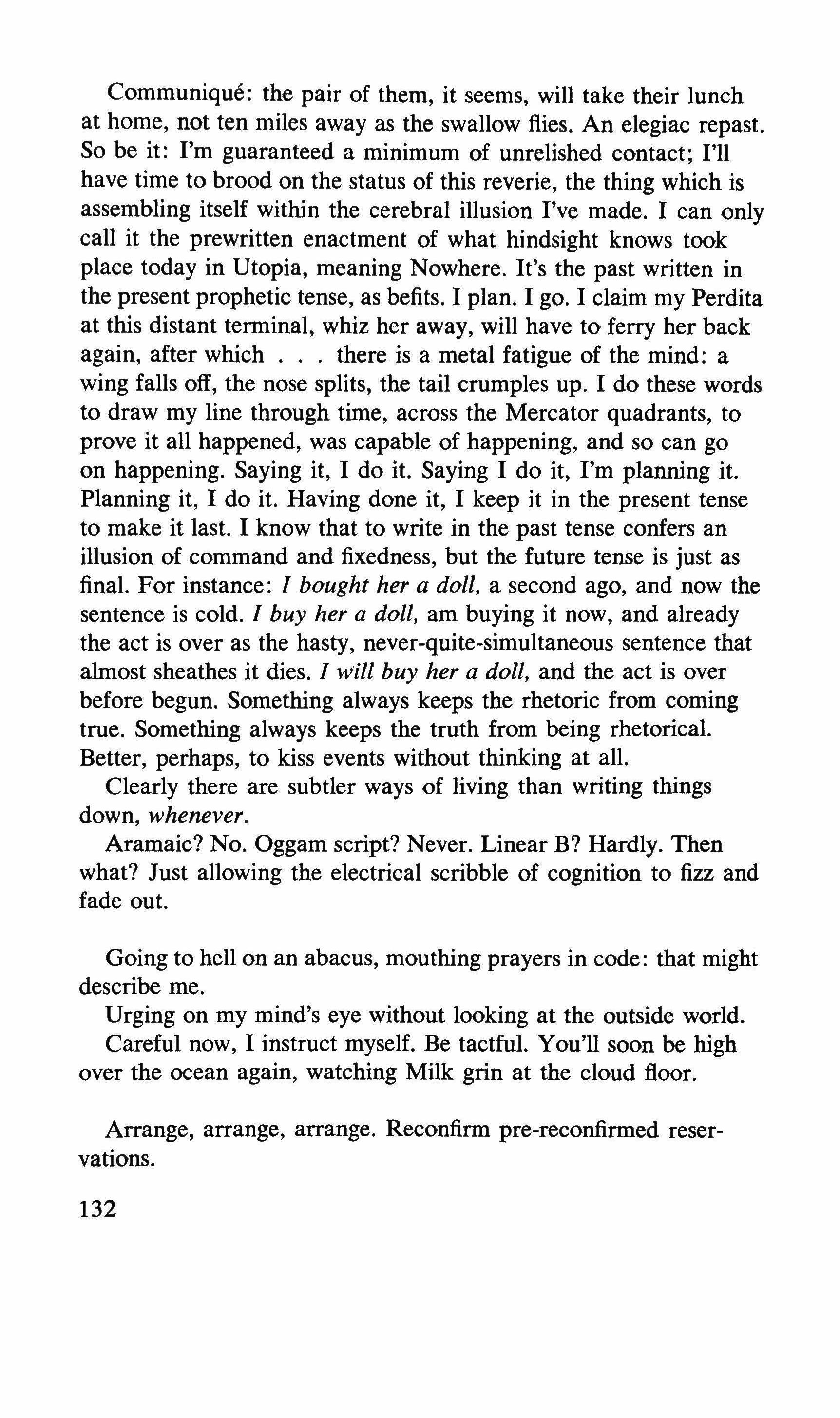
Communique: the pair of them, it seems, will take their lunch at home, not ten miles away as the swallow flies. An elegiac repast. So be it: I'm guaranteed a minimum of unrelished contact; I'll have time to brood on the status of this reverie, the thing which is assembling itself within the cerebral illusion I've made. I can only call it the prewritten enactment of what hindsight knows took place today in Utopia, meaning Nowhere. It's the past written in the present prophetic tense, as befits. I plan. I go. I claim my Perdita at this distant terminal, whiz her away, will have to ferry her back again, after which there is a metal fatigue of the mind: a wing falls off, the nose splits, the tail crumples up. I do these words to draw my line through time, across the Mercator quadrants, to prove it all happened, was capable of happening, and so can go on happening. Saying it, I do it. Saying I do it, I'm planning it.
Planning it, I do it. Having done it, I keep it in the present tense to make it last. I know that to write in the past tense confers an illusion of command and fixedness, but the future tense is just as final. For instance: I bought her a doll, a second ago, and now the sentence is cold. I buy her a doll, am buying it now, and already the act is over as the hasty, never-quite-simultaneous sentence that almost sheathes it dies. I will buy her a doll, and the act is over before begun. Something always keeps the rhetoric from coming true. Something always keeps the truth from being rhetorical. Better, perhaps, to kiss events without thinking at all.
Clearly there are subtler ways of living than writing things down, whenever.
Aramaic? No. Oggam script? Never. Linear B? Hardly. Then what? Just allowing the electrical scribble of cognition to fizz and fade out.
Going to hell on an abacus, mouthing prayers in code: that might describe me.
Urging on my mind's eye without looking at the outside world. Careful now, I instruct myself. Be tactful. You'll soon be high over the ocean again, watching Milk grin at the cloud floor.
Arrange, arrange, arrange. Reconfirm pre-reconfirmed reservations.
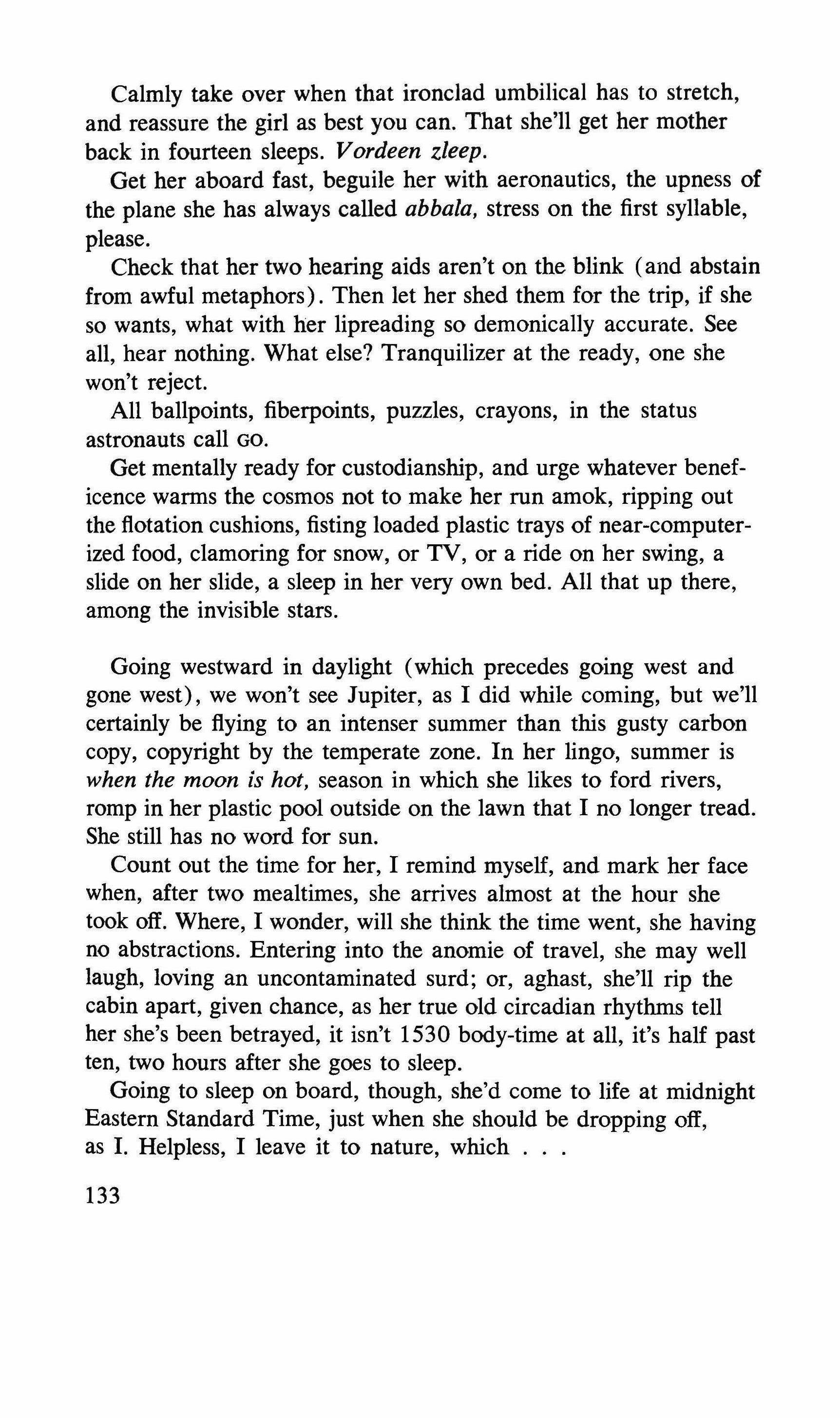
Calmly take over when that ironclad umbilical has to stretch, and reassure the girl as best you can. That she'll get her mother back in fourteen sleeps. Vordeen zleep,
Get her aboard fast, beguile her with aeronautics, the upness of the plane she has always called abbala, stress on the first syllable, please.
Check that her two hearing aids aren't on the blink (and abstain from awful metaphors). Then let her shed them for the trip, if she so wants, what with her lipreading so demonically accurate. See all, hear nothing. What else? Tranquilizer at the ready, one she won't reject.
All ballpoints, fiberpoints, puzzles, crayons, in the status astronauts call GO.
Get mentally ready for custodianship, and urge whatever beneficence warms the cosmos not to make her run amok, ripping out the flotation cushions, fisting loaded plastic trays of near-computerized food, clamoring for snow, or TV, or a ride on her swing, a slide on her slide, a sleep in her very own bed. All that up there, among the invisible stars.
Going westward in daylight (which precedes going west and gone west), we won't see Jupiter, as I did while coming, but we'll certainly be flying to an intenser summer than this gusty carbon copy, copyright by the temperate zone. In her lingo, summer is when the moon is hot, season in which she likes to ford rivers, romp in her plastic pool outside on the lawn that I no longer tread. She still has no word for sun.
Count out the time for her, I remind myself, and mark her face when, after two mealtimes, she arrives almost at the hour she took off. Where, I wonder, will she think the time went, she having no abstractions. Entering into the anomie of travel, she may well laugh, loving an uncontaminated surd; or, aghast, she'll rip the cabin apart, given chance, as her true old circadian rhythms tell her she's been betrayed, it isn't 1530 body-time at all, it's half past ten, two hours after she goes to sleep.
Going to sleep on board, though, she'd come to life at midnight Eastern Standard Time, just when she should be dropping off, as I. Helpless, I leave it to nature, which
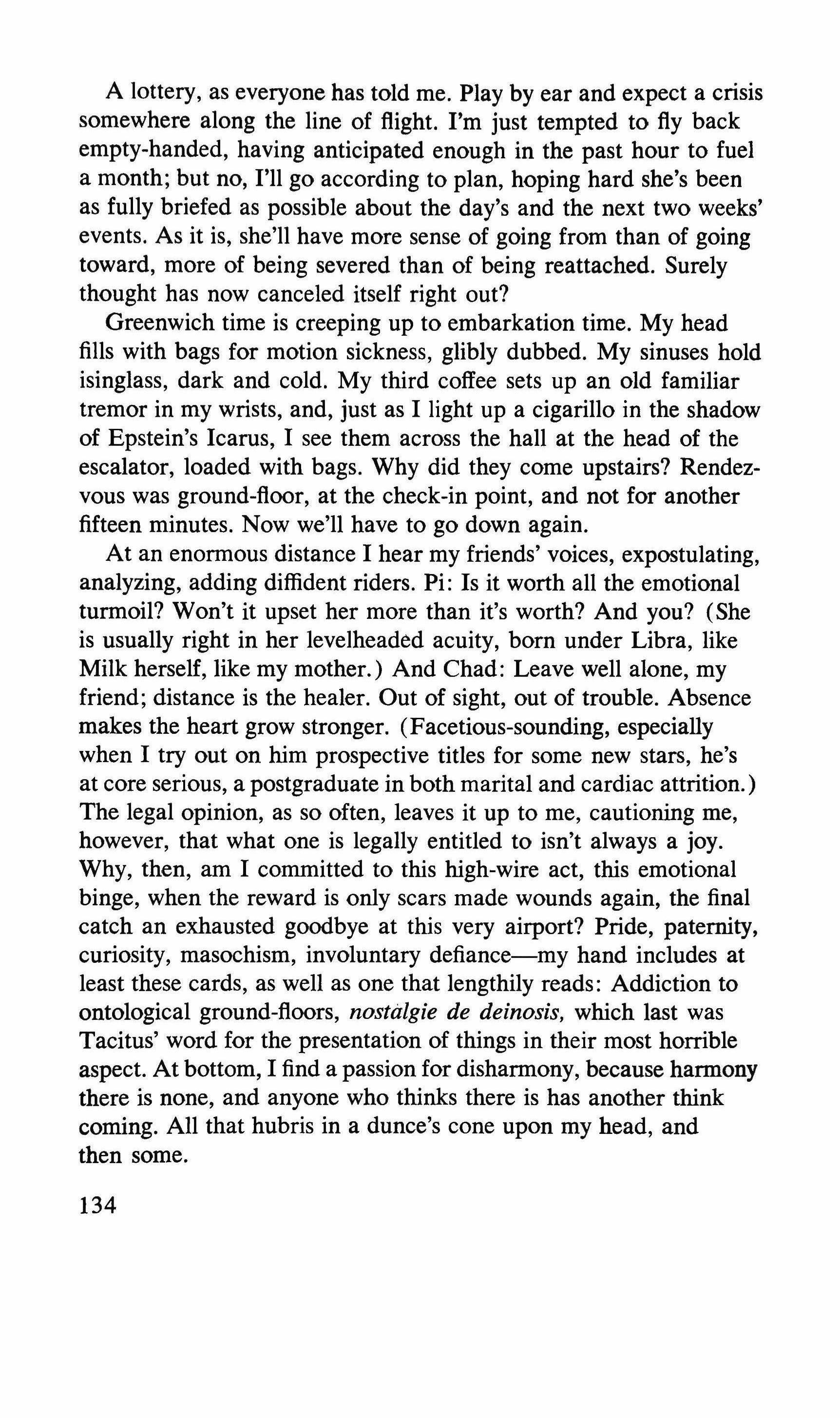
A lottery, as everyone has told me. Play by ear and expect a crisis somewhere along the line of flight. I'm just tempted to fly back empty-handed, having anticipated enough in the past hour to fuel a month; but no, I'll go according to plan, hoping hard she's been as fully briefed as possible about the day's and the next two weeks' events. As it is, she'll have more sense of going from than of going toward, more of being severed than of being reattached. Surely thought has now canceled itself right out?
Greenwich time is creeping up to embarkation time. My head fills with bags for motion sickness, glibly dubbed. My sinuses hold isinglass, dark and cold. My third coffee sets up an old familiar tremor in my wrists, and, just as I light up a cigarillo in the shadow of Epstein's Icarus, I see them across the hall at the head of the escalator, loaded with bags. Why did they come upstairs? Rendezvous was ground-floor, at the check-in point, and not for another fifteen minutes. Now we'll have to go down again.
At an enormous distance I hear my friends' voices, expostulating, analyzing, adding diffident riders. Pi: Is it worth all the emotional turmoil? Won't it upset her more than it's worth? And you? (She is usually right in her levelheaded acuity, born under Libra, like Milk herself, like my mother.) And Chad: Leave well alone, my friend; distance is the healer. Out of sight, out of trouble. Absence makes the heart grow stronger. (Facetious-sounding, especially when I try out on him prospective titles for some new stars, he's at core serious, a postgraduate in both marital and cardiac attrition.) The legal opinion, as so often, leaves it up to me, cautioning me, however, that what one is legally entitled to isn't always a joy. Why, then, am I committed to this high-wire act, this emotional binge, when the reward is only scars made wounds again, the final catch an exhausted goodbye at this very airport? Pride, paternity, curiosity, masochism, involuntary defiance-my hand includes at least these cards, as well as one that lengthily reads: Addiction to ontological ground-floors, nostalgie de deinosis, which last was Tacitus' word for the presentation of things in their most horrible aspect. At bottom, I find a passion for disharmony, because harmony there is none, and anyone who thinks there is has another think coming. All that hubris in a dunce's cone upon my head, and then some.
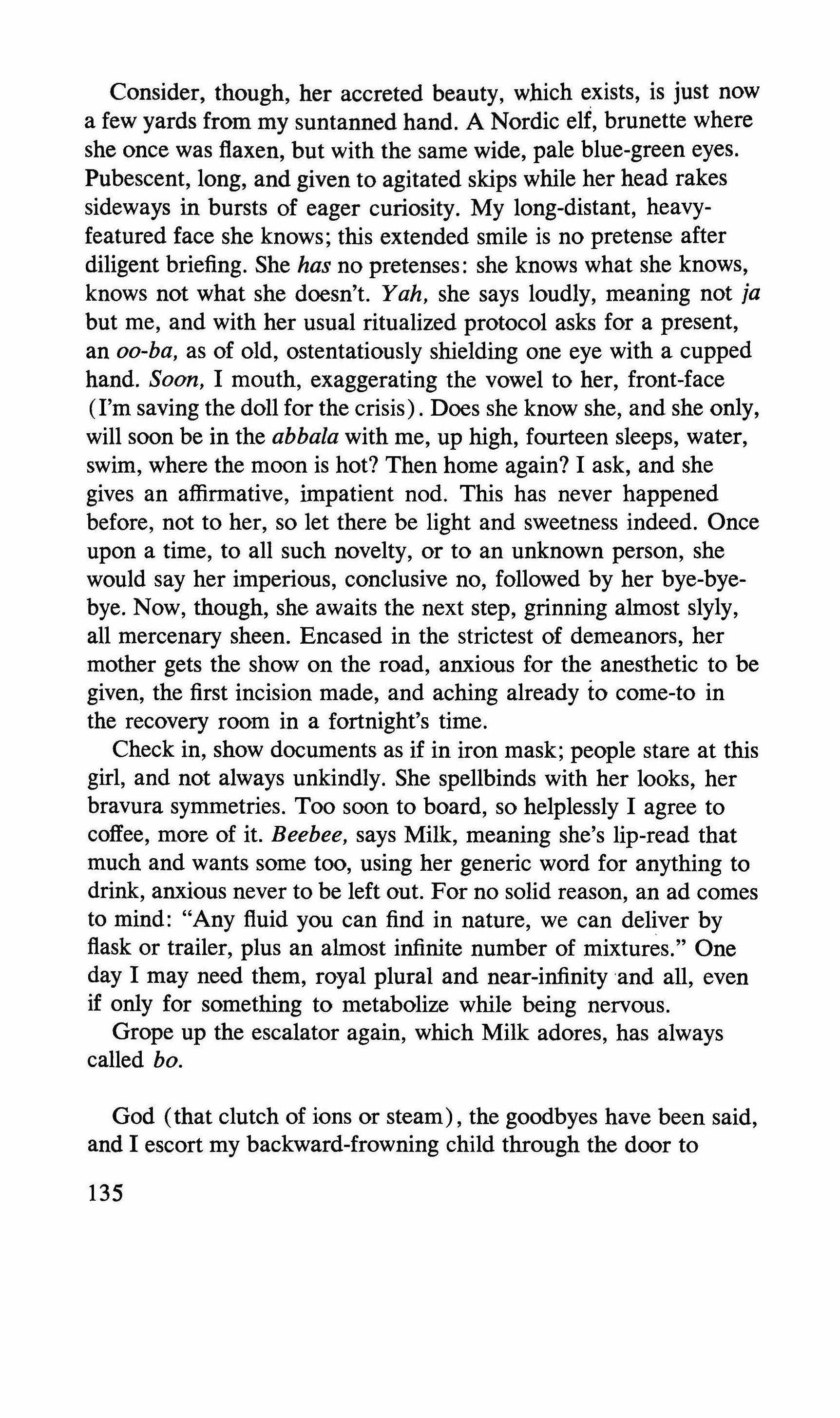
Consider, though, her accreted beauty, which exists, is just now a few yards from my suntanned hand. A Nordic elf, brunette where she once was flaxen, but with the same wide, pale blue-green eyes. Pubescent, long, and given to agitated skips while her head rakes sideways in bursts of eager curiosity. My long-distant, heavyfeatured face she knows; this extended smile is no pretense after diligent briefing. She has no pretenses: she knows what she knows, knows not what she doesn't. Yah, she says loudly, meaning not ja but me, and with her usual ritualized protocol asks for a present, an oo-ba, as of old, ostentatiously shielding one eye with a cupped hand. Soon, I mouth, exaggerating the vowel to her, front-face (I'm saving the doll for the crisis) Does she know she, and she only, will soon be in the abbala with me, up high, fourteen sleeps, water, swim, where the moon is hot? Then home again? I ask, and she gives an affirmative, impatient nod. This has never happened before, not to her, so let there be light and sweetness indeed. Once upon a time, to all such novelty, or to an unknown person, she would say her imperious, conclusive no, followed by her bye-byebye. Now, though, she awaits the next step, grinning almost slyly, all mercenary sheen. Encased in the strictest of demeanors, her mother gets the show on the road, anxious for the anesthetic to be given, the first incision made, and aching already to come-to in the recovery room in a fortnight's time.
Check in, show documents as if in iron mask; people stare at this girl, and not always unkindly. She spellbinds with her looks, her bravura symmetries. Too soon to board, so helplessly I agree to coffee, more of it. Beebee, says Milk, meaning she's lip-read that much and wants some too, using her generic word for anything to drink, anxious never to be left out. For no solid reason, an ad comes to mind: "Any fluid you can find in nature, we can deliver by flask or trailer, plus an almost infinite number of mixtures." One day I may need them, royal plural and near-infinity and all, even if only for something to metabolize while being nervous.
Grope up the escalator again, which Milk adores, has always called boo
God (that clutch of ions or steam), the goodbyes have been said, and I escort my backward-frowning child through the door to 135
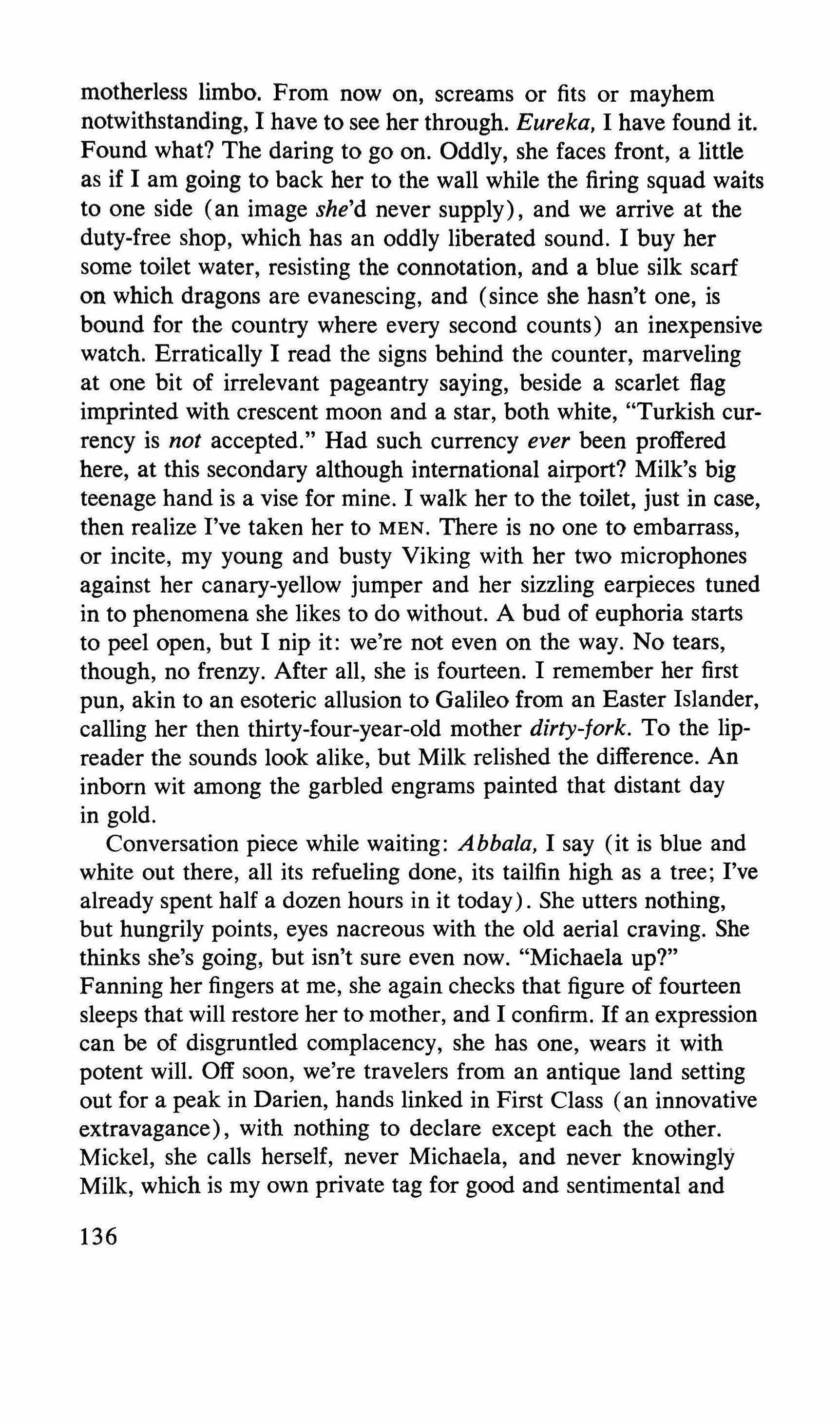
motherless limbo. From now on, screams or fits or mayhem notwithstanding, I have to see her through. Eureka, I have found it. Found what? The daring to go on. Oddly, she faces front, a little as if I am going to back her to the wall while the firing squad waits to one side (an image she'd never supply), and we arrive at the duty-free shop, which has an oddly liberated sound. I buy her some toilet water, resisting the connotation, and a blue silk scarf on which dragons are evanescing, and (since she hasn't one, is bound for the country where every second counts) an inexpensive watch. Erratically I read the signs behind the counter, marveling at one bit of irrelevant pageantry saying, beside a scarlet flag imprinted with crescent moon and a star, both white, "Turkish currency is not accepted." Had such currency ever been proffered here, at this secondary although international airport? Milk's big teenage hand is a vise for mine. I walk her to the toilet, just in case, then realize I've taken her to MEN. There is no one to embarrass, or incite, my young and busty Viking with her two microphones against her canary-yellow jumper and her sizzling earpieces tuned in to phenomena she likes to do without. A bud of euphoria starts to peel open, but I nip it: we're not even on the way. No tears, though, no frenzy. After all, she is fourteen. I remember her first pun, akin to an esoteric allusion to Galileo from an Easter Islander, calling her then thirty-four-year-old mother dirty-fork. To the lipreader the sounds look alike, but Milk relished the difference. An inborn wit among the garbled engrams painted that distant day in gold.
Conversation piece while waiting: Abbala, I say (it is blue and white out there, all its refueling done, its tailfin high as a tree; I've already spent half a dozen hours in it today). She utters nothing, but hungrily points, eyes nacreous with the old aerial craving. She thinks she's going, but isn't sure even now. "Michaela up?"
Fanning her fingers at me, she again checks that figure of fourteen sleeps that will restore her to mother, and I confirm. If an expression can be of disgruntled complacency, she has one, wears it with potent will. Off soon, we're travelers from an antique land setting out for a peak in Darien, hands linked in First Class (an innovative extravagance), with nothing to declare except each the other. Mickel, she calls herself, never Michaela, and never knowingly Milk, which is my own private tag for good and sentimental and 136
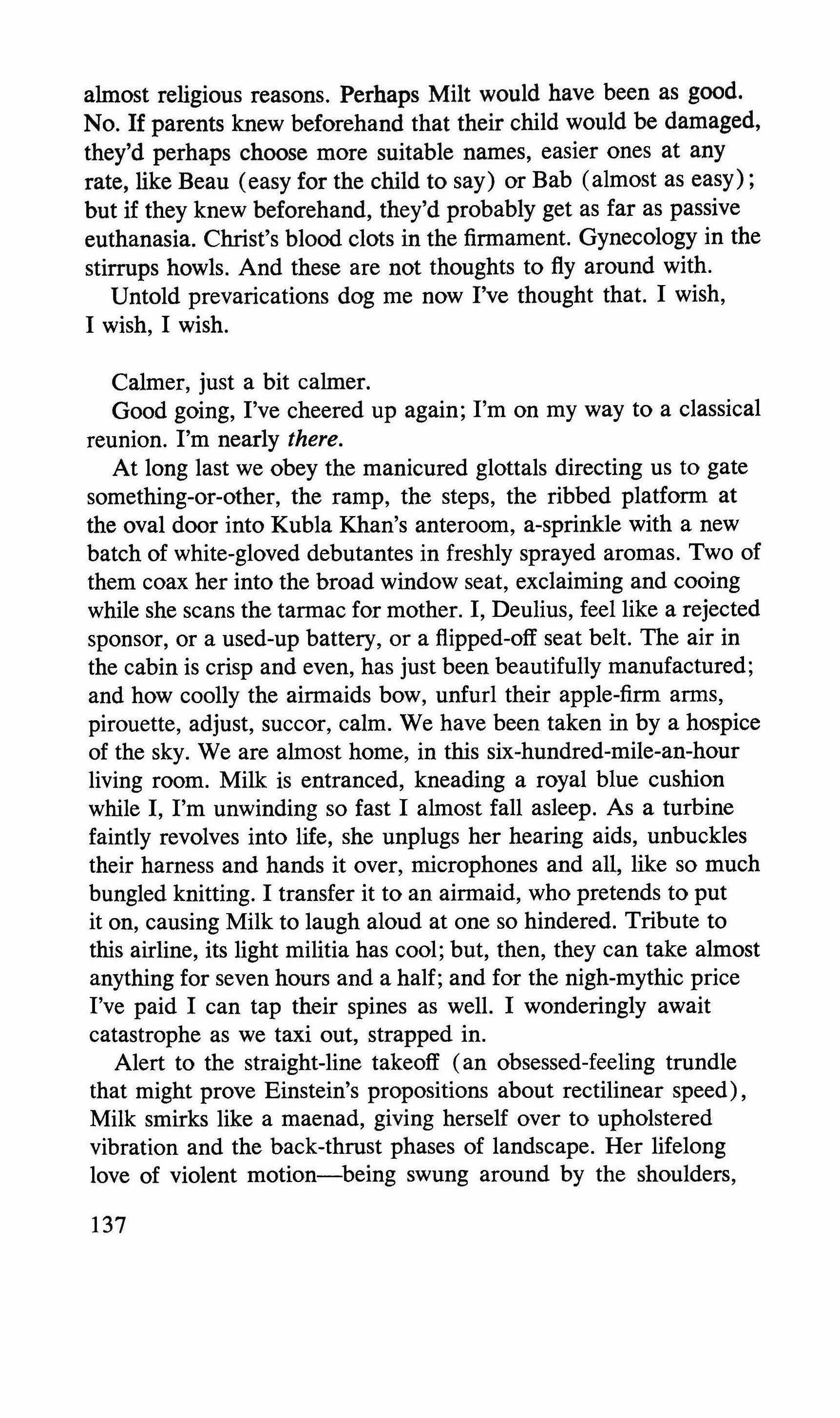
almost religious reasons. Perhaps Milt would have been as good. No. If parents knew beforehand that their child would be damaged, they'd perhaps choose more suitable names, easier ones at any rate, like Beau (easy for the child to say) or Bab (almost as easy); but if they knew beforehand, they'd probably get as far as passive euthanasia. Christ's blood clots in the firmament. Gynecology in the stirrups howls. And these are not thoughts to fly around with.
Untold prevarications dog me now I've thought that. I wish, I wish, I wish.
Calmer, just a bit calmer.
Good going, I've cheered up again; I'm on my way to a classical reunion. I'm nearly there.
At long last we obey the manicured glottals directing us to gate something-or-other, the ramp, the steps, the ribbed platform at the oval door into Kubla Khan's anteroom, a-sprinkle with a new batch of white-gloved debutantes in freshly sprayed aromas. Two of them coax her into the broad window seat, exclaiming and cooing while she scans the tarmac for mother. I, Deulius, feel like a rejected sponsor, or a used-up battery, or a flipped-off seat belt. The air in the cabin is crisp and even, has just been beautifully manufactured; and how coolly the airmaids bow, unfurl their apple-firm arms, pirouette, adjust, succor, calm. We have been taken in by a hospice of the sky. We are almost home, in this six-hundred-mile-an-hour living room. Milk is entranced, kneading a royal blue cushion while I, I'm unwinding so fast I almost fall asleep. As a turbine faintly revolves into life, she unplugs her hearing aids, unbuckles their harness and hands it over, microphones and all, like so much bungled knitting. I transfer it to an airmaid, who pretends to put it on, causing Milk to laugh aloud at one so hindered. Tribute to this airline, its light militia has cool; but, then, they can take almost anything for seven hours and a half; and for the nigh-mythic price I've paid I can tap their spines as well. I wonderingly await catastrophe as we taxi out, strapped in.
Alert to the straight-line takeoff (an obsessed-feeling trundle that might prove Einstein's propositions about rectilinear speed), Milk smirks like a maenad, giving herself over to upholstered vibration and the back-thrust phases of landscape. Her lifelong love of violent motion-being swung around by the shoulders, 137
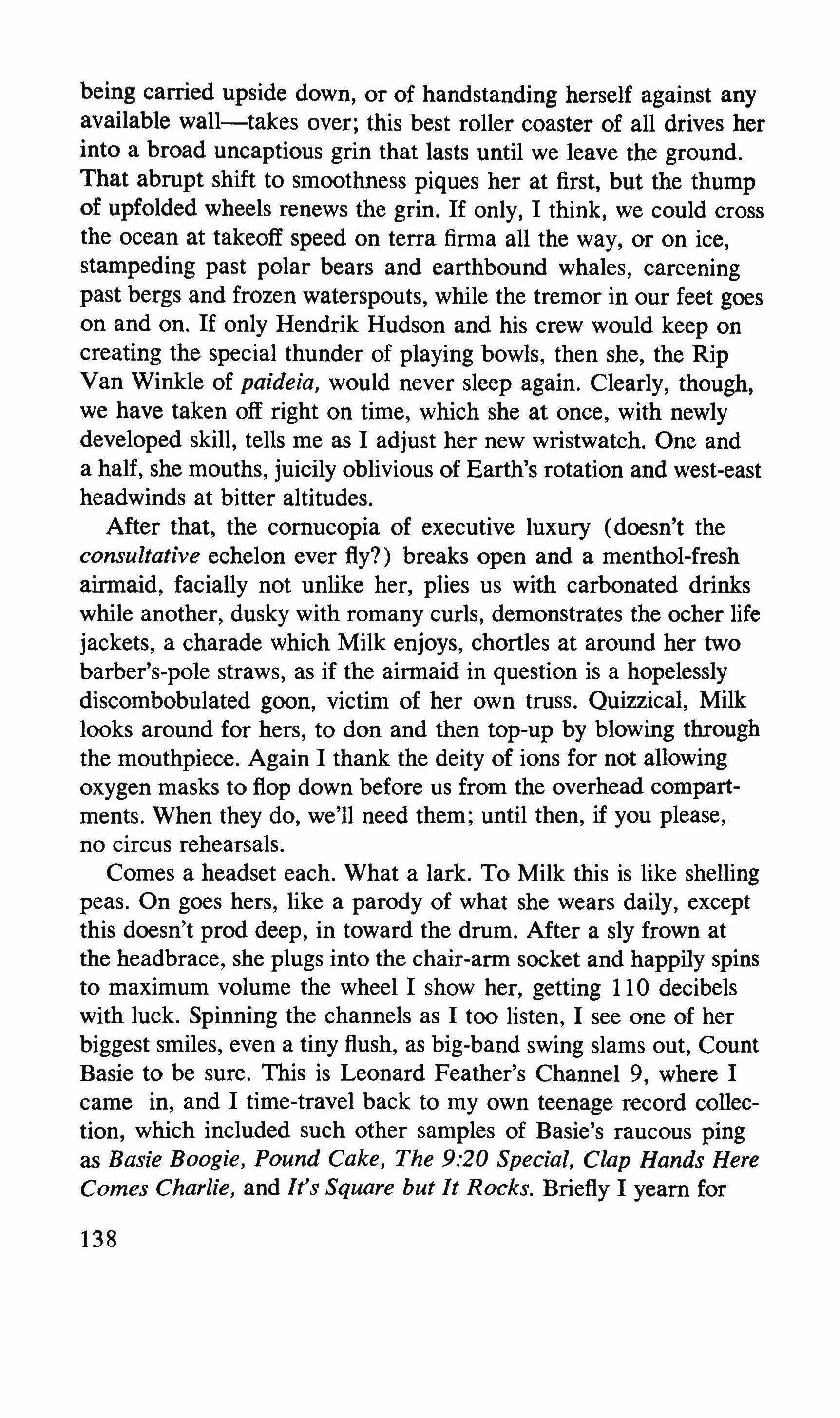
being carried upside down, or of handstanding herself against any available wall-takes over; this best roller coaster of all drives her into a broad uncaptious grin that lasts until we leave the ground. That abrupt shift to smoothness piques her at first, but the thump of upfolded wheels renews the grin. If only, I think, we could cross the ocean at takeoff speed on terra firma all the way, or on ice, stampeding past polar bears and earthbound whales, careening past bergs and frozen waterspouts, while the tremor in our feet goes on and on. If only Hendrik Hudson and his crew would keep on creating the special thunder of playing bowls, then she, the Rip Van Winkle of paideia, would never sleep again. Clearly, though, we have taken off right on time, which she at once, with newly developed skill, tells me as I adjust her new wristwatch. One and a half, she mouths, juicily oblivious of Earth's rotation and west-east headwinds at bitter altitudes.
After that, the cornucopia of executive luxury (doesn't the consultative echelon ever fly?) breaks open and a menthol-fresh airmaid, facially not unlike her, plies us with carbonated drinks while another, dusky with romany curls, demonstrates the ocher life jackets, a charade which Milk enjoys, chortles at around her two barber's-pole straws, as if the airmaid in question is a hopelessly discombobulated goon, victim of her own truss. Quizzical, Milk looks around for hers, to don and then top-up by blowing through the mouthpiece. Again I thank the deity of ions for not allowing oxygen masks to flop down before us from the overhead compartments. When they do, we'll need them; until then, if you please, no circus rehearsals.
Comes a headset each. What a lark. To Milk this is like shelling peas. On goes hers, like a parody of what she wears daily, except this doesn't prod deep, in toward the drum. After a sly frown at the headbrace, she plugs into the chair-arm socket and happily spins to maximum volume the wheel I show her, getting 110 decibels with luck. Spinning the channels as I too listen, I see one of her biggest smiles, even a tiny flush, as big-band swing slams out, Count Basie to be sure. This is Leonard Feather's Channel 9, where I came in, and I time-travel back to my own teenage record collection, which included such other samples of Basie's raucous ping as Basie Boogie, Pound Cake, The 9:20 Special, Clap Hands Here Comes Charlie, and It's Square but It Rocks. Briefly I yearn for
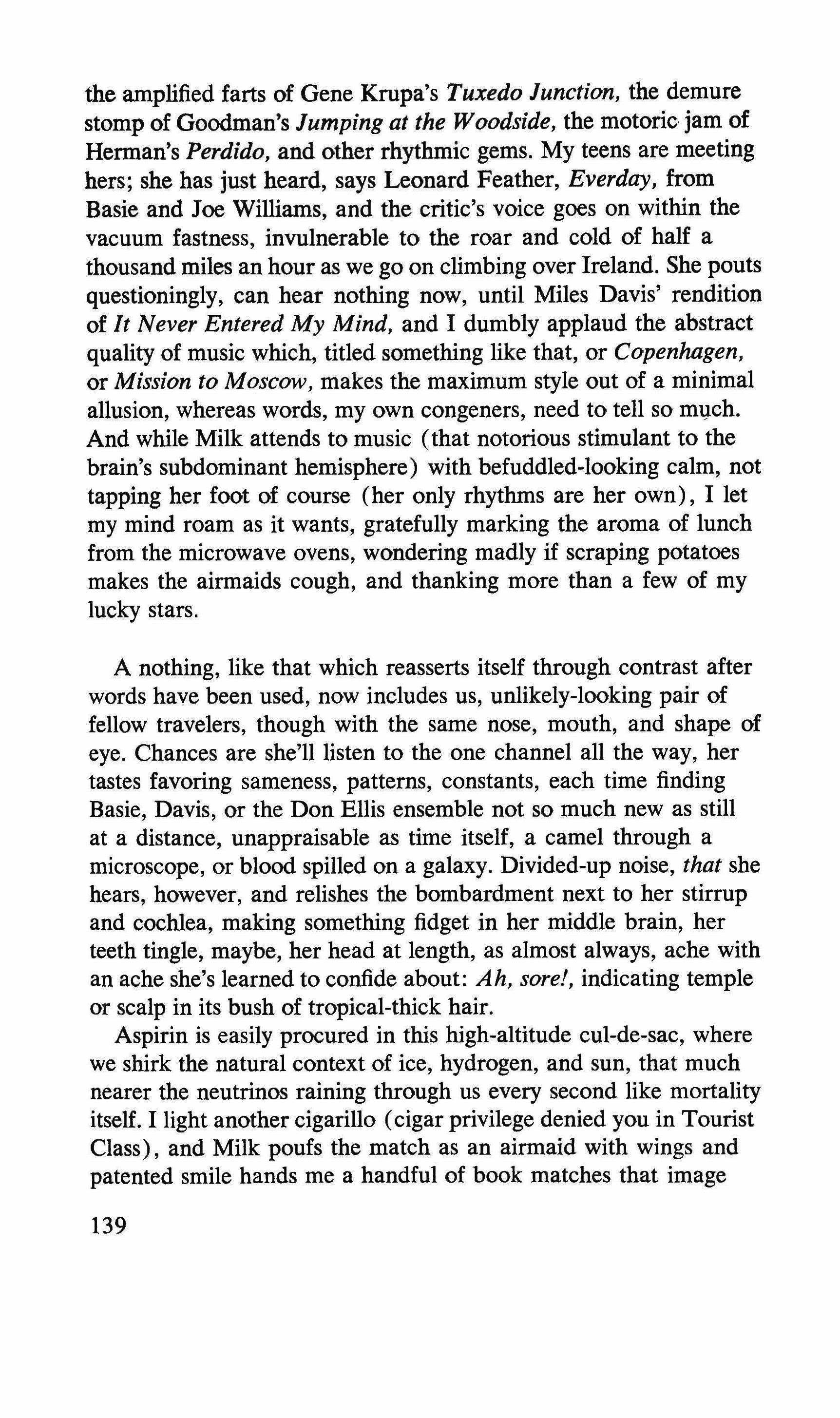
the amplified farts of Gene Krupa's Tuxedo Junction, the demure stomp of Goodman's Jumping at the Woodside, the motoric jam of Herman's Perdido, and other rhythmic gems. My teens are meeting hers; she has just heard, says Leonard Feather, Everday, from Basie and Joe Williams, and the critic's voice goes on within the vacuum fastness, invulnerable to the roar and cold of half a thousand miles an hour as we go on climbing over Ireland. She pouts questioningly, can hear nothing now, until Miles Davis' rendition of It Never Entered My Mind, and I dumbly applaud the abstract quality of music which, titled something like that, or Copenhagen, or Mission to Moscow, makes the maximum style out of a minimal allusion, whereas words, my own congeners, need to tell so much, And while Milk attends to music (that notorious stimulant to the brain's subdominant hemisphere) with befuddled-looking calm, not tapping her foot of course (her only rhythms are her own), I let my mind roam as it wants, gratefully marking the aroma of lunch from the microwave ovens, wondering madly if scraping potatoes makes the airmaids cough, and thanking more than a few of my lucky stars.
A nothing, like that which reasserts itself through contrast after words have been used, now includes us, unlikely-looking pair of fellow travelers, though with the same nose, mouth, and shape of eye. Chances are she'll listen to the one channel all the way, her tastes favoring sameness, patterns, constants, each time finding Basie, Davis, or the Don Ellis ensemble not so much new as still at a distance, unappraisable as time itself, a camel through a microscope, or blood spilled on a galaxy. Divided-up noise, that she hears, however, and relishes the bombardment next to her stirrup and cochlea, making something fidget in her middle brain, her teeth tingle, maybe, her head at length, as almost always, ache with an ache she's learned to confide about: Ah, sore!, indicating temple or scalp in its bush of tropical-thick hair.
Aspirin is easily procured in this high-altitude cul-de-sac, where we shirk the natural context of ice, hydrogen, and sun, that much nearer the neutrinos raining through us every second like mortality itself. I light another cigarillo (cigar privilege denied you in Tourist Class), and Milk poufs the match as an airmaid with wings and patented smile hands me a handful of book matches that image
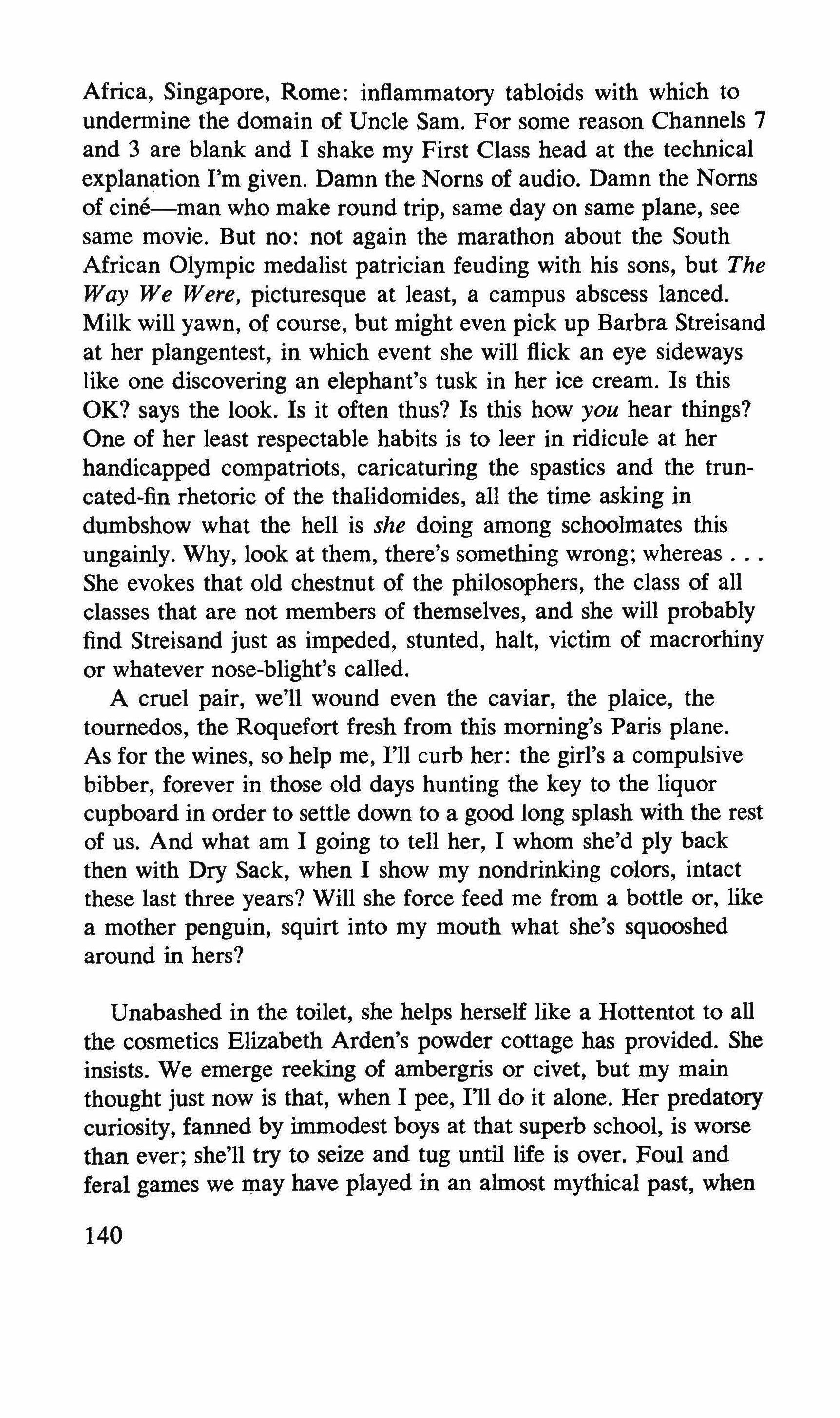
Africa, Singapore, Rome: inflammatory tabloids with which to undermine the domain of Uncle Sam. For some reason Channels 7 and 3 are blank and I shake my First Class head at the technical explanation I'm given. Damn the Norns of audio. Damn the Noms of cine-man who make round trip, same day on same plane, see same movie. But no: not again the marathon about the South African Olympic medalist patrician feuding with his sons, but The Way We Were, picturesque at least, a campus abscess lanced. Milk will yawn, of course, but might even pick up Barbra Streisand at her plangentest, in which event she will flick an eye sideways like one discovering an elephant's tusk in her ice cream. Is this OK? says the look. Is it often thus? Is this how you hear things? One of her least respectable habits is to leer in ridicule at her handicapped compatriots, caricaturing the spastics and the truncated-fin rhetoric of the thalidomides, all the time asking in dumbshow what the hell is she doing among schoolmates this ungainly. Why, look at them, there's something wrong; whereas She evokes that old chestnut of the philosophers, the class of all classes that are not members of themselves, and she will probably find Streisand just as impeded, stunted, halt, victim of macrorhiny or whatever nose-blight's called.
A cruel pair, we'll wound even the caviar, the plaice, the tournedos, the Roquefort fresh from this morning's Paris plane. As for the wines, so help me, I'll curb her: the girl's a compulsive bibber, forever in those old days hunting the key to the liquor cupboard in order to settle down to a good long splash with the rest of us. And what am I going to tell her, I whom she'd ply back then with Dry Sack, when I show my nondrinking colors, intact these last three years? Will she force feed me from a bottle or, like a mother penguin, squirt into my mouth what she's squooshed around in hers?
Unabashed in the toilet, she helps herself like a Hottentot to all the cosmetics Elizabeth Arden's powder cottage has provided. She insists. We emerge reeking of ambergris or civet, but my main thought just now is that, when I pee, I'll do it alone. Her predatory curiosity, fanned by immodest boys at that superb school, is worse than ever; she'll try to seize and tug until life is over. Foul and feral games we may have played in an almost mythical past, when 140
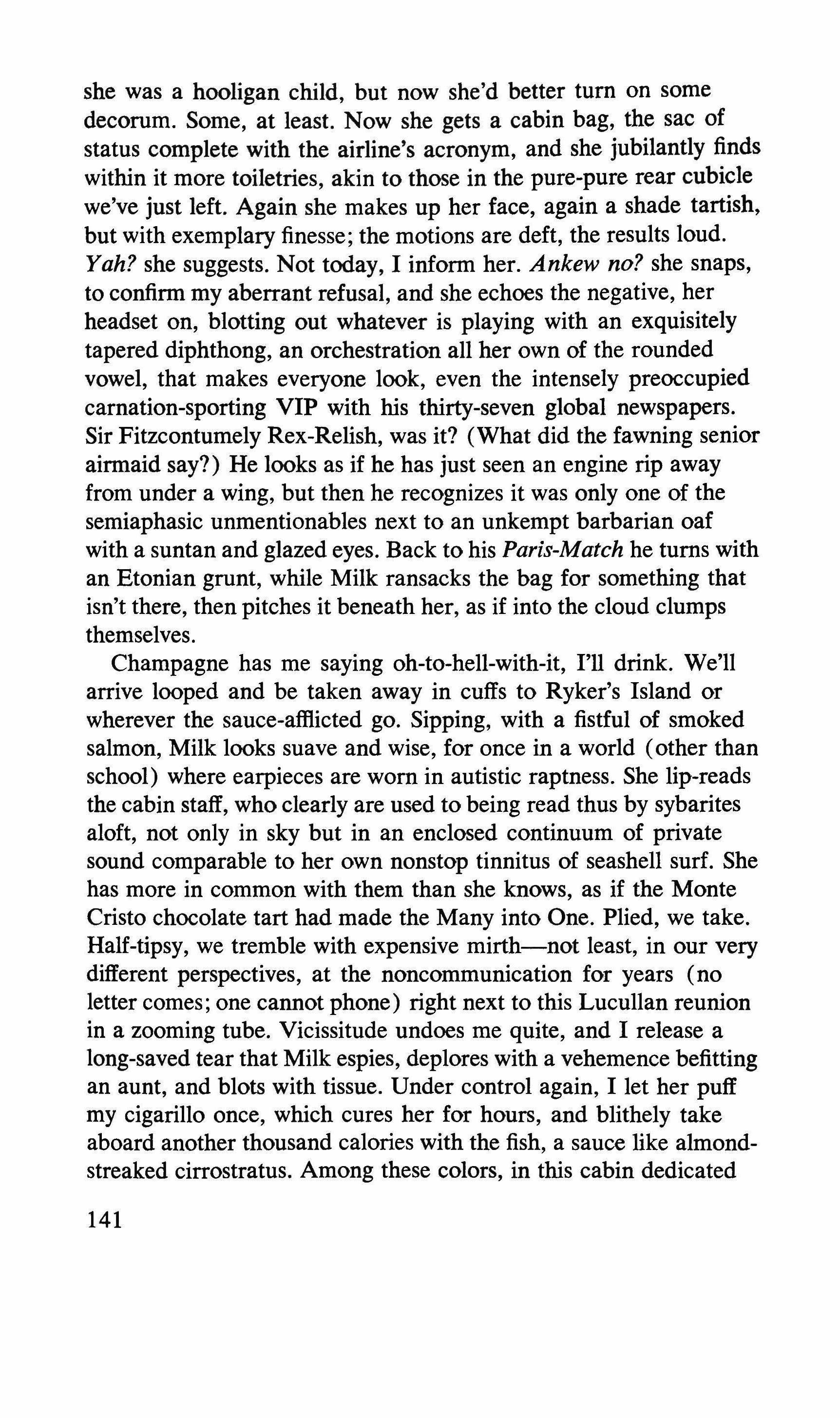
she was a hooligan child, but now she'd better turn on some decorum. Some, at least. Now she gets a cabin bag, the sac of status complete with the airline's acronym, and she jubilantly finds within it more toiletries, akin to those in the pure-pure rear cubicle we've just left. Again she makes up her face, again a shade tartish, but with exemplary finesse; the motions are deft, the results loud. Yah? she suggests. Not today, I inform her. Ankew no? she snaps, to confirm my aberrant refusal, and she echoes the negative, her headset on, blotting out whatever is playing with an exquisitely tapered diphthong, an orchestration all her own of the rounded vowel, that makes everyone look, even the intensely preoccupied carnation-sporting VIP with his thirty-seven global newspapers. Sir Fitzcontumely Rex-Relish, was it? (What did the fawning senior airmaid say?) He looks as if he has just seen an engine rip away from under a wing, but then he recognizes it was only one of the semiaphasic unmentionables next to an unkempt barbarian oaf with a suntan and glazed eyes. Back to his Paris-Match he turns with an Etonian grunt, while Milk ransacks the bag for something that isn't there, then pitches it beneath her, as if into the cloud clumps themselves.
Champagne has me saying oh-to-hell-with-it, I'll drink. We'll arrive looped and be taken away in cuffs to Ryker's Island or wherever the sauce-afflicted go. Sipping, with a fistful of smoked salmon, Milk looks suave and wise, for once in a world (other than school) where earpieces are worn in autistic raptness. She lip-reads the cabin staff, who clearly are used to being read thus by sybarites aloft, not only in sky but in an enclosed continuum of private sound comparable to her own nonstop tinnitus of seashell surf. She has more in common with them than she knows, as if the Monte Cristo chocolate tart had made the Many into One. Plied, we take. Half-tipsy, we tremble with expensive mirth-not least, in our very different perspectives, at the noncommunication for years (no letter comes; one cannot phone) right next to this Lucullan reunion in a zooming tube. Vicissitude undoes me quite, and I release a long-saved tear that Milk espies, deplores with a vehemence befitting an aunt, and blots with tissue. Under control again, I let her puff my cigarillo once, which cures her for hours, and blithely take aboard another thousand calories with the fish, a sauce like almondstreaked cirrostratus. Among these colors, in this cabin dedicated

to Joseph's coat, the gray line is the present (as it said under some cosmogonical diagram I somewhere saw), and the present is at the moment hard to see. Refraction through a small tear. We're living in animated suspension in a churn of cream embedded in royalblue velvet, and I half-ban the future, near and distant: if this be altitude euphoria, let it never end. All I'll ask is a little sleep, like Milk, who's succumbed to Mumm's, alcoholic strength by volume 12 percent. Good night, imminent lady, you've almost gone a thousand miles, with only headwinds retarding us.
Much honorable sleeplessness has gone into whatever thoughts I have on all of this, forever envisioning myself next to Milk, whom the universe bungled into an unselfconscious oddity, and wondering how much accommodation a mind can make. For instance, saying: she belongs more to the universe than to me, has more in common with the hydrogen flowing back from the Clouds of Magellan to the Milky Way than with me, for all my own bizarre metabolism. For instance, saying: there are miracle cures, or even miracles, but these will take a half-century to come, and I contrast her fate with that of the latest maltreated famous Russian, his balalaika on fire, asking myself what is remediable faster en bloc, brain damage or totalitarianism. The former, I imagine, because the second isn't remediable at all: the brain damaged are retarded, the commissars are not. One day we shall all grow up, when the hippie and the reptilian brains have withered away, then solve everything with nothing but the fairly recent neocortex. I can't finish the thought. Nothing, I begin dimly to see, corresponds to my not knowing what part of nature to blame for making her the way she is, or just recognizing one can't bring a case for damages against the internal compulsions of the DNA chain. Paired base and triple coding: what kind of a scapegoat's that?
Canted sideways, her broad but fragile-skinned face has the flush of winy slumber. I guess at dreams I'll never hear about: a candystripe avalanche or obsidian blank. And it becomes easier to possess her mind on her own behalf, in default of discursive conversations, than to stomach just the minimum she cerebrates. Hence, then, galas that implode: silver charms (Lisbon Fado Singer, Atlanta Cotton Bale), the penny gumball machine that doubles as a lamp with bright-checked gingham shade, the kaleido-go-round clock of 142
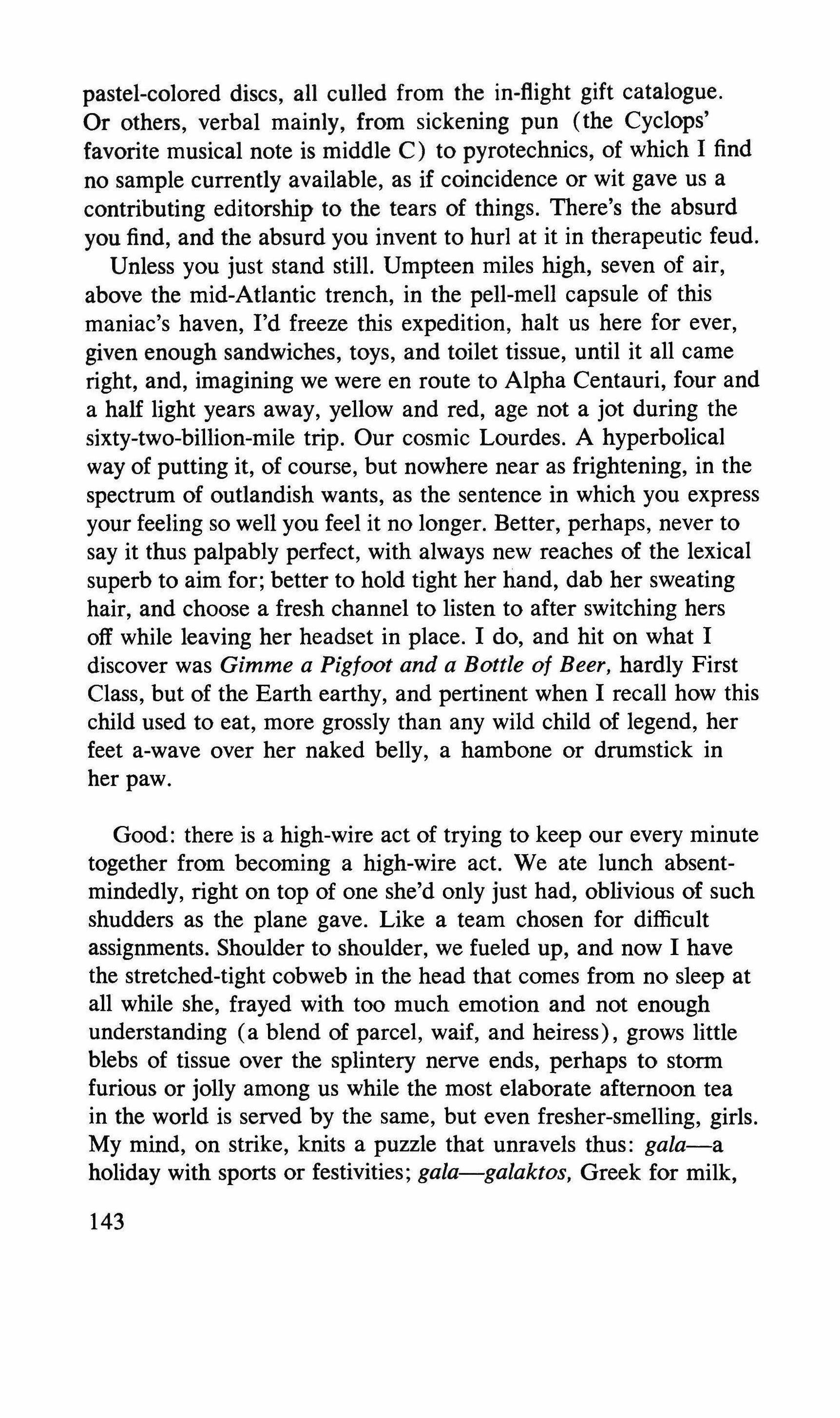
pastel-colored discs, all culled from the in-flight gift catalogue. Or others, verbal mainly, from sickening pun (the Cyclops' favorite musical note is middle C) to pyrotechnics, of which I find no sample currently available, as if coincidence or wit gave us a contributing editorship to the tears of things. There's the absurd you find, and the absurd you invent to hurl at it in therapeutic feud. Unless you just stand still. Umpteen miles high, seven of air, above the mid-Atlantic trench, in the pell-mell capsule of this maniac's haven, I'd freeze this expedition, halt us here for ever, given enough sandwiches, toys, and toilet tissue, until it all came right, and, imagining we were en route to Alpha Centauri, four and a half light years away, yellow and red, age not a jot during the sixty-two-billion-mile trip. Our cosmic Lourdes. A hyperbolical way of putting it, of course, but nowhere near as frightening, in the spectrum of outlandish wants, as the sentence in which you express your feeling so well you feel it no longer. Better, perhaps, never to say it thus palpably perfect, with always new reaches of the lexical superb to aim for; better to hold tight her hand, dab her sweating hair, and choose a fresh channel to listen to after switching hers off while leaving her headset in place. I do, and hit on what I discover was Gimme a Pigjoot and a Bottle of Beer, hardly First Class, but of the Earth earthy, and pertinent when I recall how this child used to eat, more grossly than any wild child of legend, her feet a-wave over her naked belly, a hambone or drumstick in her paw.
Good: there is a high-wire act of trying to keep our every minute together from becoming a high-wire act. We ate lunch absentmindedly, right on top of one she'd only just had, oblivious of such shudders as the plane gave. Like a team chosen for difficult assignments. Shoulder to shoulder, we fueled up, and now I have the stretched-tight cobweb in the head that comes from no sleep at all while she, frayed with too much emotion and not enough understanding (a blend of parcel, waif, and heiress), grows little blebs of tissue over the splintery nerve ends, perhaps to storm furious or jolly among us while the most elaborate afternoon tea in the world is served by the same, but even fresher-smelling, girls. My mind, on strike, knits a puzzle that unravels thus: gala-a holiday with sports or festivities; gala-galaktos, Greek for milk, 143

hence galaktikos, whence galaxy; Galatea?-statue whom or which Pygmalion brought to life. Am I engaged in some unwitting triple play that converts bringing this girl to life into a galactic holiday? Taking my own hints like one obsessed? Perhaps not, but that is much how it would feel. In a blue reefer, she. Jaw, chalcedony-cool. A fleck of mustard at her mouth corner. Book open on her knees. Albatrosses flying through the cabin. Heavy squawks. Followed by a glazier, bearing a sheet of glass five feet square. Now she reads out, not end-stopping the lines, Shelley's Ozymandias: "I met a traveller from an antique land / Who said: 'Two vast and trunkless legs of stone / Stand in the desert. .''' Then says, "A bit grandiose, isn't it? The poem that poetry-haters love." Thus the dream within the dream.
Undying afternoon light over mid-Atlantic is the slaty blue of the Siberian cat, or the blue-bonnet salmon in its first few months. Reflying back into morning (an abstract one to be sure), we're only just a bit more ourselves than we aren't. A flat-out Vikingess tests the webbing of her safety belt, flicks an athlete's shoulder as she moves against the buckle, blinks, blinks, blinks. My headache's gone.
Unnumbered minutes later, the wheels go thump in the day above the Eastern seaboard. I haven't even bothered to crane out over Labrador or the Hudson Valley. A refreshed but bewilderingly peaceful Milk has stuffed herself with tea and buttered scones, fruit cake and Danish pastries. We have accomplished our toilet together without mishap or insult, lurching and laughing. She has proudly unearthed her supply of sanitary napkins right there in the cabin, setting one muslin-wrappered wad alongside an outsize eclair. I have taught her how to play ticktacktoe and, in trying on the quiet to lose, have mostly won. Stomach-twisting anticlimax sets in as we lose height, until I think: this is where the trouble starts, pax's tail in uproar's mouth, but all she does, for now, is beam condescendingly at the drab, hot terra cotta as it soars out of storage. Our cards and customs forms are ready for the groinchgroinch of the inspectors' stamps. Her hearing aids she's rejected, maybe anxious to make an unencumbered entrance into the New World. I feel as if, all night, I've been squinting into my telescope, foolishly neglecting to use both eyes and staring, as one should not, into the moon at full. I'm amazed; she's not. We're there. We're here. The one country has become the other. All is ground.
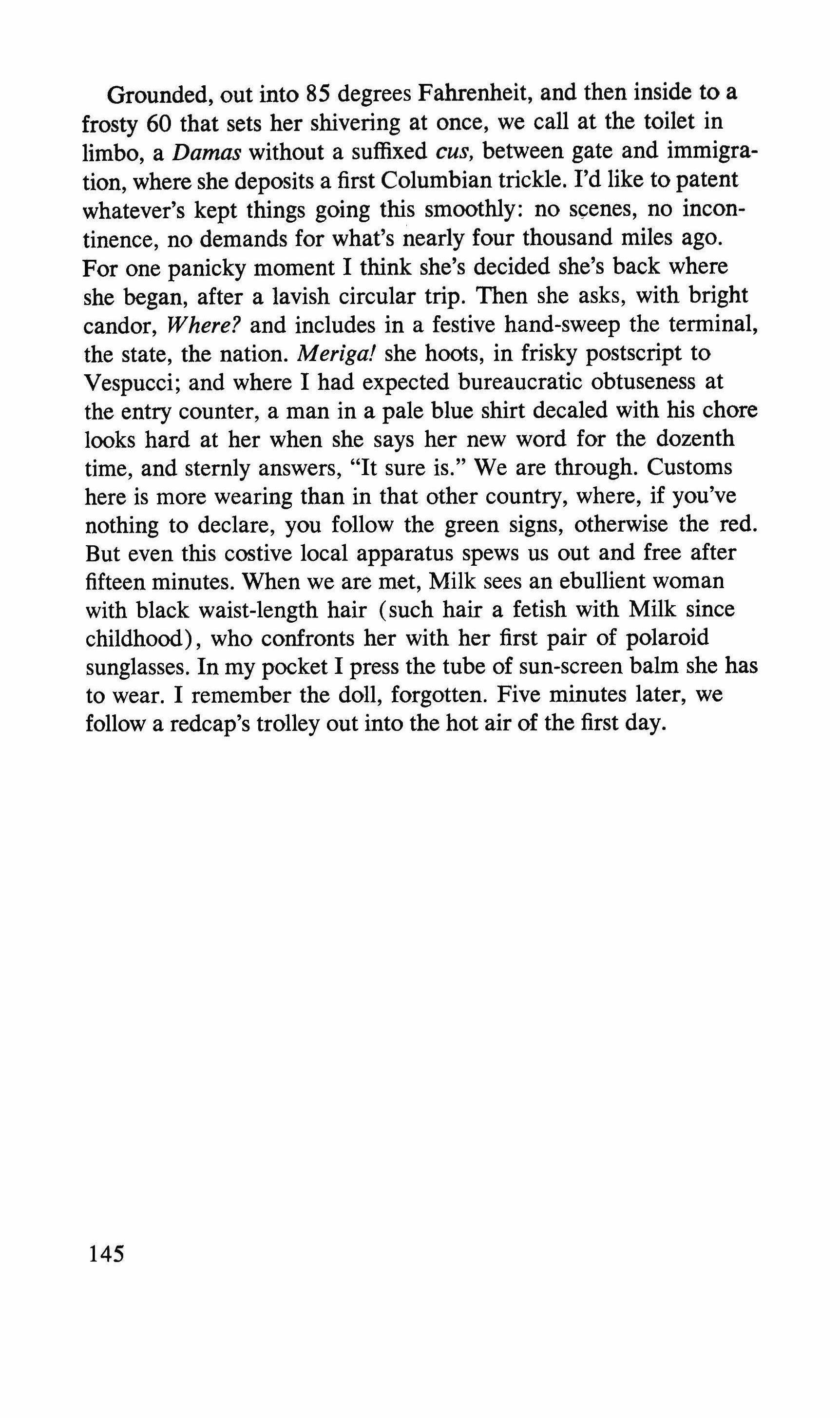
Grounded, out into 85 degrees Fahrenheit, and then inside to a frosty 60 that sets her shivering at once, we call at the toilet in limbo, a Damas without a suffixed cus, between gate and immigration, where she deposits a first Columbian trickle. I'd like to patent whatever's kept things going this smoothly: no scenes, no incontinence, no demands for what's nearly four thousand miles ago. For one panicky moment I think she's decided she's back where she began, after a lavish circular trip. Then she asks, with bright candor, Where? and includes in a festive hand-sweep the terminal, the state, the nation. Meriga! she hoots, in frisky postscript to Vespucci; and where I had expected bureaucratic obtuseness at the entry counter, a man in a pale blue shirt decaled with his chore looks hard at her when she says her new word for the dozenth time, and sternly answers, "It sure is." We are through. Customs here is more wearing than in that other country, where, if you've nothing to declare, you follow the green signs, otherwise the red. But even this costive local apparatus spews us out and free after fifteen minutes. When we are met, Milk sees an ebullient woman with black waist-length hair (such hair a fetish with Milk since childhood), who confronts her with her first pair of polaroid sunglasses. In my pocket I press the tube of sun-screen balm she has to wear. I remember the doll, forgotten. Five minutes later, we follow a redcap's trolley out into the hot air of the first day.
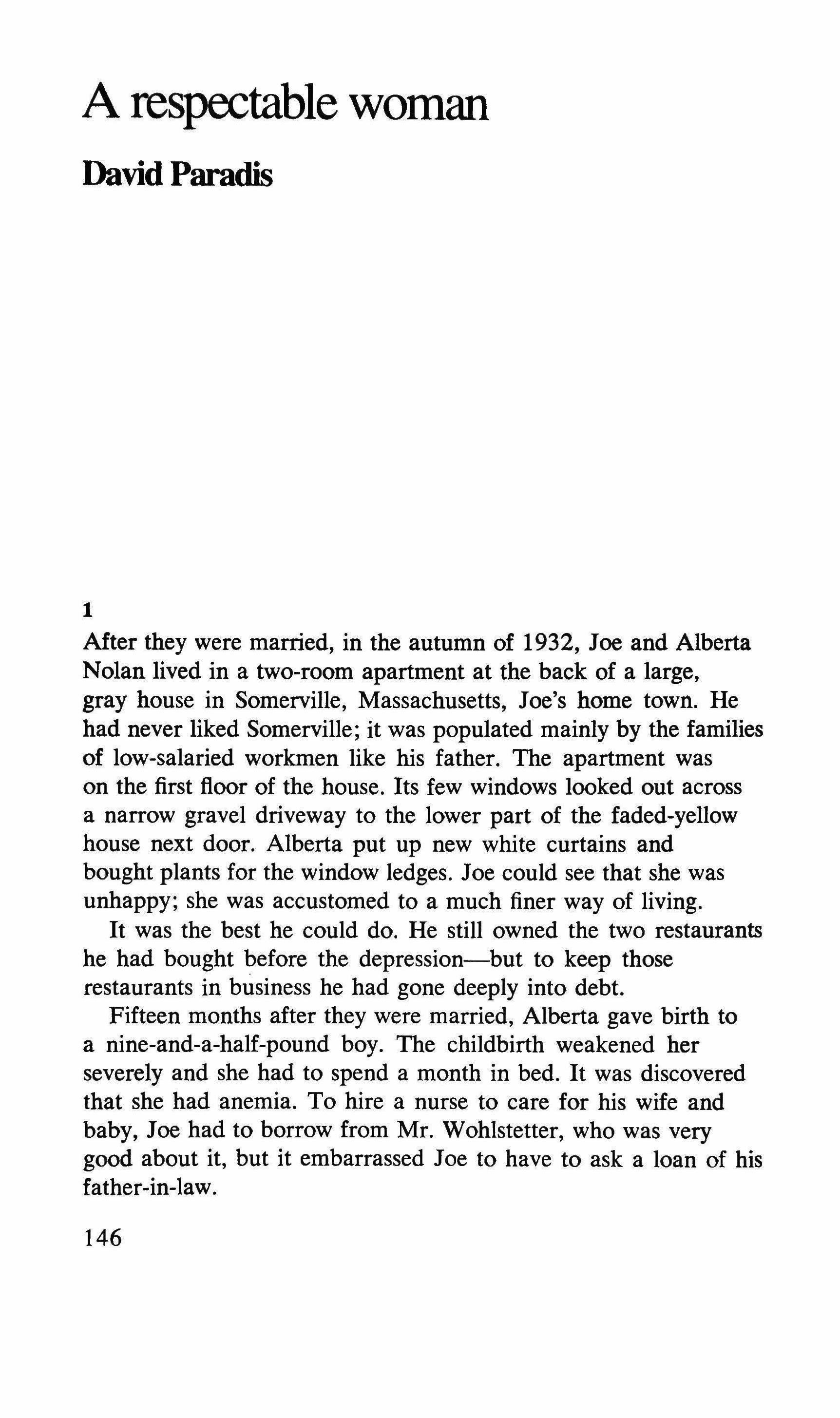
1
After they were married, in the autumn of 1932, Joe and Alberta Nolan lived in a two-room apartment at the back of a large, gray house in Somerville, Massachusetts, Joe's home town. He had never liked Somerville; it was populated mainly by the families of low-salaried workmen like his father. The apartment was on the first floor of the house. Its few windows looked out across a narrow gravel driveway to the lower part of the faded-yellow house next door. Alberta put up new white curtains and bought plants for the window ledges. Joe could see that she was unhappy; she was accustomed to a much finer way of living. It was the best he could do. He still owned the two restaurants he had bought before the depression-but to keep those restaurants in business he had gone deeply into debt.
Fifteen months after they were married, Alberta gave birth to a nine-and-a-half-pound boy. The childbirth weakened her severely and she had to spend a month in bed. It was discovered that she had anemia. To hire a nurse to care for his wife and baby, Joe had to borrow from Mr. Wohlstetter, who was very good about it, but it embarrassed Joe to have to ask a loan of his father-in-law. 146
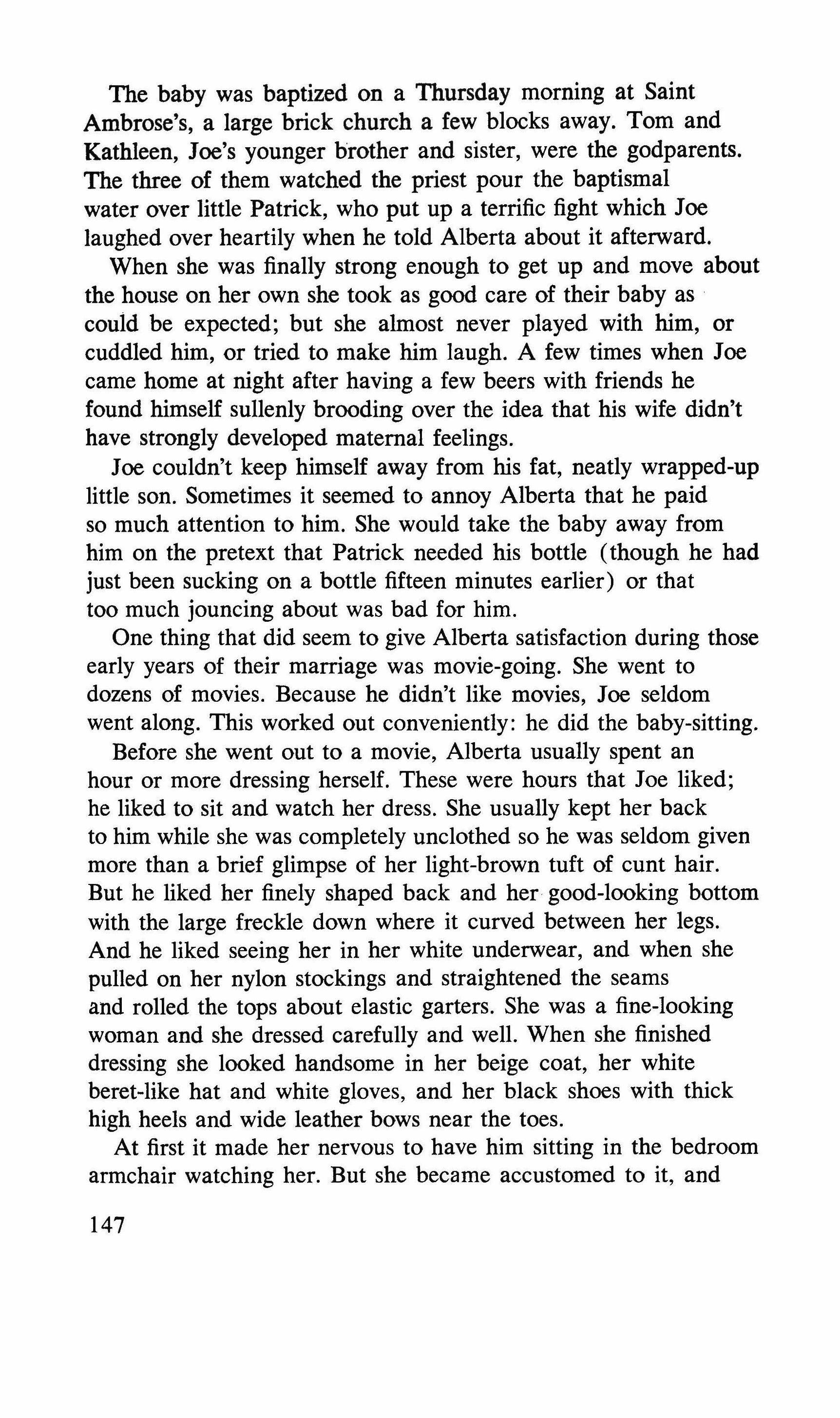
The baby was baptized on a Thursday morning at Saint Ambrose's, a large brick church a few blocks away. Tom and Kathleen, Joe's younger brother and sister, were the godparents. The three of them watched the priest pour the baptismal water over little Patrick, who put up a terrific fight which Joe laughed over heartily when he told Alberta about it afterward.
When she was finally strong enough to get up and move about the house on her own she took as good care of their baby as could be expected; but she almost never played with him, or cuddled him, or tried to make him laugh. A few times when Joe came home at night after having a few beers with friends he found himself sullenly brooding over the idea that his wife didn't have strongly developed maternal feelings.
Joe couldn't keep himself away from his fat, neatly wrapped-up little son. Sometimes it seemed to annoy Alberta that he paid so much attention to him. She would take the baby away from him on the pretext that Patrick needed his bottle (though he had just been sucking on a bottle fifteen minutes earlier) or that too much jouncing about was bad for him.
One thing that did seem to give Alberta satisfaction during those early years of their marriage was movie-going. She went to dozens of movies. Because he didn't like movies, Joe seldom went along. This worked out conveniently: he did the baby-sitting. Before she went out to a movie, Alberta usually spent an hour or more dressing herself. These were hours that Joe liked; he liked to sit and watch her dress. She usually kept her back to him while she was completely unclothed so he was seldom given more than a brief glimpse of her light-brown tuft of cunt hair. But he liked her finely shaped back and her good-looking bottom with the large freckle down where it curved between her legs. And he liked seeing her in her white underwear, and when she pulled on her nylon stockings and straightened the seams and rolled the tops about elastic garters. She was a fine-looking woman and she dressed carefully and well. When she finished dressing she looked handsome in her beige coat, her white beret-like hat and white gloves, and her black shoes with thick high heels and wide leather bows near the toes.
At first it made her nervous to have him sitting in the bedroom armchair watching her. But she became accustomed to it, and 147
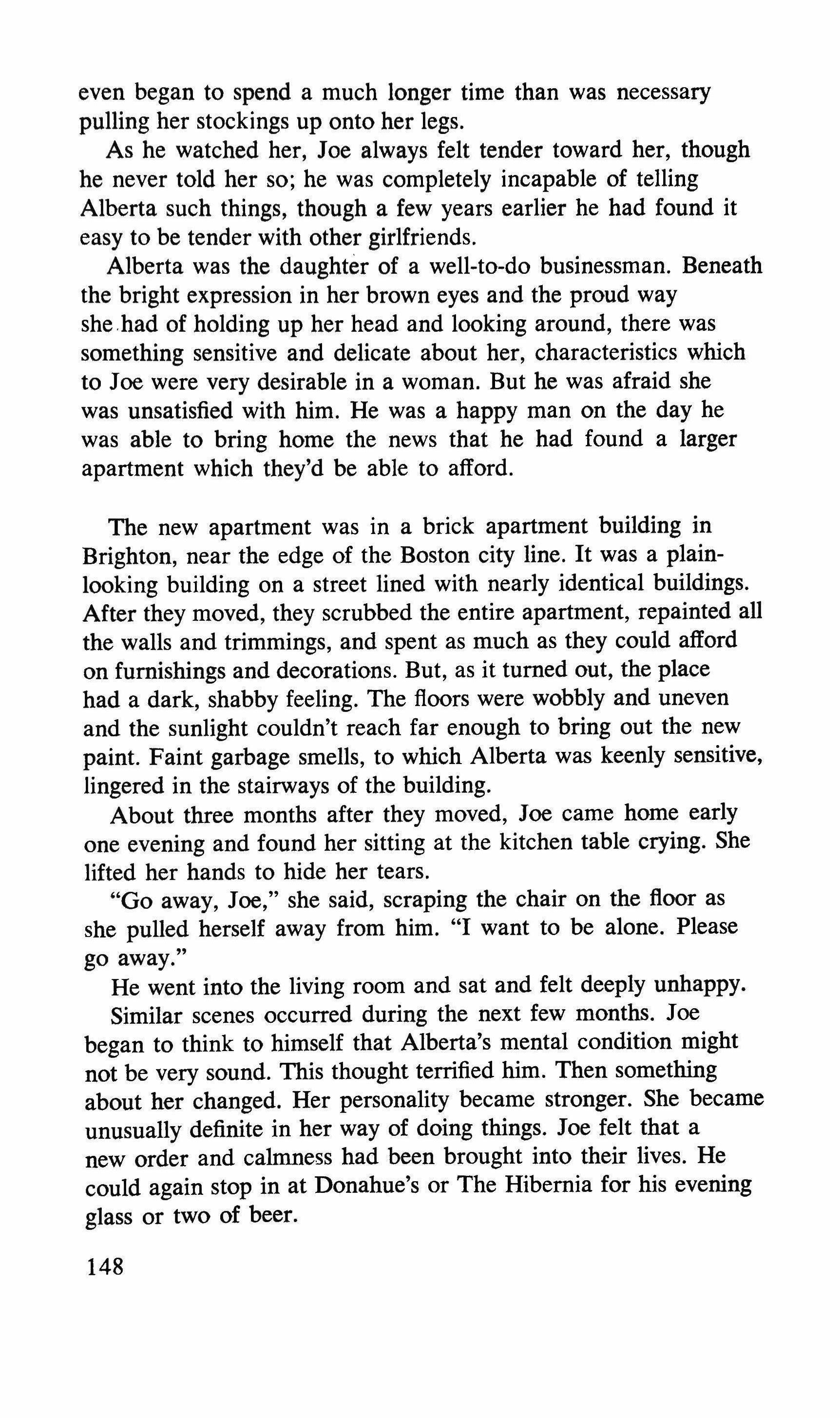
even began to spend a much longer time than was necessary pulling her stockings up onto her legs.
As he watched her, Joe always felt tender toward her, though he never told her so; he was completely incapable of telling Alberta such things, though a few years earlier he had found it easy to be tender with other girlfriends.
Alberta was the daughter of a well-to-do businessman. Beneath the bright expression in her brown eyes and the proud way she.had of holding up her head and looking around, there was something sensitive and delicate about her, characteristics which to Joe were very desirable in a woman. But he was afraid she was unsatisfied with him. He was a happy man on the day he was able to bring home the news that he had found a larger apartment which they'd be able to afford.
The new apartment was in a brick apartment building in Brighton, near the edge of the Boston city line. It was a plainlooking building on a street lined with nearly identical buildings. After they moved, they scrubbed the entire apartment, repainted all the walls and trimmings, and spent as much as they could afford on furnishings and decorations. But, as it turned out, the place had a dark, shabby feeling. The floors were wobbly and uneven and the sunlight couldn't reach far enough to bring out the new paint. Faint garbage smells, to which Alberta was keenly sensitive, lingered in the stairways of the building.
About three months after they moved, Joe came home early one evening and found her sitting at the kitchen table crying. She lifted her hands to hide her tears.
"Go away, Joe," she said, scraping the chair on the floor as she pulled herself away from him. "I want to be alone. Please go away."
He went into the living room and sat and felt deeply unhappy. Similar scenes occurred during the next few months. Joe began to think to himself that Alberta's mental condition might not be very sound. This thought terrified him. Then something about her changed. Her personality became stronger. She became unusually definite in her way of doing things. Joe felt that a new order and calmness had been brought into their lives. He could again stop in at Donahue's or The Hibernia for his evening glass or two of beer.
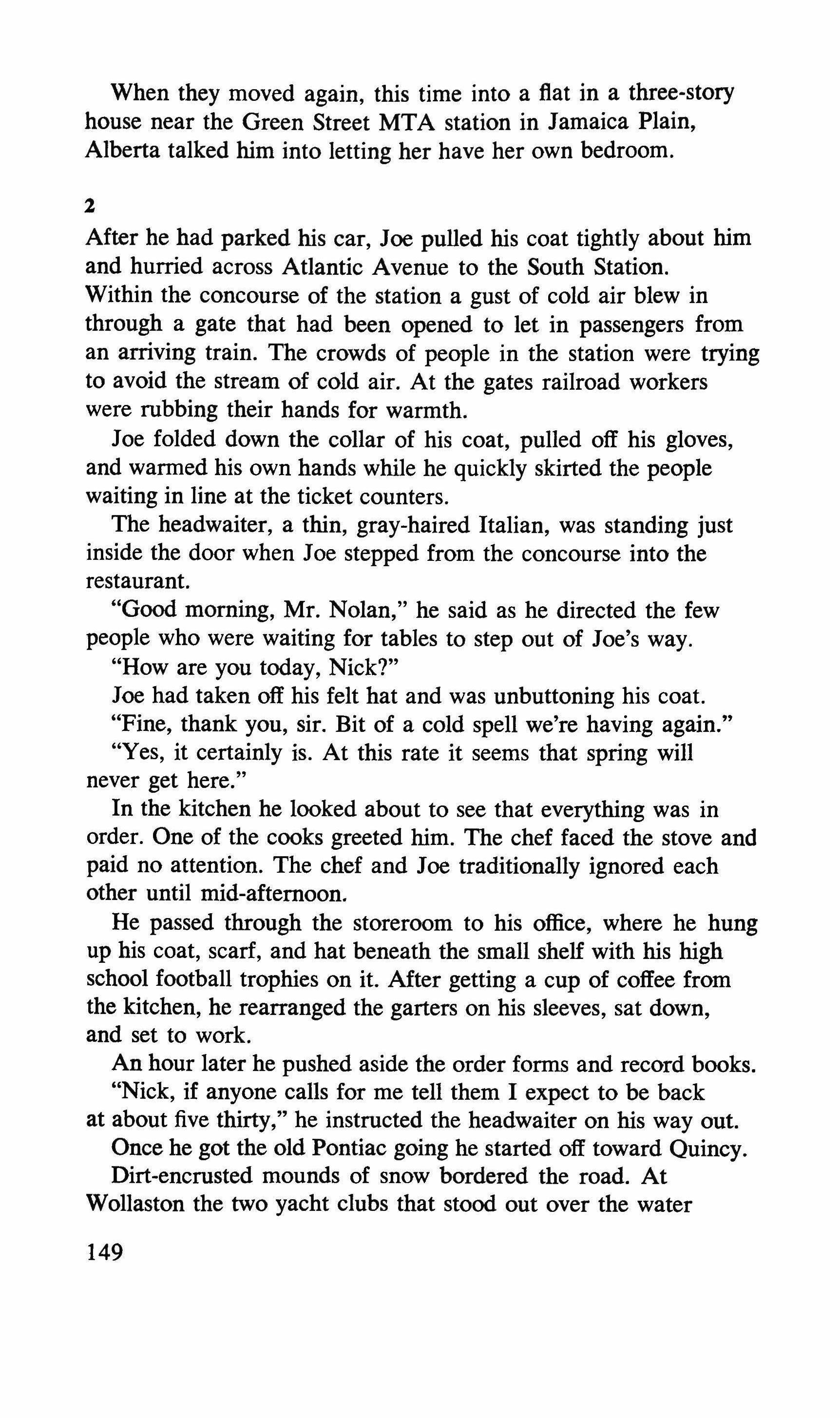
When they moved again, this time into a flat in a three-story house near the Green Street MTA station in Jamaica Plain, Alberta talked him into letting her have her own bedroom.
After he had parked his car, Joe pulled his coat tightly about him and hurried across Atlantic Avenue to the South Station. Within the concourse of the station a gust of cold air blew in through a gate that had been opened to let in passengers from an arriving train. The crowds of people in the station were trying to avoid the stream of cold air. At the gates railroad workers were rubbing their hands for warmth.
Joe folded down the collar of his coat, pulled off his gloves, and warmed his own hands while he quickly skirted the people waiting in line at the ticket counters.
The headwaiter, a thin, gray-haired Italian, was standing just inside the door when Joe stepped from the concourse into the restaurant.
"Good morning, Mr. Nolan," he said as he directed the few people who were waiting for tables to step out of Joe's way.
"How are you today, Nick?"
Joe had taken off his felt hat and was unbuttoning his coat.
"Fine, thank you, sir. Bit of a cold spell we're having again."
"Yes, it certainly is. At this rate it seems that spring will never get here."
In the kitchen he looked about to see that everything was in order. One of the cooks greeted him. The chef faced the stove and paid no attention. The chef and Joe traditionally ignored each other until mid-afternoon.
He passed through the storeroom to his office, where he hung up his coat, scarf, and hat beneath the small shelf with his high school football trophies on it. After getting a cup of coffee from the kitchen, he rearranged the garters on his sleeves, sat down, and set to work.
An hour later he pushed aside the order forms and record books.
"Nick, if anyone calls for me tell them I expect to be back at about five thirty," he instructed the headwaiter on his way out. Once he got the old Pontiac going he started off toward Quincy. Dirt-encrusted mounds of snow bordered the road. At Wollaston the two yacht clubs that stood out over the water
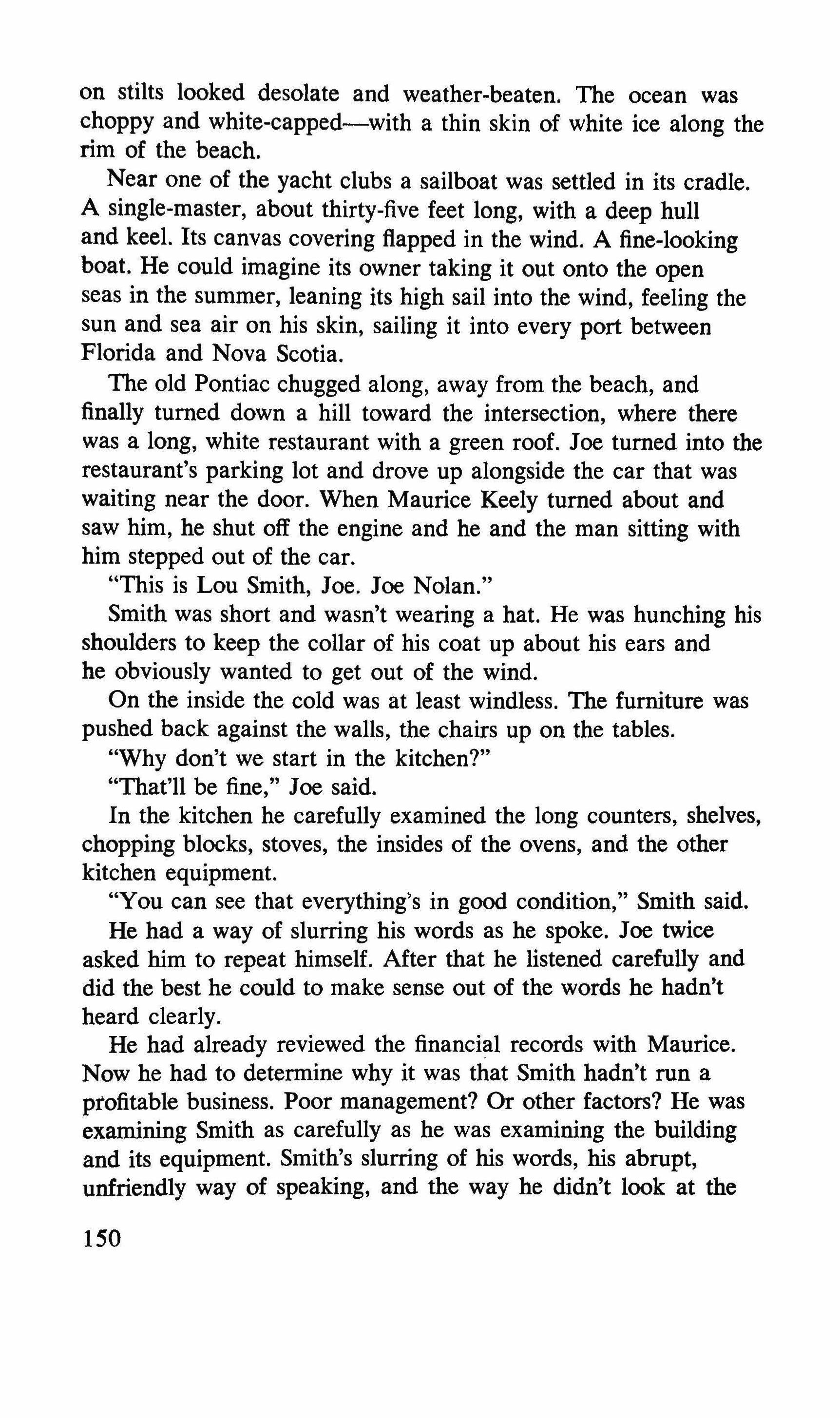
on stilts looked desolate and weather-beaten. The ocean was choppy and white-capped-with a thin skin of white ice along the rim of the beach.
Near one of the yacht clubs a sailboat was settled in its cradle. A single-master, about thirty-five feet long, with a deep hull and keel. Its canvas covering flapped in the wind. A fine-looking boat. He could imagine its owner taking it out onto the open seas in the summer, leaning its high sail into the wind, feeling the sun and sea air on his skin, sailing it into every port between Florida and Nova Scotia.
The old Pontiac chugged along, away from the beach, and finally turned down a hill toward the intersection, where there was a long, white restaurant with a green roof. Joe turned into the restaurant's parking lot and drove up alongside the car that was waiting near the door. When Maurice Keely turned about and saw him, he shut off the engine and he and the man sitting with him stepped out of the car.
"This is Lou Smith, Joe. Joe Nolan."
Smith was short and wasn't wearing a hat. He was hunching his shoulders to keep the collar of his coat up about his ears and he obviously wanted to get out of the wind.
On the inside the cold was at least windless. The furniture was pushed back against the walls, the chairs up on the tables.
"Why don't we start in the kitchen?"
"That'll be fine," Joe said.
In the kitchen he carefully examined the long counters, shelves, chopping blocks, stoves, the insides of the ovens, and the other kitchen equipment.
"You can see that everything's in good condition," Smith said. He had a way of slurring his words as he spoke. Joe twice asked him to repeat himself. After that he listened carefully and did the best he could to make sense out of the words he hadn't heard clearly.
He had already reviewed the financial records with Maurice. Now he had to determine why it was that Smith hadn't run a profitable business. Poor management? Or other factors? He was examining Smith as carefully as he was examining the building and its equipment. Smith's slurring of his words, his abrupt, unfriendly way of speaking, and the way he didn't look at the 150

person he was speaking to made Joe suspect he probably hadn't managed things very well.
As he drove back to Boston, Joe was paying little attention to the wind-torn surf at Wollaston and was thinking about the restaurant. He liked its location, only a few miles away from the spot where Howard Johnson had had his first ice cream stand. He started imagining what things would be like if he were to buy the place and make a success of it. When he passed the sailboat again, he slowed down and took a long, good look at it.
Maurice Keely called about half an hour after Joe was back in his office. "Well," he said, "what do you think?"
"It looks good, Maurice, but I'm sti11leery. If 1 were to buy this thing and it didn't pan out, 1 don't know if 1 could survive it."
"You do what you think is best, Joe. Like 1 told you, 1 don't know much about restaurants. This is the first one on my listings, but 1 thought it was a good deal and 1 wanted to tell you first so you could grab it if you wanted. Frankly, 1 think the guy's crazy. I've told him he can get more than twenty-five thousand for it, but he says he doesn't care; he just wants to get rid of it fast."
"I know. That's one of the things that's bothering me."
"Don't worry about it. Listen to me, 1 know what I'm talking about. When a guy wants to get rid of a listing as fast as that, it's not because there's something wrong with the listing; it's because there's something wrong with him. You saw the location. It looks to me like a good location. A little imagination and good management could turn that restaurant into a gold mine. Frankly, Joe, 1 think Smith just wasn't the kind of man to handle that kind of thing."
"I've been thinking that too; but I'm not sure, and 1 don't know that 1 want to take a chance on it. Give me some time to think about it. I'll call you again before the end of the week."
After he set the phone down he swiveled about in his chair and looked out through the storeroom to the kitchen. Twelve years ago he would have jumped at a chance like this.
"You're looking pensive tonight," Alberta said as she set Patrick in his chair at the supper table. She seemed slightly worried. 151

"Just business matters," Joe said. He took the carving knife and sliced the roast beef. "Two big slices for you, young man," he said as he gave Patrick the two smallest pieces. Patrick, who was holding his fork tightly in his fat little hand, looked up at his father and smiled. "Big ones," he said.
"Now sit here and eat, Patrick," Alberta said as she straightened his bib. Joe noticed that she was wearing the pearl necklace her father had given her.
"Are you going out tonight?"
"No. Why?"
"You're wearing your pearl necklace."
"Oh I just felt like wearing it. There's no special reason."
"And you're wearing one of your best dresses." It annoyed him that she wouldn't explain.
After supper Joe took Patrick into the living room and read to him until Alberta finished washing the dishes and cleaning the kitchen. When she took Patrick and put him to bed, Joe took up his newspaper. He was surprised when she came back into the living room a few minutes later and sat across from him. Usually she went from Patrick's room directly into her own.
He lowered the paper. She was looking down at her hands and was twisting her wedding ring about on her finger.
"Joe," she said, "I'd like to have a house."
He folded the newspaper slowly and set it on his lap. "It costs a lot of money to have a house, and we don't have a lot of money right now."
"I knew you were going to say that. And I can't really believe it. There are factory workers who have houses; and you own two restaurants that do a very good business. I can't understand it when you say that we don't have enough money."
"I have huge debts to pay. I'm still in debt."
"Are we going to be in debt forever?"
As he relit his cigar he thought to himself that that depended on whether or not he bought the restaurant in Quincy, and on how things went if he did buy it.
"Only for about four more years," he said.
"That's too long."
"Of course it's too long. But what am I supposed to do about it?"
"You have to do something. I can't live in places like this for
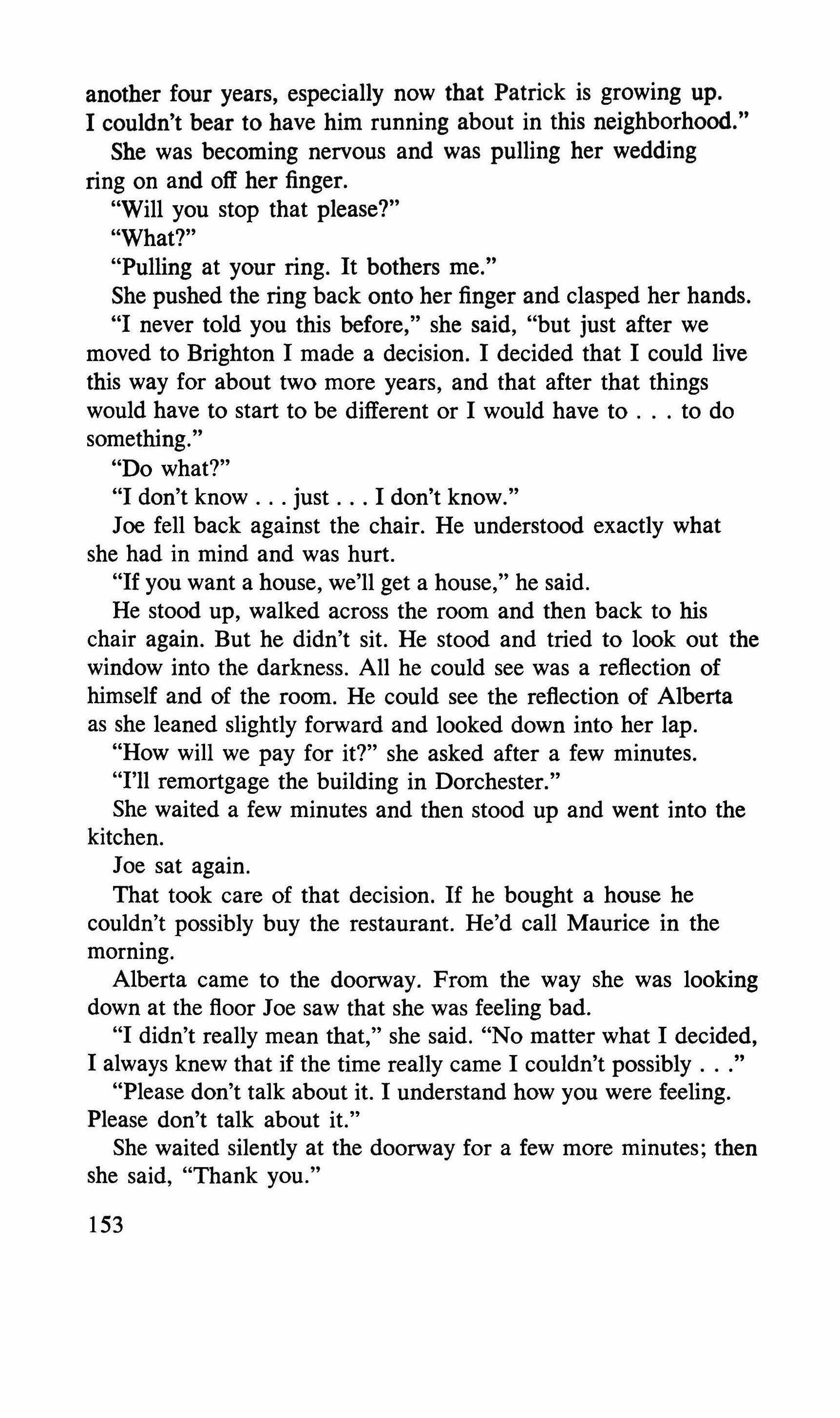
another four years, especially now that Patrick is growing up. I couldn't bear to have him running about in this neighborhood."
She was becoming nervous and was pulling her wedding ring on and off her finger.
"Will you stop that please?" "What?"
"Pulling at your ring. It bothers me."
She pushed the ring back onto her finger and clasped her hands.
"I never told you this before," she said, "but just after we moved to Brighton I made a decision. I decided that I could live this way for about two more years, and that after that things would have to start to be different or I would have to to do something.
"Do what?"
"I don't know just I don't know."
Joe fell back against the chair. He understood exactly what she had in mind and was hurt.
"If you want a house, we'll get a house," he said.
He stood up, walked across the room and then back to his chair again. But he didn't sit. He stood and tried to look out the window into the darkness. All he could see was a reflection of himself and of the room. He could see the reflection of Alberta as she leaned slightly forward and looked down into her lap.
"How will we pay for it?" she asked after a few minutes.
"I'll remortgage the building in Dorchester."
She waited a few minutes and then stood up and went into the kitchen.
Joe sat again.
That took care of that decision. If he bought a house he couldn't possibly buy the restaurant. He'd call Maurice in the morning.
Alberta came to the doorway. From the way she was looking down at the floor Joe saw that she was feeling bad.
"I didn't really mean that," she said. "No matter what I decided, I always knew that if the time really came I couldn't possibly ."
"Please don't talk about it. I understand how you were feeling. Please don't talk about it."
She waited silently at the doorway for a few more minutes; then she said, "Thank you."
153
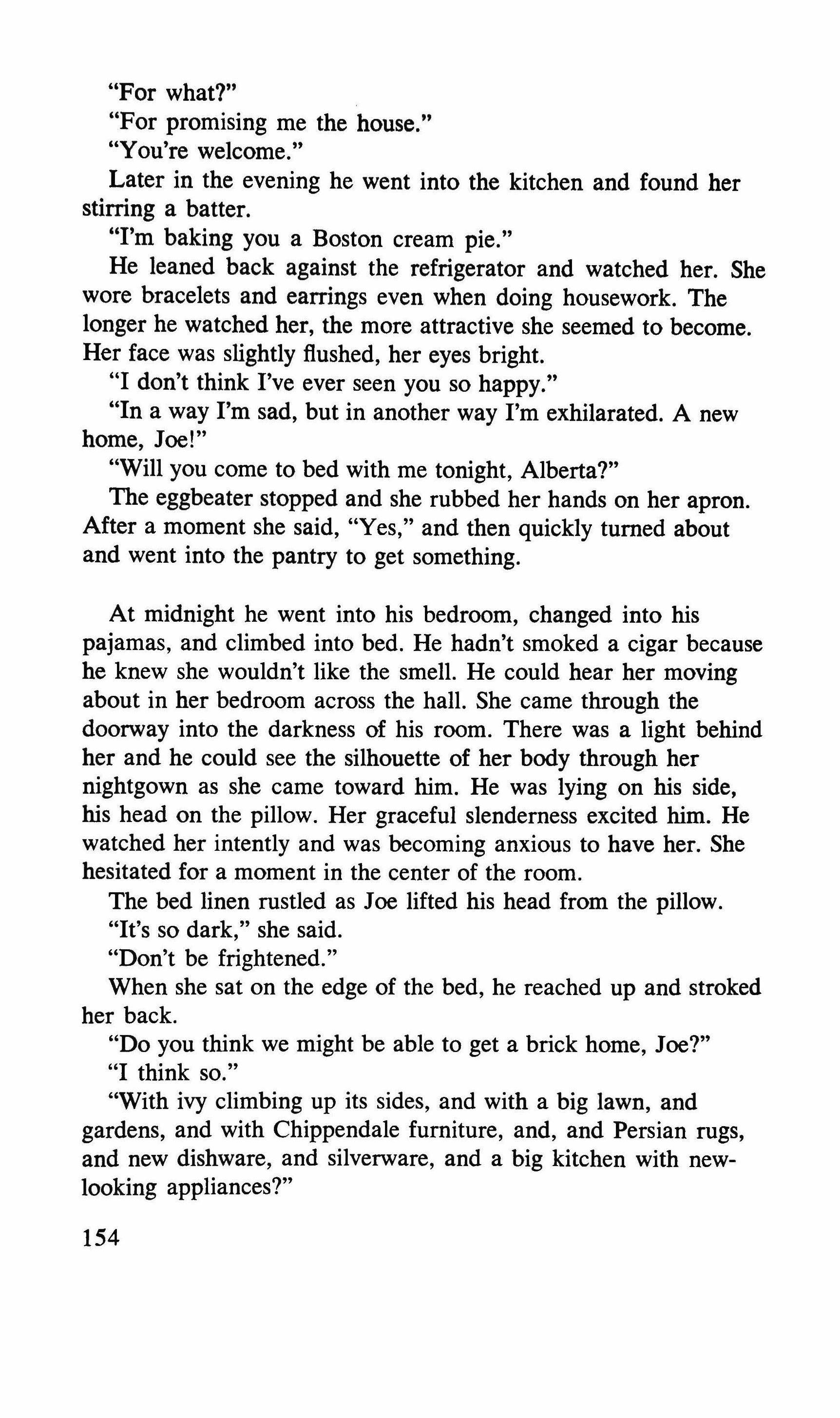
"For what?"
"For promising me the house."
"You're welcome."
Later in the evening he went into the kitchen and found her stirring a batter.
"I'm baking you a Boston cream pie."
He leaned back against the refrigerator and watched her. She wore bracelets and earrings even when doing housework. The longer he watched her, the more attractive she seemed to become. Her face was slightly flushed, her eyes bright.
"I don't think I've ever seen you so happy."
"In a way I'm sad, but in another way I'm exhilarated. A new home, Joe!"
"Will you come to bed with me tonight, Alberta?"
The eggbeater stopped and she rubbed her hands on her apron. After a moment she said, "Yes," and then quickly turned about and went into the pantry to get something.
At midnight he went into his bedroom, changed into his pajamas, and climbed into bed. He hadn't smoked a cigar because he knew she wouldn't like the smell. He could hear her moving about in her bedroom across the hall. She came through the doorway into the darkness of his room. There was a light behind her and he could see the silhouette of her body through her nightgown as she came toward him. He was lying on his side, his head on the pillow. Her graceful slenderness excited him. He watched her intently and was becoming anxious to have her. She hesitated for a moment in the center of the room.
The bed linen rustled as Joe lifted his head from the pillow.
"It's so dark," she said.
"Don't be frightened."
When she sat on the edge of the bed, he reached up and stroked her back.
"Do you think we might be able to get a brick home, Joe?"
"I think so."
"With ivy climbing up its sides, and with a big lawn, and gardens, and with Chippendale furniture, and, and Persian rugs, and new dishware, and silverware, and a big kitchen with newlooking appliances?"
154
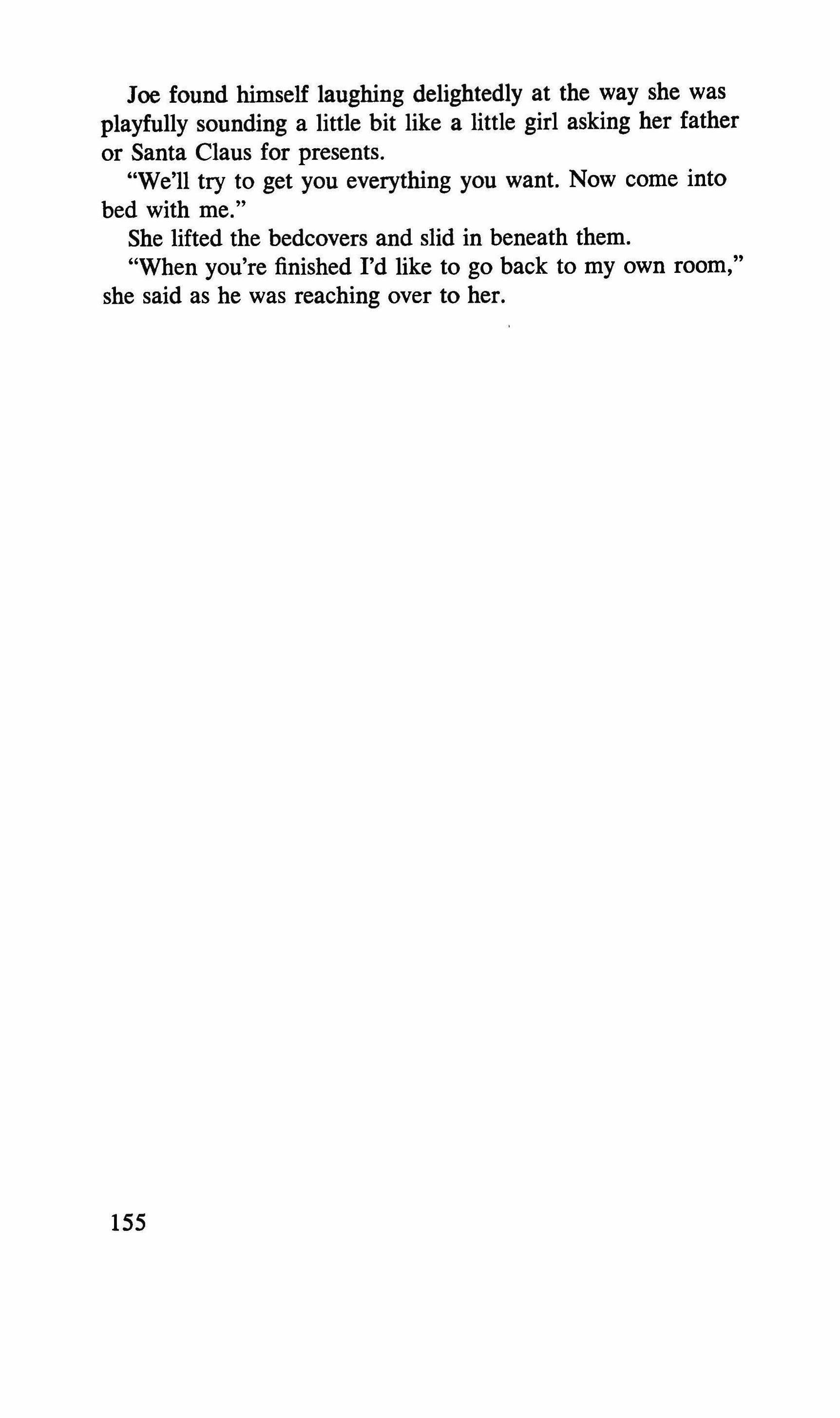
Joe found himself laughing delightedly at the way she was playfully sounding a little bit like a little girl asking her father or Santa Claus for presents.
"We'll try to get you everything you want. Now come into bed with me."
She lifted the bedcovers and slid in beneath them.
"When you're finished I'd like to go back to my own room," she said as he was reaching over to her.
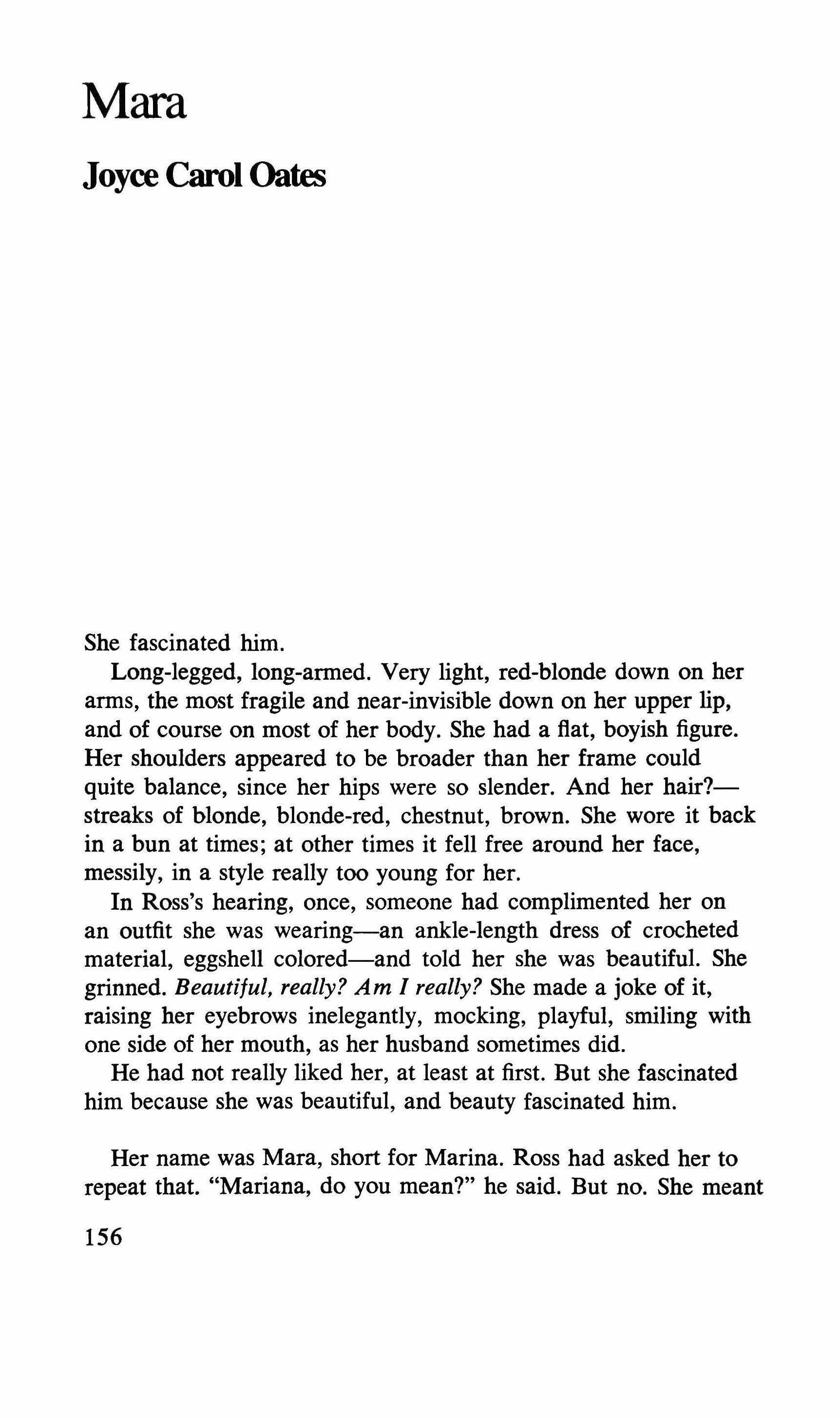
She fascinated him.
Long-legged, long-armed. Very light, red-blonde down on her arms, the most fragile and near-invisible down on her upper lip, and of course on most of her body. She had a fiat, boyish figure. Her shoulders appeared to be broader than her frame could quite balance, since her hips were so slender. And her hair?streaks of blonde, blonde-red, chestnut, brown. She wore it back in a bun at times; at other times it fell free around her face, messily, in a style really too young for her.
In Ross's hearing, once, someone had complimented her on an outfit she was wearing-an ankle-length dress of crocheted material, eggshell colored-and told her she was beautiful. She grinned. Beautiful, really? Am I really? She made a joke of it, raising her eyebrows inelegantly, mocking, playful, smiling with one side of her mouth, as her husband sometimes did.
He had not really liked her, at least at first. But she fascinated him because she was beautiful, and beauty fascinated him.
Her name was Mara, short for Marina. Ross had asked her to repeat that. "Mariana, do you mean?" he said. But no. She meant
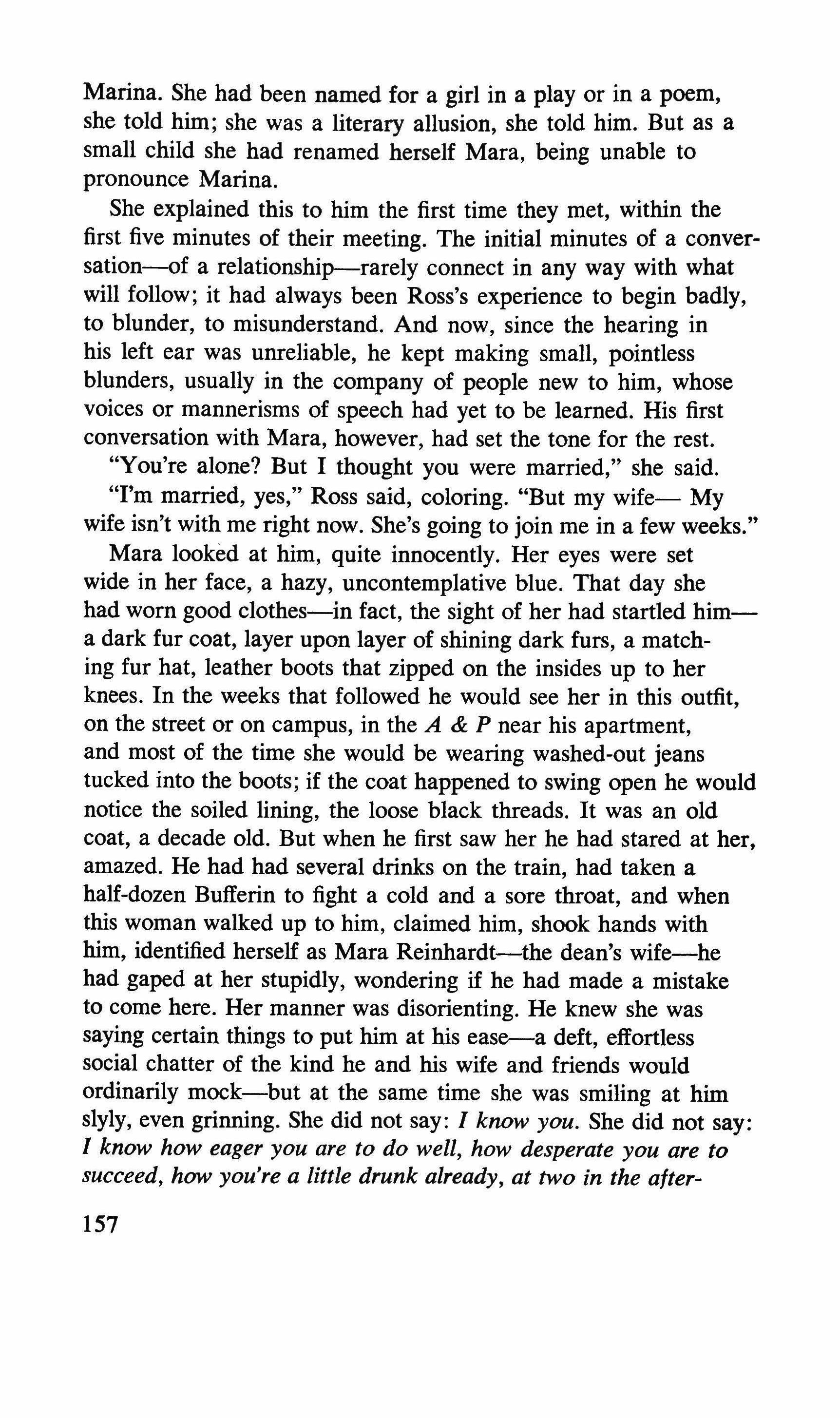
Marina. She had been named for a girl in a play or in a poem, she told him; she was a literary allusion, she told him. But as a small child she had renamed herself Mara, being unable to pronounce Marina.
She explained this to him the first time they met, within the first five minutes of their meeting. The initial minutes of a conversation-of a relationship-rarely connect in any way with what will follow; it had always been Ross's experience to begin badly, to blunder, to misunderstand. And now, since the hearing in his left ear was unreliable, he kept making small, pointless blunders, usually in the company of people new to him, whose voices or mannerisms of speech had yet to be learned. His first conversation with Mara, however, had set the tone for the rest.
"You're alone? But I thought you were married," she said.
"I'm married, yes," Ross said, coloring. "But my wife- My wife isn't with me right now. She's going to join me in a few weeks."
Mara looked at him, quite innocently. Her eyes were set wide in her face, a hazy, uncontemplative blue. That day she had worn good clothes-in fact, the sight of her had startled hima dark fur coat, layer upon layer of shining dark furs, a matching fur hat, leather boots that zipped on the insides up to her knees. In the weeks that followed he would see her in this outfit, on the street or on campus, in the A & P near his apartment, and most of the time she would be wearing washed-out jeans tucked into the boots; if the coat happened to swing open he would notice the soiled lining, the loose black threads. It was an old coat, a decade old. But when he first saw her he had stared at her, amazed. He had had several drinks on the train, had taken a half-dozen Bufferin to fight a cold and a sore throat, and when this woman walked up to him, claimed him, shook hands with him, identified herself as Mara Reinhardt-the dean's wife-he had gaped at her stupidly, wondering if he had made a mistake to come here. Her manner was disorienting. He knew she was saying certain things to put him at his ease-a deft, effortless social chatter of the kind he and his wife and friends would ordinarily mock-but at the same time she was smiling at him slyly, even grinning. She did not say: 1 know you. She did not say: 1 know how eager you are to do well, how desperate you are to succeed, how you're a little drunk already, at two in the after157
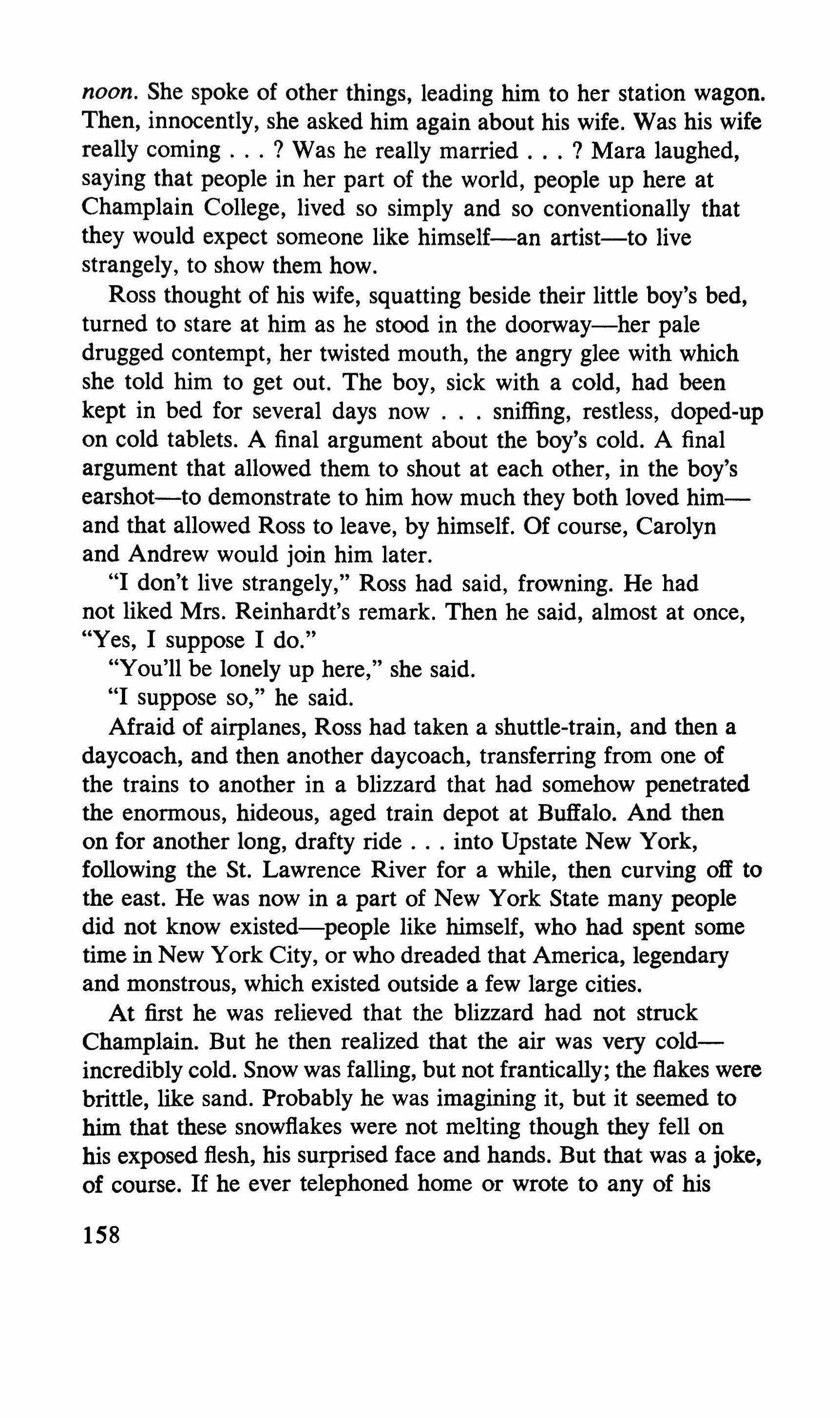
noon. She spoke of other things, leading him to her station wagon. Then, innocently, she asked him again about his wife. Was his wife really coming ? Was he really married ? Mara laughed, saying that people in her part of the world, people up here at Champlain College, lived so simply and so conventionally that they would expect someone like himself-an artist-to live strangely, to show them how.
Ross thought of his wife, squatting beside their little boy's bed, turned to stare at him as he stood in the doorway-her pale drugged contempt, her twisted mouth, the angry glee with which she told him to get out. The boy, sick with a cold, had been kept in bed for several days now sniffing, restless, doped-up on cold tablets. A final argument about the boy's cold. A final argument that allowed them to shout at each other, in the boy's earshot-to demonstrate to him how much they both loved himand that allowed Ross to leave, by himself. Of course, Carolyn and Andrew would join him later.
"I don't live strangely," Ross had said, frowning. He had not liked Mrs. Reinhardt's remark. Then he said, almost at once, "Yes, 1 suppose 1 do."
"You'll be lonely up here," she said.
"I suppose so," he said.
Afraid of airplanes, Ross had taken a shuttle-train, and then a daycoach, and then another daycoach, transferring from one of the trains to another in a blizzard that had somehow penetrated the enormous, hideous, aged train depot at Buffalo. And then on for another long, drafty ride into Upstate New York, following the St. Lawrence River for a while, then curving off to the east. He was now in a part of New York State many people did not know existed-people like himself, who had spent some time in New York City, or who dreaded that America, legendary and monstrous, which existed outside a few large cities.
At first he was relieved that the blizzard had not struck Champlain. But he then realized that the air was very coldincredibly cold. Snow was falling, but not frantically; the flakes were brittle, like sand. Probably he was imagining it, but it seemed to him that these snowflakes were not melting though they fell on his exposed flesh, his surprised face and hands. But that was a joke, of course. If he ever telephoned home or wrote to any of his
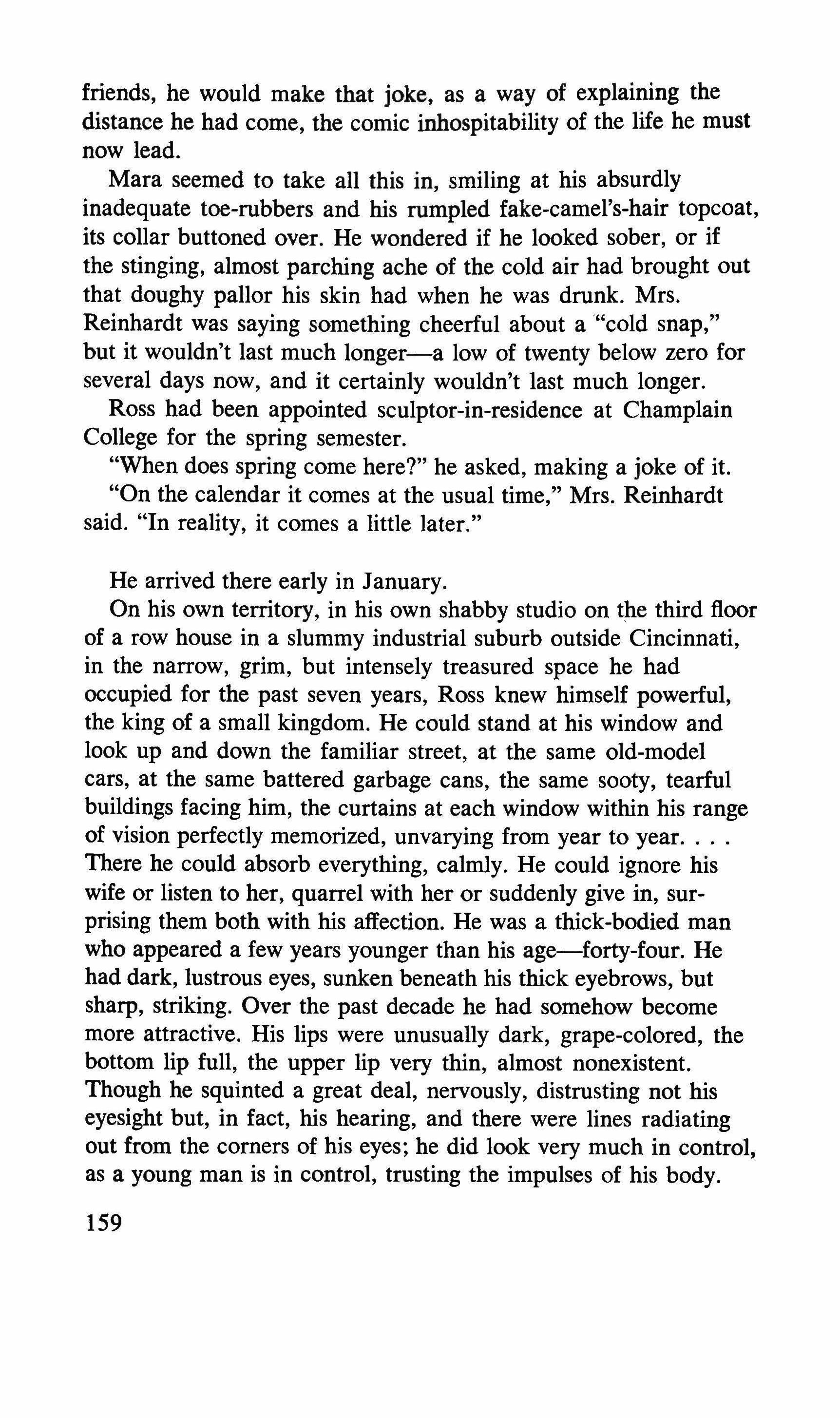
friends, he would make that joke, as a way of explaining the distance he had come, the comic inhospitability of the life he must now lead.
Mara seemed to take all this in, smiling at his absurdly inadequate toe-rubbers and his rumpled fake-camel's-hair topcoat, its collar buttoned over. He wondered if he looked sober, or if the stinging, almost parching ache of the cold air had brought out that doughy pallor his skin had when he was drunk. Mrs. Reinhardt was saying something cheerful about a "cold snap," but it wouldn't last much longer-a low of twenty below zero for several days now, and it certainly wouldn't last much longer.
Ross had been appointed sculptor-in-residence at Champlain College for the spring semester.
"When does spring come here?" he asked, making a joke of it.
"On the calendar it comes at the usual time," Mrs. Reinhardt said. "In reality, it comes a little later."
He arrived there early in January.
On his own territory, in his own shabby studio on the third floor of a row house in a slummy industrial suburb outside Cincinnati, in the narrow, grim, but intensely treasured space he had occupied for the past seven years, Ross knew himself powerful, the king of a small kingdom. He could stand at his window and look up and down the familiar street, at the same old-model cars, at the same battered garbage cans, the same sooty, tearful buildings facing him, the curtains at each window within his range of vision perfectly memorized, unvarying from year to year There he could absorb everything, calmly. He could ignore his wife or listen to her, quarrel with her or suddenly give in, surprising them both with his affection. He was a thick-bodied man who appeared a few years younger than his age-forty-four. He had dark, lustrous eyes, sunken beneath his thick eyebrows, but sharp, striking. Over the past decade he had somehow become more attractive. His lips were unusually dark, grape-colored, the bottom lip full, the upper lip very thin, almost nonexistent. Though he squinted a great deal, nervously, distrusting not his eyesight but, in fact, his hearing, and there were lines radiating out from the corners of his eyes; he did look very much in control, as a young man is in control, trusting the impulses of his body.
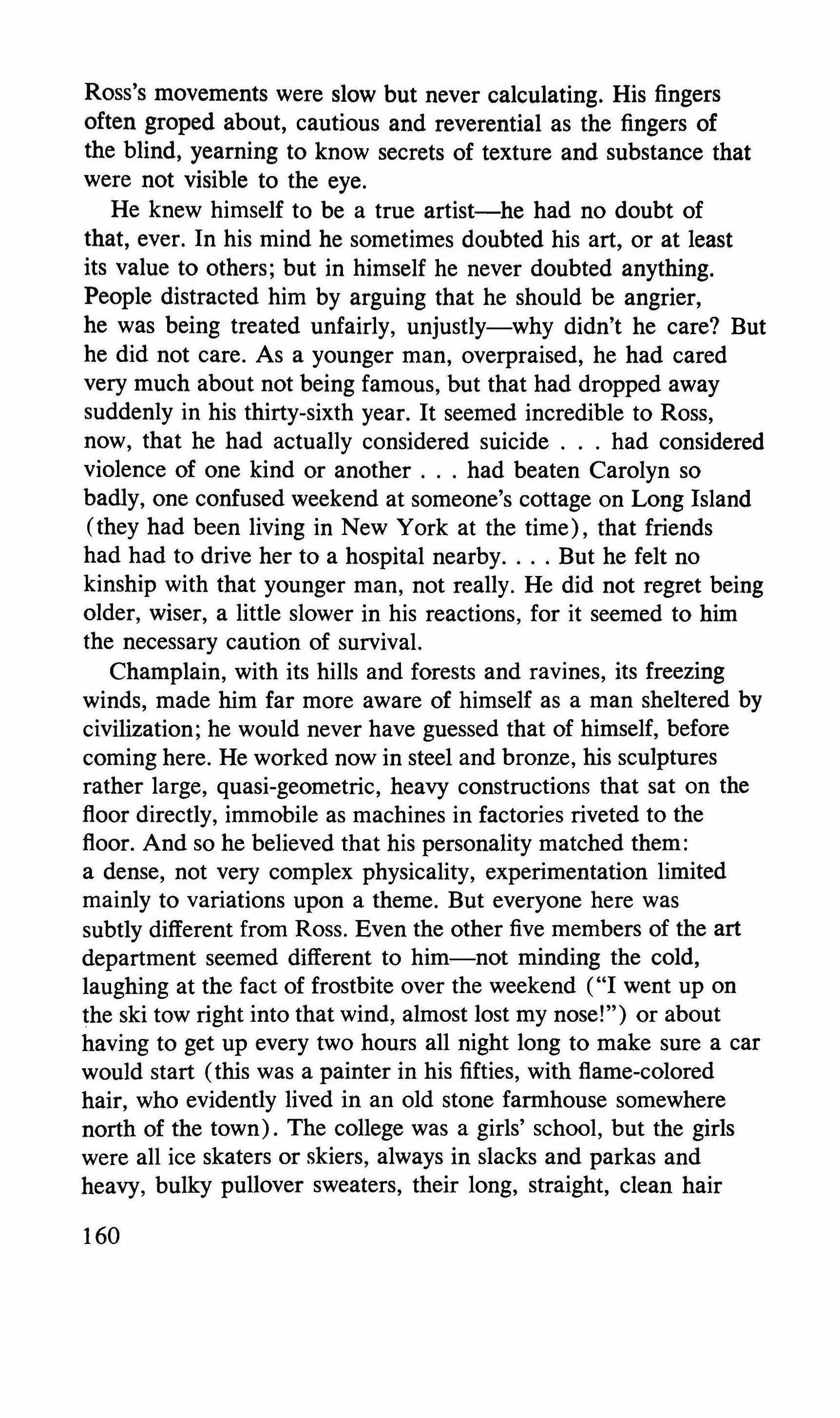
Ross's movements were slow but never calculating. His fingers often groped about, cautious and reverential as the fingers of the blind, yearning to know secrets of texture and substance that were not visible to the eye.
He knew himself to be a true artist-he had no doubt of that, ever. In his mind he sometimes doubted his art, or at least its value to others; but in himself he never doubted anything. People distracted him by arguing that he should be angrier, he was being treated unfairly, unjustly-why didn't he care? But he did not care. As a younger man, overpraised, he had cared very much about not being famous, but that had dropped away suddenly in his thirty-sixth year. It seemed incredible to Ross, now, that he had actually considered suicide had considered violence of one kind or another had beaten Carolyn so badly, one confused weekend at someone's cottage on Long Island (they had been living in New York at the time), that friends had had to drive her to a hospital nearby But he felt no kinship with that younger man, not really. He did not regret being older, wiser, a little slower in his reactions, for it seemed to him the necessary caution of survival.
Champlain, with its hills and forests and ravines, its freezing winds, made him far more aware of himself as a man sheltered by civilization; he would never have guessed that of himself, before coming here. He worked now in steel and bronze, his sculptures rather large, quasi-geometric, heavy constructions that sat on the floor directly, immobile as machines in factories riveted to the floor. And so he believed that his personality matched them: a dense, not very complex physicality, experimentation limited mainly to variations upon a theme. But everyone here was subtly different from Ross. Even the other five members of the art department seemed different to him-not minding the cold, laughing at the fact of frostbite over the weekend ("I went up on the ski tow right into that wind, almost lost my nose!") or about having to get up every two hours all night long to make sure a car would start (this was a painter in his fifties, with flame-colored hair, who evidently lived in an old stone farmhouse somewhere north of the town). The college was a girls' school, but the girls were all ice skaters or skiers, always in slacks and parkas and heavy, bulky pullover sweaters, their long, straight, clean hair
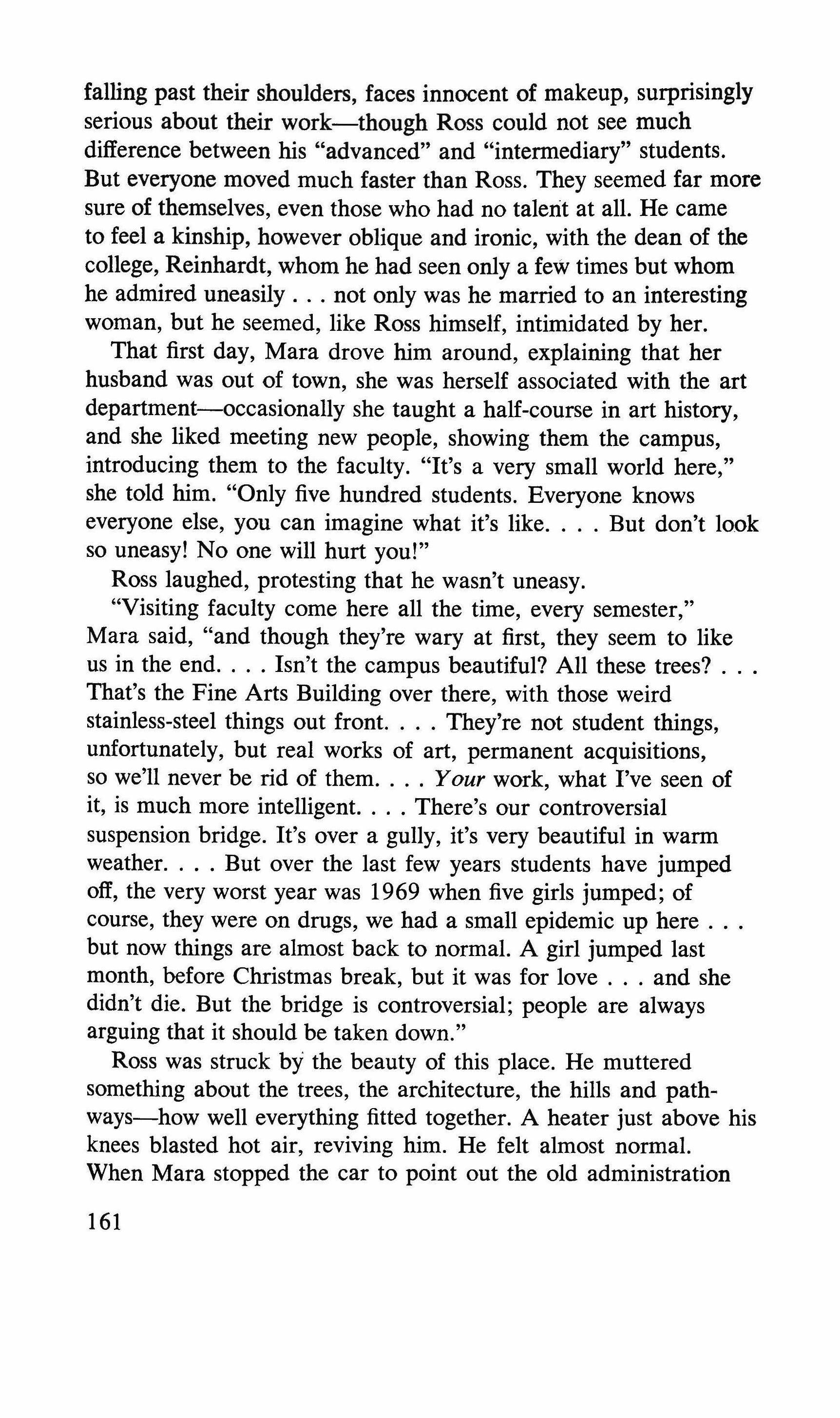
falling past their shoulders, faces innocent of makeup, surprisingly serious about their work-though Ross could not see much difference between his "advanced" and "intermediary" students. But everyone moved much faster than Ross. They seemed far more sure of themselves, even those who had no talerit at all. He came to feel a kinship, however oblique and ironic, with the dean of the college, Reinhardt, whom he had seen only a few times but whom he admired uneasily not only was he married to an interesting woman, but he seemed, like Ross himself, intimidated by her.
That first day, Mara drove him around, explaining that her husband was out of town, she was herself associated with the art department-occasionally she taught a half-course in art history, and she liked meeting new people, showing them the campus, introducing them to the faculty. "It's a very small world here," she told him. "Only five hundred students. Everyone knows everyone else, you can imagine what it's like. But don't look so uneasy! No one will hurt you!"
Ross laughed, protesting that he wasn't uneasy. "Visiting faculty come here all the time, every semester," Mara said, "and though they're wary at first, they seem to like us in the end Isn't the campus beautiful? All these trees? That's the Fine Arts Building over there, with those weird stainless-steel things out front. They're not student things, unfortunately, but real works of art, permanent acquisitions, so we'll never be rid of them. Your work, what I've seen of it, is much more intelligent. There's our controversial suspension bridge. It's over a gully, it's very beautiful in warm weather. But over the last few years students have jumped off, the very worst year was 1969 when five girls jumped; of course, they were on drugs, we had a small epidemic up here but now things are almost back to normal. A girl jumped last month, before Christmas break, but it was for love and she didn't die. But the bridge is controversial; people are always arguing that it should be taken down."
Ross was struck by the beauty of this place. He muttered something about the trees, the architecture, the hills and pathways-how well everything fitted together. A heater just above his knees blasted hot air, reviving him. He felt almost normal. When Mara stopped the car to point out the old administration 161
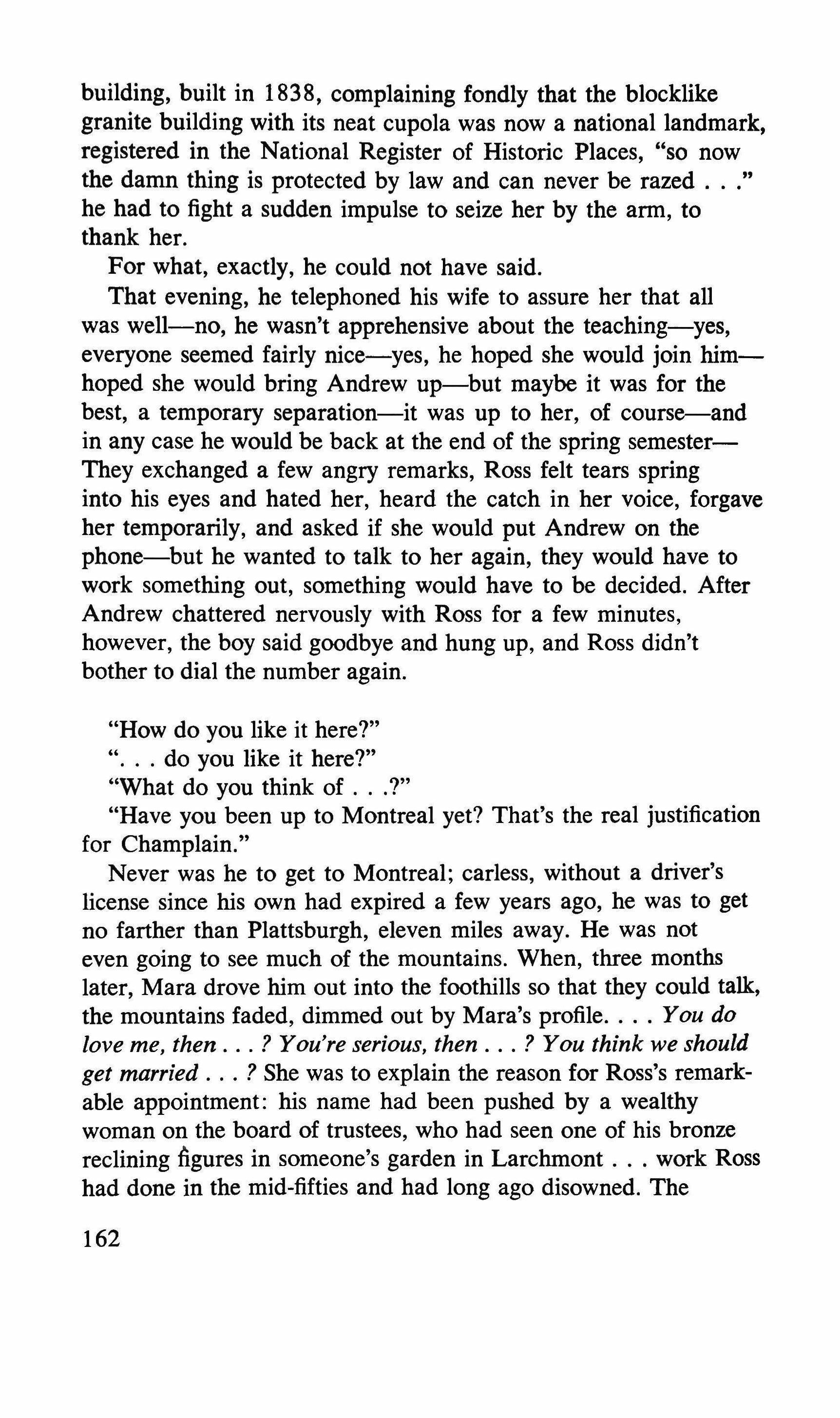
building, built in 1838, complaining fondly that the blocklike granite building with its neat cupola was now a national landmark, registered in the National Register of Historic Places, "so now the damn thing is protected by law and can never be razed ." he had to fight a sudden impulse to seize her by the arm, to thank her.
For what, exactly, he could not have said. That evening, he telephoned his wife to assure her that all was well-no, he wasn't apprehensive about the teaching-yes, everyone seemed fairly nice-yes, he hoped she would join himhoped she would bring Andrew up-but maybe it was for the best, a temporary separation-it was up to her, of course-and in any case he would be back at the end of the spring semesterThey exchanged a few angry remarks, Ross felt tears spring into his eyes and hated her, heard the catch in her voice, forgave her temporarily, and asked if she would put Andrew on the phone-but he wanted to talk to her again, they would have to work something out, something would have to be decided. After Andrew chattered nervously with Ross for a few minutes, however, the boy said goodbye and hung up, and Ross didn't bother to dial the number again.
"How do you like it here?" " do you like it here?"
"What do you think of .?"
"Have you been up to Montreal yet? That's the real justification for Champlain."
Never was he to get to Montreal; carless, without a driver's license since his own had expired a few years ago, he was to get no farther than Plattsburgh, eleven miles away. He was not even going to see much of the mountains. When, three months later, Mara drove him out into the foothills so that they could talk, the mountains faded, dimmed out by Mara's profile You do love me, then ? You're serious, then ? You think we should get married ? She was to explain the reason for Ross's remarkable appointment: his name had been pushed by a wealthy woman on the board of trustees, who had seen one of his bronze reclining figures in someone's garden in Larchmont work Ross had done in the mid-fifties and had long ago disowned. The
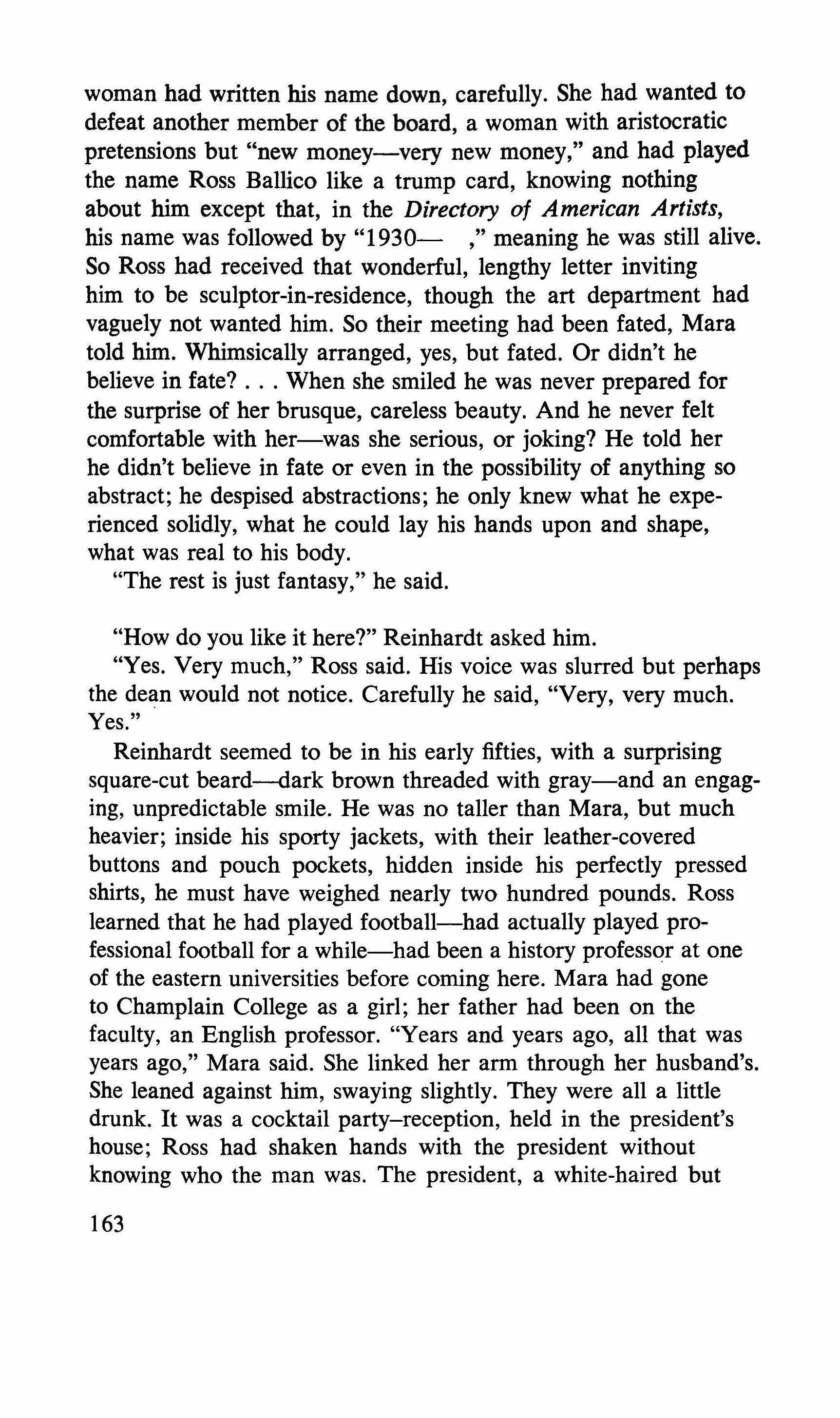
woman had written his name down, carefully. She had wanted to defeat another member of the board, a woman with aristocratic pretensions but "new money-very new money," and had played the name Ross Ballico like a trump card, knowing nothing about him except that, in the Directory of American Artists, his name was followed by "1930- ," meaning he was still alive. So Ross had received that wonderful, lengthy letter inviting him to be sculptor-in-residence, though the art department had vaguely not wanted him. So their meeting had been fated, Mara told him. Whimsically arranged, yes, but fated. Or didn't he believe in fate? When she smiled he was never prepared for the surprise of her brusque, careless beauty. And he never felt comfortable with her-was she serious, or joking? He told her he didn't believe in fate or even in the possibility of anything so abstract; he despised abstractions; he only knew what he experienced solidly, what he could lay his hands upon and shape, what was real to his body.
"The rest is just fantasy," he said.
"How do you like it here?" Reinhardt asked him. "Yes. Very much," Ross said. His voice was slurred but perhaps the dean would not notice. Carefully he said, "Very, very much. Yes."
Reinhardt seemed to be in his early fifties, with a surprising square-cut beard--dark brown threaded with gray-and an engaging, unpredictable smile. He was no taller than Mara, but much heavier; inside his sporty jackets, with their leather-covered buttons and pouch pockets, hidden inside his perfectly pressed shirts, he must have weighed nearly two hundred pounds. Ross learned that he had played football-had actually played professional football for a while-had been a history professor at one of the eastern universities before coming here. Mara had gone to Champlain College as a girl; her father had been on the faculty, an English professor. "Years and years ago, all that was years ago," Mara said. She linked her arm through her husband's. She leaned against him, swaying slightly. They were all a little drunk. It was a cocktail party-reception, held in the president's house; Ross had shaken hands with the president without knowing who the man was. The president, a white-haired but 163
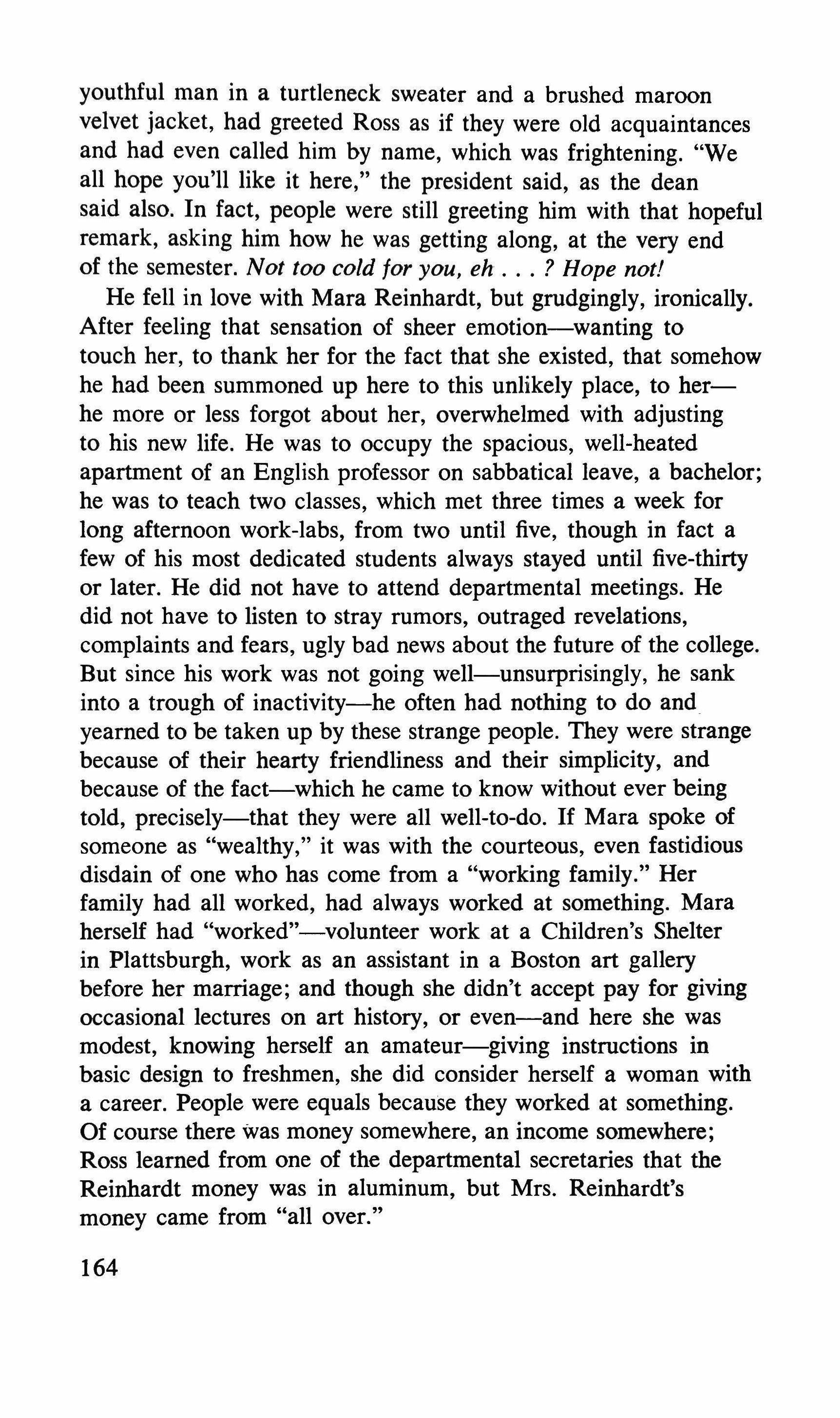
youthful man in a turtleneck sweater and a brushed maroon velvet jacket, had greeted Ross as if they were old acquaintances and had even called him by name, which was frightening. "We all hope you'll like it here," the president said, as the dean said also. In fact, people were still greeting him with that hopeful remark, asking him how he was getting along, at the very end of the semester. Not too cold for you, en ? Hope not! He fell in love with Mara Reinhardt, but grudgingly, ironically. After feeling that sensation of sheer emotion-wanting to touch her, to thank her for the fact that she existed, that somehow he had been summoned up here to this unlikely place, to herhe more or less forgot about her, overwhelmed with adjusting to his new life. He was to occupy the spacious, well-heated apartment of an English professor on sabbatical leave, a bachelor; he was to teach two classes, which met three times a week for long afternoon work-labs, from two until five, though in fact a few of his most dedicated students always stayed until five-thirty or later. He did not have to attend departmental meetings. He did not have to listen to stray rumors, outraged revelations, complaints and fears, ugly bad news about the future of the college. But since his work was not going well-unsurprisingly, he sank into a trough of inactivity-he often had nothing to do and yearned to be taken up by these strange people. They were strange because of their hearty friendliness and their simplicity, and because of the fact-which he came to know without ever being told, precisely-that they were all well-to-do. If Mara spoke of someone as "wealthy," it was with the courteous, even fastidious disdain of one who has come from a "working family." Her family had all worked, had always worked at something. Mara herself had "worked"-volunteer work at a Children's Shelter in Plattsburgh, work as an assistant in a Boston art gallery before her marriage; and though she didn't accept pay for giving occasional lectures on art history, or even-and here she was modest, knowing herself an amateur-giving instructions in basic design to freshmen, she did consider herself a woman with a career. People were equals because they worked at something. Of course there was money somewhere, an income somewhere; Ross learned from one of the departmental secretaries that the Reinhardt money was in aluminum, but Mrs. Reinhardt's money came from "all over."
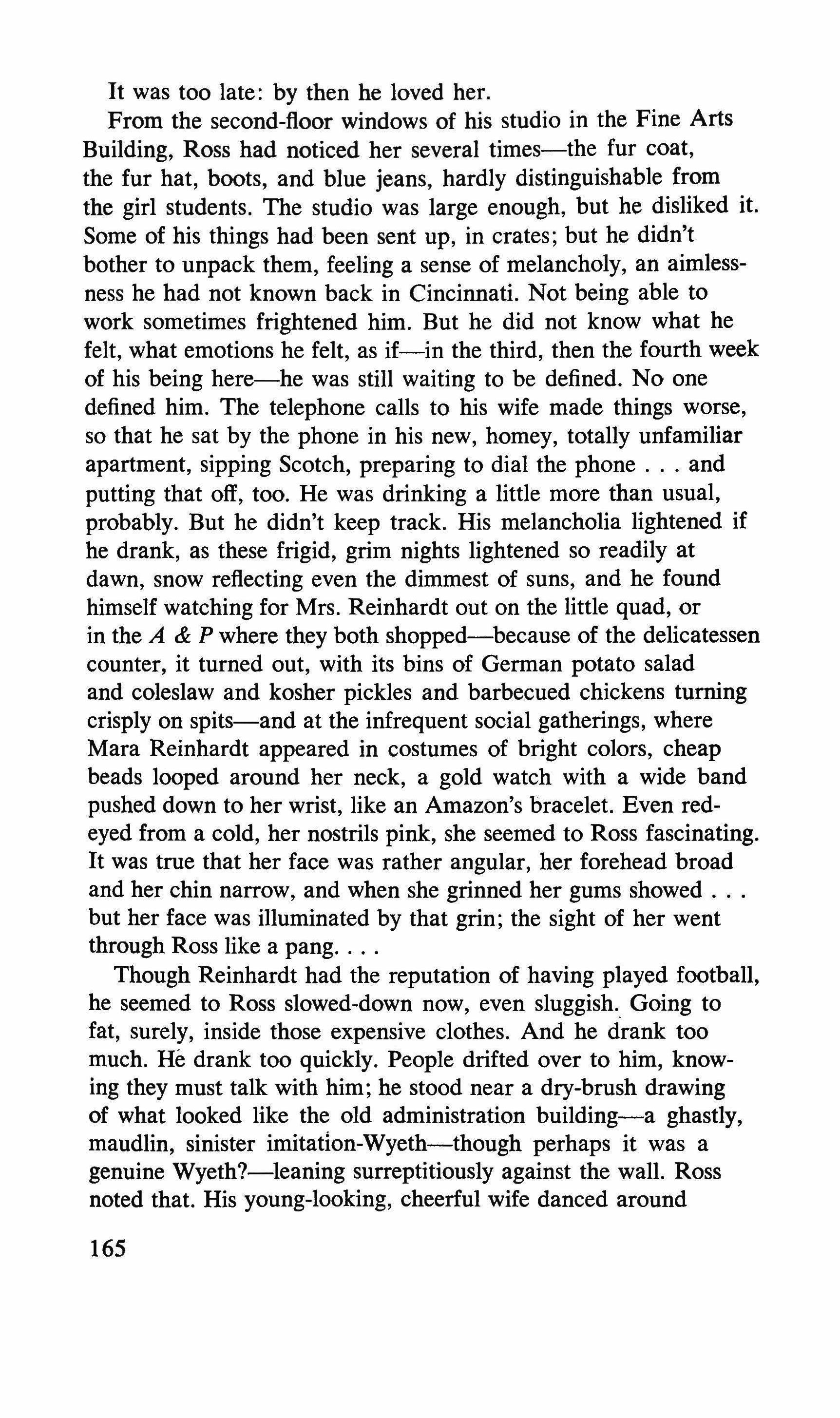
It was too late: by then he loved her. From the second-floor windows of his studio in the Fine Arts Building, Ross had noticed her several times-the fur coat, the fur hat, boots, and blue jeans, hardly distinguishable from the girl students. The studio was large enough, but he disliked it. Some of his things had been sent up, in crates; but he didn't bother to unpack them, feeling a sense of melancholy, an aimlessness he had not known back in Cincinnati. Not being able to work sometimes frightened him. But he did not know what he felt, what emotions he felt, as if-in the third, then the fourth week of his being here-he was still waiting to be defined. No one defined him. The telephone calls to his wife made things worse, so that he sat by the phone in his new, homey, totally unfamiliar apartment, sipping Scotch, preparing to dial the phone and putting that off, too. He was drinking a little more than usual, probably. But he didn't keep track. His melancholia lightened if he drank, as these frigid, grim nights lightened so readily at dawn, snow reflecting even the dimmest of suns, and he found himself watching for Mrs. Reinhardt out on the little quad, or in the A & P where they both shopped-because of the delicatessen counter, it turned out, with its bins of German potato salad and coleslaw and kosher pickles and barbecued chickens turning crisply on spits-and at the infrequent social gatherings, where Mara Reinhardt appeared in costumes of bright colors, cheap beads looped around her neck, a gold watch with a wide band pushed down to her wrist, like an Amazon's bracelet. Even redeyed from a cold, her nostrils pink, she seemed to Ross fascinating. It was true that her face was rather angular, her forehead broad and her chin narrow, and when she grinned her gums showed but her face was illuminated by that grin; the sight of her went through Ross like a pang
Though Reinhardt had the reputation of having played football, he seemed to Ross slowed-down now, even sluggish Going to fat, surely, inside those expensive clothes. And he drank too much. He drank too quickly. People drifted over to him, knowing they must talk with him; he stood near a dry-brush drawing of what looked like the old administration building-a ghastly, maudlin, sinister imitation-Wyeth-though perhaps it was a genuine Wyeth?-leaning surreptitiously against the wall. Ross noted that. His young-looking, cheerful wife danced around
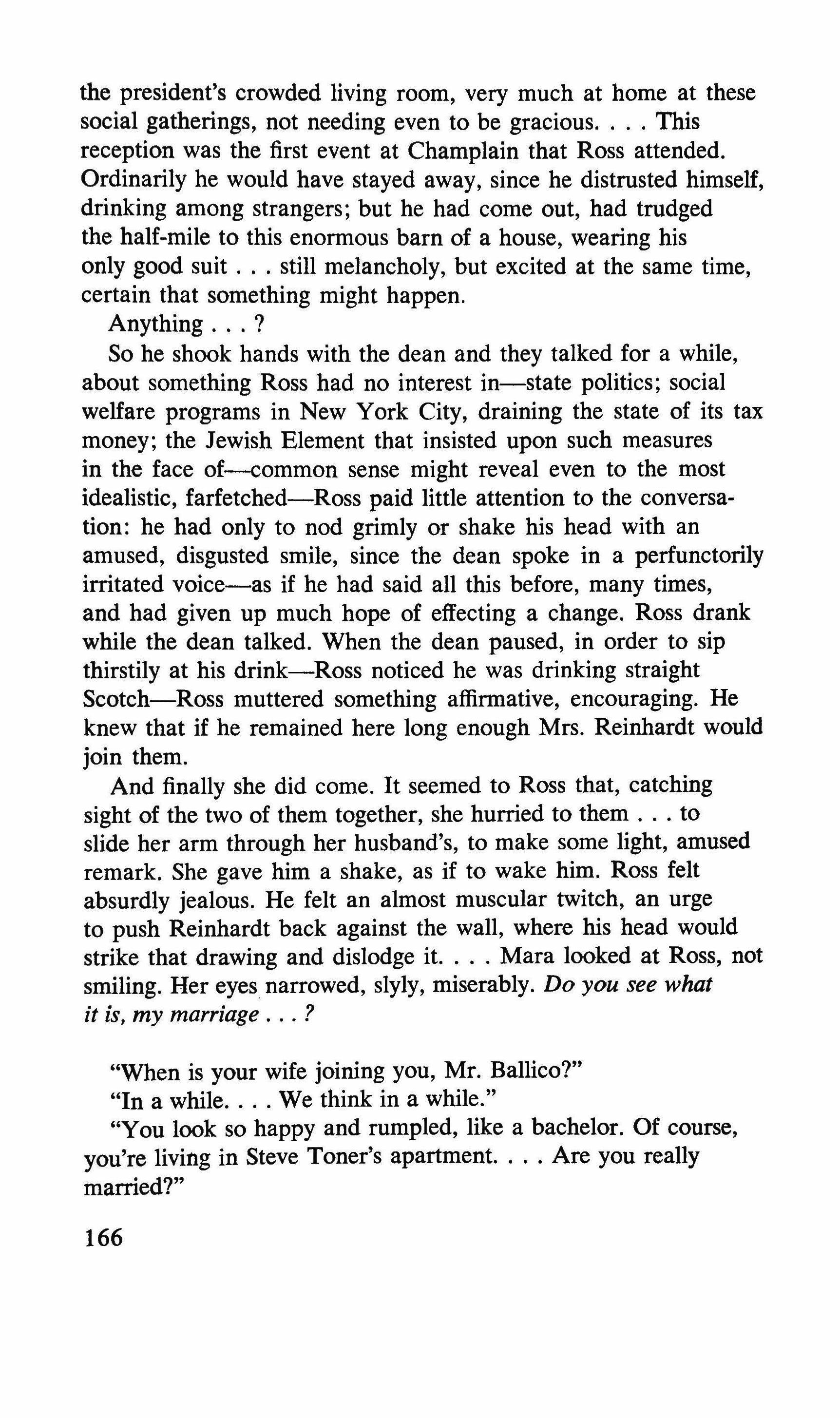
the president's crowded living room, very much at home at these social gatherings, not needing even to be gracious. This reception was the first event at Champlain that Ross attended. Ordinarily he would have stayed away, since he distrusted himself, drinking among strangers; but he had come out, had trudged the half-mile to this enormous barn of a house, wearing his only good suit still melancholy, but excited at the same time, certain that something might happen.
Anything ?
So he shook hands with the dean and they talked for a while, about something Ross had no interest in-state politics; social welfare programs in New York City, draining the state of its tax money; the Jewish Element that insisted upon such measures in the face of-common sense might reveal even to the most idealistic, farfetched-Ross paid little attention to the conversation: he had only to nod grimly or shake his head with an amused, disgusted smile, since the dean spoke in a perfunctorily irritated voice-as if he had said all this before, many times, and had given up much hope of effecting a change. Ross drank while the dean talked. When the dean paused, in order to sip thirstily at his drink-Ross noticed he was drinking straight Scotch-Ross muttered something affirmative, encouraging. He knew that if he remained here long enough Mrs. Reinhardt would join them.
And finally she did come. It seemed to Ross that, catching sight of the two of them together, she hurried to them to slide her arm through her husband's, to make some light, amused remark. She gave him a shake, as if to wake him. Ross felt absurdly jealous. He felt an almost muscular twitch, an urge to push Reinhardt back against the wall, where his head would strike that drawing and dislodge it. Mara looked at Ross, not smiling. Her eyes narrowed, slyly, miserably. Do you see what ? It IS, my marnage
"When is your wife joining you, Mr. Ballico?"
"In a while We think in a while."
"You look so happy and rumpled, like a bachelor. Of course, you're living in Steve Toner's apartment Are you really married?"
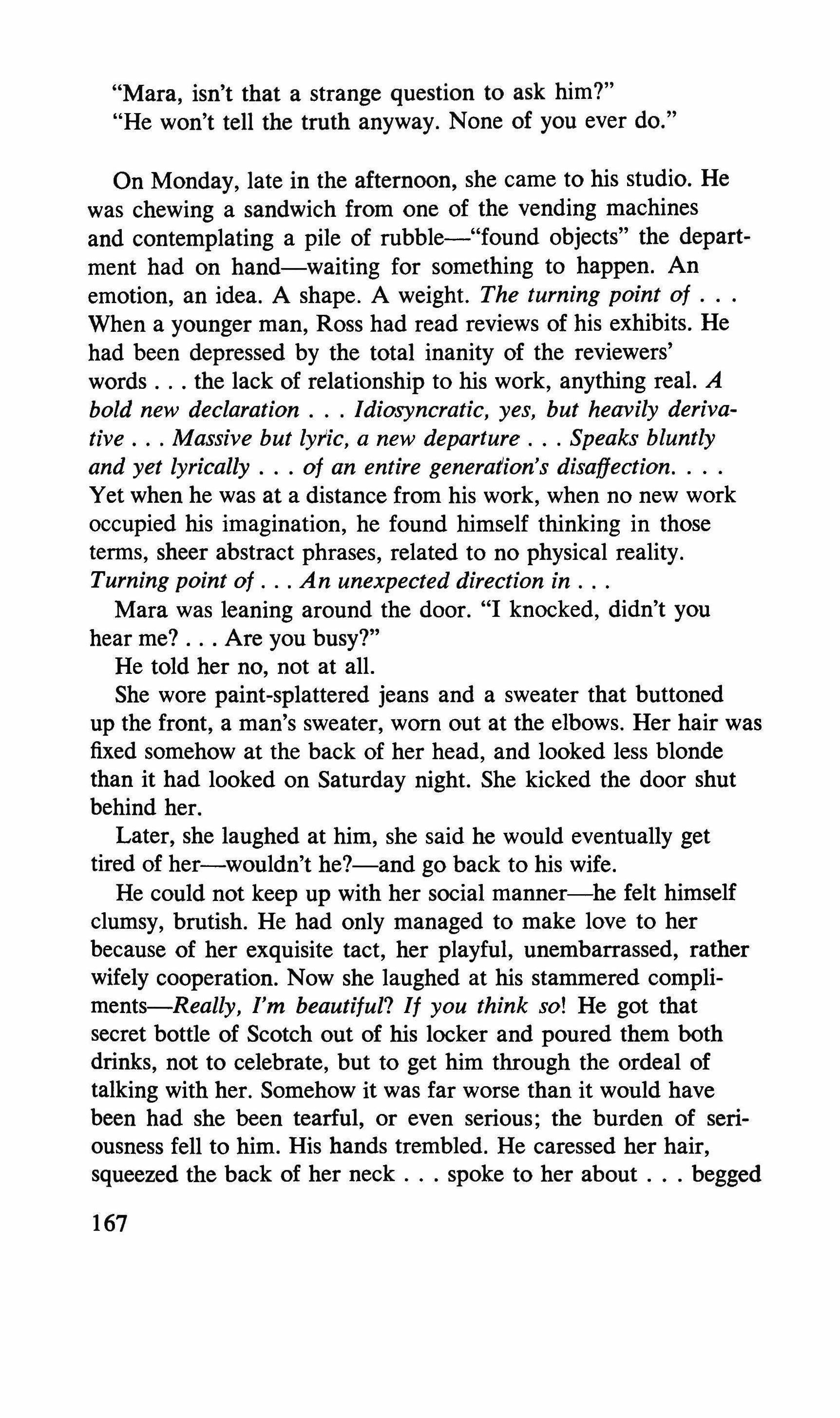
"Mara, isn't that a strange question to ask him?"
"He won't tell the truth anyway. None of you ever do."
On Monday, late in the afternoon, she came to his studio. He was chewing a sandwich from one of the vending machines and contemplating a pile of rubble-"found objects" the department had on hand-waiting for something to happen. An emotion, an idea. A shape. A weight. The turning point of When a younger man, Ross had read reviews of his exhibits. He had been depressed by the total inanity of the reviewers' words the lack of relationship to his work, anything real. A bold new declaration Idiosyncratic, yes, but heavily derivative Massive but lyric, a new departure Speaks bluntly and yet lyrically of an entire generation's disaffection. Yet when he was at a distance from his work, when no new work occupied his imagination, he found himself thinking in those terms, sheer abstract phrases, related to no physical reality. Turning point of An unexpected direction in Mara was leaning around the door. "I knocked, didn't you hear me? Are you busy?"
He told her no, not at all.
She wore paint-splattered jeans and a sweater that buttoned up the front, a man's sweater, worn out at the elbows. Her hair was fixed somehow at the back of her head, and looked less blonde than it had looked on Saturday night. She kicked the door shut behind her.
Later, she laughed at him, she said he would eventually get tired of her-wouldn't he?-and go back to his wife.
He could not keep up with her social manner-he felt himself clumsy, brutish. He had only managed to make love to her because of her exquisite tact, her playful, unembarrassed, rather wifely cooperation. Now she laughed at his stammered compliments-Really, I'm beautiful? If you think so! He got that secret bottle of Scotch out of his locker and poured them both drinks, not to celebrate, but to get him through the ordeal of talking with her. Somehow it was far worse than it would have been had she been tearful, or even serious; the burden of seriousness fell to him. His hands trembled. He caressed her hair, squeezed the back of her neck spoke to her about begged 167
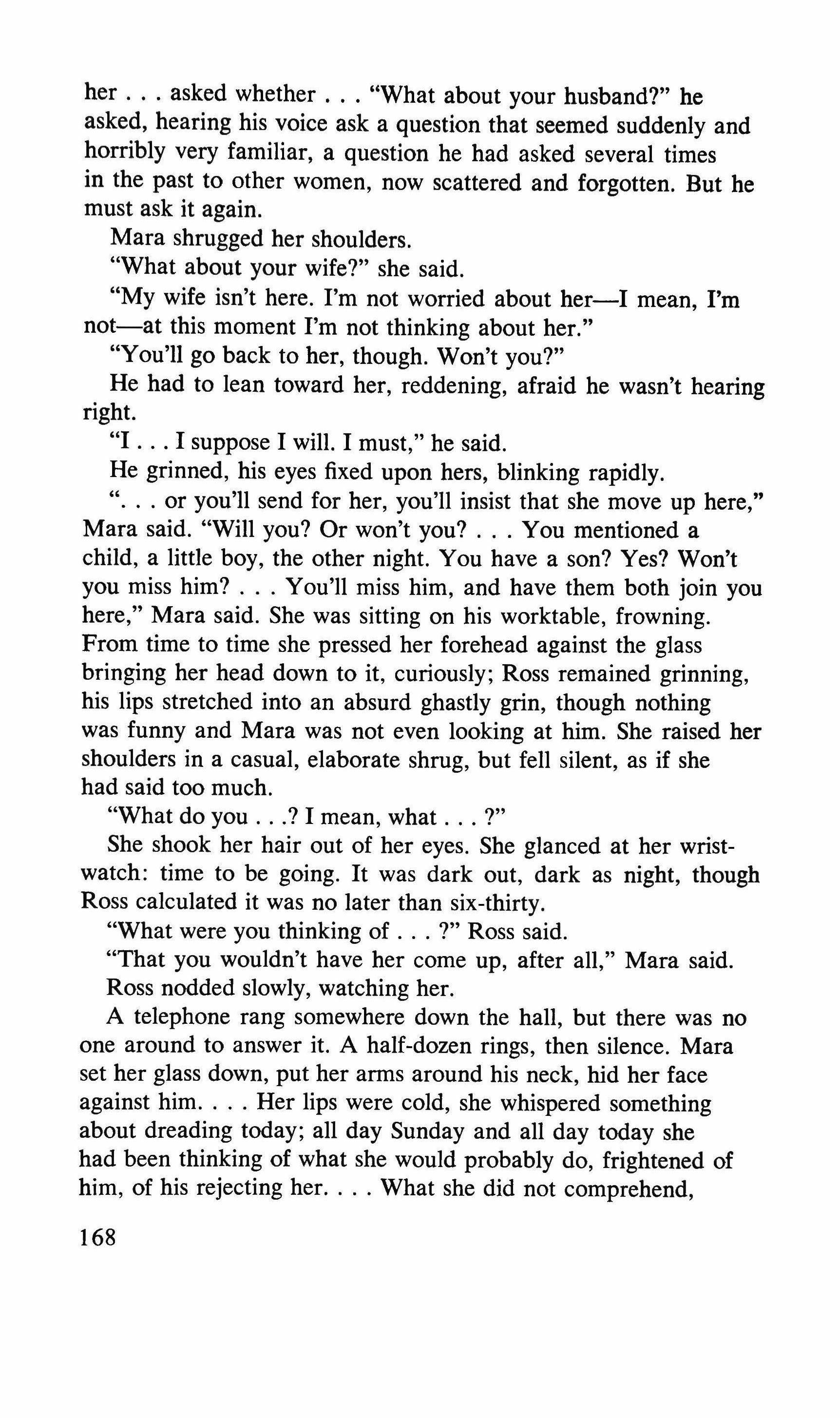
her asked whether "What about your husband?" he asked, hearing his voice ask a question that seemed suddenly and horribly very familiar, a question he had asked several times in the past to other women, now scattered and forgotten. But he must ask it again.
Mara shrugged her shoulders.
"What about your wife?" she said.
"My wife isn't here. I'm not worried about her-I mean, I'm not-at this moment I'm not thinking about her."
"You'll go back to her, though. Won't you?"
He had to lean toward her, reddening, afraid he wasn't hearing right.
"I I suppose I will. I must," he said.
He grinned, his eyes fixed upon hers, blinking rapidly. or you'll send for her, you'll insist that she move up here," Mara said. "Will you? Or won't you? You mentioned a child, a little boy, the other night. You have a son? Yes? Won't you miss him? You'll miss him, and have them both join you here," Mara said. She was sitting on his worktable, frowning. From time to time she pressed her forehead against the glass bringing her head down to it, curiously; Ross remained grinning, his lips stretched into an absurd ghastly grin, though nothing was funny and Mara was not even looking at him. She raised her shoulders in a casual, elaborate shrug, but fell silent, as if she had said too much.
"What do you ? I mean, what T"
She shook her hair out of her eyes. She glanced at her wristwatch: time to be going. It was dark out, dark as night, though Ross calculated it was no later than six-thirty.
"What were you thinking of ?" Ross said.
"That you wouldn't have her come up, after all," Mara said. Ross nodded slowly, watching her.
A telephone rang somewhere down the hall, but there was no one around to answer it. A half-dozen rings, then silence. Mara set her glass down, put her arms around his neck, hid her face against him Her lips were cold, she whispered something about dreading today; all day Sunday and all day today she had been thinking of what she would probably do, frightened of him, of his rejecting her. What she did not comprehend, 168
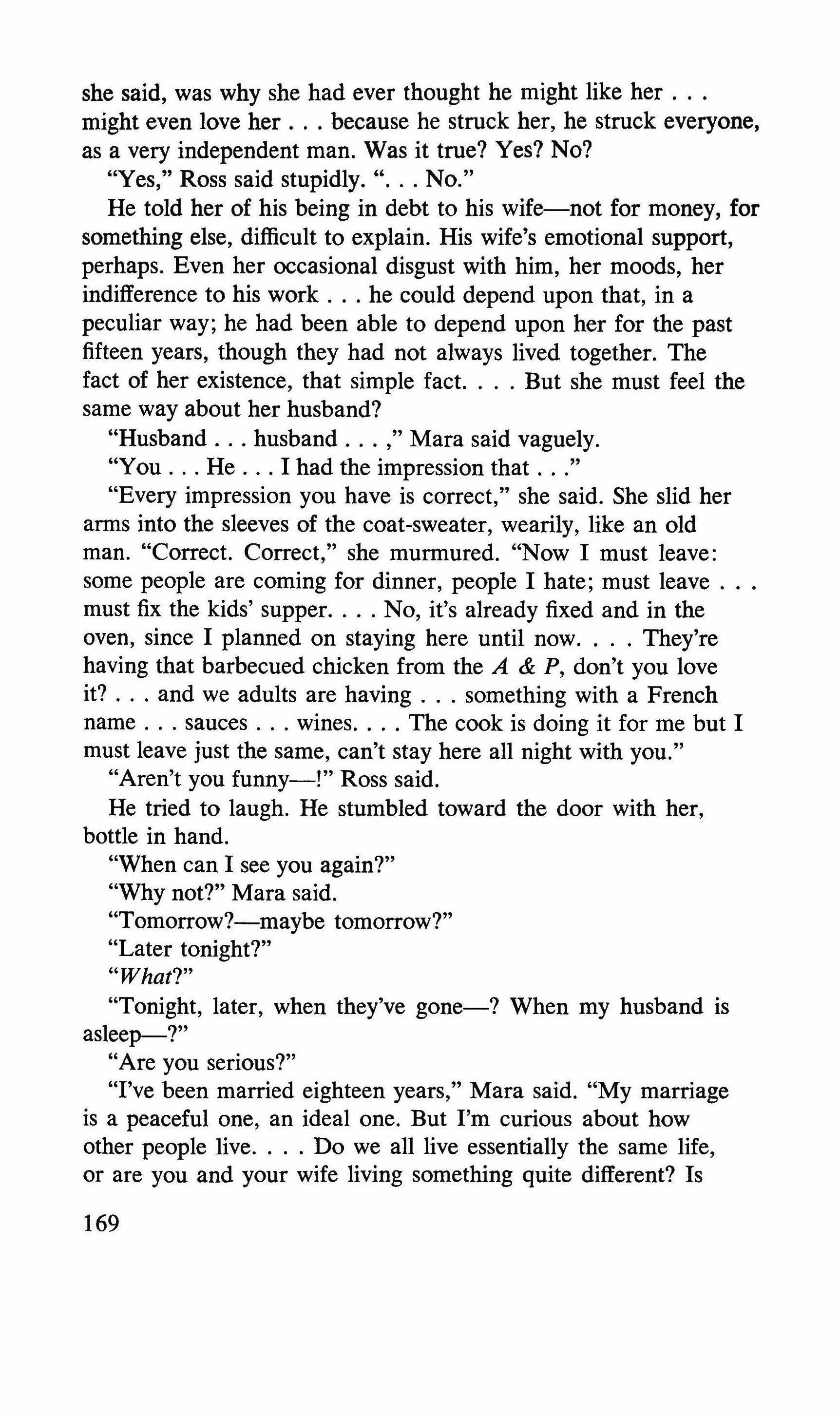
she said, was why she had ever thought he might like her might even love her because he struck her, he struck everyone, as a very independent man. Was it true? Yes? No?
"Yes," Ross said stupidly. No."
He told her of his being in debt to his wife-not for money, for something else, difficult to explain. His wife's emotional support, perhaps. Even her occasional disgust with him, her moods, her indifference to his work he could depend upon that, in a peculiar way; he had been able to depend upon her for the past fifteen years, though they had not always lived together. The fact of her existence, that simple fact. But she must feel the same way about her husband?
"Husband husband ," Mara said vaguely.
"You He I had the impression that ."
"Every impression you have is correct," she said. She slid her arms into the sleeves of the coat-sweater, wearily, like an old man. "Correct. Correct," she murmured. "Now I must leave: some people are coming for dinner, people I hate; must leave must fix the kids' supper. No, it's already fixed and in the oven, since I planned on staying here until now. They're having that barbecued chicken from the A & P, don't you love it? and we adults are having something with a French name sauces wines The cook is doing it for me but I must leave just the same, can't stay here all night with you."
"Aren't you funny-!" Ross said.
He tried to laugh. He stumbled toward the door with her, bottle in hand.
"When can I see you again?"
"Why not?" Mara said.
"Tomorrow?-maybe tomorrow?"
"Later tonight?"
"What?"
"Tonight, later, when they've gone-? When my husband is asleep-?"
"Are you serious?"
"I've been married eighteen years," Mara said. "My marriage is a peaceful one, an ideal one. But I'm curious about how other people live. Do we all live essentially the same life, or are you and your wife living something quite different? Is 169
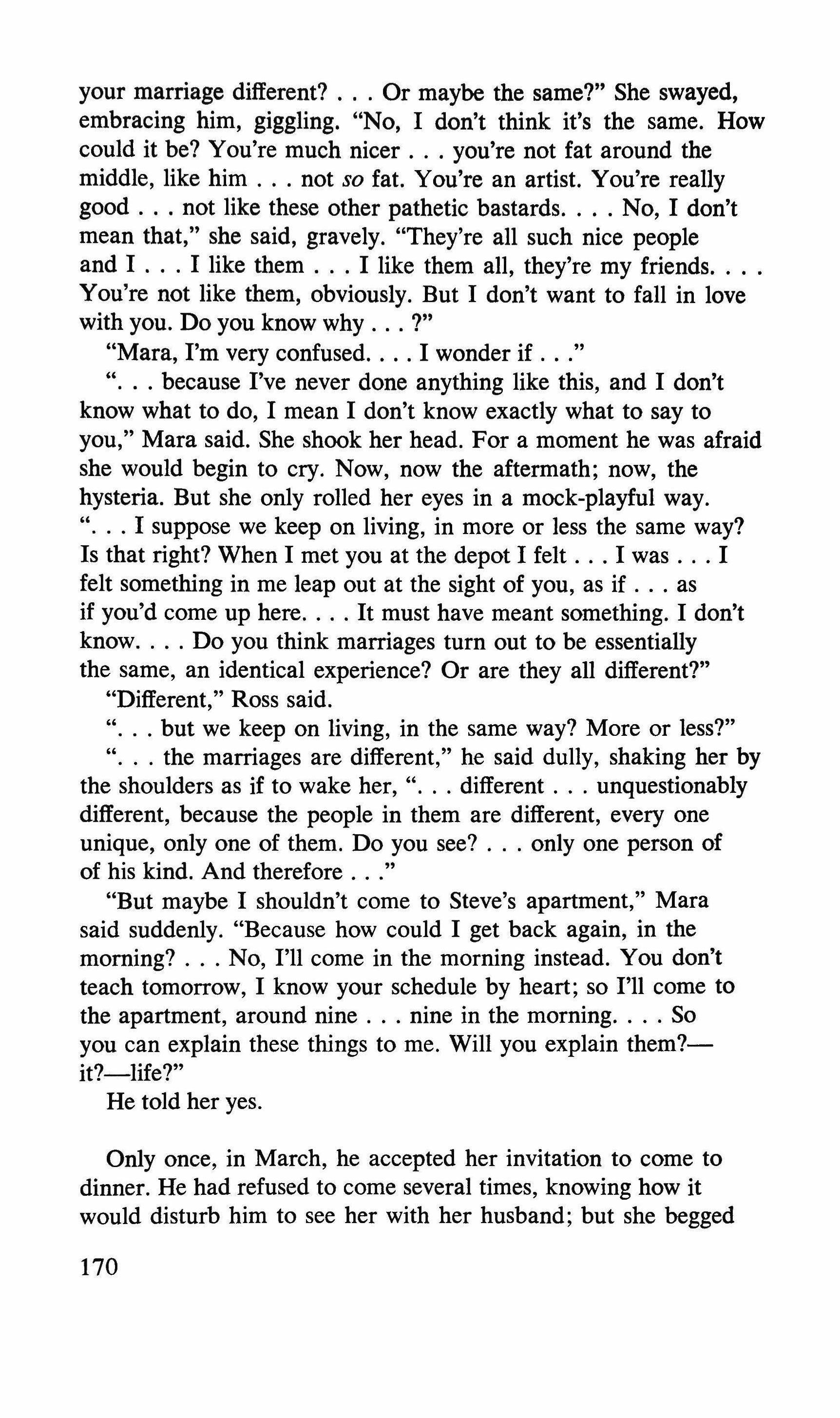
your marriage different? Or maybe the same?" She swayed, embracing him, giggling. "No, I don't think it's the same. How could it be? You're much nicer you're not fat around the middle, like him not so fat. You're an artist. You're really good not like these other pathetic bastards No, I don't mean that," she said, gravely. "They're all such nice people and I I like them I like them all, they're my friends. You're not like them, obviously. But I don't want to fall in love with you. Do you know why ?"
"Mara, I'm very confused. I wonder if ." ". because I've never done anything like this, and I don't know what to do, I mean I don't know exactly what to say to you," Mara said. She shook her head. For a moment he was afraid she would begin to cry. Now, now the aftermath; now, the hysteria. But she only rolled her eyes in a mock-playful way. I suppose we keep on living, in more or less the same way? Is that right? When I met you at the depot I felt I was I felt something in me leap out at the sight of you, as if as if you'd come up here It must have meant something. I don't know. Do you think marriages turn out to be essentially the same, an identical experience? Or are they all different?" "Different," Ross said.
but we keep on living, in the same way? More or less?" the marriages are different," he said dully, shaking her by the shoulders as if to wake her, " different unquestionably different, because the people in them are different, every one unique, only one of them. Do you see? only one person of of his kind. And therefore ."
"But maybe I shouldn't come to Steve's apartment," Mara said suddenly. "Because how could I get back again, in the morning? No, I'll come in the morning instead. You don't teach tomorrow, I know your schedule by heart; so I'll come to the apartment, around nine nine in the morning So you can explain these things to me. Will you explain them?it?-life?"
He told her yes.
Only once, in March, he accepted her invitation to come to dinner. He had refused to come several times, knowing how it would disturb him to see her with her husband; but she begged

him, she insisted. What would her husband say?-she asked nervously. He would wonder why Ross kept turning them down. Ross was an important member of the faculty, she told him, though he didn't seem to value himself as highly as he mighthe was a genius, after all, wasn't he?-and out of place here in this contemptible little college? Certainly he thought himself superior to everyone, didn't he? And that was why he refused to come to her home?
"Mara, that isn't the reason," he said miserably. "You know it isn't."
So he gave in.
The Reinhardts owned a large colonial house, a half-mile from campus, at the top of a steep hill. The sidewalk was so icy that Ross had to walk in the snow; he feared slipping and cracking his skull. Love, love. Mistress. Husband-wife. He muttered under his breath, not knowing what he was saying. Divorce. Settlement. Alimony. Marriage Love. The Reinhardts' house had a slate roof which sloped sharply, so that snow could not pile up on it. It reminded Ross of childhood fairy tales or bad dreams: the Alps, Hansel and Gretel, and wolves that devoured children, snowy wastes in which children wandered, hopelessly lost. Dean Reinhardt himself greeted Ross at the door. He shook hands warmly, his breath smelling of cashews and whiskey. Ross could hear someone laughing, wondered if he was late and people were already a little drunk, therefore cheerful and relaxed, not anxious as he was. The dean's left eyelid seemed to droop slightly, as if he were about to wink at Ross. 1 know. 1 know what's going on But he was very gracious to Ross, very friendly. Guests were standing around a big field-stone fireplace. Birch logs were blazing; an elegant scene, but domestic as well Mara and her two children the boy about nine years old, the girl about thirteen, helping pass hors d'oeuvres around Mara stared at him, greedily. She pulled him over to meet her children. Timmy. Hannah. isn't she pretty? She's a tomboy but she's very sweet," Mara said of her daughter. The girl resembled her-tall, slender, blonde, with a shyly flirtatious grin that disturbed Ross. But she was thinner than her mother, watery-boned, decades younger. Did they all know? Ross wondered. Both children shook his hand.
After the first several minutes, he knew it had been a mistake to

come. Mara had little time for him-she greeted newly arrived guests with the same enthusiasm she had shown him, kissing cheeks, shaking hands, gliding around as if nothing gave her so much pleasure as being a hostess. Her hair looked professionally styled: curls falling lightly in front of her ears, wisps and tendrils on her exposed throat. She wore a long pink dress, pearlish-pink, a row of tiny pink buttons down the front, from the collar to the hem dizzying, those buttons. Each was covered in a satin-like material just one shade, one subtle shade, darker than the material of the dress itself. He stared at her, unhappy trapped in the cross fire of a conversation he couldn't follow, someone mumbling about snow-removal service, someone countering with tax hikes while Ross watched her, his mistress, wondering if she sensed his bitterness.
So she lived here; she owned this. Long, low sofas glasstopped tables small bronze pieces of dancers, deer, swans, exactly the kind of thing Ross despised framed lithographs on one wall, the usual Chagall and what looked, from where Ross stood, to be a Picasso a small original Monet above the fireplace and a legitimate Andrew Wyeth in a prominent position, so that Ross could stare at it as he softened into a twilight state of drunkenness. A winter sky. A field of grasses. Geese. A contorted tree. Rocks, a few pebbles. Ross stared at the painting and saw it shift subtly, horribly, into something he had never quite guessed in Wyeth: a mad, relentless, egoless, godly fanaticism that was terrible to gaze upon.
He much preferred his own abstract shapes. They did not terrify, somehow.
At first he was exhilarated when they went in to dinner: Mara had placed him on her right, as the guest of honor. But he hadn't much appetite. He drank steadily, never refusing an offer of more wine, jealous of her attention to the others and the playful mechanical banter back and forth between her and her husband. Losing track of the conversation, Ross ended up staring at Mara sullenly, silently. What of it? There were a dozen people at the table, most of them administrators at the college, one of them the chairman of the art department, another an old sleek gentleman introduced as someone "on the Board." If they thought he was rude or drunk or unsociable, he did not care. He sensed that he might be allowed a great deal of peculiar
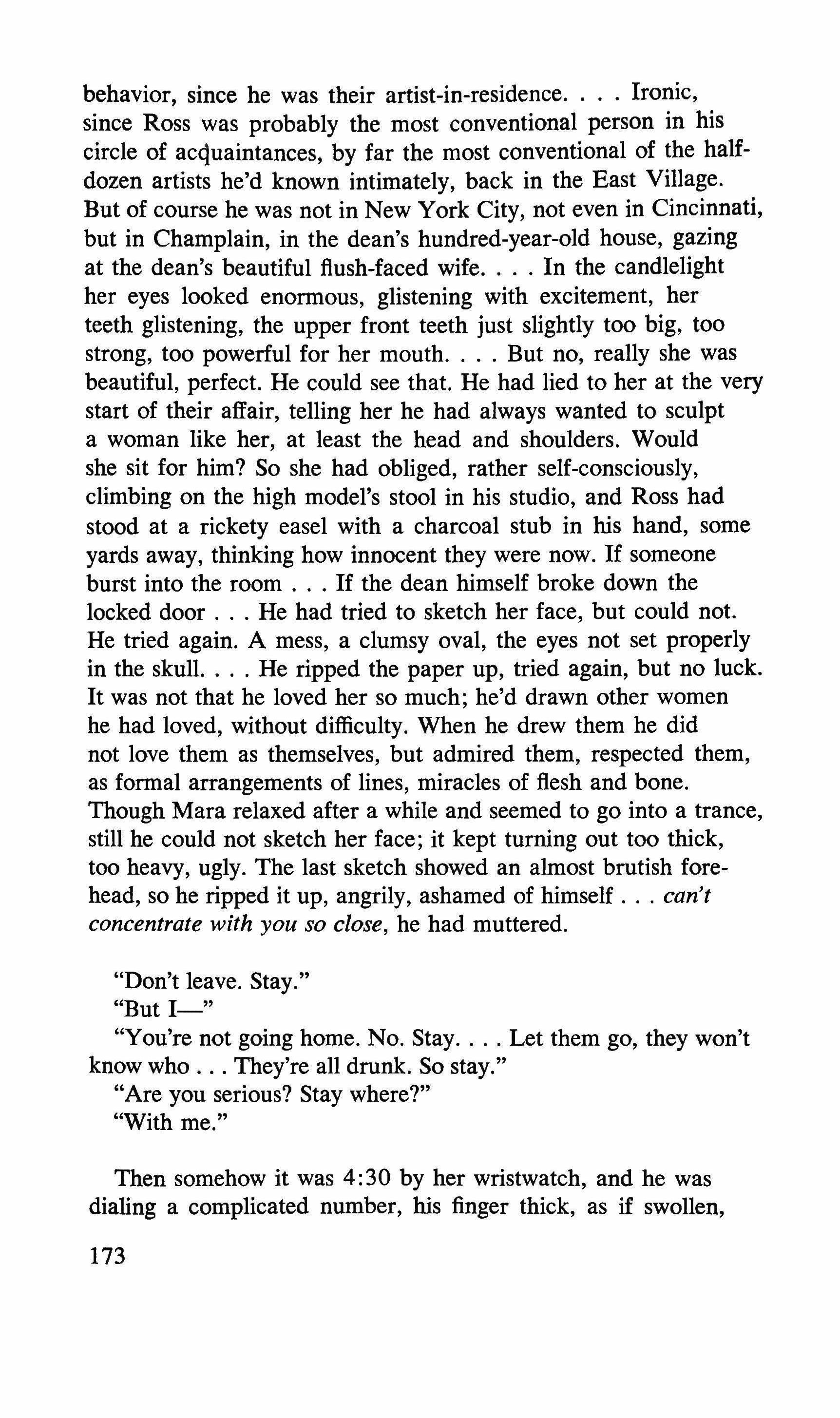
behavior, since he was their artist-in-residence Ironic, since Ross was probably the most conventional person in his circle of acquaintances, by far the most conventional of the halfdozen artists he'd known intimately, back in the East Village. But of course he was not in New York City, not even in Cincinnati, but in Champlain, in the dean's hundred-year-old house, gazing at the dean's beautiful flush-faced wife. In the candlelight her eyes looked enormous, glistening with excitement, her teeth glistening, the upper front teeth just slightly too big, too strong, too powerful for her mouth. But no, really she was beautiful, perfect. He could see that. He had lied to her at the very start of their affair, telling her he had always wanted to sculpt a woman like her, at least the head and shoulders. Would she sit for him? So she had obliged, rather self-consciously, climbing on the high model's stool in his studio, and Ross had stood at a rickety easel with a charcoal stub in his hand, some yards away, thinking how innocent they were now. If someone burst into the room If the dean himself broke down the locked door He had tried to sketch her face, but could not. He tried again. A mess, a clumsy oval, the eyes not set properly in the skull. He ripped the paper up, tried again, but no luck. It was not that he loved her so much; he'd drawn other women he had loved, without difficulty. When he drew them he did not love them as themselves, but admired them, respected them, as formal arrangements of lines, miracles of flesh and bone. Though Mara relaxed after a while and seemed to go into a trance, still he could not sketch her face; it kept turning out too thick, too heavy, ugly. The last sketch showed an almost brutish forehead, so he ripped it up, angrily, ashamed of himself can't concentrate with you so close, he had muttered.
"Don't leave. Stay."
"But 1-"
"You're not going home. No. Stay Let them go, they won't know who They're all drunk. So stay."
"Are you serious? Stay where?"
"With me."
Then somehow it was 4: 30 by her wristwatch, and he was dialing a complicated number, his finger thick, as if swollen, 173
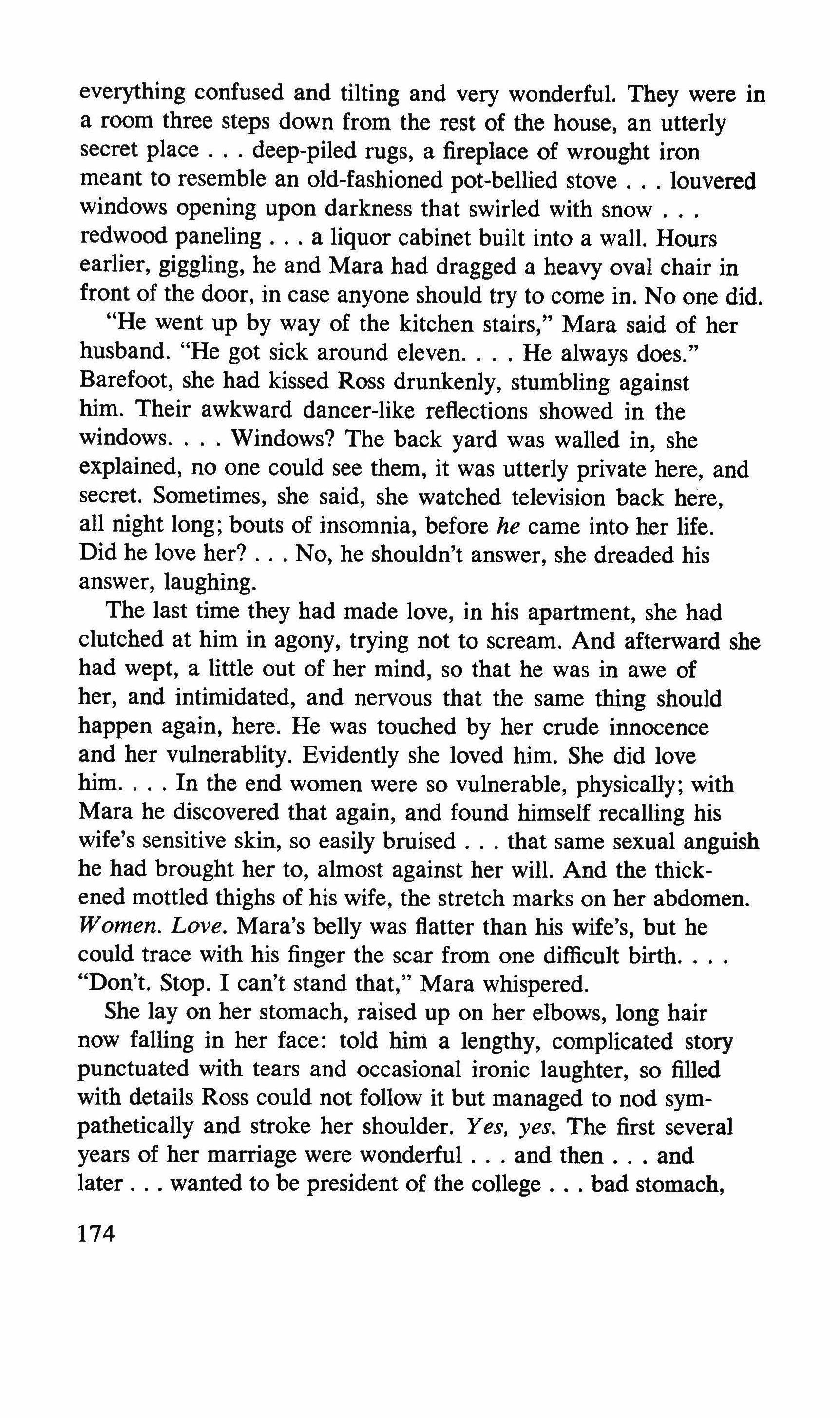
everything confused and tilting and very wonderful. They were in a room three steps down from the rest of the house, an utterly secret place deep-piled rugs, a fireplace of wrought iron meant to resemble an old-fashioned pot-bellied stove louvered windows opening upon darkness that swirled with snow redwood paneling a liquor cabinet built into a wall. Hours earlier, giggling, he and Mara had dragged a heavy oval chair in front of the door, in case anyone should try to come in. No one did. "He went up by way of the kitchen stairs," Mara said of her husband. "He got sick around eleven He always does." Barefoot, she had kissed Ross drunkenly, stumbling against him. Their awkward dancer-like reflections showed in the windows. Windows? The back yard was walled in, she explained, no one could see them, it was utterly private here, and secret. Sometimes, she said, she watched television back here, all night long; bouts of insomnia, before he came into her life. Did he love her? No, he shouldn't answer, she dreaded his answer, laughing.
The last time they had made love, in his apartment, she had clutched at him in agony, trying not to scream. And afterward she had wept, a little out of her mind, so that he was in awe of her, and intimidated, and nervous that the same thing should happen again, here. He was touched by her crude innocence and her vulnerablity. Evidently she loved him. She did love him In the end women were so vulnerable, physically; with Mara he discovered that again, and found himself recalling his wife's sensitive skin, so easily bruised that same sexual anguish he had brought her to, almost against her will. And the thickened mottled thighs of his wife, the stretch marks on her abdomen. Women. Love. Mara's belly was flatter than his wife's, but he could trace with his finger the scar from one difficult birth. "Don't. Stop. I can't stand that," Mara whispered.
She lay on her stomach, raised up on her elbows, long hair now falling in her face: told him a lengthy, complicated story punctuated with tears and occasional ironic laughter, so filled with details Ross could not follow it but managed to nod sympathetically and stroke her shoulder. Yes, yes. The first several years of her marriage were wonderful and then and later wanted to be president of the college bad stomach, 174
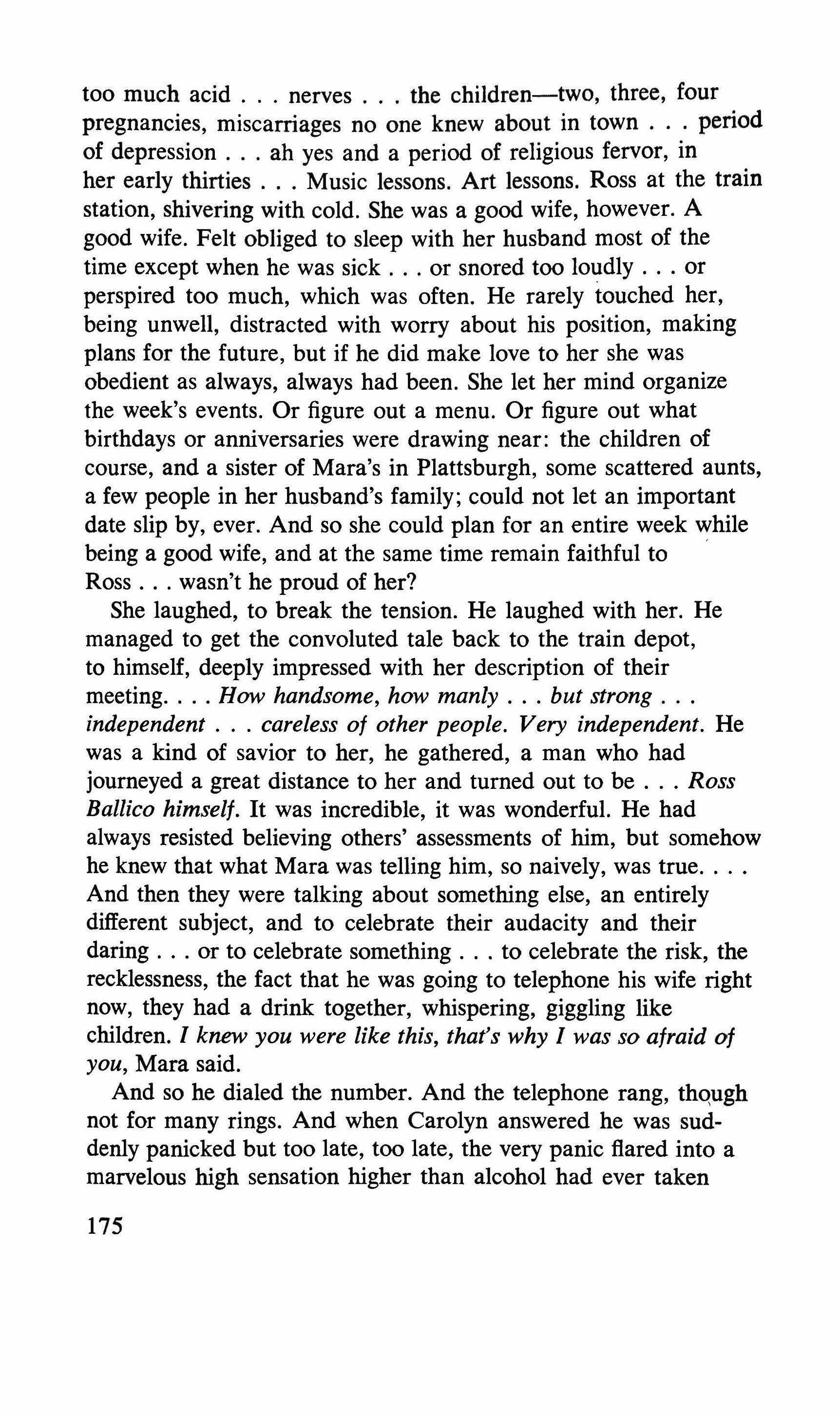
too much acid nerves the children-two, three, four pregnancies, miscarriages no one knew about in town period of depression ah yes and a period of religious fervor, in her early thirties Music lessons. Art lessons. Ross at the train station, shivering with cold. She was a good wife, however. A good wife. Felt obliged to sleep with her husband most of the time except when he was sick or snored too loudly or perspired too much, which was often. He rarely touched her, being unwell, distracted with worry about his position, making plans for the future, but if he did make love to her she was obedient as always, always had been. She let her mind organize the week's events. Or figure out a menu. Or figure out what birthdays or anniversaries were drawing near: the children of course, and a sister of Mara's in Plattsburgh, some scattered aunts, a few people in her husband's family; could not let an important date slip by, ever. And so she could plan for an entire week while being a good wife, and at the same time remain faithful to Ross wasn't he proud of her?
She laughed, to break the tension. He laughed with her. He managed to get the convoluted tale back to the train depot, to himself, deeply impressed with her description of their meeting How handsome, how manly but strong independent careless of other people. Very independent. He was a kind of savior to her, he gathered, a man who had journeyed a great distance to her and turned out to be Ross Ballico himself. It was incredible, it was wonderful. He had always resisted believing others' assessments of him, but somehow he knew that what Mara was telling him, so naively, was true And then they were talking about something else, an entirely different subject, and to celebrate their audacity and their daring or to celebrate something to celebrate the risk, the recklessness, the fact that he was going to telephone his wife right now, they had a drink together, whispering, giggling like children. 1 knew you were like this, that's why 1 was so afraid of you, Mara said.
And so he dialed the number. And the telephone rang, though not for many rings. And when Carolyn answered he was suddenly panicked but too late, too late, the very panic flared into a marvelous high sensation higher than alcohol had ever taken 175
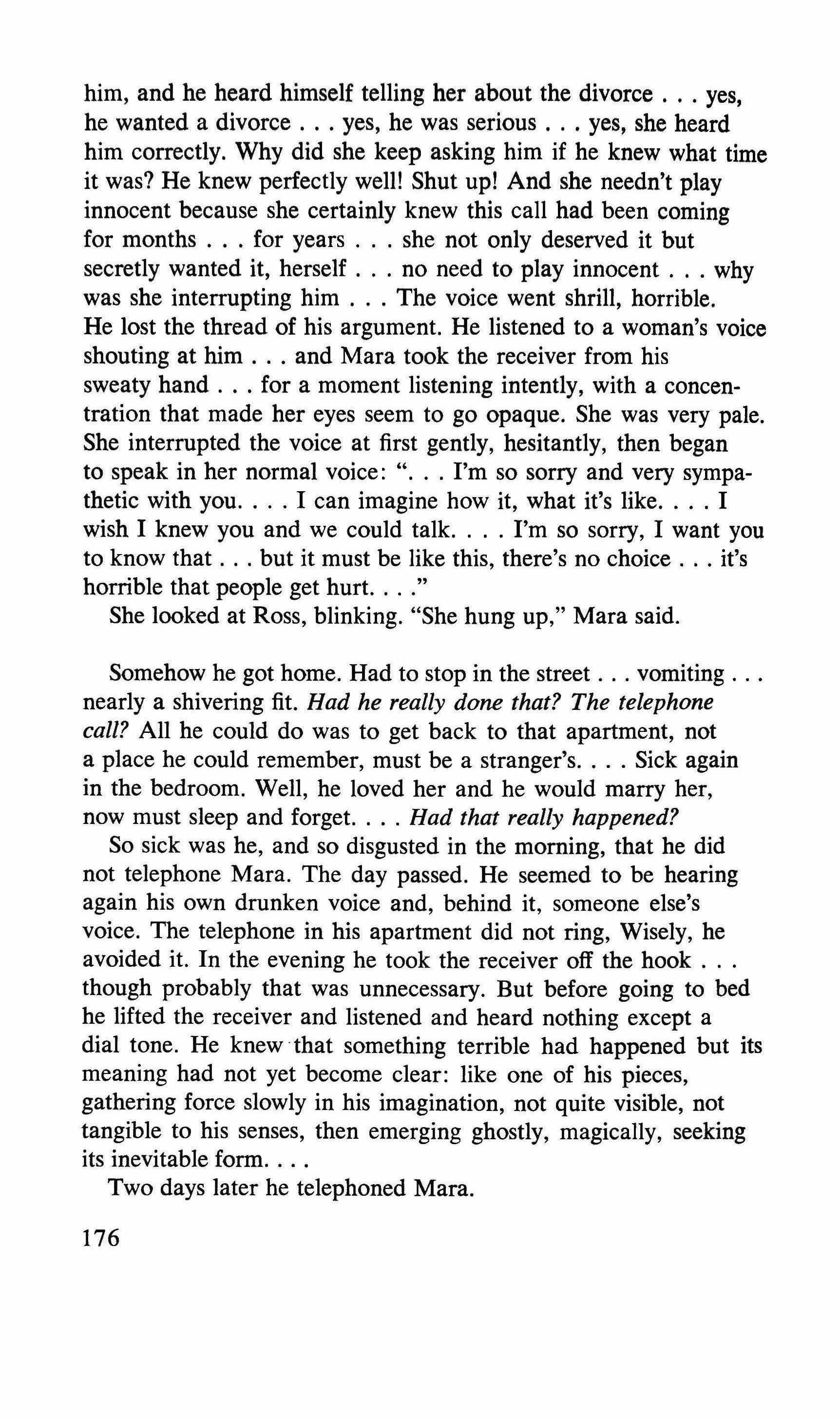
him, and he heard himself telling her about the divorce yes, he wanted a divorce yes, he was serious yes, she heard him correctly. Why did she keep asking him if he knew what time it was? He knew perfectly well! Shut up! And she needn't play innocent because she certainly knew this call had been coming for months for years she not only deserved it but secretly wanted it, herself no need to play innocent why was she interrupting him The voice went shrill, horrible. He lost the thread of his argument. He listened to a woman's voice shouting at him and Mara took the receiver from his sweaty hand for a moment listening intently, with a concentration that made her eyes seem to go opaque. She was very pale. She interrupted the voice at first gently, hesitantly, then began to speak in her normal voice: ". I'm so sorry and very sympathetic with you I can imagine how it, what it's like. I wish I knew you and we could talk I'm so sorry, I want you to know that but it must be like this, there's no choice it's horrible that people get hurt
She looked at Ross, blinking. "She hung up," Mara said.
Somehow he got home. Had to stop in the street vomiting nearly a shivering fit. Had he really done that? The telephone call? All he could do was to get back to that apartment, not a place he could remember, must be a stranger's Sick again in the bedroom. Well, he loved her and he would marry her, now must sleep and forget Had that really happened?
So sick was he, and so disgusted in the morning, that he did not telephone Mara. The day passed. He seemed to be hearing again his own drunken voice and, behind it, someone else's voice. The telephone in his apartment did not ring, Wisely, he avoided it. In the evening he took the receiver off the hook though probably that was unnecessary. But before going to bed he lifted the receiver and listened and heard nothing except a dial tone. He knew' that something terrible had happened but its meaning had not yet become clear: like one of his pieces, gathering force slowly in his imagination, not quite visible, not tangible to his senses, then emerging ghostly, magically, seeking its inevitable form
Two days later he telephoned Mara.
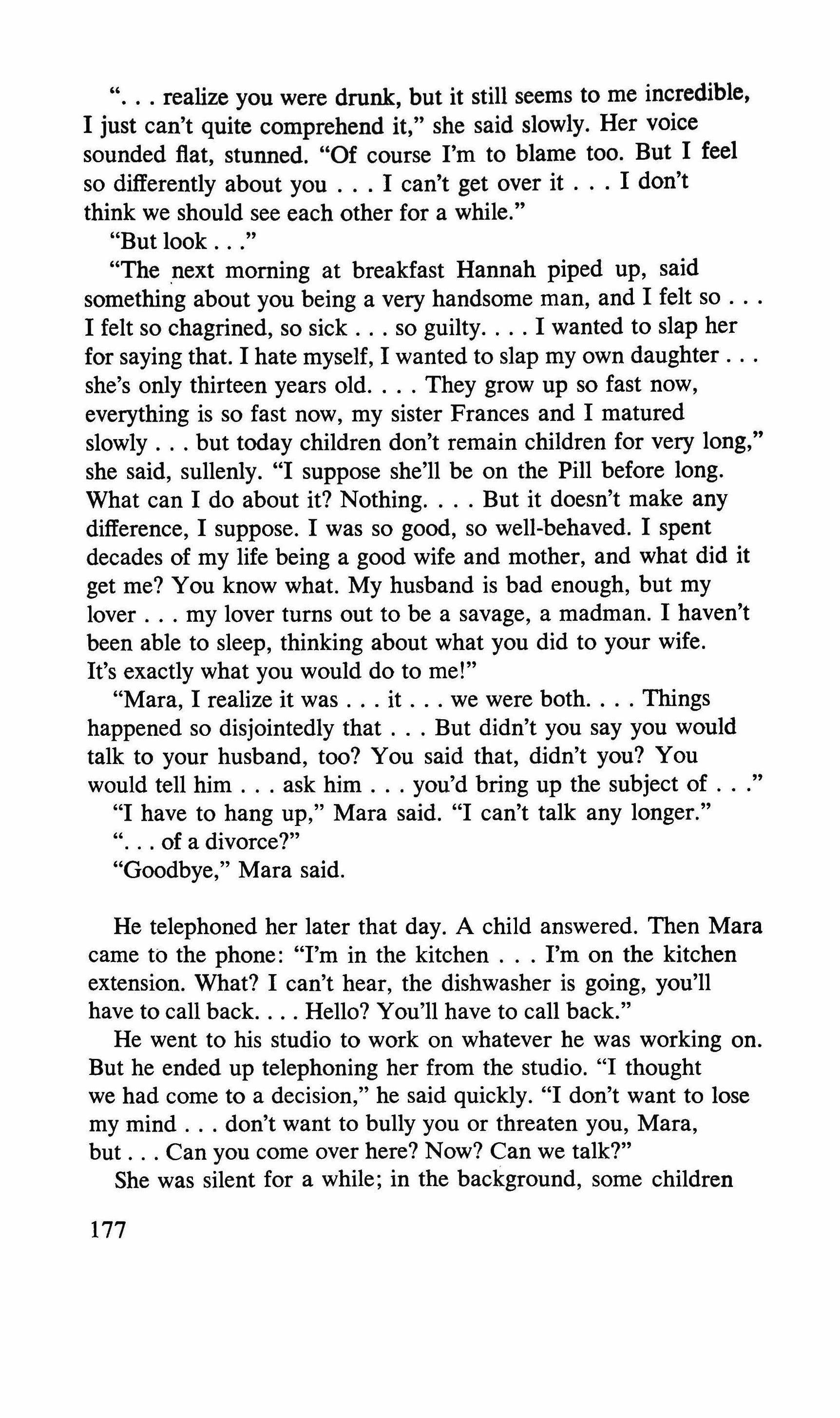
realize you were drunk, but it still seems to me incredible, I just can't quite comprehend it," she said slowly. Her voice sounded flat, stunned. "Of course I'm to blame too. But I feel so differently about you I can't get over it I don't think we should see each other for a while."
"But look
"The next morning at breakfast Hannah piped up, said something about you being a very handsome man, and I felt so I felt so chagrined, so sick so guilty I wanted to slap her for saying that. I hate myself, I wanted to slap my own daughter she's only thirteen years old They grow up so fast now, everything is so fast now, my sister Frances and I matured slowly but today children don't remain children for very long," she said, sullenly. "I suppose she'll be on the Pill before long. What can I do about it? Nothing But it doesn't make any difference, I suppose. I was so good, so well-behaved. I spent decades of my life being a good wife and mother, and what did it get me? You know what. My husband is bad enough, but my lover my lover turns out to be a savage, a madman. I haven't been able to sleep, thinking about what you did to your wife. It's exactly what you would do to me!"
"Mara, I realize it was it we were both Things happened so disjointedly that But didn't you say you would talk to your husband, too? You said that, didn't you? You would tell him ask him you'd bring up the subject of "I have to hang up," Mara said. "I can't talk any longer." of a divorce?"
"Goodbye," Mara said.
He telephoned her later that day. A child answered. Then Mara came to the phone: "I'm in the kitchen I'm on the kitchen extension. What? I can't hear, the dishwasher is going, you'll have to call back Hello? You'll have to call back."
He went to his studio to work on whatever he was working on. But he ended up telephoning her from the studio. "I thought we had come to a decision," he said quickly. "I don't want to lose my mind don't want to bully you or threaten you, Mara, but Can you come over here? Now? Can we talk?"
She was silent for a while; in the background, some children 177

were giggling. But I thought you were teasing," she said. "All along."
"Teasing what? How?"
"I thought you were just joking. That business about getting a divorce marrying me It must have been the tone of your voice, you gave me the impression of being ironic. And you were serious?"
"Mara, what are you doing?"
"You mean all along you were serious?"
"Should I come over there? I'll come over there."
"No. Don't. I wouldn't recommend it." She put her hand over the receiver; he heard her say to someone, It's a salesman. Then she said to Ross: "I must hang up, but I'll call you tomorrow. I do want to talk to you. I'll call you tomorrow or Thursday, all right?"
"Mara-"
"Yes, fine."
She forgave him a week later. She picked him up after school and drove out into the foothills, along the twisting roads, snowbanks now receded to a few inches on each side glancing at him nervously. He said very little. He had not quite wakened up that morning, though there was nothing wrong with him. Mara was bare-headed-she said it wasn't very cold that day-and wore a coat he had never seen before, curly white fur, perhaps lamb fur. It was very short, almost as short as a jacket. She was nervous or seemed to be so. the shock of it, the realization of what we did," she was saying, "it terrified me. And you: the way you spoke to her. I can't forget it. But I don't suppose you've called back, have you? You're not that weak."
"No, I didn't call back," Ross said. "Did you want me to?" if it's a question of money
"What is?"
"A settlement. Alimony. Child support." He stared at her, bleary-eyed. He was not well. Still, there was nothing wrong with him. Mara drove slowly and cautiously. Behind her, in the distance, were timber-laden hills and mountains and a filmy gray-blue sky. Ross had the idea that winter was concluded. But there was snow, still. Mara began to cry,
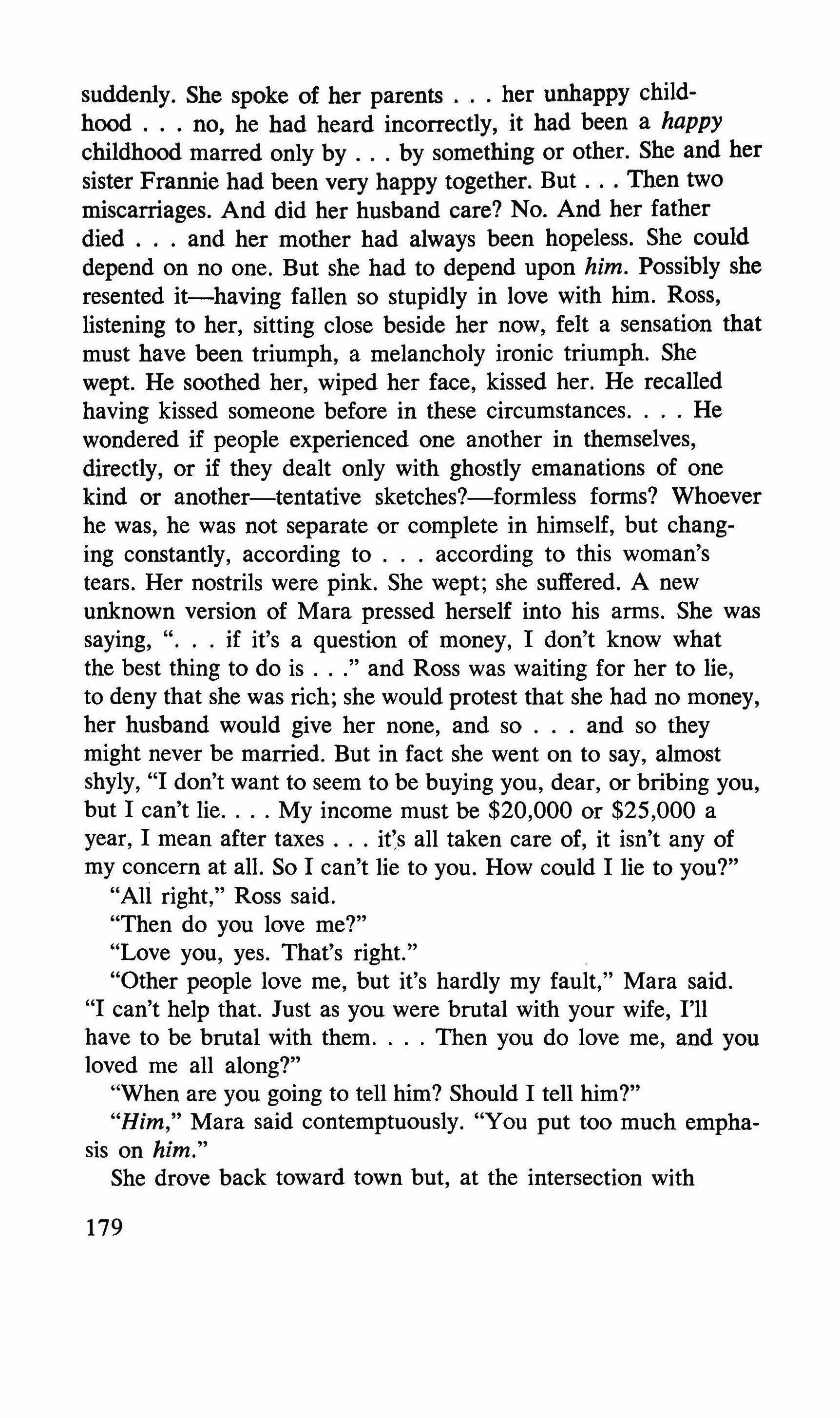
suddenly. She spoke of her parents her unhappy childhood no, he had heard incorrectly, it had been a happy childhood marred only by by something or other. She and her sister Frannie had been very happy together. But Then two miscarriages. And did her husband care? No. And her father died and her mother had always been hopeless. She could depend on no one. But she had to depend upon him. Possibly she resented it-having fallen so stupidly in love with him. Ross, listening to her, sitting close beside her now, felt a sensation that must have been triumph, a melancholy ironic triumph. She wept. He soothed her, wiped her face, kissed her. He recalled having kissed someone before in these circumstances. He wondered if people experienced one another in themselves, directly, or if they dealt only with ghostly emanations of one kind or another-tentative sketches?-formless forms? Whoever he was, he was not separate or complete in himself, but changing constantly, according to according to this woman's tears. Her nostrils were pink. She wept; she suffered. A new unknown version of Mara pressed herself into his arms. She was saying, " if it's a question of money, 1 don't know what the best thing to do is ." and Ross was waiting for her to lie, to deny that she was rich; she would protest that she had no money, her husband would give her none, and so and so they might never be married. But in fact she went on to say, almost shyly, "I don't want to seem to be buying you, dear, or bribing you, but 1 can't lie My income must be $20,000 or $25,000 a year, 1 mean after taxes it's all taken care of, it isn't any of my concern at all. So 1 can't lie to you. How could 1 lie to you?"
"All right," Ross said.
"Then do you love me?"
"Love you, yes. That's right."
"Other people love me, but it's hardly my fault," Mara said. "I can't help that. Just as you were brutal with your wife, I'll have to be brutal with them. Then you do love me, and you loved me all along?"
"When are you going to tell him? Should 1 tell him?"
"Him," Mara said contemptuously. "You put too much emphasis on him."
She drove back toward town but, at the intersection with 179

Highway 87, turned north for Plattsburgh instead. She wanted him to meet her sister Frances. Had he time to meet her sister Frances?
"All right," Ross said.
"I'd like the two of you to meet," Mara said, glancing at him. She smiled. "My husband and she dislike each other. But you might be different. Yes, I think you might be different."
Ross stroked the arm inside that curly sleeve, squeezed the hand inside that black leather glove. "Yes, I'm different," he said hollowly.
"You get angry, but you have every right," she said. "Not like other men."
"Is that so?" Ross said. "Thank you."
"Why thank me?" Mara laughed.
In the foyer there were stained-glass windows; the slate floor was deathly cold. A broad staircase. An Oriental carpet covering the stairs, some of the carpet tacks loose but nothing to worry about, Ross didn't trip. The nurse preceded them, chatting with Mara about local news, You probably heard, that wonderful Mrs. Landry died ninety-nine years old isn't it a pity, the governor himself planned a birthday celebration if Three months short. Mara asked about her sister: Oh just fine. Really fine. That chest cold ? All over with, weeks ago. Mara tugged at Ross's arm. "That's a relief," she said. "I'd hate to have you catch a cold from her."
The sister evidently lived in a small suite. Ross entered, timid in his shabby overcoat, hands in his pockets. Afraid. But why afraid? Oh afraid, afraid. Mara was chattering gaily. Mara dragged him forward, showing him off. The sister was propped up in bed, staring toward them. Ross felt his own gaze swing onto her, like a weight. He stepped forward slowly while Mara introduced them back and forth, with a childlike gaiety, FrancesRoss, Ross-Frances, say hello, can't you say hello? Ross saw at once that she was Mara's sister. He saw that at once. But deformed. Not deformed, exactly. Thick-bodied, squat in the torso and even in the face squat in the head. Squat-headed. Ross wanted to laugh, that adjective was so unusuaL And the bare arms, protruding so muscularly from the nightgown: the downy hairs, thick brown hairs, on the forearms so thick as to

seem almost like fur Frances managed to say hello. And smiled. Her upper lip was dark with that down. Her eyes were like Mara's, a plain staring blue, but almost lost in the doughy plump ridges of her cheeks.
Ross wanted to laugh, to see Mara squat-headed, and her hair so greasy-blonde and ugly. It was most unusual; she had always been a beautiful woman.
"Come closer. Shake hands with her. Are you afraid? Don't be," Mara whispered.
He approached the bed. The sister grinned, but something in his face must have frightened her. Her smile halted. Ross backed away, laughing softly-I'm sorry but I think I think I must be leaving Don't feel well. Out loud he stammered something about needing fresh air. Was there a men's room anywhere? Fresh air, a lavatory, anything. He'd meet her out in the car.
Mara said sharply, "Ross, come back. Ross, wait There are tea things here, I'll make us tea. She has cookies. We'll have tea and cookies together and you can become acquainted. Where are you going?"
"I'll wait for you outside," he said.
He tried not to look past her, at the creature in the bed.
Mara smiled angrily at him. "Why, what's wrong? Why? Why did you come with me, then, if you're such a coward? You're going to hurt her feelings! Stop. Wait. Do you know what you're doing?" She went to her sister. She leaned over the bed as if to sit down, though she did not sit down. She slid her arm around her sister's shoulders and brought her face closer to her sister's face. Slyly, sweetly, she smiled at Ross. He was some yards away but not quite far enough away. He would have to make a run for the door. "If you leave, that will be the end," Mara said. "I can't bear it, a lover who is such a bastard. Don't you think she's beautiful? I think she's beautiful. I think so Or don't you love me, now? Have you changed your mind again?"
Ross backed away. He bumped into something. The sister whimpered, made a noise of some kind. Ross pressed both hands against his face so that he would not shout N01 at them both.
"No, you don't love me," Mara cried. "Aren't you a bastard, -though's=-to betray me? You'd betray anyone, any woman at all-" He left the two of them there, and stumbled back downstairs.
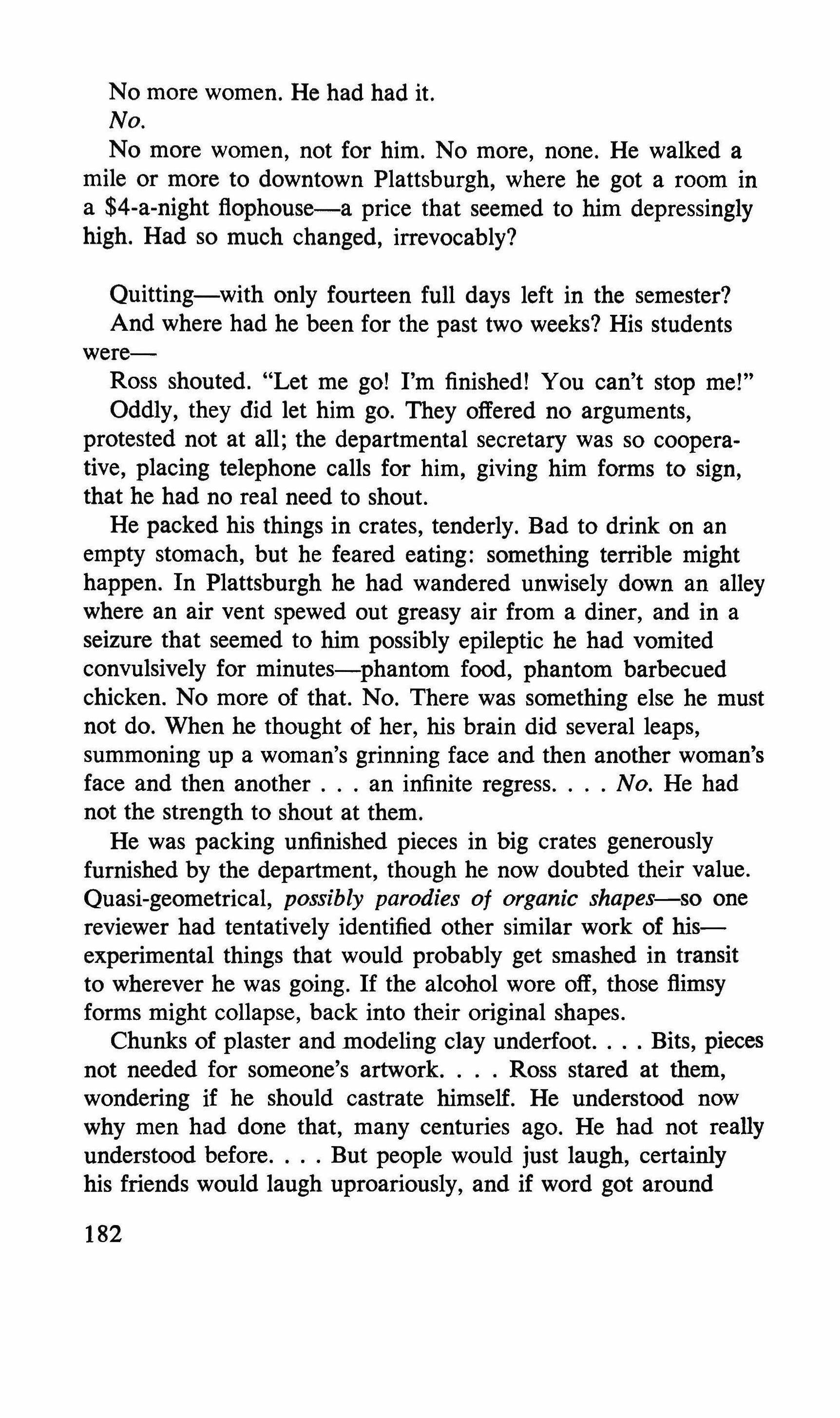
No more women. He had had it. No.
No more women, not for him. No more, none. He walked a mile or more to downtown Plattsburgh, where he got a room in a $4-a-night flophouse-a price that seemed to him depressingly high. Had so much changed, irrevocably?
Quitting-with only fourteen full days left in the semester? And where had he been for the past two weeks? His students were-
Ross shouted. "Let me go! I'm finished! You can't stop me!"
Oddly, they did let him go. They offered no arguments, protested not at all; the departmental secretary was so cooperative, placing telephone calls for him, giving him forms to sign, that he had no real need to shout.
He packed his things in crates, tenderly. Bad to drink on an empty stomach, but he feared eating: something terrible might happen. In Plattsburgh he had wandered unwisely down an alley where an air vent spewed out greasy air from a diner, and in a seizure that seemed to him possibly epileptic he had vomited convulsively for minutes-phantom food, phantom barbecued chicken. No more of that. No. There was something else he must not do. When he thought of her, his brain did several leaps, summoning up a woman's grinning face and then another woman's face and then another an infinite regress. No. He had not the strength to shout at them.
He was packing unfinished pieces in big crates generously furnished by the department, though he now doubted their value. Quasi-geometrical, possibly parodies of organic shapes-so one reviewer had tentatively identified other similar work of hisexperimental things that would probably get smashed in transit to wherever he was going. If the alcohol wore off, those flimsy forms might collapse, back into their original shapes.
Chunks of plaster and modeling clay underfoot Bits, pieces not needed for someone's artwork Ross stared at them, wondering if he should castrate himself. He understood now why men had done that, many centuries ago. He had not really understood before. But people would just laugh, certainly his friends would laugh uproariously, and if word got around 182
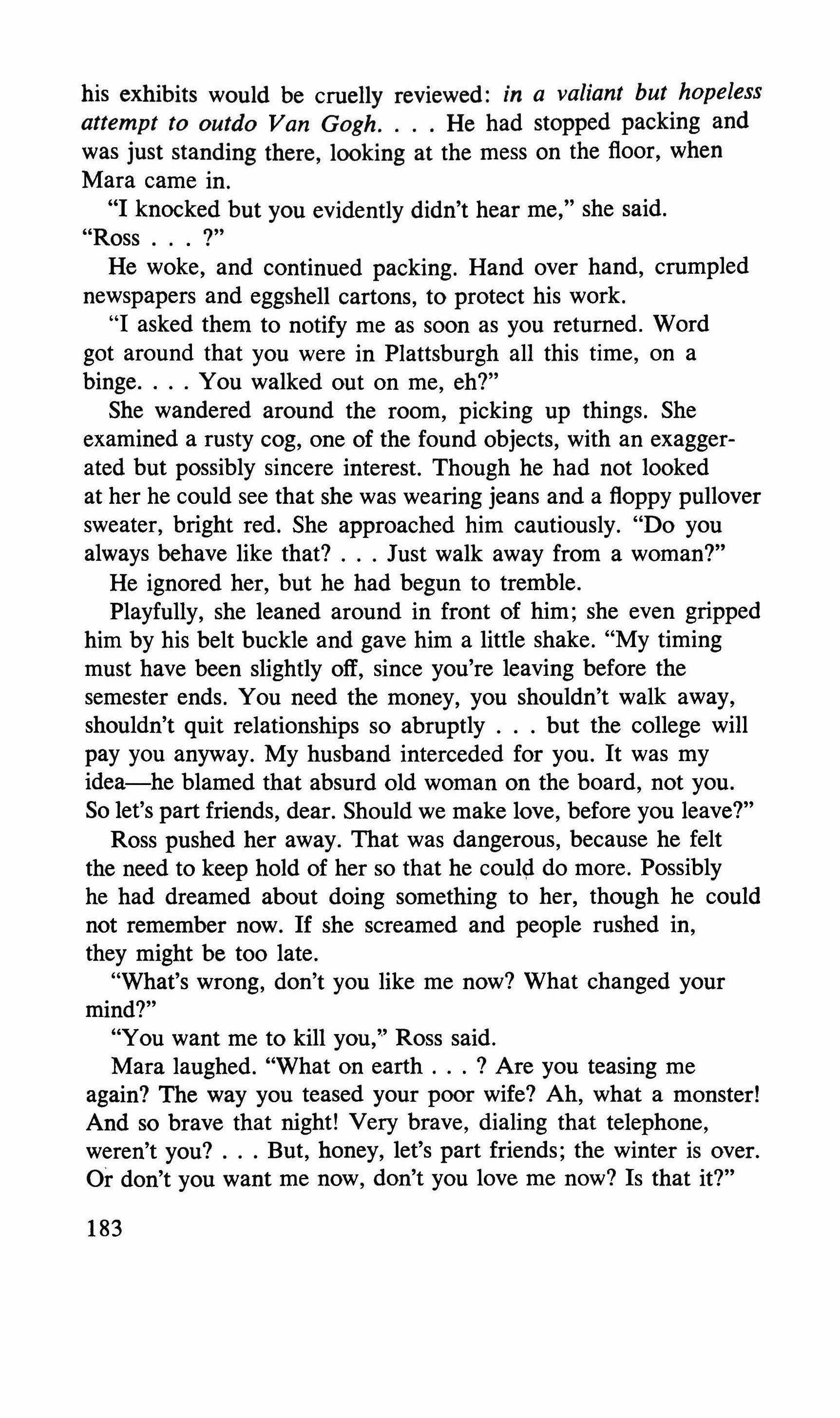
his exhibits would be cruelly reviewed: in a valiant but hopeless attempt to outdo Van Gogh. He had stopped packing and was just standing there, looking at the mess on the floor, when Mara came in.
"I knocked but you evidently didn't hear me," she said. "Ross ?"
He woke, and continued packing. Hand over hand, crumpled newspapers and eggshell cartons, to protect his work.
"I asked them to notify me as soon as you returned. Word got around that you were in Plattsburgh all this time, on a binge You walked out on me, eh?"
She wandered around the room, picking up things. She examined a rusty cog, one of the found objects, with an exaggerated but possibly sincere interest. Though he had not looked at her he could see that she was wearing jeans and a floppy pullover sweater, bright red. She approached him cautiously. "Do you always behave like that? Just walk away from a woman?"
He ignored her, but he had begun to tremble.
Playfully, she leaned around in front of him; she even gripped him by his belt buckle and gave him a little shake. "My timing must have been slightly off, since you're leaving before the semester ends. You need the money, you shouldn't walk away, shouldn't quit relationships so abruptly but the college will pay you anyway. My husband interceded for you. It was my idea-he blamed that absurd old woman on the board, not you. So let's part friends, dear. Should we make love, before you leave?"
Ross pushed her away. That was dangerous, because he felt the need to keep hold of her so that he could do more. Possibly he had dreamed about doing something to her, though he could not remember now. If she screamed and people rushed in, they might be too late.
"What's wrong, don't you like me now? What changed your mind?"
"You want me to kill you,' Ross said.
Mara laughed. "What on earth ? Are you teasing me again? The way you teased your poor wife? Ah, what a monster! And so brave that night! Very brave, dialing that telephone, weren't you? But, honey, let's part friends; the winter is over. Or don't you want me now, don't you love me now? Is that it?"
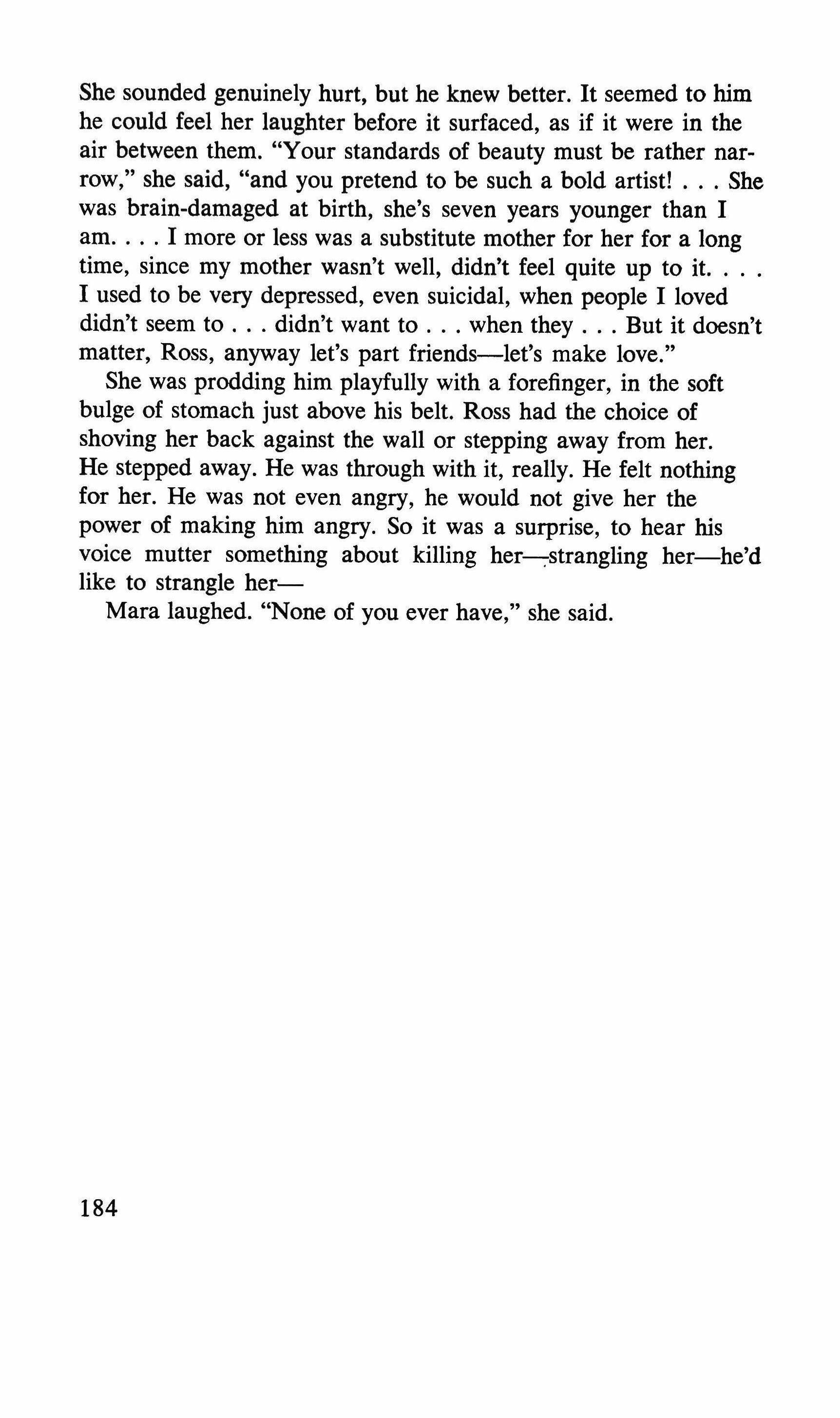
She sounded genuinely hurt, but he knew better. It seemed to him he could feel her laughter before it surfaced, as if it were in the air between them. "Your standards of beauty must be rather narrow," she said, "and you pretend to be such a bold artist! She was brain-damaged at birth, she's seven years younger than I am I more or less was a substitute mother for her for a long time, since my mother wasn't well, didn't feel quite up to it. I used to be very depressed, even suicidal, when people I loved didn't seem to didn't want to when they But it doesn't matter, Ross, anyway let's part friends-let's make love."
She was prodding him playfully with a forefinger, in the soft bulge of stomach just above his belt. Ross had the choice of shoving her back against the wall or stepping away from her. He stepped away. He was through with it, really. He felt nothing for her. He was not even angry, he would not give her the power of making him angry. So it was a surprise, to hear his voice mutter something about killing her-e-strangling her-he'd like to strangle her-
Mara laughed. "None of you ever have," she said.
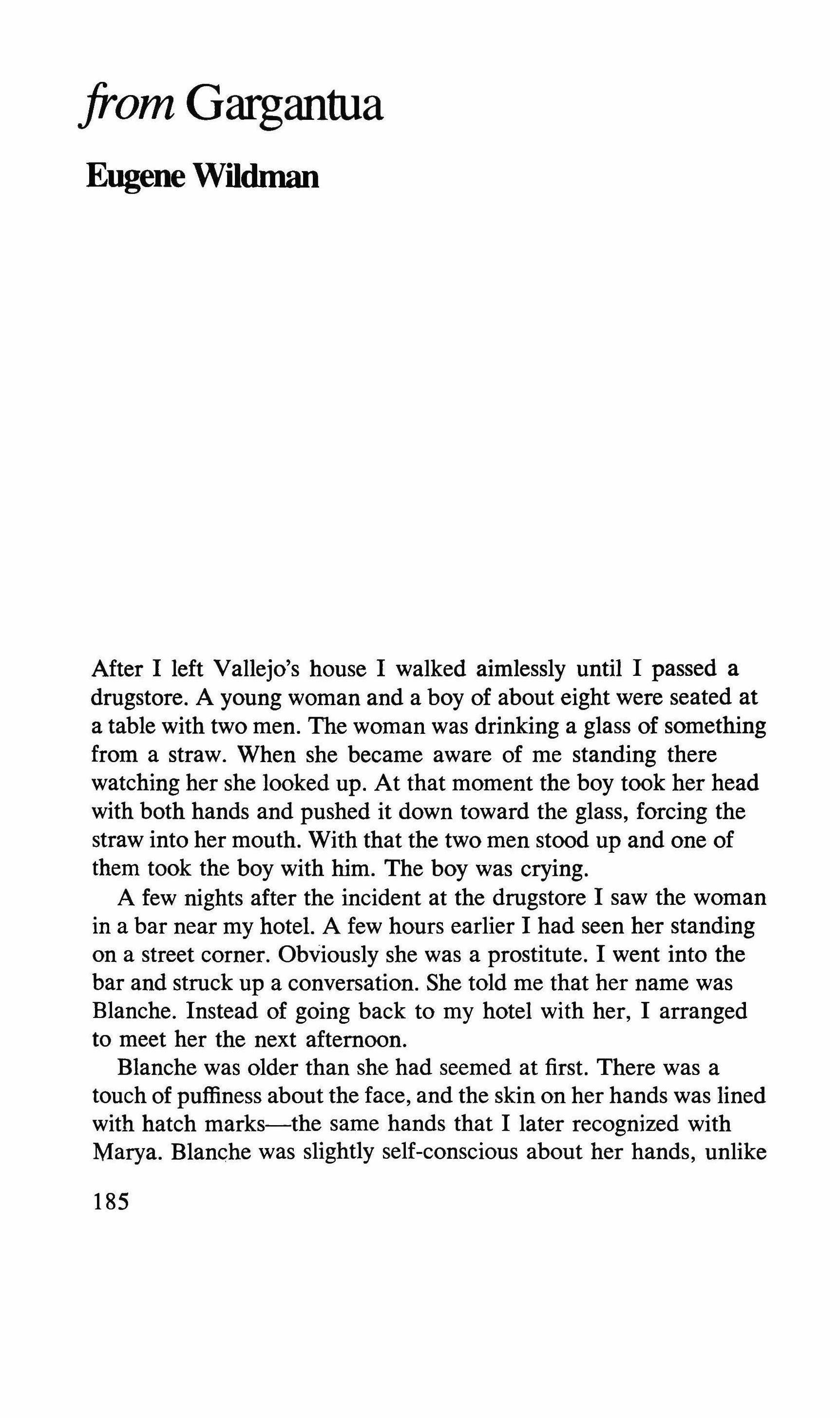
After I left Vallejo's house I walked aimlessly until I passed a drugstore. A young woman and a boy of about eight were seated at a table with two men. The woman was drinking a glass of something from a straw. When she became aware of me standing there watching her she looked up. At that moment the boy took her head with both hands and pushed it down toward the glass, forcing the straw into her mouth. With that the two men stood up and one of them took the boy with him. The boy was crying.
A few nights after the incident at the drugstore I saw the woman in a bar near my hotel. A few hours earlier I had seen her standing on a street corner. Obviously she was a prostitute. I went into the bar and struck up a conversation. She told me that her name was Blanche. Instead of going back to my hotel with her, I arranged to meet her the next afternoon.
Blanche was older than she had seemed at first. There was a touch of puffiness about the face, and the skin on her hands was lined with hatch marks-the same hands that I later recognized with Marya. Blanche was slightly self-conscious about her hands, unlike
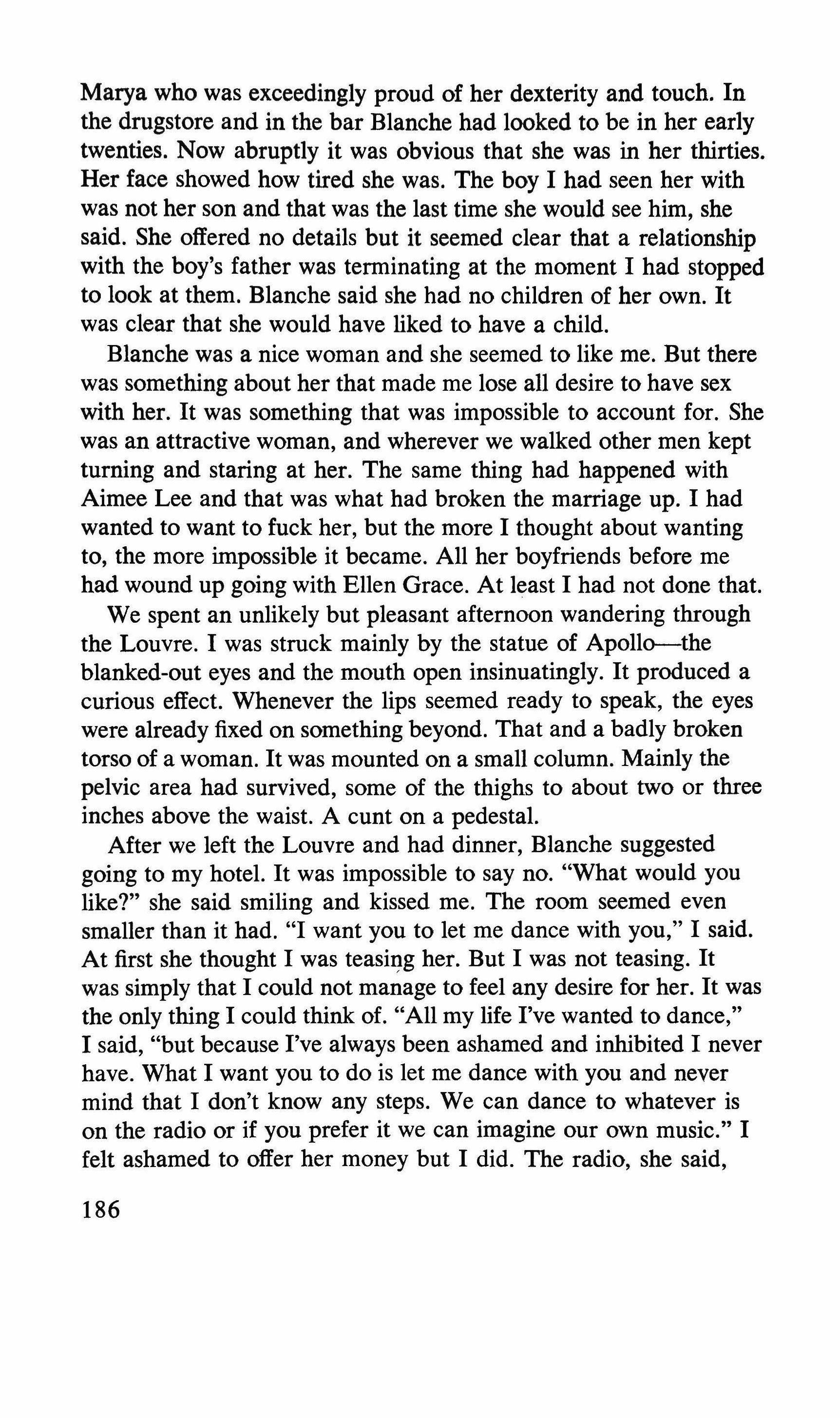
Marya who was exceedingly proud of her dexterity and touch. In the drugstore and in the bar Blanche had looked to be in her early twenties. Now abruptly it was obvious that she was in her thirties. Her face showed how tired she was. The boy I had seen her with was not her son and that was the last time she would see him, she said. She offered no details but it seemed clear that a relationship with the boy's father was terminating at the moment I had stopped to look at them. Blanche said she had no children of her own. It was clear that she would have liked to have a child.
Blanche was a nice woman and she seemed to like me. But there was something about her that made me lose all desire to have sex with her. It was something that was impossible to account for. She was an attractive woman, and wherever we walked other men kept turning and staring at her. The same thing had happened with Aimee Lee and that was what had broken the marriage up. I had wanted to want to fuck her, but the more I thought about wanting to, the more impossible it became. All her boyfriends before me had wound up going with Ellen Grace. At least I had not done that.
We spent an unlikely but pleasant afternoon wandering through the Louvre. I was struck mainly by the statue of Apollo--the blanked-out eyes and the mouth open insinuatingly. It produced a curious effect. Whenever the lips seemed ready to speak, the eyes were already fixed on something beyond. That and a badly broken torso of a woman. It was mounted on a small column. Mainly the pelvic area had survived, some of the thighs to about two or three inches above the waist. A cunt on a pedestal.
After we left the Louvre and had dinner, Blanche suggested going to my hotel. It was impossible to say no. "What would you like?" she said smiling and kissed me. The room seemed even smaller than it had. "I want you to let me dance with you," I said. At first she thought I was teasing her. But I was not teasing. It was simply that I could not manage to feel any desire for her. It was the only thing I could think of. "All my life I've wanted to dance," I said, "but because I've always been ashamed and inhibited I never have. What I want you to do is let me dance with you and never mind that I don't know any steps. We can dance to whatever is on the radio or if you prefer it we can imagine our own music." I felt ashamed to offer her money but I did. The radio, she said,
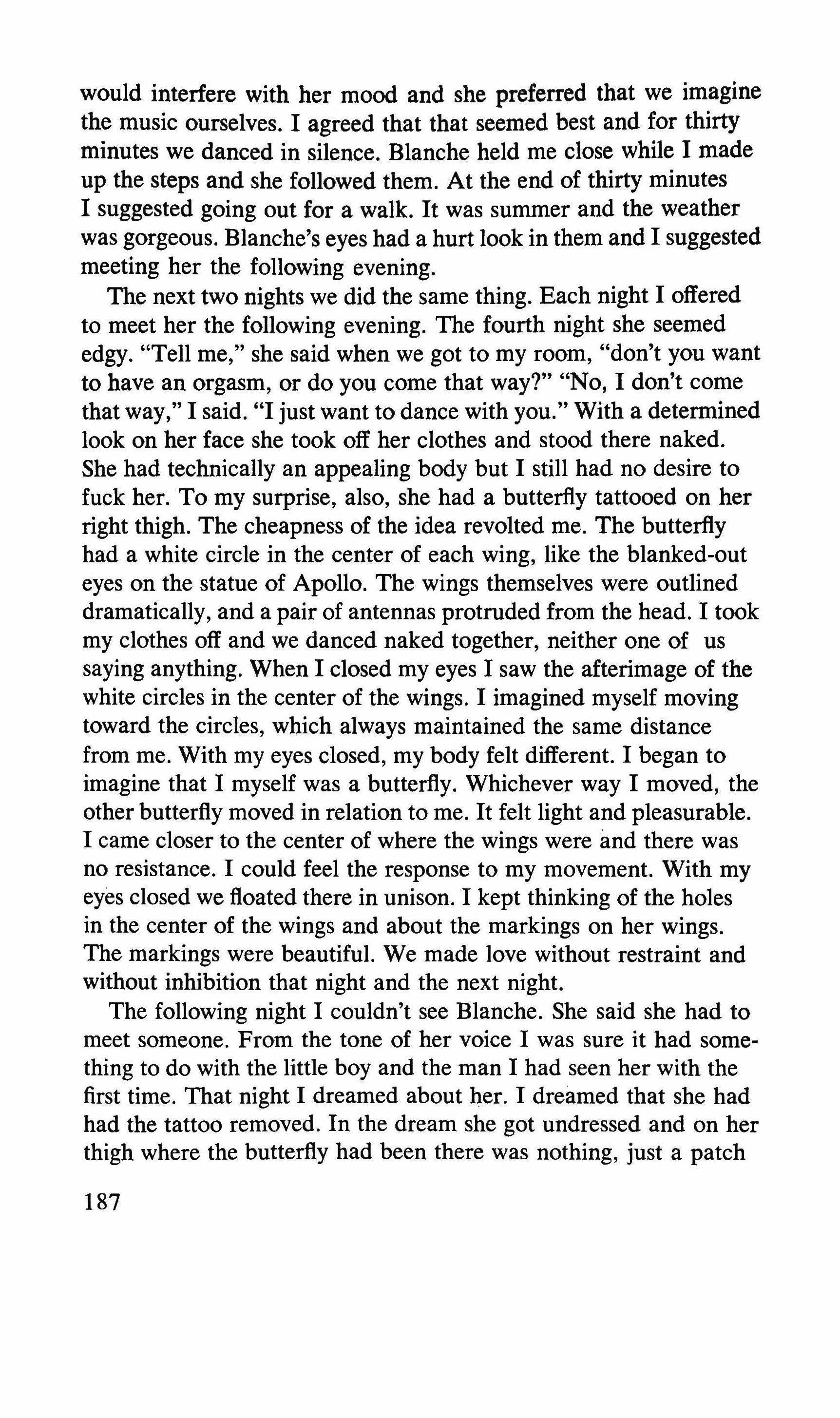
would interfere with her mood and she preferred that we imagine the music ourselves. I agreed that that seemed best and for thirty minutes we danced in silence. Blanche held me close while I made up the steps and she followed them. At the end of thirty minutes I suggested going out for a walk. It was summer and the weather was gorgeous. Blanche's eyes had a hurt look in them and I suggested meeting her the following evening.
The next two nights we did the same thing. Each night I offered to meet her the following evening. The fourth night she seemed edgy. "Tell me," she said when we got to my room, "don't you want to have an orgasm, or do you come that way?" "No, I don't come that way," I said. "I just want to dance with you." With a determined look on her face she took off her clothes and stood there naked. She had technically an appealing body but I still had no desire to fuck her. To my surprise, also, she had a butterfly tattooed on her right thigh. The cheapness of the idea revolted me. The butterfly had a white circle in the center of each wing, like the blanked-out eyes on the statue of Apollo. The wings themselves were outlined dramatically, and a pair of antennas protruded from the head. I took my clothes off and we danced naked together, neither one of us saying anything. When I closed my eyes I saw the afterimage of the white circles in the center of the wings. I imagined myself moving toward the circles, which always maintained the same distance from me. With my eyes closed, my body felt different. I began to imagine that I myself was a butterfly. Whichever way I moved, the other butterfly moved in relation to me. It felt light and pleasurable. I came closer to the center of where the wings were and there was no resistance. I could feel the response to my movement. With my eyes closed we floated there in unison. I kept thinking of the holes in the center of the wings and about the markings on her wings. The markings were beautiful. We made love without restraint and without inhibition that night and the next night.
The following night I couldn't see Blanche. She said she had to meet someone. From the tone of her voice I was sure it had something to do with the little boy and the man I had seen her with the first time. That night I dreamed about her. I dreamed that she had had the tattoo removed. In the dream she got undressed and on her thigh where the butterfly had been there was nothing, just a patch

of ordinary skin. I was filled with revulsion. The next time I saw her I was cold again. I couldn't help it. There was no desire in me and it was impossible to hide. The hurt look I had seen before came back in her eyes. She did not try to persuade me or entice me. All at once the lines on her face became more apparent and her hands were more conspicuous. We spent the evening together doing the same kind of things we usually did. But there was no enthusiasm. Some sort of link had been snapped.
I was running out of money, even with my advertising expense account, and I could not have kept on much longer in that fashion anyway. I could no longer afford to pay for all of Blanche's time. I also had to go to Rome for a few days to film a commercial. In Rome I could hardly concentrate. The commercial took a week to make and all that time I thought about Blanche constantly. I kept picturing her standing naked with that wounded look in her eyes. I kept wanting to reach out and touch her, hold her, and make that look disappear.
I had hardly any money left and I had already made up my mind to leave the ad biz. All I knew was that I wanted to feel my arms around her. What would happen after that I didn't know. The only thing that mattered was that I was in love with Blanche. I took the first flight I could to Paris and started looking for her immediately. She was nowhere to be found. She had no close friends that I knew of, and no one whom I asked about her could tell me anything. No one had seen her for at least three days. Finally a girl who worked one of the bars with her told me that she had left for Marseilles about five days before. "Alone?" I asked, and I found my voice shaking. "With a dark-haired man and a little boy," the girl said.
I left for the States a day later. My business in Paris was finished and I was due back at my agency. I had to finish the commercial I had shot in Rome. It was a stupid commercial. A certain company, Client Products, was tops in the market. But its sales were declining and management was nervous about their nearest competitors. What I did was go to various European cities-that was what had brought me to Paris-and film the exterior of the most famous restaurant in each city. Then pan to another restaurant, a warm atmosphere in the street outside, lots of attractive-looking people

going in. The maitre de is standing out front. He smiles and says with whatever accent, "We're number two." Then a smiling Hollywood actor, dreamily handsome face, holding a recognizable Client product, says, "We make no claims about being first either." Sales shot back up immediately, the client's share of the market was higher than it had ever been. I was due for a good-sized raise. But I was still resolved that that would be my last ad and I was glad to be leaving the business. Whatever else happened, I was through selling products.

When Fanny says Flaubert her mouth makes love, as if the word itself were flesh and her hot breath might bring it back to life. Flaubert, she says in such deep, throaty French as I have never even imagined, and her stooping shoulders, her squinting puffy face fringed by limply bobbed and curled hair, her bent and thickly knuckled fingers, her lurching gait, weighted with the ballast of her raggedly preposterous and ever present shopping bag, are all eclipsed by the wonders her mouth works upon that word: Flaubert.
Usually when I see her, Fanny is harried with precinct business, but on those few occasions when we discuss French literature she is ebullient; the frenetic energies of her political chores become, as they address the beauties of Racine, Maupassant, or Flaubert, vivacious and purposeful. No writer ever had a more passionately appreciative reader than Flaubert has in Fanny. She loves to bathe in the French language. It rolls out of her mouth in waves, quivering through her body as if she indeed embodies the aeolian harp itself. And she identifies deeply with Flaubert's Emma Bovary. "Ah," she says of Madame Bovary, in her thick Yiddish manner, "dhere, dhere, such a book!" For in Emma's life she feels so many parallels with her own-a yearning 190
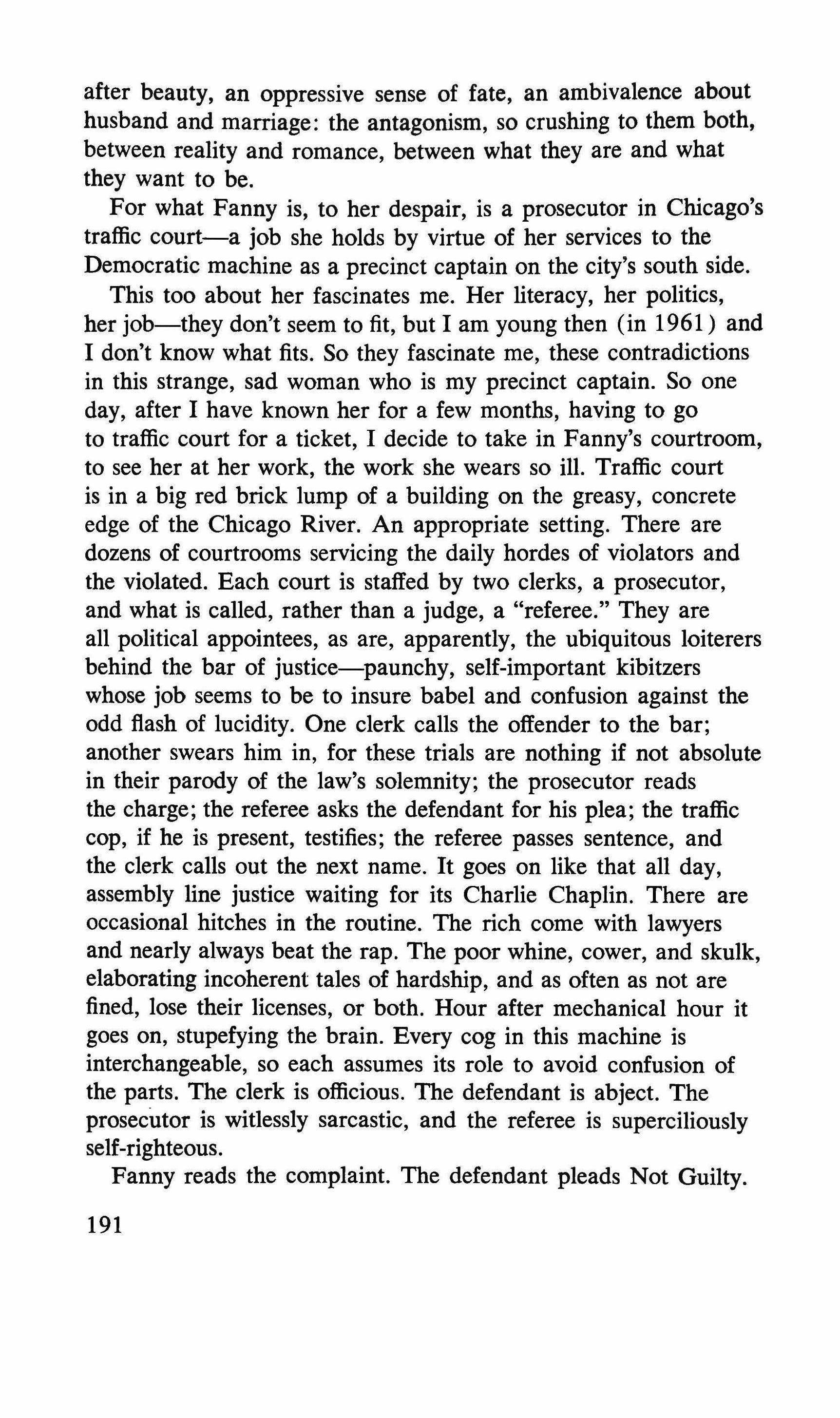
after beauty, an oppressive sense of fate, an ambivalence about husband and marriage: the antagonism, so crushing to them both, between reality and romance, between what they are and what they want to be.
For what Fanny is, to her despair, is a prosecutor in Chicago's traffic court-a job she holds by virtue of her services to the Democratic machine as a precinct captain on the city's south side. This too about her fascinates me. Her literacy, her politics, her job-they don't seem to fit, but I am young then (in 1961) and I don't know what fits. So they fascinate me, these contradictions in this strange, sad woman who is my precinct captain. So one day, after I have known her for a few months, having to go to traffic court for a ticket, I decide to take in Fanny's courtroom, to see her at her work, the work she wears so ill. Traffic court is in a big red brick lump of a building on the greasy, concrete edge of the Chicago River. An appropriate setting. There are dozens of courtrooms servicing the daily hordes of violators and the violated. Each court is staffed by two clerks, a prosecutor, and what is called, rather than a judge, a "referee." They are all political appointees, as are, apparently, the ubiquitous loiterers behind the bar of justice-paunchy, self-important kibitzers whose job seems to be to insure babel and confusion against the odd flash of lucidity. One clerk calls the offender to the bar; another swears him in, for these trials are nothing if not absolute in their parody of the law's solemnity; the prosecutor reads the charge; the referee asks the defendant for his plea; the traffic cop, if he is present, testifies; the referee passes sentence, and the clerk calls out the next name. It goes on like that all day, assembly line justice waiting for its Charlie Chaplin. There are occasional hitches in the routine. The rich come with lawyers and nearly always beat the rap. The poor whine, cower, and skulk, elaborating incoherent tales of hardship, and as often as not are fined, lose their licenses, or both. Hour after mechanical hour it goes on, stupefying the brain. Every cog in this machine is interchangeable, so each assumes its role to avoid confusion of the parts. The clerk is officious. The defendant is abject. The prosecutor is witlessly sarcastic, and the referee is superciliously self-righteous.
Fanny reads the complaint. The defendant pleads Not Guilty. 191
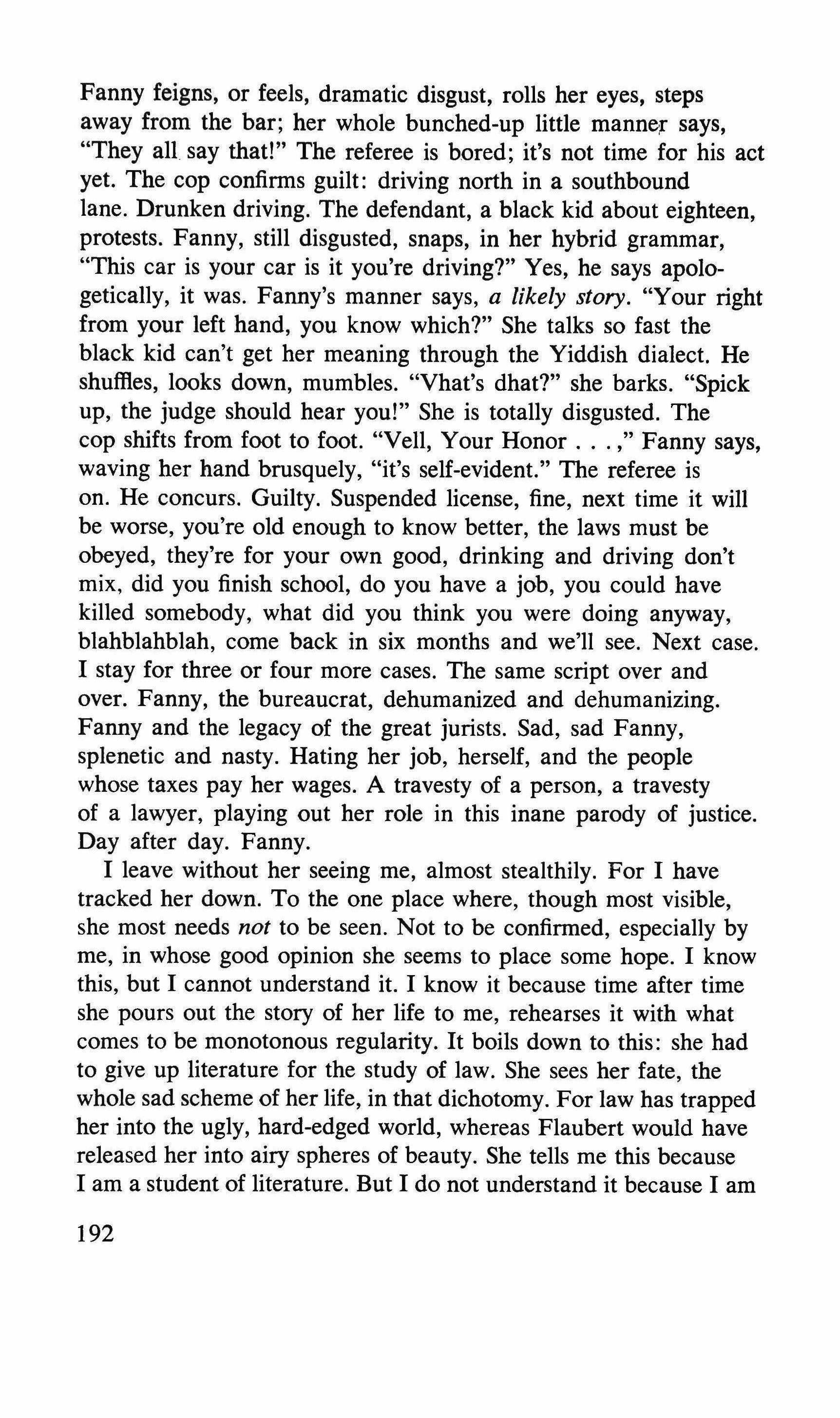
Fanny feigns, or feels, dramatic disgust, rolls her eyes, steps away from the bar; her whole bunched-up little manner says, "They all say that!" The referee is bored; it's not time for his act yet. The cop confirms guilt: driving north in a southbound lane. Drunken driving. The defendant, a black kid about eighteen, protests. Fanny, still disgusted, snaps, in her hybrid grammar, "This car is your car is it you're driving?" Yes, he says apologetically, it was. Fanny's manner says, a likely story. "Your right from your left hand, you know which?" She talks so fast the black kid can't get her meaning through the Yiddish dialect. He shuffles, looks down, mumbles. "Vhat's dhat?" she barks. "Spick up, the judge should hear you!" She is totally disgusted. The cop shifts from foot to foot. "VeIl, Your Honor ," Fanny says, waving her hand brusquely, "it's self-evident." The referee is on. He concurs. Guilty. Suspended license, fine, next time it will be worse, you're old enough to know better, the laws must be obeyed, they're for your own good, drinking and driving don't mix, did you finish school, do you have a job, you could have killed somebody, what did you think you were doing anyway, blahblahblah, come back in six months and we'll see. Next case. I stay for three or four more cases. The same script over and over. Fanny, the bureaucrat, dehumanized and dehumanizing. Fanny and the legacy of the great jurists. Sad, sad Fanny, splenetic and nasty. Hating her job, herself, and the people whose taxes pay her wages. A travesty of a person, a travesty of a lawyer, playing out her role in this inane parody of justice. Day after day. Fanny.
I leave without her seeing me, almost stealthily. For I have tracked her down. To the one place where, though most visible, she most needs not to be seen. Not to be confirmed, especially by me, in whose good opinion she seems to place some hope. I know this, but I cannot understand it. I know it because time after time she pours out the story of her life to me, rehearses it with what comes to be monotonous regularity. It boils down to this: she had to give up literature for the study of law. She sees her fate, the whole sad scheme of her life, in that dichotomy. For law has trapped her into the ugly, hard-edged world, whereas Flaubert would have released her into airy spheres of beauty. She tells me this because I am a student of literature. But I do not understand it because I am

only then beginning to understand what later I come to know more clearly-that Flaubert is not an end, he is a tool, a willing tool, with which perhaps to make an end. But Fanny doesn't know this. And if I were able to tell her, she would only think it blasphemy. So she confesses her saga to me, over and over. My very hearing of it is for her a kind of absolution.
"Take law," her father had said firmly years ago, when in her youth she had somewhat timidly proposed that she might study French literature, "it'll come in handy." Fanny protested, but her father saw no future in philology. And beauty was no commodity at all. So Fanny studied law, and her father's prophecy fulfilled itself.
When Fanny relates this part of her tsuris it is as if she were Moses banished to the wilderness with, rather than his blessing, God's curse. Her face and shoulders, her whole being, sag. Her sad, squinty eyes fix on me, an inescapably dense reminder that my good fortune-I am a student, a graduate student, no less, of literature-if not the cause of her pain is at least an obligation for me to hear it out. When Fanny's husband diedrather young, in his forties, I think-leaving her, after the funeral and some other bills, with something like six months' rent, her law degree proved in fact to come in handy. She was qualified to take over his job as a traffic court prosecutor. Which she would be permitted to do, in a line of hereditary patronage, if she also assumed his duties as Democratic precinct captain. Encouraged by her husband's cronies and by her father, who said "Well, you ain't got much money, and still less you got a choice," or words to that effect, Fanny went to work for the machine, not a place where beauty hangs much on the lips of her associates. "So," Fanny reminisces, collapsing into a dramatic lump of resignation, "vhat else should I do? No money, no other connections Goneggshuns! does she say goneggshuns?
Fanny wears her fate like an albatross. If, in her life as in her politics, she is without illusions, so is she without conviction. Her life is a bed made by her father, her husband, and "circumstances." Willy-nilly, she must lie in it. "Circumstances" are her ontology. Or perhaps her religion. She can believe in "goneggshuns" because they are efficacious circumstances. They make things happen. But she can no more be a Marxist than 193
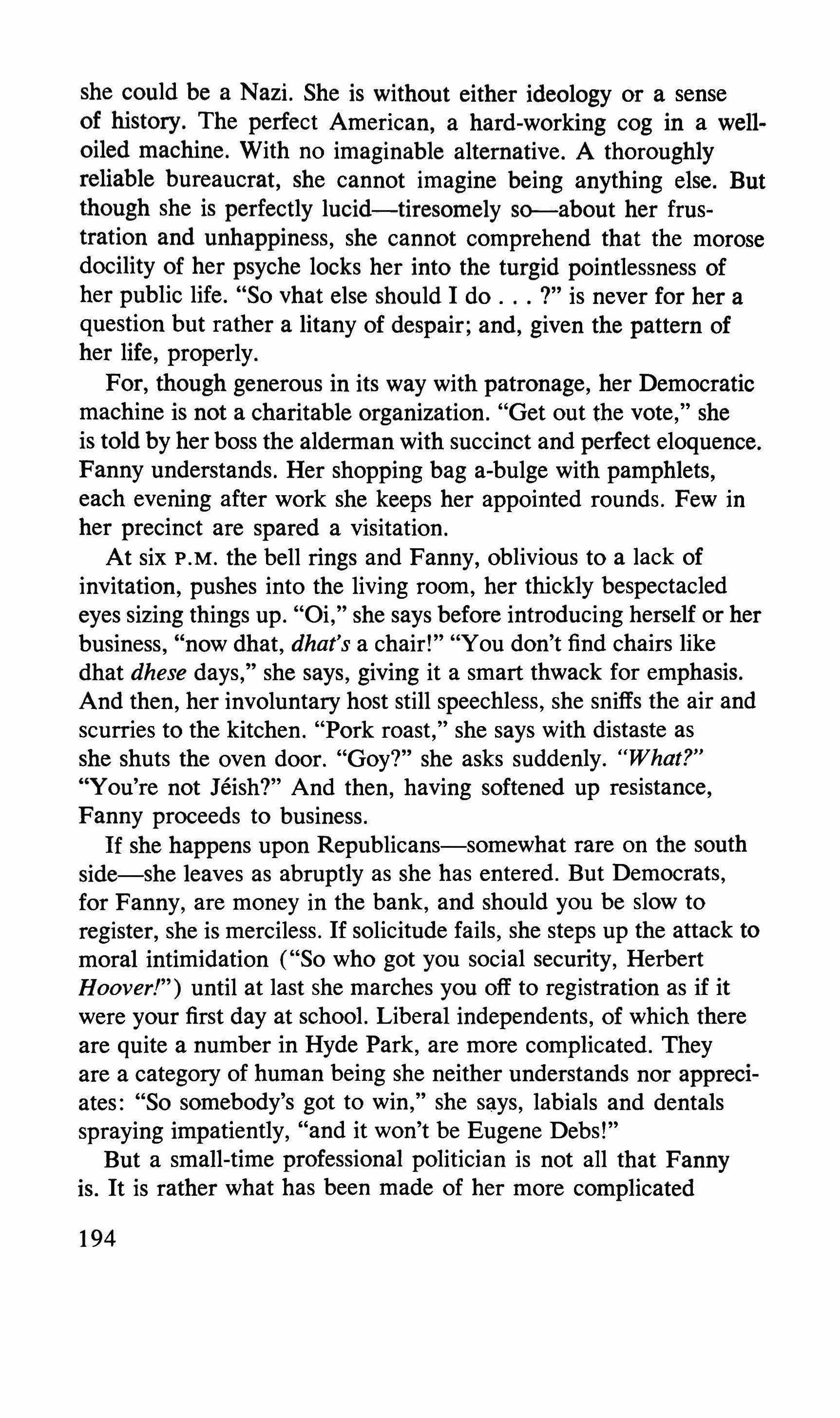
she could be a Nazi. She is without either ideology or a sense of history. The perfect American, a hard-working cog in a welloiled machine. With no imaginable alternative. A thoroughly reliable bureaucrat, she cannot imagine being anything else. But though she is perfectly lucid-tiresomely so--about her frustration and unhappiness, she cannot comprehend that the morose docility of her psyche locks her into the turgid pointlessness of her public life. "So vhat else should I do ?" is never for her a question but rather a litany of despair; and, given the pattern of her life, properly.
For, though generous in its way with patronage, her Democratic machine is not a charitable organization. "Get out the vote," she is told by her boss the alderman with succinct and perfect eloquence. Fanny understands. Her shopping bag a-bulge with pamphlets, each evening after work she keeps her appointed rounds. Few in her precinct are spared a visitation.
At six P.M. the bell rings and Fanny, oblivious to a lack of invitation, pushes into the living room, her thickly bespectacled eyes sizing things up. "Oi," she says before introducing herself or her business, "now dhat, dhat's a chair!" "You don't find chairs like dhat dhese days," she says, giving it a smart thwack for emphasis. And then, her involuntary host still speechless, she sniffs the air and scurries to the kitchen. "Pork roast," she says with distaste as she shuts the oven door. "Goy?" she asks suddenly. "What?" "You're not Jeish?" And then, having softened up resistance, Fanny proceeds to business.
If she happens upon Republicans-somewhat rare on the south side-she leaves as abruptly as she has entered. But Democrats, for Fanny, are money in the bank, and should you be slow to register, she is merciless. If solicitude fails, she steps up the attack to moral intimidation ("So who got you social security, Herbert Hoover!") until at last she marches you off to registration as if it were your first day at school. Liberal independents, of which there are quite a number in Hyde Park, are more complicated. They are a category of human being she neither understands nor appreciates: "So somebody's got to win," she says, labials and dentals spraying impatiently, "and it won't be Eugene Debs!"
But a small-time professional politician is not all that Fanny is. It is rather what has been made of her more complicated
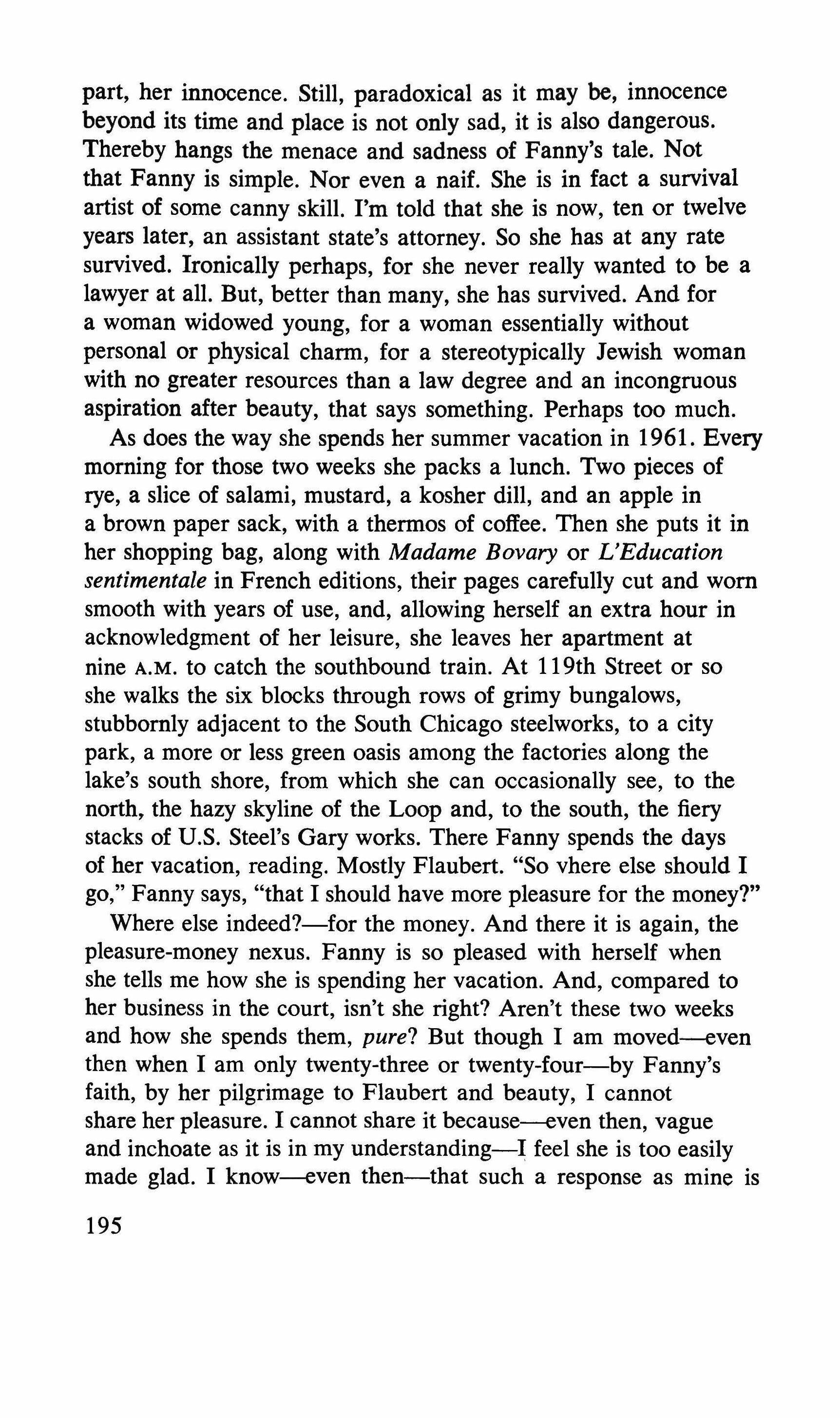
part, her innocence. Still, paradoxical as it may be, innocence beyond its time and place is not only sad, it is also dangerous. Thereby hangs the menace and sadness of Fanny's tale. Not that Fanny is simple. Nor even a naif. She is in fact a survival artist of some canny skill. I'm told that she is now, ten or twelve years later, an assistant state's attorney. So she has at any rate survived. Ironically perhaps, for she never really wanted to be a lawyer at all. But, better than many, she has survived. And for a woman widowed young, for a woman essentially without personal or physical charm, for a stereotypically Jewish woman with no greater resources than a law degree and an incongruous aspiration after beauty, that says something. Perhaps too much. As does the way she spends her summer vacation in 1961. Every morning for those two weeks she packs a lunch. Two pieces of rye, a slice of salami, mustard, a kosher dill, and an apple in a brown paper sack, with a thermos of coffee. Then she puts it in her shopping bag, along with Madame Bovary or L'Education sentimentale in French editions, their pages carefully cut and worn smooth with years of use, and, allowing herself an extra hour in acknowledgment of her leisure, she leaves her apartment at nine A.M. to catch the southbound train. At 119th Street or so she walks the six blocks through rows of grimy bungalows, stubbornly adjacent to the South Chicago steelworks, to a city park, a more or less green oasis among the factories along the lake's south shore, from which she can occasionally see, to the north. the hazy skyline of the Loop and, to the south, the fiery stacks of u.S. Steel's Gary works. There Fanny spends the days of her vacation, reading. Mostly Flaubert. "So vhere else should I go," Fanny says, "that I should have more pleasure for the money?" Where else indeed?-for the money. And there it is again, the pleasure-money nexus. Fanny is so pleased with herself when she tells me how she is spending her vacation. And, compared to her business in the court, isn't she right? Aren't these two weeks and how she spends them, pure? But though I am moved--even then when I am only twenty-three or twenty-four-by Fanny's faith, by her pilgrimage to Flaubert and beauty, I cannot share her pleasure. I cannot share it because--even then, vague and inchoate as it is in my understanding-I feel she is too easily made glad. I know--even then-that such a response as mine is 195
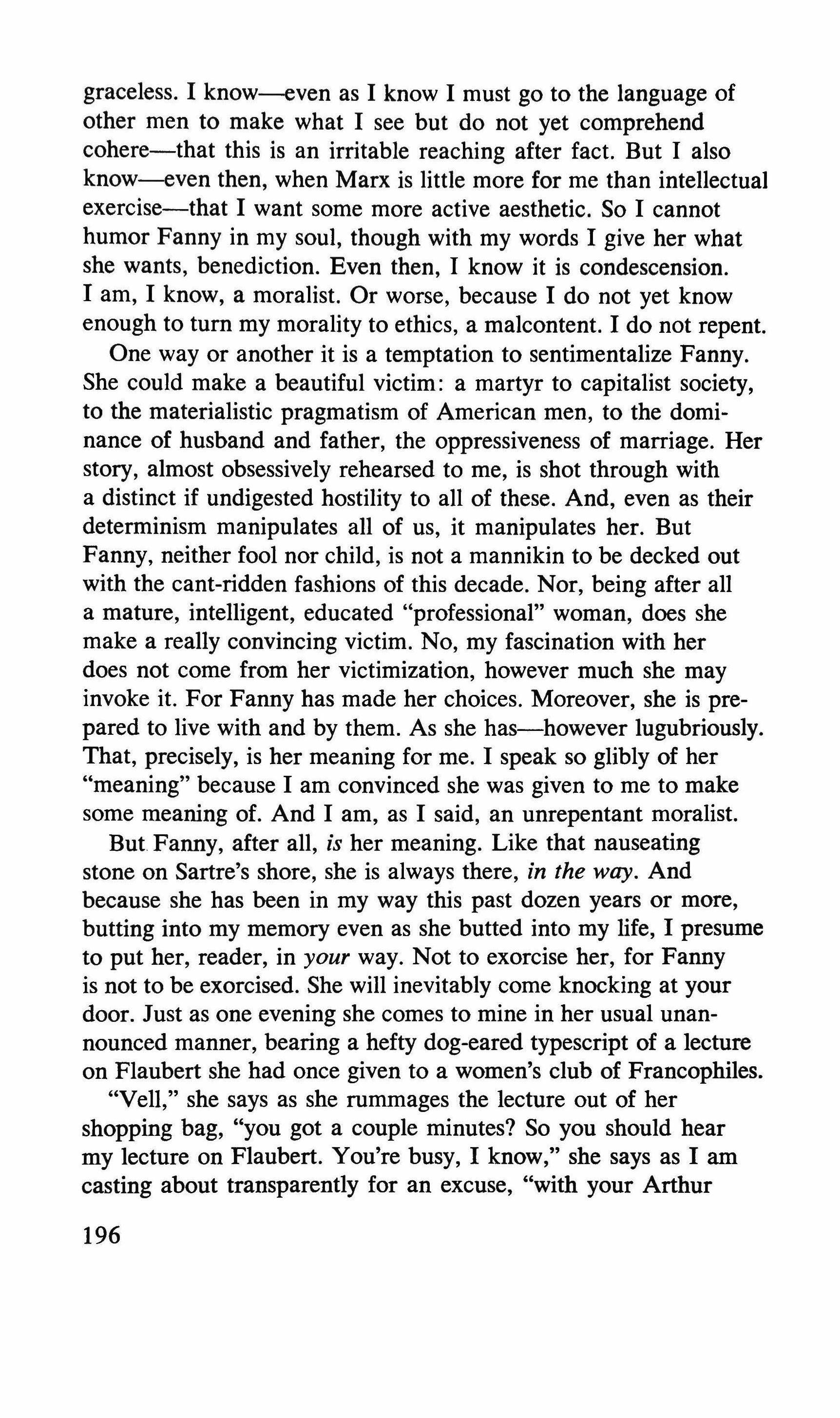
graceless. I know-even as I know I must go to the language of other men to make what I see but do not yet comprehend cohere-that this is an irritable reaching after fact. But I also know-even then, when Marx is little more for me than intellectual exercise-that I want some more active aesthetic. So I cannot humor Fanny in my soul, though with my words I give her what she wants, benediction. Even then, I know it is condescension. I am, I know, a moralist. Or worse, because I do not yet know enough to tum my morality to ethics, a malcontent. I do not repent. One way or another it is a temptation to sentimentalize Fanny. She could make a beautiful victim: a martyr to capitalist society, to the materialistic pragmatism of American men, to the dominance of husband and father, the oppressiveness of marriage. Her story, almost obsessively rehearsed to me, is shot through with a distinct if undigested hostility to all of these. And, even as their determinism manipulates all of us, it manipulates her. But Fanny, neither fool nor child, is not a mannikin to be decked out with the cant-ridden fashions of this decade. Nor, being after all a mature, intelligent, educated "professional" woman, does she make a really convincing victim. No, my fascination with her does not come from her victimization, however much she may invoke it. For Fanny has made her choices. Moreover, she is prepared to live with and by them. As she has-however lugubriously. That, precisely, is her meaning for me. I speak so glibly of her "meaning" because I am convinced she was given to me to make some meaning of. And I am, as I said, an unrepentant moralist. But Fanny, after all, is her meaning. Like that nauseating stone on Sartre's shore, she is always there, in the way. And because she has been in my way this past dozen years or more, butting into my memory even as she butted into my life, I presume to put her, reader, in your way. Not to exorcise her, for Fanny is not to be exorcised. She will inevitably come knocking at your door. Just as one evening she comes to mine in her usual unannounced manner, bearing a hefty dog-eared typescript of a lecture on Flaubert she had once given to a women's club of Francophiles. "VeIl," she says as she rummages the lecture out of her shopping bag, "you got a couple minutes? So you should hear my lecture on Flaubert. You're busy, I know," she says as I am casting about transparently for an excuse, "with your Arthur

Williamses and Tennessee Millers, but about Flaubert too you should know." "All right," I say glumly, eyeing her forty typed pages, and lie, again transparently, about an appointment in half an hour. "Fine, fine," she says, settling her glasses and relishing the commencement of her lecture, in French. I learn that Flaubert was born in 1821, that he died in 1880, that he was a "polished" stylist, that his narrative "method" was at once "objective" and "sculptured," that, though Madame Bovary was his most famous work, yet in later works he etc. In short, after about fifteen minutes I know pretty much what an encyclopedia might tell me, at least insofar as I can keep up with Fanny's thick, relentless French. But her worn typescript has obviously been read over many times. As if, alone in her room, she relives the glory of that lecture, savoring, however sadly, what must have been one of the few moments in her life when she was in touch with what might have been, under better "circumstances," her rendezvous with the world of beauty. What remains in the bulk of her lecture I don't know-though I suspect plot summaries come next-for I am relieved, unfortunately as I think now, by a friend ringing at my door. Fanny, crestfallen at the loss of a rare opportunity, gathers up her lecture, stuffs it into her shopping bag, and lurches alone into the night-her stooping gait, as I watch her trudge down the dimly lit hall, an image of frustration, loneliness, and resignation.
Relieved though I am, I want to see Fanny emerge onto the streets of her precinct. For she has become somehow a symbolic touchstone in my racial memory, even as her presence face-toface is becoming unbearably depressing. I go to the window to look down on those city streets that are still then romantic and strange to me. ( "Go to Chicago," my father had said, "find out what it's all about." Curiously paternal advice. Between the ages of two and twenty-two I had spent perhaps a total of five weeks' time in his company. But paternal nonetheless, for Chicago had been somehow a rite of passage 'in the history of his family. His father, Max, a Lithuanian immigrant torn between the demands of making a living as a furrier and his desire to be a poet, a part of the "new poetry" at Harriet Monroe's Poetry magazine, had gone mad there in 1917 or so. Harriet Monroe put him, gentle and out of touch, in the care of a sympathetic
197
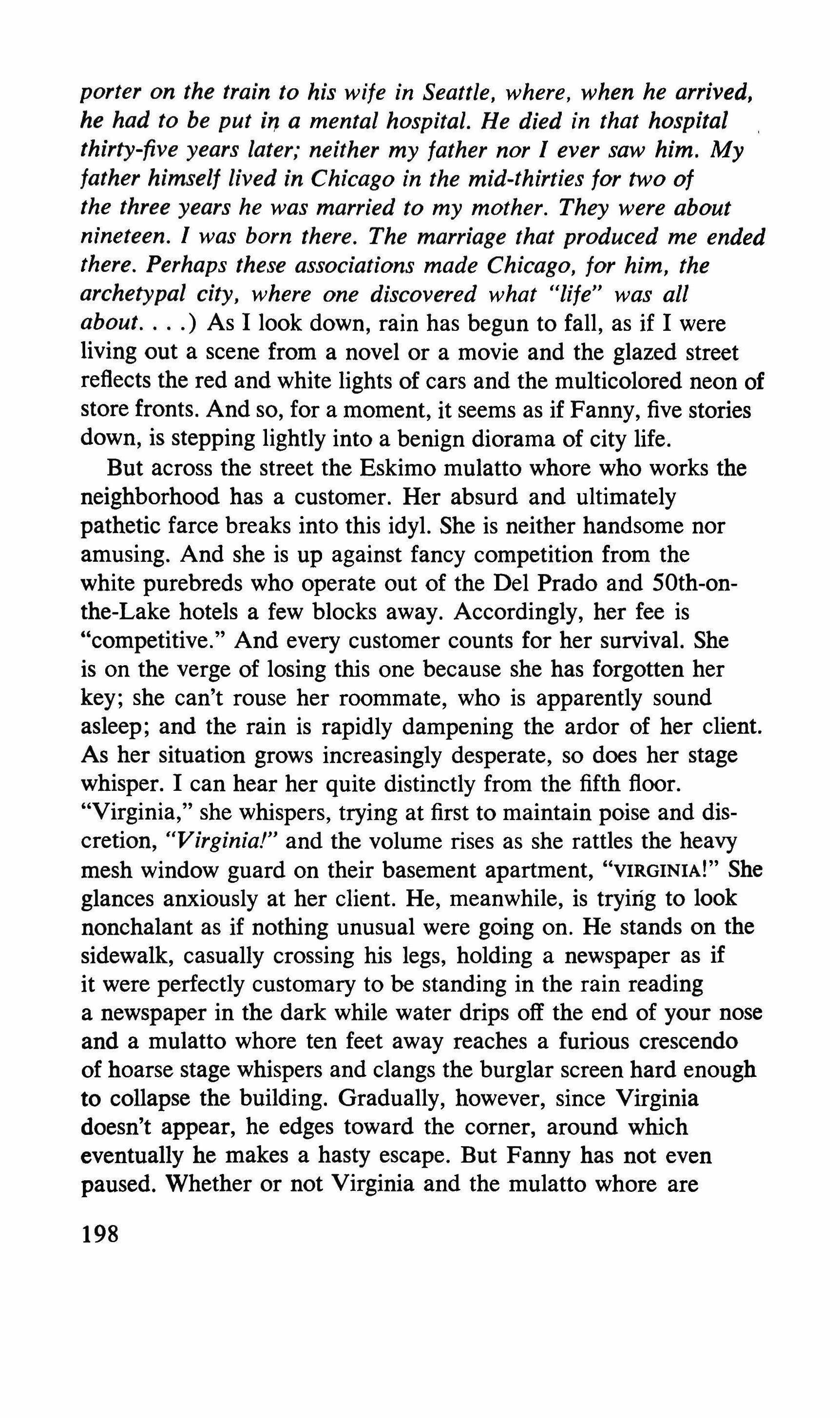
porter on the train to his wife in Seattle, where, when he arrived, he had to be put in a mental hospital. He died in that hospital thirty-five years later; neither my father nor I ever saw him. My father himself lived in Chicago in the mid-thirties for two of the three years he was married to my mother. They were about nineteen. I was born there. The marriage that produced me ended there. Perhaps these associations made Chicago, for him, the archetypal city, where one discovered what "life" was all about ) As I look down, rain has begun to fall, as if I were living out a scene from a novel or a movie and the glazed street reflects the red and white lights of cars and the multicolored neon of store fronts. And so, for a moment, it seems as if Fanny, five stories down, is stepping lightly into a benign diorama of city life.
But across the street the Eskimo mulatto whore who works the neighborhood has a customer. Her absurd and ultimately pathetic farce breaks into this idyl. She is neither handsome nor amusing. And she is up against fancy competition from the white purebreds who operate out of the Del Prado and 50th-onthe-Lake hotels a few blocks away. Accordingly, her fee is "competitive." And every customer counts for her survival. She is on the verge of losing this one because she has forgotten her key; she can't rouse her roommate, who is apparently sound asleep; and the rain is rapidly dampening the ardor of her client. As her situation grows increasingly desperate, so does her stage whisper. I can hear her quite distinctly from the fifth floor. "Virginia," she whispers, trying at first to maintain poise and discretion, "Virginia!" and the volume rises as she rattles the heavy mesh window guard on their basement apartment, "VIRGINIA!" She glances anxiously at her client. He, meanwhile, is tryirig to look nonchalant as if nothing unusual were going on. He stands on the sidewalk, casually crossing his legs, holding a newspaper as if it were perfectly customary to be standing in the rain reading a newspaper in the dark while water drips off the end of your nose and a mulatto whore ten feet away reaches a furious crescendo of hoarse stage whispers and clangs the burglar screen hard enough to collapse the building. Gradually, however, since Virginia doesn't appear, he edges toward the corner, around which eventually he makes a hasty escape. But Fanny has not even paused. Whether or not Virginia and the mulatto whore are 198
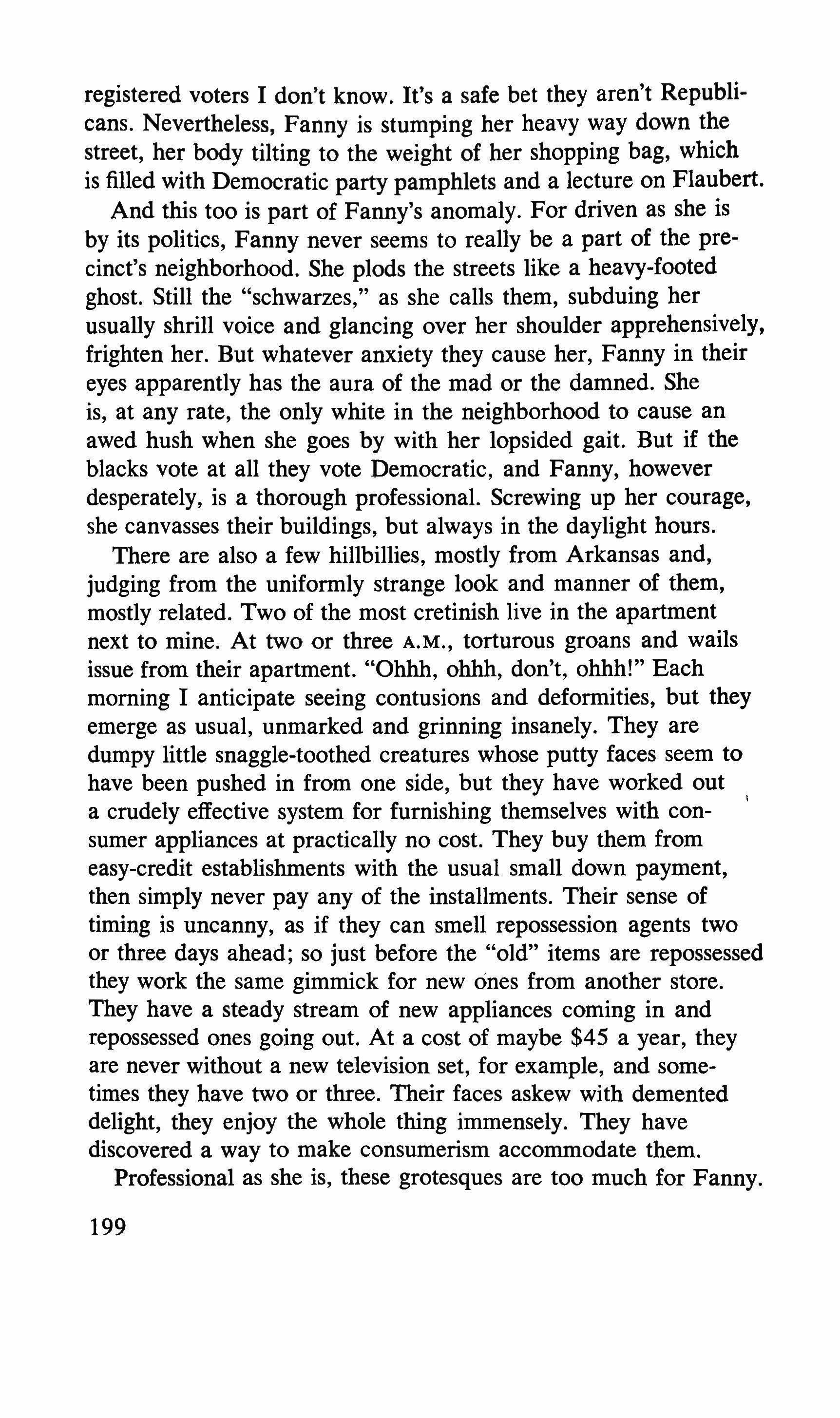
registered voters I don't know. It's a safe bet they aren't Republicans. Nevertheless, Fanny is stumping her heavy way down the street, her body tilting to the weight of her shopping bag, which is filled with Democratic party pamphlets and a lecture on Flaubert. And this too is part of Fanny's anomaly. For driven as she is by its politics, Fanny never seems to really be a part of the precinct's neighborhood. She plods the streets like a heavy-footed ghost. Still the "schwarzes," as she calls them, subduing her usually shrill voice and glancing over her shoulder apprehensively, frighten her. But whatever anxiety they cause her, Fanny in their eyes apparently has the aura of the mad or the damned. She is, at any rate, the only white in the neighborhood to cause an awed hush when she goes by with her lopsided gait. But if the blacks vote at all they vote Democratic, and Fanny, however desperately, is a thorough professional. Screwing up her courage, she canvasses their buildings, but always in the daylight hours. There are also a few hillbillies, mostly from Arkansas and, judging from the uniformly strange look and manner of them, mostly related. Two of the most cretinish live in the apartment next to mine. At two or three A.M., torturous groans and wails issue from their apartment. "Ohhh, ohhh, don't, ohhh!" Each morning I anticipate seeing contusions and deformities, but they emerge as usual, unmarked and grinning insanely. They are dumpy little snaggle-toothed creatures whose putty faces seem to have been pushed in from one side, but they have worked out a crudely effective system for furnishing themselves with consumer appliances at practically no cost. They buy them from easy-credit establishments with the usual small down payment, then simply never pay any of the installments. Their sense of timing is uncanny, as if they can smell repossession agents two or three days ahead; so just before the "old" items are repossessed they work the same gimmick for new ones from another store. They have a steady stream of new appliances coming in and repossessed ones going out. At a cost of maybe $45 a year, they are never without a new television set, for example, and sometimes they have two or three. Their faces askew with demented delight, they enjoy the whole thing immensely. They have discovered a way to make consumerism accommodate them. Professional as she is, these grotesques are too much for Fanny.

Her distaste is so great she can hardly find words, an unusual circumstance. "Thosethosethose schlepsl" she blurts, and screws her face into an imitation of theirs, shrugging her shoulders, opening her hands to the incomprehensible caprices of creation, all the while rolling her eyes in disgust. As if to say that the responsibility for their electoral franchise must fall to more magnanimous hands than hers. What really bothers Fanny is not their quaint fraudulence, which she could very likely tolerate in more attractive people; she can't stand their unmitigated ugliness. Her aesthetic romanticism is offended by their very existence, just as Emma Bovary was offended by the peasant crudities of her wedding.
The neighborhood's solid middle class, represented by the liberal white professors, lawyers, doctors, booksellers, etc., who live in the modestly grand but slightly moldering brownstones that are as yet survivors of urban renewal, is another matter. Their manner suits Fanny's taste perfectly: paintings on the wall (Fanny does not discriminate-paintings are art, and art is beautiful), great books (often enough literally the Great Books) on the shelf, and "tasteful" Danish modern furnishings. But Fanny is too frenetic, too desperate, too Jewish, too manquee-which Fanny, for all her Francophilia, could never say about anythingto suit them. The goyim tolerate her political function and condescendingly either sympathize or chuckle at her as they might at a character from Hogarth. For the Jews, Fanny is an embarrassment-de trap, which Fanny also would never be able to say of anything-a slightly amusing perhaps but essentially unpleasant allusion to stereotype. And for these, whose gracious, poised, quiet, comfortable, confident lives are hopelessly beyond her, for these she reserves what little bourgeois decorum she has at her command. And from these Fanny-knowing, as the damned all do, the fixity of their caste and fate-keeps her respectful distance.
But not from the students, such as myself. Our privileged lives are still in the future and not yet therefore intimidating. On the students Fanny feels free to lavish her idiosyncrasies and her passion for the beautifuL Moreover, we, just beginning to realize that our privilege is derived from our fidelity to social manners and regularity, to staying in line, are more receptive, even appreciative of Fanny's peculiarities. At least for a while. Among 200
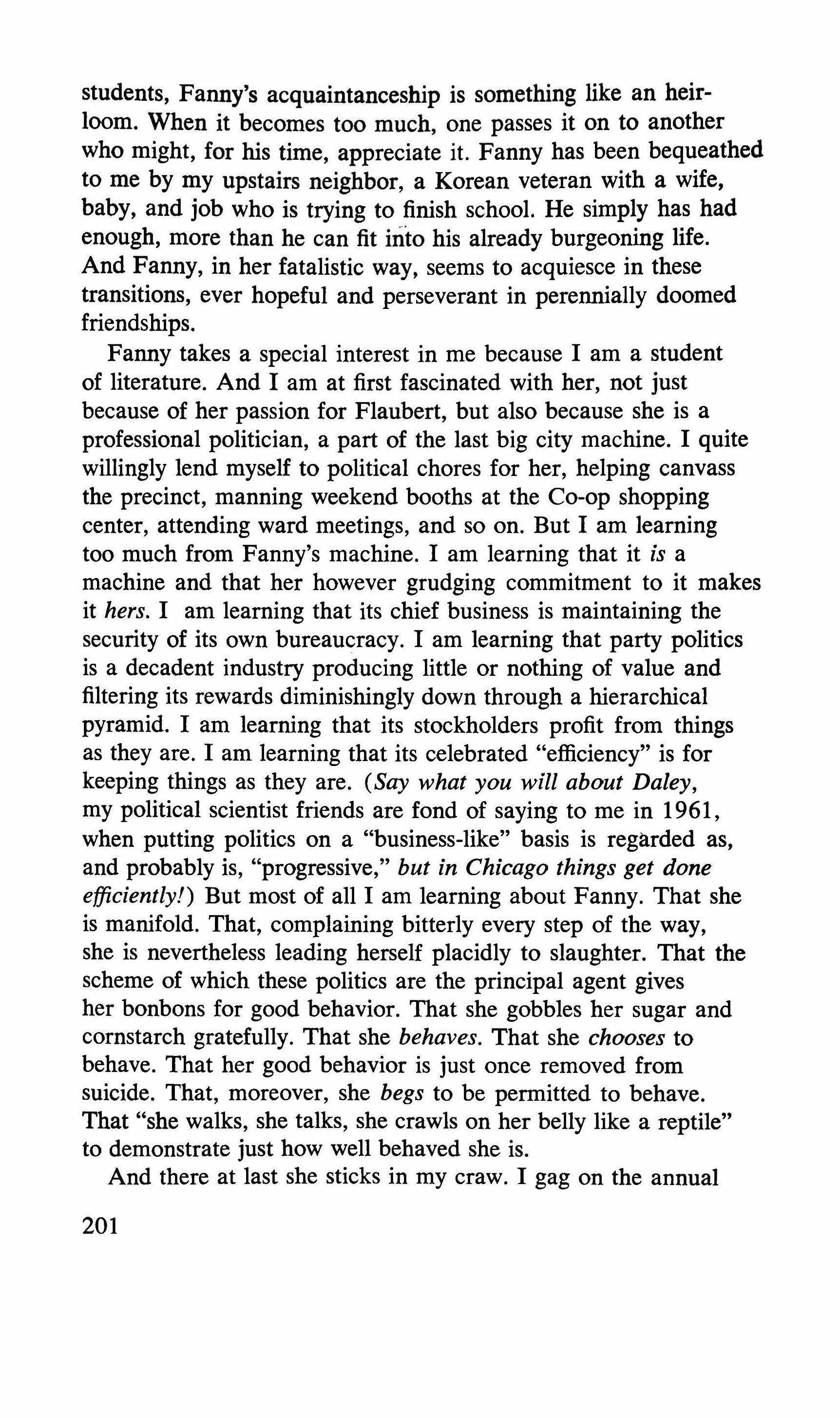
students, Fanny's acquaintanceship is something like an heirloom. When it becomes too much, one passes it on to another who might, for his time, appreciate it. Fanny has been bequeathed to me by my upstairs neighbor, a Korean veteran with a wife, baby, and job who is trying to finish school. He simply has had enough, more than he can fit into his already burgeoning life. And Fanny, in her fatalistic way, seems to acquiesce in these transitions, ever hopeful and perseverant in perennially doomed friendships.
Fanny takes a special interest in me because I am a student of literature. And I am at first fascinated with her, not just because of her passion for Flaubert, but also because she is a professional politician, a part of the last big city machine. I quite willingly lend myself to political chores for her, helping canvass the precinct, manning weekend booths at the Co-op shopping center, attending ward meetings, and so on. But I am learning too much from Fanny's machine. I am learning that it is a machine and that her however grudging commitment to it makes it hers. I am learning that its chief business is maintaining the security of its own bureaucracy. I am learning that party politics is a decadent industry producing little or nothing of value and filtering its rewards diminishingly down through a hierarchical pyramid. I am learning that its stockholders profit from things as they are. I am learning that its celebrated "efficiency" is for keeping things as they are. (Say what you will about Daley, my political scientist friends are fond of saying to me in 1961, when putting politics on a "business-like" basis is regarded as, and probably is, "progressive," but in Chicago things get done efficiently!) But most of all I am learning about Fanny. That she is manifold. That, complaining bitterly every step of the way, she is nevertheless leading herself placidly to slaughter. That the scheme of which these politics are the principal agent gives her bonbons for good behavior. That she gobbles her sugar and cornstarch gratefully. That she behaves. That she chooses to behave. That her good behavior is just once removed from suicide. That, moreover, she begs to be permitted to behave. That "she walks, she talks, she crawls on her belly like a reptile" to demonstrate just how well behaved she is. And there at last she sticks in my craw. I gag on the annual 201
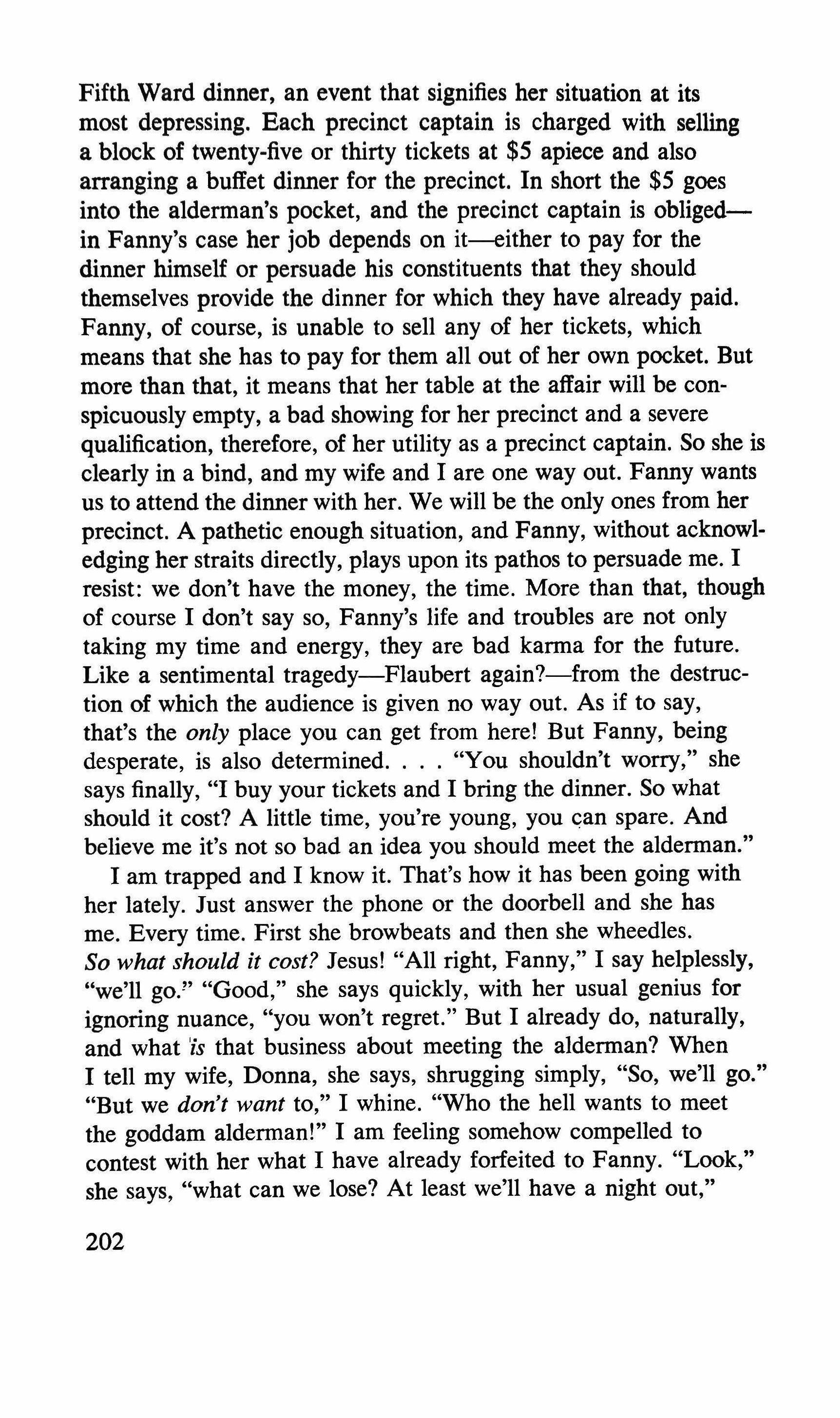
Fifth Ward dinner, an event that signifies her situation at its most depressing. Each precinct captain is charged with selling a block of twenty-five or thirty tickets at $5 apiece and also arranging a buffet dinner for the precinct. In short the $5 goes into the alderman's pocket, and the precinct captain is obligedin Fanny's case her job depends on it-either to pay for the dinner himself or persuade his constituents that they should themselves provide the dinner for which they have already paid. Fanny, of course, is unable to sell any of her tickets, which means that she has to pay for them all out of her own pocket. But more than that, it means that her table at the affair will be conspicuouslyempty, a bad showing for her precinct and a severe qualification, therefore, of her utility as a precinct captain. So she is clearly in a bind, and my wife and I are one way out. Fanny wants us to attend the dinner with her. We will be the only ones from her precinct. A pathetic enough situation, and Fanny, without acknowledging her straits directly, plays upon its pathos to persuade me. I resist: we don't have the money, the time. More than that, though of course 1 don't say so, Fanny's life and troubles are not only taking my time and energy, they are bad karma for the future. Like a sentimental tragedy-Flaubert again?-from the destruction of which the audience is given no way out. As if to say, that's the only place you can get from here! But Fanny, being desperate, is also determined "You shouldn't worry," she says finally, "I buy your tickets and 1 bring the dinner. So what should it cost? A little time, you're young, you can spare. And believe me it's not so bad an idea you should meet the alderman."
1 am trapped and 1 know it. That's how it has been going with her lately. Just answer the phone or the doorbell and she has me. Every time. First she browbeats and then she wheedles. So what should it cost? Jesus! "All right, Fanny," 1 say helplessly, "we'll go'?' "Good," she says quickly, with her usual genius for ignoring nuance, "you won't regret." But 1 already do, naturally, and what 'is that business about meeting the alderman? When 1 tell my wife, Donna, she says, shrugging simply, "So, we'll go." "But we don't want to," 1 whine. "Who the hell wants to meet the goddam alderman!" 1 am feeling somehow compelled to contest with her what I have already forfeited to Fanny. "Look," she says, "what can we lose? At least we'll have a night out,"
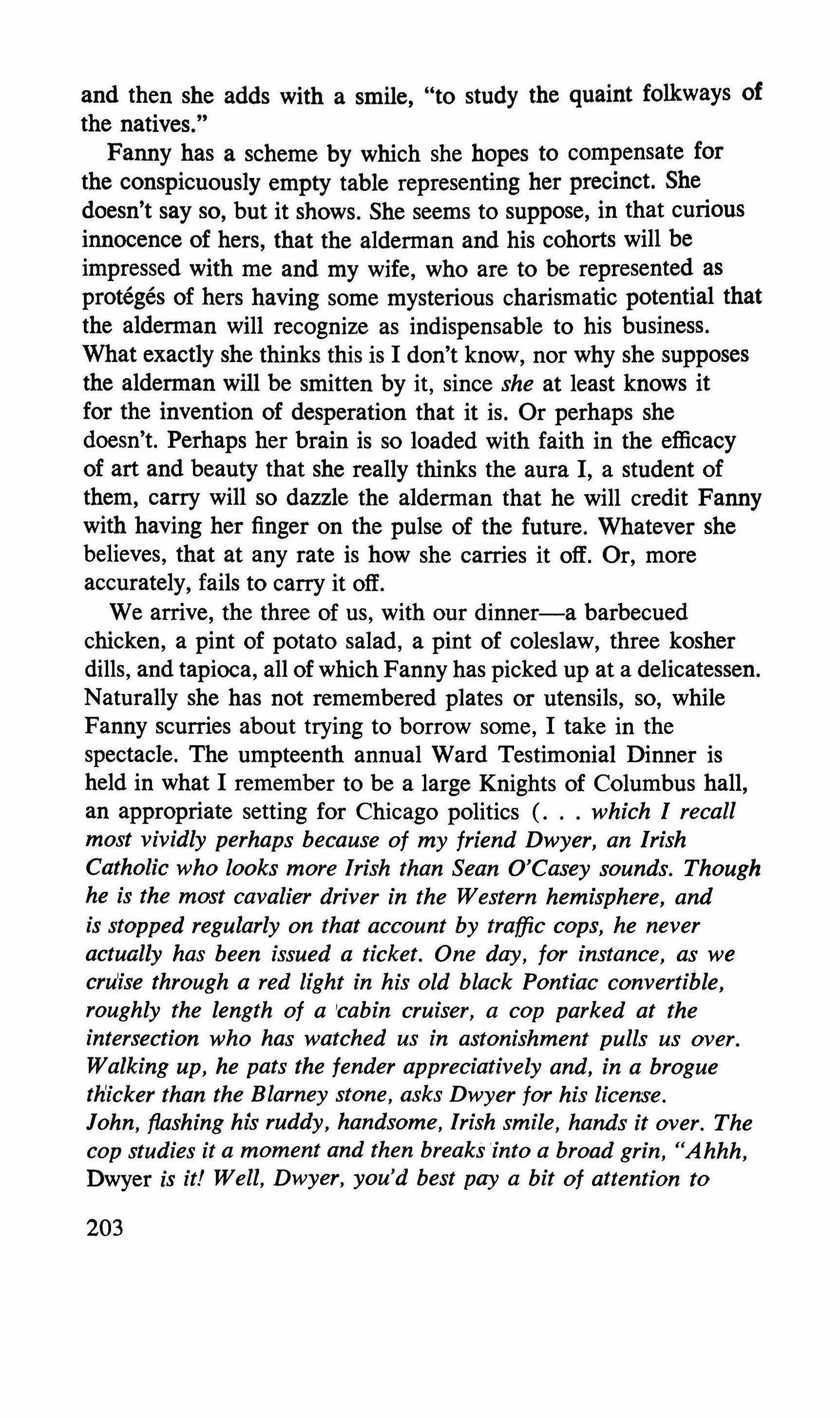
and then she adds with a smile, "to study the quaint folkways of the natives."
Fanny has a scheme by which she hopes to compensate for the conspicuously empty table representing her precinct. She doesn't say so, but it shows. She seems to suppose, in that curious innocence of hers, that the alderman and his cohorts will be impressed with me and my wife, who are to be represented as proteges of hers having some mysterious charismatic potential that the alderman will recognize as indispensable to his business. What exactly she thinks this is I don't know, nor why she supposes the alderman will be smitten by it, since she at least knows it for the invention of desperation that it is. Or perhaps she doesn't. Perhaps her brain is so loaded with faith in the efficacy of art and beauty that she really thinks the aura I, a student of them, carry will so dazzle the alderman that he will credit Fanny with having her finger on the pulse of the future. Whatever she believes, that at any rate is how she carries it off. Or, more accurately, fails to carry it off.
We arrive, the three of us, with our dinner-a barbecued chicken, a pint of potato salad, a pint of coleslaw, three kosher dills, and tapioca, all of which Fanny has picked up at a delicatessen. Naturally she has not remembered plates or utensils, so, while Fanny scurries about trying to borrow some, I take in the spectacle. The umpteenth annual Ward Testimonial Dinner is held in what I remember to be a large Knights of Columbus hall, an appropriate setting for Chicago politics (. which I recall most vividly perhaps because of my friend Dwyer, an Irish Catholic who looks more Irish than Sean O'Casey sounds. Though he is the most cavalier driver in the Western hemisphere, and is stopped regularly on that account by traffic cops, he never actually has been issued a ticket. One day, for instance, as we cruise through a red light in his old black Pontiac convertible, roughly the length of a 'cabin cruiser, a cop parked at the intersection who has watched us in astonishment pulls us over. Walking up, he pats the fender appreciatively and, in a brogue th'icker than the Blarney stone, asks Dwyer for his license. John, flashing his ruddy, handsome, Irish smile, hands it over. The cop studies it a moment and then breaks into a broad grin, "Ahhh, Dwyer is it! Well, Dwyer, you'd best pay a bit of attention to 203
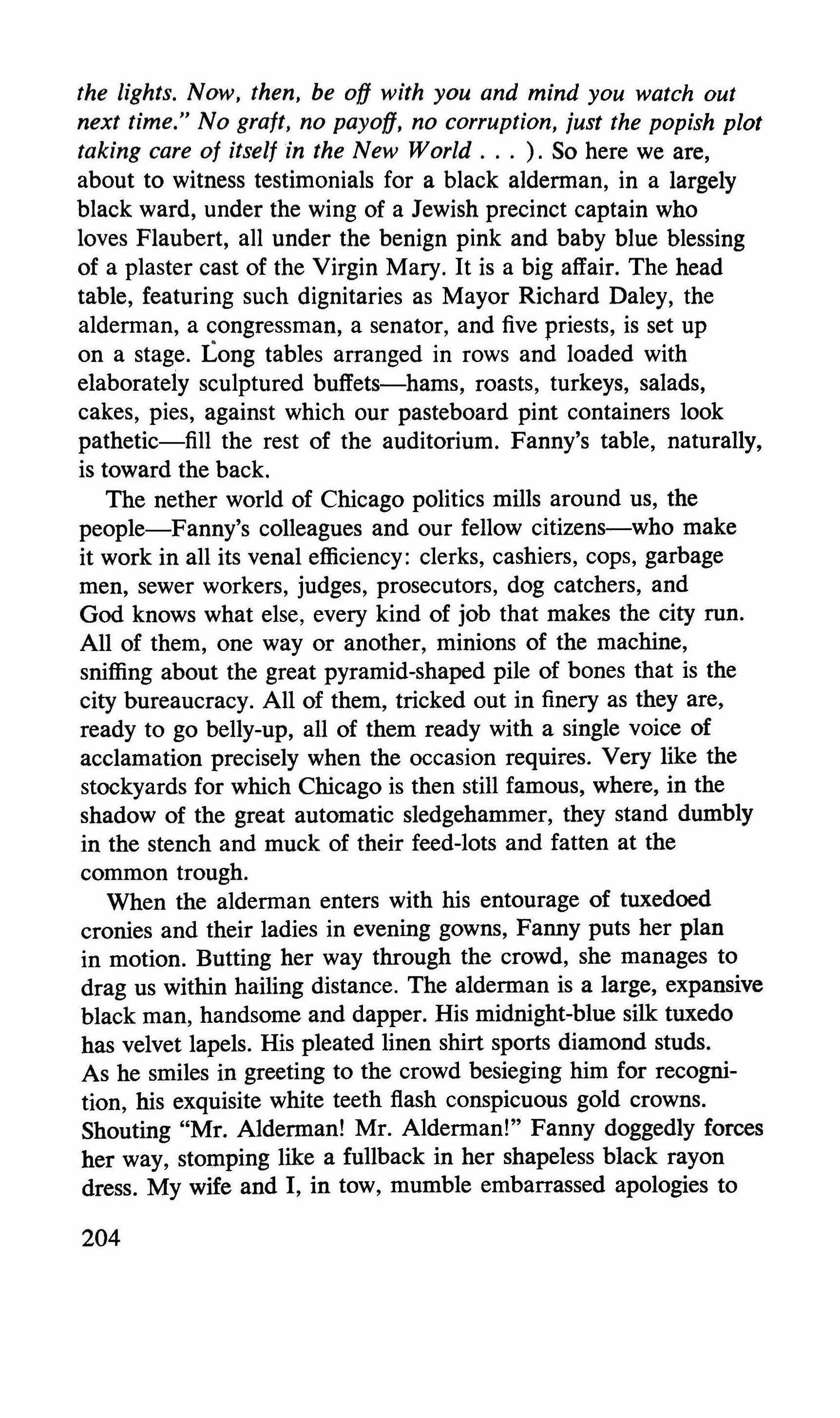
the lights. Now, then, be of} with you and mind you watch out next time." No graft, no payof}, no corruption, just the popish plot taking care of itself in the New World ). So here we are, about to witness testimonials for a black alderman, in a largely black ward, under the wing of a Jewish precinct captain who loves Flaubert, all under the benign pink and baby blue blessing of a plaster cast of the Virgin Mary. It is a big affair. The head table, featuring such dignitaries as Mayor Richard Daley, the alderman, a congressman, a senator, and five priests, is set up on a stage. Long tables arranged in rows and loaded with elaborately sculptured buffets-hams, roasts, turkeys, salads, cakes, pies, against which our pasteboard pint containers look pathetic-fill the rest of the auditorium. Fanny's table, naturally, is toward the back.
The nether world of Chicago politics mills around us, the people-Fanny's colleagues and our fellow citizens-who make it work in all its venal efficiency: clerks, cashiers, cops, garbage men, sewer workers, judges, prosecutors, dog catchers, and God knows what else, every kind of job that makes the city run. All of them, one way or another, minions of the machine, sniffing about the great pyramid-shaped pile of bones that is the city bureaucracy. All of them, tricked out in finery as they are, ready to go belly-up, all of them ready with a single voice of acclamation precisely when the occasion requires. Very like the stockyards for which Chicago is then still famous, where, in the shadow of the great automatic sledgehammer, they stand dumbly in the stench and muck of their feed-lots and fatten at the common trough.
When the alderman enters with his entourage of tuxedoed cronies and their ladies in evening gowns, Fanny puts her plan in motion. Butting her way through the crowd, she manages to drag us within hailing distance. The alderman is a large, expansive black man, handsome and dapper. His midnight-blue silk tuxedo has velvet lapels. His pleated linen shirt sports diamond studs. As he smiles in greeting to the crowd besieging him for recognition, his exquisite white teeth flash conspicuous gold crowns.
Shouting "Mr. Alderman! Mr. Alderman!" Fanny doggedly forces her way, stomping like a fullback in her shapeless black rayon dress. My wife and I, in tow, mumble embarrassed apologies to 204
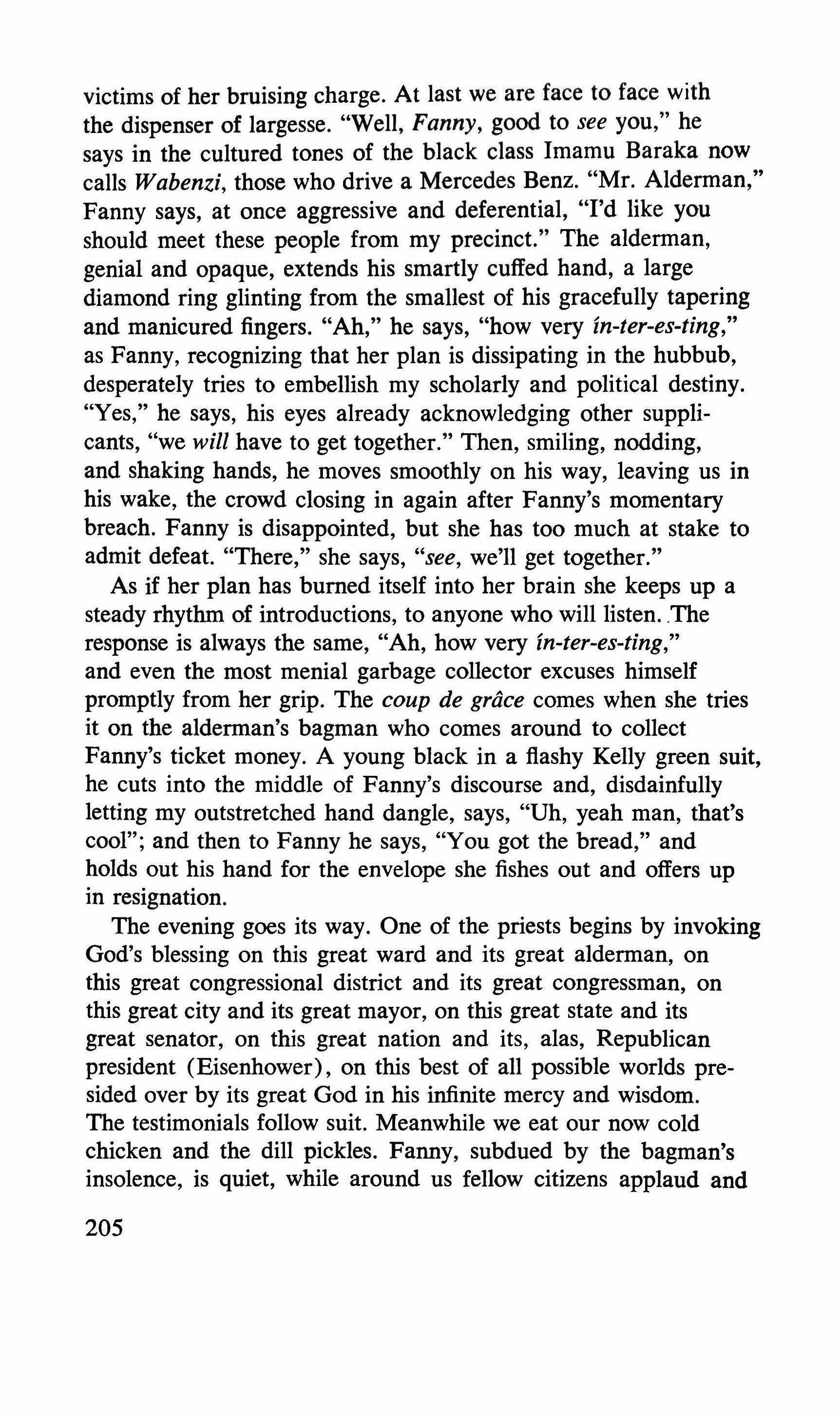
victims of her bruising charge. At last we are face to face with the dispenser of largesse. "Well, Fanny, good to see you," he says in the cultured tones of the black class Imamu Baraka now calls Wabenzi, those who drive a Mercedes Benz. "Mr. Alderman," Fanny says, at once aggressive and deferential, "I'd like you should meet these people from my precinct." The alderman, genial and opaque, extends his smartly cuffed hand, a large diamond ring glinting from the smallest of his gracefully tapering and manicured fingers. "Ah," he says, "how very in-ter-es-ting," as Fanny, recognizing that her plan is dissipating in the hubbub, desperately tries to embellish my scholarly and political destiny. "Yes," he says, his eyes already acknowledging other supplicants, "we will have to get together." Then, smiling, nodding, and shaking hands, he moves smoothly on his way, leaving us in his wake, the crowd closing in again after Fanny's momentary breach. Fanny is disappointed, but she has too much at stake to admit defeat. "There," she says, "see, we'll get together."
As if her plan has burned itself into her brain she keeps up a steady rhythm of introductions, to anyone who will listen The response is always the same, "Ah, how very in-ter-es-ting," and even the most menial garbage collector excuses himself promptly from her grip. The coup de grace comes when she tries it on the alderman's bagman who comes around to collect Fanny's ticket money. A young black in a flashy Kelly green suit, he cuts into the middle of Fanny's discourse and, disdainfully letting my outstretched hand dangle, says, "Uh, yeah man, that's cool"; and then to Fanny he says, "You got the bread," and holds out his hand for the envelope she fishes out and offers up in resignation.
The evening goes its way. One of the priests begins by invoking God's blessing on this great ward and its great alderman, on this great congressional district and its great congressman, on this great city and its great mayor, on this great state and its great senator, on this great nation and its, alas, Republican president (Eisenhower), on this best of all possible worlds presided over by its great God in his infinite mercy and wisdom. The testimonials follow suit. Meanwhile we eat our now cold chicken and the dill pickles. Fanny, subdued by the bagman's insolence, is quiet, while around us fellow citizens applaud and 205
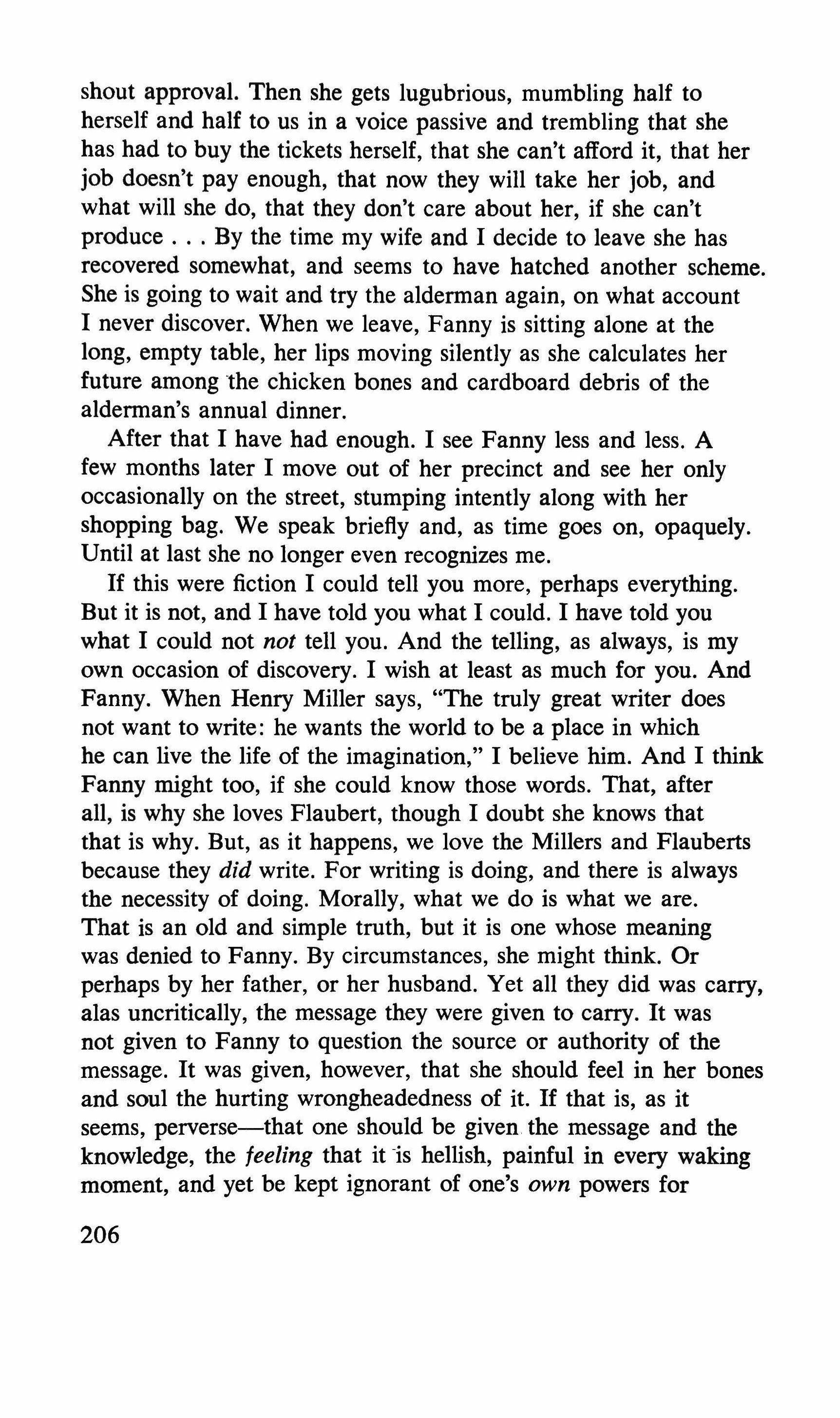
shout approval. Then she gets lugubrious, mumbling half to herself and half to us in a voice passive and trembling that she has had to buy the tickets herself, that she can't afford it, that her job doesn't pay enough, that now they will take her job, and what will she do, that they don't care about her, if she can't produce By the time my wife and I decide to leave she has recovered somewhat, and seems to have hatched another scheme. She is going to wait and try the alderman again, on what account I never discover. When we leave, Fanny is sitting alone at the long, empty table, her lips moving silently as she calculates her future among the chicken bones and cardboard debris of the alderman's annual dinner.
After that I have had enough. I see Fanny less and less. A few months later I move out of her precinct and see her only occasionally on the street, stumping intently along with her shopping bag. We speak briefly and, as time goes on, opaquely. Until at last she no longer even recognizes me.
If this were fiction I could tell you more, perhaps everything. But it is not, and I have told you what I could. I have told you what I could not not tell you. And the telling, as always, is my own occasion of discovery. I wish at least as much for you. And Fanny. When Henry Miller says, "The truly great writer does not want to write: he wants the world to be a place in which he can live the life of the imagination," I believe him. And I think Fanny might too, if she could know those words. That, after all, is why she loves Flaubert, though I doubt she knows that that is why. But, as it happens, we love the Millers and Flauberts because they did write. For writing is doing, and there is always the necessity of doing. Morally, what we do is what we are. That is an old and simple truth, but it is one whose meaning was denied to Fanny. By circumstances, she might think. Or perhaps by her father, or her husband. Yet all they did was carry, alas uncritically, the message they were given to carry. It was not given to Fanny to question the source or authority of the message. It was given, however, that she should feel in her bones and soul the hurting wrongheadedness of it. If that is, as it seems, perverse-that one should be given. the message and the knowledge, the feeling that it 'is hellish, painful in every waking moment, and yet be kept ignorant of one's own powers for 206
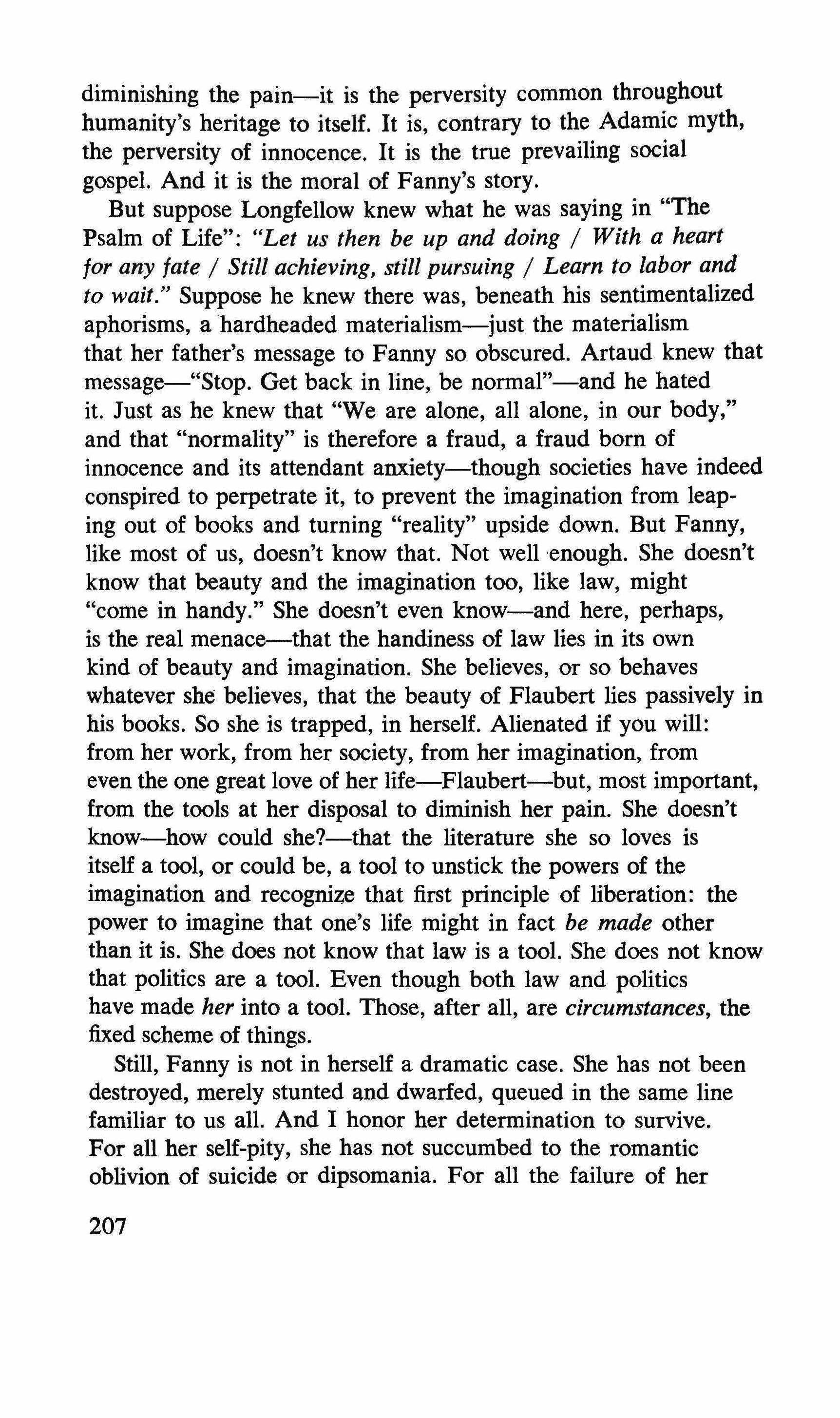
diminishing the pain-it is the perversity common throughout humanity's heritage to itself. It is, contrary to the Adamic myth, the perversity of innocence. It is the true prevailing social gospel. And it is the moral of Fanny's story.
But suppose Longfellow knew what he was saying in "The Psalm of Life": "Let us then be up and doing / With a heart for any fate / Still achieving, still pursuing / Learn to labor and to wait." Suppose he knew there was, beneath his sentimentalized aphorisms, a hardheaded materialism-just the materialism that her father's message to Fanny so obscured. Artaud knew that message-"Stop. Get back in line, be normal"-and he hated it. Just as he knew that "We are alone, all alone, in our body," and that "normality" is therefore a fraud, a fraud born of innocence and its attendant anxiety-though societies have indeed conspired to perpetrate it, to prevent the imagination from leaping out of books and turning "reality" upside down. But Fanny, like most of us, doesn't know that. Not well 'enough. She doesn't know that beauty and the imagination too, like law, might "come in handy." She doesn't even know-and here, perhaps, is the real menace-that the handiness of law lies in its own kind of beauty and imagination. She believes, or so behaves whatever she believes, that the beauty of Flaubert lies passively in his books. So she is trapped, in herself. Alienated if you will: from her work, from her society, from her imagination, from even the one great love of her life-Flaubert-but, most important, from the tools at her disposal to diminish her pain. She doesn't know-how could she?-that the literature she so loves is itself a tool, or could be, a tool to unstick the powers of the imagination and recognize that first principle of liberation: the power to imagine that one's life might in fact be made other than it is. She does not know that law is a tool. She does not know that politics are a tool. Even though both law and politics have made her into a tool. Those, after all, are circumstances, the fixed scheme of things.
Still, Fanny is not in herself a dramatic case. She has not been destroyed, merely stunted and dwarfed, queued in the same line familiar to us all. And I honor her determination to survive. For all her self-pity, she has not succumbed to the romantic oblivion of suicide or dipsomania. For all the failure of her 207

imagination, she has not taken the pathetic path of Anne Sexton or Sylvia Plath or John Berryman, the morally pointless path of those to whom it was given to question the source and authority of the message, the imaginatively bankrupt path of those who ultimately abused the privileges of beauty and imagination they had been given.
But there is much more in her to fear. Only in retrospect do I understand the relief I felt as my acquaintanceship with Fanny withered. As I look on my own contentions with the world of getting and spending, I see in Fanny the face of the "enemy." For Fanny is manifold. And if there is a conspiracy to keep us all in line, it is conspiracy by default, of those committed to lying in the bed that they have, for lack of alternative imagination, made. And so Fanny, whatever her pathos, whatever her victimization, is the enemy. Insofar as her staying in line provides a model and a temptation, she is the enemy. Insofar as she is, to keep the line moving and orderly, an apologist for its ethos, she is the enemy. Insofar as the very virtue of her survival-powers bind her to that ethos for her own survival, she is the enemy. For Fanny has not merely survived, she has prevailed. She symbolizes the gospel of perversity and its cancerous spread, with "progress," through the world. Stay in line until it hurts, and then hunker down and bear it. At the end when you retire, you will receive a pension and a gold Mickey Mouse watch with a universal calendar, on which you may compute how much you've been paid for the hours, days, weeks, months, and years of your life. "Efficiency" needs Fanny, and Fanny, willy-nilly, needs it. So Fanny is the enemy. And the ending of our friendship was a sanitary act, perhaps for both of us. I was not sorry then, nor am I now. Her indulgence of pain is a luxury I cannot afford. Still, I am of two minds when I think of her, for whatever else had or has her in its grip, when Fanny says Flaubert her mouth and her whole being make love, as if the word itself were flesh and her hot breath might bring it back to life.
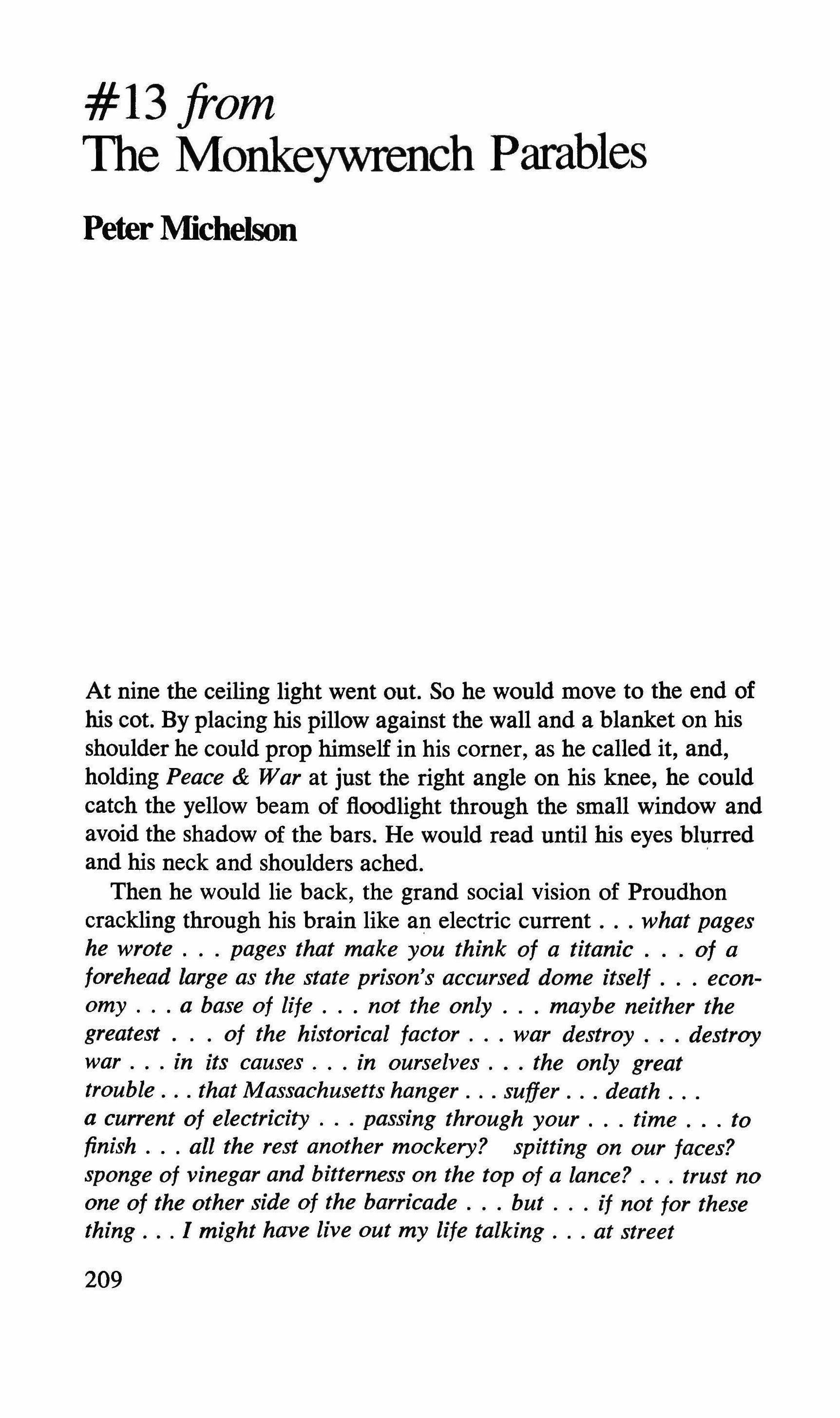
At nine the ceiling light went out. So he would move to the end of his cot. By placing his pillow against the wall and a blanket on his shoulder he could prop himself in his corner, as he called it, and, holding Peace & War at just the right angle on his knee, he could catch the yellow beam of floodlight through the small window and avoid the shadow of the bars. He would read until his eyes blurred and his neck and shoulders ached.
Then he would lie back, the grand social vision of Proudhon crackling through his brain like an electric current what pages he wrote pages that make you think of a titanic of a forehead large as the state prison's accursed dome itself economy a base of life not the only maybe neither the greatest of the historical factor war destroy destroy war in its causes in ourselves the only great trouble that Massachusetts hanger suffer death a current of electricity passing through your time to finish all the rest another mockery? spitting on our faces? sponge of vinegar and bitterness on the top of a lance? trust no one of the other side of the barricade but if not for these thing 1 might have live out my life talking at street
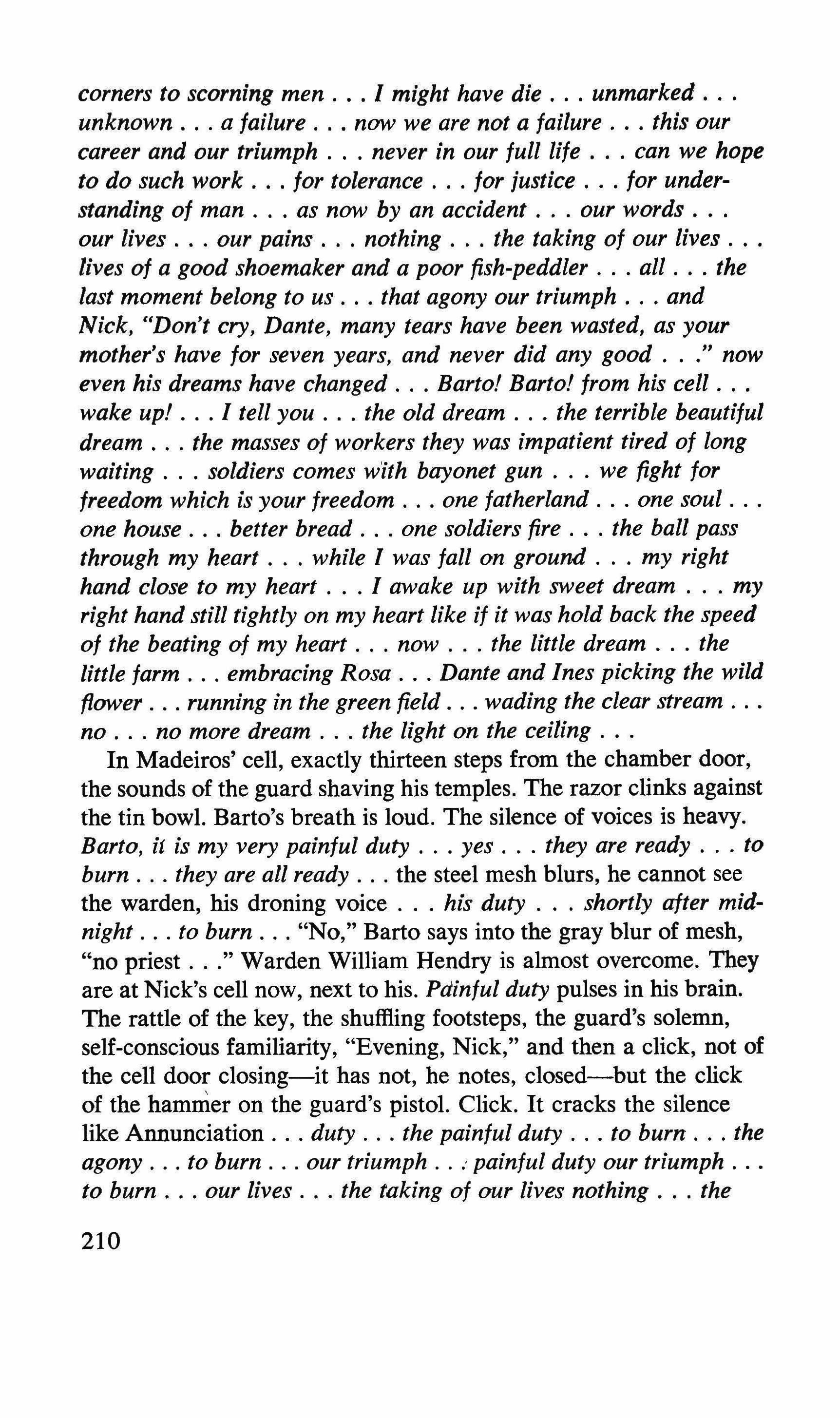
corners to scorning men I might have die unmarked unknown a failure now we are not a failure this our career and our triumph never in our full life can we hope to do such work for tolerance for justice for understanding of man as now by an accident our words our lives our pains nothing the taking of our lives lives of a good shoemaker and a poor fish-peddler all the last moment belong to us that agony our triumph and Nick, "Don't cry, Dante, many tears have been wasted, as your mother's have for seven years, and never did any good now even his dreams have changed Barto! Barto! from his cell wake up! I tell you the old dream the terrible beautiful dream the masses of workers they was impatient tired of long waiting soldiers comes with. bayonet gun we fight for freedom which is your freedom one fatherland one soul one house better bread one soldiers fire the ball pass through my heart while 1 was fall on ground my right hand close to my heart I awake up with sweet dream my right hand still tightly on my heart like if it was hold back the speed of the beating of my heart now the little dream the little farm embracing Rosa Dante and lnes picking the wild flower running in the green field wading the clear stream no no more dream the light on the ceiling
In Madeiros' cell, exactly thirteen steps from the chamber door, the sounds of the guard shaving his temples. The razor clinks against the tin bowl. Barto's breath is loud. The silence of voices is heavy. Barto, it is my very painful duty yes they are ready to burn they are all ready the steel mesh blurs, he cannot see the warden, his droning voice his duty shortly after midnight to burn "No," Barto says into the gray blur of mesh, "no priest ." Warden William Hendry is almost overcome. They are at Nick's cell now, next to his. Pdiniul duty pulses in his brain. The rattle of the key, the shuffling footsteps, the guard's solemn, self-conscious familiarity, "Evening, Nick," and then a click, not of the cell door closing-it has not, he notes, closed-but the click of the hammer on the guard's pistol. Click. It cracks the silence like Annunciation duty the painful duty to burn the agony to burn our triumph .' painful duty our triumph to burn our lives the taking of our lives nothing the 210
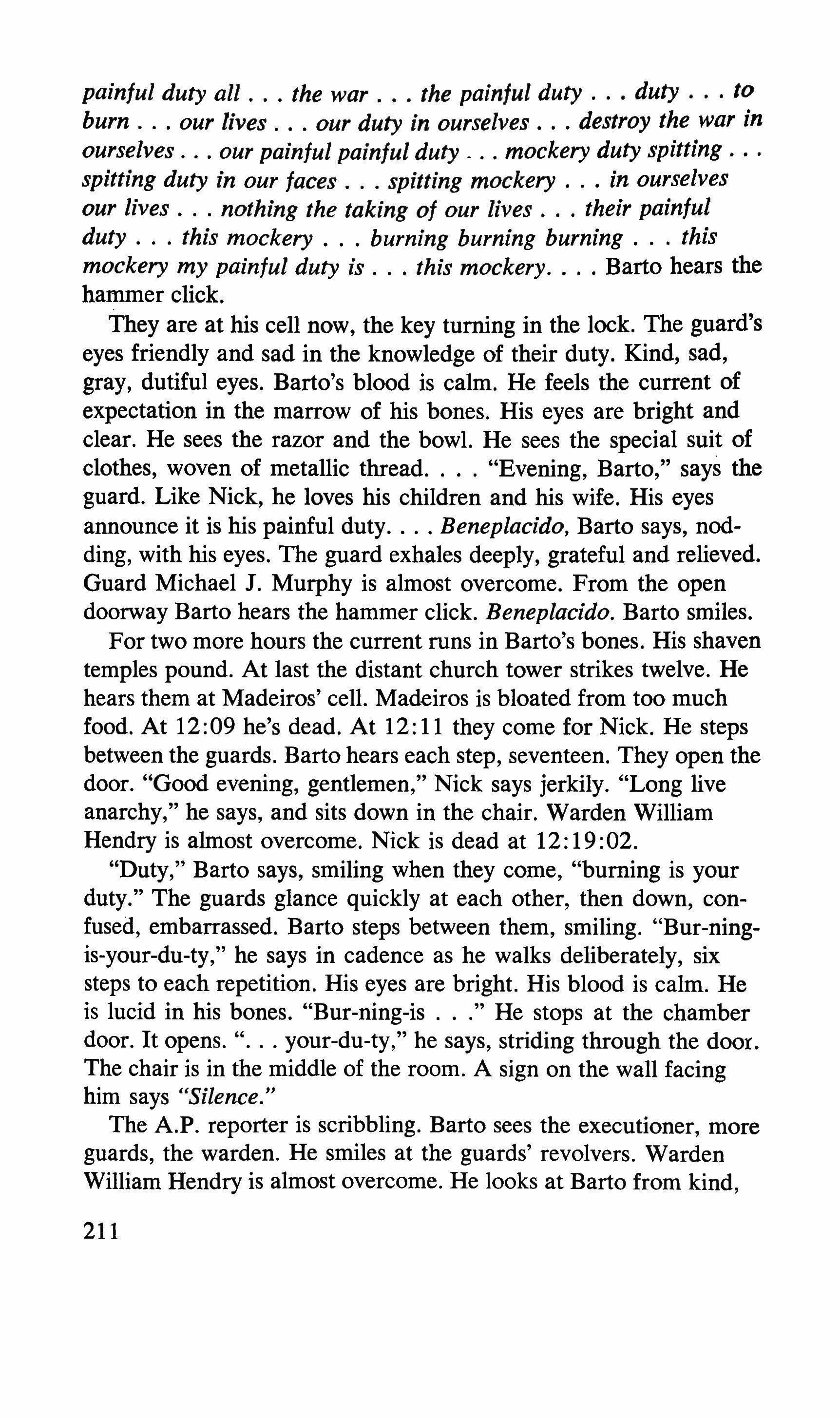
painful duty all the war the painful duty duty to burn our lives our duty in ourselves destroy the war in ourselves our painful painful duty mockery duty spitting spitting duty in our faces spitting mockery in ourselves our lives nothing the taking of our lives their painful duty this mockery burning burning burning this mockery my painful duty is this mockery Barto hears the hammer click.
They are at his cell now, the key turning in the lock. The guard's eyes friendly and sad in the knowledge of their duty. Kind, sad, gray, dutiful eyes. Barto's blood is calm. He feels the current of expectation in the marrow of his bones. His eyes are bright and clear. He sees the razor and the bowl. He sees the special suit of clothes, woven of metallic thread "Evening, Barto," says the guard. Like Nick, he loves his children and his wife. His eyes announce it is his painful duty Beneplacido, Barto says, nodding, with his eyes. The guard exhales deeply, grateful and relieved. Guard Michael J. Murphy is almost overcome. From the open doorway Barto hears the hammer click. Beneplacido. Barto smiles. For two more hours the current runs in Barto's bones. His shaven temples pound. At last the distant church tower strikes twelve. He hears them at Madeiros' cell. Madeiros is bloated from too much food. At 12:09 he's dead. At 12: 11 they come for Nick. He steps between the guards. Barto hears each step, seventeen. They open the door. "Good evening, gentlemen," Nick says jerkily. "Long live anarchy," he says, and sits down in the chair. Warden William Hendry is almost overcome. Nick is dead at 12:19:02.
"Duty," Barto says, smiling when they come, "burning is your duty." The guards glance quickly at each other, then down, confused, embarrassed. Barto steps between them, smiling. "Bur-ningis-your-du-ty," he says in cadence as he walks deliberately, six steps to each repetition. His eyes are bright. His blood is calm. He is lucid in his bones. "Bur-ning-is " He stops at the chamber door. It opens. your-du-ty," he says, striding through the door. The chair is in the middle of the room. A sign on the wall facing him says "Silence."
The A.P. reporter is scribbling. Barto sees the executioner, more guards, the warden. He smiles at the guards' revolvers. Warden William Hendry is almost overcome. He looks at Barto from kind, 211
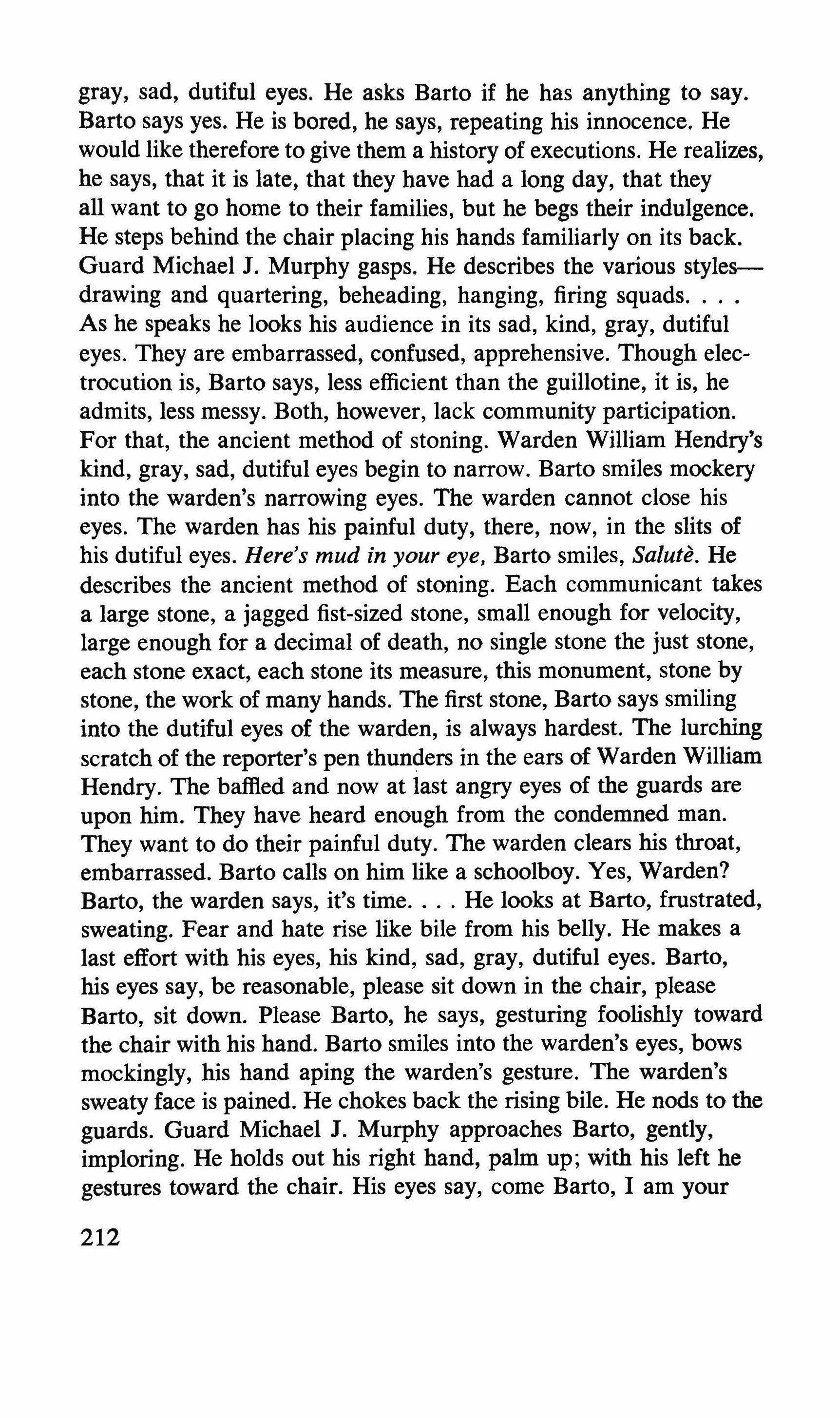
gray, sad, dutiful eyes. He asks Barto if he has anything to say. Barto says yes. He is bored, he says, repeating his innocence. He would like therefore to give them a history of executions. He realizes, he says, that it is late, that they have had a long day, that they all want to go home to their families, but he begs their indulgence. He steps behind the chair placing his hands familiarly on its back. Guard Michael I. Murphy gasps. He describes the various stylesdrawing and quartering, beheading, hanging, firing squads. As he speaks he looks his audience in its sad, kind, gray, dutiful eyes. They are embarrassed, confused, apprehensive. Though electrocution is, Barto says, less efficient than the guillotine, it is, he admits, less messy. Both, however, lack community participation. For that, the ancient method of stoning. Warden William Hendry's kind, gray, sad, dutiful eyes begin to narrow. Barto smiles mockery into the warden's narrowing eyes. The warden cannot close his eyes. The warden has his painful duty, there, now, in the slits of his dutiful eyes. Here's mud in your eye, Barto smiles, Salute. He describes the ancient method of stoning. Each communicant takes a large stone, a jagged fist-sized stone, small enough for velocity, large enough for a decimal of death, no single stone the just stone, each stone exact, each stone its measure, this monument, stone by stone, the work of many hands. The first stone, Barto says smiling into the dutiful eyes of the warden, is always hardest. The lurching scratch of the reporter's pen thunders in the ears of Warden William Hendry. The baffled and now at last angry eyes of the guards are upon him. They have heard enough from the condemned man. They want to do their painful duty. The warden clears his throat, embarrassed. Barto calls on him like a schoolboy. Yes, Warden? Barto, the warden says, it's time He looks at Barto, frustrated, sweating. Fear and hate rise like bile from his belly. He makes a last effort with his eyes, his kind, sad, gray, dutiful eyes. Barto, his eyes say, be reasonable, please sit down in the chair, please Barto, sit down. Please Barto, he says, gesturing foolishly toward the chair with his hand. Barto smiles into the warden's eyes, bows mockingly, his hand aping the warden's gesture. The warden's sweaty face is pained. He chokes back the rising bile. He nods to the guards. Guard Michael I. Murphy approaches Barto, gently, imploring. He holds out his right hand, palm up; with his left he gestures toward the chair. His eyes say, come Barto, I am your 212

friend, his kind, gray, sad, dutiful eyes. Barto smiles. The guard comes closer. Barto kicks him, perfect and viciously, in the balls. He staggers back, collapsing on the floor, his strident gagging detonates the room. Barto hears the click of many hammers. He laughs. His eyes are bright. His blood is calm. He is lucid in his bones. He lunges The warden's eyes are wide with hate and fear. The pistols explode at Barto's third step, reverberating through the chamber. Dumdums rip into the floor, the ceiling, the wall. One splatters into Barto's skull. The warden vomits as Barto pitches to the floor at his feet. Heavy breathing in the sudden silence. Bene, Barto says from the stinking slime of blood and vomit. Bene, Bene He is declared dead at 12:26:55.
Warden William Hendry was almost overcome by the executions, especially that of Vanzetti, who shook hands warmly and thanked him for all his kindnesses.
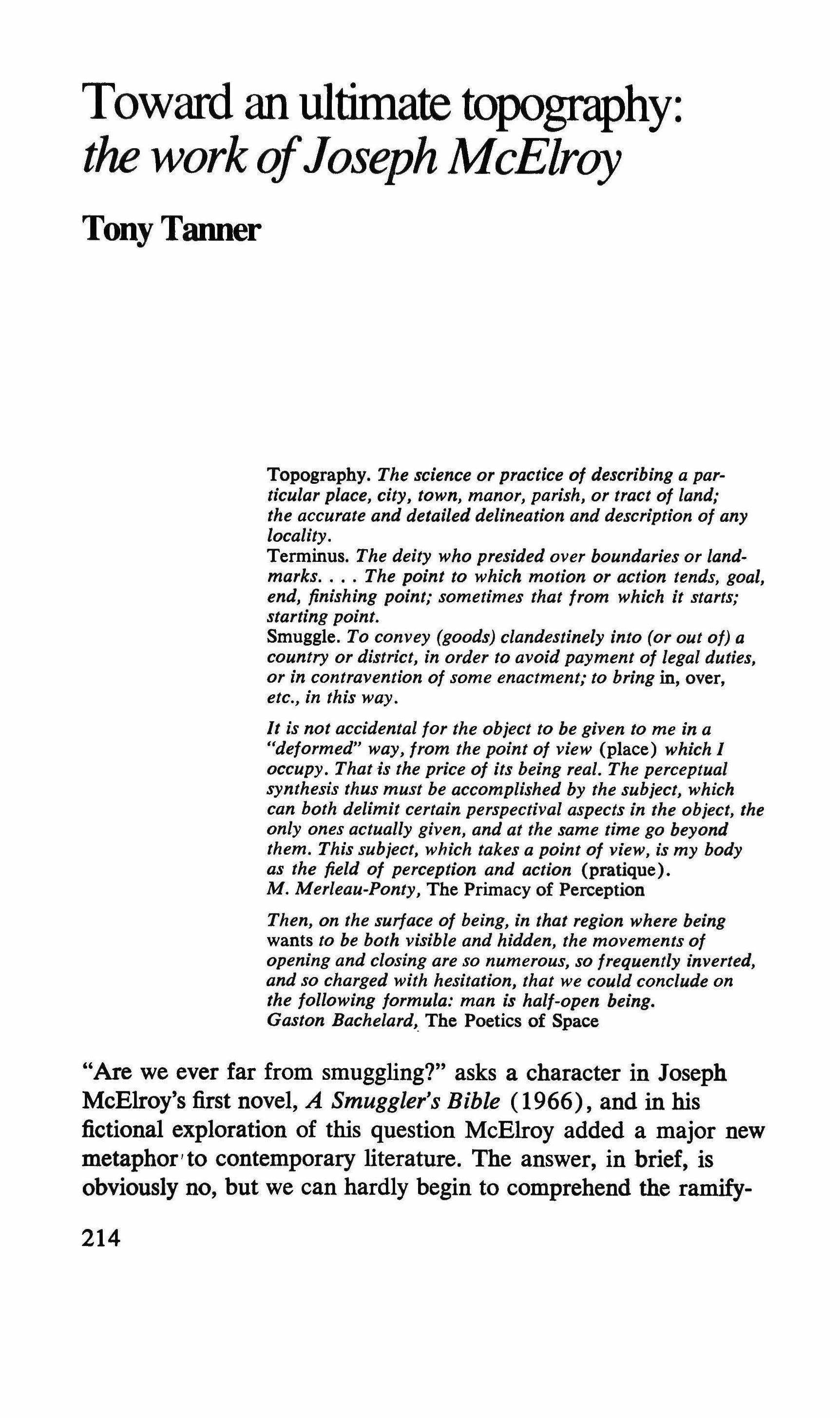
Topography. The science or practice of describing a particular place, city, town, manor, parish, or tract of land; the accurate and detailed delineation and description of any locality.
Terminus. The deity who presided over boundaries or landmarks The point to which motion or action tends, goal, end, finishing point; sometimes that from which it starts; starting point.
Smuggle. To convey (goods) clandestinely into (or out of) a country or district, in order to avoid payment of legal duties, or in contravention of some enactment; to bring in, over, etc., in this way.
It is not accidental for the object to be given to me in a "deformed" way, from the point of view (place) which I occupy. That is the price of its being real. The perceptual synthesis thus must be accomplished by the subject, which can both delimit certain perspectival aspects in the object, the only ones actually given, and at the same time go beyond them. This subject, which takes a point of view, is my body as the field of perception and action (pratique).
M. Merleau-Ponty, The Primacy of PerceptionThen, on the surface of being, in that region where being wants to be both visible and hidden, the movements of opening and closing are so numerous, so frequently inverted, and so charged with hesitation, that we could conclude on the following formula: man is half-open being.
Gaston Bachelard; The Poetics of Space
"Are we ever far from smuggling?" asks a character in Joseph McElroy's first novel, A Smuggler's Bible (1966), and in his fictional exploration of this question McElroy added a major new metaphor/to contemporary literature. The answer, in brief, is obviously no, but we can hardly begin to comprehend the ramify-
214
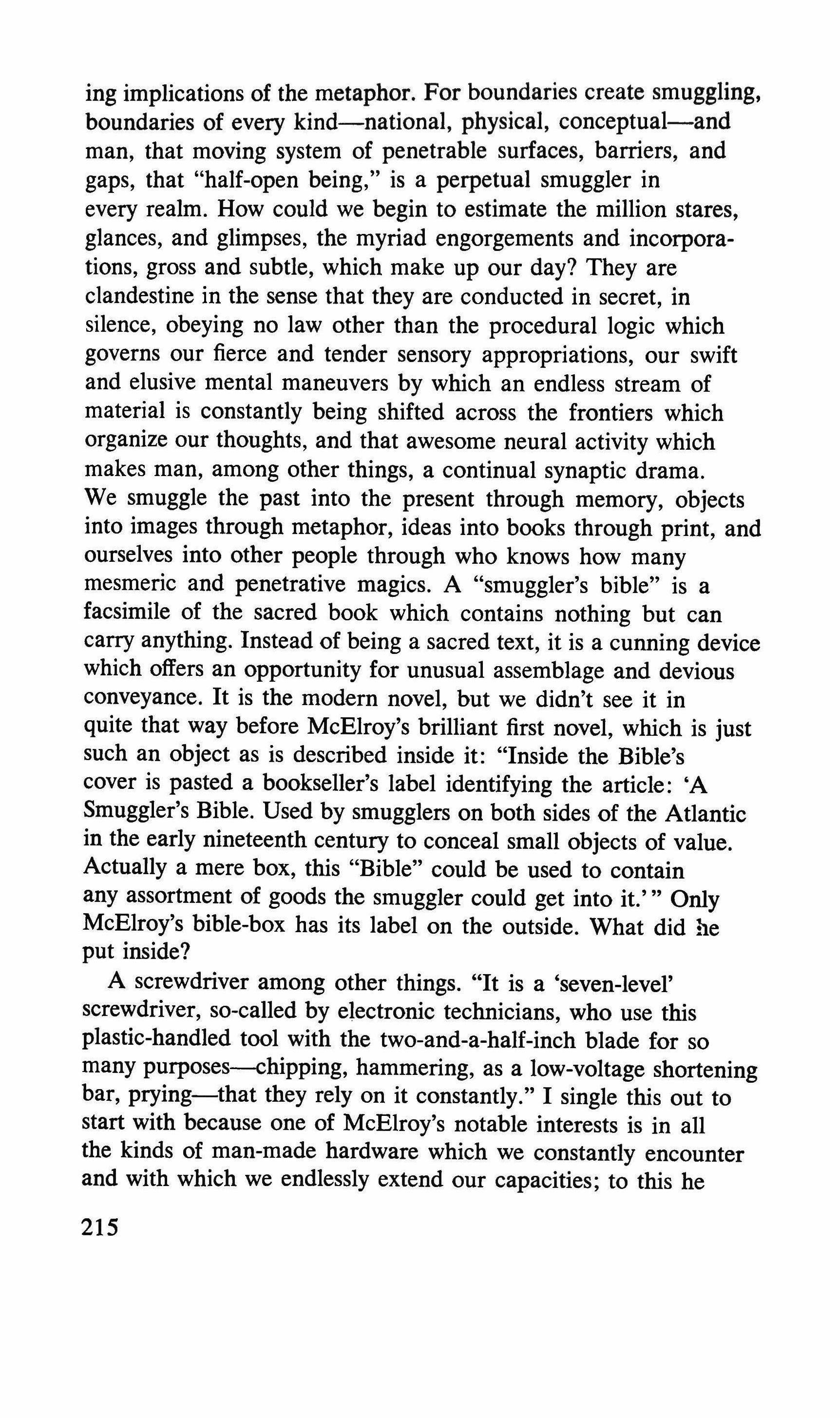
ing implications of the metaphor. For boundaries create smuggling, boundaries of every kind-national, physical, conceptual-and man, that moving system of penetrable surfaces, barriers, and gaps, that "half-open being," is a perpetual smuggler in every realm. How could we begin to estimate the million stares, glances, and glimpses, the myriad engorgements and incorporations, gross and subtle, which make up our day? They are clandestine in the sense that they are conducted in secret, in silence, obeying no law other than the procedural logic which governs our fierce and tender sensory appropriations, our swift and elusive mental maneuvers by which an endless stream of material is constantly being shifted across the frontiers which organize our thoughts, and that awesome neural activity which makes man, among other things, a continual synaptic drama. We smuggle the past into the present through memory, objects into images through metaphor, ideas into books through print, and ourselves into other people through who knows how many mesmeric and penetrative magics. A "smuggler's bible" is a facsimile of the sacred book which contains nothing but can carry anything. Instead of being a sacred text, it is a cunning device which offers an opportunity for unusual assemblage and devious conveyance. It is the modern novel, but we didn't see it in quite that way before McElroy's brilliant first novel, which is just such an object as is described inside it: "Inside the Bible's cover is pasted a bookseller's label identifying the article: 'A Smuggler's Bible. Used by smugglers on both sides of the Atlantic in the early nineteenth century to conceal small objects of value. Actually a mere box, this "Bible" could be used to contain any assortment of goods the smuggler could get into it.''' Only McElroy's bible-box has its label on the outside. What did he put inside?
A screwdriver among other things. "It is a 'seven-level' screwdriver, so-called by electronic technicians, who use this plastic-handled tool with the two-and-a-half-inch blade for so many purposes--chipping, hammering, as a low-voltage shortening bar, prying-that they rely on it constantly." I single this out to start with because one of McElroy's notable interests is in all the kinds of man-made hardware which we constantly encounter and with which we endlessly extend our capacities; to this he 215

affords an unromantic, demystifying, appreciative attention which opens up new possibilities for the way fiction can itself operate in the modern world. Other writers-Bellow, for instance-can give us the talk of our time in all its incredible variety; McElroy is rare in giving us some of the tools of our time in all their wondrous ingeniousness. I will return to this aspect of his work later on. For now I will temporarily purloin that seven-level screwdriver (as David, a character in the book, steals it from someone else) to pry open McElroy's seven-leveled book (as David uses it to open the actual smuggler's bible in the book which contains his manuscripts). There is a clear narrative situation. On board a ship making a transatlantic crossing an American named David Brooke, traveling with his English wife, is trying to organize a series of manuscripts he has brought with him. These consist of eight different "memories" which he has accumulated at different periods in his life by an effort of intense empathetic projection-at what cost to his own identity and his relations with others is one of the recurring problems of the book. This, if you like, is his loot, a sort of experiential contraband which he has smuggled out of other people's lives. His principal concern is the matter of connection. "Here's what he is thinking: Are the manuscripts one manuscript simply as they now stand? After all, they're crawling with links. Words in one manuscript recognize words in others, intransitive, transitive. There must surely be one substance the eight memories together make. And if not? If not, then David has barely a week to join them." Just what is connection, separation? What fits into a system, what makes a pattern, what constitutes a form? McElroy and his character share this preoccupation with other modem writers, of course. He has obviously appreciated Lowry's Under the Volcano and Gaddis' The Recognitions, and as obviously read Nabokov, Borges, and Beckett, as who has not? He must likewise be well aware of what Pynchon has been doing from the start, and no writer has made more out of the very concepts of plot, pattern, frame, etc., than Pynchon. He has read lots of other things, too, but the matter of degrees of influence is irrelevant. McElroy's interest is in the very structure of perceptionhow do you see the coherent field of objects, if you do? If not,
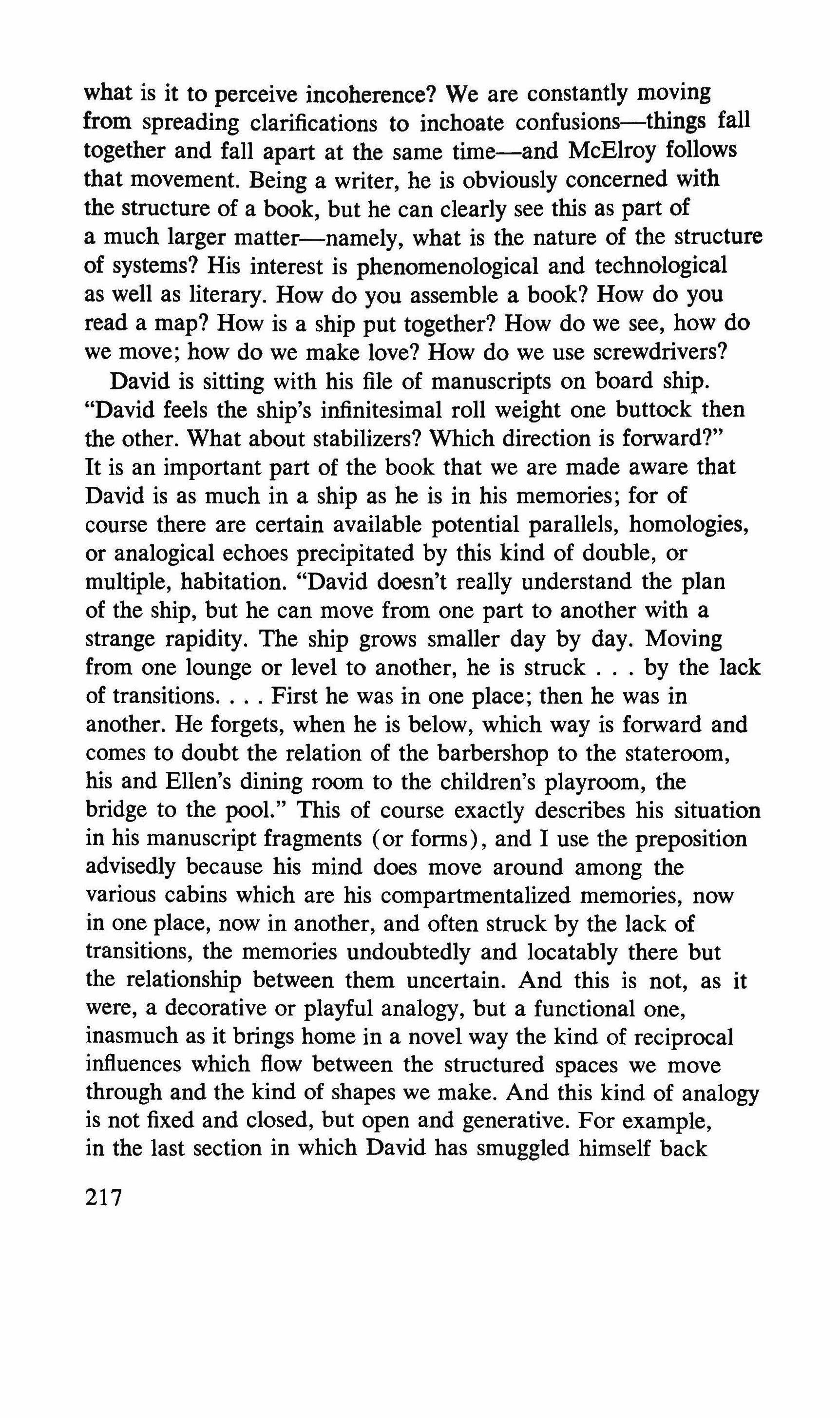
what is it to perceive incoherence? We are constantly moving from spreading clarifications to inchoate confusions-things fall together and fall apart at the same time-and McElroy follows that movement. Being a writer, he is obviously concerned with the structure of a book, but he can clearly see this as part of a much larger matter-namely, what is the nature of the structure of systems? His interest is phenomenological and technological as well as literary. How do you assemble a book? How do you read a map? How is a ship put together? How do we see, how do we move; how do we make love? How do we use screwdrivers? David is sitting with his file of manuscripts on board ship. "David feels the ship's infinitesimal roll weight one buttock then the other. What about stabilizers? Which direction is forward?" It is an important part of the book that we are made aware that David is as much in a ship as he is in his memories; for of course there are certain available potential parallels, homologies, or analogical echoes precipitated by this kind of double, or multiple, habitation. "David doesn't really understand the plan of the ship, but he can move from one part to another with a strange rapidity. The ship grows smaller day by day. Moving from one lounge or level to another, he is struck by the lack of transitions First he was in one place; then he was in another. He forgets, when he is below, which way is forward and comes to doubt the relation of the barbershop to the stateroom, his and Ellen's dining room to the children's playroom, the bridge to the pool." This of course exactly describes his situation in his manuscript fragments (or forms), and I use the preposition advisedly because his mind does move around among the various cabins which are his compartmentalized memories, now in one place, now in another, and often struck by the lack of transitions, the memories undoubtedly and locatably there but the relationship between them uncertain. And this is not, as it were, a decorative or playful analogy, but a functional one, inasmuch as it brings home in a novel way the kind of reciprocal influences which flow between the structured spaces we move through and the kind of shapes we make. And this kind of analogy is not fixed and closed, but open and generative. For example, in the last section in which David has smuggled himself back 217
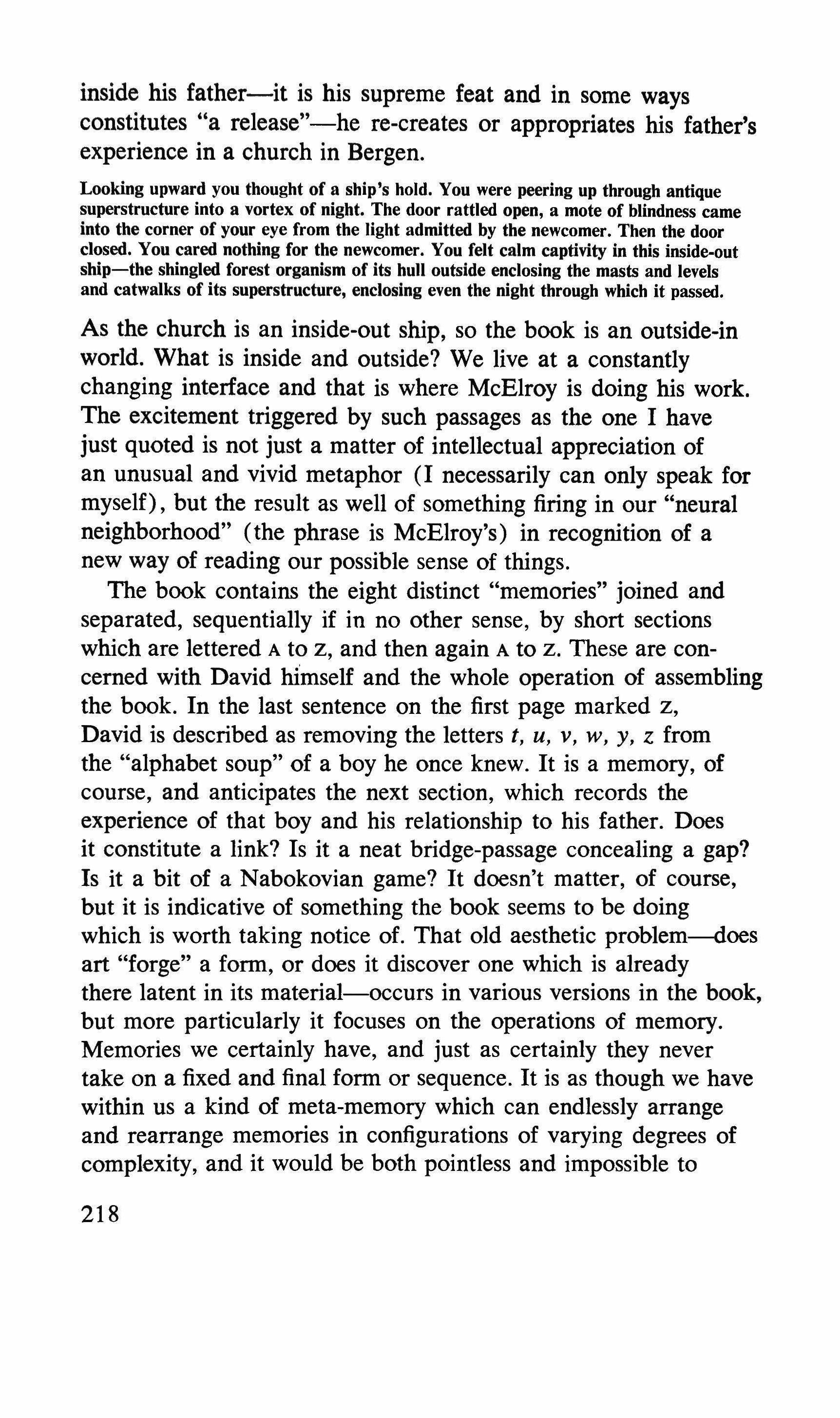
inside his father-it is his supreme feat and in some ways constitutes "a release"-he re-creates or appropriates his father's experience in a church in Bergen.
Looking upward you thought of a ship's hold. You were peering up through antique superstructure into a vortex of night. The door rattled open, a mote of blindness came into the corner of your eye from the light admitted by the newcomer. Then the door closed. You cared nothing for the newcomer. You felt calm captivity in this inside-out ship-the shingled forest organism of its hull outside enclosing the masts and levels and catwalks of its superstructure, enclosing even the night through which it passed.
As the church is an inside-out ship, so the book is an outside-in world. What is inside and outside? We live at a constantly changing interface and that is where McElroy is doing his work. The excitement triggered by such passages as the one I have just quoted is not just a matter of intellectual appreciation of an unusual and vivid metaphor (I necessarily can only speak for myself), but the result as well of something firing in our "neural neighborhood" (the phrase is McElroy's) in recognition of a new way of reading our possible sense of things.
The book contains the eight distinct "memories" joined and separated, sequentially if in no other sense, by short sections which are lettered A to z, and then again A to z. These are concerned with David himself and the whole operation of assembling the book. In the last sentence on the first page marked z, David is described as removing the letters t, U, V, w, y, z from the "alphabet soup" of a boy he once knew. It is a memory, of course, and anticipates the next section, which records the experience of that boy and his relationship to his father. Does it constitute a link? Is it a neat bridge-passage concealing a gap? Is it a bit of a Nabokovian game? It doesn't matter, of course, but it is indicative of something the book seems to be doing which is worth taking notice of. That old aesthetic problem--does art "forge" a form, or does it discover one which is already there latent in its material-occurs in various versions in the book, but more particularly it focuses on the operations of memory. Memories we certainly have, and just as certainly they never take on a fixed and final form or sequence. It is as though we have within us a kind of meta-memory which can endlessly arrange and rearrange memories in configurations of varying degrees of complexity, and it would be both pointless and impossible to
218
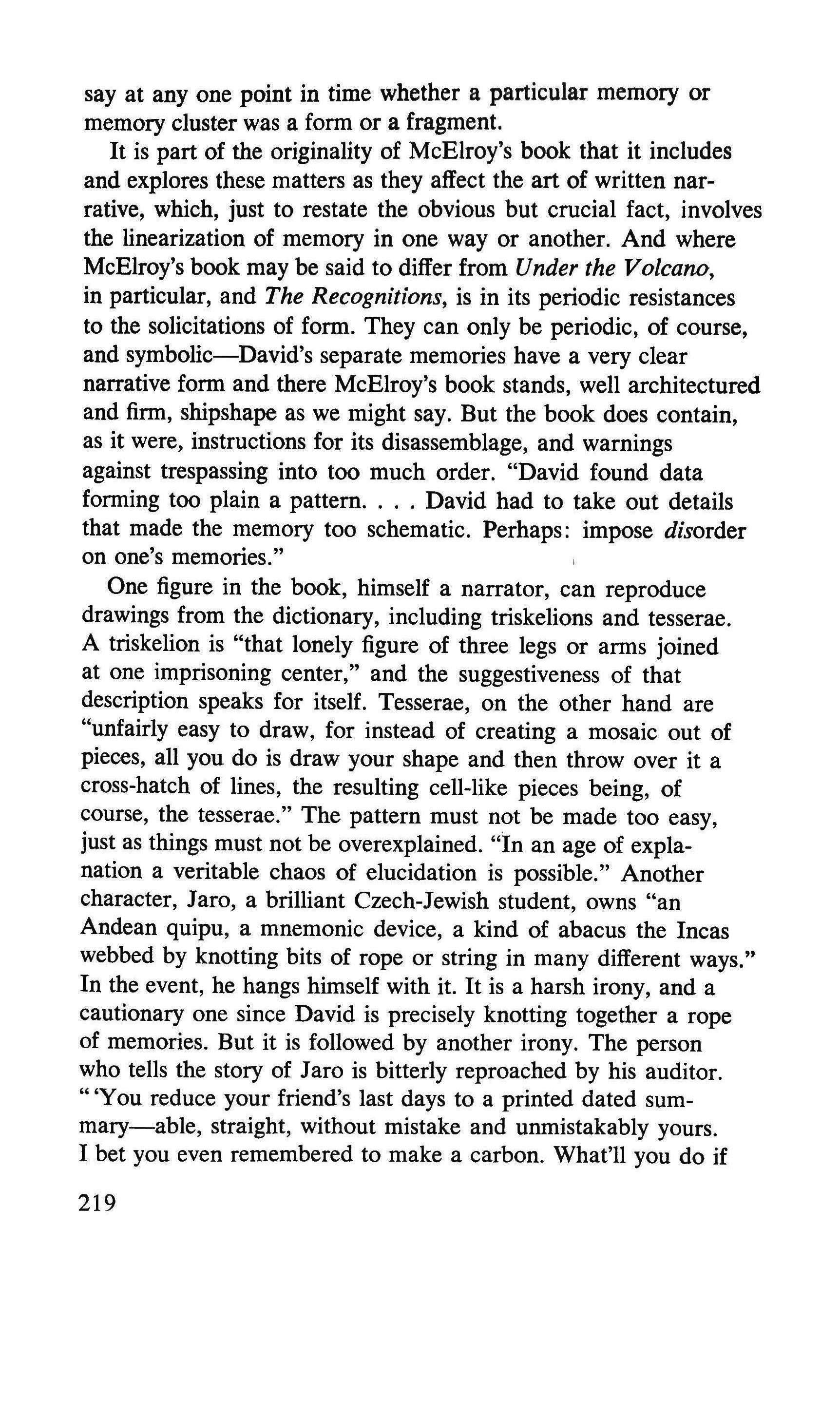
say at anyone point in time whether a particular memory or memory cluster was a form or a fragment. It is part of the originality of McElroy's book that it includes and explores these matters as they affect the art of written narrative, which, just to restate the obvious but crucial fact, involves the linearization of memory in one way or another. And where McElroy's book may be said to differ from Under the Volcano, in particular, and The Recognitions, is in its periodic resistances to the solicitations of form. They can only be periodic, of course, and symbolic-David's separate memories have a very clear narrative form and there McElroy's book stands, well architectured and firm, shipshape as we might say. But the book does contain, as it were, instructions for its disassemblage, and warnings against trespassing into too much order. "David found data forming too plain a pattern. David had to take out details that made the memory too schematic. Perhaps: impose disorder on one's memories."
One figure in the book, himself a narrator, can reproduce drawings from the dictionary, including triskelions and tesserae. A triskelion is "that lonely figure of three legs or arms joined at one imprisoning center," and the suggestiveness of that description speaks for itself. Tesserae, on the other hand are "unfairly easy to draw, for instead of creating a mosaic out of pieces, all you do is draw your shape and then throw over it a cross-hatch of lines, the resulting cell-like pieces being, of course, the tesserae." The pattern must not be made too easy, just as things must not be overexplained. "In an age of explanation a veritable chaos of elucidation is possible." Another character, Jaro, a brilliant Czech-Jewish student, owns "an Andean quipu, a mnemonic device, a kind of abacus the Incas webbed by knotting bits of rope or string in many different ways." In the event, he hangs himself with it. It is a harsh irony, and a cautionary one since David is precisely knotting together a rope of memories. But it is followed by another irony. The person who tells the story of Jaro is bitterly reproached by his auditor. "'You reduce your friend's last days to a printed dated summary-able, straight, without mistake and unmistakably yours. I bet you even remembered to make a carbon. What'll you do if
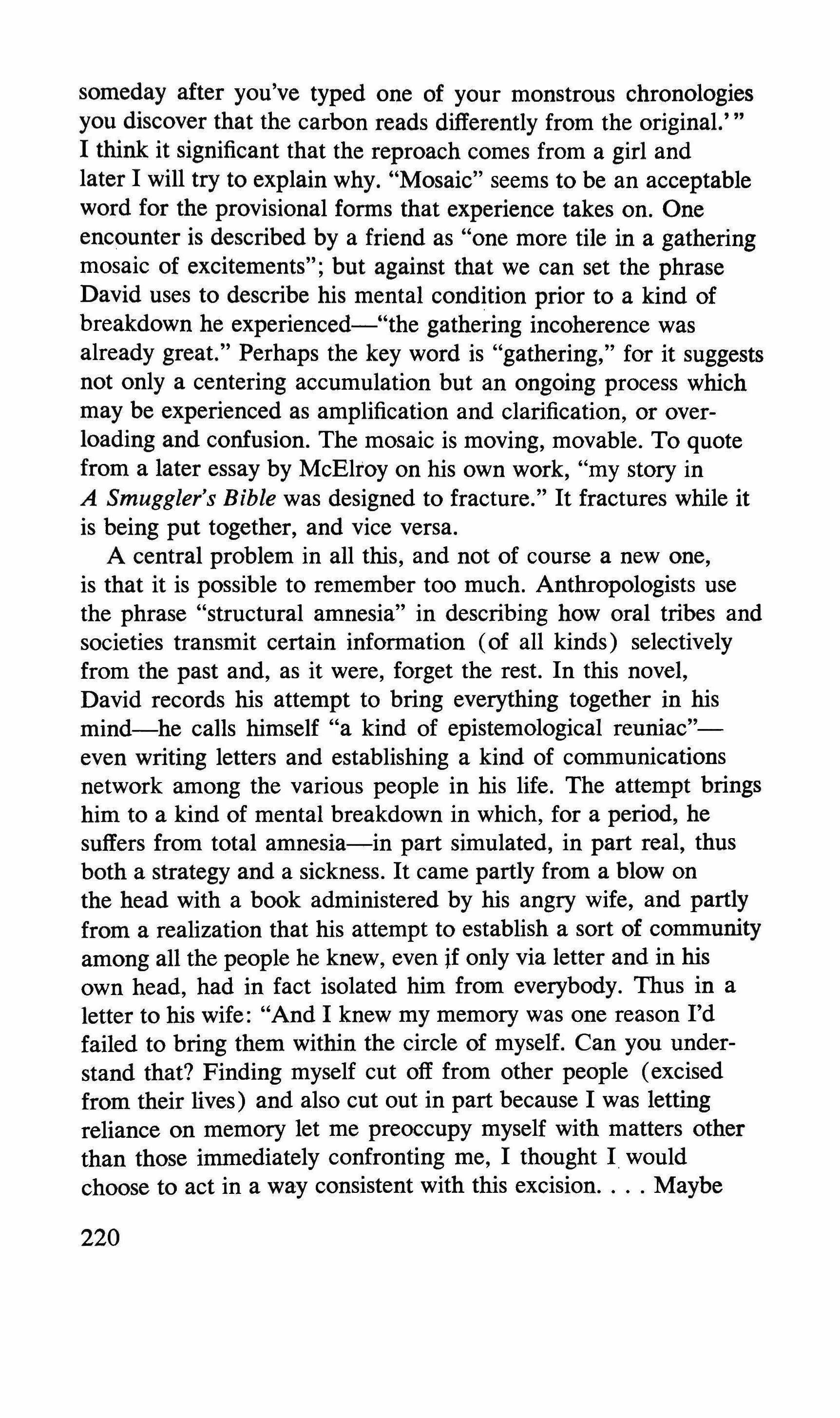
someday after you've typed one of your monstrous chronologies you discover that the carbon reads differently from the originaL'" I think it significant that the reproach comes from a girl and later I will try to explain why. "Mosaic" seems to be an acceptable word for the provisional forms that experience takes on. One encounter is described by a friend as "one more tile in a gathering mosaic of excitements"; but against that we can set the phrase David uses to describe his mental condition prior to a kind of breakdown he experienced-"the gathering incoherence was already great." Perhaps the key word is "gathering," for it suggests not only a centering accumulation but an ongoing process which may be experienced as amplification and clarification, or overloading and confusion. The mosaic is moving, movable. To quote from a later essay by Mcfilroy on his own work, "my story in A Smuggler's Bible was designed to fracture." It fractures while it is being put together, and vice versa.
A central problem in all this, and not of course a new one, is that it is possible to remember too much. Anthropologists use the phrase "structural amnesia" in describing how oral tribes and societies transmit certain information (of all kinds) selectively from the past and, as it were, forget the rest. In this novel, David records his attempt to bring everything together in his mind-he calls himself "a kind of epistemological reuniac"even writing letters and establishing a kind of communications network among the various people in his life. The attempt brings him to a kind of mental breakdown in which, for a period, he suffers from total amnesia-in part simulated, in part real, thus both a strategy and a sickness. It came partly from a blow on the head with a book administered by his angry wife, and partly from a realization that his attempt to establish a sort of community among all the people he knew, even if only via letter and in his own head, had in fact isolated him from everybody. Thus in a letter to his wife: "And I knew my memory was one reason I'd failed to bring them within the circle of myself. Can you understand that? Finding myself cut off from other people (excised from their lives) and also cut out in part because I was letting reliance on memory let me preoccupy myself with matters other than those immediately confronting me, I thought I would choose to act in a way consistent with this excision. Maybe
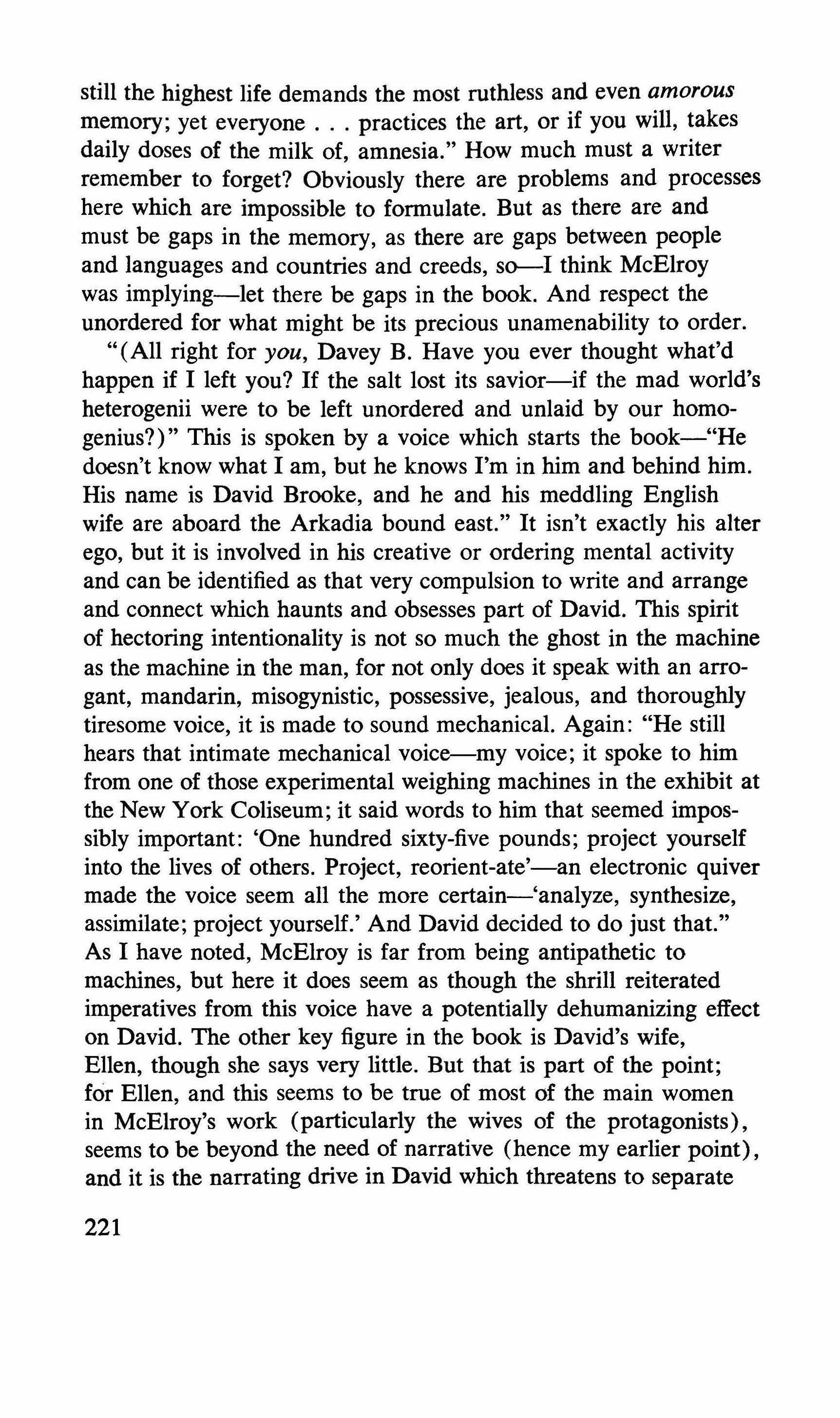
still the highest life demands the most ruthless and even amorous memory; yet everyone practices the art, or if you will, takes daily doses of the milk of, amnesia." How much must a writer remember to forget? Obviously there are problems and processes here which are impossible to formulate. But as there are and must be gaps in the memory, as there are gaps between people and languages and countries and creeds, so--I think McElroy was implying-let there be gaps in the book. And respect the unordered for what might be its precious unamenability to order. "(All right for you, Davey B. Have you ever thought what'd happen if I left you? If the salt lost its savior-if the mad world's heterogenii were to be left unordered and unlaid by our homogenius?)" This is spoken by a voice which starts the book-"He doesn't know what I am, but he knows I'm in him and behind him. His name is David Brooke, and he and his meddling English wife are aboard the Arkadia bound east." It isn't exactly his alter ego, but it is involved in his creative or ordering mental activity and can be identified as that very compulsion to write and arrange and connect which haunts and obsesses part of David. This spirit of hectoring intentionality is not so much the ghost in the machine as the machine in the man, for not only does it speak with an arrogant, mandarin, misogynistic, possessive, jealous, and thoroughly tiresome voice, it is made to sound mechanical. Again: "He still hears that intimate mechanical voice-my voice; it spoke to him from one of those experimental weighing machines in the exhibit at the New York Coliseum; it said words to him that seemed impossibly important: 'One hundred sixty-five pounds; project yourself into the lives of others. Project, reorient-ate'-an electronic quiver made the voice seem all the more certain-'analyze, synthesize, assimilate; project yourself.' And David decided to do just that." As I have noted, McElroy is far from being antipathetic to machines, but here it does seem as though the shrill reiterated imperatives from this voice have a potentially dehumanizing effect on David. The other key figure in the book is David's wife, Ellen, though she says very little. But that is part of the point; for Ellen, and this seems to be true of most of the main women in McElroy's work (particularly the wives of the protagonists), seems to be beyond the need of narrative (hence my earlier point), and it is the narrating drive in David which threatens to separate 221
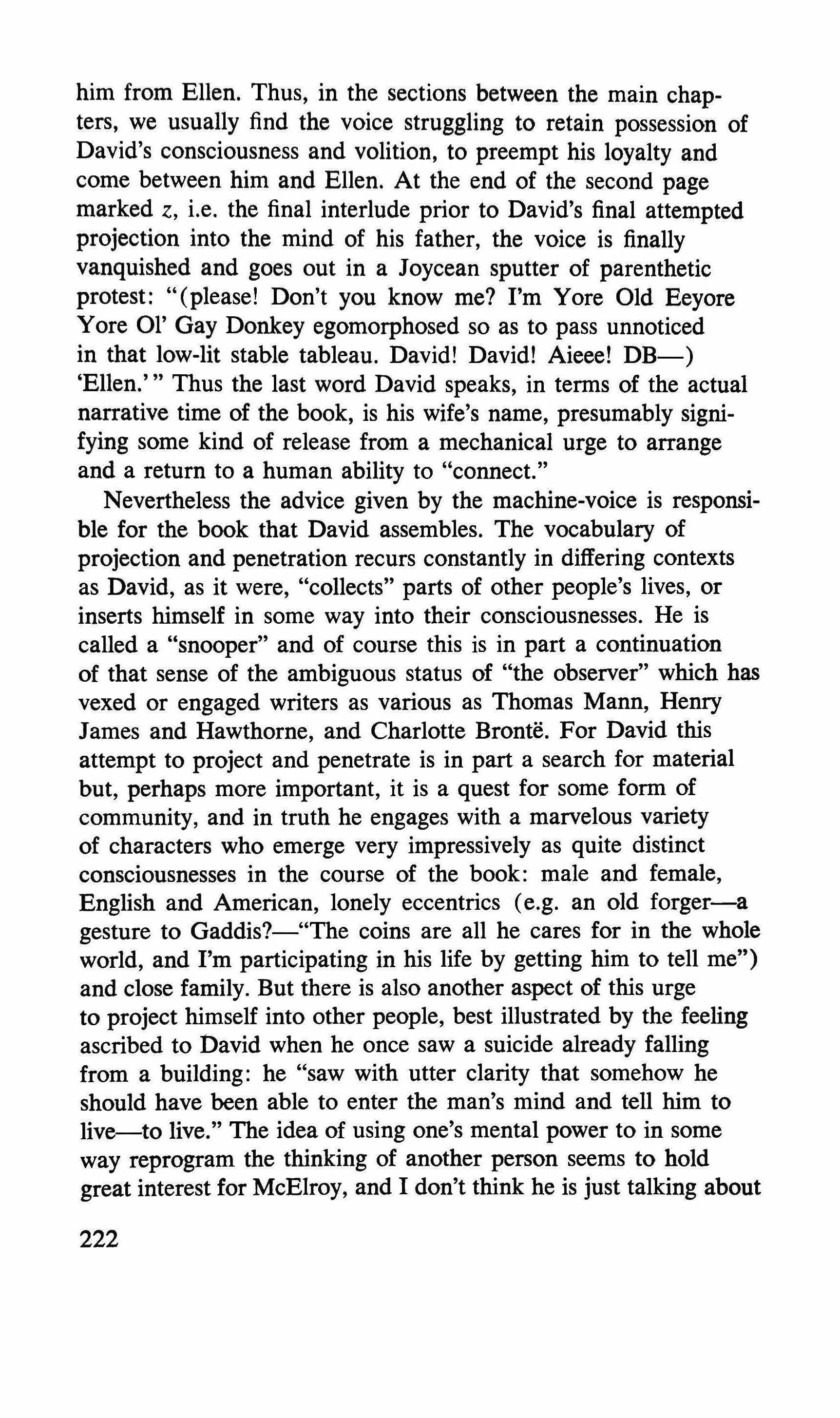
him from Ellen. Thus, in the sections between the main chapters, we usually find the voice struggling to retain possession of David's consciousness and volition, to preempt his loyalty and come between him and Ellen. At the end of the second page marked z, i.e. the final interlude prior to David's final attempted projection into the mind of his father, the voice is finally vanquished and goes out in a Joycean sputter of parenthetic protest: "(please! Don't you know me? I'm Yore Old Eeyore Yore 01' Gay Donkey egomorphosed so as to pass unnoticed in that low-lit stable tableau. David! David! Aieee! DB-) 'Ellen.'" Thus the last word David speaks, in terms of the actual narrative time of the book, is his wife's name, presumably signifying some kind of release from a mechanical urge to arrange and a return to a human ability to "connect."
Nevertheless the advice given by the machine-voice is responsible for the book that David assembles. The vocabulary of projection and penetration recurs constantly in differing contexts as David, as it were, "collects" parts of other people's lives, or inserts himself in some way into their consciousnesses. He is called a "snooper" and of course this is in part a continuation of that sense of the ambiguous status of "the observer" which has vexed or engaged writers as various as Thomas Mann, Henry James and Hawthorne, and Charlotte Bronte. For David this attempt to project and penetrate is in part a search for material but, perhaps more important, it is a quest for some form of community, and in truth he engages with a marvelous variety of characters who emerge very impressively as quite distinct consciousnesses in the course of the book: male and female, English and American, lonely eccentrics (e.g. an old forger-a gesture to Gaddis?-"The coins are all he cares for in the whole world, and I'm participating in his life by getting him to tell me") and close family. But there is also another aspect of this urge to project himself into other people, best illustrated by the feeling ascribed to David when he once saw a suicide already falling from a building: he "saw with utter clarity that somehow he should have been able to enter the man's mind and tell him to live-to live." The idea of using one's mental power to in some way reprogram the thinking of another person seems to hold great interest for McElroy, and I don't think he is just talking about
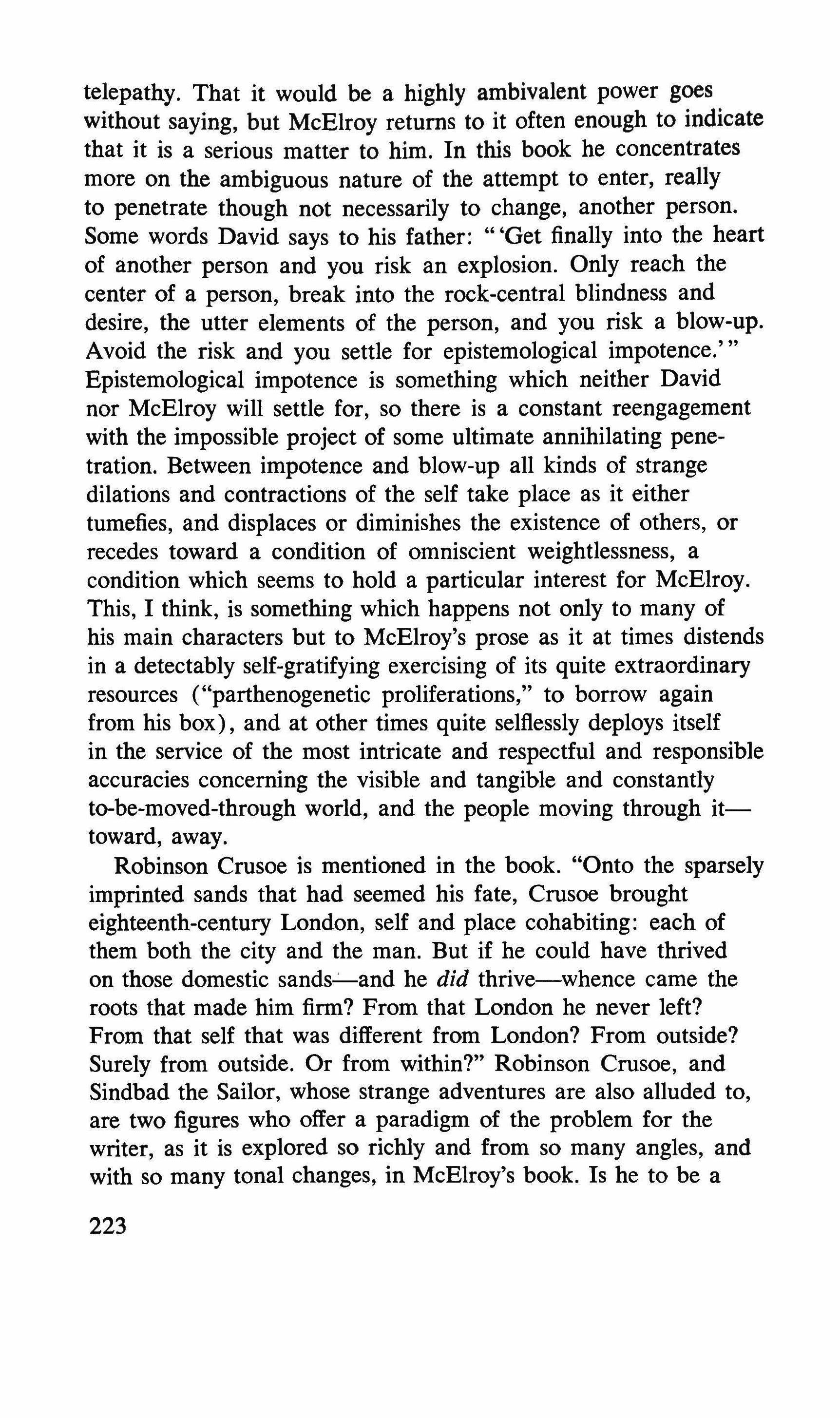
telepathy. That it would be a highly ambivalent power goes without saying, but McElroy returns to it often enough to indicate that it is a serious matter to him. In this book he concentrates more on the ambiguous nature of the attempt to enter, really to penetrate though not necessarily to change, another person. Some words David says to his father: "'Get finally into the heart of another person and you risk an explosion. Only reach the center of a person, break into the rock-central blindness and desire, the utter elements of the person, and you risk a blow-up. Avoid the risk and you settle for epistemological impotence.'" Epistemological impotence is something which neither David nor McElroy will settle for, so there is a constant reengagement with the impossible project of some ultimate annihilating penetration. Between impotence and blow-up all kinds of strange dilations and contractions of the self take place as it either tumefies, and displaces or diminishes the existence of others, or recedes toward a condition of omniscient weightlessness, a condition which seems to hold a particular interest for McElroy. This, I think, is something which happens not only to many of his main characters but to McElroy's prose as it at times distends in a detectably self-gratifying exercising of its quite extraordinary resources ("parthenogenetic proliferations," to borrow again from his box), and at other times quite selflessly deploys itself in the service of the most intricate and respectful and responsible accuracies concerning the visible and tangible and constantly to-be-moved-through world, and the people moving through ittoward, away.
Robinson Crusoe is mentioned in the book. "Onto the sparsely imprinted sands that had seemed his fate, Crusoe brought eighteenth-century London, self and place cohabiting: each of them both the city and the man. But if he could have thrived on those domestic sands--and he did thrive-whence came the roots that made him firm? From that London he never left? From that self that was different from London? From outside? Surely from outside. Or from within?" Robinson Crusoe, and Sindbad the Sailor, whose strange adventures are also alluded to, are two figures who offer a paradigm of the problem for the writer, as it is explored so richly and from so many angles, and with so many tonal changes, in McElroy's book. Is he to be a
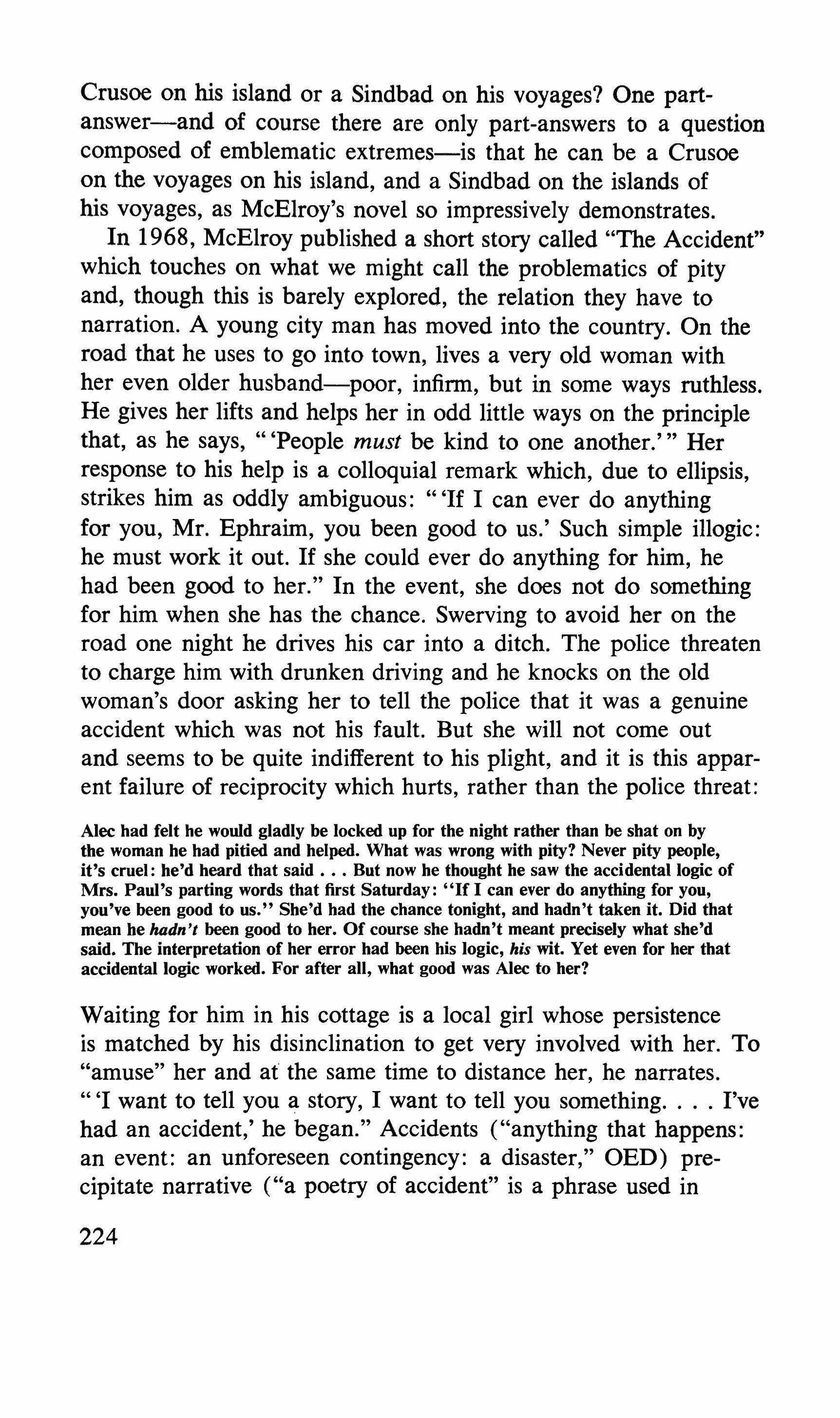
Crusoe on his island or a Sindbad on his voyages? One partanswer-and of course there are only part-answers to a question composed of emblematic extremes-is that he can be a Crusoe on the voyages on his island, and a Sindbad on the islands of his voyages, as McElroy's novel so impressively demonstrates. In 1968, McElroy published a short story called "The Accident" which touches on what we might call the problematics of pity and, though this is barely explored, the relation they have to narration. A young city man has moved into the country. On the road that he uses to go into town, lives a very old woman with her even older husband-poor, infirm, but in some ways ruthless. He gives her lifts and helps her in odd little ways on the principle that, as he says, "'People must be kind to one another.'" Her response to his help is a colloquial remark which, due to ellipsis, strikes him as oddly ambiguous: "'If I can ever do anything for you, Mr. Ephraim, you been good to us.' Such simple illogic: he must work it out. If she could ever do anything for him, he had been good to her." In the event, she does not do something for him when she has the chance. Swerving to avoid her on the road one night he drives his car into a ditch. The police threaten to charge him with drunken driving and he knocks on the old woman's door asking her to tell the police that it was a genuine accident which was not his fault. But she will not come out and seems to be quite indifferent to his plight, and it is this apparent failure of reciprocity which hurts, rather than the police threat:
Alec had felt he would gladly be locked up for the night rather than be shat on by the woman he had pitied and helped. What was wrong with pity? Never pity people, it's cruel: he'd heard that said But now he thought he saw the accidental logic of Mrs. Paul's parting words that first Saturday: "If I can ever do anything for you, you've been good to us." She'd had the chance tonight, and hadn't taken it. Did that mean he hodn't been good to her. Of course she hadn't meant precisely what she'd said. The interpretation of her error had been his logic, his wit. Yet even for her that accidental logic worked. For after all, what good was Alec to her?
Waiting for him in his cottage is a local girl whose persistence is matched by his disinclination to get very involved with her. To "amuse" her and at the same time to distance her, he narrates. "'I want to tell you a story, I want to tell you something I've had an accident,' he began." Accidents ("anything that happens: an event: an unforeseen contingency: a disaster," OED) precipitate narrative ("a poetry of accident" is a phrase used in 224
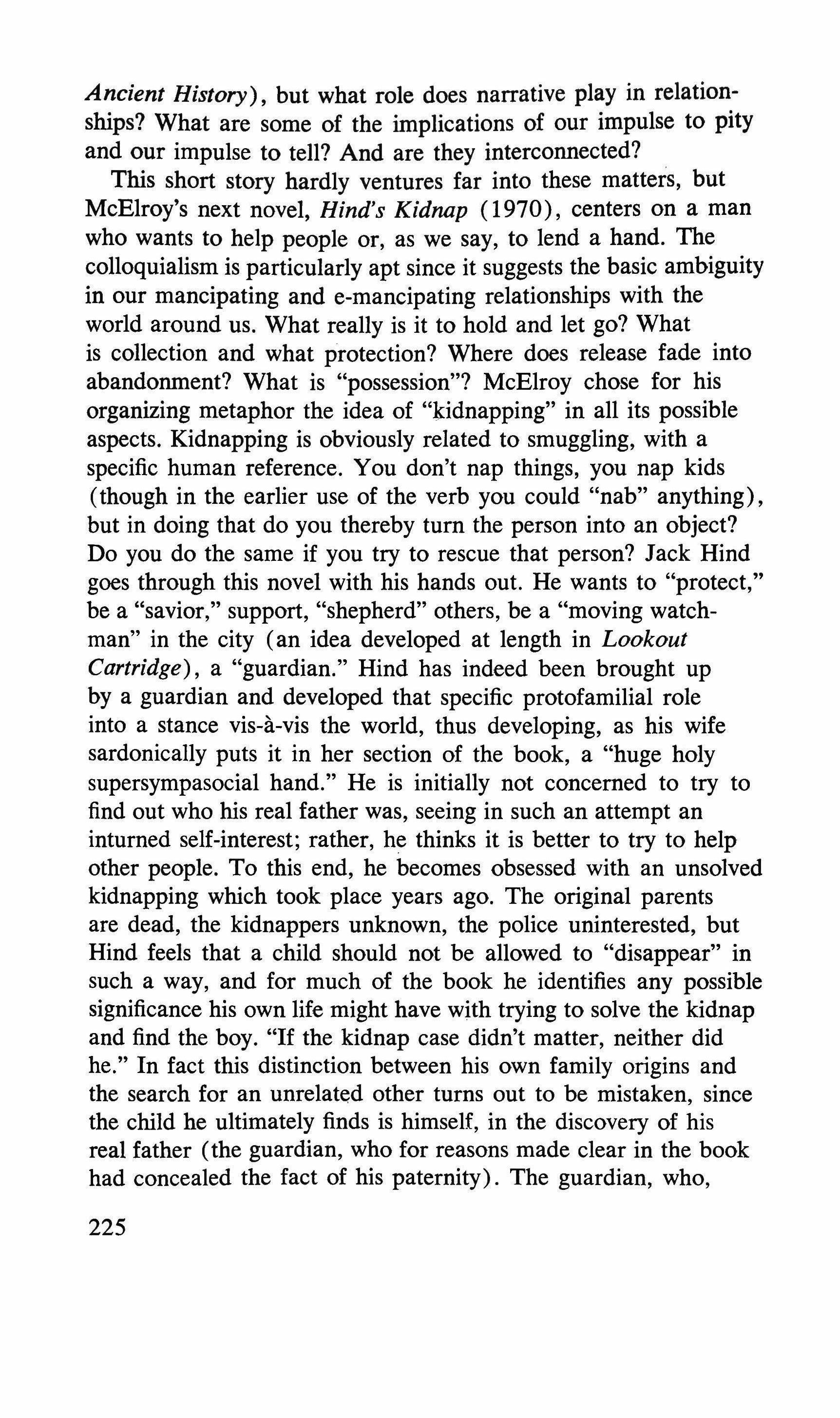
Ancient History), but what role does narrative play in relationships? What are some of the implications of our impulse to pity and our impulse to tell? And are they interconnected? This short story hardly ventures far into these matters, but McElroy's next novel, Hind's Kidnap (1970), centers on a man who wants to help people or, as we say, to lend a hand. The colloquialism is particularly apt since it suggests the basic ambiguity in our mancipating and e-mancipating relationships with the world around us. What really is it to hold and let go? What is collection and what protection? Where does release fade into abandonment? What is "possession"? McElroy chose for his organizing metaphor the idea of "kidnapping" in all its possible aspects. Kidnapping is obviously related to smuggling, with a specific human reference. You don't nap things, you nap kids (though in the earlier use of the verb you could "nab" anything), but in doing that do you thereby turn the person into an object? Do you do the same if you try to rescue that person? Jack Hind goes through this novel with his hands out. He wants to "protect," be a "savior," support, "shepherd" others, be a "moving watchman" in the city (an idea developed at length in Lookout Cartridge), a "guardian." Hind has indeed been brought up by a guardian and developed that specific protofamilial role into a stance vis-a-vis the world, thus developing, as his wife sardonically puts it in her section of the book, a "huge holy supersympasocial hand." He is initially not concerned to try to find out who his real father was, seeing in such an attempt an inturned self-interest; rather, he thinks it is better to try to help other people. To this end, he becomes obsessed with an unsolved kidnapping which took place years ago. The original parents are dead, the kidnappers unknown, the police uninterested, but Hind feels that a child should not be allowed to "disappear" in such a way, and for much of the book he identifies any possible significance his own life might have with trying to solve the kidnap and find the boy. "If the kidnap case didn't matter, neither did he." In fact this distinction between his own family origins and the search for an unrelated other turns out to be mistaken, since the child he ultimately finds is himself, in the discovery of his real father (the guardian, who for reasons made clear in the book had concealed the fact of his paternity). The guardian, who, 225
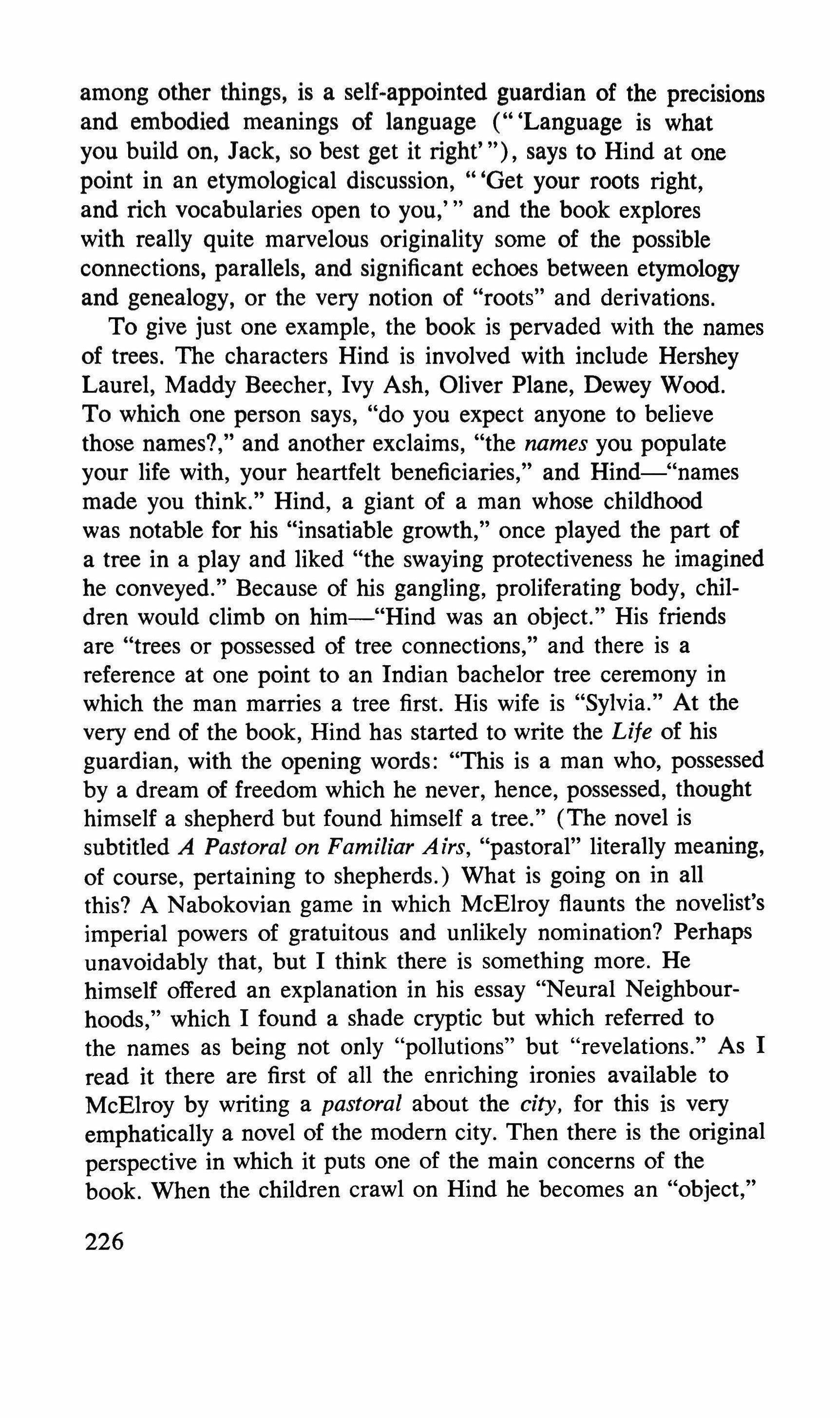
among other things, is a self-appointed guardian of the precisions and embodied meanings of language (" 'Language is what you build on, Jack, so best get it right'''), says to Hind at one point in an etymological discussion, "'Get your roots right, and rich vocabularies open to you,'" and the book explores with really quite marvelous originality some of the possible connections, parallels, and significant echoes between etymology and genealogy, or the very notion of "roots" and derivations.
To give just one example, the book is pervaded with the names of trees. The characters Hind is involved with include Hershey Laurel, Maddy Beecher, Ivy Ash, Oliver Plane, Dewey Wood. To which one person says, "do you expect anyone to believe those names?," and another exclaims, "the names you populate your life with, your heartfelt beneficiaries," and Hind-"names made you think." Hind, a giant of a man whose childhood was notable for his "insatiable growth," once played the part of a tree in a play and liked "the swaying protectiveness he imagined he conveyed." Because of his gangling, proliferating body, children would climb on him-"Hind was an object." His friends are "trees or possessed of tree connections," and there is a reference at one point to an Indian bachelor tree ceremony in which the man marries a tree first. His wife is "Sylvia." At the very end of the book, Hind has started to write the Life of his guardian, with the opening words: "This is a man who, possessed by a dream of freedom which he never, hence, possessed, thought himself a shepherd but found himself a tree." (The novel is subtitled A Pastoral on Familiar Airs, "pastoral" literally meaning, of course, pertaining to shepherds.) What is going on in all this? A Nabokovian game in which McElroy flaunts the novelist's imperial powers of gratuitous and unlikely nomination? Perhaps unavoidably that, but I think there is something more. He himself offered an explanation in his essay "Neural Neighbourhoods," which I found a shade cryptic but which referred to the names as being not only "pollutions" but "revelations." As I read it there are first of all the enriching ironies available to McElroy by writing a pastoral about the city, for this is very emphatically a novel of the modern city. Then there is the original perspective in which it puts one of the main concerns of the book. When the children crawl on Hind he becomes an "object,"
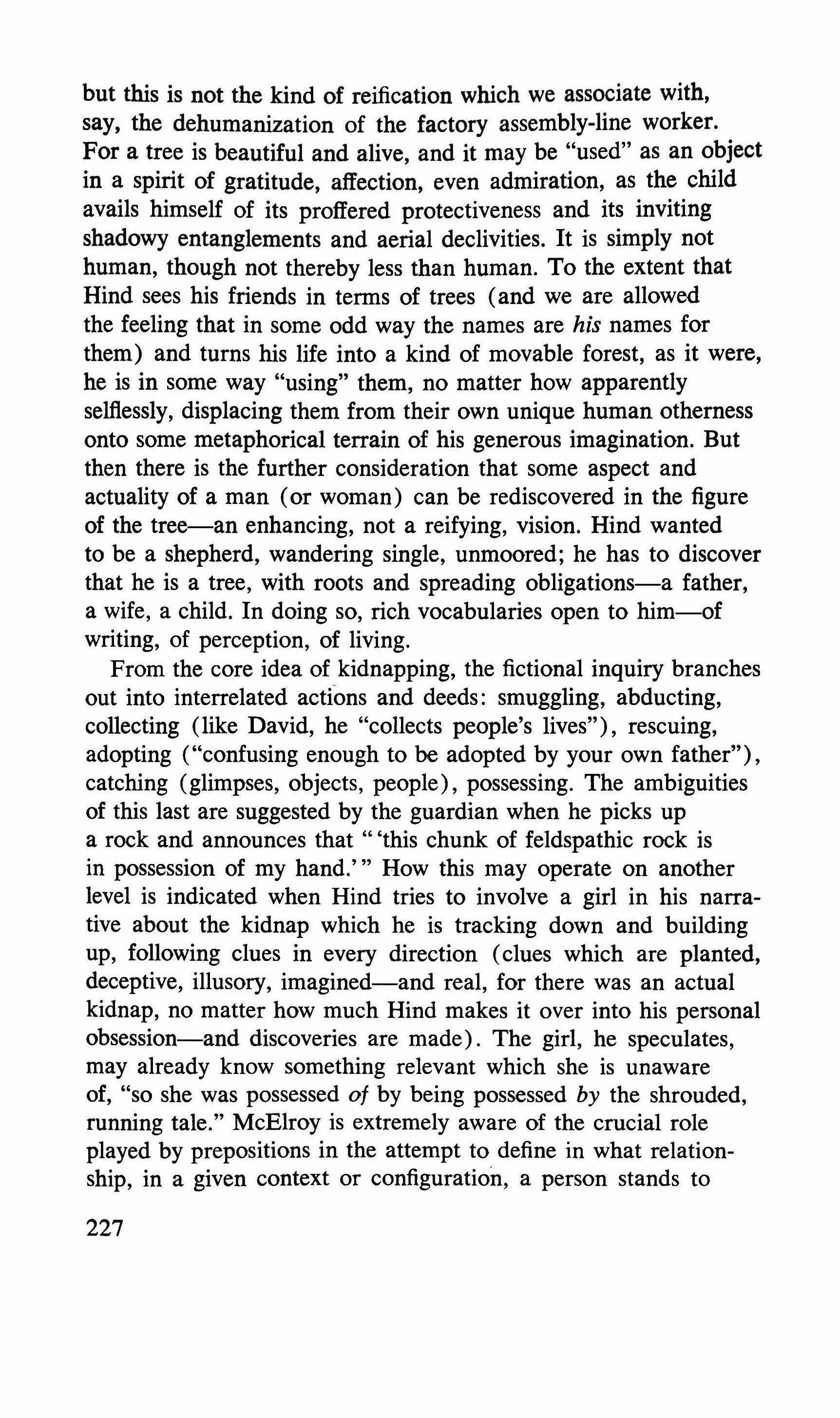
but this is not the kind of reification which we associate with, say, the dehumanization of the factory assembly-line worker. For a tree is beautiful and alive, and it may be "used" as an object in a spirit of gratitude, affection, even admiration, as the child avails himself of its proffered protectiveness and its inviting shadowy entanglements and aerial declivities. It is simply not human, though not thereby less than human. To the extent that Hind sees his friends in terms of trees (and we are allowed the feeling that in some odd way the names are his names for them) and turns his life into a kind of movable forest, as it were, he is in some way "using" them, no matter how apparently selflessly, displacing them from their own unique human otherness onto some metaphorical terrain of his generous imagination. But then there is the further consideration that some aspect and actuality of a man (or woman) can be rediscovered in the figure of the tree-an enhancing, not a reifying, vision. Hind wanted to be a shepherd, wandering single, unmoored; he has to discover that he is a tree, with roots and spreading obligations-a father, a wife, a child. In doing so, rich vocabularies open to him-of writing, of perception, of living.
From the core idea of kidnapping, the fictional inquiry branches out into interrelated actions and deeds: smuggling, abducting, collecting (like David, he "collects people's lives"), rescuing, adopting ("confusing enough to be adopted by your own father"), catching (glimpses, objects, people), possessing. The ambiguities of this last are suggested by the guardian when he picks up a rock and announces that "'this chunk of feldspathic rock is in possession of my hand.'" How this may operate on another level is indicated when Hind tries to involve a girl in his narrative about the kidnap which he is tracking down and building up, following clues in every direction (clues which are planted, deceptive, illusory, imagined-and real, for there was an actual kidnap, no matter how much Hind makes it over into his personal obsession-and discoveries are made). The girl, he speculates, may already know something relevant which she is unaware of, "so she was possessed of by being possessed by the shrouded, running tale." McElroy is extremely aware of the crucial role played by prepositions in the attempt to define in what relationship, in a given context or configuration, a person stands to 227
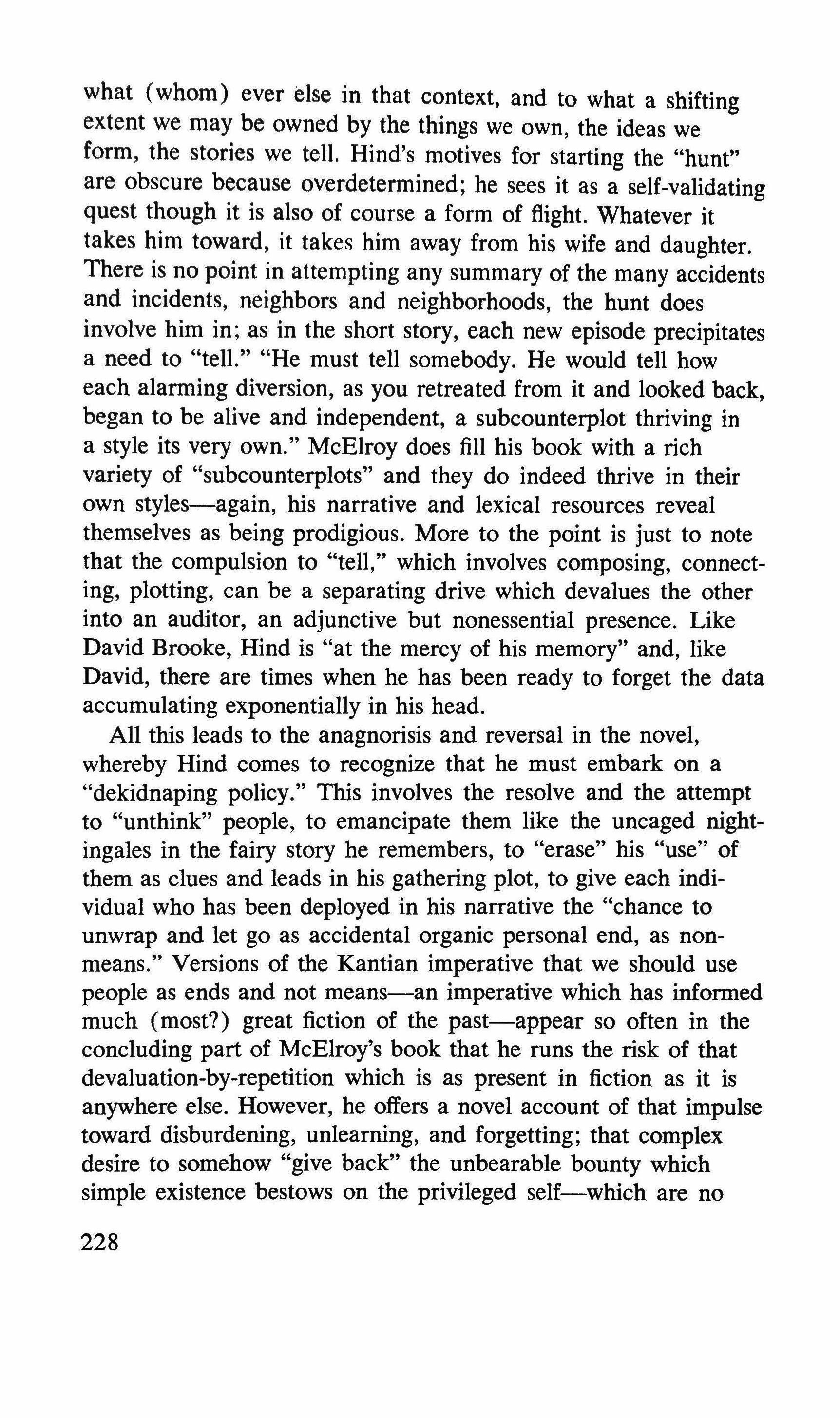
what (whom) ever else in that context, and to what a shifting extent we may be owned by the things we own, the ideas we form, the stories we tell. Hind's motives for starting the "hunt" are obscure because overdetermined; he sees it as a self-validating quest though it is also of course a form of flight. Whatever it takes him toward, it takes him away from his wife and daughter. There is no point in attempting any summary of the many accidents and incidents, neighbors and neighborhoods, the hunt does involve him in; as in the short story, each new episode precipitates a need to "tell." "He must tell somebody. He would tell how each alarming diversion, as you retreated from it and looked back, began to be alive and independent, a subcounterplot thriving in a style its very own." McElroy does fill his book with a rich variety of "subcounterplots" and they do indeed thrive in their own styles-again, his narrative and lexical resources reveal themselves as being prodigious. More to the point is just to note that the compulsion to "tell," which involves composing, connecting, plotting, can be a separating drive which devalues the other into an auditor, an adjunctive but nonessential presence. Like David Brooke, Hind is "at the mercy of his memory" and, like David, there are times when he has been ready to forget the data accumulating exponentially in his head.
All this leads to the anagnorisis and reversal in the novel, whereby Hind comes to recognize that he must embark on a "dekidnaping policy." This involves the resolve and the attempt to "unthink" people, to emancipate them like the uncaged nightingales in the fairy story he remembers, to "erase" his "use" of them as clues and leads in his gathering plot, to give each individual who has been deployed in his narrative the "chance to unwrap and let go as accidental organic personal end, as nonmeans." Versions of the Kantian imperative that we should use people as ends and not means-an imperative which has informed much (most?) great fiction of the past-appear so often in the concluding part of McElroy's book that he runs the risk of that devaluation-by-repetition which is as present in fiction as it is anywhere else. However, he offers a novel account of that impulse toward disburdening, unlearning, and forgetting; that complex desire to somehow "give back" the unbearable bounty which simple existence bestows on the privileged self-which are no

doubt universal feelings but which seem to occur in American literature in unusual and acute forms. What Hind wants to do is to press "through the dekidnap toward a luminal surface afloat somewhere ahead, a last light emanating from a free life with Sylvia and May." It is not of course as easy as all that, and cannot be effected by a simple change in policy. For one thing, "people quite simply refused to be dekidnaped"; for another, you cannot "unsee" what you have seen any more than you can "give back" the "nonreturnable gift of place with its landscaped encumbrancies." And how do you treat a place as an "end in itself," apart from the passions and the purposes of the people moving through it? It is as if, by way of recoil and recompense, Hind is embarking on the impossible project of de-intentionalizing the self! But as any phenomenologist-and Joseph McElroyvery well knows, "every act of consciousness, in order to be an act, demands a certain object because every conscious act intends something" (Joseph Kockelmans, "What Is Phenomenology?"). Hind wants to somehow un-story his world and let everything return to its previous randomness and uncollected otherness, but-what he has seen, he has seen. Of course, then the problem is just what has he seen, and it is in his charting of the rich ambiguities of our perceptual processes that McElroy achieves some of his most original effects. I can barely allude to some of these but will single out three objects in the book: a map, a jigsaw puzzle, and a DUrer woodcut. The map is of New York's subways and Hind peruses it carefully; it is defaced, deteriorating, and crosshatched with the cryptic scribblings of the "preterite" of the city (I use Pynchon's word, as it is a rather Pynchon-esque map), but "even in its present state, [it] could probably be read." "On it he hardly knew his own city. Initials and dates clustered at all angles; the eye, making its own smooth stroke, might if it tried divine a whole clock face inlaid with intimations of rectangular forms a painfully slow map, if you studied it. On the other hand, using it you could really make time around the city." Hind's difficulty in finding the city in the map is related to his difficulty in hearing the city in its name, and both are specific instances of the problematical relationship between map and ground, word and thing, which have been much discussed in recent years

in a number of contexts. The important factor in the experience as described is that the map changes according to the intention with which you study it, what you are looking to see. In this case it changes according to whether Hind looks at it for some kind of model or projection of the city, or as a display of encoded information which would enable him to avail himself of the city's transport system. The jigsaw, which is a "Jesus-puzzle picture," exemplifies this experience of ocular oscillation another way. "You looked, and maybe all you saw was abstract landscape rather like the ruined subway map, with no perspective to speak of, just flat, waving black and white; then, what Maddy Beecher and Cassia were crowing about, and ridiculing you for not perceiving, came clear: in the whole tangle was Christ looking out, the pale, rather Northern Christ-but not exactly looking out of: indeed, rather, the tangle was Christ." We are all familiar with such optical-illusion pictures which can be read in more than one way, often as focus shifts so that figure and ground seem to change places. McElroy is clearly fascinated with the implications of these strange visual shifts in everyday life. The vocabulary of "perspective" is very prominent in the book, and there are various speculations about what is called "anti-perspective" or seeing things in their "flat reality," devoid of depth.
During a spell of teaching, Hind tries to develop this latter theory of vision and urges his students to see a DUrer woodcut as "an exquisitely jumbled flat surface" apart from the "alluring illusions" which the employment of perspective offers to the eye. Which provokes the following response from one student:
"you try to make us unsee degrees of depth in Diirer's Flight into Egypt so we can see truly the quote unquote ultimate topography scratched by the man's hand in a wood block that remains a wood block. Yet the picture's story well, you couldn't begin even to tell us this story if Durer's modeling and depth and perspective did not make you see what you dare to dismiss as illusion. What are you trying to do, break us? What good is it to say, Unsee all this and even if you have to dilate your eye to do it see only surface sections of hatchings and blanks You change back and forth, Mr. Hind, because you don't know yourself. You say it's all background-us toothere is no foreground, we are part of a flat design. Maybe you want to disappear into your background. But I see myself against mine there is space between us, and each has his own perspective."
If we merely assessed this as a contribution to the study of the mechanics of vision, it is not particularly startling; but context is all, and appearing in McElroy's novel some of these basic
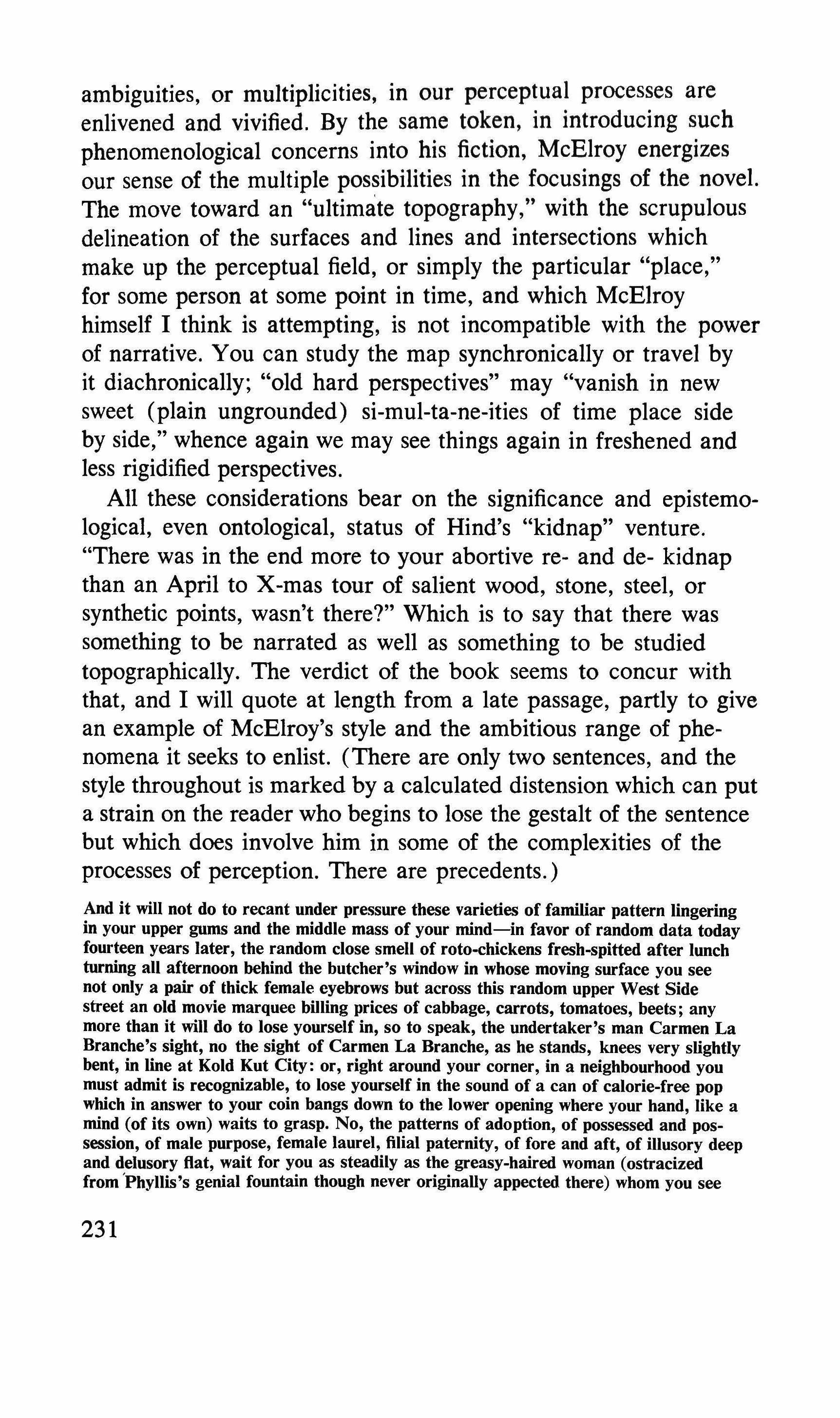
ambiguities, or multiplicities, in our perceptual processes are enlivened and vivified. By the same token, in introducing such phenomenological concerns into his fiction, McElroy energizes our sense of the multiple possibilities in the focusings of the novel. The move toward an "ultimate topography," with the scrupulous delineation of the surfaces and lines and intersections which make up the perceptual field, or simply the particular "place," for some person at some point in time, and which McElroy himself I think is attempting, is not incompatible with the power of narrative. You can study the map synchronically or travel by it diachronically; "old hard perspectives" may "vanish in new sweet (plain ungrounded) si-mul-ta-ne-ities of time place side by side," whence again we may see things again in freshened and less rigidified perspectives.
All these considerations bear on the significance and epistemological, even ontological, status of Hind's "kidnap" venture. "There was in the end more to your abortive re- and de- kidnap than an April to X-mas tour of salient wood, stone, steel, or synthetic points, wasn't there?" Which is to say that there was something to be narrated as well as something to be studied topographically. The verdict of the book seems to concur with that, and I will quote at length from a late passage, partly to give an example of McElroy's style and the ambitious range of phenomena it seeks to enlist. (There are only two sentences, and the style throughout is marked by a calculated distension which can put a strain on the reader who begins to lose the gestalt of the sentence but which does involve him in some of the complexities of the processes of perception. There are precedents.)
And it will not do to recant under pressure these varieties of familiar pattern lingering in your upper gums and the middle mass of your mind-in favor of random data today fourteen years later, the random close smell of roto-chickens fresh-spitted after lunch turning all afternoon behind the butcher's window in whose moving surface you see not only a pair of thick female eyebrows but across this random upper West Side street an old movie marquee billing prices of cabbage, carrots, tomatoes, beets; any more than it will do to lose yourself in, so to speak, the undertaker's man Carmen La Branche's sight, no the sight of Carmen La Branche, as he stands, knees very slightly bent, in line at Kold Kut City: or, right around your corner, in a neighbourhood you must admit is recognizable, to lose yourself in the sound of a can of calorie-free pop which in answer to your coin bangs down to the lower opening where your hand, like a mind (of its own) waits to grasp. No, the patterns of adoption, of possessed and possession, of male purpose, female laurel, filial paternity, of fore and aft, of illusory deep and delusory Hat, wait for you as steadily as the greasy-haired woman (ostracized from 'Phyllis's genial fountain though never originally appected there) whom you see
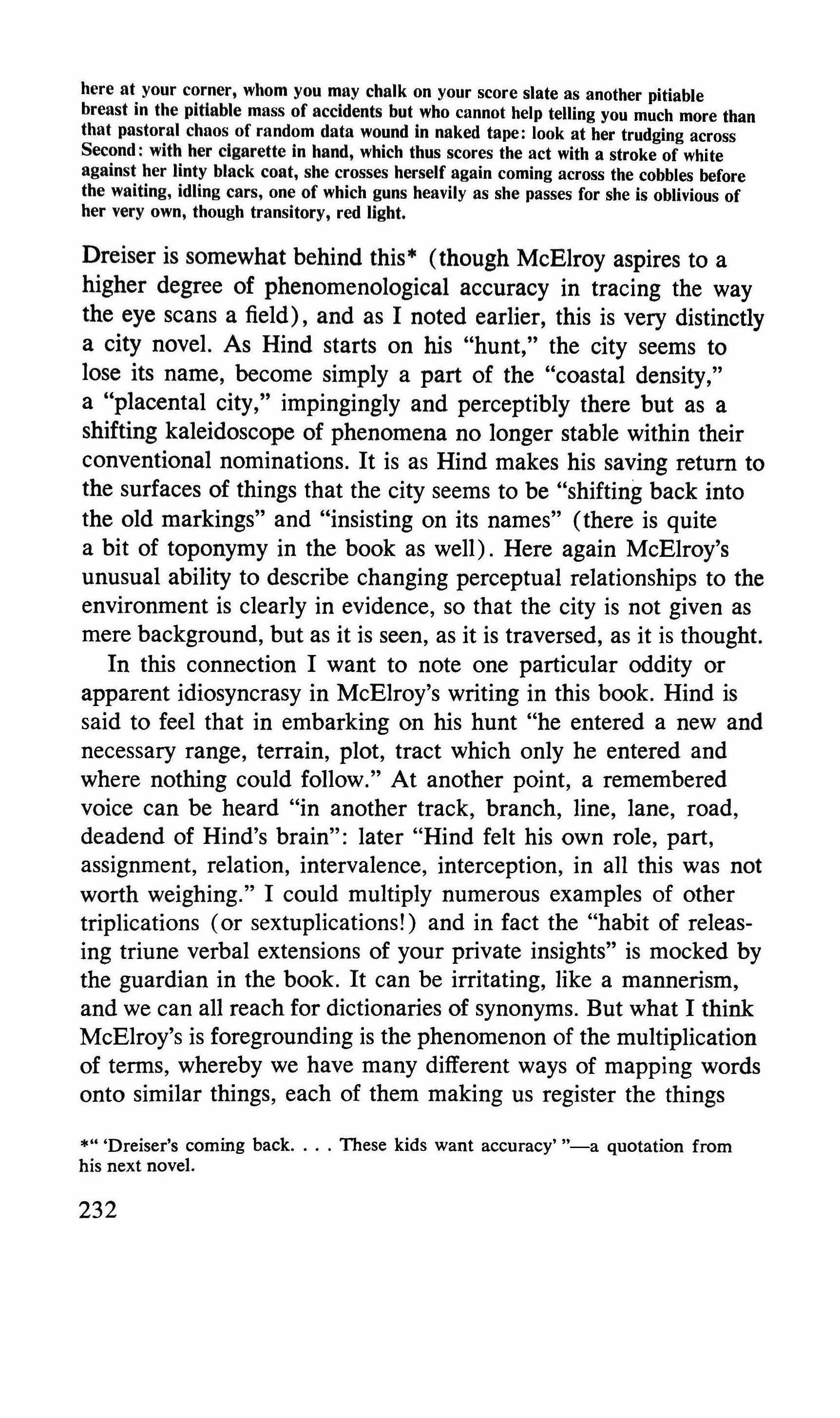
here at your corner, whom you may chalk on your score slate as another pitiable breast in the pitiable mass of accidents but who cannot help telling you much more than that pastoral chaos of random data wound in naked tape: look at her trudging across Second: with her cigarette in hand, which thus scores the act with a stroke of white against her Iinty black coat, she crosses herself again coming across the cobbles before the waiting, idling cars, one of which guns heavily as she passes for she is oblivious of her very own, though transitory, red light.
Dreiser is somewhat behind this" (though McElroy aspires to a higher degree of phenomenological accuracy in tracing the way the eye scans a field), and as I noted earlier, this is very distinctly a city novel. As Hind starts on his "hunt," the city seems to lose its name, become simply a part of the "coastal density," a "placental city," impingingly and perceptibly there but as a shifting kaleidoscope of phenomena no longer stable within their conventional nominations. It is as Hind makes his saving return to the surfaces of things that the city seems to be "shifting back into the old markings" and "insisting on its names" (there is quite a bit of toponymy in the book as well). Here again McElroy's unusual ability to describe changing perceptual relationships to the environment is clearly in evidence, so that the city is not given as mere background, but as it is seen, as it is traversed, as it is thought. In this connection I want to note one particular oddity or apparent idiosyncrasy in McElroy's writing in this book. Hind is said to feel that in embarking on his hunt "he entered a new and necessary range, terrain, plot, tract which only he entered and where nothing could follow." At another point, a remembered voice can be heard "in another track, branch, line, lane, road, deadend of Hind's brain": later "Hind felt his own role, part, assignment, relation, intervalence, interception, in all this was not worth weighing." I could multiply numerous examples of other triplications (or sextuplications!) and in fact the "habit of releasing triune verbal extensions of your private insights" is mocked by the guardian in the book. It can be irritating, like a mannerism, and we can all reach for dictionaries of synonyms. But what I think McElroy's is foregrounding is the phenomenon of the multiplication of terms, whereby we have many different ways of mapping words onto similar things, each of them making us register the things
*" 'Dreiser's coming back These kids want accuracy' "-a quotation from his next novel.

in a slightly different way. We are, as it were, endlessly translating and retranslating the world according to the vocabularies of the discourse within which we happen to be operating, and I think McElroy wants to get into his fiction. One other quotation in connection with this:
And you thought of the soft mass of Cassia's insides, unknown to her, and bubbling away, different from the outside skeleton of membranes, hair, crust, and polish, each with untamed intersections of message while behind and below were dark bubbling insides loved but almost never seen.
Such a passage makes you realize that if, in one vocabulary, man is (was) the measure of all things, in another he is, and no less wonderfully, a "wet computer." And what McElroy is doing seems to me to be one of the very important things that modern fiction should do. In more general terms the main achievement of this remarkable novel, for me, is the particular way it brings together surfaces and deeds, places and people, topography and narrative, along with a meta-awareness of the perceptual problems involved and an understanding of the necessity of the attempt. The result is a very particular kind of what the social anthropologist Clifford Geertz calls (borrowing the term from Gilbert Ryle) "thick description" (see his "Thick Description: Toward an Interpretive Theory of Culture," in The Interpretation of Culture), which is a major extension of the achievements of contemporary fiction.
In A Smuggler's Bible there was a character suspiciously like Norman Mailer called Duke Amerchrome, and I need hardly point out just what is being synthesized in that surname. He indulges in a kind of visionary autobiography while mocking at "self-advertisement" (sic) and is given to instant metaphysics which come out in "foaming formulas." He says things like "'My mind is America'" and mythologizes himself, and David "half suspected Duke didn't really exist-that he was the product of a concatenation of sounds the product of the liturgy of hearsay, that he was the reputation implicit in his name, that the public world had conspired to assemble him before my eyes but that there was no Duke." McElroy's next novel, Ancient History (1971), seems, in part, even more to emerge from an obsession with, or at least an interest in, Norman Mailer, or
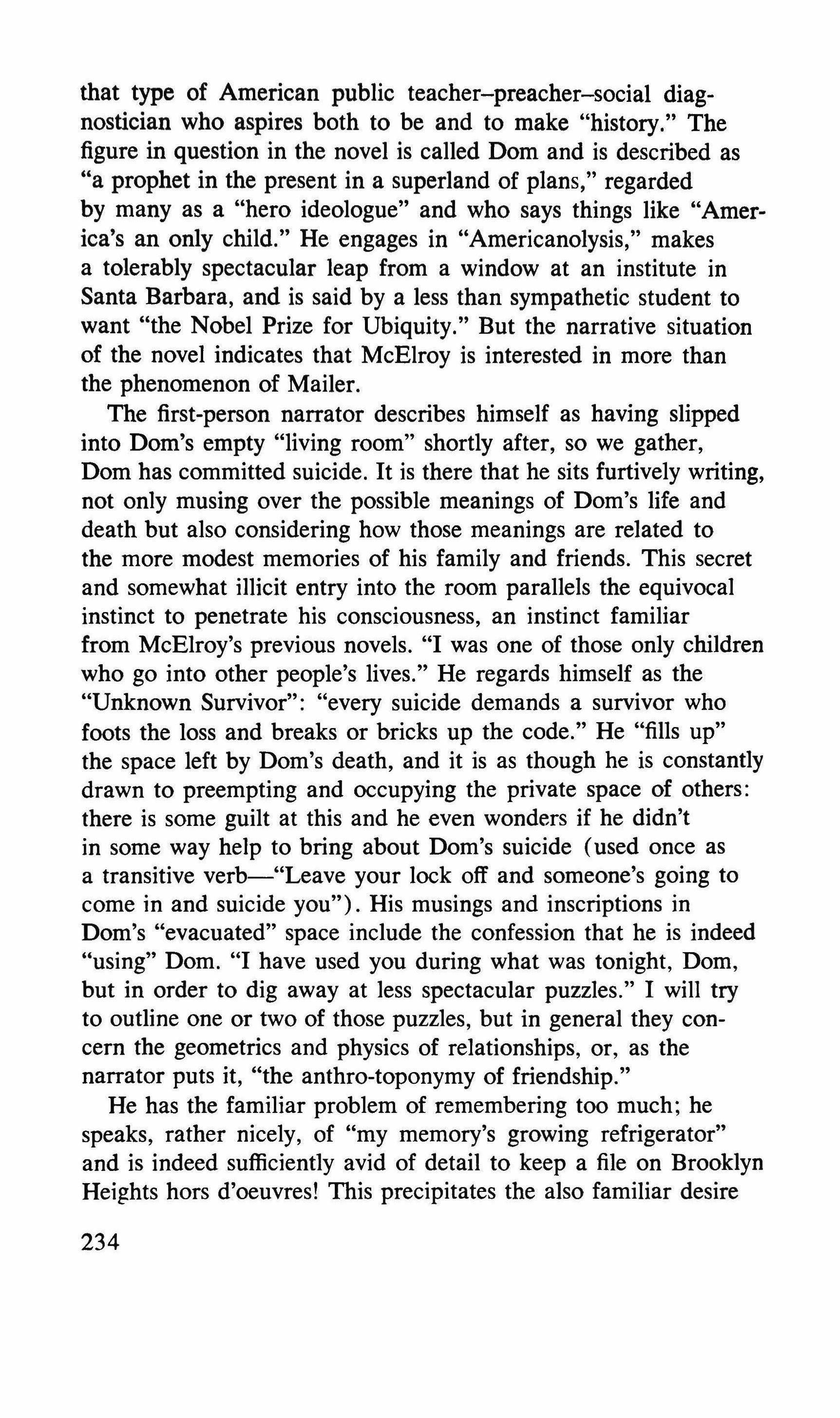
that type of American public teacher-preacher-social diagnostician who aspires both to be and to make "history." The figure in question in the novel is called Dom and is described as "a prophet in the present in a superland of plans," regarded by many as a "hero ideologue" and who says things like "America's an only child." He engages in "Americanolysis," makes a tolerably spectacular leap from a window at an institute in Santa Barbara, and is said by a less than sympathetic student to want "the Nobel Prize for Ubiquity." But the narrative situation of the novel indicates that McElroy is interested in more than the phenomenon of Mailer.
The first-person narrator describes himself as having slipped into Dom's empty "living room" shortly after, so we gather, Dom has committed suicide. It is there that he sits furtively writing, not only musing over the possible meanings of Dom's life and death but also considering how those meanings are related to the more modest memories of his family and friends. This secret and somewhat illicit entry into the room parallels the equivocal instinct to penetrate his consciousness, an instinct familiar from McElroy's previous novels. "I was one of those only children who go into other people's lives." He regards himself as the "Unknown Survivor": "every suicide demands a survivor who foots the loss and breaks or bricks up the code." He "fills up" the space left by Dom's death, and it is as though he is constantly drawn to preempting and occupying the private space of others: there is some guilt at this and he even wonders if he didn't in some way help to bring about Dom's suicide (used once as a transitive verb-"Leave your lock off and someone's going to come in and suicide you"). His musings and inscriptions in Dom's "evacuated" space include the confession that he is indeed "using" Dom. "I have used you during what was tonight, Dom, but in order to dig away at less spectacular puzzles." 1 will try to outline one or two of those puzzles, but in general they concern the geometries and physics of relationships, or, as the narrator puts it, "the anthro-toponymy of friendship."
He has the familiar problem of remembering too much; he speaks, rather nicely, of "my memory's growing refrigerator" and is indeed sufficiently avid of detail to keep a file on Brooklyn Heights hors d'oeuvres! This precipitates the also familiar desire
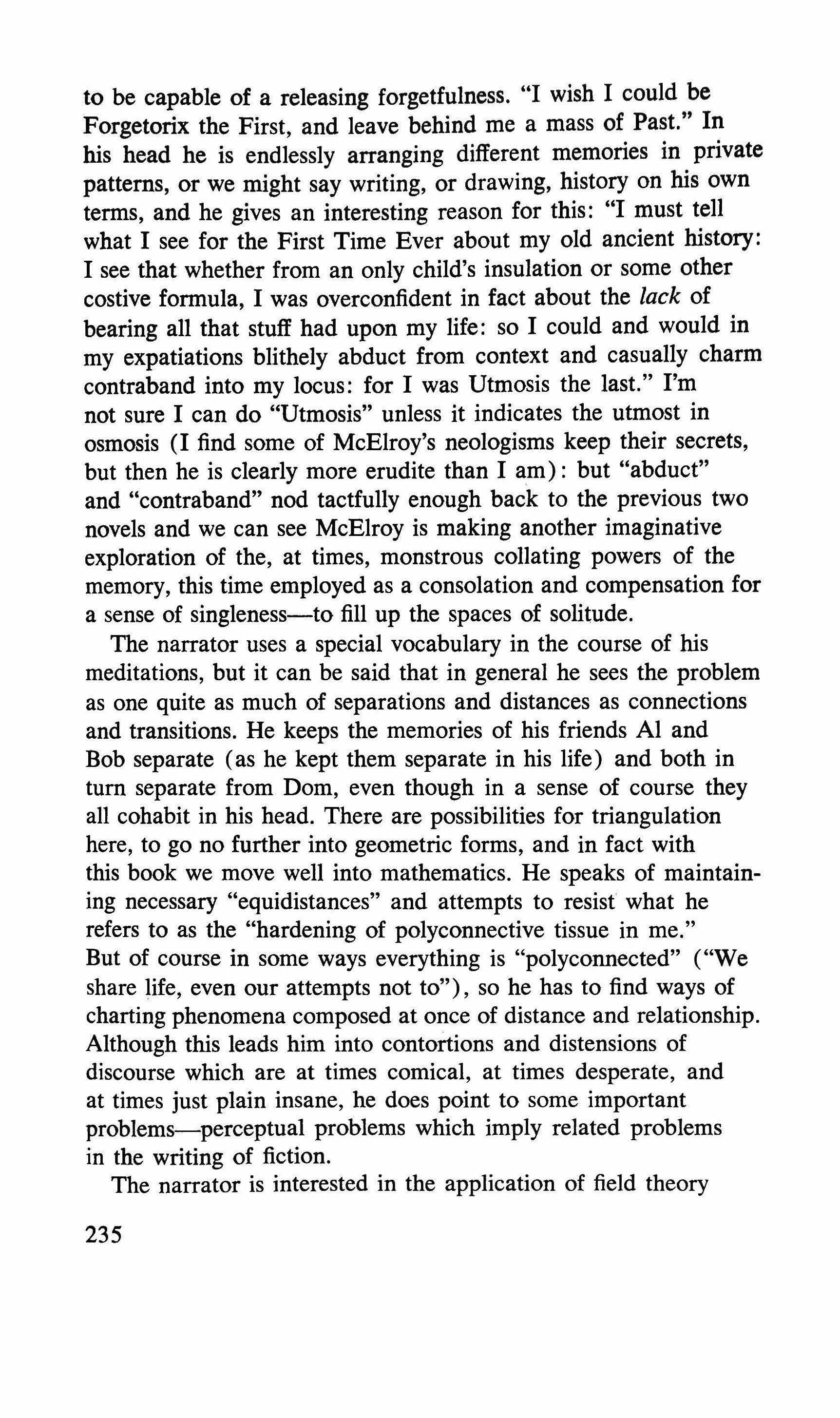
to be capable of a releasing forgetfulness. "I wish I could be Forgetorix the First, and leave behind me a mass of Past." In his head he is endlessly arranging different memories in private patterns, or we might say writing, or drawing, history on his own terms, and he gives an interesting reason for this: "I must tell what I see for the First Time Ever about myoId ancient history: I see that whether from an only child's insulation or some other costive formula, I was overconfident in fact about the lack of bearing all that stuff had upon my life: so I could and would in my expatiations blithely abduct from context and casually charm contraband into my locus: for 1 was Utmosis the last." I'm not sure 1 can do "Utmosis" unless it indicates the utmost in osmosis (I find some of McElroy's neologisms keep their secrets, but then he is clearly more erudite than 1 am): but "abduct" and "contraband" nod tactfully enough back to the previous two novels and we can see McElroy is making another imaginative exploration of the, at times, monstrous collating powers of the memory, this time employed as a consolation and compensation for a sense of singleness-to fill up the spaces of solitude.
The narrator uses a special vocabulary in the course of his meditations, but it can be said that in general he sees the problem as one quite as much of separations and distances as connections and transitions. He keeps the memories of his friends Al and Bob separate (as he kept them separate in his life) and both in tum separate from Dom, even though in a sense of course they all cohabit in his head. There are possibilities for triangulation here, to go no further into geometric forms, and in fact with this book we move well into mathematics. He speaks of maintaining necessary "equidistances" and attempts to resist what he refers to as the "hardening of polyconnective tissue in me." But of course in some ways everything is "polyconnected" ("We share life, even our attempts not to"), so he has to find ways of charting phenomena composed at once of distance and relationship. Although this leads him into contortions and distensions of discourse which are at times comical, at times desperate, and at times just plain insane, he does point to some important problems-perceptual problems which imply related problems in the writing of fiction.
The narrator is interested in the application of field theory

to what goes on among people and inside the head. He ascribes the source of this interest to Dom, who, however, drew some extreme speculative inferences from it:
"Field" as in your "Neutraline Equatics": a mode that lowers, eases, even coolly ousts ancient hectic hierarchies that set the mass of us or our parts discretely off from each other or from the mass of our setting. Yet my eyes cry out, "Can all that other life I know about subside into some rankless field and lose its poignant fussy orders?"
In the processes of perception, as in the processes of thinking and writing, there has to be an ordering of data, and to that extent it could be said to be "hierarchicalized." In a body there is the distal and the ventral; in space the remote and the proximate; in time there is primacy and recency. A "rankless field" would simply be an unperceived one. It is a matter of preserving differences without letting these tum into patterns of dominance. In terms of memory it entails, on the narrator's part, an egalitarian respect for the most apparently modest detail-a drenched sneaker, a white-knuckled fist-along with the notionally more significant and more public ones-Dom's life and death, while trying to preserve their distinctness even as they tend to conflate within him. He certainly is a fuss, a solipsistic fuss bustling round the furniture in his head, but "poignant fussy orders" may be said to be the very stuff of life as we see it, write it, live it, and this book gives us a new sense of how this is so, and of some of the fuss and some of the poignancy that it entails.
As a child, the narrator was both learning "ancient history" and acquiring his own, and for a time the two seemed to be parallel. No longer, though they are still both in his head: "I know the two histories, one verbatim in the graceful English of Herodotus, the other poly-vectored in my doomed memory." I will come to vectors in a minute, but it is clear that the book is engaging the phenomenon of different kinds of history somehow existing alongside each other in the mind. "Para" means "by the side of, beside," and the subtitle to this novel, "A Paraphase," implies a phase or phases (of memory, of text, of consciousness, of life?) existing by the side of the more accustomed modes. McElroy wrote about this in "Neural Neighbourhoods," and I would not think of encroaching on his explanation of his own intentions. In the novel, the narrator, by moving into Dom's room for his own purposes, thinks he has turned it from a site into
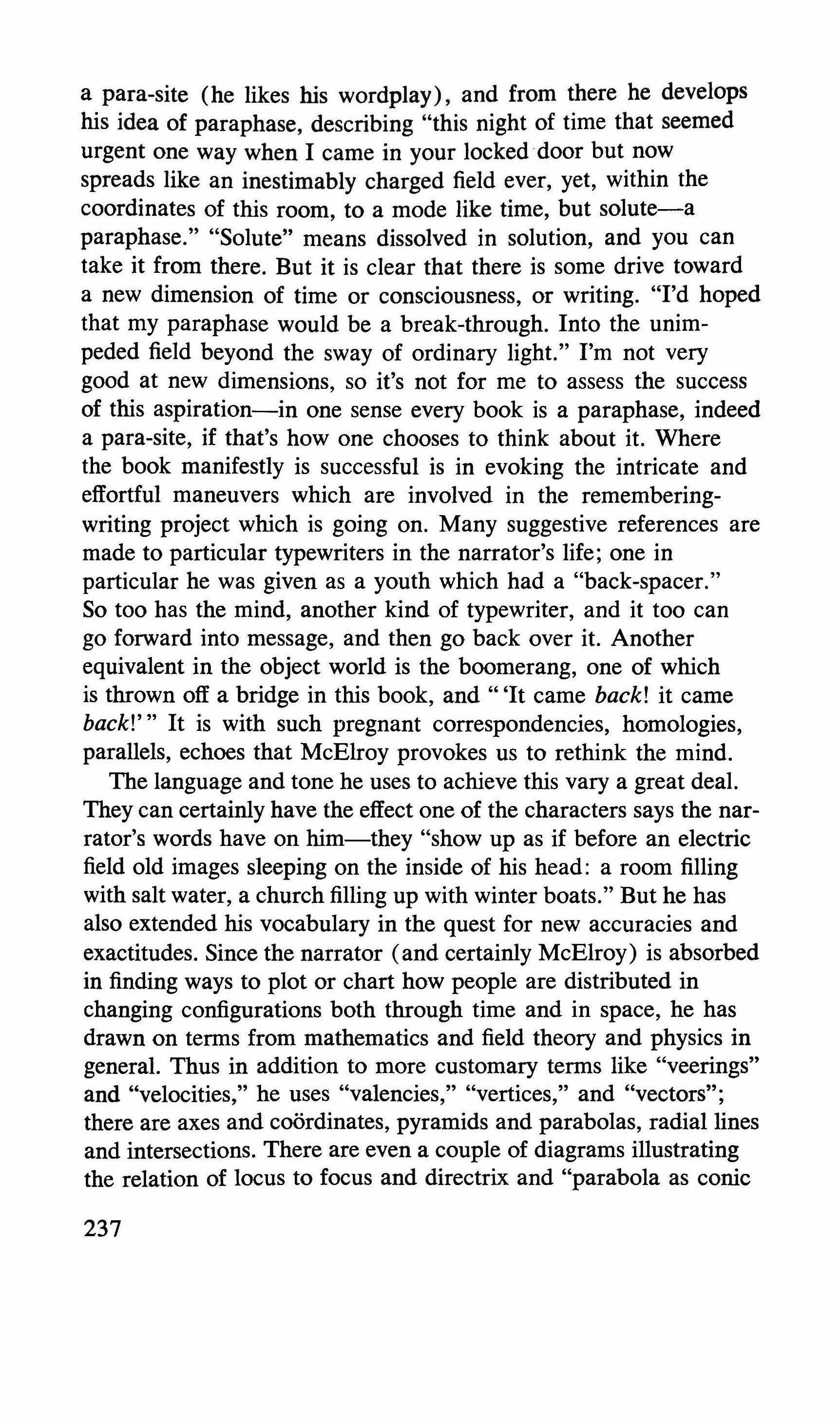
a para-site (he likes his wordplay), and from there he develops his idea of paraphase, describing "this night of time that seemed urgent one way when I came in your locked door but now spreads like an inestimably charged field ever, yet, within the coordinates of this room, to a mode like time, but solute-a paraphase." "Solute" means dissolved in solution, and you can take it from there. But it is clear that there is some drive toward a new dimension of time or consciousness, or writing. "I'd hoped that my paraphase would be a break-through. Into the unimpeded field beyond the sway of ordinary light." I'm not very good at new dimensions, so it's not for me to assess the success of this aspiration-in one sense every book is a paraphase, indeed a para-site, if that's how one chooses to think about it. Where the book manifestly is successful is in evoking the intricate and effortful maneuvers which are involved in the rememberingwriting project which is going on. Many suggestive references are made to particular typewriters in the narrator's life; one in particular he was given as a youth which had a "back-spacer." So too has the mind, another kind of typewriter, and it too can go forward into message, and then go back over it. Another equivalent in the object world is the boomerang, one of which is thrown off a bridge in this book, and" 'It came back! it came back!'" It is with such pregnant correspondencies, homologies, parallels, echoes that McElroy provokes us to rethink the mind.
The language and tone he uses to achieve this vary a great deal. They can certainly have the effect one of the characters says the narrator's words have on him-they "show up as if before an electric field old images sleeping on the inside of his head: a room filling with salt water, a church filling up with winter boats." But he has also extended his vocabulary in the quest for new accuracies and exactitudes. Since the narrator (and certainly McElroy) is absorbed in finding ways to plot or chart how people are distributed in changing configurations both through time and in space, he has drawn on terms from mathematics and field theory and physics in general. Thus in addition to more customary terms like "veerings" and "velocities," he uses "valencies," "vertices," and "vectors"; there are axes and coordinates, pyramids and parabolas, radial lines and intersections. There are even a couple of diagrams illustrating the relation of locus to focus and directrix and "parabola as conic 237
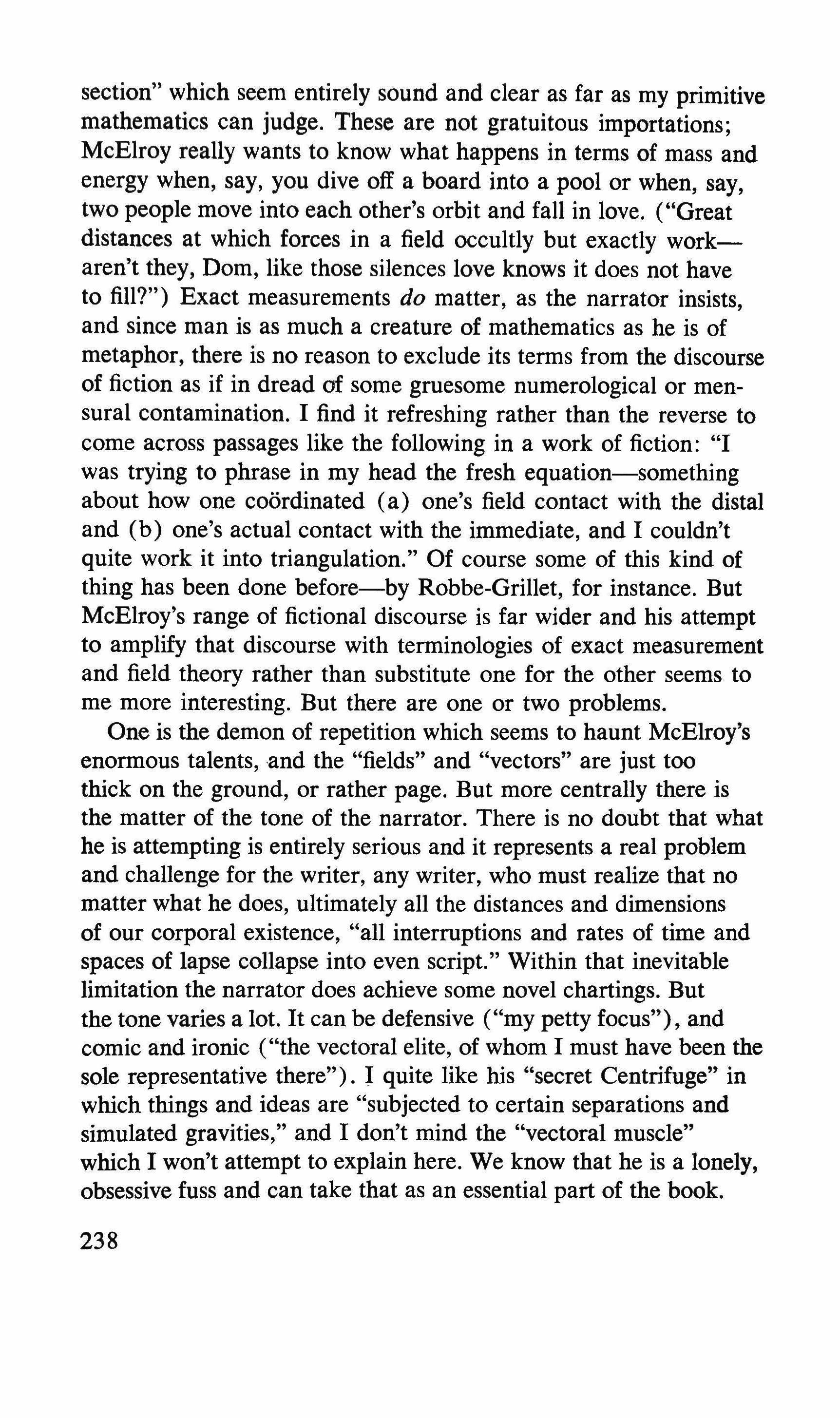
section" which seem entirely sound and clear as far as my primitive mathematics can judge. These are not gratuitous importations; McElroy really wants to know what happens in terms of mass and energy when, say, you dive off a board into a pool or when, say, two people move into each other's orbit and fall in love. ("Great distances at which forces in a field occultly but exactly workaren't they, Dom, like those silences love knows it does not have to fill?") Exact measurements do matter, as the narrator insists, and since man is as much a creature of mathematics as he is of metaphor, there is no reason to exclude its terms from the discourse of fiction as if in dread of some gruesome numerological or mensural contamination. 1 find it refreshing rather than the reverse to come across passages like the following in a work of fiction: "I was trying to phrase in my head the fresh equation-something about how one coordinated (a) one's field contact with the distal and (b) one's actual contact with the immediate, and 1 couldn't quite work it into triangulation." Of course some of this kind of thing has been done before-by Robbe-Grillet, for instance. But McElroy's range of fictional discourse is far wider and his attempt to amplify that discourse with terminologies of exact measurement and field theory rather than substitute one for the other seems to me more interesting. But there are one or two problems. One is the demon of repetition which seems to haunt McElroy's enormous talents, and the "fields" and "vectors" are just too thick on the ground, or rather page. But more centrally there is the matter of the tone of the narrator. There is no doubt that what he is attempting is entirely serious and it represents a real problem and challenge for the writer, any writer, who must realize that no matter what he does, ultimately all the distances and dimensions of our corporal existence, "all interruptions and rates of time and spaces of lapse collapse into even script." Within that inevitable limitation the narrator does achieve some novel chartings. But the tone varies a lot. It can be defensive ("my petty focus"), and comic and ironic ("the vectoral elite, of whom 1 must have been the sole representative there"). 1 quite like his "secret Centrifuge" in which things and ideas are "subjected to certain separations and simulated gravities," and 1 don't mind the "vectoral muscle" which 1 won't attempt to explain here. We know that he is a lonely, obsessive fuss and can take that as an essential part of the book.
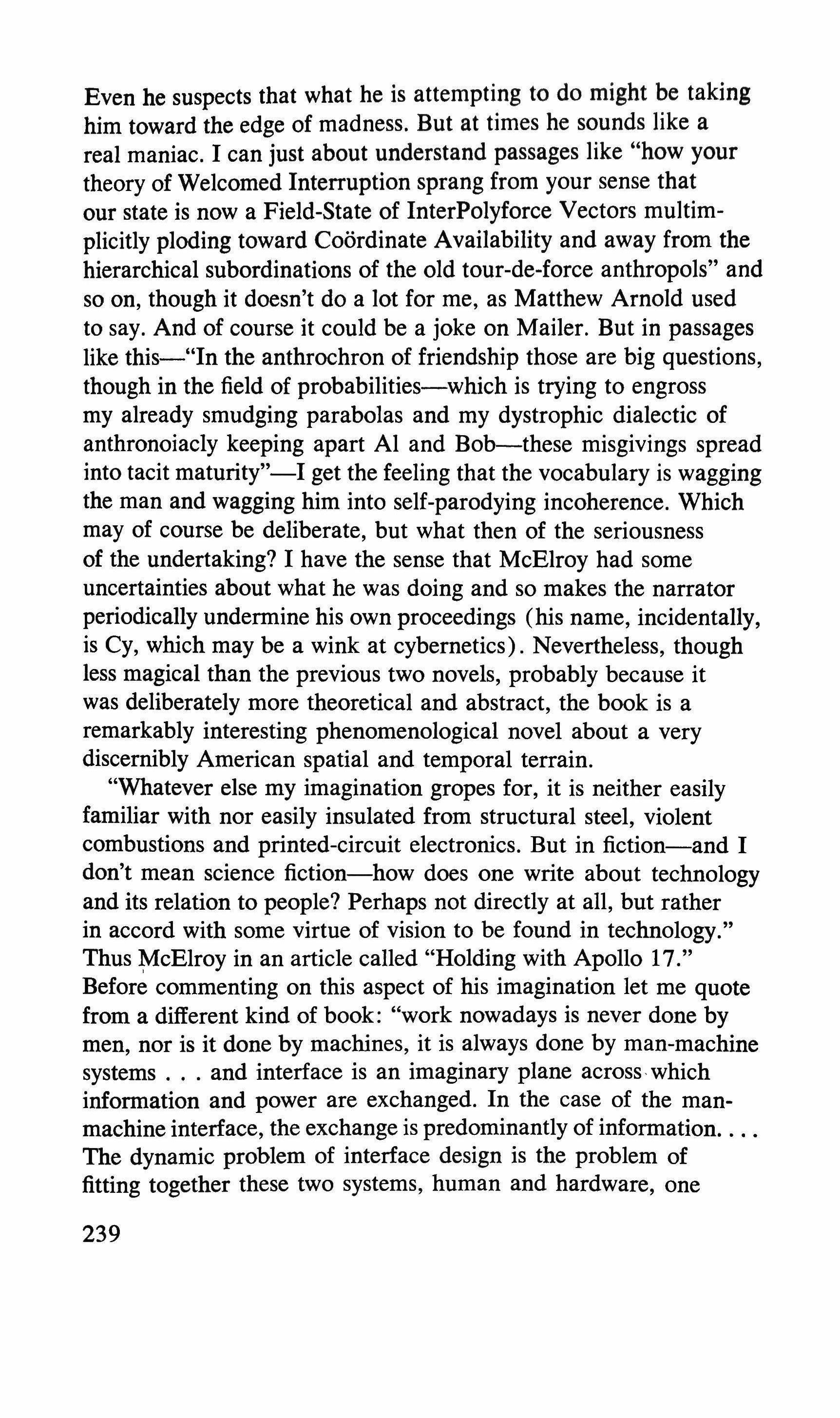
Even he suspects that what he is attempting to do might be taking him toward the edge of madness. But at times he sounds like a real maniac. I can just about understand passages like "how your theory of Welcomed Interruption sprang from your sense that our state is now a Field-State of InterPolyforce Vectors multimplicitly ploding toward Coordinate Availability and away from the hierarchical subordinations of the old tour-de-force anthropols" and so on, though it doesn't do a lot for me, as Matthew Arnold used to say. And of course it could be a joke on Mailer. But in passages like this-"In the anthrochron of friendship those are big questions, though in the field of probabilities-which is trying to engross my already smudging parabolas and my dystrophic dialectic of anthronoiacly keeping apart Al and Bob-these misgivings spread into tacit maturity"-I get the feeling that the vocabulary is wagging the man and wagging him into self-parodying incoherence. Which may of course be deliberate, but what then of the seriousness of the undertaking? I have the sense that McElroy had some uncertainties about what he was doing and so makes the narrator periodically undermine his own proceedings (his name, incidentally, is Cy, which may be a wink at cybernetics). Nevertheless, though less magical than the previous two novels, probably because it was deliberately more theoretical and abstract, the book is a remarkably interesting phenomenological novel about a very discernibly American spatial and temporal terrain.
"Whatever else my imagination gropes for, it is neither easily familiar with nor easily insulated from structural steel, violent combustions and printed-circuit electronics. But in fiction-and I don't mean science fiction-how does one write about technology and its relation to people? Perhaps not directly at all, but rather in accord with some virtue of vision to be found in technology." Thus �cElroy in an article called "Holding with Apollo 17." Before commenting on this aspect of his imagination let me quote from a different kind of book: "work nowadays is never done by men, nor is it done by machines, it is always done by man-machine systems and interface is an imaginary plane across which information and power are exchanged. In the case of the manmachine interface, the exchange is predominantly of information The dynamic problem of interface design is the problem of fitting together these two systems, human and hardware, one 239
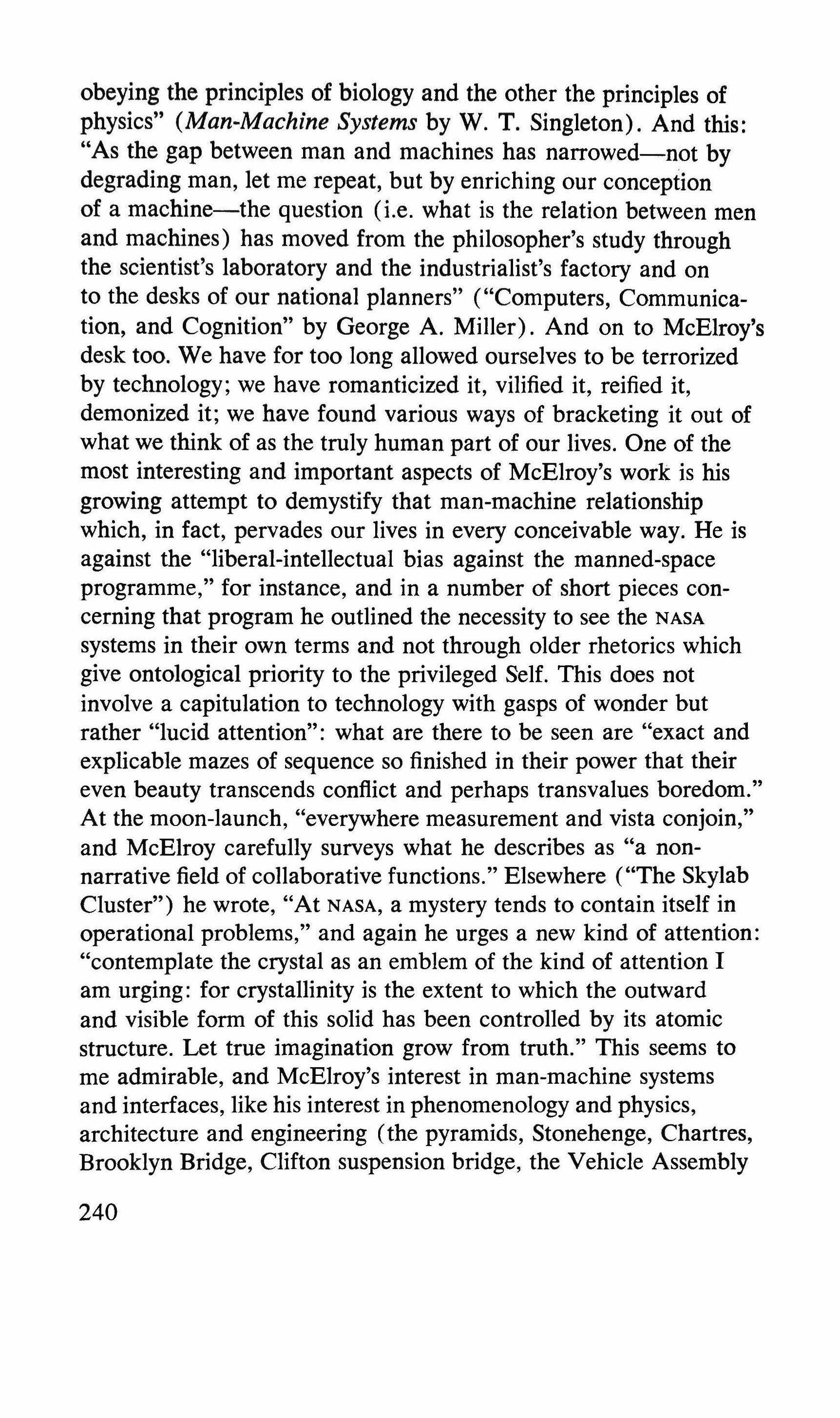
obeying the principles of biology and the other the principles of physics" (Man-Machine Systems by W. T. Singleton). And this: "As the gap between man and machines has narrowed-not by degrading man, let me repeat, but by enriching our conception of a machine-the question (i.e. what is the relation between men and machines) has moved from the philosopher's study through the scientist's laboratory and the industrialist's factory and on to the desks of our national planners" ("Computers, Communication, and Cognition" by George A. Miller). And on to McElroy's desk too. We have for too long allowed ourselves to be terrorized by technology; we have romanticized it, vilified it, reified it, demonized it; we have found various ways of bracketing it out of what we think of as the truly human part of our lives. One of the most interesting and important aspects of McElroy's work is his growing attempt to demystify that man-machine relationship which, in fact, pervades our lives in every conceivable way. He is against the "liberal-intellectual bias against the manned-space programme," for instance, and in a number of short pieces concerning that program he outlined the necessity to see the NASA systems in their own terms and not through older rhetorics which give ontological priority to the privileged Self. This does not involve a capitulation to technology with gasps of wonder but rather "lucid attention": what are there to be seen are "exact and explicable mazes of sequence so finished in their power that their even beauty transcends conflict and perhaps transvalues boredom." At the moon-launch, "everywhere measurement and vista conjoin," and McElroy carefully surveys what he describes as "a nonnarrative field of collaborative functions." Elsewhere ("The Skylab Cluster") he wrote, "At NASA, a mystery tends to contain itself in operational problems," and again he urges a new kind of attention: "contemplate the crystal as an emblem of the kind of attention I am urging: for crystallinity is the extent to which the outward and visible form of this solid has been controlled by its atomic structure. Let true imagination grow from truth." This seems to me admirable, and McElroy's interest in man-machine systems and interfaces, like his interest in phenomenology and physics, architecture and engineering (the pyramids, Stonehenge, Chartres, Brooklyn Bridge, Clifton suspension bridge, the Vehicle Assembly 240
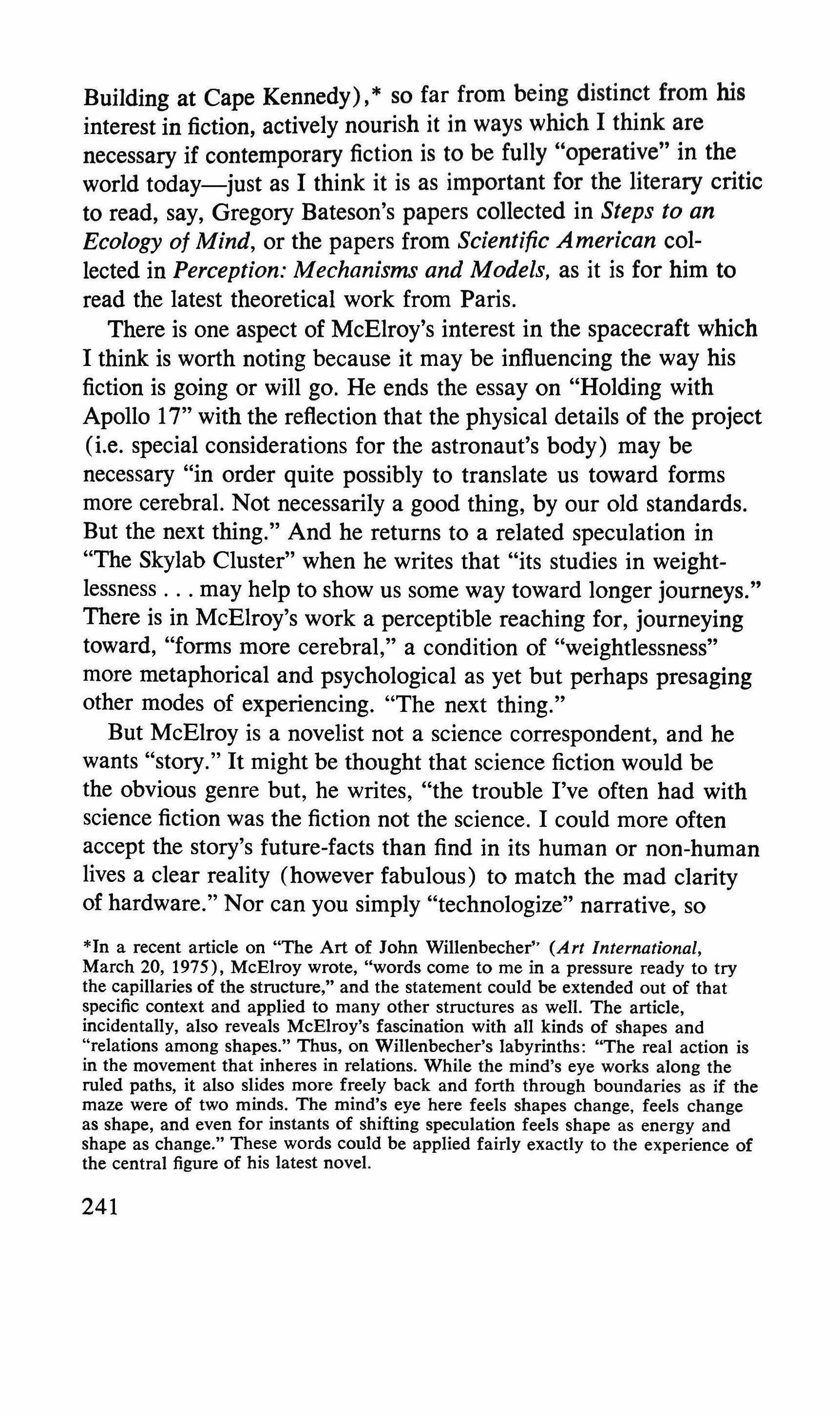
Building at Cape Kennedy), * so far from being distinct from his interest in fiction, actively nourish it in ways which I think are necessary if contemporary fiction is to be fully "operative" in the world today-just as I think it is as important for the literary critic to read, say, Gregory Bateson's papers collected in Steps to an Ecology of Mind, or the papers from Scientific American collected in Perception: Mechanisms and Models, as it is for him to read the latest theoretical work from Paris.
There is one aspect of McElroy's interest in the spacecraft which I think is worth noting because it may be influencing the way his fiction is going or will go. He ends the essay on "Holding with Apollo 17" with the reflection that the physical details of the project (i.e. special considerations for the astronaut's body) may be necessary "in order quite possibly to translate us toward forms more cerebral. Not necessarily a good thing, by our old standards. But the next thing." And he returns to a related speculation in "The Skylab Cluster" when he writes that "its studies in weightlessness may help to show us some way toward longer journeys." There is in McElroy's work a perceptible reaching for, journeying toward, "forms more cerebral," a condition of "weightlessness" more metaphorical and psychological as yet but perhaps presaging other modes of experiencing. "The next thing."
But McElroy is a novelist not a science correspondent, and he wants "story." It might be thought that science fiction would be the obvious genre but, he writes, "the trouble I've often had with science fiction was the fiction not the science. I could more often accept the story's future-facts than find in its human or non-human lives a clear reality (however fabulous) to match the mad clarity of hardware." Nor can you simply "technologize" narrative, so
*In a recent article on "The Art of John Willenbecher" (Art International, March 20, 1975), McElroy wrote, "words come to me in a pressure ready to try the capillaries of the structure," and the statement could be extended out of that specific context and applied to many other structures as well. The article, incidentally, also reveals McElroy's fascination with all kinds of shapes and "relations among shapes." Thus, on Willenbecher's labyrinths: "The real action is in the movement that inheres in relations. While the mind's eye works along the ruled paths, it also slides more freely back and forth through boundaries as if the maze were of two minds. The mind's eye here feels shapes change, feels change as shape, and even for instants of shifting speculation feels shape as energy and shape as change." These words could be applied fairly exactly to the experience of the central figure of his latest novel.
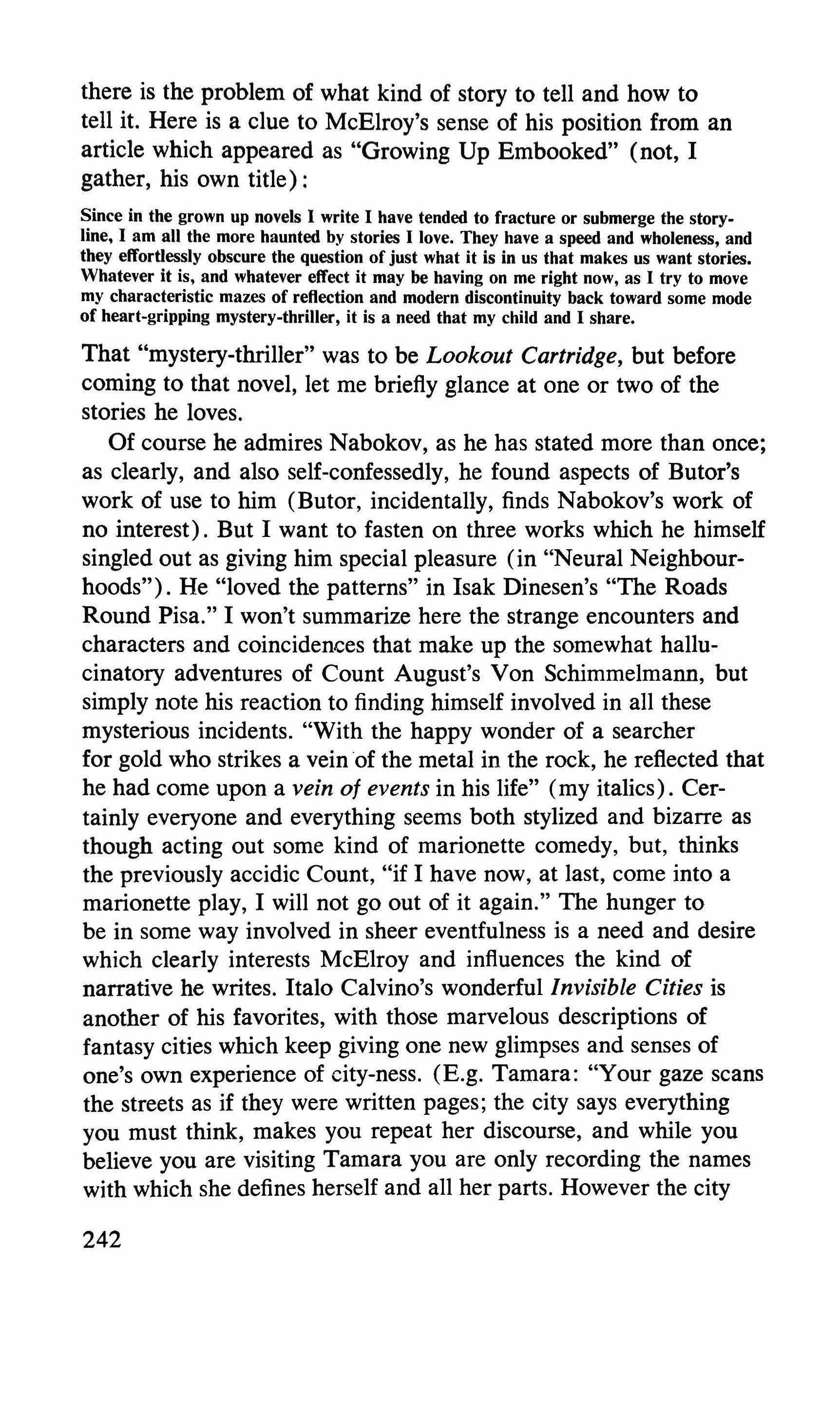
there is the problem of what kind of story to tell and how to tell it. Here is a clue to McElroy's sense of his position from an article which appeared as "Growing Up Embooked" (not, I gather, his own title):
Since in the grown up novels I write I have tended to fracture or submerge the storyline, I am all the more haunted by stories I love. They have a speed and wholeness, and they effortlessly obscure the question of just what it is in us that makes us want stories. Whatever it is, and whatever effect it may be having on me right now, as I try to move my characteristic mazes of reflection and modern discontinuity back toward some mode of heart-gripping mystery-thriller, it is a need that my child and I share.
That "mystery-thriller" was to be Lookout Cartridge, but before coming to that novel, let me briefly glance at one or two of the stories he loves.
Of course he admires Nabokov, as he has stated more than once; as clearly, and also self-confessedly, he found aspects of Butor's work of use to him (Butor, incidentally, finds Nabokov's work of no interest). But I want to fasten on three works which he himself singled out as giving him special pleasure (in "Neural Neighbourhoods"). He "loved the patterns" in Isak Dinesen's "The Roads Round Pisa." I won't summarize here the strange encounters and characters and coincidences that make up the somewhat hallucinatory adventures of Count August's Von Schimmelmann, but simply note his reaction to finding himself involved in all these mysterious incidents. "With the happy wonder of a searcher for gold who strikes a vein of the metal in the rock, he reflected that he had come upon a vein of events in his life" (my italics). Certainly everyone and everything seems both stylized and bizarre as though acting out some kind of marionette comedy, but, thinks the previously accidic Count, "if I have now, at last, come into a marionette play, I will not go out of it again." The hunger to be in some way involved in sheer eventfulness is a need and desire which clearly interests McElroy and influences the kind of narrative he writes. Italo Calvino's wonderful Invisible Cities is another of his favorites, with those marvelous descriptions of fantasy cities which keep giving one new glimpses and senses of one's own experience of city-ness. (E.g. Tamara: "Your gaze scans the streets as if they were written pages; the city says everything you must think, makes you repeat her discourse, and while you believe you are visiting Tamara you are only recording the names with which she defines herself and all her parts. However the city
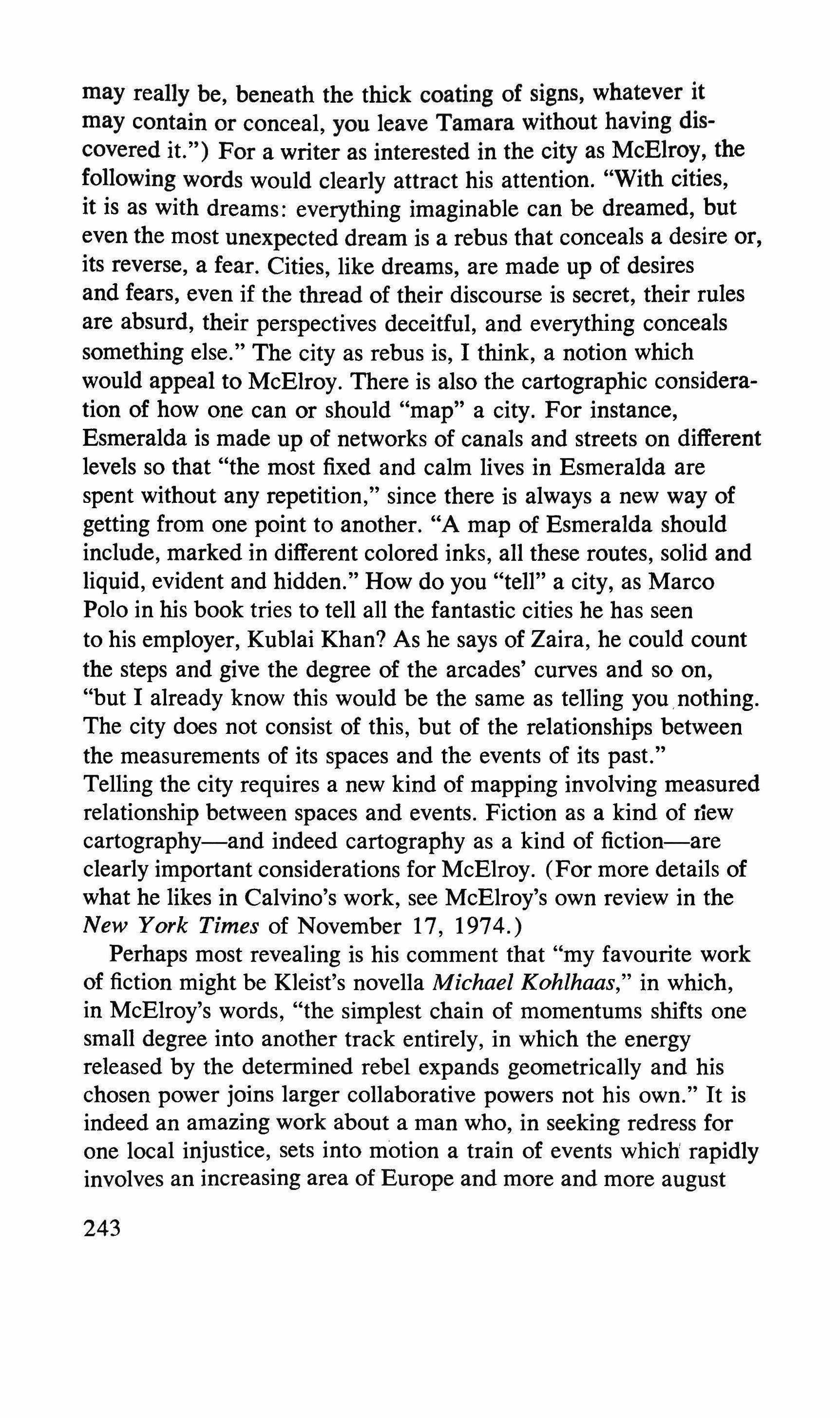
may really be, beneath the thick coating of signs, whatever it may contain or conceal, you leave Tamara without having discovered it.") For a writer as interested in the city as McElroy, the following words would clearly attract his attention. "With cities, it is as with dreams: everything imaginable can be dreamed, but even the most unexpected dream is a rebus that conceals a desire or, its reverse, a fear. Cities, like dreams, are made up of desires and fears, even if the thread of their discourse is secret, their rules are absurd, their perspectives deceitful, and everything conceals something else." The city as rebus is, I think, a notion which would appeal to McElroy. There is also the cartographic consideration of how one can or should "map" a city. For instance, Esmeralda is made up of networks of canals and streets on different levels so that "the most fixed and calm lives in Esmeralda are spent without any repetition," since there is always a new way of getting from one point to another. "A map of Esmeralda should include, marked in different colored inks, all these routes, solid and liquid, evident and hidden." How do you "tell" a city, as Marco Polo in his book tries to tell all the fantastic cities he has seen to his employer, Kublai Khan? As he says of Zaira, he could count the steps and give the degree of the arcades' curves and so on, "but I already know this would be the same as telling you nothing. The city does not consist of this, but of the relationships between the measurements of its spaces and the events of its past."
Telling the city requires a new kind of mapping involving measured relationship between spaces and events. Fiction as a kind of new cartography-and indeed cartography as a kind of fiction-are clearly important considerations for McElroy. (For more details of what he likes in Calvino's work, see McElroy's own review in the New York Times of November 17, 1974.)
Perhaps most revealing is his comment that "my favourite work of fiction might be Kleist's novella Michael Kohlhaas," in which, in McElroy's words, "the simplest chain of momentums shifts one small degree into another track entirely, in which the energy released by the determined rebel expands geometrically and his chosen power joins larger collaborative powers not his own." It is indeed an amazing work about a man who, in seeking redress for one local injustice, sets into motion a train of events which' rapidly involves an increasing area of Europe and more and more august 243

and powerful personages until at last his case becomes a concern of the Holy Roman Empire, to be commented on by Luther and ruled on by the Emperor. Michael Kohlhaas is an exemplary citizen who yet brings turmoil to medieval Europe: "posterity would have had cause to bless his memory, had not one of his virtues led him into excesses. For it was his strong sense of justice that made of him a robber and a murderer." It is as if he is a small locus of energy applying itself in entirely prescribed and conventiongoverned ways, which is suddenly given a shove in a different direction and proceeds to disrupt the increasingly complex hierarchy of power systems which make up the society of the time. After that initial shove-the gratuitous insulting act of injustice by a local aristocrat-it is as if nothing and no one can really control the ramifying events precipitated by that displaced energy. This, if you like, is history as physics in a fictional mode, and it comes very close, I think, to what McElroy was trying to do in his next novel. Here is a comment on Kleist's novella by John Gearey: "By the middle of the action, the background has become the foreground. The sheer number of persons and interests threatens to overwhelm the essential issue with extraneous concerns. That, however, is also a point the story wished to make. History, with its burden of detail, its necessary bureaucracy of events, rather than hampering Kleist in the development of his initial idea, actually seems to have helped educate him to its ramifications, and rather than working against him in the genre he had chosen to express the idea, extended the scope of the genre itself. Yet this abundance of persons and motives is significantly confined to limits, for the resulting concentration, or density, of action in the objective world is the very thing against which the hero struggles." The lure of eventfulness, the city as rebus, history as physics-these three aspects of just a selection of the fiction McElroy particularly likes point us nicely toward his next and most recent novel, Lookout Cartridge (1974).
The novel opens with an explosion in New York seen from a helicopter which will be given explanatory context only in the concluding pages of the book. The narrator, Cartwright, then ponders the question "Was there a beginning?" and reverts to an incident when he received a violent blow in the back which pushed
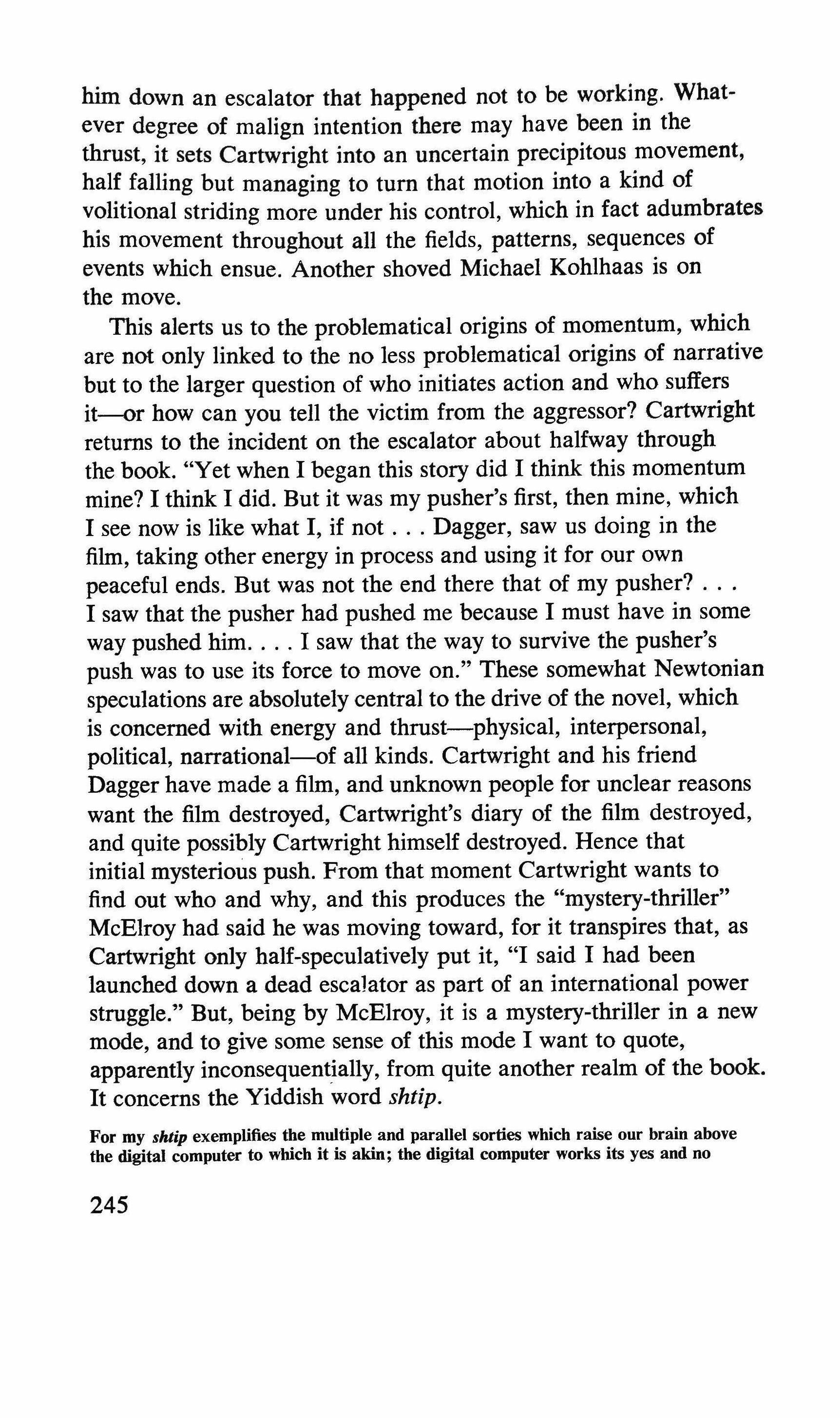
him down an escalator that happened not to be working. Whatever degree of malign intention there may have been in the thrust, it sets Cartwright into an uncertain precipitous movement, half falling but managing to turn that motion into a kind of volitional striding more under his control, which in fact adumbrates his movement throughout all the fields, patterns, sequences of events which ensue. Another shoved Michael Kohlhaas is on the move.
This alerts us to the problematical origins of momentum, which are not only linked to the no less problematical origins of narrative but to the larger question of who initiates action and who suffers it--or how can you tell the victim from the aggressor? Cartwright returns to the incident on the escalator about halfway through the book. "Yet when I began this story did I think this momentum mine? I think I did. But it was my pusher's first, then mine, which I see now is like what I, if not Dagger, saw us doing in the film, taking other energy in process and using it for our own peaceful ends. But was not the end there that of my pusher? I saw that the pusher had pushed me because I must have in some way pushed him I saw that the way to survive the pusher's push was to use its force to move on." These somewhat Newtonian speculations are absolutely central to the drive of the novel, which is concerned with energy and thrust-physical, interpersonal, political, narrational-of all kinds. Cartwright and his friend Dagger have made a film, and unknown people for unclear reasons want the film destroyed, Cartwright's diary of the film destroyed, and quite possibly Cartwright himself destroyed. Hence that initial mysterious push. From that moment Cartwright wants to find out who and why, and this produces the "mystery-thriller" McElroy had said he was moving toward, for it transpires that, as Cartwright only half-speculatively put it, "I said I had been launched down a dead escalator as part of an international power struggle." But, being by McElroy, it is a mystery-thriller in a new mode, and to give some sense of this mode I want to quote, apparently inconsequentially, from quite another realm of the book. It concerns the Yiddish word shtip.
For my shlip exemplifies the multiple and parallel sorties which raise our brain above the digital computer to which it is akin; the digital computer works its yes and no
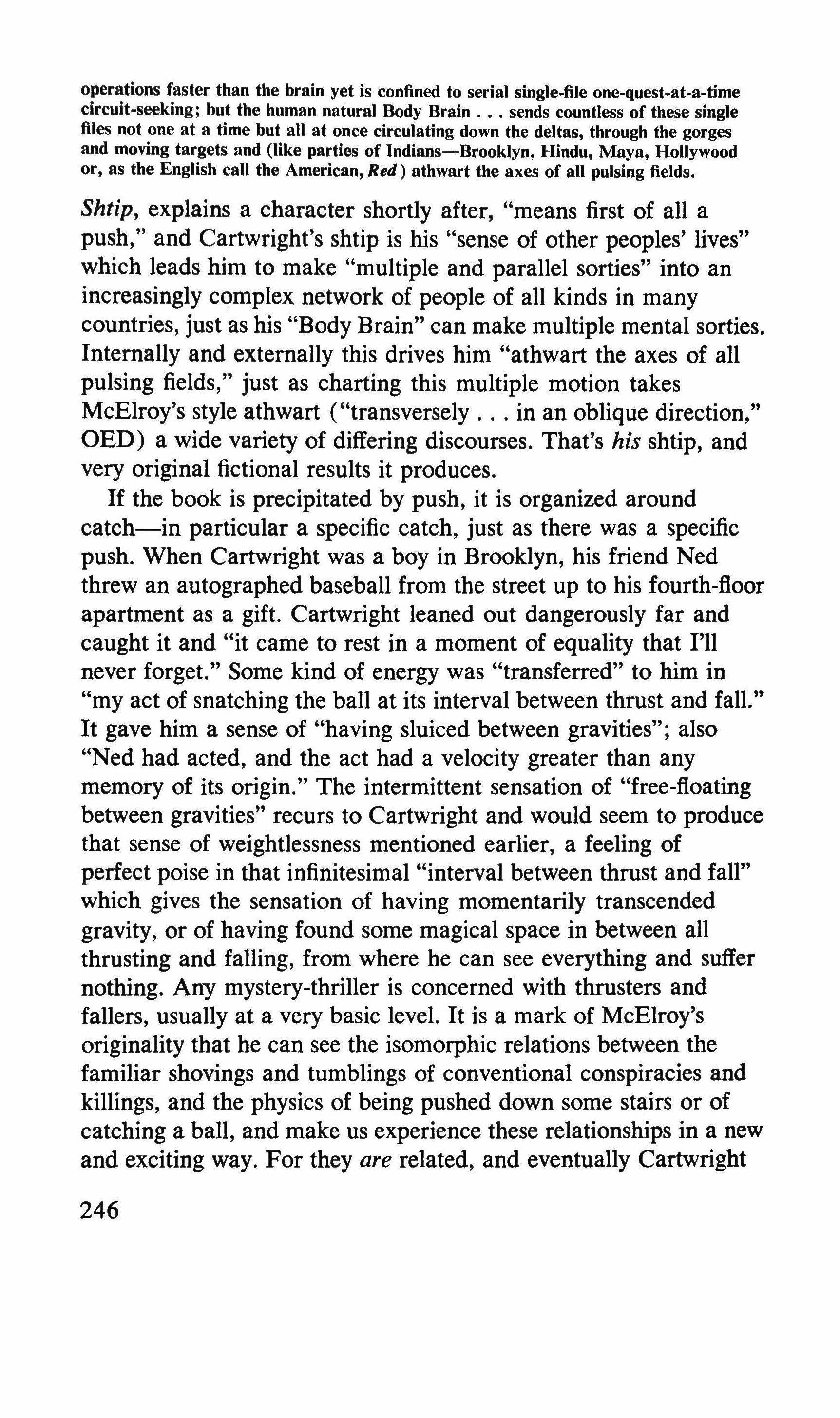
operations faster than the brain yet is confined to serial single-file one-quest-at-a-time circuit-seeking; but the human natural Body Brain sends countless of these single files not one at a time but all at once circulating down the deltas, through the gorges and moving targets and (like parties of Indians-Brooklyn, Hindu, Maya, Hollywood or, as the English call the American, Red) athwart the axes of all pulsing fields.
Shtip, explains a character shortly after, "means first of all a push," and Cartwright's shtip is his "sense of other peoples' lives" which leads him to make "multiple and parallel sorties" into an increasingly complex network of people of all kinds in many countries, just as his "Body Brain" can make multiple mental sorties. Internally and externally this drives him "athwart the axes of all pulsing fields," just as charting this multiple motion takes McElroy's style athwart ("transversely in an oblique direction," OED) a wide variety of differing discourses. That's his shtip, and very original fictional results it produces.
If the book is precipitated by push, it is organized around catch-in particular a specific catch, just as there was a specific push. When Cartwright was a boy in Brooklyn, his friend Ned threw an autographed baseball from the street up to his fourth-floor apartment as a gift. Cartwright leaned out dangerously far and caught it and "it came to rest in a moment of equality that I'll never forget." Some kind of energy was "transferred" to him in "my act of snatching the ball at its interval between thrust and fall." It gave him a sense of "having sluiced between gravities"; also "Ned had acted, and the act had a velocity greater than any memory of its origin." The intermittent sensation of "free-floating between gravities" recurs to Cartwright and would seem to produce that sense of weightlessness mentioned earlier, a feeling of perfect poise in that infinitesimal "interval between thrust and fall" which gives the sensation of having momentarily transcended gravity, or of having found some magical space in between all thrusting and falling, from where he can see everything and suffer nothing. Any mystery-thriller is concerned with thrusters and fallers, usually at a very basic level. It is a mark of McElroy's originality that he can see the isomorphic relations between the familiar shovings and tumblings of conventional conspiracies and killings, and the physics of being pushed down some stairs or of catching a ball, and make us experience these relationships in a new and exciting way. For they are related, and eventually Cartwright 246
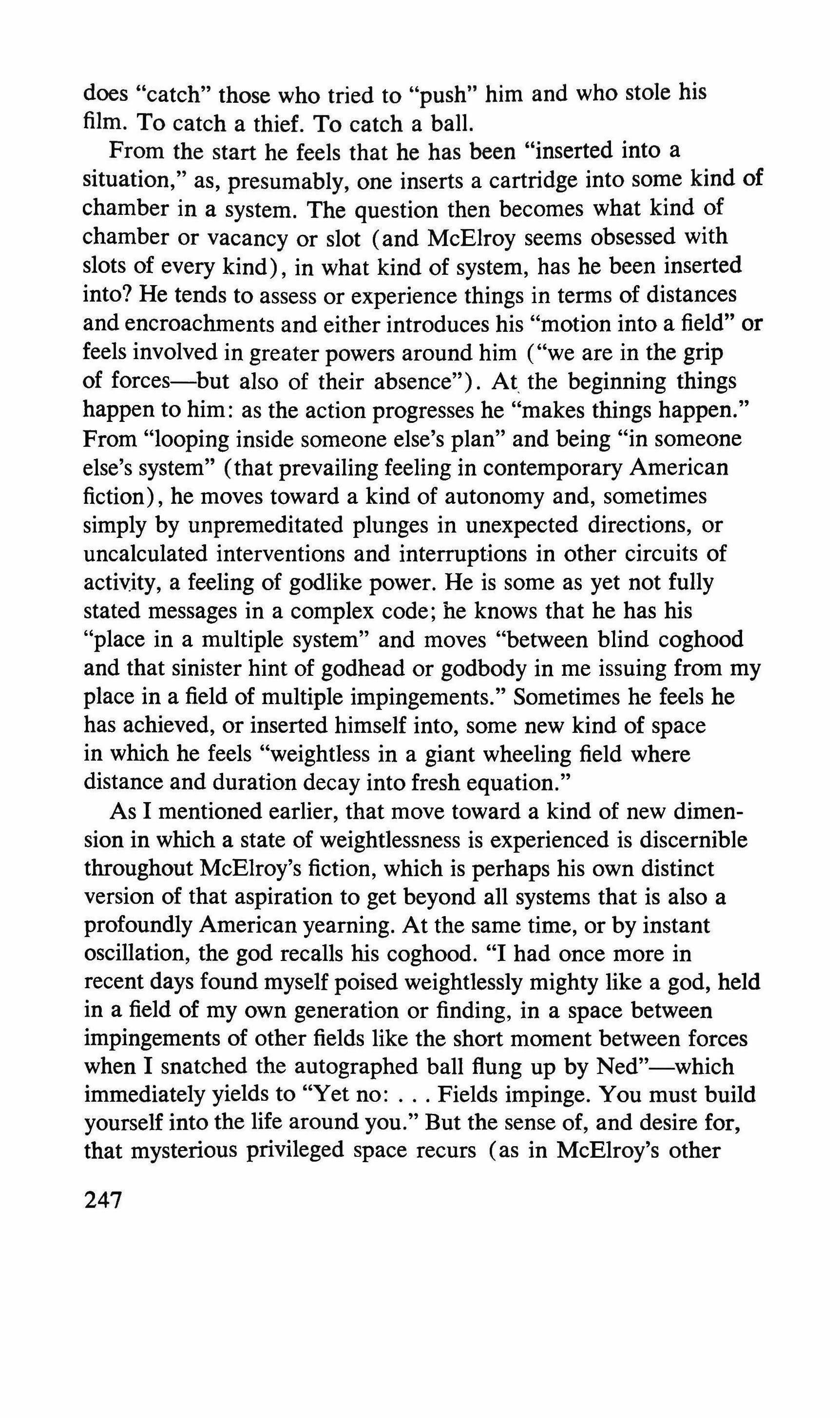
does "catch" those who tried to "push" him and who stole his film. To catch a thief. To catch a ball.
From the start he feels that he has been "inserted into a situation," as, presumably, one inserts a cartridge into some kind of chamber in a system. The question then becomes what kind of chamber or vacancy or slot (and McElroy seems obsessed with slots of every kind), in what kind of system, has he been inserted into? He tends to assess or experience things in terms of distances and encroachments and either introduces his "motion into a field" or feels involved in greater powers around him ("we are in the grip of forces-but also of their absence"). At, the beginning things happen to him: as the action progresses he "makes things happen." From "looping inside someone else's plan" and being "in someone else's system" (that prevailing feeling in contemporary American fiction), he moves toward a kind of autonomy and, sometimes simply by unpremeditated plunges in unexpected directions, or uncalculated interventions and interruptions in other circuits of activity, a feeling of godlike power. He is some as yet not fully stated messages in a complex code; he knows that he has his "place in a multiple system" and moves "between blind coghood and that sinister hint of godhead or godbody in me issuing from my place in a field of multiple impingements." Sometimes he feels he has achieved, or inserted himself into, some new kind of space in which he feels "weightless in a giant wheeling field where distance and duration decay into fresh equation."
As 1 mentioned earlier, that move toward a kind of new dimension in which a state of weightlessness is experienced is discernible throughout McElroy's fiction, which is perhaps his own distinct version of that aspiration to get beyond all systems that is also a profoundly American yearning. At the same time, or by instant oscillation, the god recalls his coghood. "I had once more in recent days found myself poised weightlessly mighty like a god, held in a field of my own generation or finding, in a space between impingements of other fields like the short moment between forces when 1 snatched the autographed ball flung up by Ned"-which immediately yields to "Yet no: Fields impinge. You must build yourself into the life around you." But the sense of, and desire for, that mysterious privileged space recurs (as in McElroy's other

books, it is potentially damaging to the protagonist's family life), and to inquire into it a bit more curiously, I want to fasten on the word "between."
Cartwright himself constantly uses the word as he moves between different countries: "I was between two groups and two languages"; "I was between many people in many directions"; and so on. Understandably it seems to take on a kind of nontopographical existence of its own so that there are intimations of what we might call prepositional or adverbial space, and Cartwright feels he has, at times, "inserted himself into a dimensionless place Between,"* and from another quarter there are expatiations on "the age-old mystic In-Between carved like a moat of insulation to guard a Jewish self prior to actual territory." The book explores this curious psychic state of feeling somehow both prior to territory and beyond topography with great imagination and originality. And it is discovered to be far from unequivocal sensation. "Unfortunately, to be between does not necessitate being constantly connected with what one is between." So, disconnection through displacement. But worse- "There are times when your sense of being between here and there, between people, between one thing and another, fades not even into absurdity but into something else, death or revelation, more likely death, as you sense that whatever they are (whom you are or were between), they are not near after all, not holding, don't know you, or just don't know." It is one of the exciting aspects of McElroy's prose that in addition to moving toward some form of "ultimate topography"and the vivid evocation of differing terrains, American, English, Scottish, Corsican, Welsh, is one of the most notable features of the book-it reaches out to explore states of moated consciousness in which the sense of place (and other people) begins to fade altogether. Among other things, what this involves is a kind of liquefaction of consciousness in which boundaries-the very condition of all our organizings of experience of every kind-lose their stability. As in a moment in the helicopter, when "Lower Manhattan bulges, or bulges in some inflationary sign to me that weightlessness may make those canals come unplugged and Terminus the god of boundaries and property may be subject to
*Christine Brooke-Rose has a novel entitled Between which I have not read and cannot get hold of at the moment.
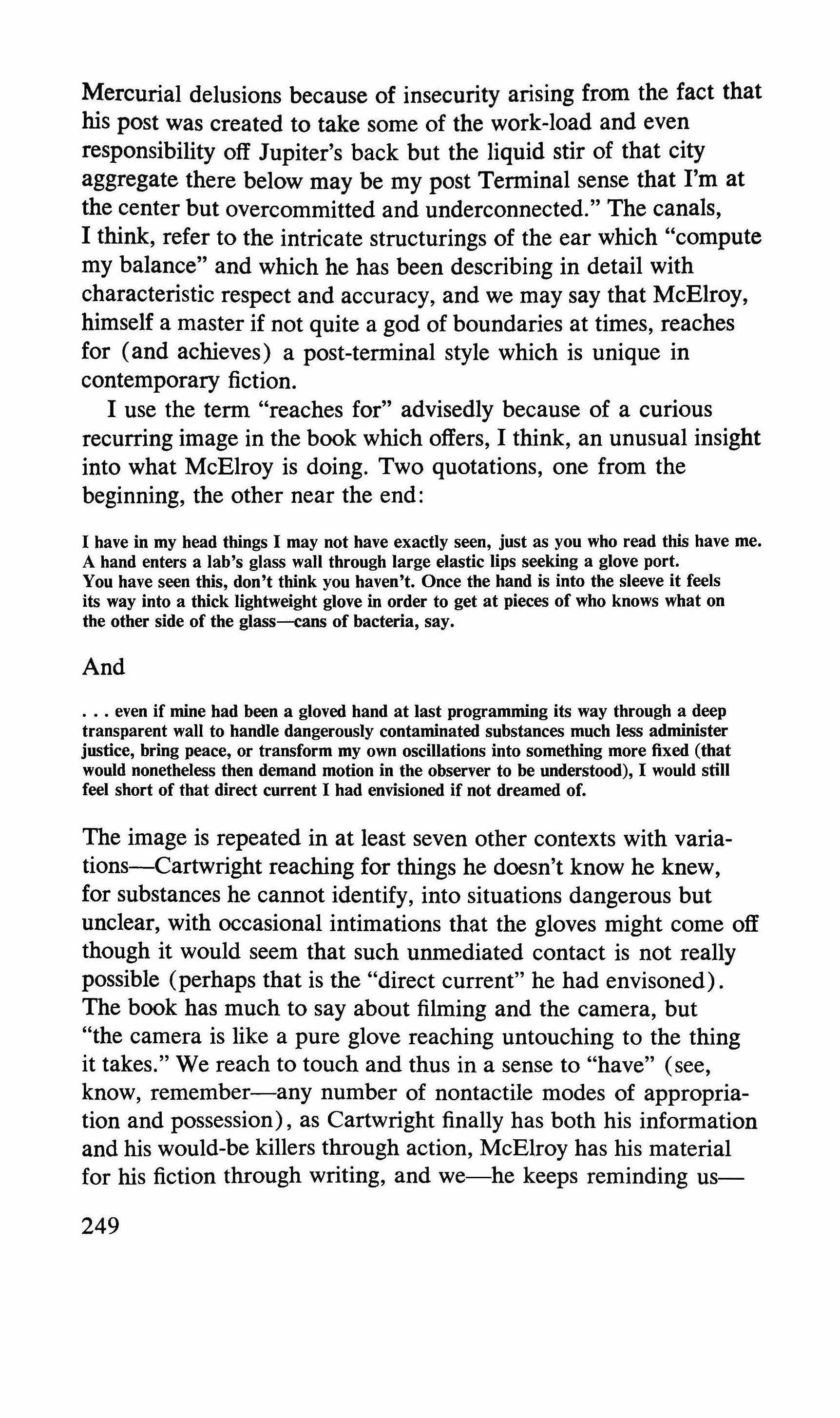
Mercurial delusions because of insecurity arising from the fact that his post was created to take some of the work-load and even responsibility off Jupiter's back but the liquid stir of that city aggregate there below may be my post Terminal sense that I'm at the center but overcommitted and underconnected." The canals, I think, refer to the intricate structurings of the ear which "compute my balance" and which he has been describing in detail with characteristic respect and accuracy, and we may say that McElroy, himself a master if not quite a god of boundaries at times, reaches for (and achieves) a post-terminal style which is unique in contemporary fiction.
I use the term "reaches for" advisedly because of a curious recurring image in the book which offers, I think, an unusual insight into what McElroy is doing. Two quotations, one from the beginning, the other near the end:
I have in my head things I may not have exactly seen, just as you who read this have me. A hand enters a lab's glass wall through large elastic lips seeking a glove port. You have seen this, don't think you haven't. Once the hand is into the sleeve it feels its way into a thick lightweight glove in order to get at pieces of who knows what on the other side of the glass-cans of bacteria, say.
And
even if mine had been a gloved hand at last programming its way through a deep transparent wall to handle dangerously contaminated substances much less administer jnstice, bring peace, or transform my own oscillations into something more fixed (that would nonetheless then demand motion in the observer to be understood), I would still feel short of that direct current I had envisioned if not dreamed of.
The image is repeated in at least seven other contexts with variations-Cartwright reaching for things he doesn't know he knew, for substances he cannot identify, into situations dangerous but unclear, with occasional intimations that the gloves might come off though it would seem that such unmediated contact is not really possible (perhaps that is the "direct current" he had envisoned). The book has much to say about filming and the camera, but "the camera is like a pure glove reaching untouching to the thing it takes." We reach to touch and thus in a sense to "have" (see, know, remember-any number of nontactile modes of appropriation and possession), as Cartwright finally has both his information and his would-be killers through action, McElroy has his material for his fiction through writing, and we-he keeps reminding us249
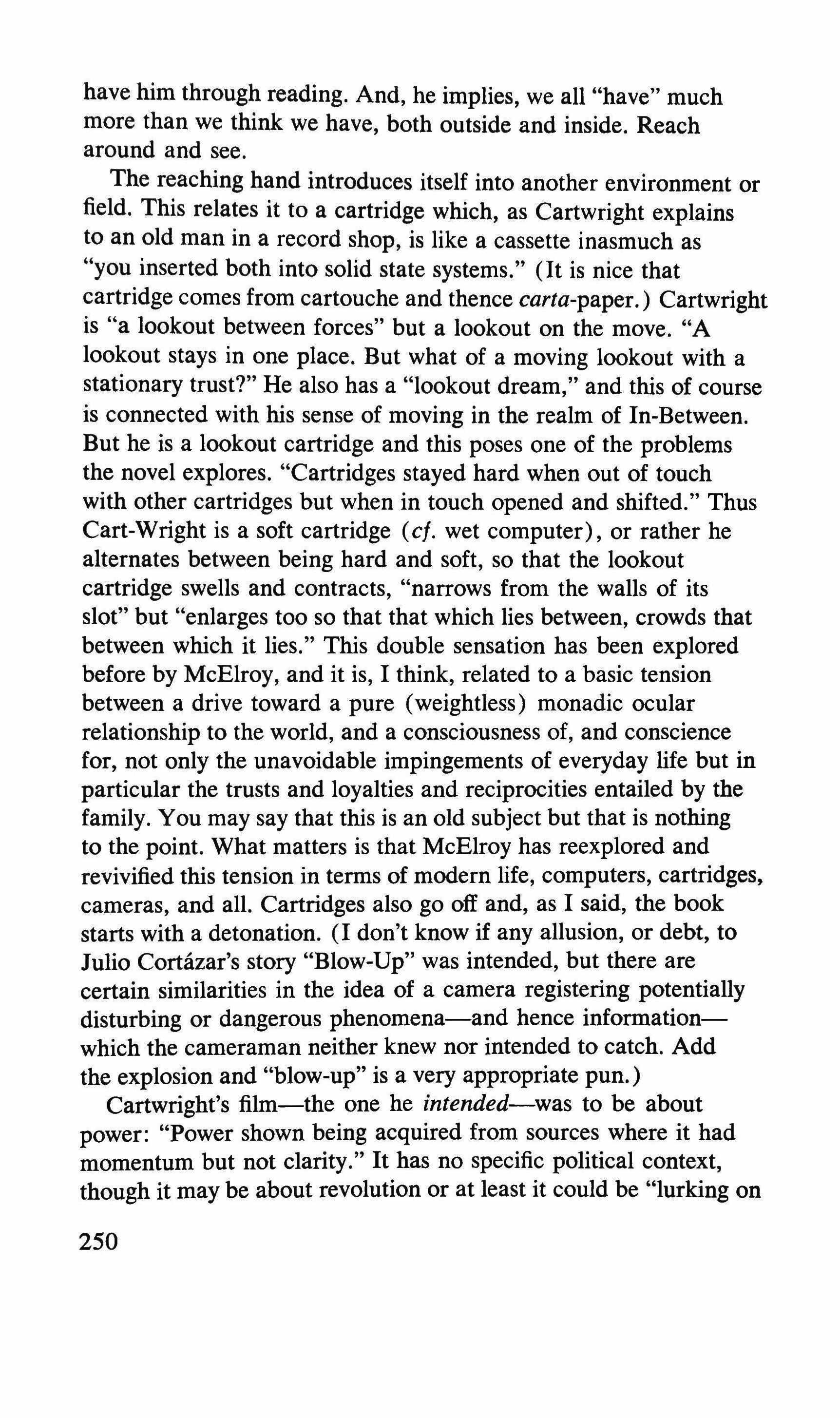
have him through reading. And, he implies, we all "have" much more than we think we have, both outside and inside. Reach around and see.
The reaching hand introduces itself into another environment or field. This relates it to a cartridge which, as Cartwright explains to an old man in a record shop, is like a cassette inasmuch as "you inserted both into solid state systems." (It is nice that cartridge comes from cartouche and thence carta-paper.) Cartwright is "a lookout between forces" but a lookout on the move. "A lookout stays in one place. But what of a moving lookout with a stationary trust?" He also has a "lookout dream," and this of course is connected with his sense of moving in the realm of In-Between. But he is a lookout cartridge and this poses one of the problems the novel explores. "Cartridges stayed hard when out of touch with other cartridges but when in touch opened and shifted." Thus Cart-Wright is a soft cartridge (ci. wet computer), or rather he alternates between being hard and soft, so that the lookout cartridge swells and contracts, "narrows from the walls of its slot" but "enlarges too so that that which lies between, crowds that between which it lies." This double sensation has been explored before by McElroy, and it is, I think, related to a basic tension between a drive toward a pure (weightless) monadic ocular relationship to the world, and a consciousness of, and conscience for, not only the unavoidable impingements of everyday life but in particular the trusts and loyalties and reciprocities entailed by the family. You may say that this is an old subject but that is nothing to the point. What matters is that McElroy has reexplored and revivified this tension in terms of modern life, computers, cartridges, cameras, and all. Cartridges also go off and, as I said, the book starts with a detonation. (I don't know if any allusion, or debt, to Julio Cortazar's story "Blow-Up" was intended, but there are certain similarities in the idea of a camera registering potentially disturbing or dangerous phenomena-and hence informationwhich the cameraman neither knew nor intended to catch. Add the explosion and "blow-up" is a very appropriate pun.)
Cartwright's film-the one he intended-was to be about power: "Power shown being acquired from sources where it had momentum but not clarity." It has no specific political context, though it may be about revolution or at least it could be "lurking on 250
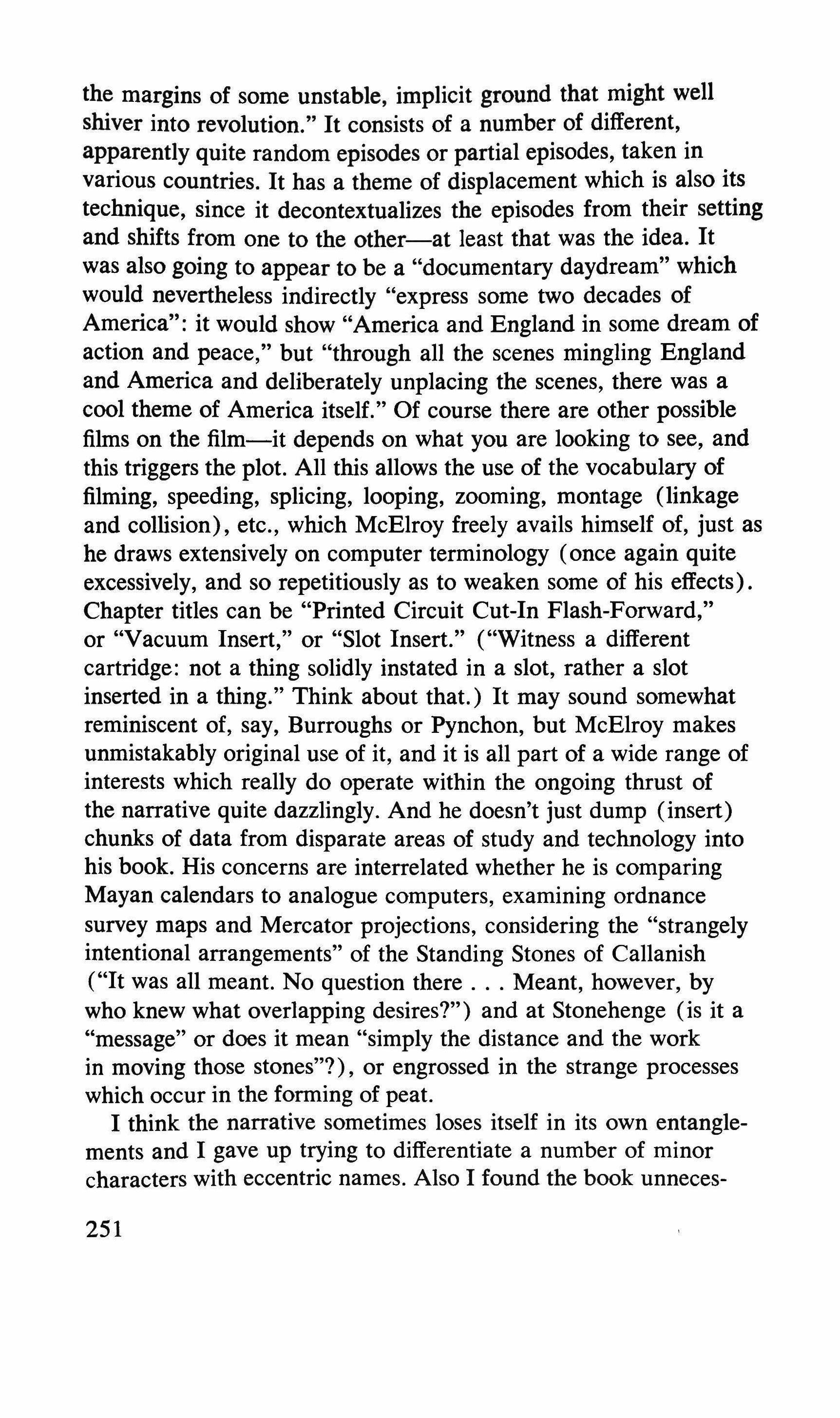
the margins of some unstable, implicit ground that might well shiver into revolution." It consists of a number of different, apparently quite random episodes or partial episodes, taken in various countries. It has a theme of displacement which is also its technique, since it decontextualizes the episodes from their setting and shifts from one to the other-at least that was the idea. It was also going to appear to be a "documentary daydream" which would nevertheless indirectly "express some two decades of America": it would show"America and England in some dream of action and peace," but "through all the scenes mingling England and America and deliberately unplacing the scenes, there was a cool theme of America itself." Of course there are other possible films on the film-it depends on what you are looking to see, and this triggers the plot. All this allows the use of the vocabulary of filming, speeding, splicing, looping, zooming, montage (linkage and collision), etc., which McElroy freely avails himself of, just as he draws extensively on computer terminology (once again quite excessively, and so repetitiously as to weaken some of his effects). Chapter titles can be "Printed Circuit Cut-In Flash-Forward," or "Vacuum Insert," or "Slot Insert." ("Witness a different cartridge: not a thing solidly instated in a slot, rather a slot inserted in a thing." Think about that.) It may sound somewhat reminiscent of, say, Burroughs or Pynchon, but McElroy makes unmistakably original use of it, and it is all part of a wide range of interests which really do operate within the ongoing thrust of the narrative quite dazzlingly. And he doesn't just dump (insert) chunks of data from disparate areas of study and technology into his book. His concerns are interrelated whether he is comparing Mayan calendars to analogue computers, examining ordnance survey maps and Mercator projections, considering the "strangely intentional arrangements" of the Standing Stones of Callanish ("It was all meant. No question there Meant, however, by who knew what overlapping desires?") and at Stonehenge (is it a "message" or does it mean "simply the distance and the work in moving those stones"?), or engrossed in the strange processes which occur in the forming of peat.
I think the narrative sometimes loses itself in its own entanglements and I gave up trying to differentiate a number of minor characters with eccentric names. Also I found the book unneces251
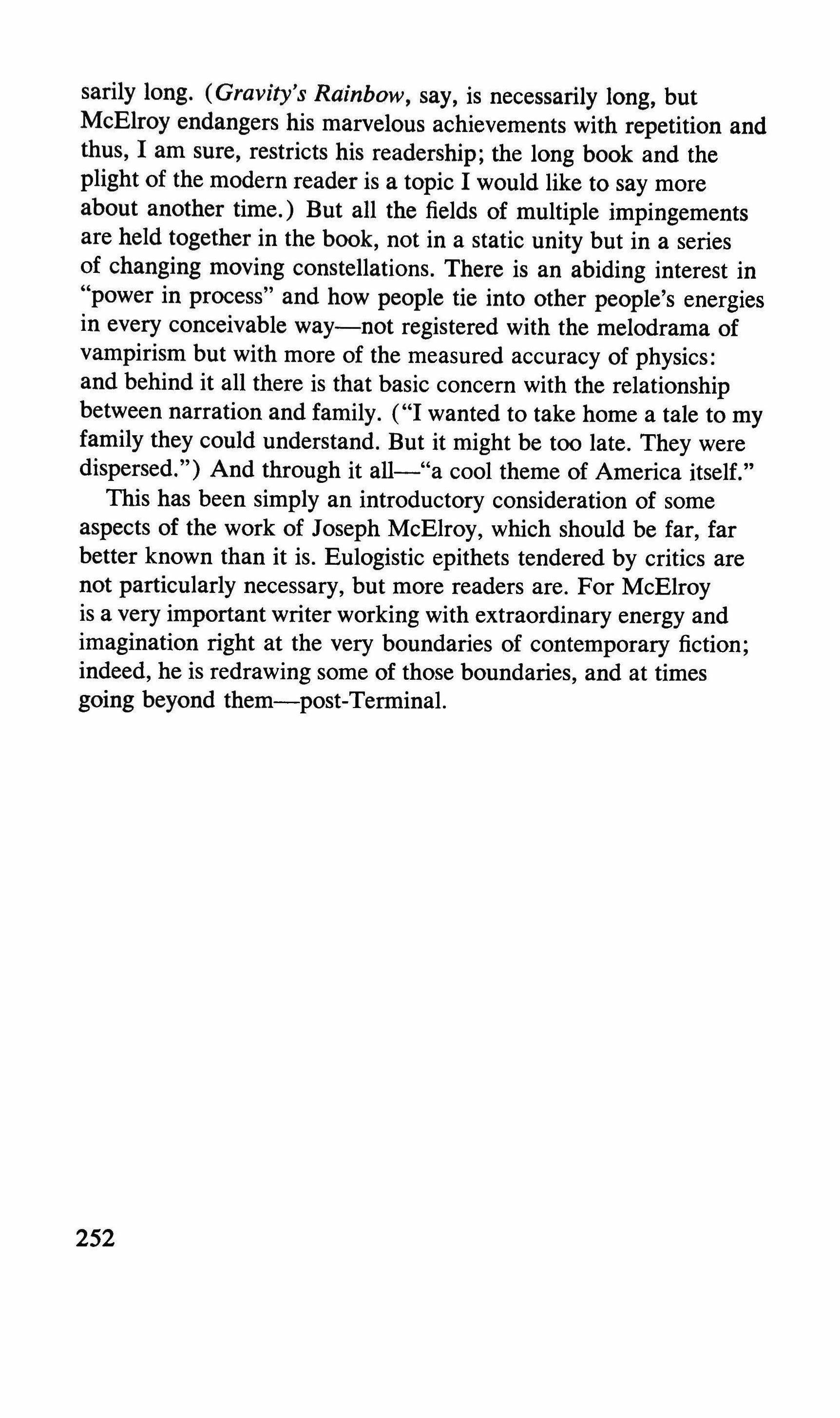
sarily long. (Gravity's Rainbow, say, is necessarily long, but McElroy endangers his marvelous achievements with repetition and thus, I am sure, restricts his readership; the long book and the plight of the modern reader is a topic I would like to say more about another time.) But all the fields of multiple impingements are held together in the book, not in a static unity but in a series of changing moving constellations. There is an abiding interest in "power in process" and how people tie into other people's energies in every conceivable way-not registered with the melodrama of vampirism but with more of the measured accuracy of physics: and behind it all there is that basic concern with the relationship between narration and family. ("I wanted to take home a tale to my family they could understand. But it might be too late. They were dispersed.") And through it all-"a cool theme of America itself."
This has been simply an introductory consideration of some aspects of the work of Joseph McElroy, which should be far, far better known than it is. Eulogistic epithets tendered by critics are not particularly necessary, but more readers are. For McElroy is a very important writer working with extraordinary energy and imagination right at the very boundaries of contemporary fiction; indeed, he is redrawing some of those boundaries, and at times going beyond them-post-Terminal.
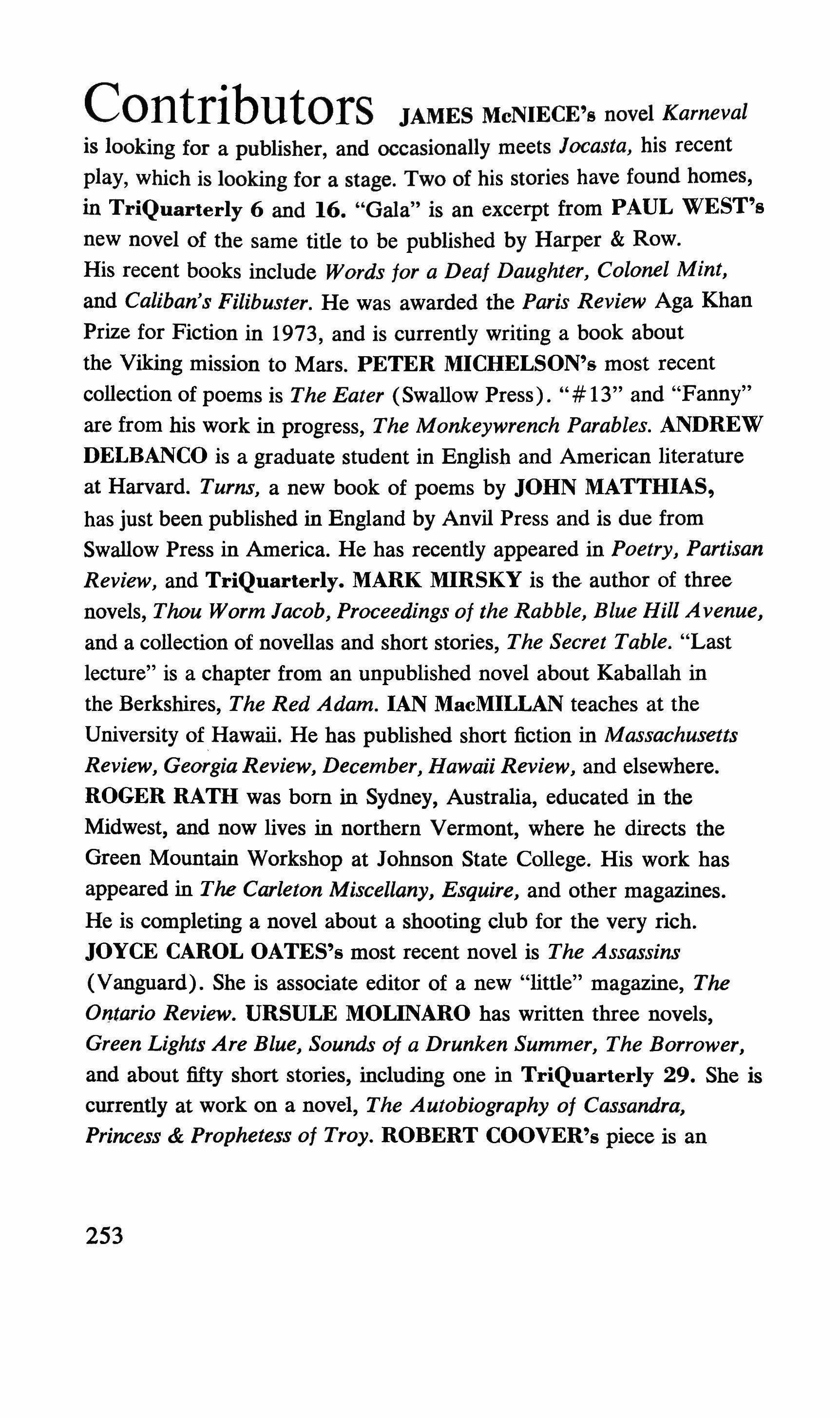
JAMES McNIECE's novel Karneval is looking for a publisher, and occasionally meets Jocasta, his recent play, which is looking for a stage. Two of his stories have found homes, in TriQuarterly 6 and 16. "Gala" is an excerpt from PAUL WEST's new novel of the same title to be published by Harper & Row. His recent books include Words for a Deaf Daughter, Colonel Mint, and Caliban's Filibuster. He was awarded the Paris Review Aga Khan Prize for Fiction in 1973, and is currently writing a book about the Viking mission to Mars. PETER MICHELSON's most recent collection of poems is The Eater (Swallow Press). "#13" and "Fanny" are from his work in progress, The Monkeywrench Parables. ANDREW DELBANCO is a graduate student in English and American literature at Harvard. Turns, a new book of poems by JOHN MATTHIAS, has just been published in England by Anvil Press and is due from Swallow Press in America. He has recently appeared in Poetry, Partisan Review, and TriQuarterly. MARK MIRSKY is the author of three novels, Thou Worm Jacob, Proceedings of the Rabble, Blue Hill Avenue, and a collection of novellas and short stories, The Secret Table. "Last lecture" is a chapter from an unpublished novel about Kaballah in the Berkshires, The Red Adam. IAN MacMILLAN teaches at the University ofHawaii. He has published short fiction in Massachusetts Review, Georgia Review, December, Hawaii Review, and elsewhere.
ROGER RATH was born in Sydney, Australia, educated in the Midwest, and now lives in northern Vermont, where he directs the Green Mountain Workshop at Johnson State College. His work has appeared in The Carleton Miscellany, Esquire, and other magazines. He is completing a novel about a shooting club for the very rich.
JOYCE CAROL OATES's most recent novel is The Assassins (Vanguard). She is associate editor of a new "little" magazine, The Ontario Review. URSULE MOLINARO has written three novels, Green Lights Are Blue, Sounds of a Drunken Summer, The Borrower, and about fifty short stories, including one in TriQuarterly 29. She is currently at work on a novel, The Autobiography of Cassandra, Princess & Prophetess of Troy. ROBERT COOVER's piece is an
excerpt from The Public Burning of Julius and Ethel Rosenberg: An Historical Romance, to be published by Knopf later this year. He is the author of The Universal Baseball Association, J. Henry Waugh, Prop., Pricksongs & Descants, and A Theological Position. He is fiction editor for The Iowa Review and was co-editor of TriQuarterly 35/1, Minute Stories. WAYNE BIDDLE was born in Baltimore in 1948 and graduated from Cornell with a degree in electrical engineering. He is now finishing a novel at the Fine Arts Work Center in Provincetown, Mass. DAVID PARADIS lives and works in northern California. ROBERT RAY is a professor of English at Beloit College, on leave to write and teach tennis in San Diego. His first novel is titled The Heart of the Game. THOMAS GAVIN's story is an excerpt from Kingkill, a novel about an automaton chess player to be published by Random House and Jonathan Cape. He teaches at Middlebury College. EUGENE WILDMAN's story is excerpted from his novel in progress, Gargantua. He is also working on a collection of stories and a screenplay. He is the author of two previous novels, Montezuma's Ball and Nuclear Love. WILLIAM KITTREDGE teaches in the Creative Writing Program at the University of Montana. He has held a Stegner fellowship at Stanford and won a National Endowment for the Arts Award in 1974. At present he is finishing a novel called Sixty Million Buffalo. Recently returned from lecturing in Yugoslavia and Turkey, TONY TANNER is currently a fellow at Kings College, Cambridge. His latest published book was The City of Words, and he is now working on a book on adultery in the novel.
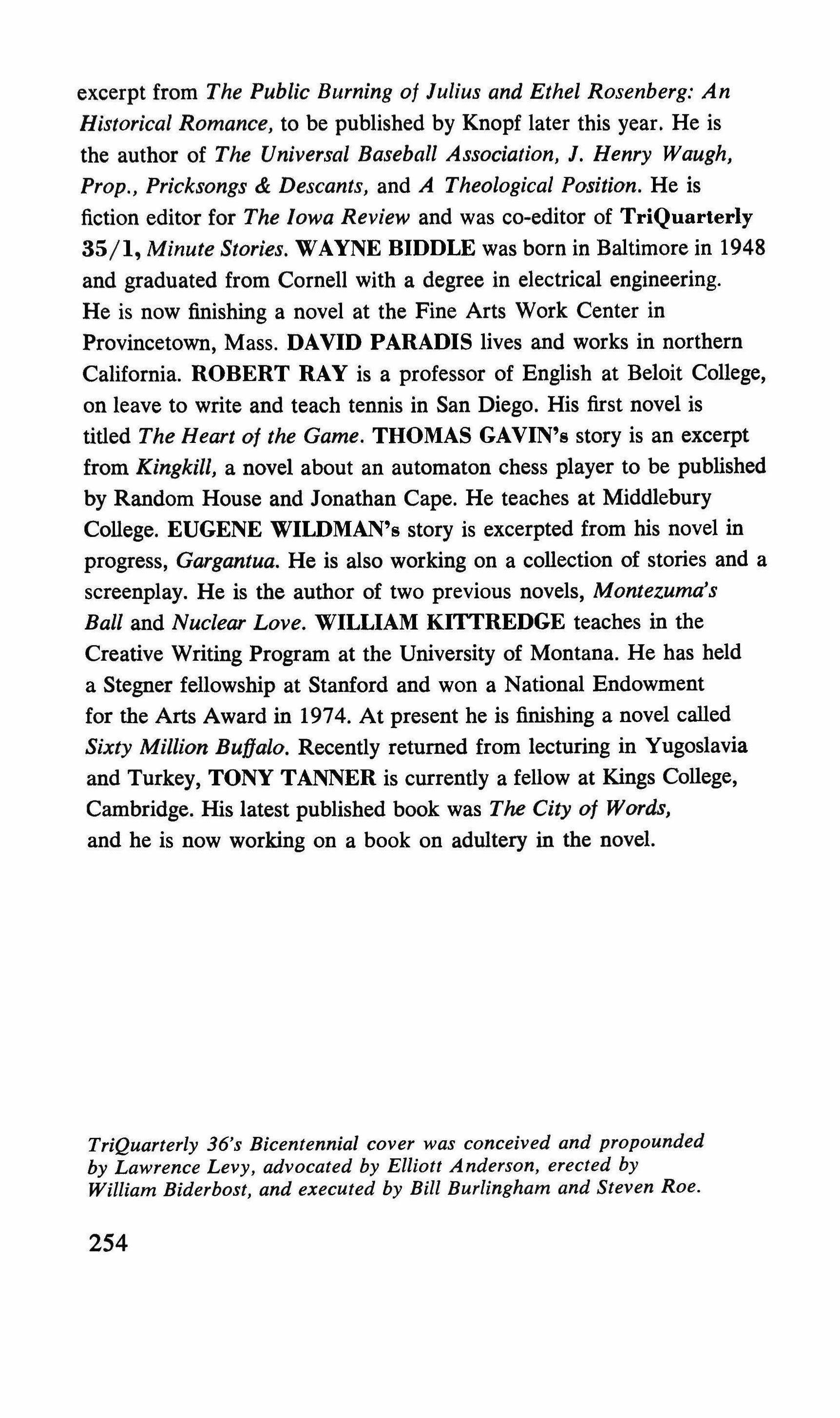
TriQuarterly 36's Bicentennial cover was conceived and propounded by Lawrence Levy, advocated by Elliott Anderson, erected by William Biderbost, and executed by Bill Burlingham and Steven Roe.
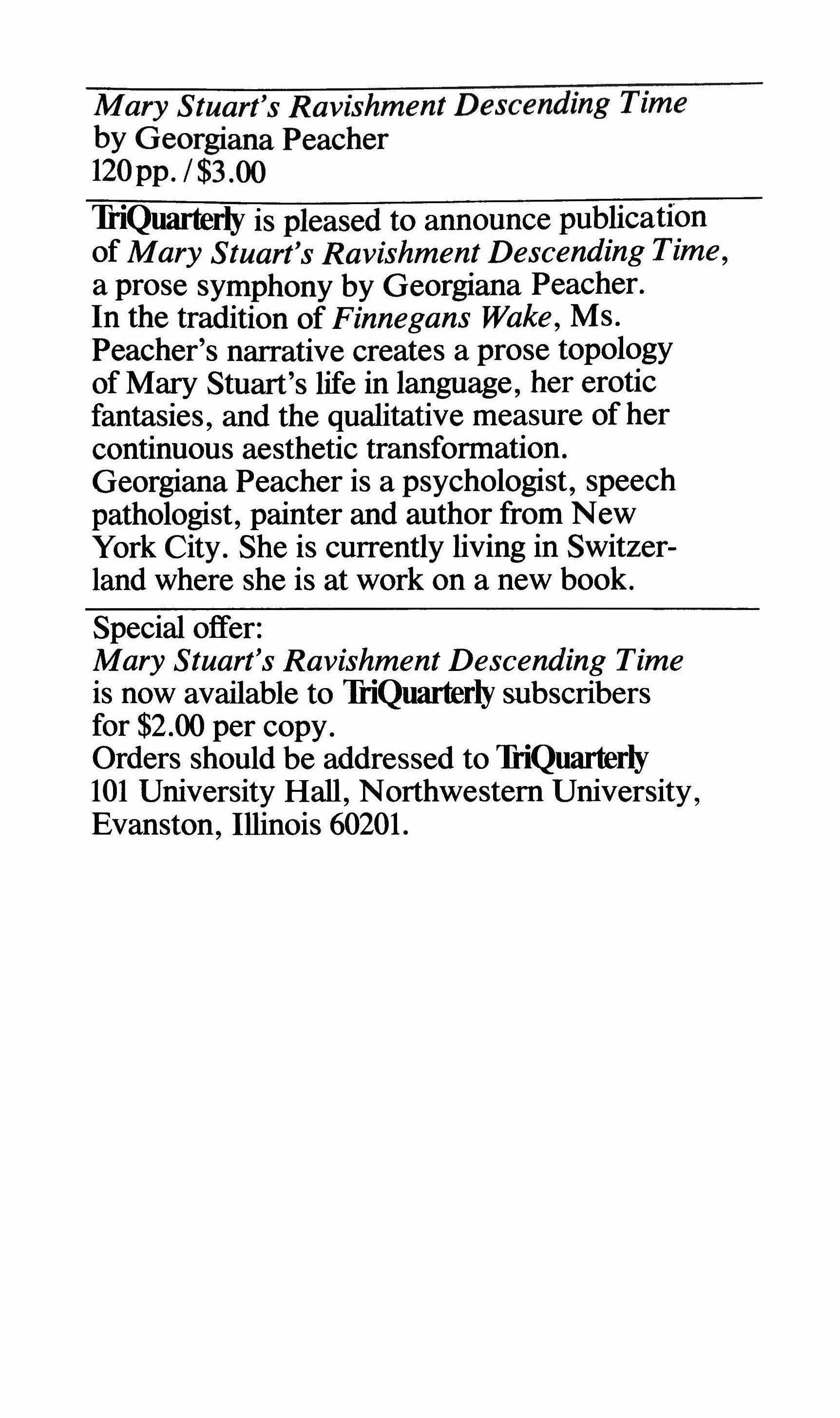
Mary Stuart's Ravishment Descending Time by Georgiana Peacher 120pp. /$3.00
lliQuarterly is pleased to announce publication of Mary Stuart's Ravishment Descending Time, a prose symphony by Georgiana Peacher. In the tradition of Finnegans Wake, Ms. Peacher's narrative creates a prose topology of Mary Stuart's life in language, her erotic fantasies, and the qualitative measure of her continuous aesthetic transformation.
Georgiana Peacher is a psychologist, speech pathologist, painter and author from New York City. She is currently living in Switzerland where she is at work on a new book.
Special offer:
Mary Stuart's Ravishment Descending Time is now available to lliQuarterly subscribers for $2.00 per copy. Orders should be addressed to 'lliQuarterly 101 University Hall, Northwestern University, Evanston, Illinois 60201.
Thedistributorof TriQuarterly
also distributes many other excel lent periodicals:
American Scholar Antaeus Aphira Arts in Society
Beloit Poetry Black Scholar Carleton Miscellany
Centennial Review

Chelsea Chicago Review
Cinefantastique Columbia Forum Commentary
Confrontation
Contemporary Literature Cross Currents
Current History Daedalus Drama Review Epoch
Film Heritage FilmJournal Filmmakers Newsletter
Film Quarterly Foreign Policy Harvard Business Review
Hudson Review Journal of Popular Film Judaism
The Little Magazine
Michigan Quarterly
Massachusetts Review
Midstream Modern Age
Modern Fiction Studies Modern Poetry in Translation
Monthly Review Mosaic New Left Review Partisan Review
Performance Poetry Poetry Northwest Prairie Schooner
Psychoanalytic Review Quarterly Review of Literature
Sal magundi Science s Society Sewanee Review
Theatre Quarterly
Transatlantic Review
VirginiaQuarterly Washington Monthly
Yale French Studies Yale Review Yale Theatre
These periodicals may be purchased at your local bookstore, ora periodicals list may be requested from:
B. DeBoer
188 High Street
Nutley, New Jersey 0711 0

